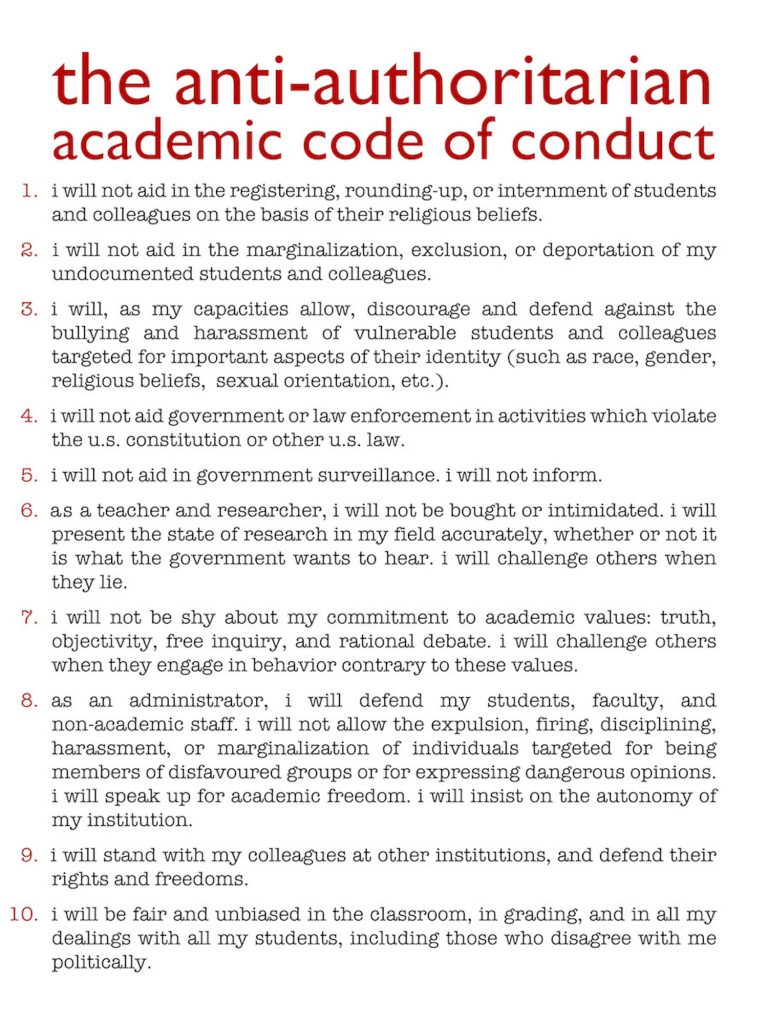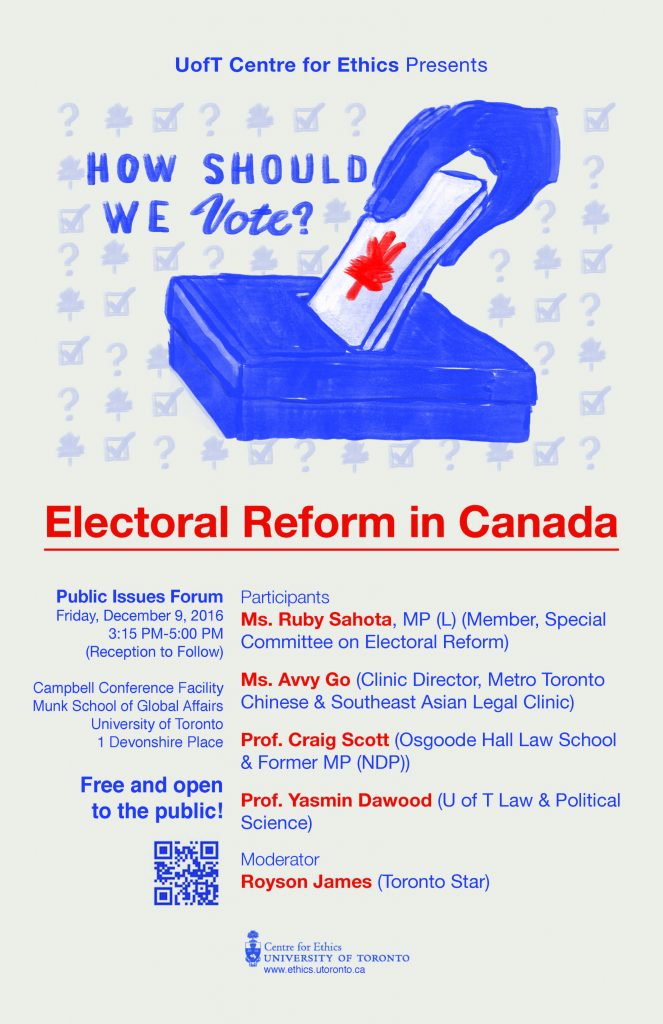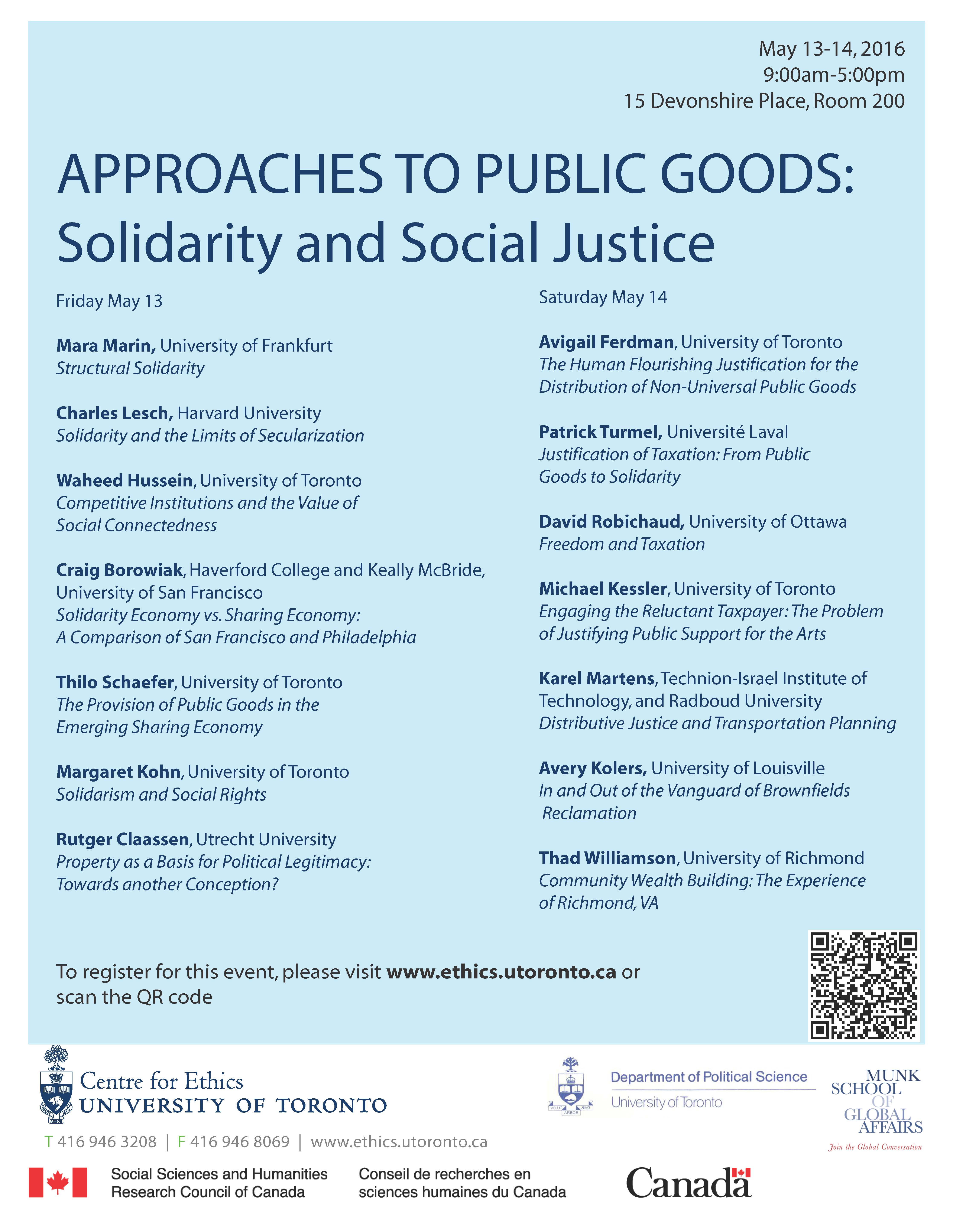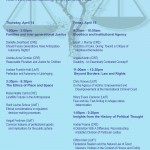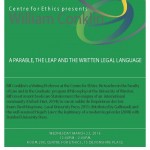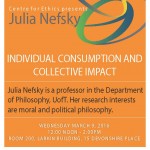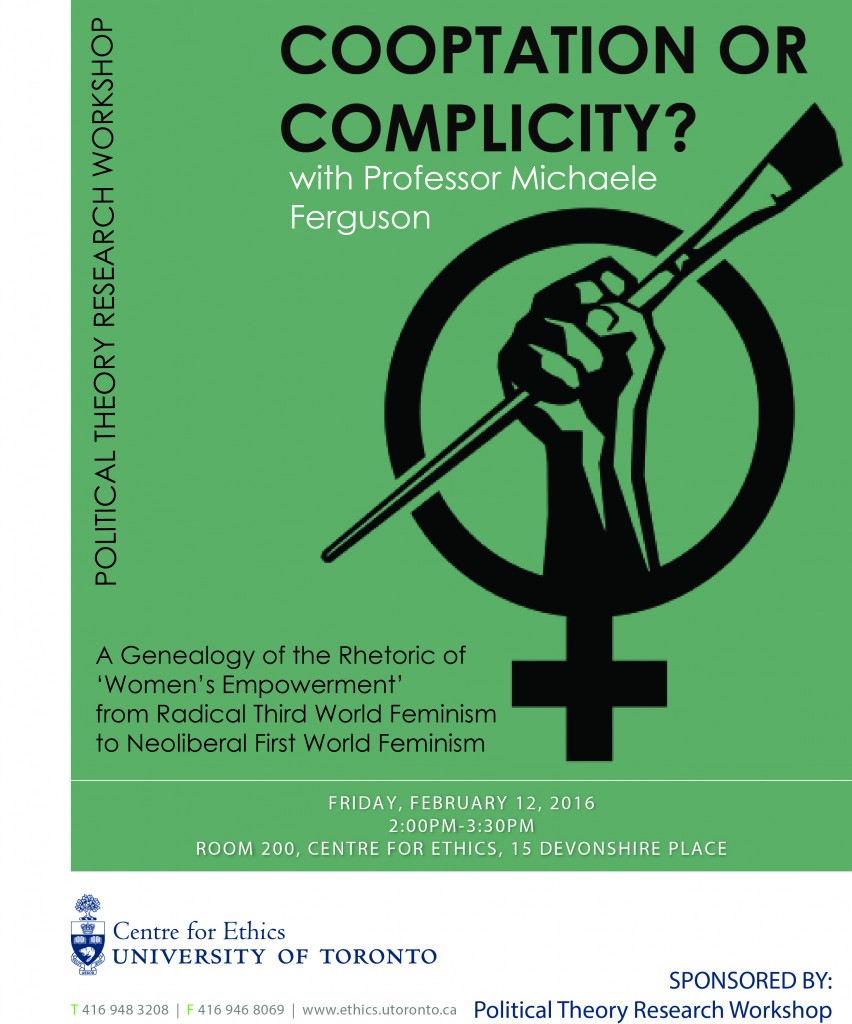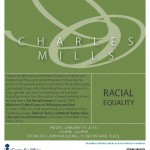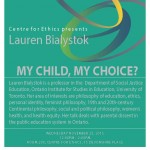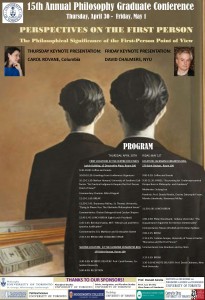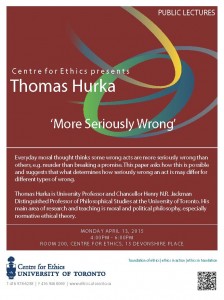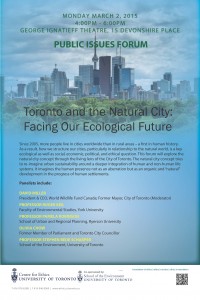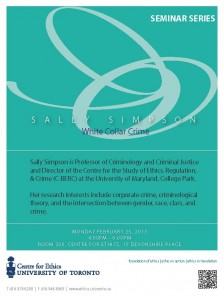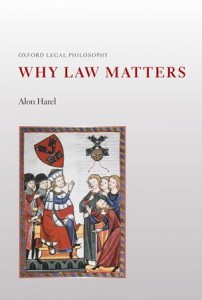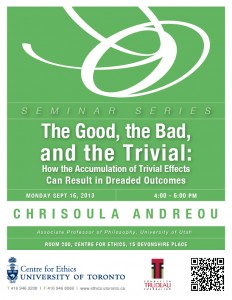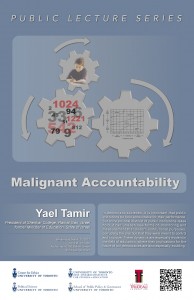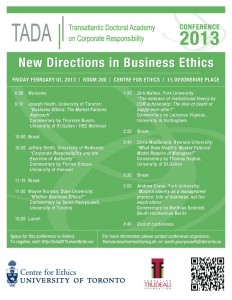- Mon, Dec 9, 2024
Theresa Lee, Toward a Livable World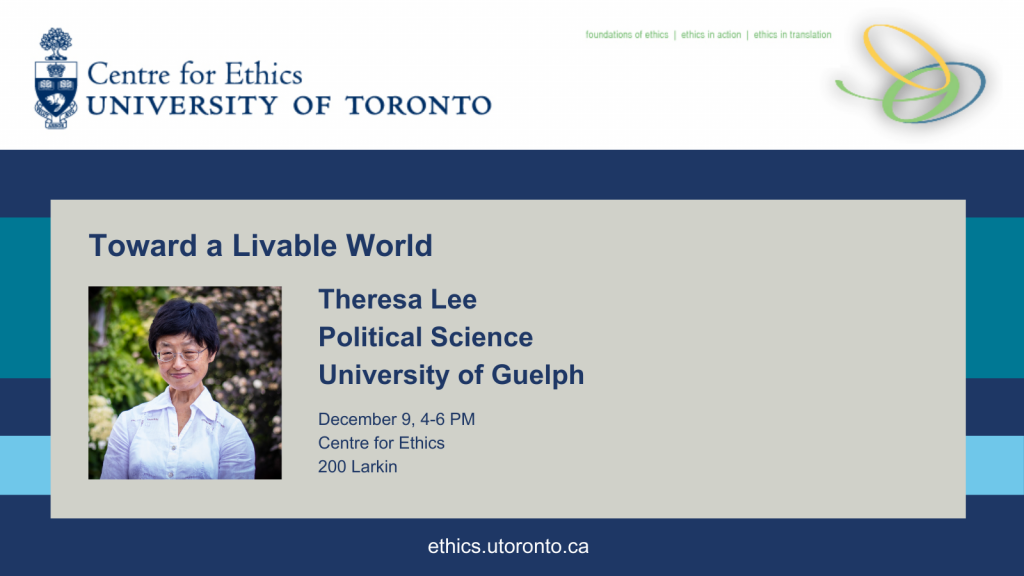
► To stay informed about other upcoming events at the Centre for Ethics, opportunities, and more, please sign up for our newsletter.
Toward a Livable World
As the concluding chapter of a book manuscript, the paper starts with the very fact that humans are living organisms with basic needs that are biologically predetermined, namely, air, water, food and shelter from the elements. Building on “livability,” a word coined by a 19th century English doctor, Edward Johnson, to depict “the aptitude or fitness to live,” the paper considers livability as a distinct normative space for us to understand who we are as creatures that are fundamentally disconnected with their physiology. In the history of Western political thought, there appears to be an assumption that the body is simply there. Yet that body cannot simply be taken for granted because it needs air, food, water, and shelter. In other words, the body is not a self-contained entity. The paper argues that taking care of the physical body is by definition a political question as it involves being in an environment where necessities can be secured. To address the problematic, the chapter turns to a key concept in Confucianism, which is self-cultivation. The self in this term is the moral character of a person. By looking at the etymology of the two Chinese characters that make up the term, the paper posits a normative framework that puts the body squarely as the starting point of being; without which neither the cultivated person nor the right-bearing individual can thrive.
► This event is in-person. Join in person at the Centre for Ethics (Larkin Building room 200).

Theresa Lee
Political Science
04:00 PM - 06:00 PM
University of Guelph
Centre for Ethics, University of Toronto
200 Larkin - Wed, Nov 27, 2024
Andrew Sepielli, Moral Polarism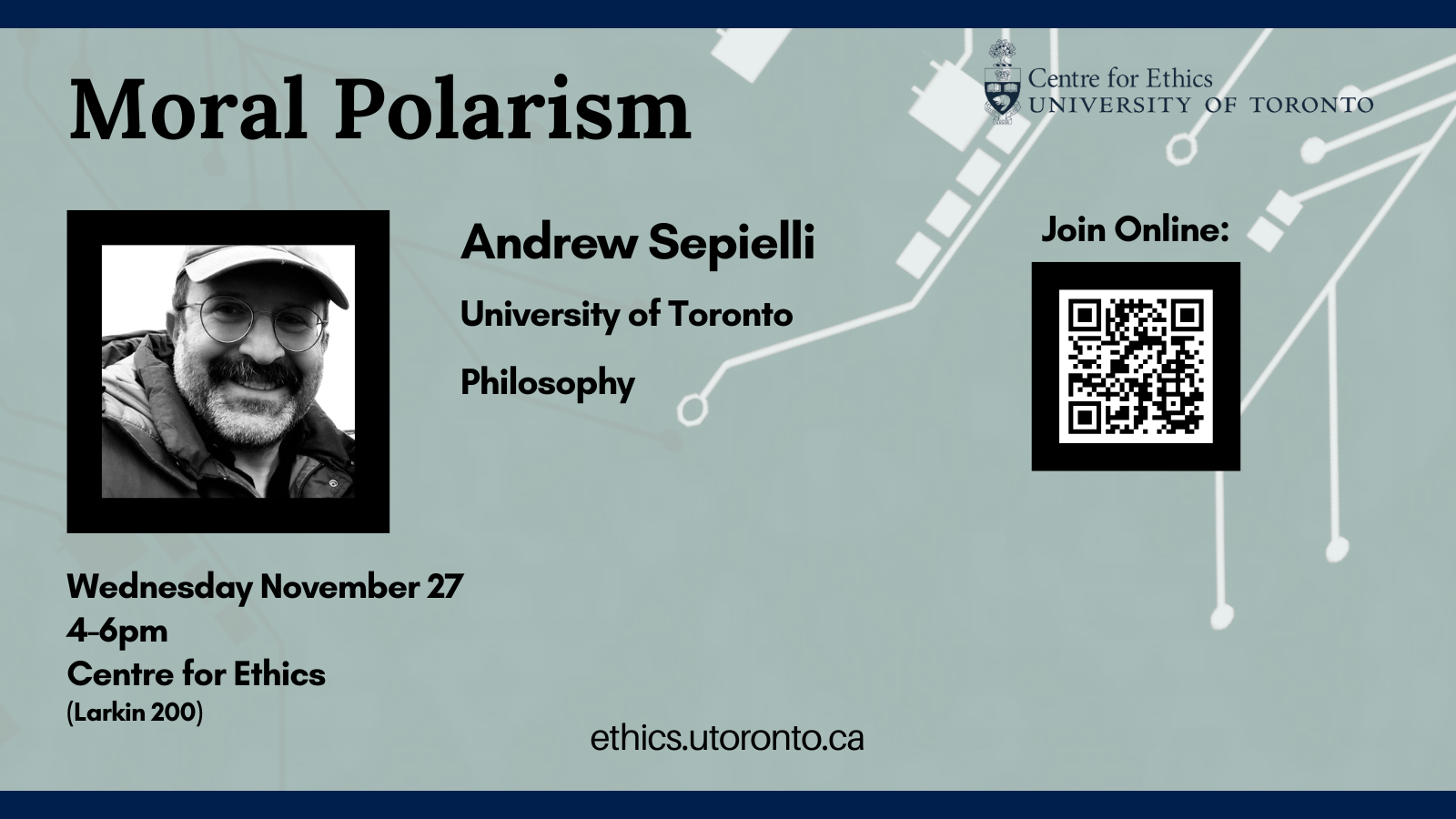
► To stay informed about other upcoming events at the Centre for Ethics, opportunities, and more, please sign up for our newsletter.
Moral Polarism
This paper articulates and defends a principle that I call “moral polarism”, according to which, roughly, only those considerations that bear on the quality of agency or on the goodness or badness of what befalls a moral patient are relevant to the evaluation of what the agent does vis a vis the patient. The agent(s) and the patient(s) are, then, the two “poles” to which the name refers. Put simply, if we imagine an action as a flight from agent to patient, only the takeoff and the landing matter; everything in between is, in a certain respect, morally irrelevant. Polarism is not much of a guide to action, nor is it directly and obviously opposed to any of the most well-known principles discussed by moral philosophers. But it’s my contention that once we get deep into debates concerning some of these principles, polarism “cuts” quite a bit of “ice”. Specifically, I will claim that it functions as a powerful theoretical tool within debates about the relevance of doing vs. allowing harm, about harming as a means vs. harming as a side effect, and about how to address past wrongdoing.”
► This event is hybrid. Join in person at the Centre for Ethics (Larkin Building room 200) or online here.

Andrew Sepielli
Philosophy
04:00 PM - 06:00 PM
University of Toronto
Centre for Ethics, University of Toronto
200 Larkin - Wed, Nov 20, 2024
Mynt Marsellus, The Fear and Fantasy of Expressiveness: Roland Barthes "The Death of the Author" and Ordinary Language Philosophy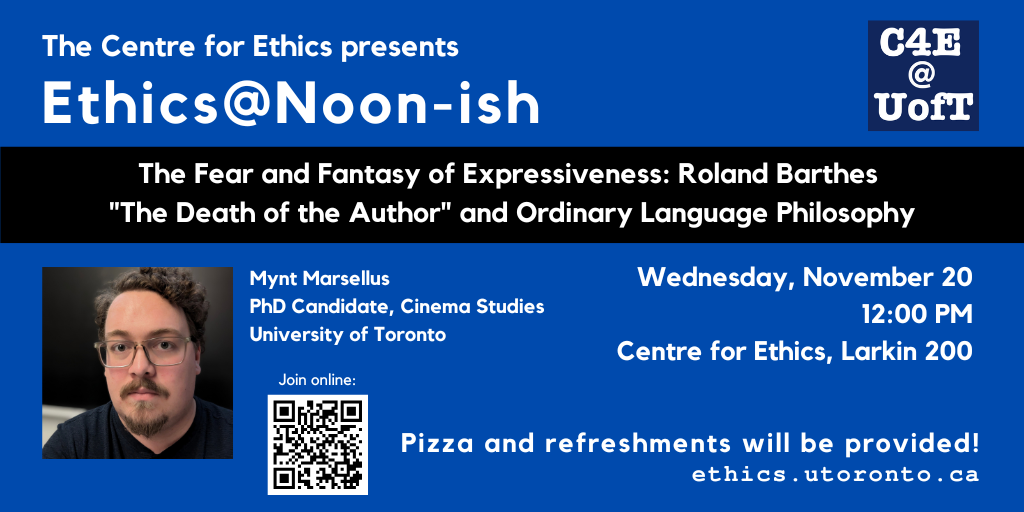 ► To stay informed about other upcoming events at the Centre for Ethics, opportunities, and more, please sign up for our newsletter.
► To stay informed about other upcoming events at the Centre for Ethics, opportunities, and more, please sign up for our newsletter.The Fear and Fantasy of Expressiveness: Roland Barthes “The Death of the Author” and Ordinary Language Philosophy
This paper argues against the conclusions of Roland Barthes’ 1967 article “The Death of the Author” while recovering his broader vision of language and sociality by uncovering an under-studied encounter between Barthes and the Ordinary Language Philosophy of J.L. Austin. Taking into account Barthes’ intellectual history and prior work on language and authorship, I argue that Barthes’ skepticism regarding authorship can be read as a kind of skepticism of other minds taken to an extreme conclusion. Following the Ordinary Language tradition through the work of Stanley Cavell, I argue against this conclusion and in favor of a renewed conception of authorship study founded on a concept of responsibility, rather than the traditional concept of intention.
► This event is hybrid. Join in person at the Centre for Ethics (Larkin Building room 200) or online here.

Mynt Marsellus
PhD Candidate
12:00 PM - 02:00 PM
Cinema Studies
University of Toronto
Centre for Ethics, University of Toronto
200 Larkin - Fri, Nov 8, 2024
David Owen, On Vindication in Politics: A Problem in Political Ethics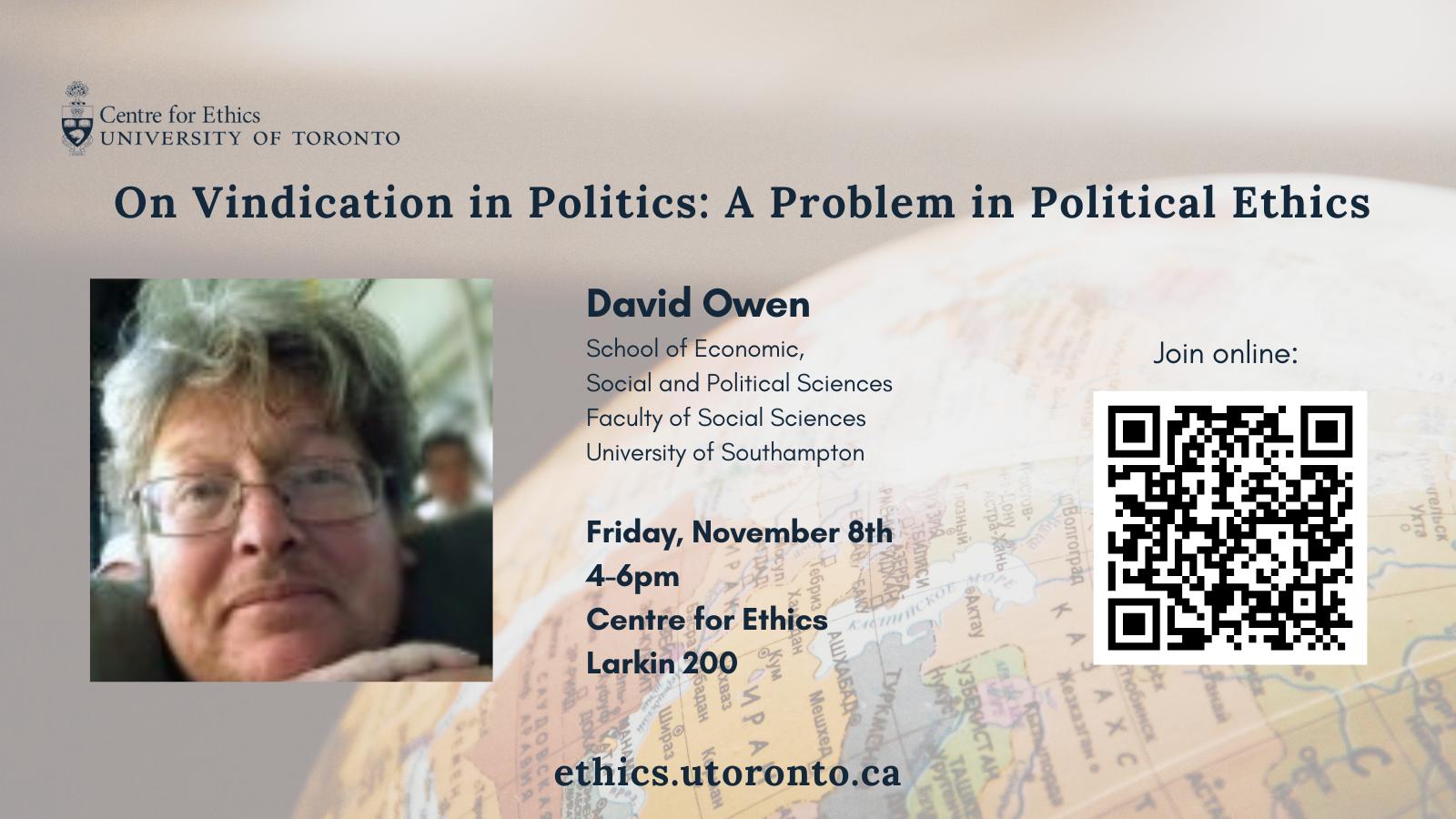 ► To stay informed about other upcoming events at the Centre for Ethics, opportunities, and more, please sign up for our newsletter.
► To stay informed about other upcoming events at the Centre for Ethics, opportunities, and more, please sign up for our newsletter.On Vindication in Politics: A Problem in Political Ethics
This paper takes up the largely neglected concept of vindication in relation to politics in order to demonstrate the ways in which vindication matters with respect to the exercise of political agency and to sustaining the practice of politics. More specifically, I try to show how reflection on the concept of vindication and its relationship with the concept of justification is important for identifying and addressing dimensions of political ethics that are central both to sustaining the valuing of politics as a way of conducting our lives together and to offering an understanding of the kind of ethical character that we should desire from politicians.
► This event is hybrid. Join in person at the Centre for Ethics (Larkin Building room 200) or online here.

David Owen
School of Economic, Social and Political Sciences
04:00 PM - 06:00 PM
Faculty of Social Sciences
University of Southampton
Centre for Ethics, University of Toronto
200 Larkin - Wed, Nov 6, 2024
Ethics at Noon
Kiran Banerjee, Institutionalizing Refugee Agency and Participation in the Governance of the Global Refugee Regime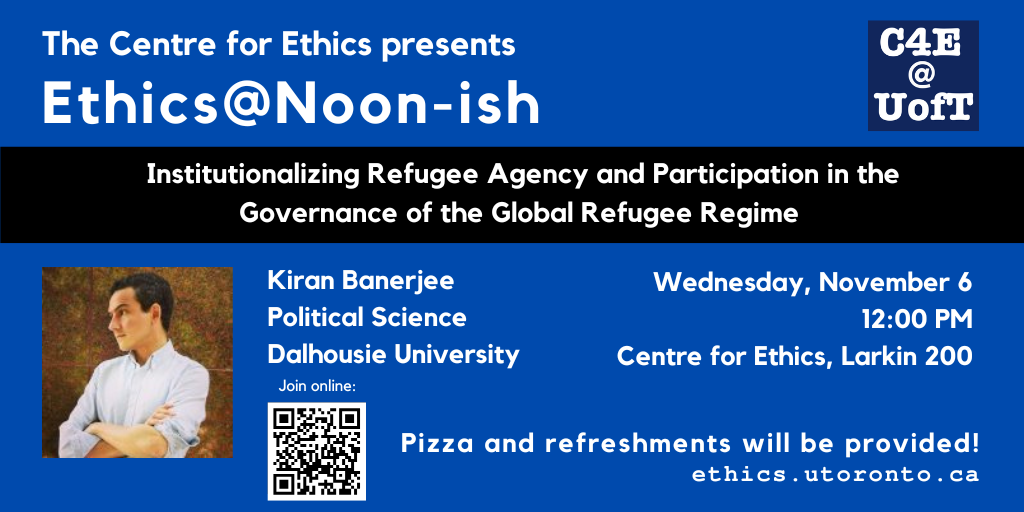 ► To stay informed about other upcoming events at the Centre for Ethics, opportunities, and more, please sign up for our newsletter.
► To stay informed about other upcoming events at the Centre for Ethics, opportunities, and more, please sign up for our newsletter.Institutionalizing Refugee Agency and Participation in the Governance of the Global Refugee Regime
This paper aims to advance a multi-scalar approach to reconceptualizing the place of forced migrants in the varying levels of governance that define the contemporary refugee regime. In doing so it responds to the emerging recognition of a growing imperative to rethink past articulations of international protection that have predominated for the last half-century. These earlier responses to displacement have largely treated refugees as objects of humanitarian intervention, giving little space for their voice or participation, thereby effacing the agency of displaced persons. Today’s current moment of reflection and political possibility therefore offers to address among the deepest normative failures of the contemporary refugee regime: if refugeehood is theorized in terms of the denial what Hannah Arendt called the “right to have rights” then the treatment of displaced persons within the international system constitutes more of a continuation, rather than remedy or reprieve, of this situation. Addressing the voice and agency of refugees is urgent and long overdue. However, formulating what meaningful representation and participation constitutes in these circumstances remains challenging. To address these considerations I proceed by taking up this issue from both normative and historical perspectives to map out and complicate the way representation and participation could be understood in this context. I do so by reconstructing several distinctive models of representation to underscore the different normative considerations underlying these approaches. I conclude by showing how this should be applied to the refugee regime in order to both reform and transform contemporary international protection.
► This event is hybrid. Join in person at the Centre for Ethics (Larkin Building room 200) or online here.

Kiran Banerjee
Political Science
12:00 PM - 02:00 PM
Dalhousie University
Centre for Ethics, University of Toronto
200 Larkin - Thu, Oct 31, 2024
Molly Gardner, Why the Numbers Don't Count, But the Reasons Do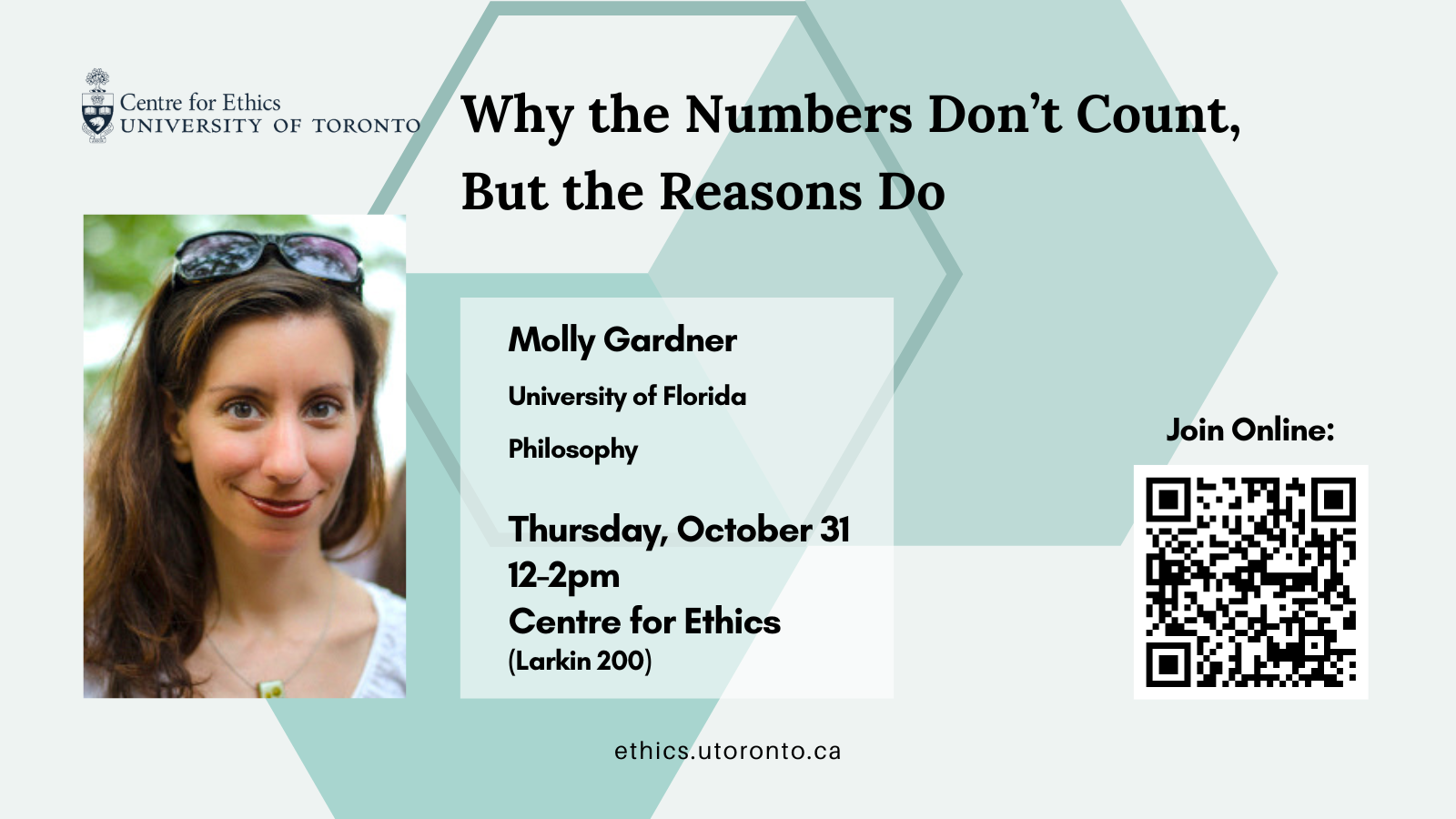 ► To stay informed about other upcoming events at the Centre for Ethics, opportunities, and more, please sign up for our newsletter.
► To stay informed about other upcoming events at the Centre for Ethics, opportunities, and more, please sign up for our newsletter.Why the Numbers Don’t Count, But the Reasons Do
The numbers problem arises in cases where we can save a large group of people or a small group of people, but we cannot save both groups. Famously, John Taurek (1977) has argued against the claim that we ought to save the larger number. Taurek’s judgment runs contrary to common sense, but he is right that there are difficulties with various attempts to justify the judgment that we ought to save the larger group. The consequentialist appeal to aggregation seems to stand in tension with the principle that we ought to respect the separateness of persons. Frances Kamm (2005) and Thomas Scanlon (1998) argue that we can justify saving the larger number without appealing to aggregation. Nevertheless, their approach does not explain the significance of numbers in trolley cases. In this paper, I offer a new solution to the numbers problem. I reject the claim that if the separateness of persons matters, then aggregation is impermissible. Instead, I argue that we can aggregate and respect the separateness of persons, as long as we aggregate reasons for acting, rather than gains or losses to individuals. This approach, which I call the “aggregating reasons view,” not only solves the numbers problem but also yields a surprising solution to the trolley problem.
► This event is hybrid. Join in person at the Centre for Ethics (Larkin Building room 200) or online here.
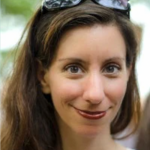
Molly Gardner
Philosophy
12:00 PM - 02:00 PM
University of Florida
Centre for Ethics, University of Toronto
200 Larkin - Wed, Oct 23, 2024
Ethics at Noon
Larisa Svirsky, I Treated Myself Like I Knew I Would: Proleptic Shame and Recovery from Addiction (Ethics@Noon-ish) ► To stay informed about other upcoming events at the Centre for Ethics, opportunities, and more, please sign up for our newsletter.
► To stay informed about other upcoming events at the Centre for Ethics, opportunities, and more, please sign up for our newsletter.I Treated Myself Like I Knew I Would: Proleptic Shame and Recovery from Addiction
This paper aims to identify “proleptic shame,” which is closely related to Bernard Williams’ concept of proleptic blame, and to argue that proleptic shame can be beneficial to recovery from addiction. Understanding proleptic shame is meant to illuminate the moral complexity of our relationships with ourselves – particularly our recognition of our own shortcomings and vulnerabilities, our attempts to predict our own future behavior, and our desires for change. Shame often plays a significant role in that complexity, for better and for worse. I will also contrast proleptic shame with other forms of shame that have received significant criticism in the moral psychology literature, and which may also be detrimental in the context of addiction and recovery.
► this event is hybrid. Join in person at the Centre for Ethics (Larkin building, room 200) or online here.

Larisa Svirsky
Postdoctoral Fellow
12:00 PM - 02:00 PM
University of Toronto
Centre for Ethics, University of Toronto
200 Larkin - Mon, Oct 21, 2024
Alon Harel, Navigating the Tension Between Constitutionalism and Democratic Majoritarianism: The Role of Institution-Dependent Goods in Liberal Democracies ► To stay informed about other upcoming events at the Centre for Ethics, opportunities, and more, please sign up for our newsletter.
► To stay informed about other upcoming events at the Centre for Ethics, opportunities, and more, please sign up for our newsletter.Navigating the Tension Between Constitutionalism and Democratic Majoritarianism: The Role of Institution-Dependent Goods in Liberal Democracies
The conflict between advocates of constitutionalism and advocates of democratic majoritarianism has been at the center of attention not only among scholars of constitutional law but also among judges, politicians, social movements, and citizens. Under one prevalent view, judges intrude unjustifiably on democratic politics by making decisions which should be subject to formal and informal democratic processes of decision-making.
We maintain that this conflict can be conceptualized as a surface manifestation of the broader idea that all liberal democracies are subject to a normative tradeoff between two types of demands: Reason- and will-based demands. More specifically we argue that that both constitutional provisions—norms that are not sensitive to our will—and statutory provisions—namely, norms that are contingent on our will or judgment—are necessary features of liberal democracy. We make the case for institution-dependent goods, arguing that some goods depend for their existence on being produced by the appropriate law-making institution. We establish that the constitutional form of law-making is necessary to convey our shared recognition that certain norms, such as fundamental rights, are binding independently of our will. Accordingly, part of the value of these norms rests on a shared commitment to see them as not being subject to our control. By contrast, the statutory form is necessary to publicly convey the recognition that certain norms provide goods whose value depends on our willingness to produce them. These norms lose their distinctive value when making them fails to be grounded in our will. On the proposed account, constitutional and statutory norms are not mere means to create good or just norms whose value is determined independently of the way these norms are being created or independently of the institution in charge of creating them. Instead, the value of such norms hinges on the institution that brings them into being as well as the deliberation that characterizes this institution. Institutions are not merely vessels through which norms get public recognition. When different institutions enact identically-worded norms, say, ‘everyone is equally entitled to X,’ they may nevertheless produce different norms and provide different goods. To sum up, some of the goods that legal norms provide are institution-dependent goods, namely, goods whose provision depends on the institutional processes which brought about these norms.
► This event is hybrid. Join in person at the Centre for Ethics (Larkin Building room 200) or online here.

Alon Harel
Faculty of Law
04:00 PM - 06:00 PM
The Hebrew University of Jerusalem
Centre for Ethics, University of Toronto
200 Larkin - Wed, Oct 9, 2024
Ethics at Noon
Martina Favaretto, Kant on Emotions and Moral Worth (Ethics@Noon-ish)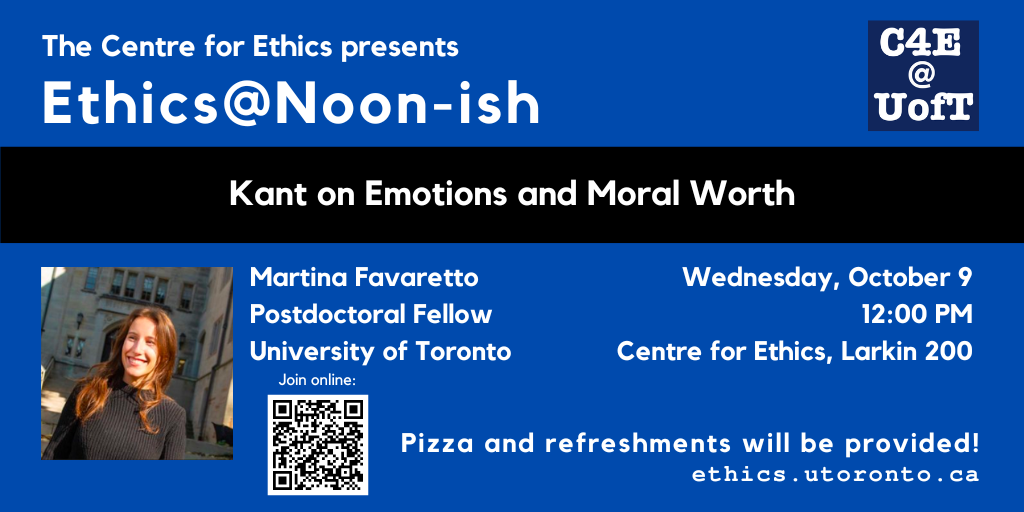 ► To stay informed about other upcoming events at the Centre for Ethics, opportunities, and more, please sign up for our newsletter.
► To stay informed about other upcoming events at the Centre for Ethics, opportunities, and more, please sign up for our newsletter.Kant on Emotions and Moral Worth
Traditionally, Kant is taken to hold the view that acting from inclination is insufficient for moral worth. In recent years, some scholars have challenged this view by shedding light on how Kant’s account of emotions provides us with reasons for thinking that Kant took emotions to be properly responsive to value and importantly connected to judgments of value. Because of this, these scholars argue that we should amend Kant’s theory and adopt the view that acting from inclination can be sufficient, albeit not necessary, for moral worth. I disagree with these scholars. I defend Kant’s claim that only acting from duty has true moral worth by focusing on the question pertaining to which kind of value emotions are responsive, and I argue that, even though emotions are value tracking, they do not track moral value.
► this event is hybrid. Join in person at the Centre for Ethics (Larkin building, room 200) or online here.

Martina Favaretto
Postdoctoral Fellow
12:00 PM - 02:00 PM
University of Toronto
Centre for Ethics, University of Toronto
200 Larkin - Mon, Oct 7, 2024
Jacob Levy, To Promote an Injustice Which Was no Part of Their Intention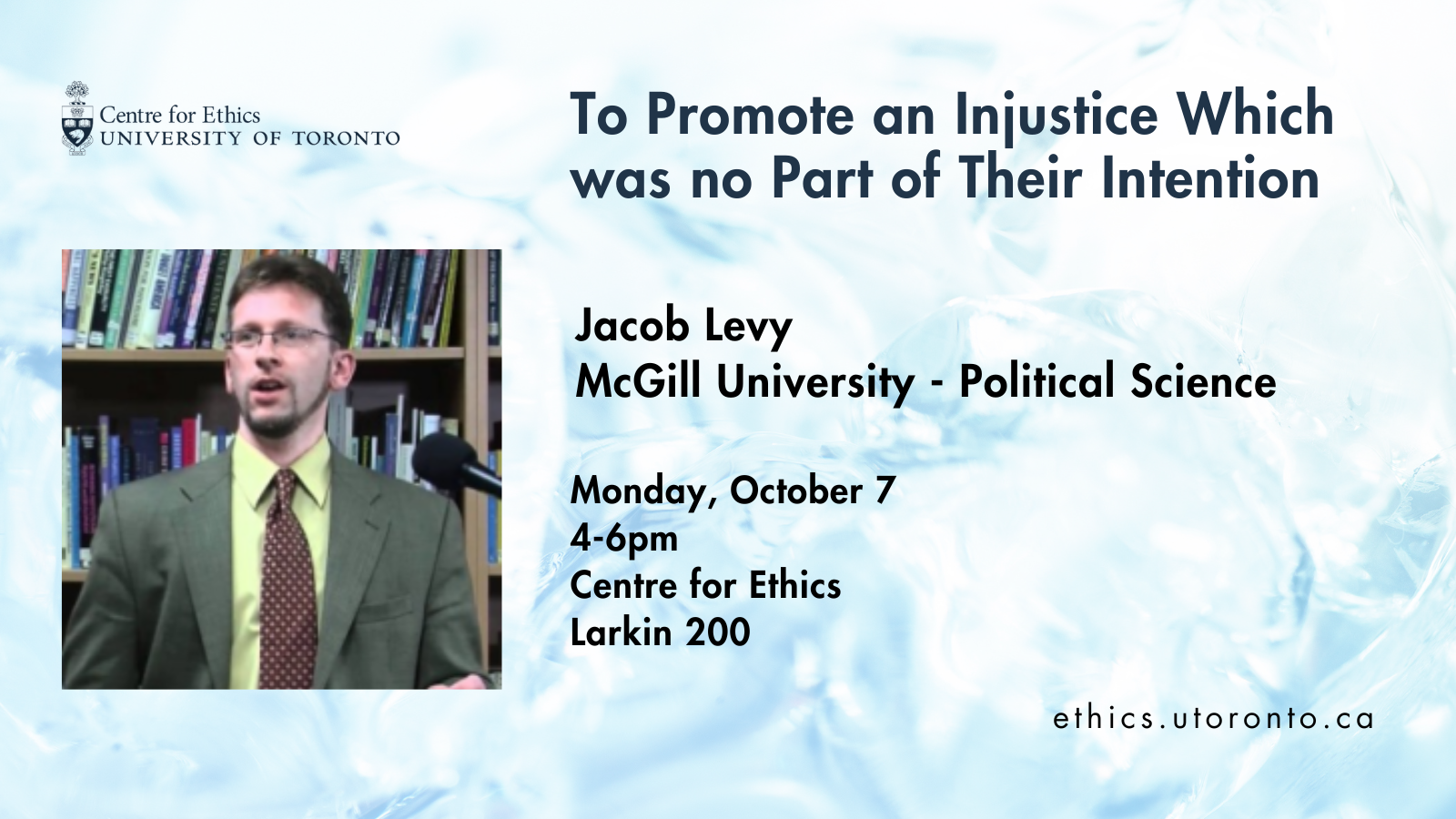 ► To stay informed about other upcoming events at the Centre for Ethics, opportunities, and more, please sign up for our newsletter.
► To stay informed about other upcoming events at the Centre for Ethics, opportunities, and more, please sign up for our newsletter.To Promote an Injustice Which Was no Part of Their Intention
Prominent strands of the literature on structural injustice in the past two decades, largely building on work by Iris Marion Young, emphasize the potentially unplanned character this kind of injustice, its development out of complex social processes and the possibly innocent actions of many decentralized actors. (The blamelessness of the individual actors has been the subject of lively debate, which is set aside for purposes of this discussion.) It is striking how much the structural injustice literature therefore sometimes sounds like an analysis of what other literatures would describe as invisible hand phenomena and emergent or spontaneous orders. There has, however, been little direct engagement from either direction: neither theorists of structural injustice drawing on what has already been learned about emergent phenomena, nor analysts of invisible hands and spontaneous orders grappling with the challenging implication of Young’s work that injustice might itself be an emergent phenomenon, irreducible to violations of the rules of just conduct. Intellectual gains from trade have perhaps not been realized because of the different ideological orientations at work: those thinking about structural injustice from a market-critical perspective might be predisposed to doubt the construct of the “invisible hand” of the market altogether, while those beginning from a market-sympathetic position might hear “structural injustice” as nothing but the kind of “social justice” claim Hayek dismissed decades ago.
I aim to begin to bridge that gap, and to suggest the gains from trade that might be possible. Adam Smith taught that we are, in many cases, led to promote an end which is no part of our intention. That end may be an unjust one, and indeed Smith’s corpus includes arguments to that effect. Explanations of emergent phenomena and diagnoses of unjust structures have the potential to be complementary, to the benefit of both.
I argue that structural injustice as understood by Young and her followers is market-like, but is not merely market injustice; it is not simply a reversal of the normative signs on a traditional invisible hand account of exchange relations. I suggest, first, that some standard and unavoidable features of market processes, including even comparative advantage itself, are part of the social processes through which unjust social structures can emerge; second, that this is not equivalent to or reliant on any general claim about the supposed injustice of markets as such; and third, that many of the processes through which injustice might emerge are not market processes, even if they have an invisible-hand shape. The interaction of many persons’ individual actions may generate emergent social norms, or political and legal outcomes, not only economic ones, and all of these may raise questions of injustice.
► This event is in-person. Join at the Centre for Ethics (Larkin Building room 200).
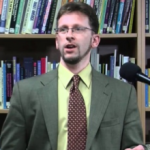
Jacob Levy
Political Science
04:00 PM - 06:00 PM
McGill University
Centre for Ethics, University of Toronto
200 Larkin - Fri, Oct 4, 2024
Race, Ethics + Power
Melvin Rogers, On James Baldwin: History, Responsibility, and Atonement (REP)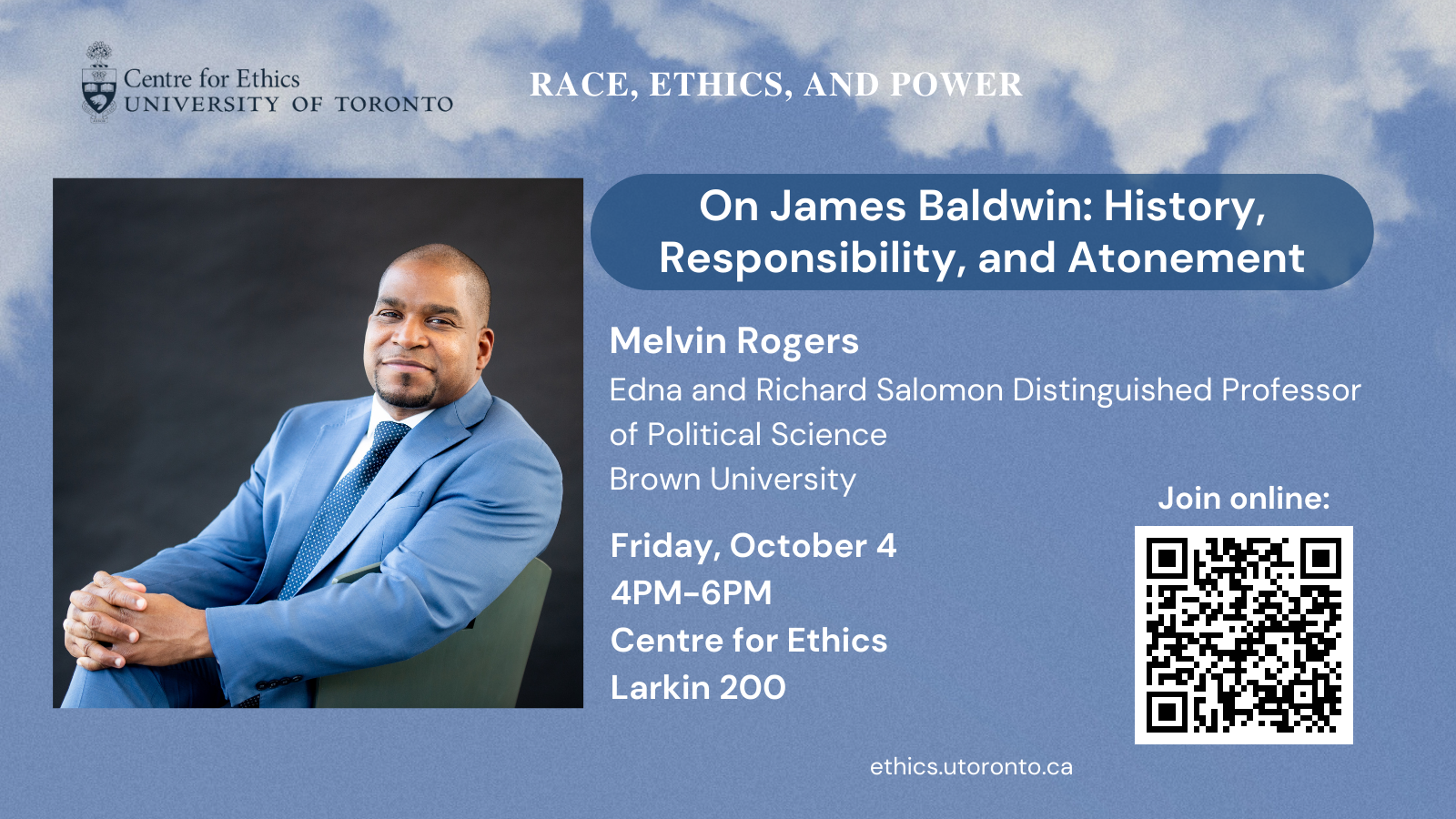
► To stay informed about other upcoming events at the Centre for Ethics, opportunities, and more, please sign up for our newsletter.
On James Baldwin: History, Responsibility, and Atonement
Melvin Rogers is the Edna and Richard Salomon Distinguish Professor scholar and stands as a distinguished academic renowned for his insightful contributions to the discourse on race and democracy within the realms of American culture and politics. His writings, including The Darkened Light of Faith: Race, Democracy, and Freedom in African American Political Thought, African American Political Thought: A Collected History, The Undiscovered Dewey: Religion, Morality and the Ethos of Democracy, carefully examine the philosophical and cultural resources of America’s past to grapple with the problems of race, the dangers to democratic life, and the crisis of character. In doing so, he stands in the grand tradition of philosophical reflection and cultural criticism that we find in Frederick Douglass, John Dewey, W. E. B. Du Bois, and James Baldwin.
► this event is hybrid. Join in person at the Centre for Ethics (Larkin building, room 200) or online here.

Melvin Rogers
Centre for Ethics, University of Toronto
200 Larkin - Mon, Sep 30, 2024
Michael Randall Barnes, Responsibility for Recommendations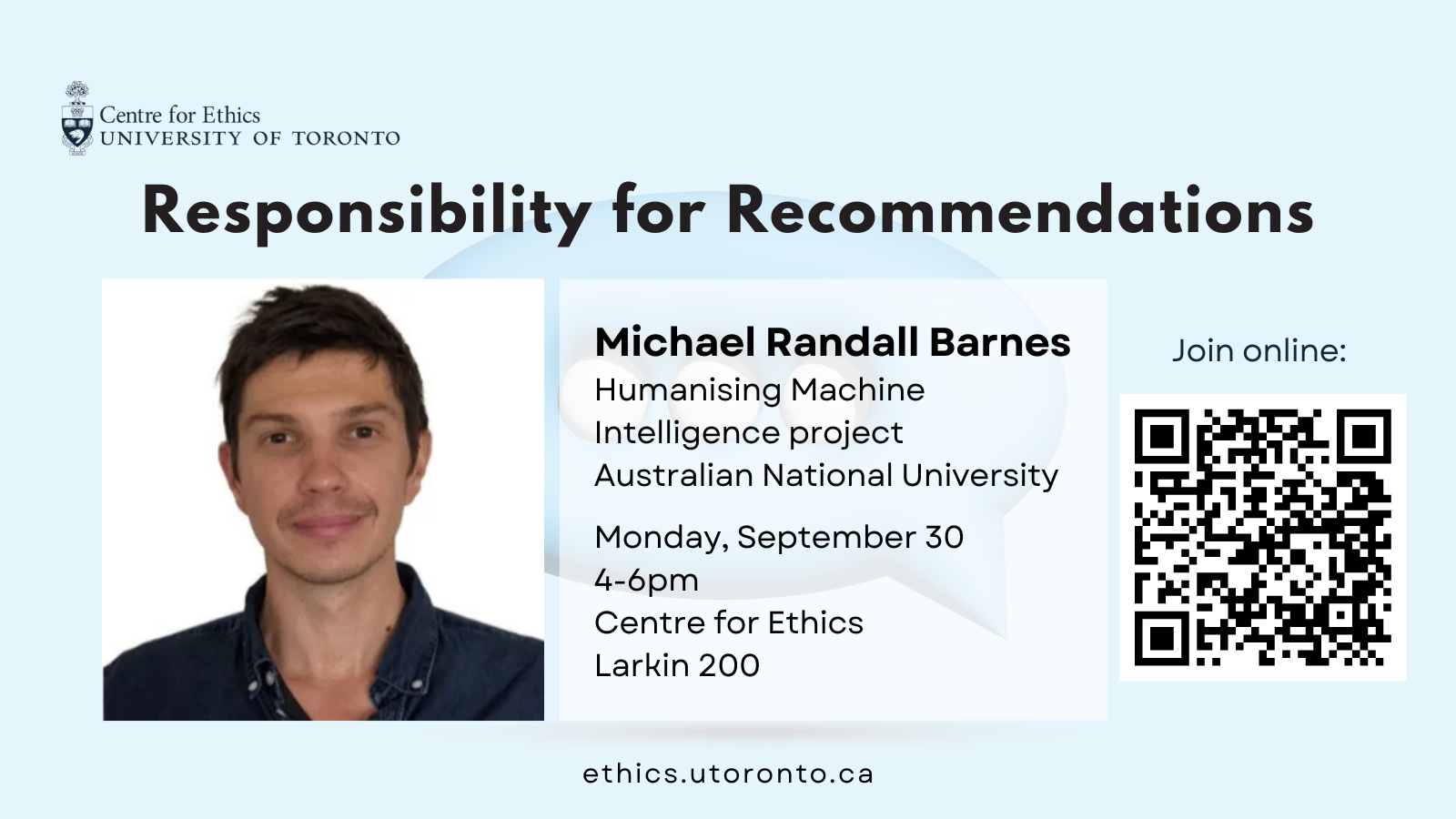 ► To stay informed about other upcoming events at the Centre for Ethics, opportunities, and more, please sign up for our newsletter.
► To stay informed about other upcoming events at the Centre for Ethics, opportunities, and more, please sign up for our newsletter.Responsibility for Recommendations
Recommender systems are now a dominant part of most social media platforms. They play important roles for the billions of people worldwide who access these sites/apps each day. The typical user experience on these platforms consists of an endless stream of recommended posts to read, images to admire, videos to watch, users to follow, groups to join, and more. However, these systems have also been accused of contributing to horrific violence, including the ongoing crisis in Myanmar. This talk argues social media companies share responsibility for the harms that occur on their platforms by demonstrating how they are constitutive intermediaries, not the not mere intermediaries they (sometimes) claim to be. I use speech act theory and the concept of affordances to illuminate the contribution that platform companies make to our communicative acts, showing how platforms shape users’ speech, and also perform important speech acts themselves, with particular focus on recommendations.
► This event is hybrid. Join in person at the Centre for Ethics (Larkin Building room 200) or online here.

Michael Randall Barnes
Humanising Machine Intelligence project
04:00 PM - 06:00 PM
Australian National University
Centre for Ethics, University of Toronto
200 Larkin - Fri, Sep 27, 2024
Conferences
Relational Ethics Conference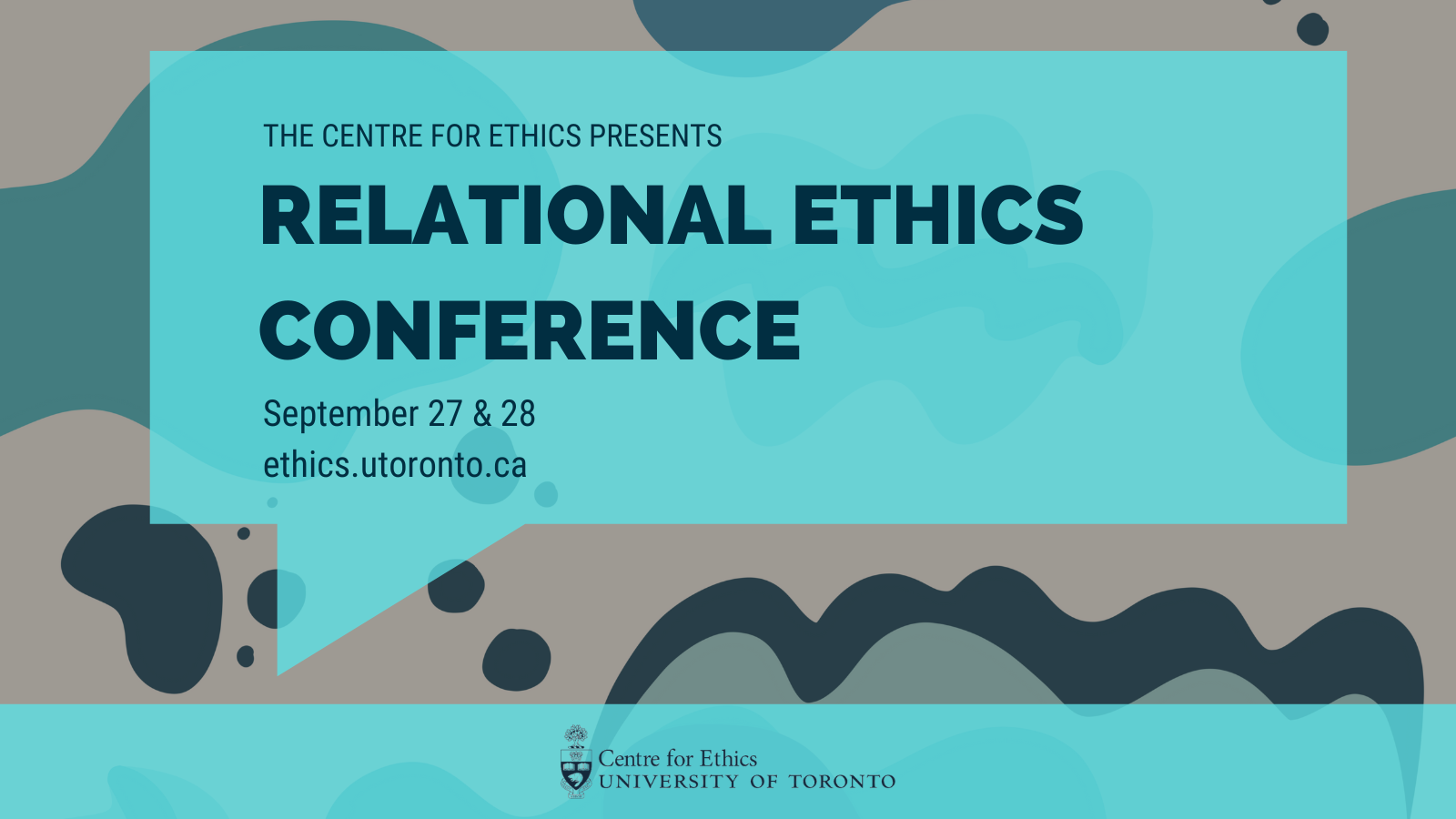
► To stay informed about other upcoming events at the Centre for Ethics, opportunities, and more, please sign up for our newsletter.
Relational Ethics Conference
Friday, September 27th
9:00-9:10 Welcome
9:10-10:20 Jay Wallace (UC Berkeley) – The Relational Right and the Good
10:30-11:40 Stephen Darwall (Yale) – Why Obligations Can’t be Relational All the Way Down (Remote Presentation)
11:50-1:00 Brendan de Kenessey (Toronto) – Not all moral obligations are obligations to individuals, and not all obligations to individuals are moral obligations2:00-3:10 Gopal Sreenivasan (Duke) – Nettles in the nexus: On Wallace on relational morality
3:20-4:30 Jonas Vandieken (Munich) – Moral Deliberation in the Moral Nexus
4:50-6:00 Janis Schaab (Utrecht) – Second-Personal Kantian ConstructivismSaturday, September 28th
9:10-10:20 Rahul Kumar (Queens) – What is Relational About Contractualism?
10:30-11:40 Ariel Zylberman (SUNY Albany) – The Metaphysics of Practical Relations
11:50-1:00 Simon Cabulea May (Florida) – Standing and Direction2:00-3:10 Margaret Gilbert (UC Irvine) – Can / wrong someone in the state of nature? (Remote Presentation)
3:20-4:30 Rowan Cruft (Stirling) – Directed Duties or Directed Reasons? (Remote Presentation)
4:50-6:00 Anni Raty (Vienna) – Wrongs without Rights► This event is hybrid. Join in person at the Centre for Ethics (Larkin building, room 200). Remote Presentations will be via Zoom.
►Join Zoom Meeting:
https://queensu.zoom.us/j/95937127666?pwd=fin6bYFl7wEDWyOZqyD09OeguF4Yi6.1Meeting ID: 959 3712 7666
Passcode: 830472Register here.
09:00 AM - 07:00 PM
Centre for Ethics, University of Toronto
200 Larkin - Wed, Sep 25, 2024
Ethics at Noon
David Benatar, The Problem of Wild Animal Suffering (Ethics@Noon-ish)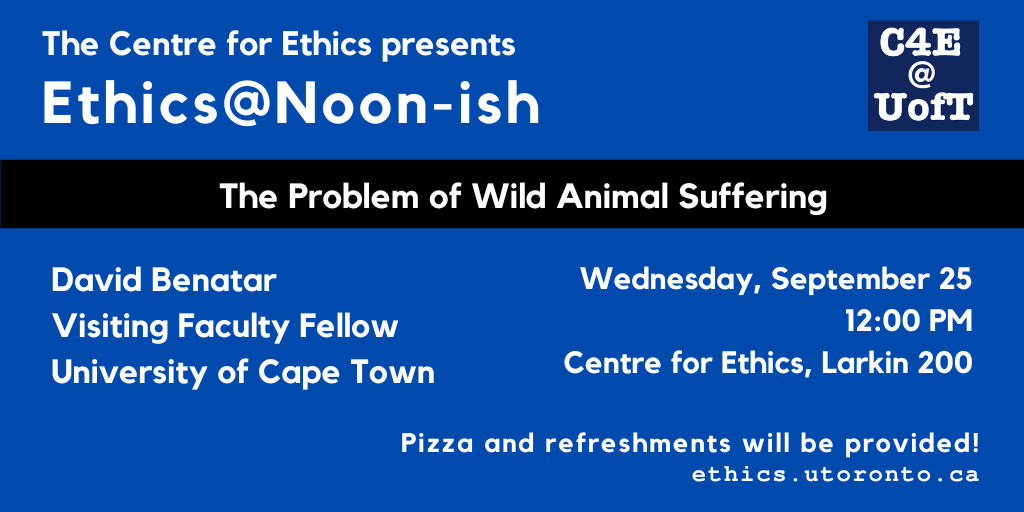 ► To stay informed about other upcoming events at the Centre for Ethics, opportunities, and more, please sign up for our newsletter.
► To stay informed about other upcoming events at the Centre for Ethics, opportunities, and more, please sign up for our newsletter.The Problem of Wild Animal Suffering
Wild animal suffering has been taken to present a problem for those who think that animals have rights. Those who deny that animals have rights advance the following kind of argument:
- If animals have rights, then we have a duty to save wild animals from predators and other evils.
- We have no duty to save wild animals from predators and other evils.
- Therefore, animals do not have rights.
In this presentation, I shall argue that those who claim that animals have rights can make a strong case for rejecting this argument without being led to extravagant conclusions.
► This event is in person. Join in person at the Centre for Ethics (Larkin Building room 200).

David Benatar
Emeritus Professor
12:00 PM - 02:00 PM
Philosophy
University of Cape Town
Centre for Ethics, University of Toronto
200 Larkin - Fri, Sep 20, 2024
Robin Dembroff & Issa Kohler-Hausmann, But-for What? When Anti-Discrimination Law Tried to Borrow from Tort Law and Missed Something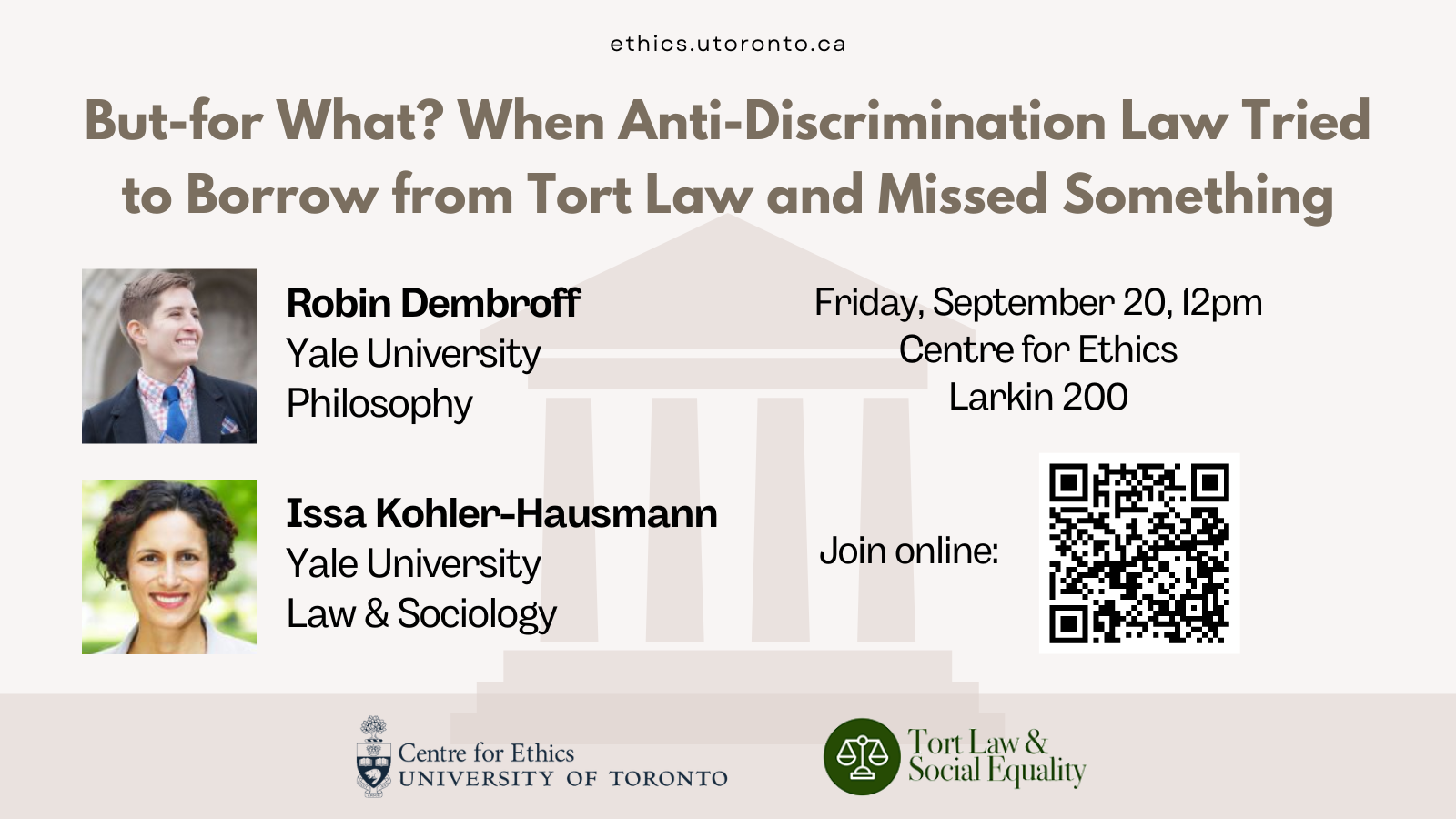 ► To stay informed about other upcoming events at the Centre for Ethics, opportunities, and more, please sign up for our newsletter.
► To stay informed about other upcoming events at the Centre for Ethics, opportunities, and more, please sign up for our newsletter.But-for What? When Anti-Discrimination Law Tried to Borrow from Tort Law and Missed Something
Courts and commentators often define discrimination in causal terms. Moreover, they often claim that the causal definition of discrimination is tracks role that causality plays establishing liability in tort law. But such articulations often trade between two different articulations of the causal showing required for a discrimination claim. In one articulation the claimant must show that the outcome would not have happened but for the discriminatory act or policy; in the other articulation the claimant must show that the outcome would not have happened but for their “protected status”—e.g., race, sex, religion. In this talk, we explain that the only the first showing is consistent with the role causation plays in tort law where the inquiry into causation is structured by a prior independent theory of duty which limits the range of counterfactuals relevant to the case. However, the Supreme Court and many legal scholars have insisted that the second articulation is the relevant causal showing in antidiscrimination and equal protection law: “but-for” the claimant’s racial, sex, religious, etc. status. We show that this so-called but-for test cannot define what counts as discrimination because it is inherently indeterminate. One cannot set up the counterfactual thought experiment without more specificity about the relevant counterfactual contrasts, and one cannot choose which counterfactual contrasts are relevant without a prior normative theory of how the defendant ought to have behaved vis-a-viz the claimant’s (e.g.) sex or racial status. This last part requires a theory of what people are owed in various domains (e.g., employment, contracts, etc.) given the social meanings and relations that constitute sex or race in our society.
► this event is hybrid. Join in person at the Centre for Ethics (Larkin building, room 200) or online here.

Robin Dembroff
Assistant Professor
Philosophy
Yale University
Issa Kohler-Hausmann
Associate Professor
12:00 PM - 02:00 PM
Law & Sociology
Yale University
Centre for Ethics, University of Toronto
200 Larkin - Fri, Sep 20, 2024
Radical and Critical Approaches to Mental Health II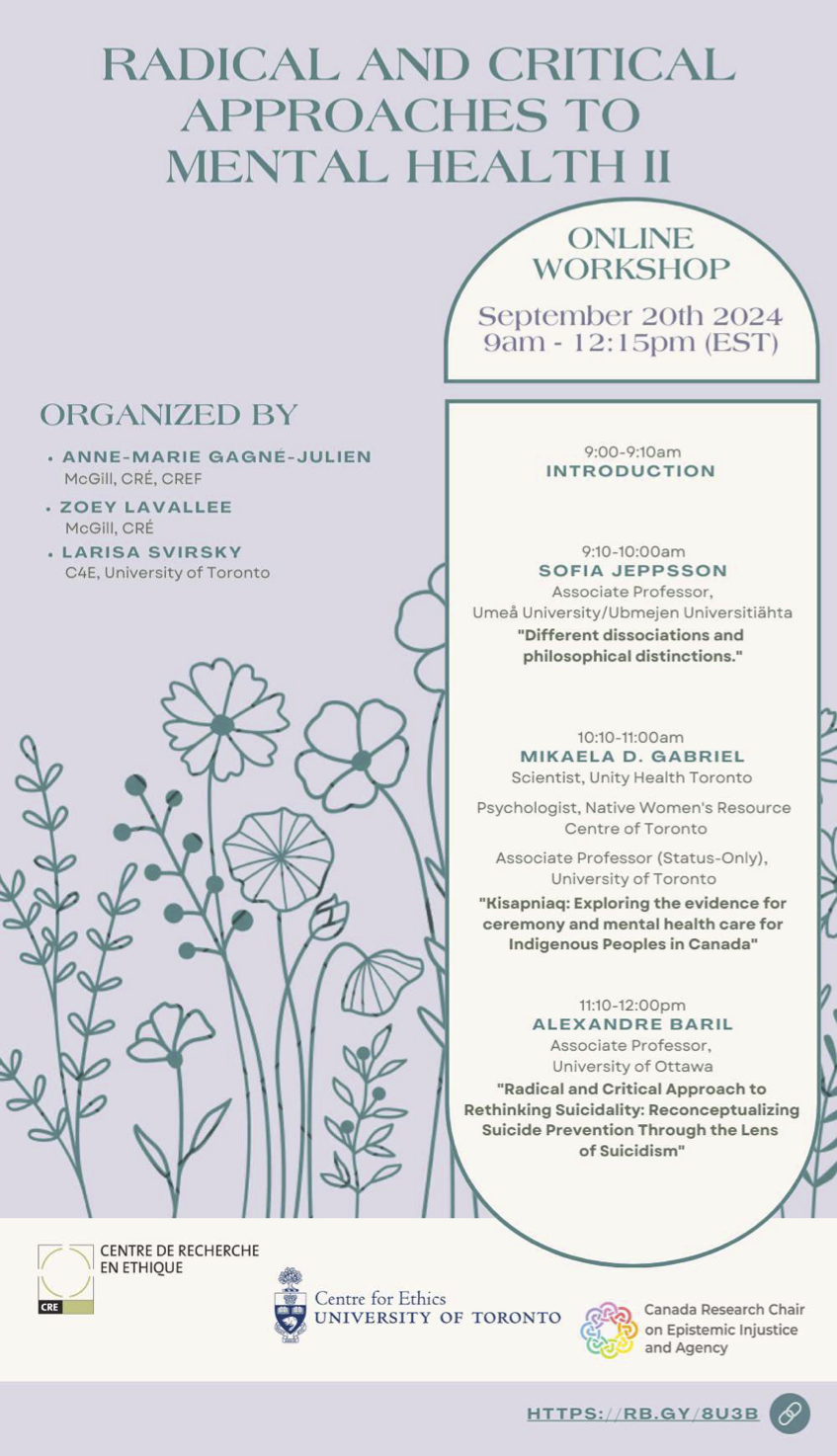
► To stay informed about other upcoming events at the Centre for Ethics, opportunities, and more, please sign up for our newsletter.
Radical and Critical Approaches to Mental Health II
► this workshop is online. Register here.
09:00 AM - 12:15 PMSpeakers & Abstracts
- Sofia Jeppsson: Different dissociations and philosophical distinctions
When philosophers go mad, we tend to use our philosophical tools to analyze our madness. These philosophical analyses may compete with or merely complement psychiatric ones. In any case, philosophy often carves up psychopathological phenomena along different lines than psychiatry does. I have already discussed and published on experiencing reality falling apart and different realities. There’s an interesting philosophical distinction, with some clinical implications, between doubting regular facts and doubting the very bedrock on which regular beliefs depend. In this talk, I will discuss two other, and related, philosophical distinctions; retaining or losing your self, and retaining or losing a sense of (direct) agency. When diagnosing someone with derealization/depersonalization, psychiatry places great weight on “reality-testing” being intact, the person isn’t full-out psychotic or delusional. However, the DSM criteria run together a bunch of phenomena that are quite different from a philosophical standpoint. Derealization might occur even if you experience your self as intact. Moreover, you may experience your mental self as intact while feeling estranged from your body. Finally, you may be estranged from certain parts of your mental life while retaining a strong core self. There are also corresponding agency problems. For the person who tries to handle themself, to plan and act and navigate the world while suffering strange experiences, these differences may be as important as the difference between having or losing one’s “reality-testing” capacity.
- Mikaela D. Gabriel: Kisapniaq: Exploring the evidence for ceremony and mental health care for Indigenous Peoples in Canada
Kisapniaq is the Mi’kmaq word for dawn, indicating an advancing and growing insight into the presence and importance of ceremony in mental healthcare interventions for Indigenous Peoples. This talk will inform, address, discuss, and promote the importance of ceremony within, and for, mental health care delivery and perspectives for Indigenous Peoples in Canada. This talk will have key highlights and insights from my own research that identifies the many ways ceremonies assist in emotional arousal and regulation; promotes mental clarity; impacts and supports positive identity and belonging; assists in trauma healing and post-traumatic growth and meaning-making; and how these approaches help Indigenous and non-Indigenous practitioners alike. I will add clinical reflections and perspectives, and a review of substantiating literature to support evidence and claims.
- Alexandre Baril: Radical and Critical Approach to Rethinking Suicidality: Reconceptualizing Suicide Prevention Through the Lens of Suicidism
I argue that suicidal people are oppressed by structural suicidism. Suicidism and its preventionist script, founded on what I call “compulsory aliveness” aiming to save lives at all costs, reproduce violence and cause additional harm and death through forms of silencing, incarceration, discrimination, stigmatization and pathologization. This is particularly true for marginalized groups, such as Indigenous, racialized, queer, trans, disabled and neurodivergent people, for whom suicide prevention increases the structural violence they experience. I also argue that suicidism aims to impose a will to live that makes suicidal people’s desire for death abnormal, irrational and unintelligible from a sanist perspective, except for those cast, based on ableist, ageist and capitalist norms, as “unsalvageable” subjects, such as disabled/sick/ill/old people. In their case, the desire for death is considered normal and rebranded as medical assistance in dying. Through an argument according to which supporting assisted suicide for all suicidal people can better prevent unnecessary deaths, I propose to rethink our conceptualizations of both suicide and assisted suicide. Drawing on trans-affirmative approaches, I propose a suicide-affirmative approach that allows for genuine accompaniment of suicidal individuals. By offering a queercrip model of (assisted) suicide, I invite us to imagine what could happen if we started thinking about (assisted) suicide from an antisuicidist and intersectional framework.
The workshop, organized by Larisa Svirsky, Anne-Marie Gagné-Julien, and Zoey Lavallee, is co-sponsored by the Centre de Recherche en Éthique, Montréal (CRÉ), the Centre for Ethics, University of Toronto (C4E), and the Canada Research Chair on Epistemic Injustice and Agency (CRC-IAE).
Centre for Ethics, University of Toronto
200 Larkin - Wed, Sep 18, 2024
Ethics at Noon
Alice Pinheiro Walla, Is there a Right to Travel? Kantian Hospitality as a Communication Right (Ethics@Noon-ish)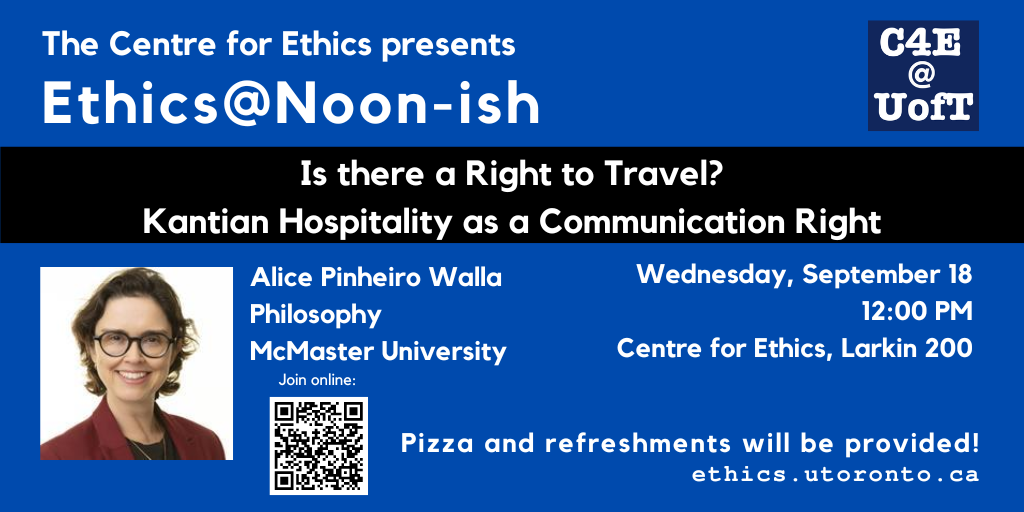 ► To stay informed about other upcoming events at the Centre for Ethics, opportunities, and more, please sign up for our newsletter.
► To stay informed about other upcoming events at the Centre for Ethics, opportunities, and more, please sign up for our newsletter.Is there a Right to Travel? Kantian Hospitality as a Communication Right
In this paper, I will examine the normative foundations of a right to travel. I will focus on Kant’s legal conception of cosmopolitanism, as opposed to his moral conception of the same concept. I will defend the right to travel primarily as a communicative right, involving both the freedom to trade but also to academic and intellectual exchange. In this respect, the right to travel is essential for the academic enterprise, as well as for other enterprises which require international communication and coordination, such as in research and cooperation in global health. While the right to travel is not absolute from a Kantian perspective, an account of its normative foundations is helpful for understanding what amounts to legitimate constraints and limitations on global mobility. Further, I will also argue that the right to travel should not be conflated with the right to immigrate, although the two are causally connected. It follows that the right of states to control immigration, does not amount to the right to control global mobility simpliciter.
► this event is hybrid. Join in person at the Centre for Ethics (Larkin building, room 200) or online here.

Alice Pinheiro Walla
Associate Professor
12:00 PM - 02:00 PM
Philosophy
McMaster University
Centre for Ethics, University of Toronto
200 Larkin - Tue, Sep 10, 2024
Technophilosophy September Soiree, Can we ensure AI is safe?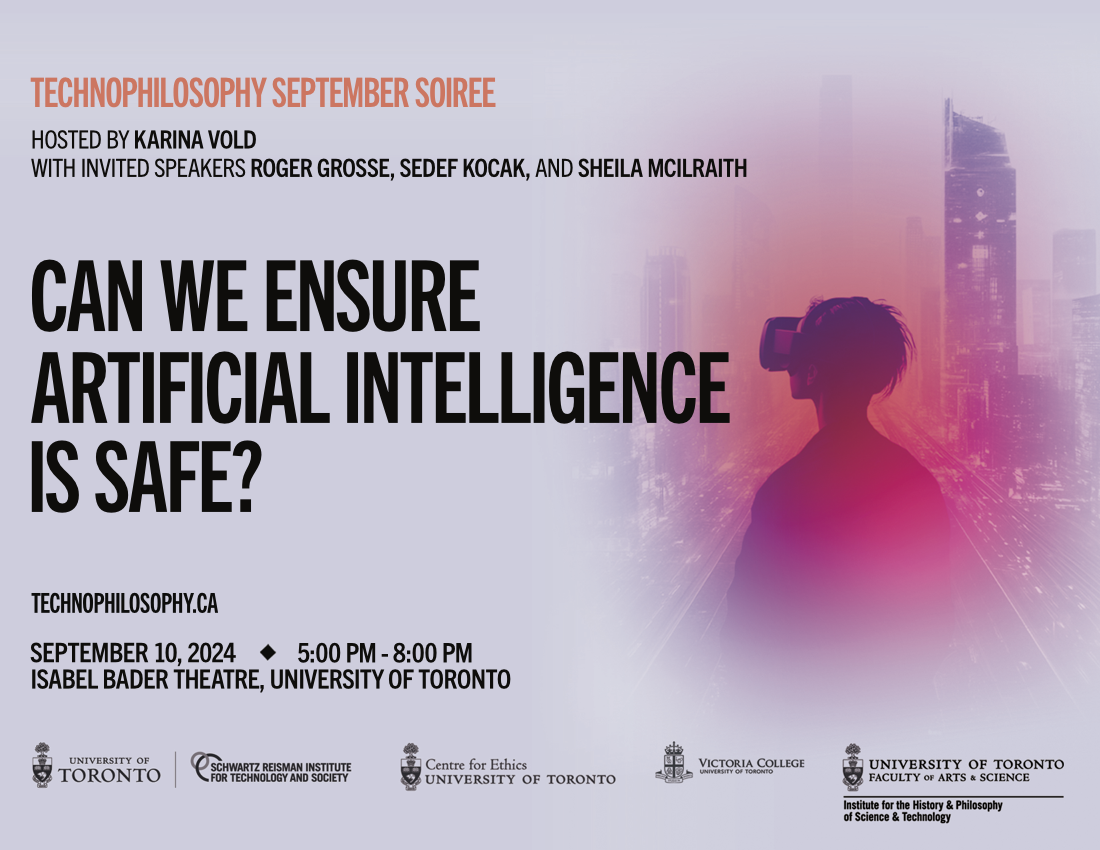
► To stay informed about other upcoming events at the Centre for Ethics, opportunities, and more, please sign up for our newsletter.
Can we ensure AI is safe?
► this event is in-person. Register here.
05:00 PM - 08:00 PM
Isabel Bader Theatre
93 Charles St W - Wed, May 1, 2024
Randall Curren, From Sustainable Development Goals to Sustainable Flourishing Goals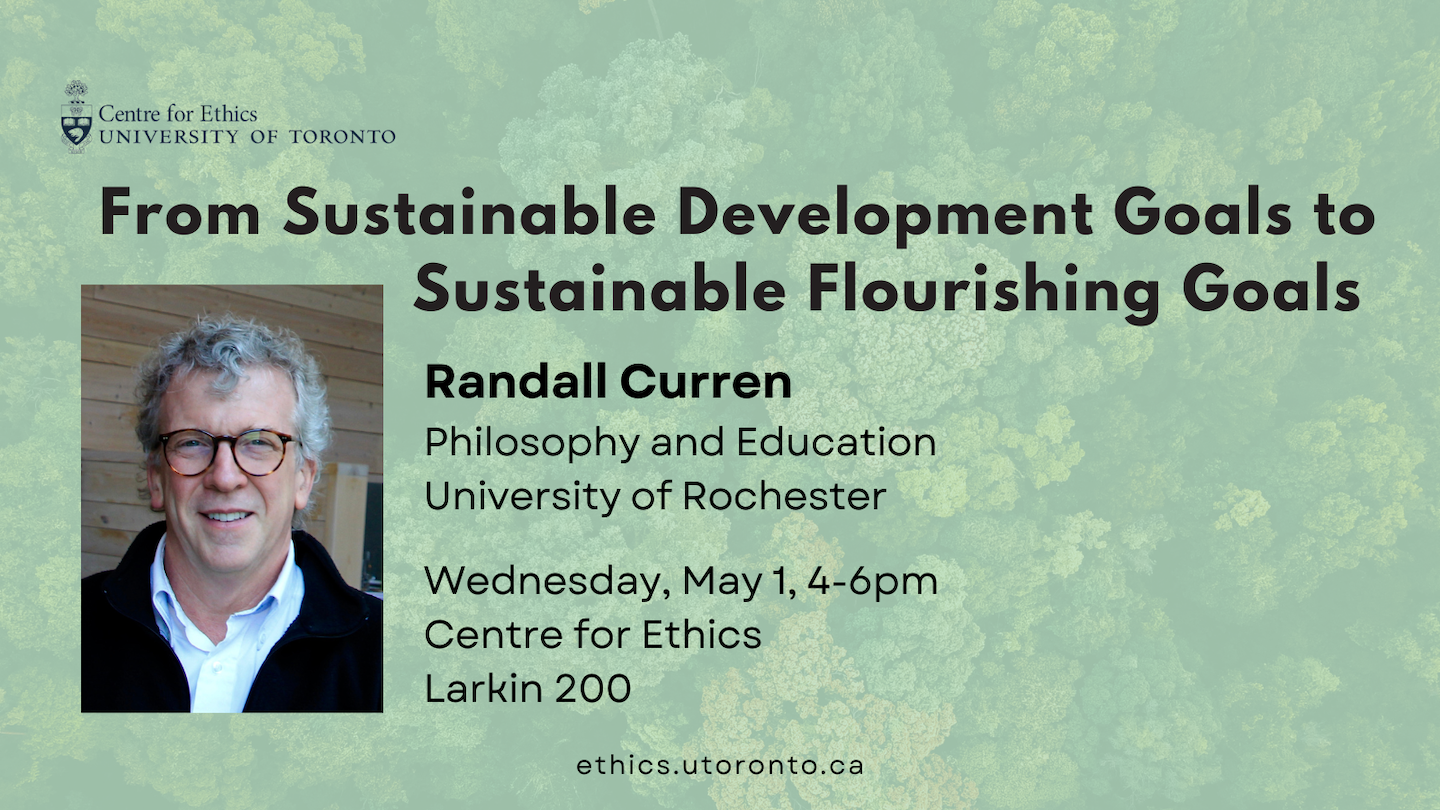
► To stay informed about other upcoming events at the Centre for Ethics, opportunities, and more, please sign up for our newsletter.
From Sustainable Development Goals to Sustainable Flourishing Goals
The UN’s widely influential Sustainable Development Goals (SDG) framework is set to expire in 2030 and an important strand of its current thinking is that the post-2030 agenda should take the form of a Sustainable Flourishing Goals (SFG) framework. The concern about the language of development is that it may be too strongly associated with an orientation to economic growth to be compatible with a path to sustainability. The thinking is that the term flourishing would provide the right focus for cross-sectoral global policy, both ethically and with respect to sustainability. Defending this as the basis of global policy would require a publicly defensible theory of eudaimonic, intergenerational justice, one that is impartial with respect to reasonable conceptions of a good life, empirically viable, and actionable. The task of this talk is to outline the basis for such a theory.► this event is in person at the Centre for Ethics (Larkin building, room 200).

Randall Curren
Philosophy and Education University of Rochester
04:00 PM - 06:00 PM
Centre for Ethics, University of Toronto
200 Larkin - Fri, Apr 19, 2024
Race, Ethics + Power
Lucien Ferguson, The Spirit of Caste (REP)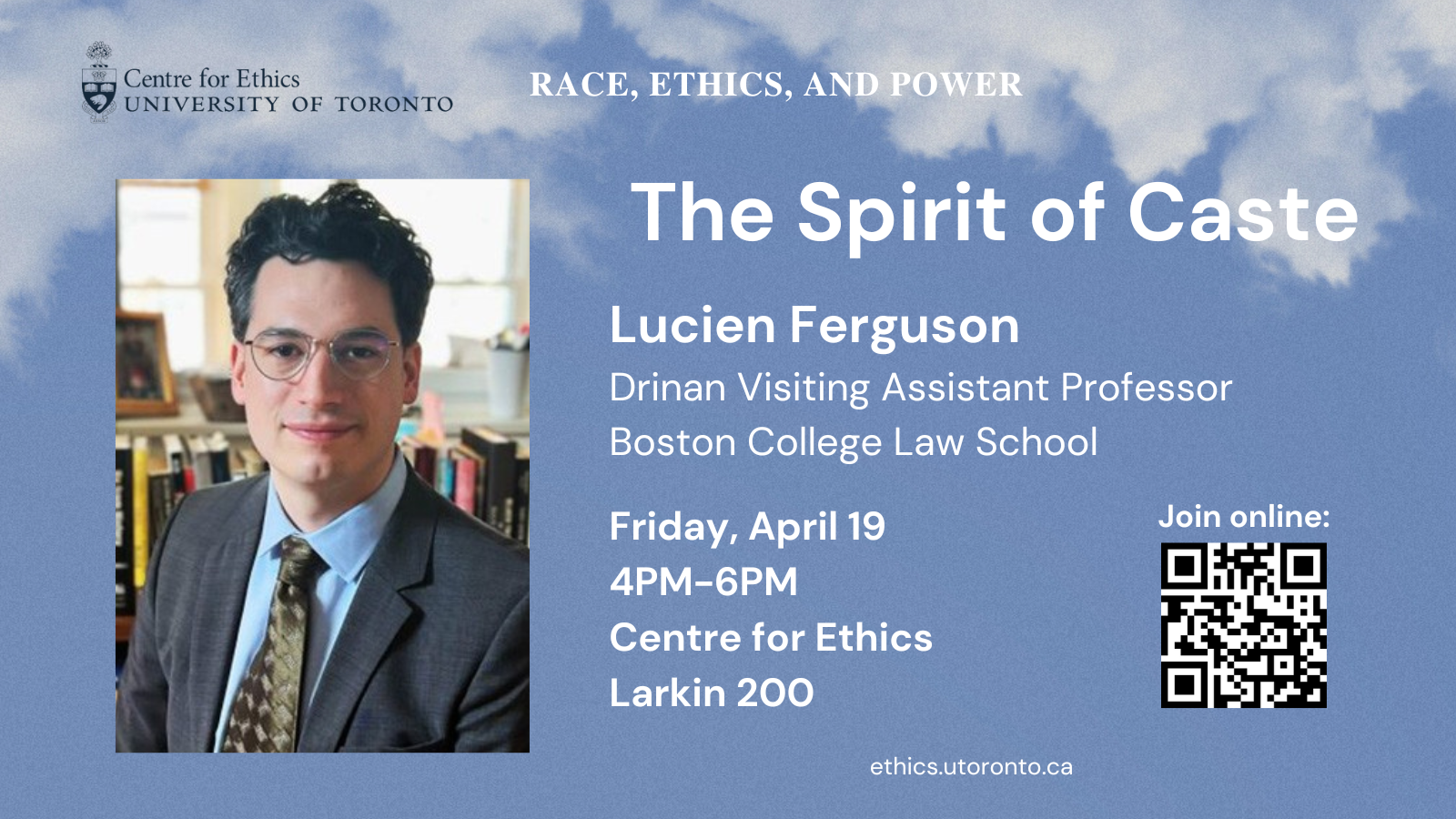
► To stay informed about other upcoming events at the Centre for Ethics, opportunities, and more, please sign up for our newsletter.
The Spirit of Caste
Caste is a concept used to explain persistent forms of social hierarchy and group domination. While it is often associated with India, feudal Europe, and Latin America, scholars in recent years have asked whether it also makes sense to conceptualize the United States as a caste system. This recent discourse overlooks a centuries-long tradition of American civil rights activism—from Frederick Douglass to W.E.B. Du Bois—that understands the United States as a caste system and seeks racial justice through constitutional reform. Returning to this tradition, this talk explores both what the concept of caste misses and what it captures about racial inequality in the United States today.
► this event is hybrid. Join in person at the Centre for Ethics (Larkin building, room 200) or online here.

Lucien Ferguson
04:00 PM - 06:00 PM
Drinan Visiting Assistant Professor
Boston College Law School
Centre for Ethics, University of Toronto
200 Larkin - Tue, Apr 9, 2024
David Benatar, The Curious Case of Absent Injustice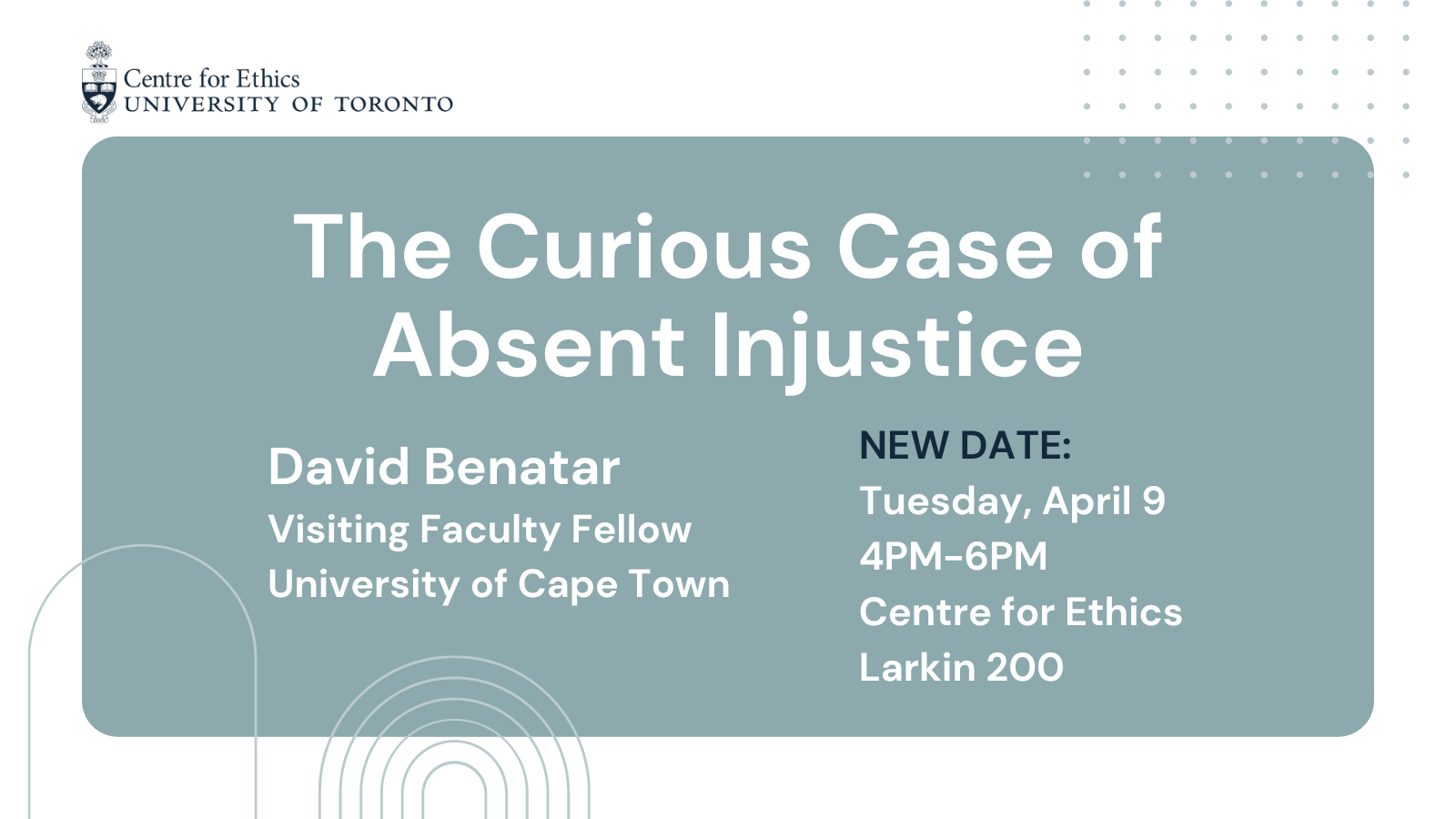
► To stay informed about other upcoming events at the Centre for Ethics, opportunities, and more, please sign up for our newsletter.
The Curious Case of Absent Injustice
Last year I presented an Ethics@noonish seminar entitled “A preponderance of injustice”, in which I argued that there is vastly more injustice than justice. In the discussion following that seminar, one interesting objection was that I had failed to account for a vast amount of justice – namely all those cases in which people refrain from doing what they should not do, and in which they do what they should do. In the forthcoming seminar I shall respond methodically to this objection, arguing that it does not upend my earlier conclusion.► this event is in person at the Centre for Ethics (Larkin building, room 200).

David Benatar
Visiting Faculty Fellow University of Cape Town
04:00 PM - 06:00 PM
Centre for Ethics, University of Toronto
200 Larkin - Fri, Apr 5, 2024
Anton Ford, The Objectification of Agency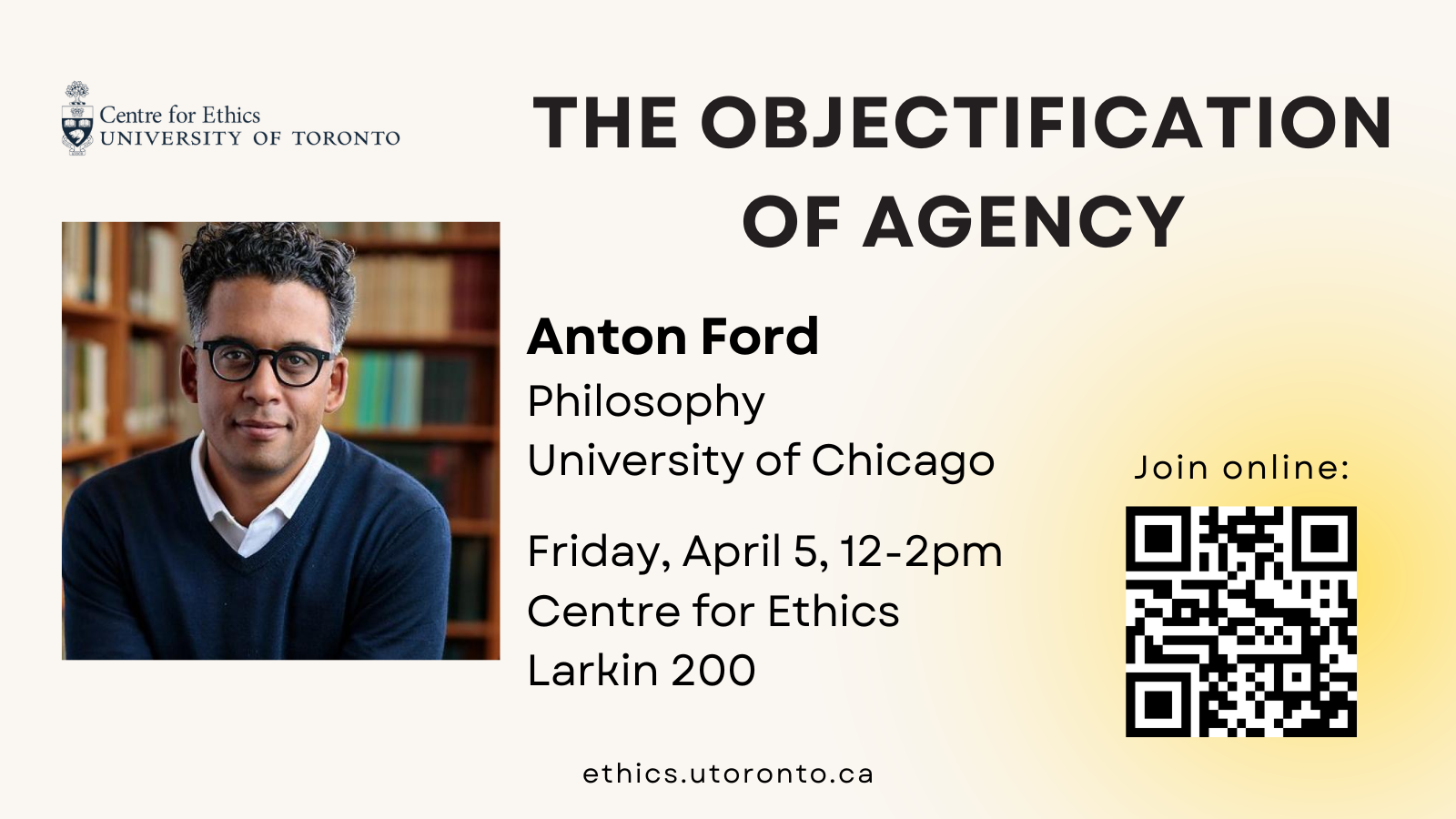
► To stay informed about other upcoming events at the Centre for Ethics, opportunities, and more, please sign up for our newsletter.
The Objectification of Agency
Agents are subjects and objects of thought: subjects, because in order to act they think; objects, because they are among the things that thinking is about. This double-relation to thought raises a question of method for any investigation of agency. If, as Wittgenstein claimed in the Tractatus, “the object of philosophy is the logical clarification of thoughts,” then which thoughts is it the primary task of practical philosophy to clarify? The thoughts that agents think, or those that are about them? The thoughts of which they are subjects, or those of which they are objects? Overwhelmingly, analytic philosophers have pursued the latter course. This is what I call the objectification of agency. It has historically taken two main forms, one in action theory, the other in value theory. The first, which I call explanationism, is the practice of accounting for the nature of action in terms of how an action is explained. The second, which I call normativism, is the practice of theorizing agency in terms of how it satisfies, or fails to satisfy, one or another “norm.” (Value theory is standardly divided into moral and aesthetic theory, according to whether the operative norms are moral or aesthetic; in the first domain, normativism takes the specific form of moralism, in the second, that of aestheticism.) Taken together, explanationism and normativism comprise a considerable portion of practical philosophy as it has been practiced in the analytic tradition, and their influence is widely felt even outside boundaries of what is normally considered practical philosophy. My aim is to bring the pattern to light, and thereby to expose it to critical scrutiny.
► this event is hybrid. Join in person at the Centre for Ethics (Larkin building, room 200) or online here.

Anton Ford
Philosophy
University of Chicago
12:00 PM - 02:00 PM
Centre for Ethics, University of Toronto
200 Larkin - Wed, Apr 3, 2024
Katie Stockdale, Resentment and Self-Respect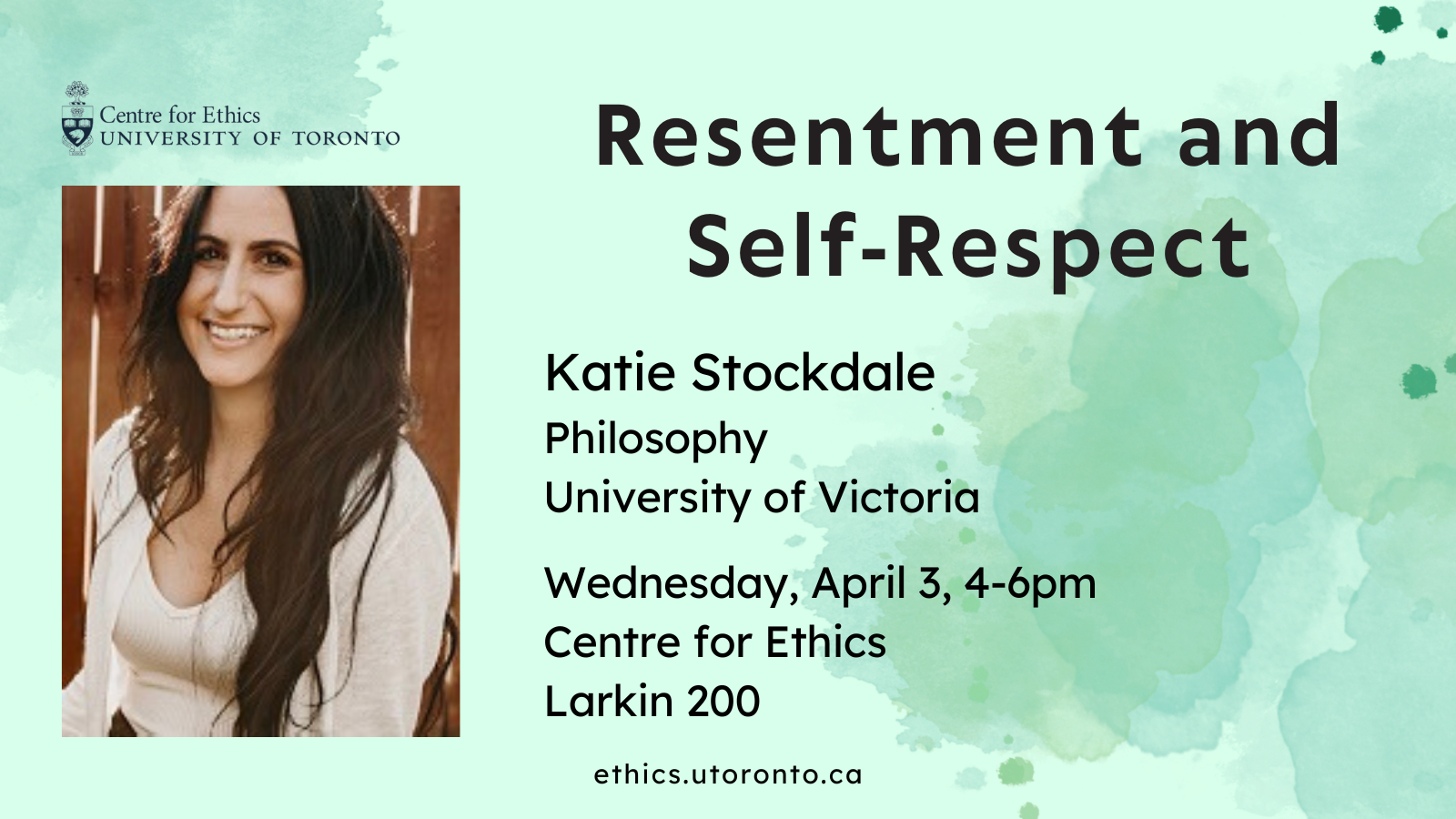
► To stay informed about other upcoming events at the Centre for Ethics, opportunities, and more, please sign up for our newsletter.
Resentment and Self-Respect
Many philosophers have defended the value of resentment to moral and political life. Resentment is thought to be a valuable expression of self-respect that stands up against moral wrongdoing and injustice. Although I have defended this conception of resentment in my own work, I’ve come to think that the emotion’s value has been overstated. Strong claims about the supposedly ‘close connection’ between resentment and self-respect can feel empowering for those of us whose lives have been marked by injustice. But they can also feel alienating to the moral agent who experiences resentment more as a destructive force in their lives than a motivating force for justice. This talk explores how we might make space for the self-respecting moral agent who does not feel resentful about wrongful acts and injustices done to them. I argue that people can have very good reasons to take a more sympathetic than resentful perspective on why people do what they do, interpreting wrongdoers’ acts to ‘mean’ much more about the wrongdoers’ attitudes toward themselves and the circumstances of their own lives than the moral worth of the people whom their actions affect.
► this event is in person at the Centre for Ethics (Larkin building, room 200).

Katie Stockdale
Philosophy
University of Victoria
04:00 PM - 06:00 PM
Centre for Ethics, University of Toronto
200 Larkin - Tue, Apr 2, 2024
Matthew Sussman, Literary Criticism and the Ethics of Pluralism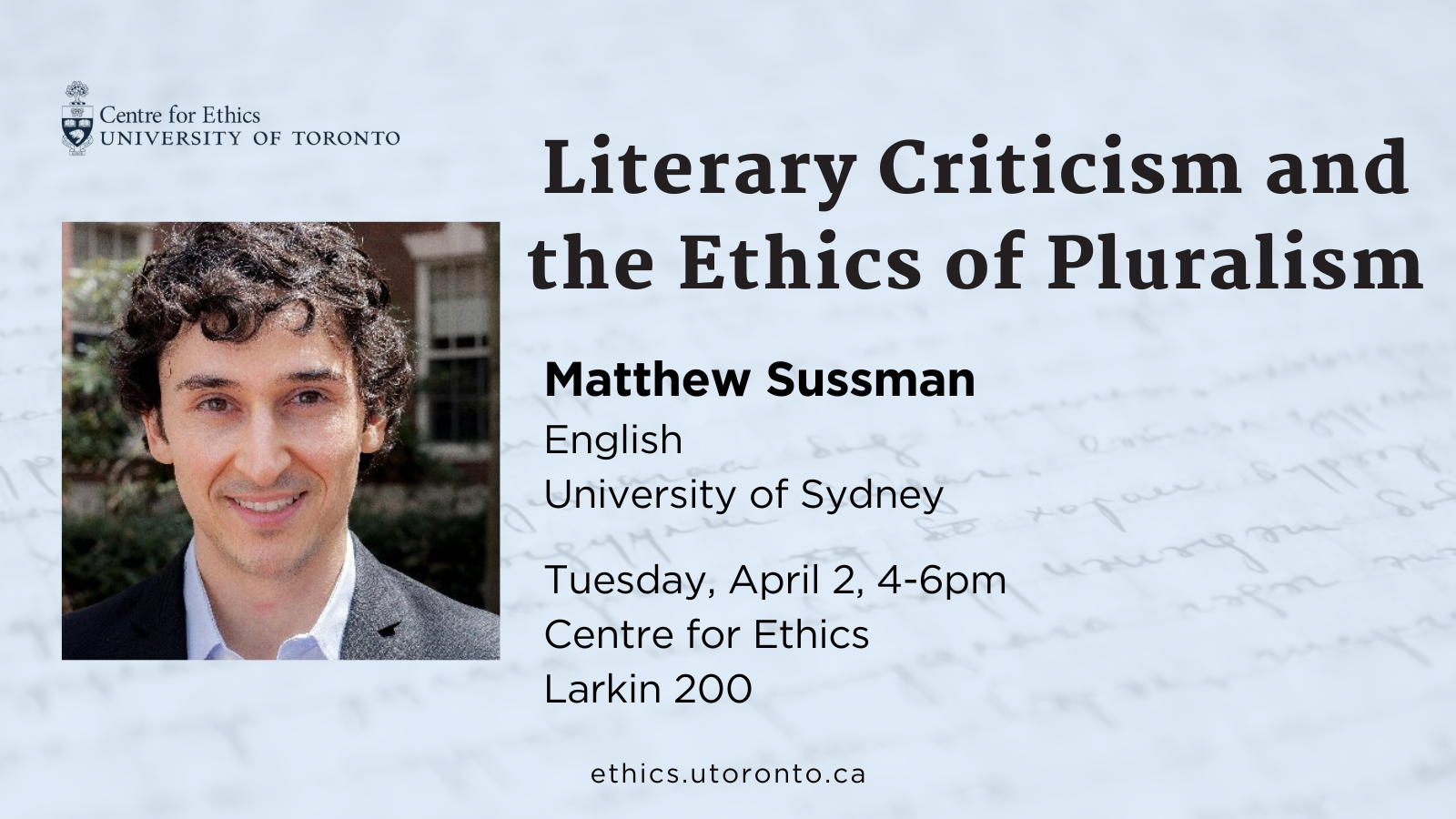
► To stay informed about other upcoming events at the Centre for Ethics, opportunities, and more, please sign up for our newsletter.
Literary Criticism and the Ethics of Pluralism
What is the relationship between literary appreciation and attitudes toward diversity in modern liberal democracies? This presentation discusses how literary criticism has contributed to the advancement of pluralism by tracing its origins in the aesthetic and moral thought of the sixteenth through eighteenth centuries. It describes how an awareness of aesthetic diversity relativised standards of taste, and discusses the emergence of a form of dispassionate appreciation that called for understanding without subjective liking. Taken together, these developments show how aesthetic criticism predicated itself upon reasoned disagreement, cultivating the attitudes and habits of mind that are characteristic of liberal tolerance.► this event is in person at the Centre for Ethics (Larkin building, room 200).

Matthew Sussman
English
University of Sydney
04:00 PM - 06:00 PM
Centre for Ethics, University of Toronto
200 Larkin - Thu, Mar 28, 2024
AI as Moral Patient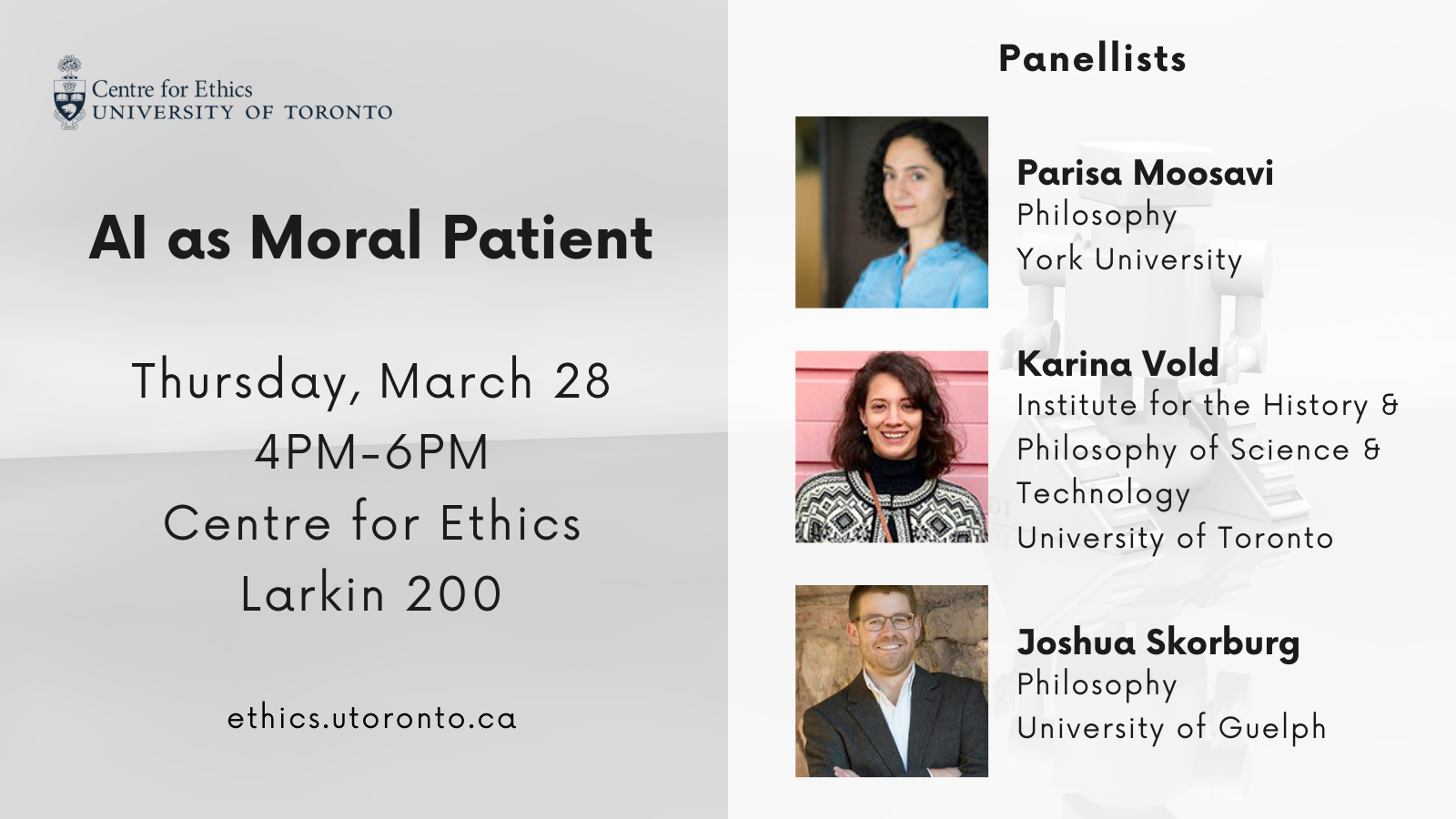
► To stay informed about other upcoming events at the Centre for Ethics, opportunities, and more, please sign up for our newsletter.
AI as Moral Patient
► This event is in person at the Centre for Ethics (Larkin building, room 200).

Parisa Moosavi
Philosophy
York University
Karina Vold
Institute for the History and Philosophy of Science and Technology
University of Toronto
Joshua Skorburg
04:00 PM - 06:00 PM
Philosophy
University of Guelph
Centre for Ethics, University of Toronto
- Wed, Mar 27, 2024
Ethics at Noon
Faisal Bhabha, Kant's Theory of Parental Authority (Ethics@Noon-ish)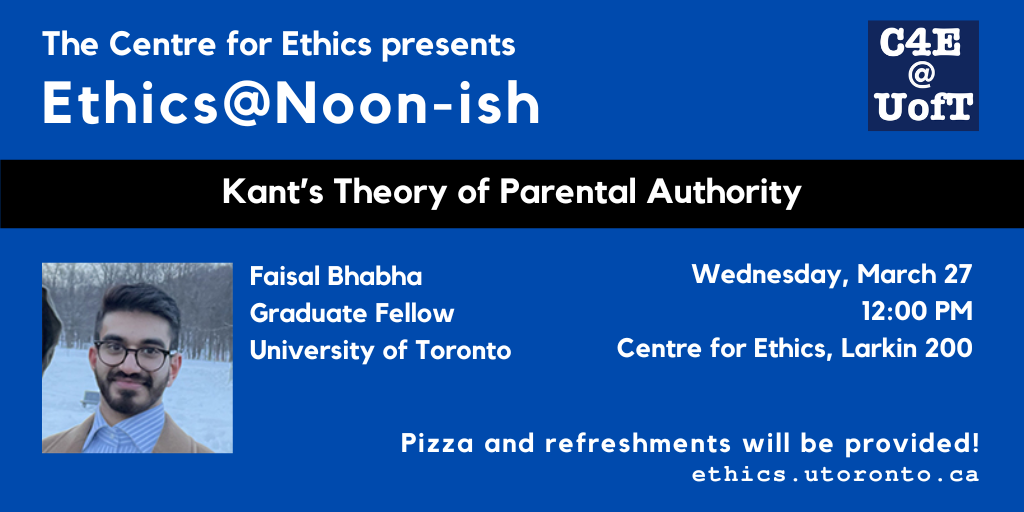
► To stay informed about other upcoming events at the Centre for Ethics, opportunities, and more, please sign up for our newsletter.
Kant’s Theory of Parental Authority
Children’s law appears to be based on a contradiction. The law treats children in some ways like property. Parents get to make arrangements for them without their consent. At the same time, the law is at least rhetorically committed to the “inherent dignity and…the equal and inalienable rights of all members of the human family” (UN Convention on the Rights of the Child). It is trite law that only you get to decide what to do with your car, your land or your pet dog. But so rarely de we reflect upon the oddity that every human being begins life being legally subjected to the will of supposedly equal persons, namely, parents. Why the exception for children? Their legal status suggests that they are part person, part thing. Hence Kant’s puzzling characterization of parental rights as “a right to a person akin to a right to a thing.” However, since the law opposes persons to things, we must reconcile the property-like features of parental rights with the basic rights children have in common with other persons. I argue, drawing on Kant’s work, that the law reconciles the dependence of children with their fundamental right to independence by regarding the parent-child relationship as a kind of fiduciary relationship. Parents are charged with caring for children while they are unable to care for themselves, for which they incur a duty to act exclusively in the latter’s best interests understood in terms of their development into active, independent citizens, which internally limits parental rights.
► this event is in-person at the Centre for Ethics (Larkin building, room 200).

Faisal Bhabha
Graduate Fellow University of Toronto
12:00 PM - 02:00 PM
Centre for Ethics, University of Toronto
200 Larkin - Mon, Mar 25, 2024
Tom Angier, Human Enhancement and Human Nature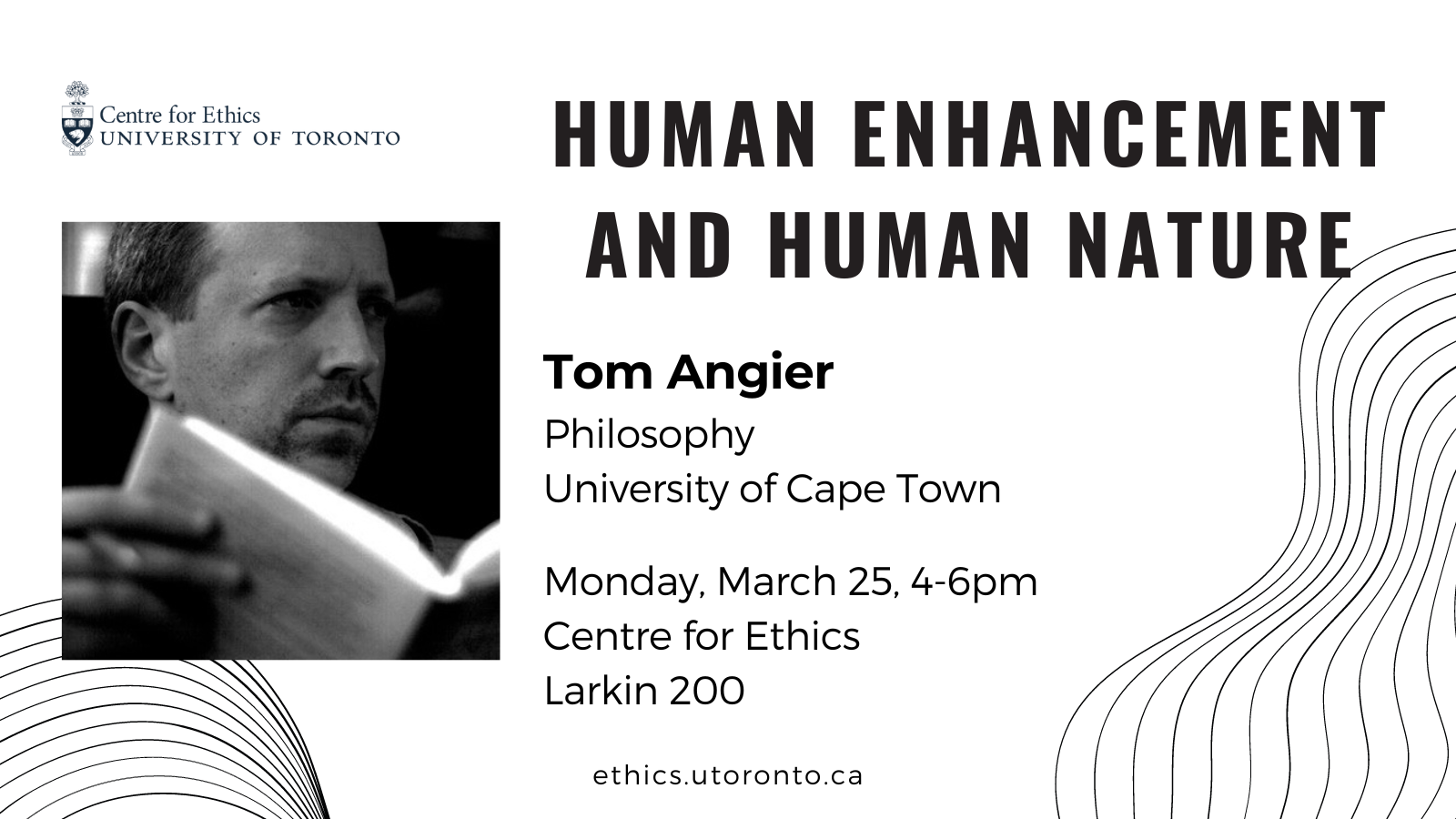
► To stay informed about other upcoming events at the Centre for Ethics, opportunities, and more, please sign up for our newsletter.
Human Enhancement and Human Nature
Since the millennium, philosophical work on human enhancement has burgeoned. Significant book-length treatments have been published by, among others, Nick Bostrom, Francis Fukuyama, Jürgen Habermas, Michael Sandel and Julian Savulescu. Clearly, the idea that technology affords or will afford monumental changes in our physical, cognitive and even moral constitution has excited deep and widespread interest. Whether this interest is accompanied by profound scepticism, mere ‘boosterism’, or something in between, the prospect of manifold enhancements in our bodies and their capacities is hard to ignore. In this paper, I will explore what I take to be the four main arguments in the literature against such enhancements: namely, the argument from autonomy, from dignity, from inequality and from mastery. While each raises legitimate concerns, I will conclude that none of them – taken either singly or jointly – is sufficient to render the project of human enhancement impermissible. At most, they point to the need for prudence and careful institutional oversight. The only argument which succeeds against that project is not moral, but rather formal in kind: that is, that the project of human enhancement is fundamentally incoherent. I will argue that in order to specify an enhancement of x, one needs to specify (and understand) the nature of x. But it is precisely a specification and understanding of human nature which the project of human enhancement lacks – and worse, which it tends to repudiate.► this event is in person at the Centre for Ethics (Larkin building, room 200).

Tom Angier
Philosophy
University of Cape Town
04:00 PM - 06:00 PM
Centre for Ethics, University of Toronto
200 Larkin - Mon, Mar 18, 2024
Immigrants, Refugees, and Asylum Seekers
Michael Blake, Climate Migration, Moral Psychology, and the Demands of Liberal Democracy (Immigrants, Refugees, and Asylum Seekers)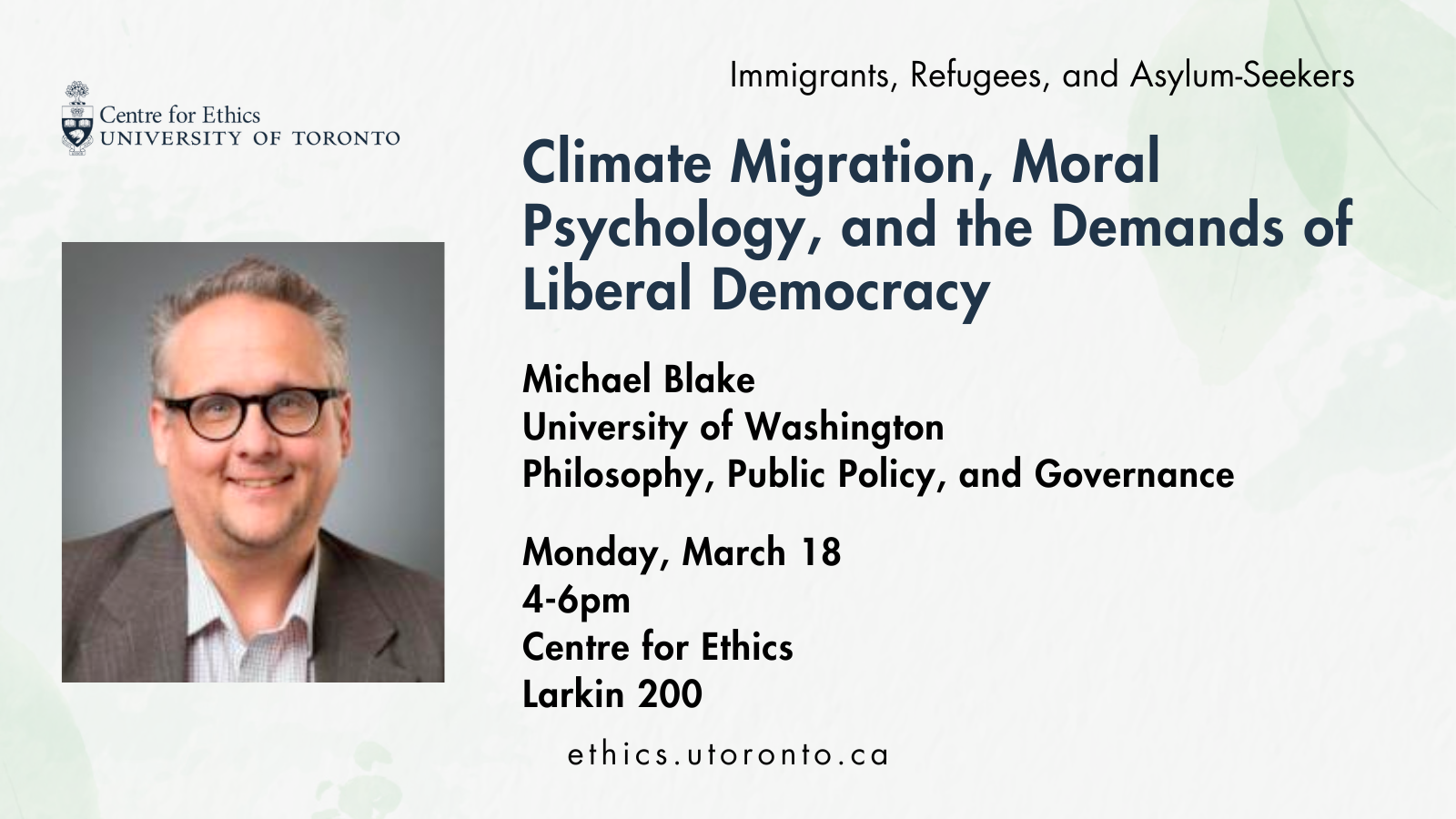
► To stay informed about other upcoming events at the Centre for Ethics, opportunities, and more, please sign up for our newsletter.
Climate Migration, Moral Psychology, and the Demands of Liberal Democracy
Many contemporary theorists of justice take climate-induced migration to be a problem of justice in distribution: the problem of how to care for those individuals displaced by climate change, that is, is best understood as a question of how to allocate responsibility for fixing a global political problem. In this paper, I want to argue that such migration entails a much more serious problem – one related to the moral motivations we take to be required by those citizens responsible for supporting and sustaining just political institutions. Liberal theory implicitly rests upon a particular view of moral psychology – about, that is, how much we can expect liberal citizens to be motivated by such moral considerations as the interests of others. There is some threshold of moral decency, we imagine, below which we imagine liberal politics becomes difficult or impossible. What moral motivations we can rightly expect, however, is at least partly an empirical question, and so makes reference to what we can expect actual people to do in response to claims of justice made by others. The claims of climate migrants, however, have two distinct aspects which make them likely to be more easily resisted. The first is that these claims are made by those with whom reciprocal political relationships have seemingly not yet been built; in contrast to the claims of fellow citizens, there is no background of mutual support here against which the claims of justice are to be evaluated. The second is that these claims emerge against a background in which the sedentary residents of wealthier states are likely to experience lower levels of wages and longevity than their parents; due to the psychological relevance of such comparative poverty, it is likely that such lowered expectations would become relevant for the perception of how much is owed to those displaced by climate migration elsewhere. It is possible to resist these two thoughts through philosophical engagement – but such engagement may not alter the motivational effects such thoughts often have. The power of bad, but attractive, ideas may be enough to lead many people to refuse to engage philosophically – a refusal which is likely to be catered to by political entrepreneurs, including populist and authoritarian anti-liberals. In the end, I suggest, one of the most significant wrongs done by the present generation to its future counterparts might be understood as the wrong of making democracy more difficult for them than it was for us; our descendants will have to demonstrate greater empathy, under worse circumstances, than we ourselves found necessary.
► this event is in person at the Centre for Ethics (Larkin building, room 200).

Michael Blake
Philosophy, Public Policy, and Governance
University of Washington
04:00 PM - 06:00 PM
Centre for Ethics, University of Toronto
200 Larkin - Wed, Mar 13, 2024
Ethics at Noon
William Paris, Undisciplining Time?: Critique, Utopia, and the Prospects of Life beyond Capital (Ethics@Noon-ish)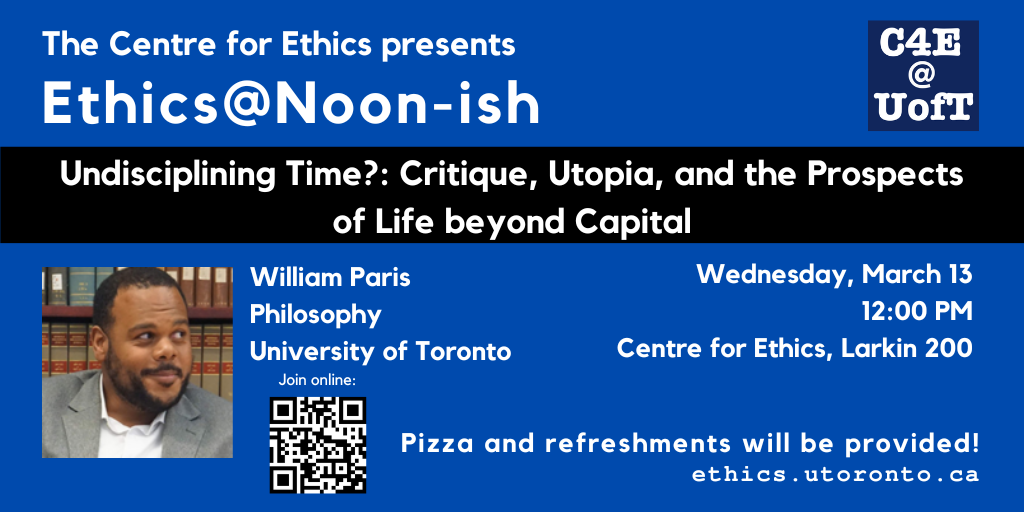
► To stay informed about other upcoming events at the Centre for Ethics, opportunities, and more, please sign up for our newsletter.
Undisciplining Time?: Critique, Utopia, and the Prospects of Life beyond Capital
No doubt capital/capitalism organizes and disciplines social time. How long people work, how well they save for retirement, how much they are “worth” over the course of their lives are just a sample of the facets of social life in the longue durée of capital accumulation. Our time, in the final analysis, is not really our own. The domination of time is one of the most crucial sources of power for the reproduction of capitalist forms of life. How capital organizes time has shown itself to be increasingly irrational and destructive for social, political, and economic life. In this seminar, I will offer the hypothesis that a critical theory of utopia, for our time, must center how capital’s mechanism of time-discipline reproduce unfreedom. Doing so will clarify why struggles for a viable life beyond capital must undo its capacity to uproot and transform social time in the process of accumulation. Drawing on the work of James Boggs, E.P. Thompson, Rahel Jaeggi, and Martin Hägglund I will argue that utopia, as a critical concept, introduces a new and as yet undisciplined form of time as the horizon of freedom.
► this event is hybrid. Join in person at the Centre for Ethics (Larkin building, room 200) or online here.

William Paris
Assistant Professor
Philosophy
University of Toronto
12:00 PM - 02:00 PM
Centre for Ethics, University of Toronto
200 Larkin - Fri, Mar 8, 2024
Race, Ethics + Power
Inder Marwah, Eugenic Democracy: Du Bois, Darwin, and the Politics of Race (REP)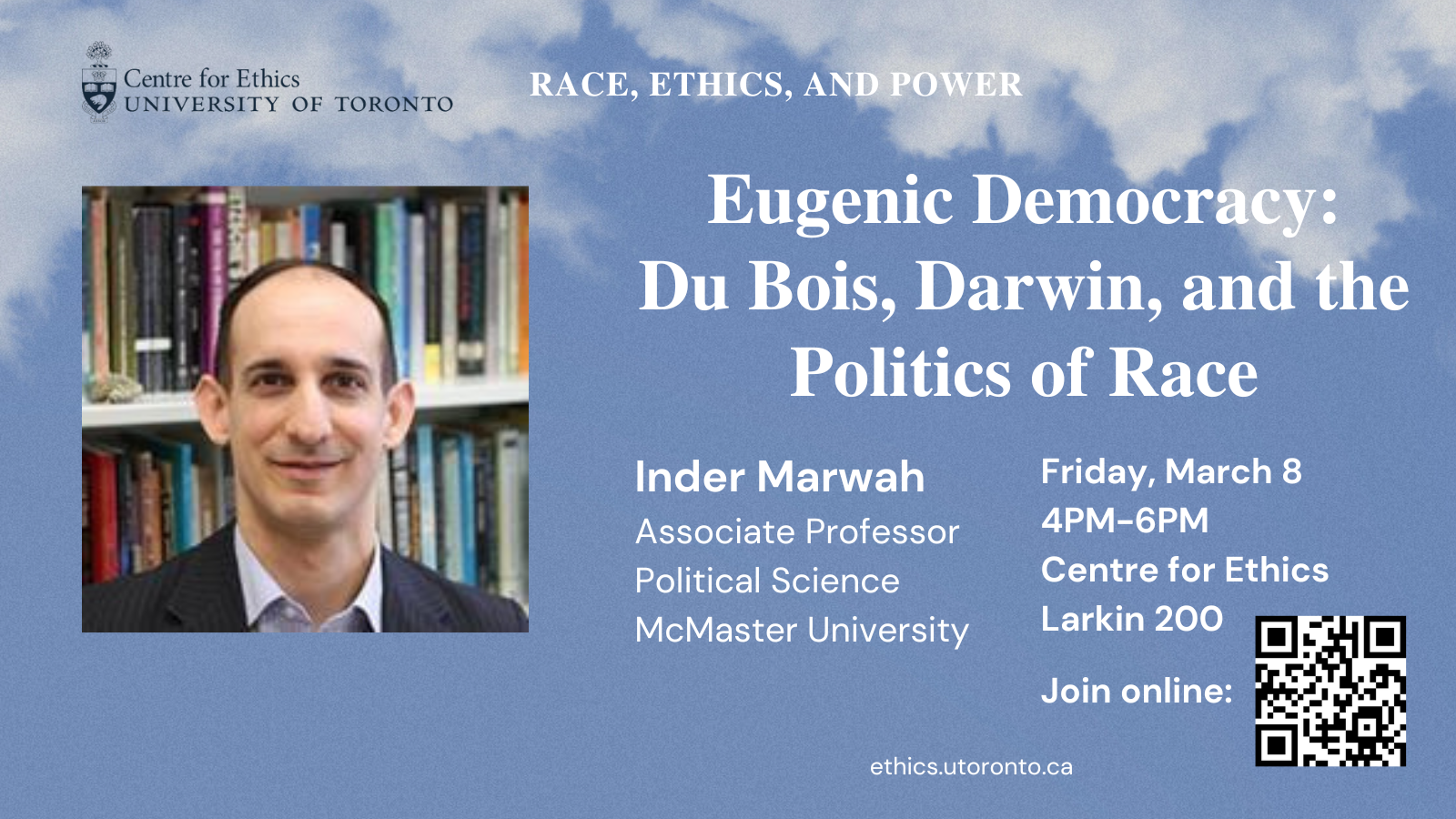
► To stay informed about other upcoming events at the Centre for Ethics, opportunities, and more, please sign up for our newsletter.
Eugenic Democracy: Du Bois, Darwin, and the Politics of Race
W. E. B. Du Bois is widely credited with debunking the social Darwinism pervasive in turn-of-century social and political theory. By showing the environmental causes of African American disadvantage, Du Bois’ sociological studies opposed social Darwinist claims regarding ‘inborn’ racial ‘deficits’. What this misses, however, is the constructive role that Darwinian science played in Du Bois’ conceptualization of racial advancement. This paper excavates just this: how Darwinism and eugenics shaped Du Bois’ understanding of race and his program of racial uplift. Far from discarding the period’s race sciences, Du Bois resisted their distortions through racial prejudice and drew on them to envision a racially just politics. Darwinism, I argue, informed Du Bois’ assessment of the harms that formalized systems of inequality – slavery, Jim Crow segregation – visited on Black Americans. It also shaped his arguments for democratic equality: setting aside its other virtues, democracy, Du Bois contended, would remove “artificial” constraints on the competitive struggle enabling the best of both races to succeed. It was, then, eugenically advantageous. Against the preponderant view that Du Bois discarded them, I argue that Du Bois’ relation to Darwinism, Lamarckism, eugenics, and race sciences was far more ambivalent, and that he in fact drew on them to advance his racially-egalitarian politics.
► this event is hybrid. Join in person at the Centre for Ethics (Larkin building, room 200) or online here.

Inder Marwah
04:00 PM - 06:00 PM
Associate Professor, Political Science
McMaster University
Centre for Ethics, University of Toronto
200 Larkin - Wed, Mar 6, 2024
Ethics at Noon
Larisa Svirsky, What Are We Agreeing To?: Opioid Treatment Agreement Requirements and the Physician-Patient Relationship (Ethics@Noon-ish)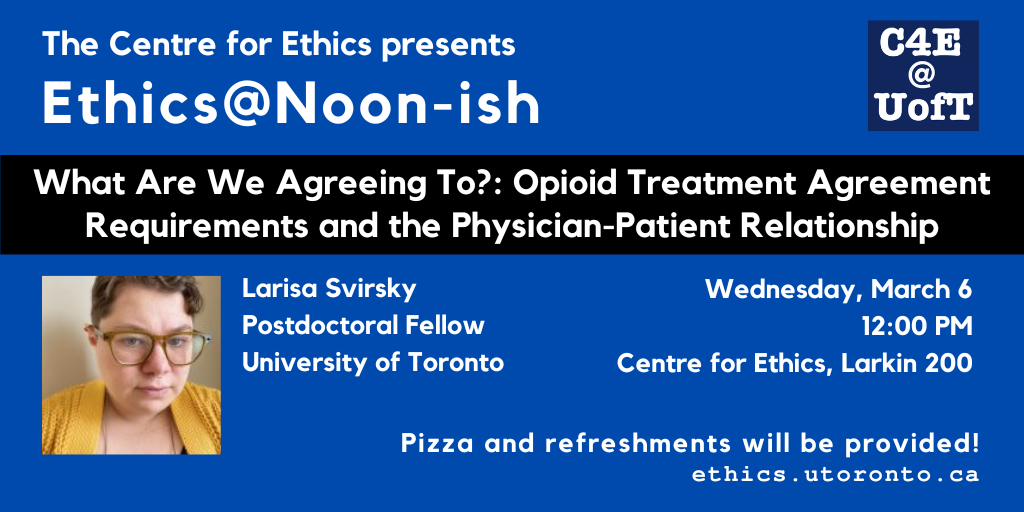
► To stay informed about other upcoming events at the Centre for Ethics, opportunities, and more, please sign up for our newsletter.
What Are We Agreeing To?: Opioid Treatment Agreement Requirements and the Physician-Patient Relationship
► this event is in-person at the Centre for Ethics (Larkin building, room 200).

Larisa Svirsky
Postdoctoral Fellow
University of Toronto
12:00 PM - 02:00 PM
Centre for Ethics, University of Toronto
200 Larkin - Mon, Mar 4, 2024
Ella Street, Taming the Tyrant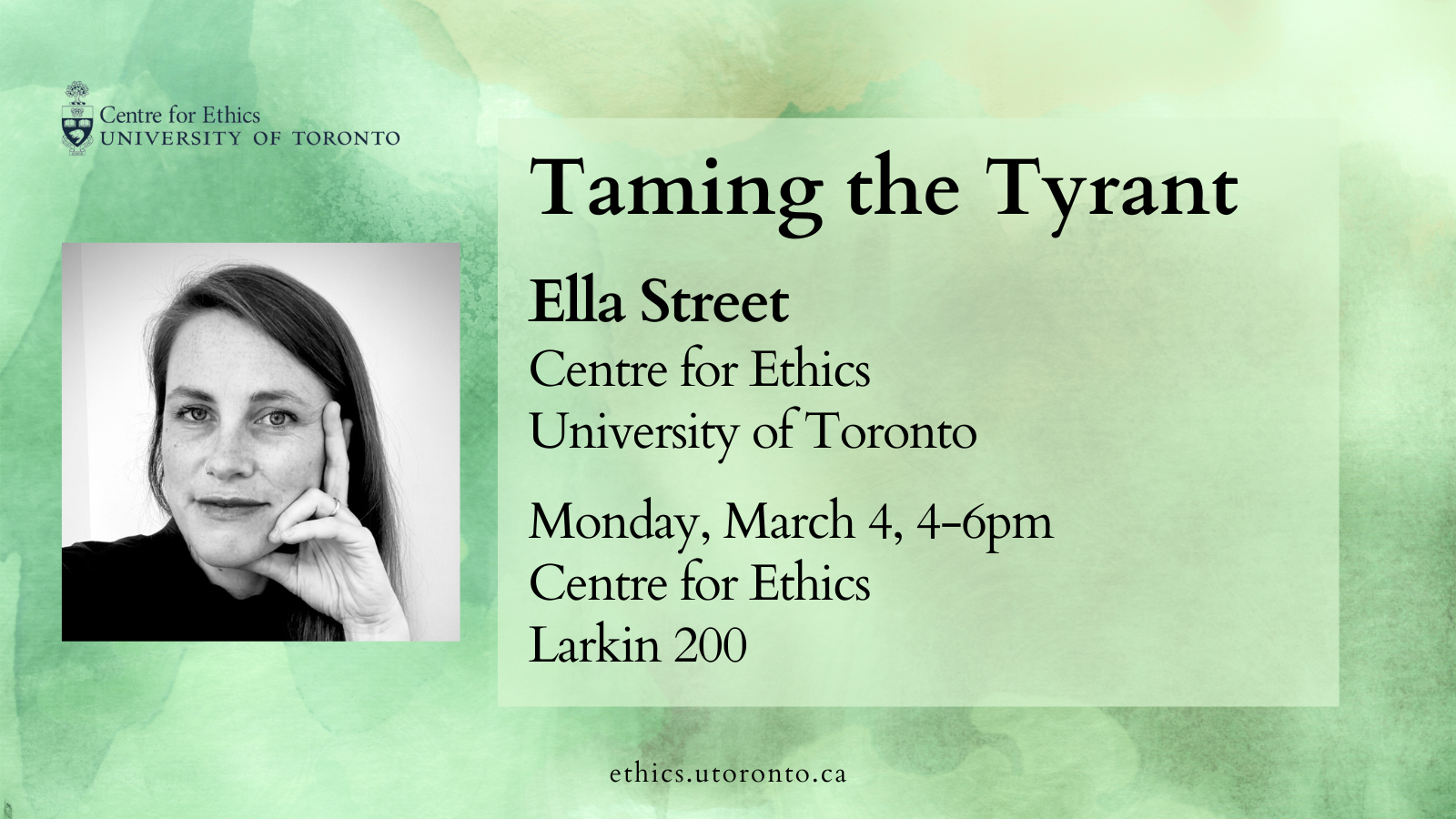
► To stay informed about other upcoming events at the Centre for Ethics, opportunities, and more, please sign up for our newsletter.
Taming the TyrantThis talk considers the figure of the tyrant in 5th and 4th century Athenian politics and culture and the surprising similarity between the tyrant and the demos (the people) in terms of their political unaccountability. Despite Athenian democracy’s impressive “culture of accountability,” the demos ruled supreme precisely because it was accountable to no one: in a democracy, the people – like a tyrant— is not subject to any higher institutional check or power that might constrain its rule.
Scholars of Athens have used the tyrant-demos identification to clarify the nature of democratic rule. While illuminating, I argue that the identification ultimately fails to capture the character of the demos and its distinctive form of political power. I introduce the concept of “reflexive accountability” to describe a distinctive accountability practice in Athenian democracy that relies on (and indicates) the plural and individuated nature of the demos. The talk will consider the promise and pitfalls of democratic (un)accountability in Athens and today.
► this event is in person at the Centre for Ethics (Larkin building, room 200).

Ella Street
Centre for Ethics
University of Toronto
04:00 PM - 06:00 PM
Centre for Ethics, University of Toronto
200 Larkin - Wed, Feb 28, 2024
Ethics at Noon
Yang-Yang Cheng, Reading with Compassion: A Theory of Democratic Readership (Ethics@Noon-ish)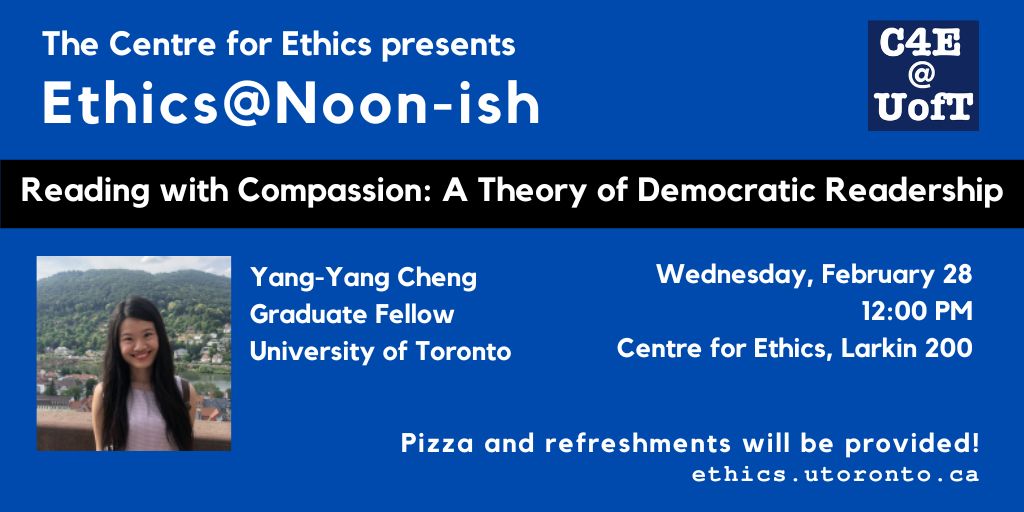
► To stay informed about other upcoming events at the Centre for Ethics, opportunities, and more, please sign up for our newsletter.
Reading with Compassion: A Theory of Democratic Readership
► this event is in-person at the Centre for Ethics (Larkin building, room 200).

Yang-Yang Cheng
Graduate Fellow University of Toronto
12:00 PM - 02:00 PM
Centre for Ethics, University of Toronto
200 Larkin - Tue, Feb 27, 2024
Alisabeth Ayars, Sex, Preference, and Consent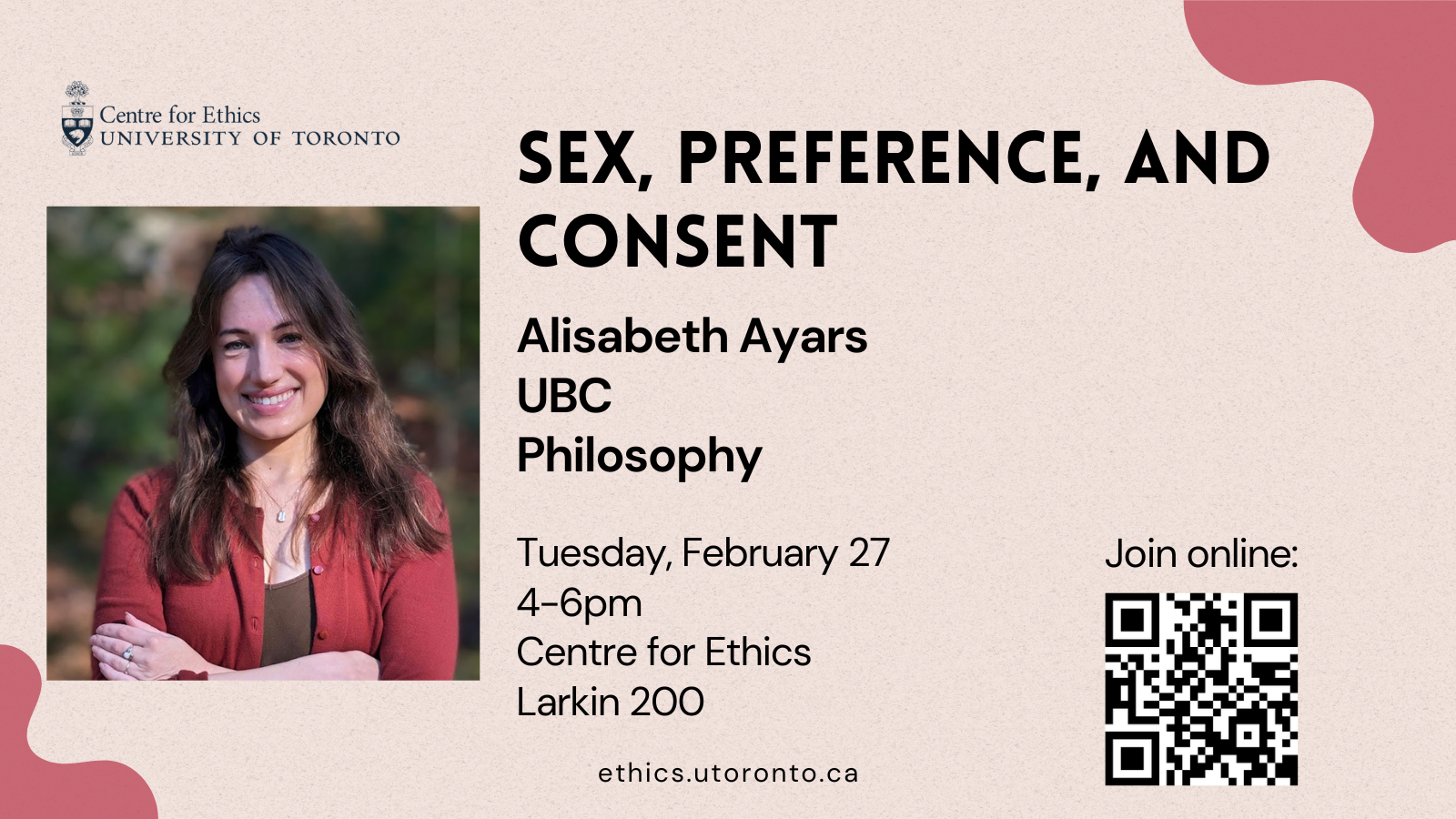
► To stay informed about other upcoming events at the Centre for Ethics, opportunities, and more, please sign up for our newsletter.
Sex, Preference, and ConsentSometimes people consent to sex not because they want to have it, but because they find refusal intolerably costly. These encounters seem to involve sexual wrongings–but why? The consent theory holds that they are not fully consensual. I object to this theory on grounds that the wrongfulness persists even when the conditions that ordinarily diminish consent’s transformative power are not met. I propose an alternative theory, the preference theory, which holds that the sex is wrong because it opposes the consent-giver’s preference, which is distinct from his or her willingness. Consent simply prevents the violation of one duty (the duty not to have sex with someone who doesn’t consent), but not another (the duty not to have sex with someone who’d rather not have it.)
► this event is hybrid. Join in person at the Centre for Ethics (Larkin building, room 200) or online here.

Alisabeth Ayars
Philosophy
UBC
04:00 PM - 06:00 PM
Centre for Ethics, University of Toronto
200 Larkin - Wed, Feb 14, 2024
Brendan de Kenessey, Deontological Constraints as the Norms of Relationships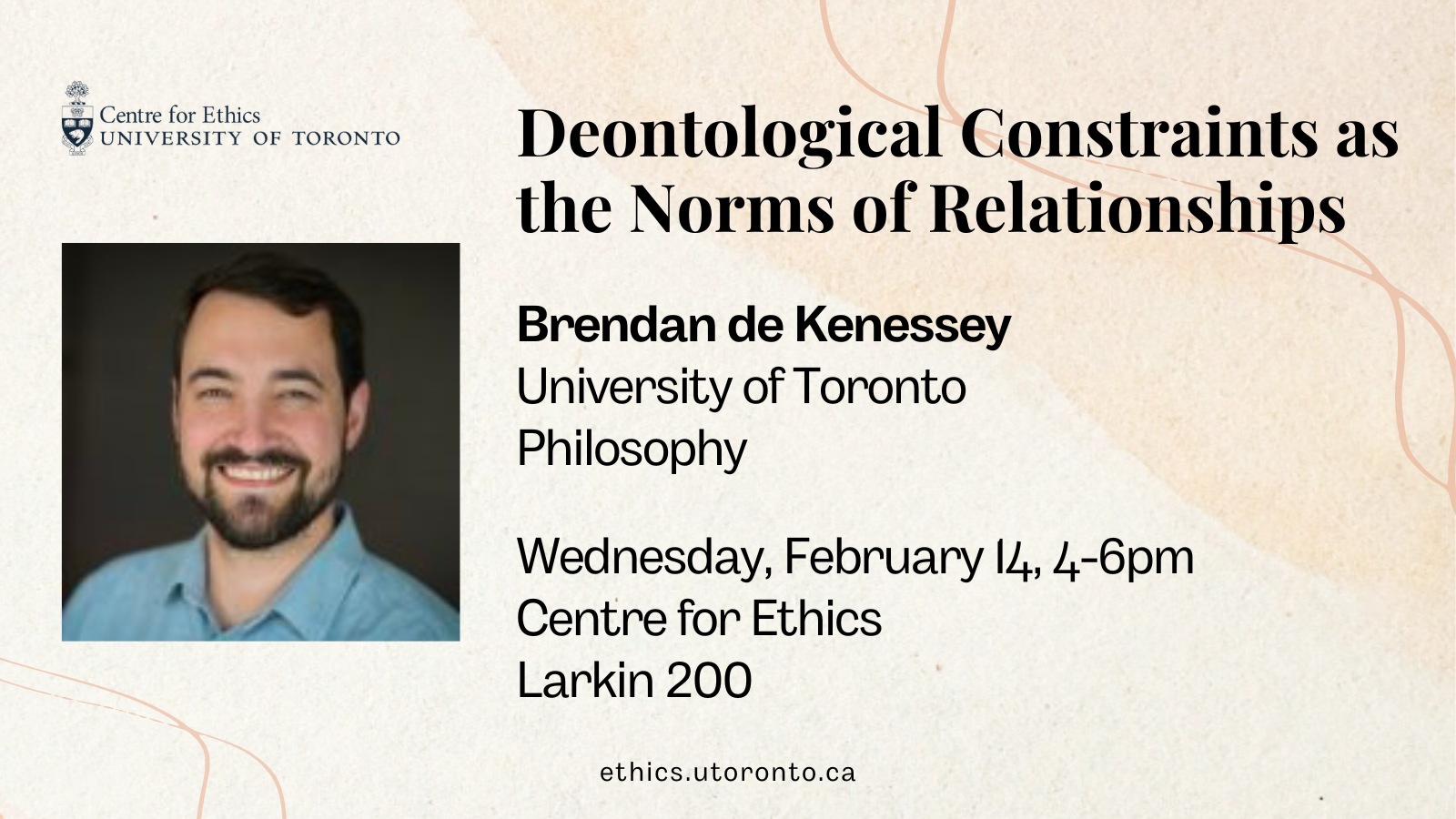
► To stay informed about other upcoming events at the Centre for Ethics, opportunities, and more, please sign up for our newsletter.
Deontological Constraints as the Norms of RelationshipsI outline a novel theory of deontological constraints, based in the idea that these are the constraints we must abide by to participate well in interpersonal relationships. I understand deontological constraints as moral principles that forbid actions even when those actions cause no independent harm, or are even beneficial. Paradigm cases are the constraints against killing, promise-breaking, lying, stealing, and sexual assault. But why are these actions subject to constraints, rather than some other set? I suggest that we can explain the contours of constraints by looking at the nature of relationships. More specifically, I propose that relationships are best understood as activities of shared agency, and that if we unpack the norms one must obey to participate well in shared agency, we will find that these norms align neatly with the intuitive content of constraints. The upshot is that our reason to abide by constraints might be explained in terms of the value of interpersonal relationships.► this event is in person at the Centre for Ethics (Larkin building, room 200).

Brendan de Kenessey
Philosophy
University of Toronto
04:00 PM - 06:00 PM
Centre for Ethics, University of Toronto
200 Larkin - Mon, Feb 12, 2024
Luke Davies, Aiding the Impermissible: Kant and the Morality of Assisted Dying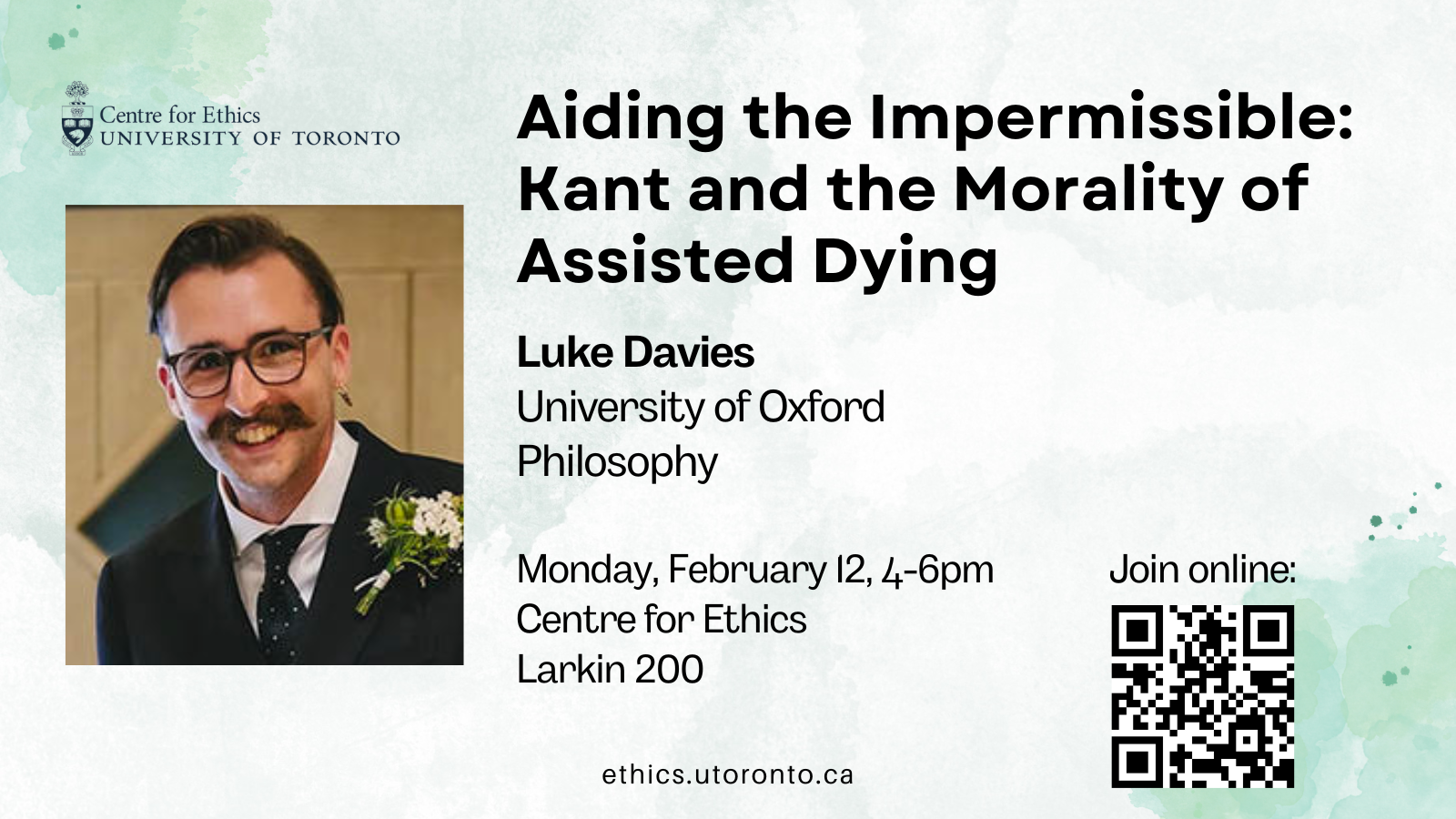
► To stay informed about other upcoming events at the Centre for Ethics, opportunities, and more, please sign up for our newsletter.
Aiding the Impermissible: Kant and the Morality of Assisted DyingKant’s claim suicide is in every case contrary to moral duty makes him an unlikely figure to turn to when mounting a defence of physician-assisted dying (PAD). This is because it is plausible to assume that the permissibility of suicide in at least some cases is a necessary condition for support of PAD.The aim of this talk is to suggest an alternative to this picture. I argue that Kant’s account of moral virtue and the duties we have towards the moral perfection of others are both compatible with a commitment to PAD. The prohibition on suicide sets limits to the way in which this practice may be carried out but does not forbid it altogether. Moreover, I argue that there are good reasons to support the limits suggested by the Kantian view.► this event is hybrid. Join in person at the Centre for Ethics (Larkin building, room 200) or online here.

Luke Davies
University of Oxford
Philosophy
04:00 PM - 06:00 PM
Centre for Ethics, University of Toronto
200 Larkin - Fri, Feb 9, 2024
Race, Ethics + Power
Jerome Clarke, The Data of Blackness (REP)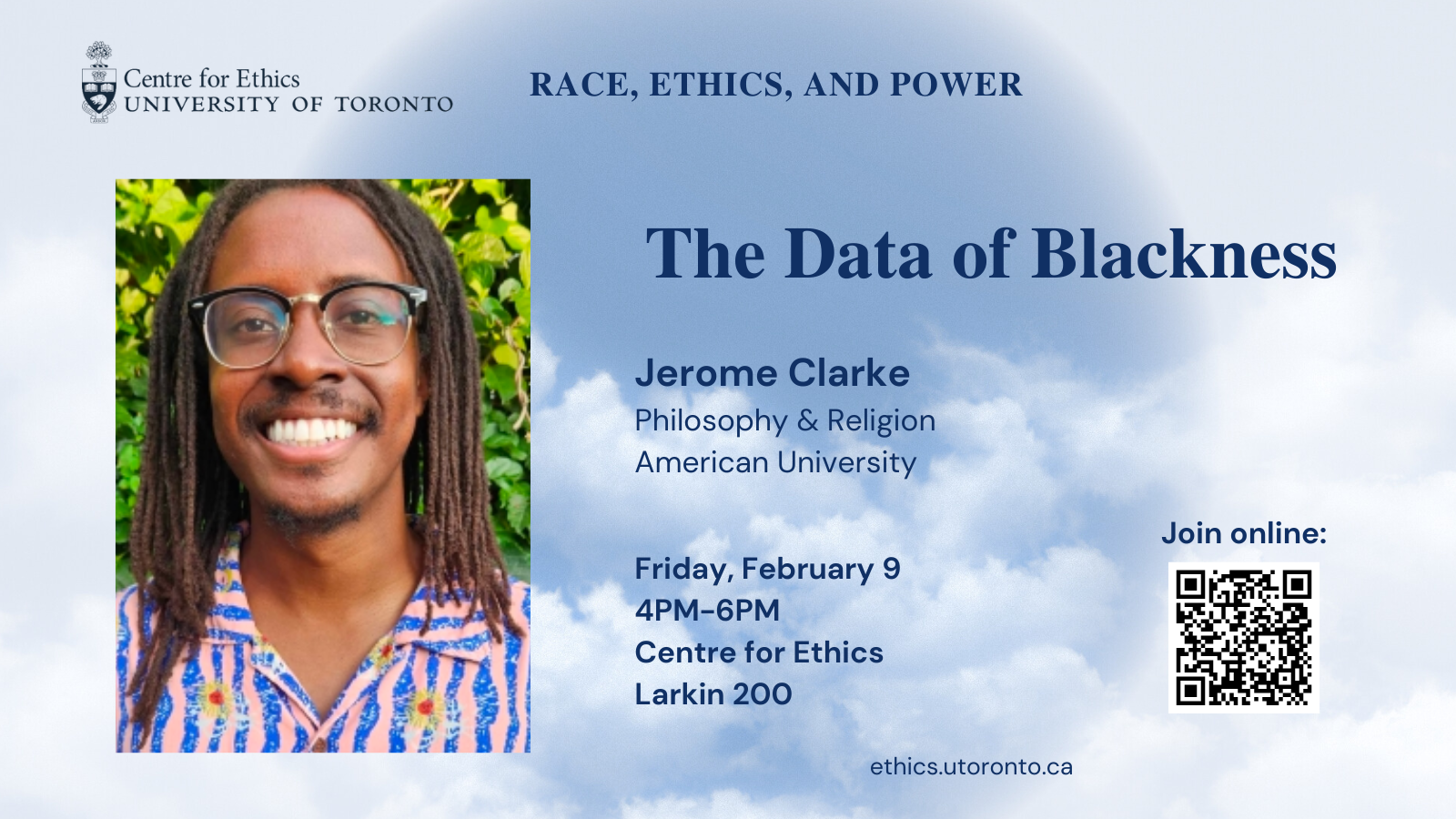
► To stay informed about other upcoming events at the Centre for Ethics, opportunities, and more, please sign up for our newsletter.
The Data of Blackness
► this event is hybrid. Join in person at the Centre for Ethics (Larkin building, room 200) or online here.

Jerome Clarke
04:00 PM - 06:00 PM
Assistant Professor, Philosophy and Religion
American University
Centre for Ethics, University of Toronto
200 Larkin - Wed, Feb 7, 2024
Ethics at Noon
Yukiko Kobayashi Lui, Feminist and Queer Legal Theory Toward Family Abolition (Ethics@Noon-ish)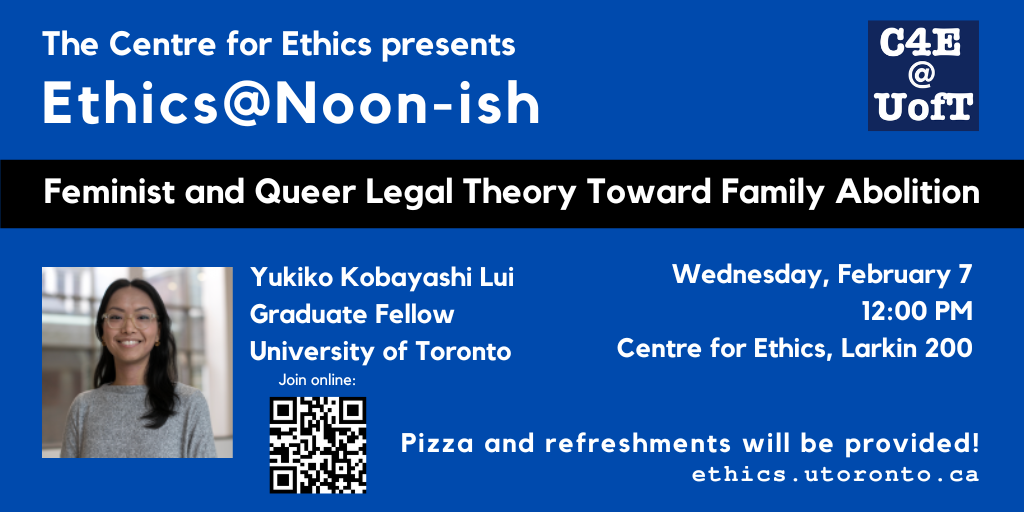
► To stay informed about other upcoming events at the Centre for Ethics, opportunities, and more, please sign up for our newsletter.
Feminist and Queer Legal Theory Toward Family Abolition
Family abolition is the spectre which lurks at the margins of progressive and radical feminist and queer legal theory. Both of these theoretical schools call into question the naturalised and uncritical acceptance of the conjugal, nuclear, marriage-bound family as the protagonist of family law’s regulatory and distributive functions. Instead, feminist and queer legal theorists argue that the laws governing family life should be focused on something else: caring for others, independent of the kind of relationship which exists between two (or more) parties. I argue that wrapped up in this critical reorientation project is a materialist understanding of the conditions which are needed, in practice, for people to have fulfilling, joyful and dignified family lives. Using a case study of income support social assistance and spousal support, this presentation outlines the proto-family-abolitionism of feminist and queer legal theories and suggests further opportunities for conversations between these theories and a different, rich scholarship on family abolition.
► this event is hybrid. Join in person at the Centre for Ethics (Larkin building, room 200) or online here.

Yukiko Kobayashi Lui
Graduate Fellow University of Toronto
12:00 PM - 02:00 PM
Centre for Ethics, University of Toronto
200 Larkin - Wed, Jan 24, 2024
Ethics at Noon
Caitlin Hamblin-Yule, Kant's Aesthetics of Race (Ethics@Noon-ish)
► To stay informed about other upcoming events at the Centre for Ethics, opportunities, and more, please sign up for our newsletter.
Kant’s Aesthetics of Race
► this event is hybrid. Join in person at the Centre for Ethics (Larkin building, room 200) or online here.

Caitlin Hamblin-Yule
Graduate Fellow University of Toronto
12:00 PM - 02:00 PM
Centre for Ethics, University of Toronto
200 Larkin - Wed, Jan 10, 2024
Ethics at Noon
Miko Zeldes-Roth, Escape from Politics: Personal Responsibility and White Citizenship in American Society (Ethics@Noon-ish)
► To stay informed about other upcoming events at the Centre for Ethics, opportunities, and more, please sign up for our newsletter.
Escape from Politics: Personal Responsibility and White Citizenship in American Society
► this event is hybrid. Join in person at the Centre for Ethics (Larkin building, room 200) or online here.

Miko Zeldes-Roth
Graduate Fellow University of Toronto
12:00 PM - 02:00 PM
Centre for Ethics, University of Toronto
200 Larkin - Wed, Nov 29, 2023
Ethics at Noon
Anthony Sangiuliano, Discrimination and Psychological Harm (Ethics@Noon-ish)
► To stay informed about other upcoming events at the Centre for Ethics, opportunities, and more, please sign up for our newsletter.
Discrimination and Psychological Harm
The idea that discrimination can cause immediate psychological damage to victims’ self-esteem has not played a prominent role in recent theories of the harmfulness of discrimination. I’ll suggest that it may prove useful for resolving an apparent problem with certain otherwise plausible harm-based views of what makes discrimination wrong according to which these views counterintuitively entail that discrimination is wrong by definition. I’ll also show that besides addressing this conceptual puzzle, the idea of remedying mental injury is worth our attention because it is deeply entrenched in antidiscrimination law.
► this event is hybrid. Join in person at the Centre for Ethics (Larkin building, room 200) or online here.
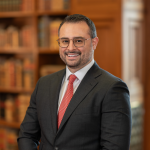
Anthony Sangiuliano
Postdoctoral Fellow University of Toronto
12:00 PM - 02:00 PM
Centre for Ethics, University of Toronto
200 Larkin - Fri, Nov 17, 2023
Race, Ethics + Power
Jeta Mulaj, Balkanization and The Racial Order (REP)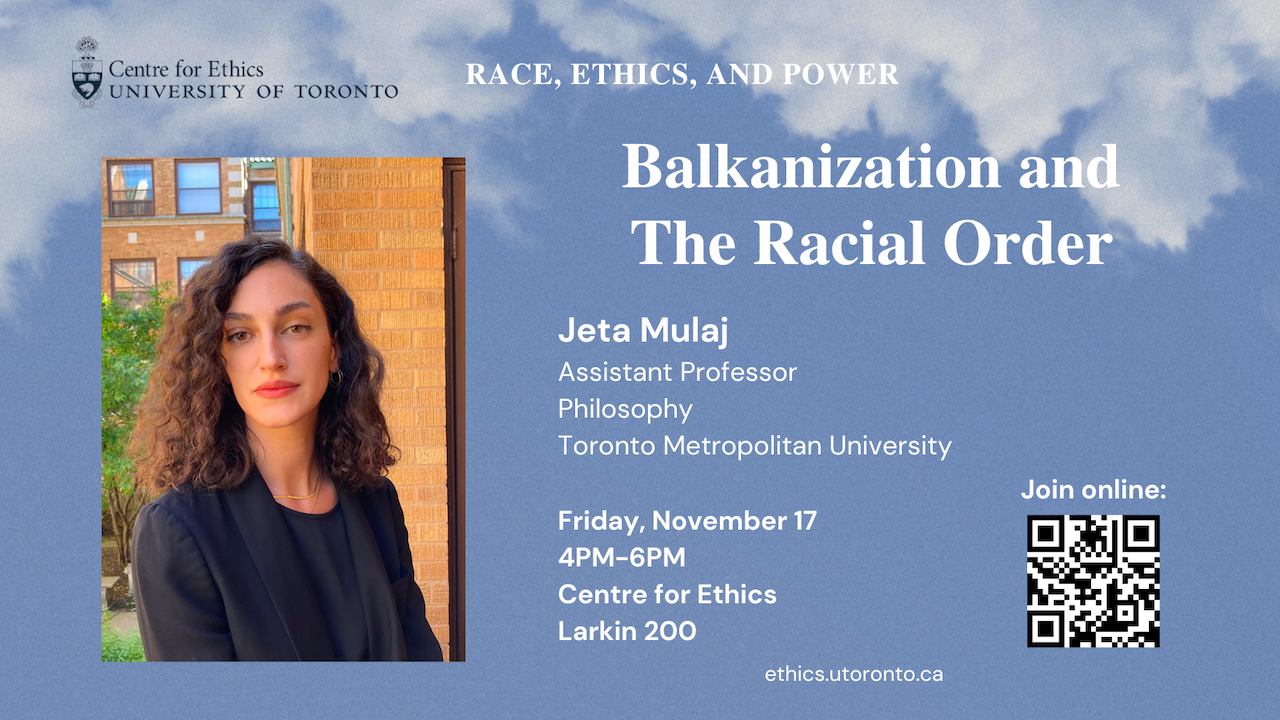
► To stay informed about other upcoming events at the Centre for Ethics, opportunities, and more, please sign up for our newsletter.
Balkanization and The Racial Order
Balkanization is understood to be a state of fragmentation characterized by perpetual ethnic conflict. It is often invoked in social, political, and legal theories as a shorthand for ethnic hatred, animosity, and conflict. It is also invoked in theories of race and racial relations in the U.S., where it is argued that balkanization is avoided through the shared oppression of Black people. Prominent scholars, like Toni Morrison and Derrick Bell, contend that without Black people as a scapegoat, the U.S. would descend into Balkanization. This talk analyzes the uses and abuses of the term Balkanization as well as the limitations and consequences of employing racialized metaphors for understanding racial relations.
► this event is hybrid. Join in person at the Centre for Ethics (Larkin building, room 200) or online here.

Jeta Mulaj Assistant Professor, Philosophy Toronto Metropolitan University
04:00 PM - 06:00 PM
Centre for Ethics, University of Toronto
200 Larkin - Wed, Nov 15, 2023
Ethics at Noon
Shannon Hoff, A Phenomenological Account of the Conditions of Transnational Feminism (Ethics@Noon-ish)
► To stay informed about other upcoming events at the Centre for Ethics, opportunities, and more, please sign up for our newsletter.
A Phenomenological Account of the Conditions of Transnational Feminism
In its various attempts to be intercultural, feminist theory and praxis originating in the Global North has often stumbled over its own presumptions about what counts as feminist liberation. This paper develops a critique of these missteps and a phenomenological foundation for genuinely intercultural engagement. Mobilizing in particular Serene Khader’s challenge to what she calls “missionary feminism,” the paper argues that the core values for transnational feminist praxis that Khader offers require greater normative justification that phenomenology can provide, with its foundational descriptions of both interpersonal life and human singularity. It mobilizes the work of John Russon and Saba Mahmood in order to develop normative support for Khader’s otherwise promising arguments.
► this event is hybrid. Join in person at the Centre for Ethics (Larkin building, room 200) or online here.

Shannon Hoff
Visiting Faculty Fellow Memorial University
12:00 PM - 02:00 PM
Centre for Ethics, University of Toronto
200 Larkin - Mon, Nov 13, 2023
Immigrants, Refugees, and Asylum Seekers
Amy Reed-Sandoval, Feminism and the Open Borders Debate (Immigrants, Refugees, and Asylum Seekers)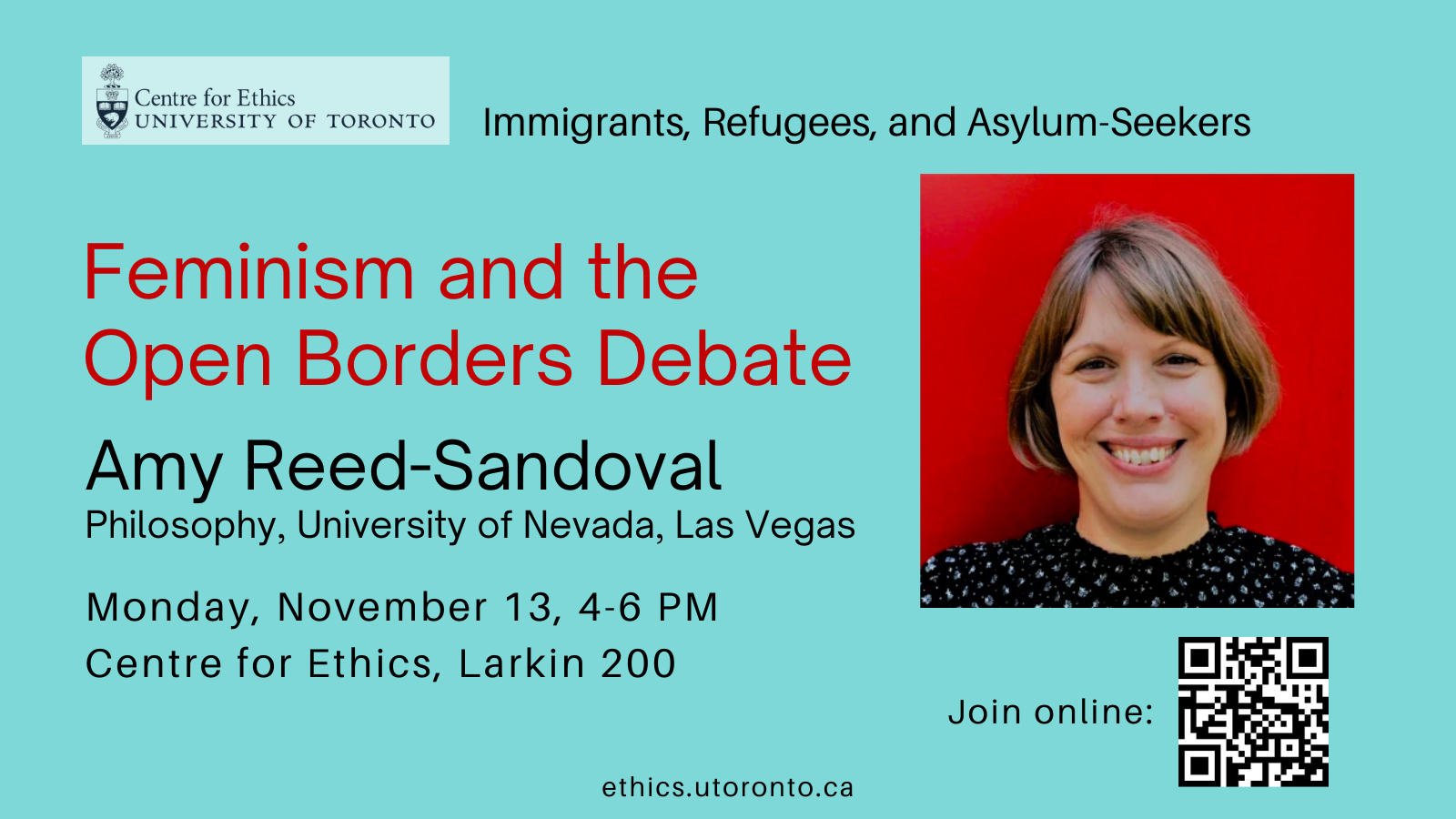
► To stay informed about other upcoming events at the Centre for Ethics, opportunities, and more, please sign up for our newsletter.
Feminism and the Open Borders Debate
The motivating question of the open borders debate–namely, do states have a prima facie right to maintain coercive borders and restrict immigration into their territories?–has not been taken up from an explicitly feminist perspective, and this presents difficulties for understanding the complex relationships between borders and gender justice. I argue that there are many reasons for this, among them a reluctance on the part of many feminist and decolonial scholars to present their ethical positions in universal terms. In this paper, I begin to develop a universal border ethic that, I argue, helps us to consider the open borders debate from a feminist, decolonial perspective. First, I explore a series of important, possible objections feminists may make to the framing of the open borders debate. Second, I respond to these objections by recasting the open borders debate in terms of what Serene Khader has called “non-ideal universalism” in her recent book, Decolonizing Universalism. Reframed in this way, I argue that immigration ethicists should not argue for a bordered or borderless world as an idealized end-state. Rather, we should explore the complicated relationship between borders and oppression. In so doing, we should consider established open borders debate arguments not as universally-applicable theories, but rather, as possible policy goals that may, or may not, reduce oppression in particular contexts.
► this event is hybrid. Join in person at the Centre for Ethics (Larkin building, room 200) or online here.

Amy Reed-Sandoval
Philosophy University of Nevada, Las Vegas
04:00 PM - 06:00 PM
Centre for Ethics, University of Toronto
200 Larkin - Wed, Nov 1, 2023
Ethics at Noon
David Benatar, A Preponderance of Injustice (Ethics@Noon-ish)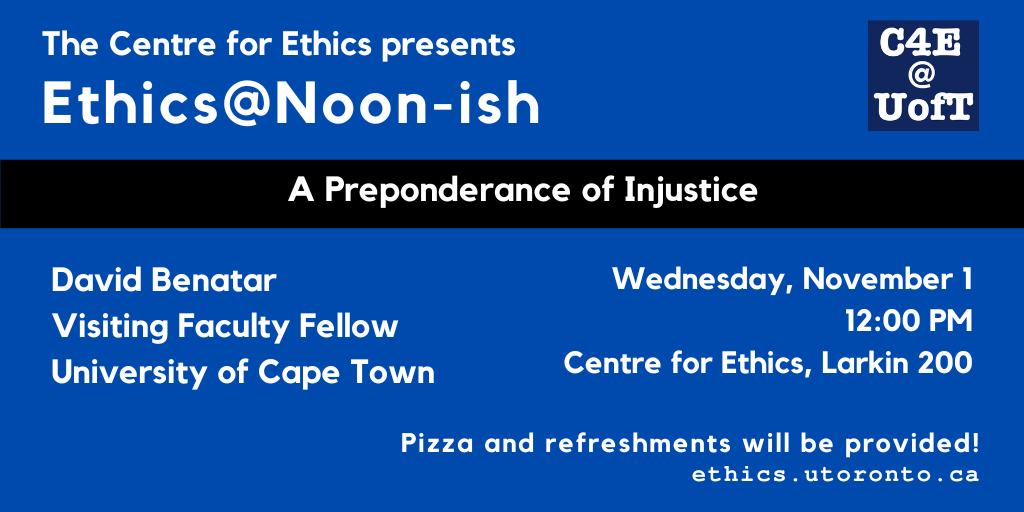
► To stay informed about other upcoming events at the Centre for Ethics, opportunities, and more, please sign up for our newsletter.
A Preponderance of Injustice
In this presentation I shall argue that there is vastly more injustice than justice. To the extent that this is not disputed, its implications are not fully appreciated. What is disputed, at least by some, is whether there is now less injustice than there once was. Various people have either claimed or argued that “the arc of the moral universe is long, but it bends towards justice”. I shall evaluate that claim too, arguing that it is partially true under some interpretations and false under others.
► this event is in person at the Centre for Ethics (Larkin building, room 200).

David Benatar
Visiting Faculty Fellow University of Cape Town
12:00 PM - 02:00 PM
Centre for Ethics, University of Toronto
200 Larkin - Fri, Oct 27, 2023
Conferences
Living with the Invisible Hand: A Conference in Memory of Waheed Hussain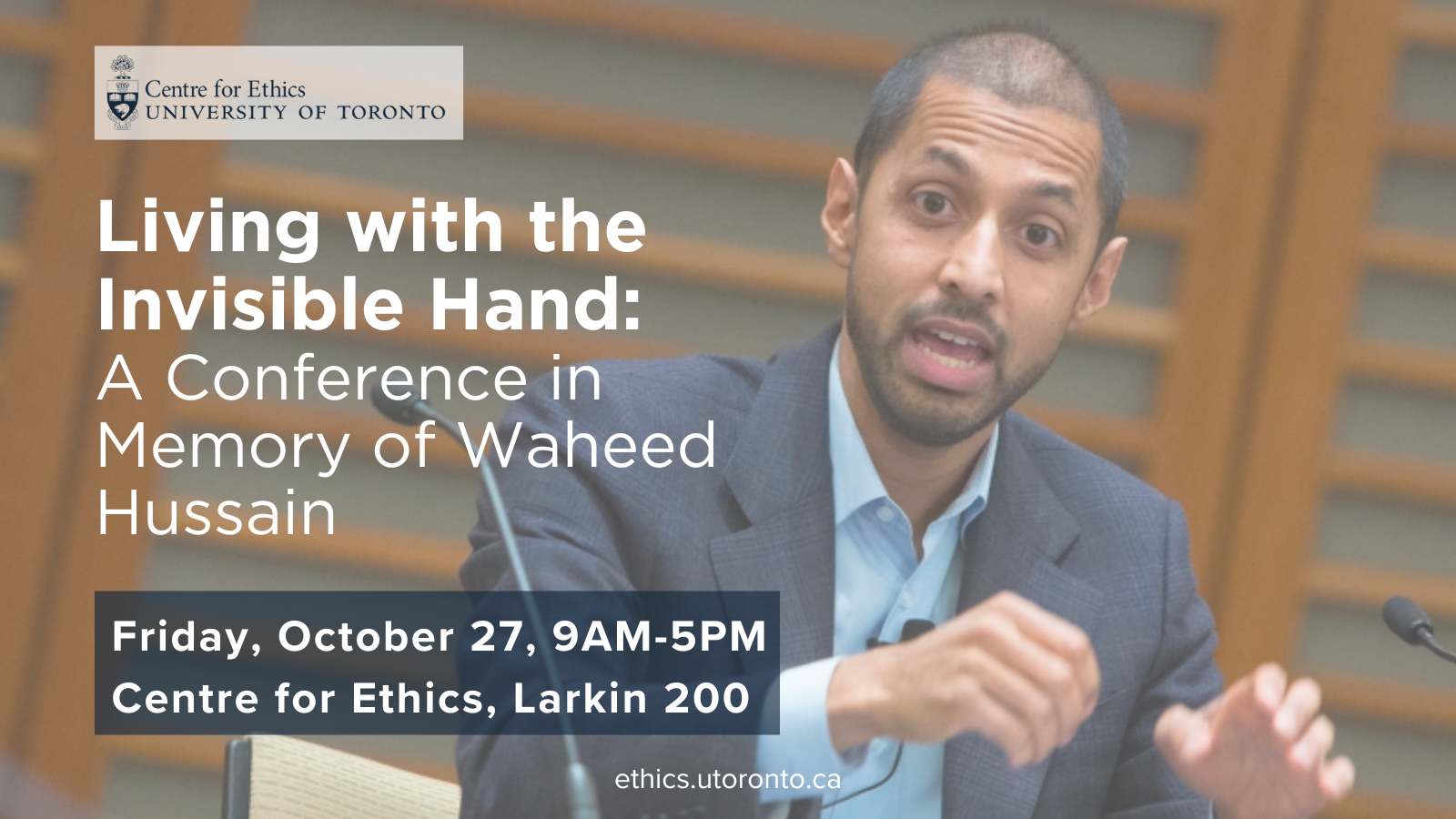
► To stay informed about other upcoming events at the Centre for Ethics, opportunities, and more, please sign up for our newsletter.
Living with the Invisible Hand: A Conference in Memory of Waheed Hussain
9:00-9:10 Welcome and introductory remarks
9:10-10:10 Andrew Franklin-Hall, Does the Invisible Hand Threaten Freedom?
10:20-11:20 Chiara Cordelli, On the Republican Critique of Capitalism
11:30-12:30 Louis-Philippe Hodgson, Markets and Freedom
12:30-1:40 Lunch break
1:40-2:40 Joseph Heath, Hussain on the Market: Critique or Kvetch?
2:50-3:50 Martin O’Neill, Community, Solidarity and the Sense of Justice
4:00-5:00 Eric Orts, Toward a Theory of Plural Business Purposes
► This event is hybrid. Join in person at the Centre for Ethics (Larkin building, room 200), or join online HERE. Register for the conference here.
09:00 AM - 05:00 PM
Centre for Ethics, University of Toronto
- Fri, Oct 20, 2023
Race, Ethics + Power
Zeyad el Nabolsy, A Place for African Philosophy in the Nineteenth Century: James Africanus Beale Horton’s Critique of Racist Philosophical Anthropology (REP)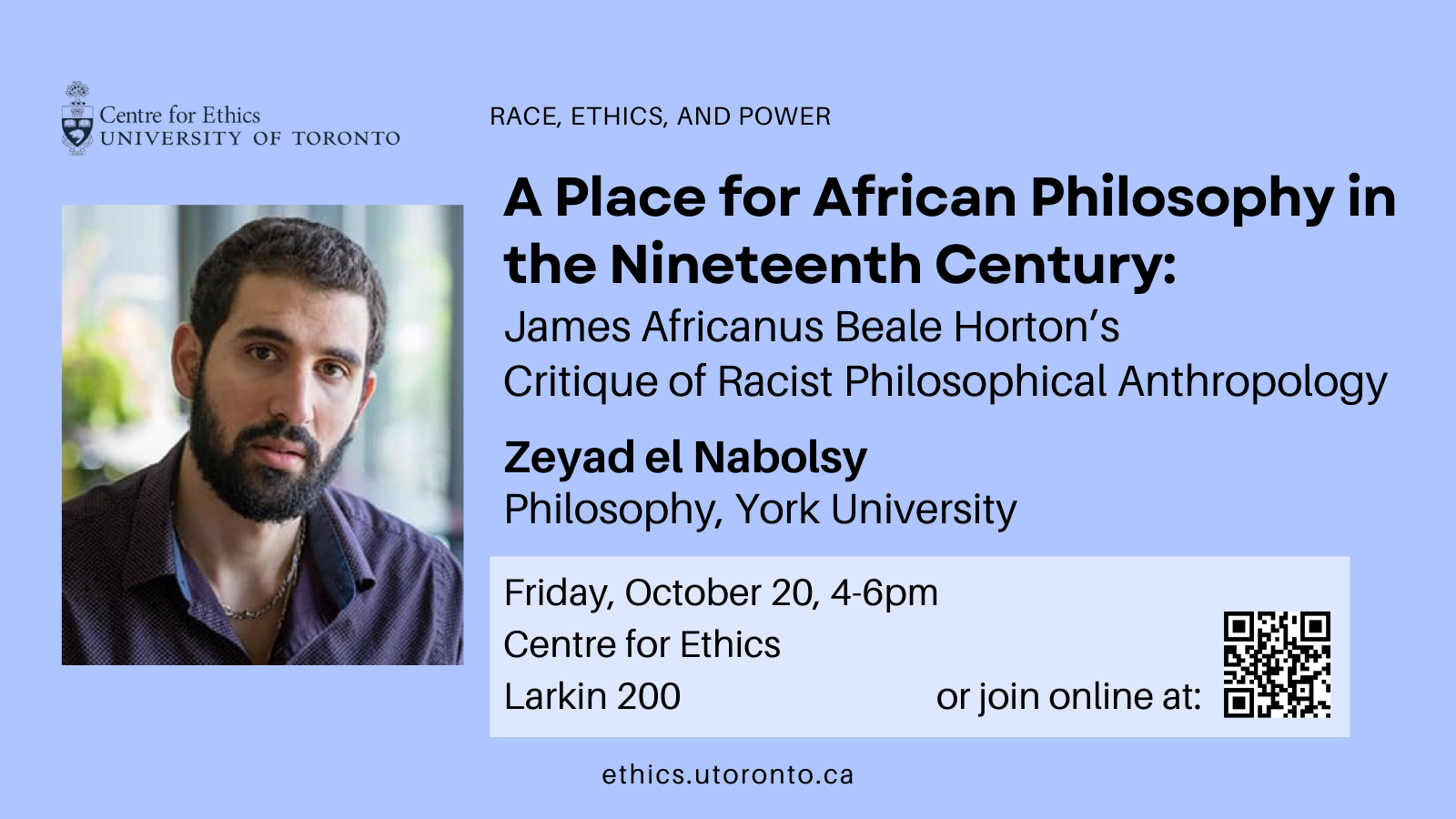
► To stay informed about other upcoming events at the Centre for Ethics, opportunities, and more, please sign up for our newsletter.
A Place for African Philosophy in the Nineteenth Century: James Africanus Beale Horton’s Critique of Racist Philosophical Anthropology
In this talk I attempt to show how one can go about integrating African philosophy into our accounts of developments in philosophy and science during the nineteenth century. In particular, I argue that focusing on the contributions of James Africanus Beale Horton allows us to bring into clear perspective elements which have been hitherto occluded from view. For example, Horton’s criticism of racist Victorian philosophical anthropology challenges the conventional narrative that race science was not seriously challenged on scientific grounds until the mid-twentieth century. Moreover, analyzing Horton’s contributions allows us to understand the manner in which the “naturalistic turn” in mid-nineteenth century philosophical discourse changed the terrain for those who wanted to argue for racial equality. Horton’s significance is that he offers us a way of understanding how one could challenge racist scientific discourse, in the mid-nineteenth century, without abandoning the naturalistic turn with its emphasis on establishing continuities between human forms of life and the forms of life that characterize non-human animals.
► this event is hybrid. Join in person at the Centre for Ethics (Larkin building, room 200) or join online here.

Zeyad el Nabolsy York University
04:00 PM - 06:00 PM
Centre for Ethics, University of Toronto
200 Larkin - Wed, Oct 18, 2023
Ethics at Noon
Martina Favaretto, A Kantian Account of Aesthetically Sublime Rage (Ethics@Noon-ish)
► To stay informed about other upcoming events at the Centre for Ethics, opportunities, and more, please sign up for our newsletter.
A Kantian Account of Aesthetically Sublime Rage
In Kant scholarship, little attention has been given to Kant’s claim in the Critique of the Power of Judgement that affects like rage and despair are “aesthetically sublime”. This neglect might suggest that Kant has nothing to say about these affects other than they are obstacles to proper reflection and that we have a duty to govern them (i.e., the duty of apathy). Moreover, it might look like Kant’s overall take on these affects is that they have a fully negative influence in how we conduct our lives. But this is not the case, or so I argue. In “A Kantian Account of Aesthetically Sublime Rage”, I focus on rage, and I argue that Kant’s account of rage as an “aesthetically sublime” affect allows us to infer that rage can have a distinctive social and political function in contexts of oppression. I argue that rage is “aesthetically sublime” because a) when one feels rage in response to a certain event (e.g., being subject to or witnessing racial injustice), a free play between imagination and a moral ideal (e.g., justice) takes place in one’s mind; and b) this rage does not play a motivational role for (immediate) action. Further, I assess the appropriateness of aesthetically sublime rage as a response to injustice. I argue that this kind of rage is appropriate in cases in which the agent genuinely and non-culpably does not know what to do as a reply to the injustice at stake.
► this event is hybrid. Join in person at the Centre for Ethics (Larkin building, room 200) or online here.

Martina Favaretto
Postdoctoral Fellow University of Toronto
12:00 PM - 02:00 PM
Centre for Ethics, University of Toronto
200 Larkin - Thu, Oct 5, 2023
Conferences
Women in the History of Political Thought: Labor, Property and the Family
► To stay informed about other upcoming events at the Centre for Ethics, opportunities, and more, please sign up for our newsletter.
Women in the History of Political Thought: Labor, Property and the Family
Speakers:
- Torrey Shanks (U of T)
- Allauren Forbes (McMaster)
- Geertje Bol (Ghent University)
- Mary Jo MacDonald (U of T)
- Luna Sabastian (Northeastern University London)
- Emily Nacol (U of T)
- Menaka Philips (U of T)
- Charlotte Sabourin (Douglas College)
- Kelsey Gordon (U of T)
- Marguerite Deslauriers (McGill)
► This event is in person at the Centre for Ethics (Larkin building, room 200).
12:00 AM - 11:59 PM
Centre for Ethics, University of Toronto
- Wed, Oct 4, 2023
Ethics at Noon
Larisa Svirsky, The Second-Personal Significance of Trauma (Ethics@Noon-ish)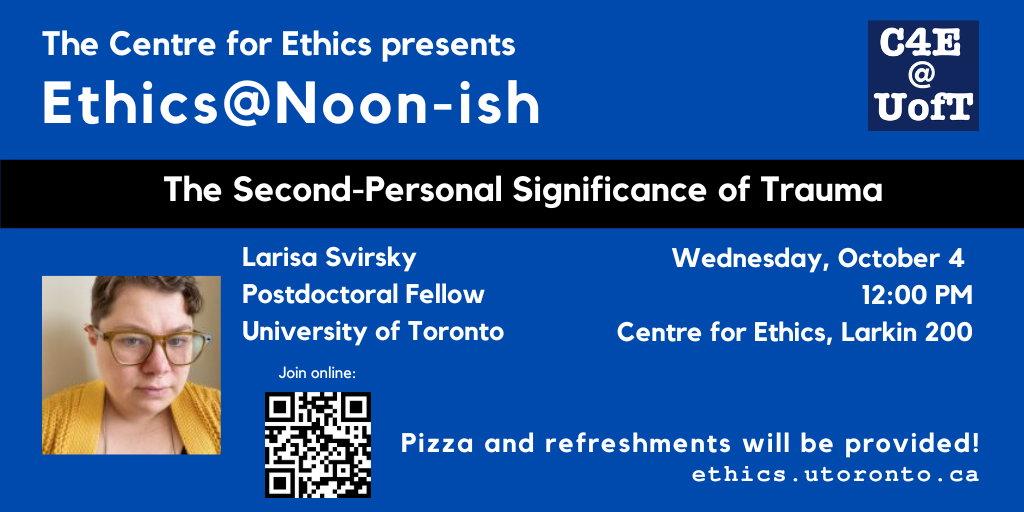
► To stay informed about other upcoming events at the Centre for Ethics, opportunities, and more, please sign up for our newsletter.
The Second-Personal Significance of Trauma
There is a substantial literature about whether trauma or other “poor formative circumstances” interfere with the development or exercise of the capacities required to be responsible. In this paper, I will be focusing on the ways in which trauma may affect responsibility attributions in the context of close interpersonal relationships. I will argue for two claims: first, that the question of whether trauma diminishes responsibility should be addressed in this second-personal context, and second, that in interpersonal relationships, it matters not only what hardships those close to us have experienced, but how they want us to respond to their history when holding them responsible. In order to illustrate these claims, I will consider an extended literary example drawn from the novel A Little Life. I take this example to offer clear and decisive reasons for why it is important to consider people’s views about what those close to them do with their history (e.g., whether they regard that history as excusing them from blame).
► this event is hybrid. Join in person at the Centre for Ethics (Larkin building, room 200) or online here.

Larisa Svirsky
Postdoctoral Fellow University of Toronto
12:00 PM - 02:00 PM
Centre for Ethics, University of Toronto
200 Larkin - Wed, Sep 27, 2023
Race, Ethics + Power
Kant on Race: Reevaluating Kant’s Moral Philosophy in Light of Kant’s Racism (REP)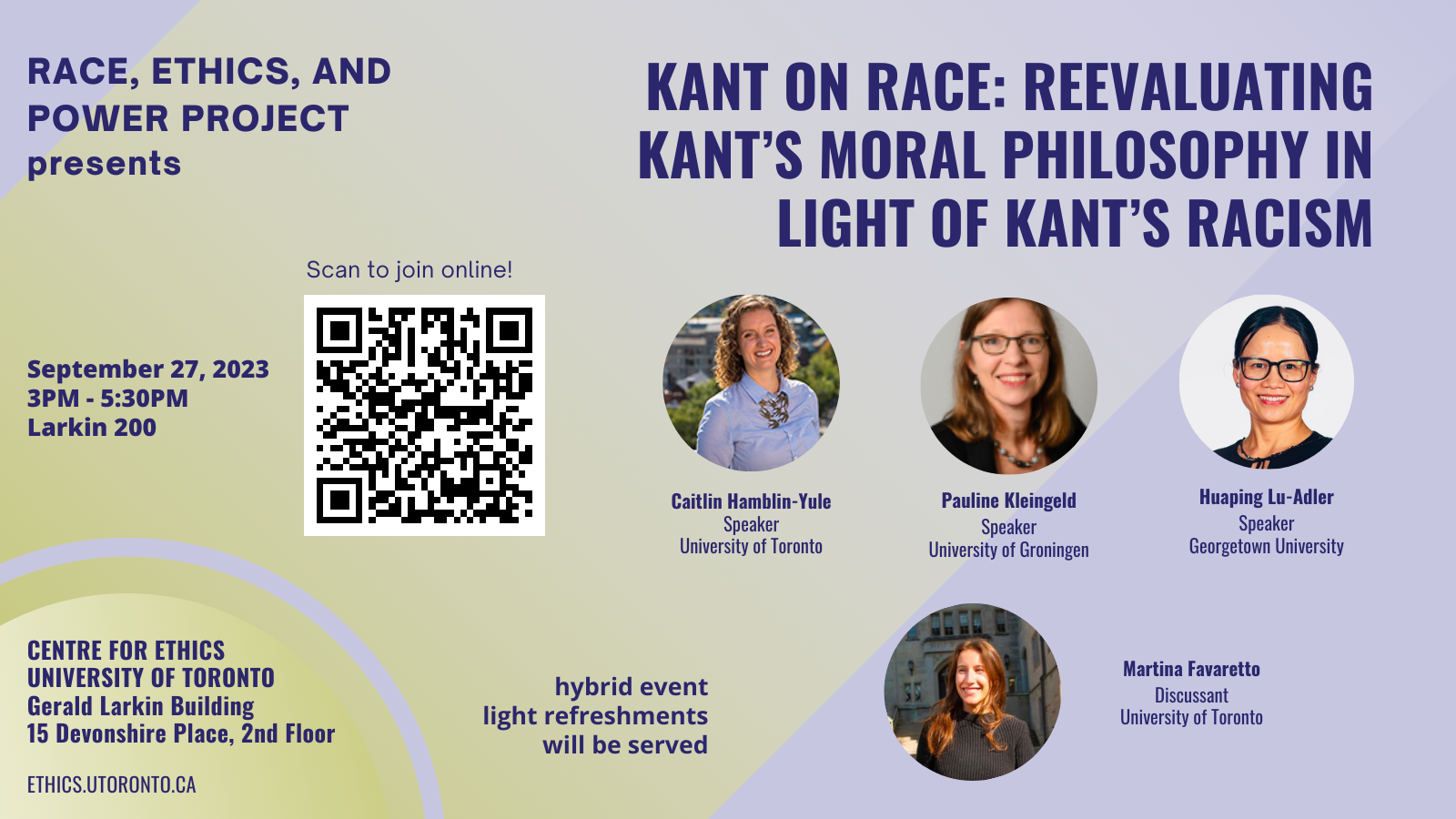
► To stay informed about other upcoming events at the Centre for Ethics, opportunities, and more, please sign up for our newsletter.
Kant on Race: Reevaluating Kant’s Moral Philosophy in Light of Kant’s Racism
This panel features the following speakers:
- Cailtin Hamblin-Yule, University of Toronto, Speaker
- Pauline Kleingeld, University of Groningen, Speaker
- Huaping Lu-Adler, Georgetown University, Speaker
- Martina Favaretto, University of Toronto, Discussant
► this event is hybrid. Join in person at the Centre for Ethics (Larkin building, room 200) or join online here.
03:00 PM - 05:00 PM
Centre for Ethics, University of Toronto
200 Larkin - Wed, Sep 20, 2023
Ethics at Noon
Joel Anderson, Assistive Technologies for Self-Control in the Context of Structural Attributional Justice (Ethics@Noon-ish)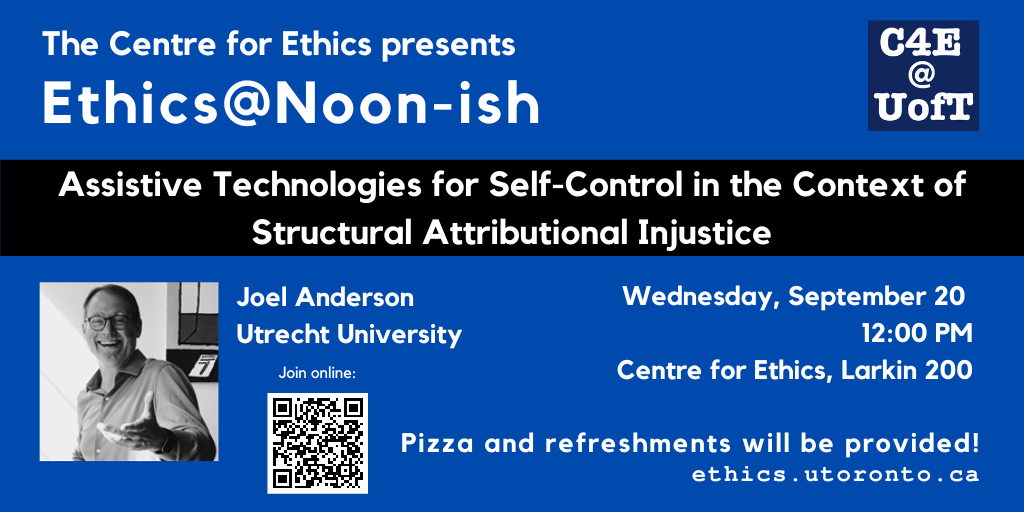
► To stay informed about other upcoming events at the Centre for Ethics, opportunities, and more, please sign up for our newsletter.
Assistive Technologies for Self-Control in the Context of Structural Attributional Injustice
Social justice is not just a matter of non-discrimination but also of inclusion, of being able to secure uptake in social cooperation. One of the key determinants of the extent to which one can fully participate in society is that one is taken to be sufficiently competent in the relevant sense by those other participants in the relevant social practices and institutional context. As has often been noted, injustice can take the form of systematically bias in the attribution of competence, especially in the refusal to recognize competent individuals as such, or in the reliance on arbitrary criteria for competence. In addition to these concerns about testimonial or hermeneutical injustice, there are also concerns about whether individuals have real opportunities for (1) co-determining the “entry requirements” for social practices and (2) developing the capacities that are legitimately expected. In our cooperative endeavors, one particularly significant expectation is that we can trust others to be able to exercise the requisite degree of self-control. “Autonomy gaps” in this domain can be especially marginalizing. Self-regulatory capacities do, however, vary significantly, and the basis for their attribution is fraught and contested. This context of the power-ridden pragmatics of competence-attribution has significant implications for how we ought to approach an emerging set of technologies that offer support for self-control and, more broadly, for various forms of “scaffolded” or “extended” willpower.
► this event is hybrid. Join in person at the Centre for Ethics (Larkin building, room 200) or online here.

Joel Anderson
Utrecht University
12:00 PM - 01:30 PM
Centre for Ethics, University of Toronto
200 Larkin - Mon, Sep 18, 2023
Race, Ethics + Power, Educational Ethics
Winston Thompson, On the Ethics of Teaching Race (REP and Educational Ethics Series)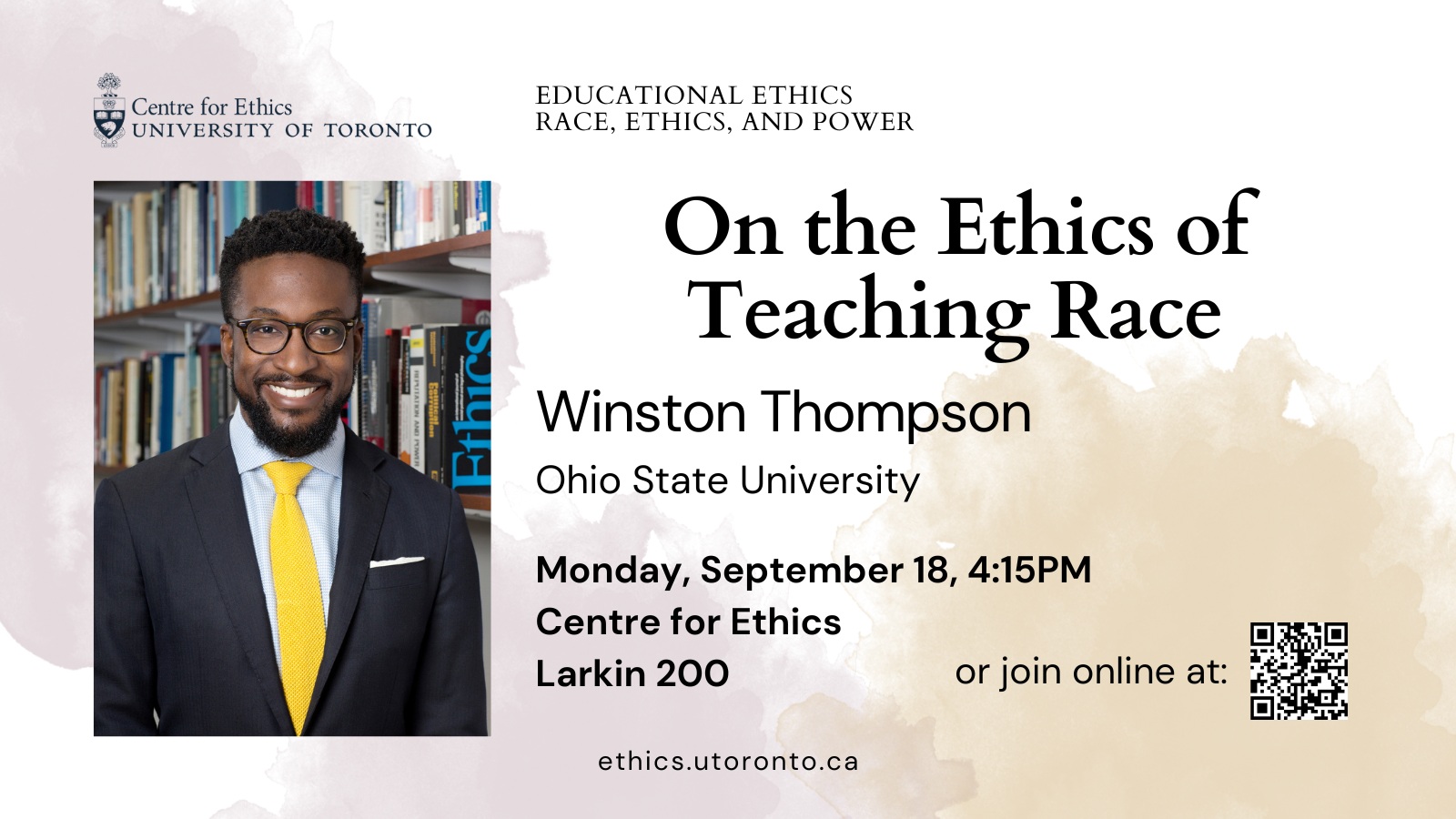
► To stay informed about other upcoming events at the Centre for Ethics, opportunities, and more, please sign up for our newsletter.
On the Ethics of Teaching Race
Thompson’s talk focuses on race as a potential subject of instruction and analyzes ethical matters related to placing race on the curriculum in this way. In doing so, it highlights the possibility of coherence between some of the more popular approaches to teaching race as a subject. At its core, the talk considers whether and how these approaches to race as a subject of instruction might be compatible with one another. In doing so, it will explore varied understandings of race and the complexity of racial identity formation as a pedagogical goal. Given the bounty of existing work on the subject, it will also provide a brief overview of arguments for and against what is commonly understood as antiracist education.
► this event is hybrid. Join in person at the Centre for Ethics (Larkin building, room 200) or join online here.

Winston Thompson Ohio State University
04:00 PM - 06:00 PM
Centre for Ethics, University of Toronto
200 Larkin - Sat, Jun 10, 2023
Conferences
Ethics and Progress (C4E Undergraduate Research Conference 2023)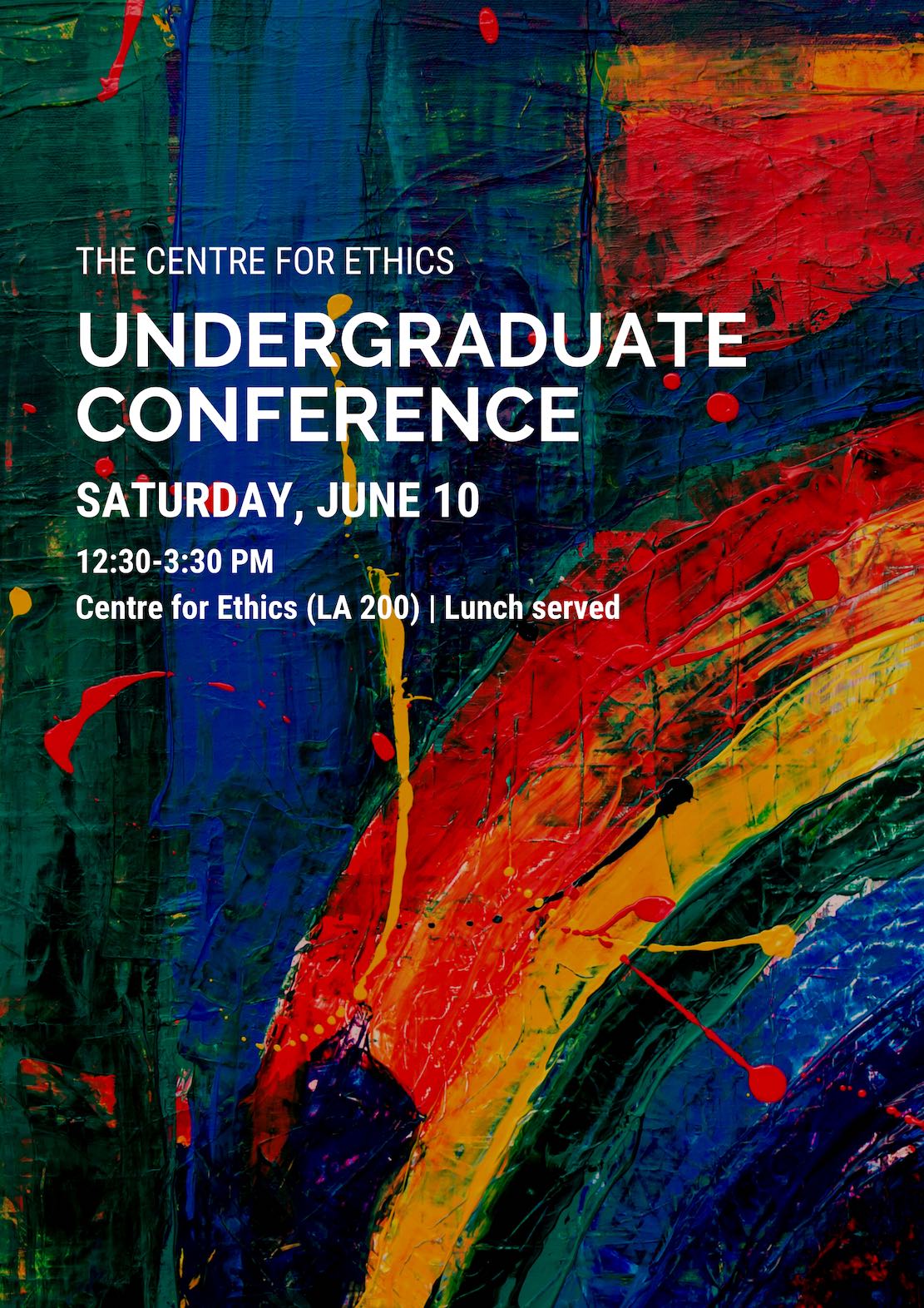
C4E’s 2023 Undergraduate Conference: Ethics and Progress
Conference Schedule
12:30 Doors open – lunch
1:00 Opening Remarks
Panel 1
1:10 – Prajna Pendharkar “Tangible Novelty: What Apple and the Metaverse Are Teaching Us About Multifunctional Product Launches”
1:25 – Joseph Boyce “Numbers that Matter: Valuing Human Lives as Objects”
1:40 – Jonathan Ku, “Spatial Injustice in the Urban Environment: Development and Discourse in Toronto”
1:55 – Rayan Magon “On Autistic Authenticity and Social Approval: Evaluating the Ethics of Applied Behavioral Analysis”
[20-minute break: 2:10-2:30]
Panel 2
2:30 – Martin Sneath “Why is there no evidence of linguistic contact in North American Languages?”
2:45 – Krishna Kant Moda “Ripples of Homeland: Oceanic Abolitionist Praxis and the Geopoetics of Being”
3:00 – Aidan Mitchell Boudreau “Group Privacy and Indigenous Data Sovereignty”
3:15 – Ethan Persyko “The Future of Intimacy Coordination in TV: Where Does Certification Falter?”
12:30 PM - 03:30 PM
Centre for Ethics, University of Toronto
- Thu, May 25, 2023
Maya Goldenberg, Myth-Busting or Meaning-Making? Public Science Communications and the Infodemic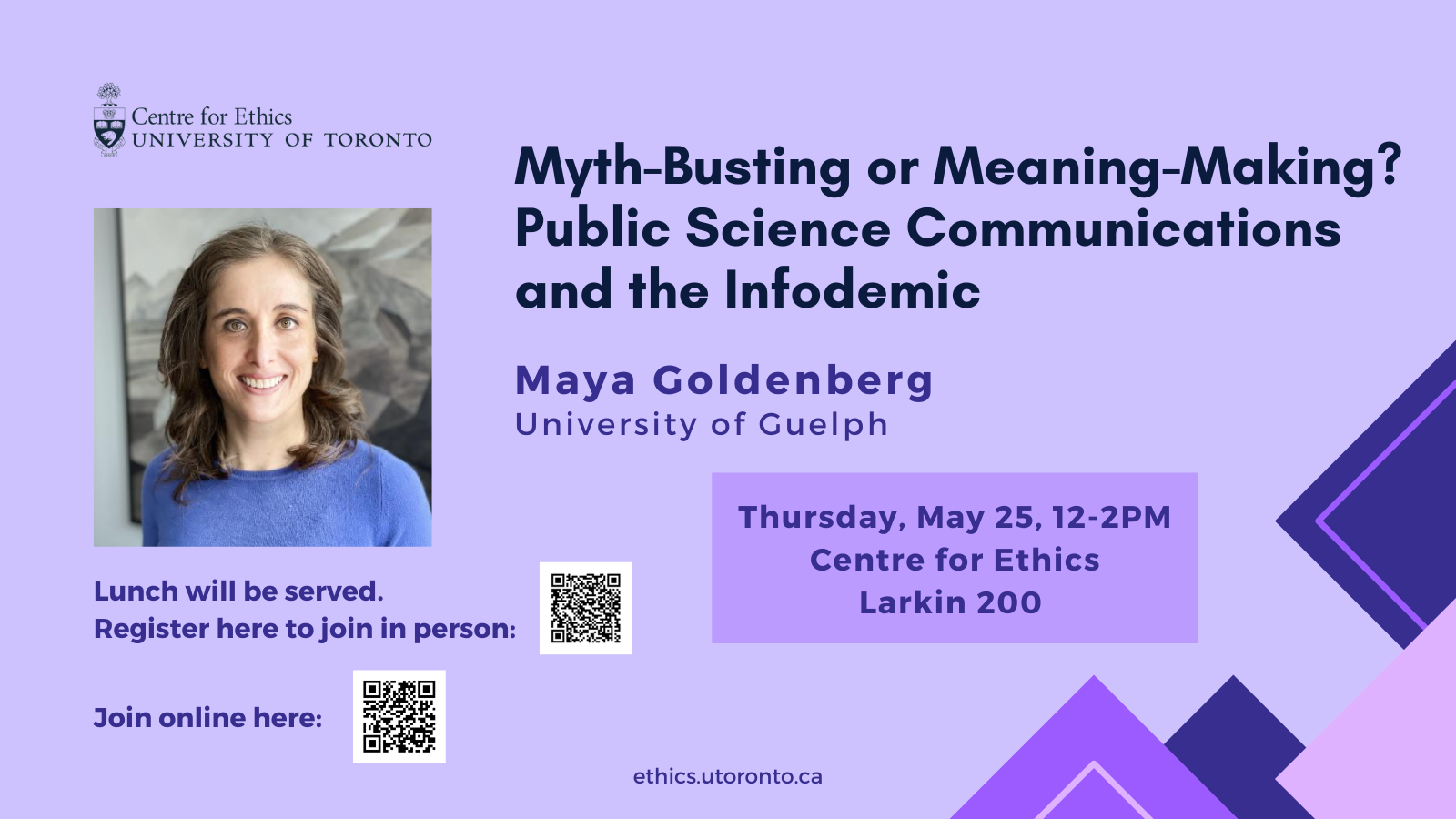
► To stay informed about other upcoming events at the Centre for Ethics, opportunities, and more, please sign up for our newsletter.
Myth-Busting or Meaning-Making? Public Science Communications and the Infodemic
A growth area of public-facing science communications during the COVID years has been the counter-offence against misinformation, sometimes called the “infodemic.” Since the start of the pandemic, legions of well-intended healthcare practitioners, scientists, and concerned citizens have taken to social media platforms to debunk myths and provide corrective facts. These efforts were buoyed by emerging cognitive and social psychology research into strategies for addressing misinformation, such as debunking, pre-emptive inoculation, and nudging. Yet this concentrated focus on the epistemic status of propositional claims has serious limits. The field of communications research offers important insights that undermine the soundness of “myth-versus-fact” message frames as communications practice. Serious consideration of communication as meaning-making, especially in the fraught social context in which the infodemic has flourished, points to difficulties with the interpretive story line that the myth-busting message frame conveys. These considerations support an alternative focus on trust-building for science communications to the publics.
Lunch will be served.
► this event is hybrid. Register here to join in person, at the Centre for Ethics (Larkin building, room 200). Join online here.

Maya Goldenberg University of Guelph
12:00 PM - 02:00 PM
Centre for Ethics, University of Toronto
200 Larkin - Fri, May 5, 2023
Sara Aronowitz, The Ethics and Dynamics of Remembering Together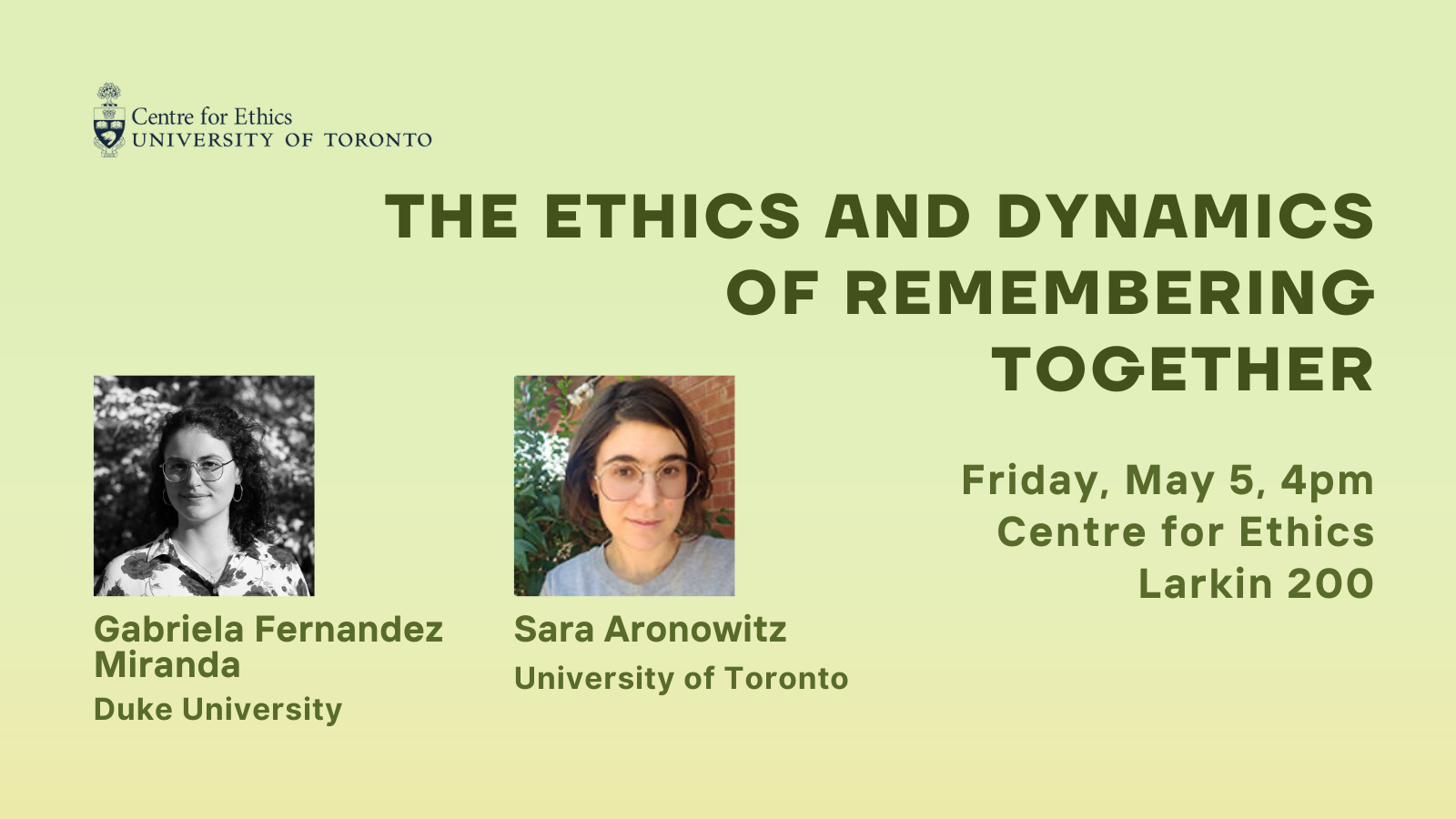
► To stay informed about other upcoming events at the Centre for Ethics, opportunities, and more, please sign up for our newsletter.
The Ethics and Dynamics of Remembering Together
Memories that are discussed and shared in groups seem to have different dynamics over time than those which we keep to ourselves. In this talk, we’ll first suggest that sharing memories induces stability, according to several prominent theories of shared action. Then, we ask: is stability in memory reappraisal a good thing? The second half of the talk puzzles through various answers to this question.
► this event is in-person at the Centre for Ethics (Larkin building, room 200).

Sara Aronowitz University of Toronto
04:00 PM - 06:00 PM
Centre for Ethics, University of Toronto
200 Larkin - Fri, May 5, 2023
Reading Series
New Books in Sex and Ethics Reading Group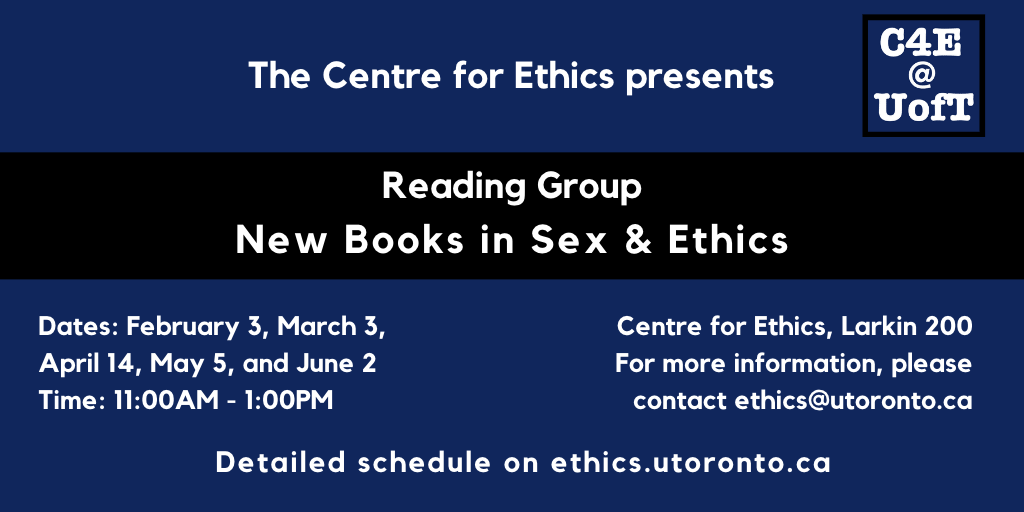
► To stay informed about other upcoming events at the Centre for Ethics, opportunities, and more, please sign up for our newsletter.
New Books in Sex and Ethics Reading Group
Organized by Professor John Paul Ricco (Comparative Literature, Art History, Visual Studies)
Graduate Students, Faculty, Postdoctoral Fellows, and Advanced Undergraduates are invited to join this Reading Group, where we will discuss some of the top books recently published on the topic of sex and ethics.
► The reading group will be held in-person at the Centre for Ethics (Larkin building, room 200)
Reading group dates:
- February 3, 2023: Katherine Angel, Tomorrow Sex Will be Good Again: Women and Desire in the Age of Consent (2021)
- March 3, 2023: Amia Srinivasan, The Right to Sex: Feminism in the Twenty-First Century (2021)
- April 14, 2023: Oliver Davis and Tim Dean, The Hatred of Sex (2021)
- May 5, 2023: Jean-Luc Nancy, Sexistence (2021)
- June 2, 2023: Avgi Saketopoulou, Sexuality Beyond Consent: Risk, Race, Traumatophilia (February 2023)
Participants are asked to acquire their own copies of the books. The Hatred of Sex and Sexistence are available online through the University of Toronto library catalogue. The other books will be put on hold at Robarts. If you need help finding a copy of any book, please contact Lauren Bialystok at lauren.bialystok@utoronto.ca.
11:00 AM - 01:00 PMNo RSVP required, but if you plan to participate for the term, it would help to let us know in advance. Please contact ethics@utoronto.ca.
► For more information, please contact ethics@utoronto.ca
Centre for Ethics, University of Toronto
200 Larkin - Wed, Apr 26, 2023
Radical and Critical Approaches to Understanding and Supporting Mental Health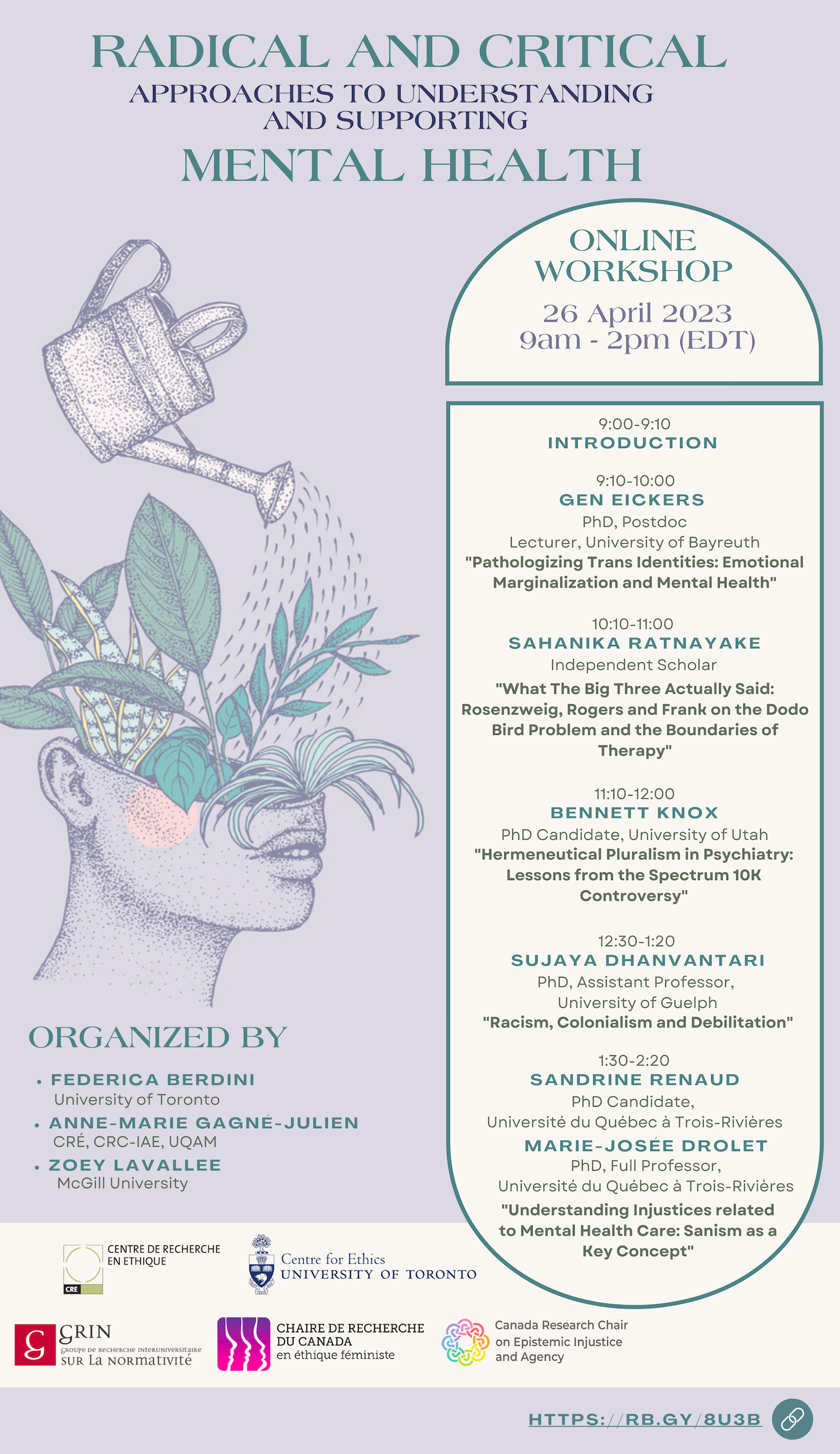
► To stay informed about other upcoming events at the Centre for Ethics, opportunities, and more, please sign up for our newsletter.
Radical and Critical Approaches to Understanding and Supporting Mental Health
► this workshop is online. Register here.
Speakers & Abstracts
-
Gen Eickers: ‘Pathologizing Trans Identities: Emotional Marginalization and Mental Health’
In recent years, an array of critical emotion theorists have emerged who call for change with respect to how emotion theory is done, how emotions are understood, and how we do emotion. In this talk, I draw on the work that some of these authors have produced to analyze how emotional marginalization of trans identities is experienced, considering in particular how this emotional marginalization results from the long history of pathologization of trans people. The past and current pathologization of trans people is produced through normative assumptions, values, and beliefs that uphold systems of normalcy, including assumptions, values, and beliefs about how we feel and express emotions. In order to examine these issues, I identify three different stages at which emotional marginalization may take place: emotion experience, emotional display, and emotion recognition. Emotional marginalization of trans people can occur at any of these stages. The central concern here is thus to show how emotional marginalization, at each of these stages, affects trans people, especially considering questions around the mental health of trans people.
-
Sahanika Ratnayake: ‘What The Big Three Actually Said: Rosenzweig, Rogers and Frank on the Dodo Bird Problem and the Boundaries of Therapy’
In contemporary research, the “Dodo Bird Problem” or the “common factors” debate is a highly specific problem in research on talking therapy. It refers to the finding that most therapeutic modalities perform on par with with each other, raising the question of what the “active ingredients” of therapy are — whether they are factors common across various schools of therapy, such as an empathetic therapeutic relationship or factors specific to particular schools of therapy such as specialised therapeutic techniques or theoretical framings.
However, historical debates about the Dodo Bird Problem are far more nuanced, raising questions not only about research on therapy, but the exact boundaries and nature of therapy. In this talk, I will consider the work of three theorists — Saul Rosenzweig, Carl Rogers and Jerome Frank — who are cited as a matter of course in contemporary discussions of the Dodo Bird problem, with little regard for the complexities of what they actually said.
For instance, Rogers maintains that it is a therapeutic relationship with specific characteristics that is responsible for the efficacy of therapy. However, Rogers then goes on to say something far more controversial — that any relationship with these characteristics can be therapeutic or healing. This raises questions about the particular expertise of those delivering talking therapy and the boundaries of therapeutic relationships. Similar questions about expertise and what can be understood as “therapeutic” are posed by Rosenzweig and Frank.
In excavating historical discussions of the Dodo Bird problem, I hope to not only to interrogate what kinds of things and relationships can be considered therapeutic according to these thinkers, but also track the medicalisation of research into talking therapy by considering how the Dodo Bird problem was recast in contemporary literature.
-
Bennett Knox: ‘Hermeneutical Pluralism in Psychiatry: Lessons from the Spectrum 10K Controversy’
“In this presentation I will develop a view I call “hermeneutical pluralism” in psychiatry, through critical engagement with a recent controversy in psychiatric science. Spectrum 10K—which promises to be the largest genetic study on autism in the history of the UK—was paused in 2021 after an outcry from autistic academics and activists, many of whom understand autism according to the neurodiversity paradigm. It is currently undergoing a consultation process with the autistic community, in an attempt to address some of these concerns. Utilizing the moral imagination framework of Matthew J. Brown from Science and Moral Imagination (2020), I will outline some lessons we can draw from Spectrum 10K that can help develop a theory of the proper relationship between psychiatric science and the neurodiversity movement. My central claim is that productive engagement between these two groups requires both: 1) psychiatric scientists who are themselves neurodivergent and subscribe to the neurodiversity paradigm, and 2) a robust knowledge system developed by neurodiversity activists and scholars which is somewhat independent of psychiatric science. It is this requirement of an independent neurodiversity knowledge system which makes my view pluralist: it is important that the interpretations of the neurodiversity movement not be fully assimilated by psychiatric science, as this would risk robbing the neurodiversity movement of the radical nature of its critiques.”
-
Sujaya Dhanvantari: ‘Racism, Colonialism and Debilitation’
In this paper, I show that the unequal distribution of precarity moulds the racialized and colonized with forms of “undiagnosed” pain and trauma. Drawing on Alia Al-Saji’s concept of “racialized time,” I aim to reveal the ways in which racial and colonial pasts structure the present experience. I also weave in Saidiya Hartman’s work on the legacies of slavery shaping individual and collective bodies as pained. Critiquing Judith Butler’s term precarity, I argue for a more nuanced understanding of the specific historical markers of precarity that render racialized bodies more susceptible and exposed to illness and trauma. These markers, I contend, are borne intergenerationally. Finally, I suggest that the term “racialized precarity” can help us to elucidate these more prevalent exposures to chronic illness, disability, and death. Furthermore, it can help us to develop decolonial approaches for addressing the racial and colonial coordinates of debilitation.
-
Sandrine Renaud: ‘Understanding Injustices related to Mental Health Care: Sanism as a Key Concept’
People categorized as having a mental health disorder experience injustices in their interactions with health care systems which contribute, among other things, to a degraded quality of care and services, a loss of agency, and even a denial of fundamental rights. To understand these injustices, many different concepts are used in the literature, such as stigma, social exclusion, epistemic injustice, occupational injustice and sanism. This presentation, based on my ongoing doctoral research, aims to (1) map the use of these concepts in the academic and activist literature and (2) situate sanism as a key concept to understand injustices related to mental health care. Sanism is defined as the systemic oppression of those categorized as having a mental health disorder or as not being “sane”. Building on the work of Mad activists and scholars, I argue that this concept is best suited to explain the structural mechanisms and social determinants that perpetuate mental health injustices, and thus, to propose relevant strategies to overcome them.
The workshop, organized by Federica Berdini, Anne-Marie Gagné-Julien, and Zoey Lavallee, is co-sponsored by the Centre de Recherche en Éthique, Montréal (CRÉ), the Centre for Ethics, University of Toronto (C4E), the Groupe de recherche interuniversitaire sur la normativité (GRIN), the Canada Research Chair on Feminist Ethics (CREF), and the Canada Research Chair on Epistemic Injustice and Agency (CRC-IAE)
09:00 AM - 02:00 PM
Centre for Ethics, University of Toronto
200 Larkin -
- Fri, Apr 21, 2023
Allison Weir, Radical Care as Political Freedom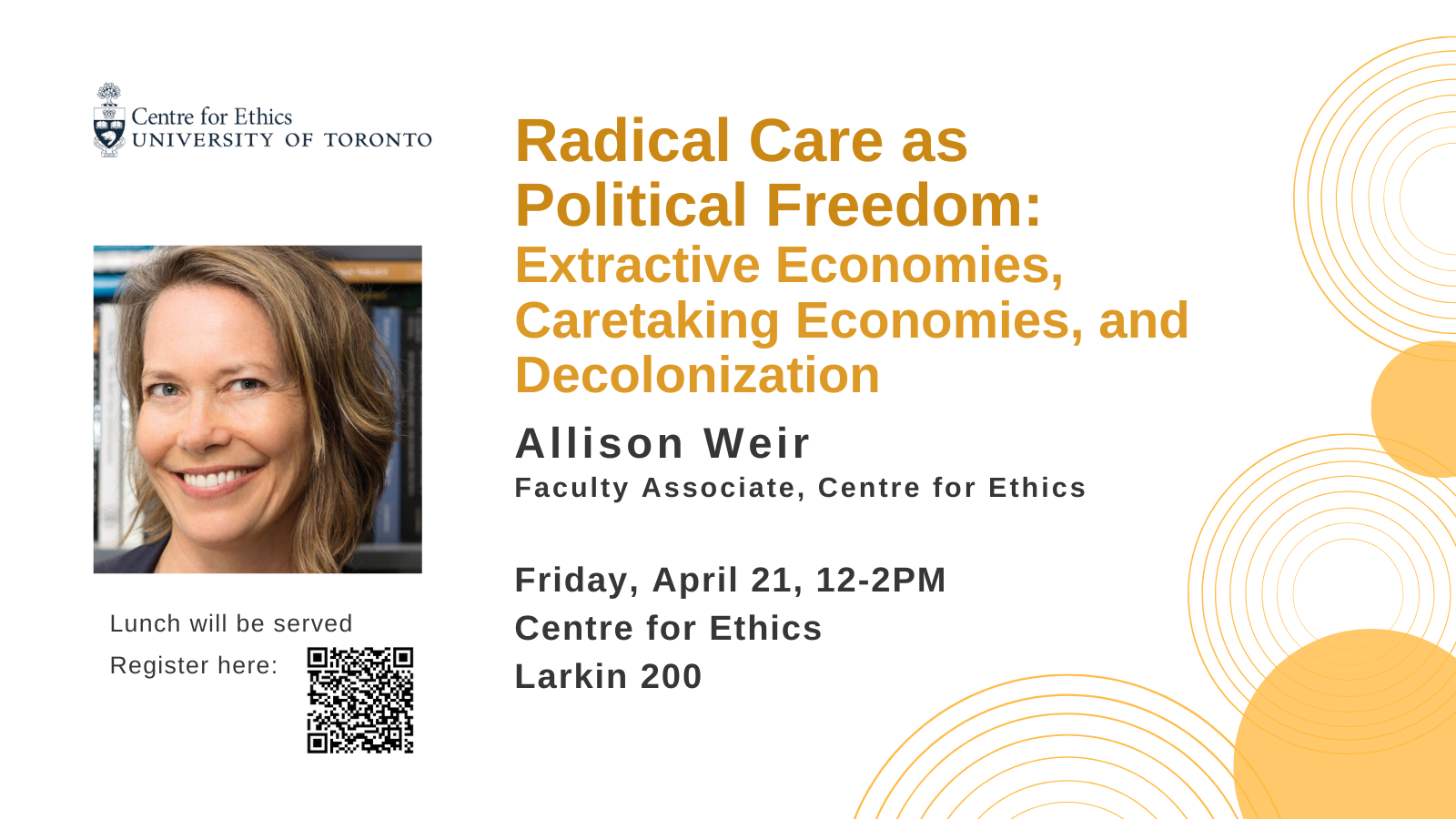
► To stay informed about other upcoming events at the Centre for Ethics, opportunities, and more, please sign up for our newsletter.
Radical Care as Political Freedom: Extractive Economies, Caretaking Economies, and Decolonization
In this paper I consider the links between extractive economies, autocratic regimes, the conception of freedom as a right to property, and the extraction of care as a resource. And I contrast this constellation with a system of radical democratic governance organized around a conception of freedom as a practice of care for land, rooted in gift economies: caretaking economies.
Hannah Arendt argued that the privatization of freedom based in ownership of property ultimately upholds the right to destroy what one owns: freedom as autocracy. We can see this understanding of freedom as freedom not to care. The privatization of freedom is dependent on the privatization of feminized and racialized care: on the extraction of care as a resource.
In contrast, Anishinaabe theorists Leanne Betasamosake Simpson and John Borrows advocate the resurgence of freedom as a practice of active care for land, where land is understood as a system of relations among interdependent beings. I understand this as a distinctive political conception of freedom as a radically democratic practice: a mode of engagement and participation in social and political relations with an infinite range of strange and diverse beings perceived as free agents in a field of uncertain, unpredictable, changing relations, to create and recreate the world in which we live together.
These practices of radical care and freedom can be taken as models for coalitional movements—what Simpson calls constellations of co-resistance—to support the risk of connection with a diversity of strange others, meeting conflict and potential danger with fierce care for the world.
► this event is in-person at the Centre for Ethics (Larkin building, room 200). Register here.

Allison Weir Faculty Associate, Centre for Ethics
Allison Weir is a visiting scholar of social and political philosophy in the Centre for Ethics at the University of Toronto, and a Fellow of the Centre for Humanities and Social Change at the Humboldt University in Berlin. She co-founded the Institute for Social Justice in Sydney, Australia, where she was Research Professor and Director of the Doctoral Program in Social Political Thought. Her book, Decolonizing Freedom, is forthcoming from Oxford University Press. She is the author of Identities and Freedom and Sacrificial Logics: Feminist Theory and the Critique of Identity.
12:00 PM - 02:00 PM
Centre for Ethics, University of Toronto
200 Larkin - Fri, Apr 14, 2023
Reading Series
New Books in Sex and Ethics Reading Group
► To stay informed about other upcoming events at the Centre for Ethics, opportunities, and more, please sign up for our newsletter.
New Books in Sex and Ethics Reading Group
Organized by Professor John Paul Ricco (Comparative Literature, Art History, Visual Studies)
Graduate Students, Faculty, Postdoctoral Fellows, and Advanced Undergraduates are invited to join this Reading Group, where we will discuss some of the top books recently published on the topic of sex and ethics.
► The reading group will be held in-person at the Centre for Ethics (Larkin building, room 200)
Reading group dates:
- February 3, 2023: Katherine Angel, Tomorrow Sex Will be Good Again: Women and Desire in the Age of Consent (2021)
- March 3, 2023: Amia Srinivasan, The Right to Sex: Feminism in the Twenty-First Century (2021)
- April 14, 2023: Oliver Davis and Tim Dean, The Hatred of Sex (2021)
- May 5, 2023: Jean-Luc Nancy, Sexistence (2021)
- June 2, 2023: Avgi Saketopoulou, Sexuality Beyond Consent: Risk, Race, Traumatophilia (February 2023)
Participants are asked to acquire their own copies of the books. The Hatred of Sex and Sexistence are available online through the University of Toronto library catalogue. The other books will be put on hold at Robarts. If you need help finding a copy of any book, please contact Lauren Bialystok at lauren.bialystok@utoronto.ca.
11:00 AM - 01:00 PMNo RSVP required, but if you plan to participate for the term, it would help to let us know in advance. Please contact ethics@utoronto.ca.
► For more information, please contact ethics@utoronto.ca
Centre for Ethics, University of Toronto
200 Larkin - Thu, Mar 30, 2023
Saba Bazargan-Forward, Individual Accountability for Cooperatively Committed Wrongs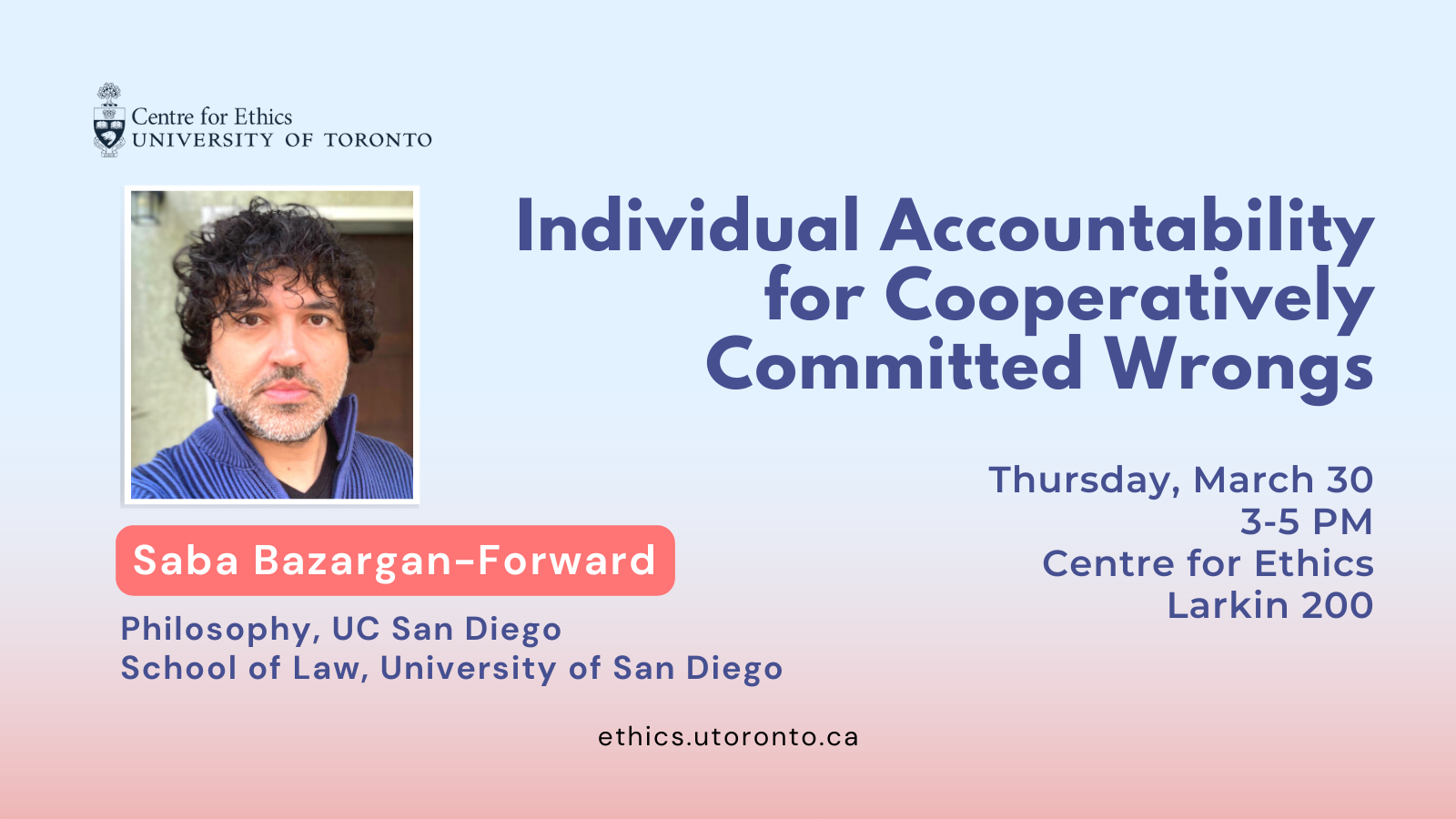
► To stay informed about other upcoming events at the Centre for Ethics, opportunities, and more, please sign up for our newsletter.
Individual Accountability for Cooperatively Committed Wrongs
Consider a group of individuals cooperating in a way that results in a collectively committed wrong. Some of the individuals contribute a lot. Others contribute little. Some fail to contribute anything at all. How do we make sense of individual accountability in such cases? We might think that each individual’s accountability is limited by her causal contribution. But this sort of account is infamous for its counterintuitive implications. I present an alternative account. I make the case for thinking that distinct aspects of human agency, normally “wrapped up” in a single person, can be “distributed” practically across different people. We “distribute” agency routinely, by forming promises, by making requests, by issuing demands, and by undertaking shared action. This resulting division of agential labor makes possible a distinctive way in which one person can be accountable for the actions of another. More specifically, cooperants have the function of constitutively determining the purpose for which the others act. I analyze such a purpose by invoking Joseph Raz’s conception of a ‘protected reason’. Where the purpose that a cooperant furnishes is morally bad, she can be accountable for that wrong-making feature of what the others do. I call this phenomenon “authority-based accountability” and argue that it helps make sense of individual accountability in cooperative contexts.► this event is in-person at the Centre for Ethics (Larkin building, room 200)

Saba Bazargan-Forward Philosophy, UC San Diego School of Law, University of San Diego
03:00 PM - 05:00 PM
Centre for Ethics, University of Toronto
200 Larkin - Wed, Mar 29, 2023
Ethics at Noon
Jovy Chan, When Illocutionary Silencing Threatens Free Speech (Ethics@Noon-ish)
► To stay informed about other upcoming events at the Centre for Ethics, opportunities, and more, please sign up for our newsletter.
When Illocutionary Silencing Threatens Free Speech
► this event is in-person at the Centre for Ethics (Larkin building, room 200)

Jovy Chan
Doctoral Fellow Centre for Ethics
University of Toronto
12:00 PM - 01:30 PM
Centre for Ethics, University of Toronto
200 Larkin - Mon, Mar 27, 2023
Educational Ethics
Bruce Maxwell, Teacher Neutrality and Pedagogical Impartiality: Is there a Reasonable Professional Standard? (Educational Ethics)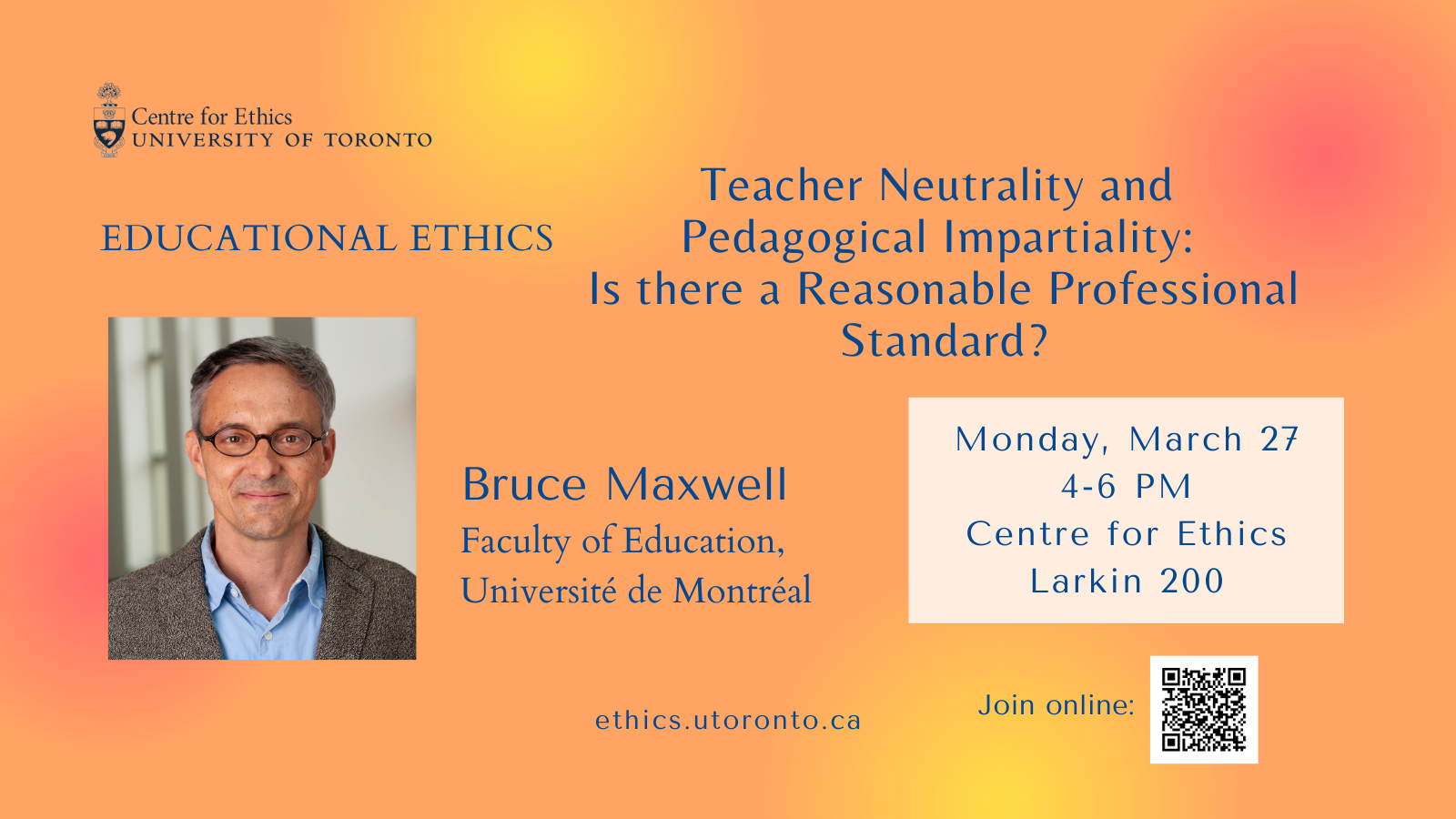
► To stay informed about other upcoming events at the Centre for Ethics, opportunities, and more, please sign up for our newsletter.
Teacher Neutrality and Pedagogical Impartiality: Is there a Reasonable Professional Standard?
This paper considers the tension between teachers’ professional obligation to remain neutral when addressing politically charged issues in class and their duty to promote social justice and inculcate liberal democratic values in schools. After laying out the contours of the social justice argument against teacher neutrality and in favour of social justice advocacy in the classroom, the paper presents a set of conceptual, pedagogical and legal objections to this argument: it hinges on a questionable conceptualization of “controversial issue,” arbitrarily elevates certain liberal democratic values (justice, equality) while neglecting others (pluralism, dialogue), minimizes the professional risk that teachers assume by engaging in social justice advocacy at work, and overlooks students’ rights to freedom of speech and freedom of conscience. The paper closes by advancing an alternative pedagogical framework that seeks to balance the educational urgency and legitimacy of promoting social justice in public education with the need to take into account teachers’ professional vulnerability and respect students’ basic rights.
► this event is hybrid. Join in person at the Centre for Ethics (Larkin building, room 200) or online here.

Bruce Maxwell Faculty of Education, Université de Montréal
04:00 PM - 06:00 PM
Centre for Ethics, University of Toronto
200 Larkin - Fri, Mar 24, 2023
Laura Bisaillon, “Barely Known Aspect of Canada’s Immigration System”: Doctoring, Lawyering and Administering Medical Exclusion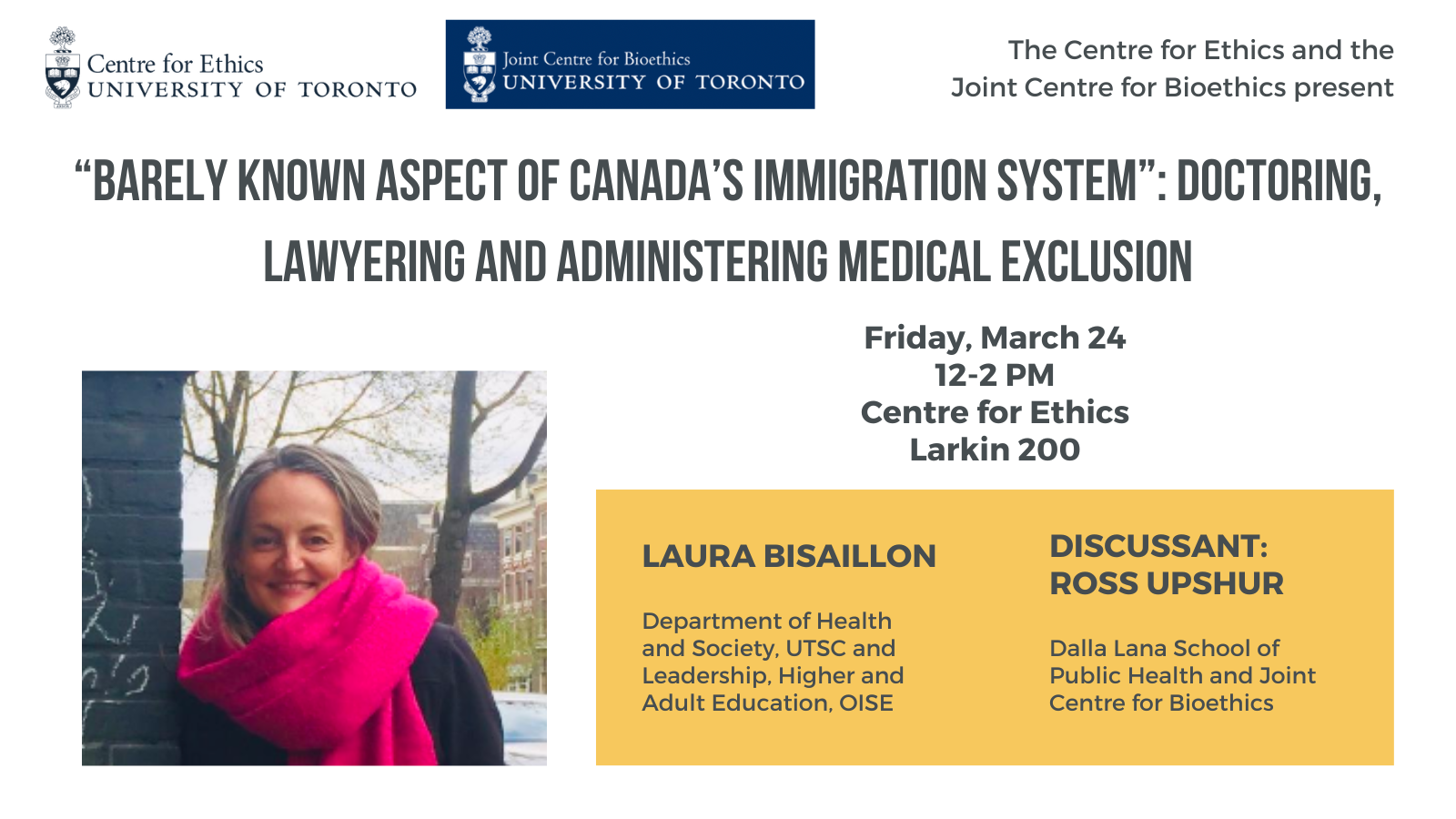
► To stay informed about other upcoming events at the Centre for Ethics, opportunities, and more, please sign up for our newsletter.
“Barely Known Aspect of Canada’s Immigration System”: Doctoring, Lawyering and Administering Medical Exclusion
If the late Stephen Hawking had wanted to settle in Canada, he would likely have been denied. This is because he was disabled. Federal immigration law is designed to exclude people with chronic illness and developmental or genetic difference from permanently settling on health grounds, referred to as medical inadmissibility, with some exceptions. I explore and critique the immigration system based on an ethnography of the medical, legal, and administrative practices governing this bureaucracy published as Screening Out: HIV Testing and the Canadian Immigration Experience. Using findings from people toward whom exclusionary health policy is directed, I argue that immigration medical practices trigger ethical, practical, and professional problems for migrant persons and for the doctors, lawyers, and other practitioners inside and outside Canada whose livelihoods tether them to the immigration program. I provide a series of do-able strategies for legal reform.► this event is in-person at the Centre for Ethics (Larkin building, room 200)

Laura Bisaillon Department of Health and Society, UTSC Leadership, Higher and Adult Education, OISE
12:00 PM - 02:00 PM
Centre for Ethics, University of Toronto
200 Larkin - Wed, Mar 22, 2023
Race, Ethics + Power: Emerging Scholars
Lillian O'Brien Davis, Conceptions of White: Examining the Origins, Travel, and Present Reality of "Whiteness" as a Concept and a Racial Invention Through Art (Race, Ethics + Power: Emerging Scholars)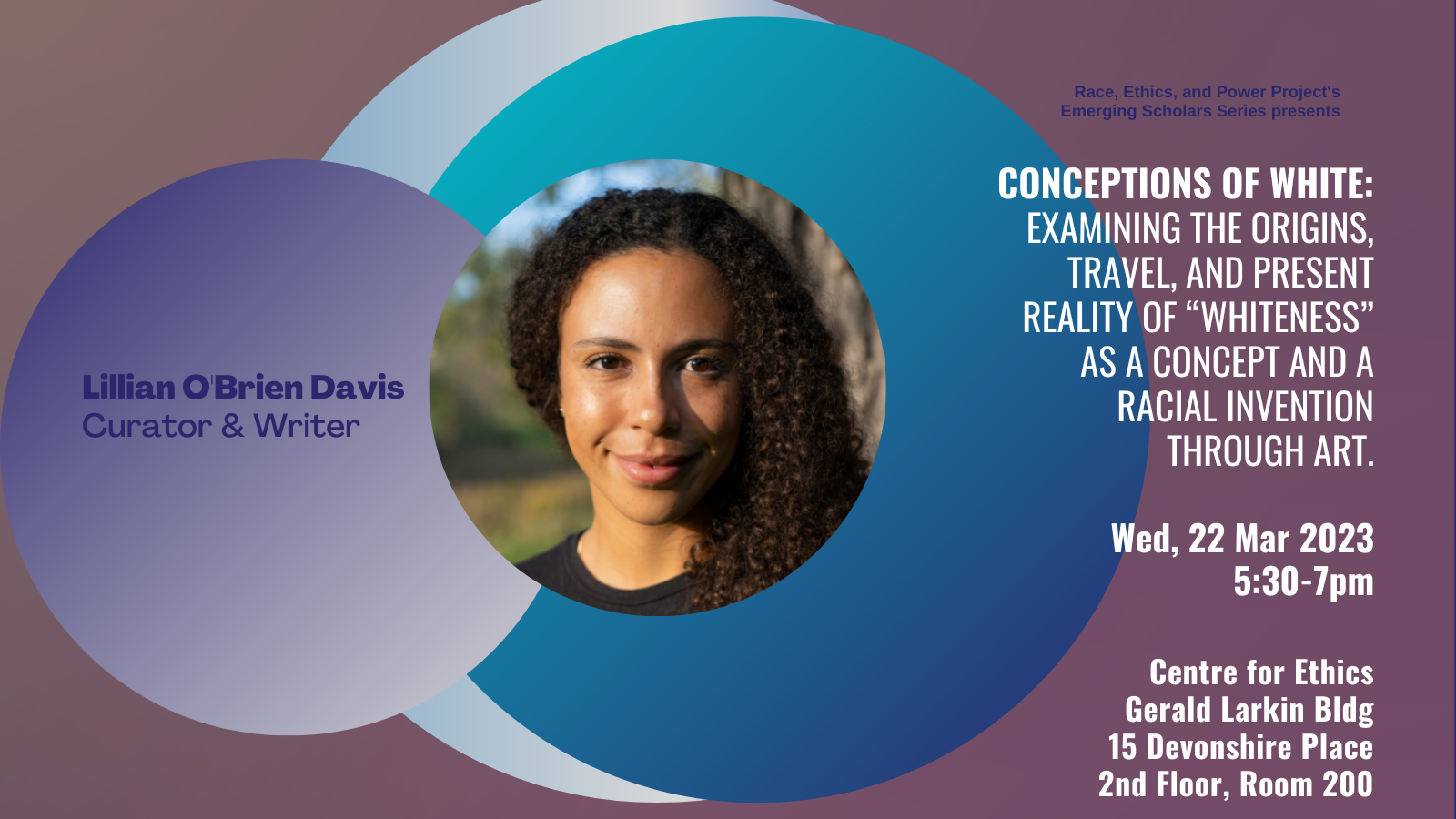 ► To stay informed about other upcoming events at the Centre for Ethics, opportunities, and more, please sign up for our newsletter.
► To stay informed about other upcoming events at the Centre for Ethics, opportunities, and more, please sign up for our newsletter.Conceptions of White: Examining the Origins, Travel, and Present Reality of “Whiteness” as a Concept and a Racial Invention Through Art
Join us for a conversation between Centre for Ethics Doctoral Fellow Letticia Cosbert Miller and Conceptions of Whiteco-curator Lillian O’Brien Davis exploring topics related to the exhibition and intersecting interests of race, ethics and power in art and art-making.
Conceptions of White (co-curated by John Hampton and Lillian O’Brien Davis) is an exhibition offering context and nuanced perspectives that help viewers grapple with contemporary configurations of White identity. The exhibition examines the origins, travel, and present reality of “Whiteness” as a concept and a racial invention that classifies degrees of civility/humanity. The exhibition is currently being presented at the Art Museum at the University of Toronto until March 25th, 2023.
All who attend the talk will be invited to join Lillian and Letticia at the Art Museum (one block away) for a late viewing of the exhibition (the gallery will remain open until 8:00pm) to informally continue the conversation and tour the works discussed during the talk.
► this event is in-person at the Centre for Ethics (Larkin building, room 200)

Lillian O’Brien Davis is a curator, writer based in Toronto, ON. She holds a Masters of Visual Studies in Curatorial Studies and a BA Hons. in the History of Art and English Literature from the University of Toronto. Lillian is currently the Curator of Exhibitions and Public Programs at Gallery 44 Centre for Contemporary Photography and curator for Nuit Blanche Etobicoke 2023. She has curated independent projects at the Art Museum at the University of Toronto, Susan Hobbs Gallery (Toronto), School of Art Gallery at the University of Manitoba and the MacKenzie Art Gallery (Regina). Her writing has appeared in BlackFlash Magazine, Canadian Art online, C Magazine, Insight Magazine and RACAR Art History Journal. She is also currently one of two inaugural Visiting Curators at the University of Manitoba School of Art Gallery.

Letticia Cosbert Miller is a Toronto-based writer and curator. She is currently a PhD student in the Department of Classics at the University of Toronto. Letticia’s work as a writer is often in dialogue with historical, mythological, or philosophical tropes from the western classical tradition. Her academic research interests lie within the reception of Classics in Black diasporic contemporary culture. Letticia is author of Swimming Up a Dark Tunnel, a collection of essays exploring water and Black visual culture, published by Gallery 44 in 2022.
05:30 PM - 07:00 PM
Centre for Ethics, University of Toronto
200 Larkin - Wed, Mar 22, 2023
Reading Series
Epistemic Injustice in Academia and Education Reading Group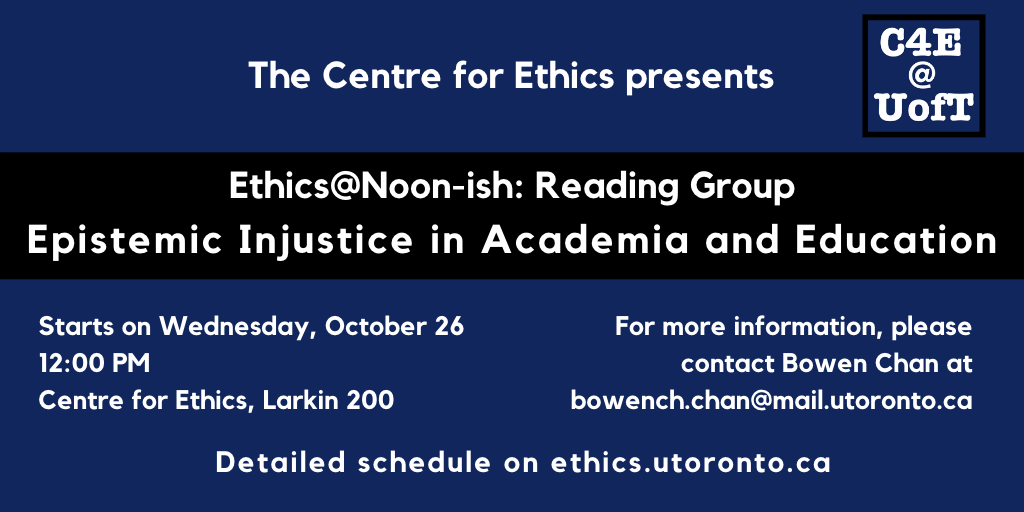
► To stay informed about other upcoming events at the Centre for Ethics, opportunities, and more, please sign up for our newsletter.
Epistemic Injustice in Academia and Education Reading Group
► The reading group will be held in-person at the Centre for Ethics (Larkin building, room 200)
► For more information, please contact Bowen Chan, C4E Doctoral Fellow, at bowench.chan@mail.utoronto.ca
Reading group dates:
- October 26, 2022
- November 9, 2022
- November 23, 2022
- January 18, 2023
- February 1, 2023
- February 15, 2023
- March 8, 2023
- March 22, 2023
12:00 PM - 01:30 PM
Centre for Ethics, University of Toronto
200 Larkin - Wed, Mar 15, 2023
Ethics at Noon
Sameena Hasan, De-Constructing South Asian Identities: Interplay of Religion, Region, and Tasawwuf (Ethics@Noon-ish)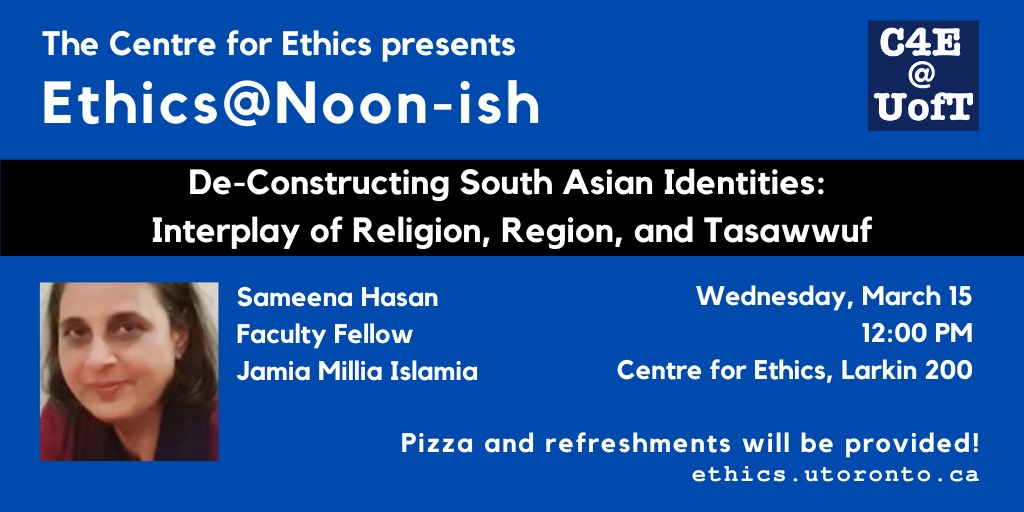
► To stay informed about other upcoming events at the Centre for Ethics, opportunities, and more, please sign up for our newsletter.
De-Constructing South Asian Identities: Interplay of Religion, Region, and Tasawwuf
► this event is in-person at the Centre for Ethics (Larkin building, room 200)

Sameena Hasan
Faculty Fellow Centre for Ethics
University of Toronto
12:00 PM - 01:30 PM
Centre for Ethics, University of Toronto
200 Larkin - Wed, Mar 8, 2023
Reading Series
Epistemic Injustice in Academia and Education Reading Group
► To stay informed about other upcoming events at the Centre for Ethics, opportunities, and more, please sign up for our newsletter.
Epistemic Injustice in Academia and Education Reading Group
► The reading group will be held in-person at the Centre for Ethics (Larkin building, room 200)
► For more information, please contact Bowen Chan, C4E Doctoral Fellow, at bowench.chan@mail.utoronto.ca
Reading group dates:
- October 26, 2022
- November 9, 2022
- November 23, 2022
- January 18, 2023
- February 1, 2023
- February 15, 2023
- March 8, 2023
- March 22, 2023
12:00 PM - 01:30 PM
Centre for Ethics, University of Toronto
200 Larkin - Mon, Mar 6, 2023
Race, Ethics + Power: Emerging Scholars
Sirena Liladrie, Adult Children and their Aging Parents: Navigating the Realities of Retirement in Ontario for Low-Income Seniors (Race, Ethics + Power: Emerging Scholars) ► To stay informed about other upcoming events at the Centre for Ethics, opportunities, and more, please sign up for our newsletter.
► To stay informed about other upcoming events at the Centre for Ethics, opportunities, and more, please sign up for our newsletter.Adult Children and their Aging Parents: Navigating the Realities of Retirement in Ontario for Low-Income Seniors
► this event is in-person at the Centre for Ethics (Larkin building, room 200)

Sirena Liladrie
05:30 PM - 07:00 PM
Adult Education and Community Development OISE University of Toronto
Centre for Ethics, University of Toronto
200 Larkin - Fri, Mar 3, 2023
Julia Nefsky and Sergio Tenenbaum, Rescuing Ourselves from The Pond Analogy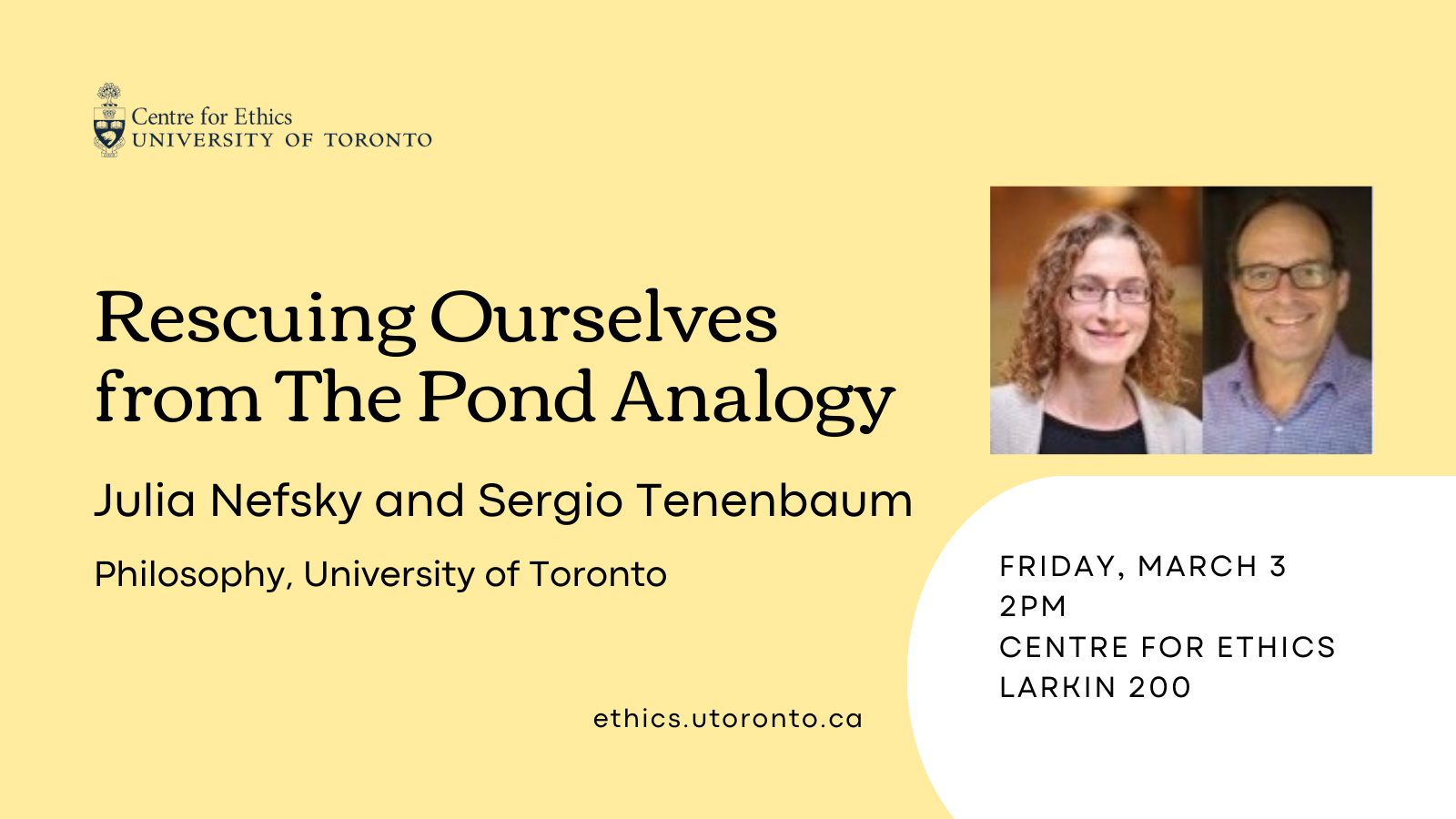
► To stay informed about other upcoming events at the Centre for Ethics, opportunities, and more, please sign up for our newsletter.
Rescuing Ourselves from The Pond Analogy
Peter Singer famously argues that when we spend money on seemingly ordinary pleasures for ourselves, we are doing something gravely wrong. In the process, he (famously) draws an analogy between spending money in such ways and not saving a child drowning in a pond when you could easily do so. There have been many responses to Singer. Some of these make potentially important points and might give grounds for rejecting Singer’s principles. But what they do not do, we argue, is respond effectively to the Pond Analogy and the argument it itself gives for Singer’s conclusion. This reveals that Singer’s focus on deriving his conclusion from general principles is a mistake; the hard-to-resist argument is the Pond Analogy itself. More broadly, we show that the Pond Analogy presents a crucial challenge to our ability to give a plausible, coherent conception of morality. We close by sketching our answer to it.
► this event is in-person at the Centre for Ethics (Larkin building, room 200)

Julia Nefsky and Sergio Tenenbaum Philosophy, University of Toronto
02:00 PM - 04:00 PM
Centre for Ethics, University of Toronto
200 Larkin - Fri, Mar 3, 2023
Reading Series
New Books in Sex and Ethics Reading Group
► To stay informed about other upcoming events at the Centre for Ethics, opportunities, and more, please sign up for our newsletter.
New Books in Sex and Ethics Reading Group
Organized by Professor John Paul Ricco (Comparative Literature, Art History, Visual Studies)
Graduate Students, Faculty, Postdoctoral Fellows, and Advanced Undergraduates are invited to join this Reading Group, where we will discuss some of the top books recently published on the topic of sex and ethics.
► The reading group will be held in-person at the Centre for Ethics (Larkin building, room 200)
Reading group dates:
- February 3, 2023: Katherine Angel, Tomorrow Sex Will be Good Again: Women and Desire in the Age of Consent (2021)
- March 3, 2023: Amia Srinivasan, The Right to Sex: Feminism in the Twenty-First Century (2021)
- April 14, 2023: Oliver Davis and Tim Dean, The Hatred of Sex (2021)
- May 5, 2023: Jean-Luc Nancy, Sexistence (2021)
- June 2, 2023: Avgi Saketopoulou, Sexuality Beyond Consent: Risk, Race, Traumatophilia (February 2023)
Participants are asked to acquire their own copies of the books. The Hatred of Sex and Sexistence are available online through the University of Toronto library catalogue. The other books will be put on hold at Robarts. If you need help finding a copy of any book, please contact Lauren Bialystok at lauren.bialystok@utoronto.ca.
11:00 AM - 01:00 PMNo RSVP required, but if you plan to participate for the term, it would help to let us know in advance. Please contact ethics@utoronto.ca.
► For more information, please contact ethics@utoronto.ca
Centre for Ethics, University of Toronto
200 Larkin - Wed, Mar 1, 2023
Ethics at Noon
Megan Pfiffer, The Rule of Law and the Climate Emergency (Ethics@Noon-ish)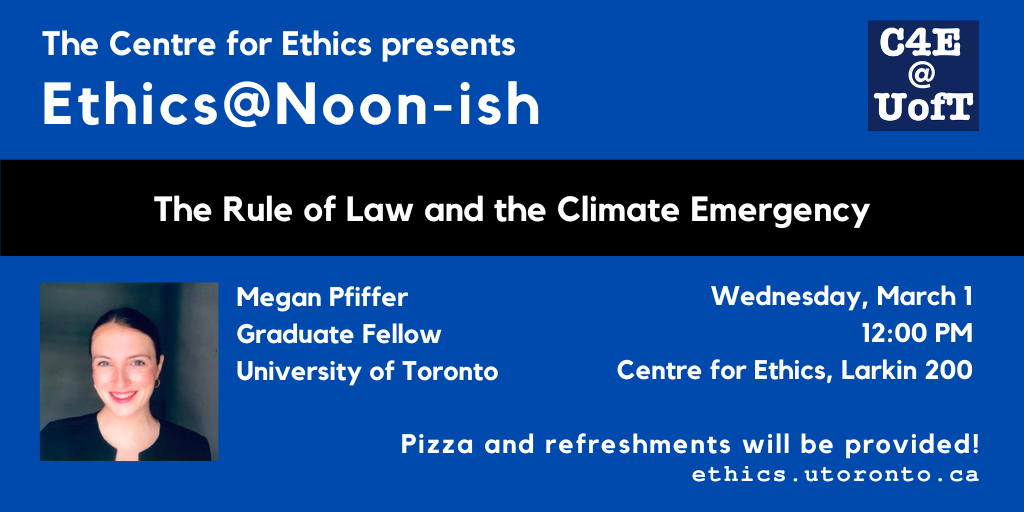
► To stay informed about other upcoming events at the Centre for Ethics, opportunities, and more, please sign up for our newsletter.
The Rule of Law and the Climate Emergency
► this event is in-person at the Centre for Ethics (Larkin building, room 200)

Megan Pfiffer
Doctoral Fellow Centre for Ethics
University of Toronto
12:00 PM - 01:30 PM
Centre for Ethics, University of Toronto
200 Larkin - Mon, Feb 27, 2023
Educational Ethics
Christopher Martin, Should Higher Education be a Right? (Educational Ethics)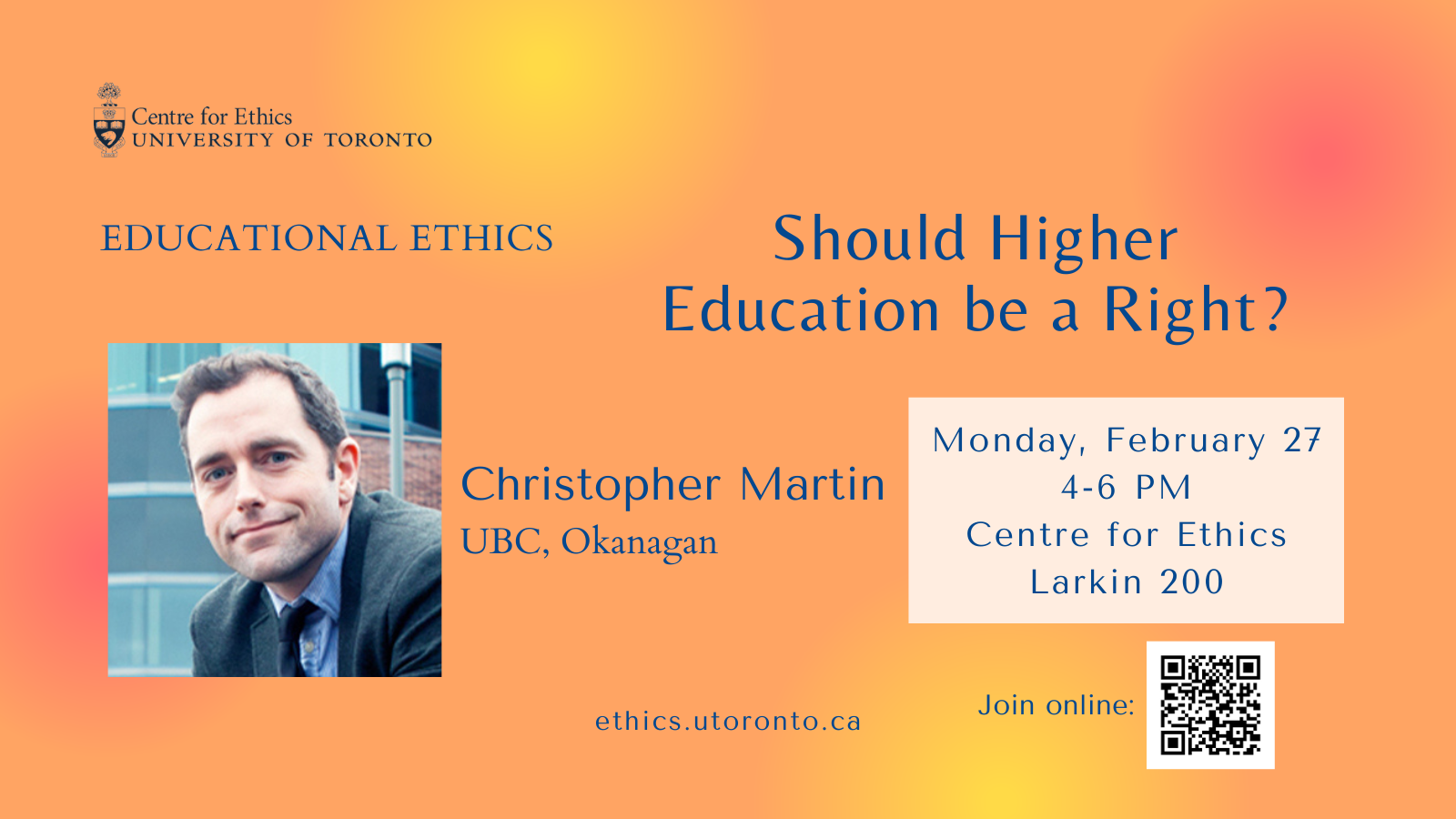
► To stay informed about other upcoming events at the Centre for Ethics, opportunities, and more, please sign up for our newsletter.
Should Higher Education be a Right?
It is sometimes claimed that higher education is a right, not a privilege. Defenders claim that tuition fees and student loans should be abolished because they place unjust barriers between citizens and valuable educational opportunities. While it is true that fees can be a barrier to access, there are good reasons to think that full public funding for college/university would actually do more to increase educational inequality than reduce it. Can a case be made for a right to higher education that takes these, and similar worries, into account? In The Right to Higher Education: A Political Theory (2022) I argue that there can. In this talk, I provide a philosophical justification of a right to higher education including its nature, scope, and institutional implications. One upshot of a right-based conception of higher education is that it entails a far more substantial role for education over the lifespan and provides a clear direction for the future growth and development of post-secondary education.
► this event is hybrid. Join in person at the Centre for Ethics (Larkin building, room 200) or online here.

Christopher Martin UBC, Okanagan
04:00 PM - 06:00 PM
Centre for Ethics, University of Toronto
200 Larkin - Wed, Feb 15, 2023
Reading Series
Epistemic Injustice in Academia and Education Reading Group
► To stay informed about other upcoming events at the Centre for Ethics, opportunities, and more, please sign up for our newsletter.
Epistemic Injustice in Academia and Education Reading Group
► The reading group will be held in-person at the Centre for Ethics (Larkin building, room 200)
► For more information, please contact Bowen Chan, C4E Doctoral Fellow, at bowench.chan@mail.utoronto.ca
Reading group dates:
- October 26, 2022
- November 9, 2022
- November 23, 2022
- January 18, 2023
- February 1, 2023
- February 15, 2023
- March 8, 2023
- March 22, 2023
12:00 PM - 01:30 PM
Centre for Ethics, University of Toronto
200 Larkin - Mon, Feb 13, 2023
Nikolas Kompridis, The Recovery of the Human: Cavell, Skepticism, Romanticism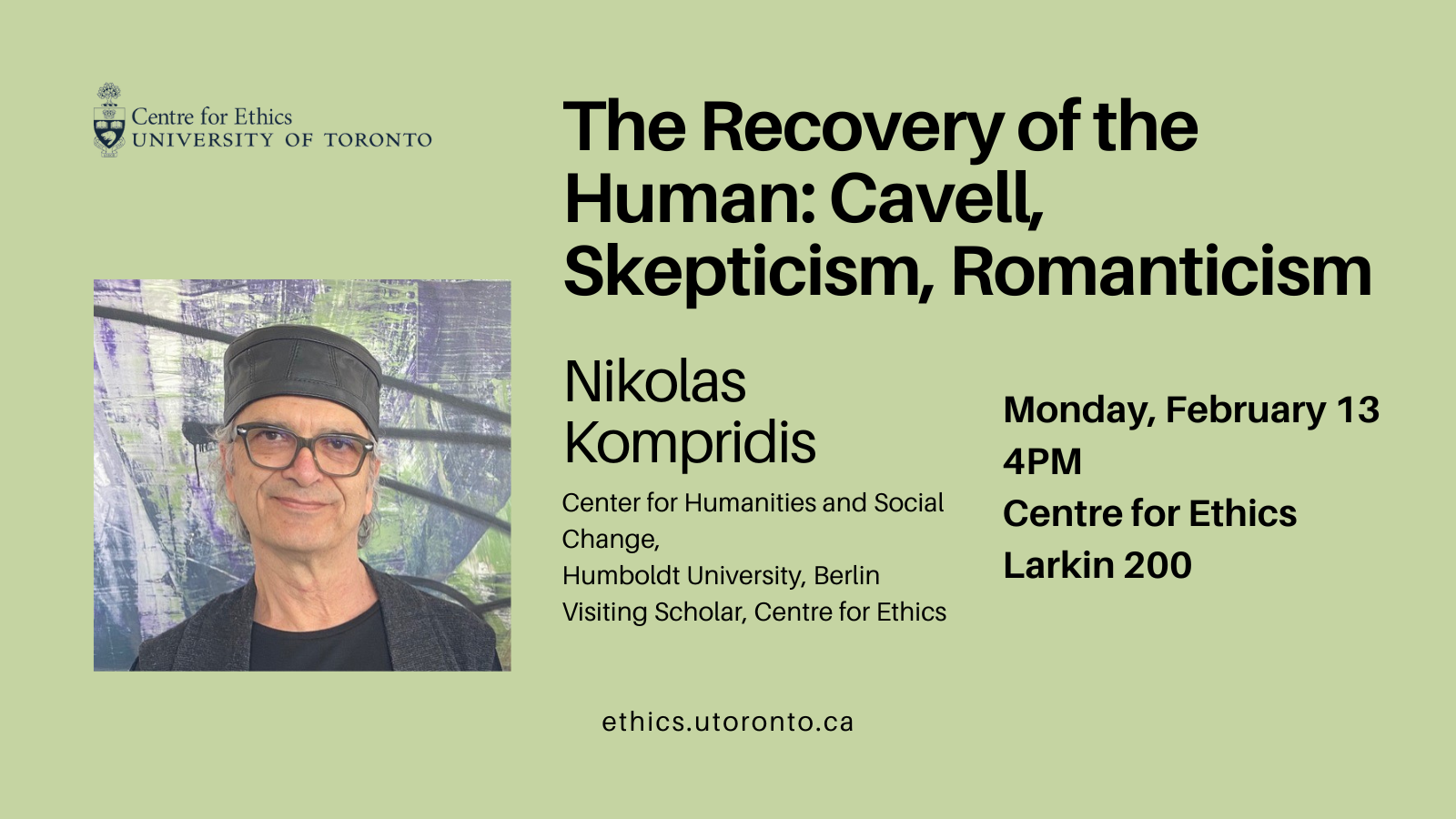
► To stay informed about other upcoming events at the Centre for Ethics, opportunities, and more, please sign up for our newsletter.
The Recovery of the Human: Cavell, Skepticism, Romanticism
Stanley Cavell’s portrayal of skepticism is unlike any other in philosophy. By attaching skepticism to larger questions about what it is to be human (and inhuman), Cavell tells a story about skepticism’s inhabitation of our philosophical and non-philosophical lives that not only departs dramatically from the skepticism literature; it risks departing from philosophy altogether. To tell his heterodox story about skepticism, Cavell required conceptual and expressive resources that philosophy by itself could not provide. And he came upon these resources unexpectedly as “outbreaks of romantic texts” in the final part of him magnum opus, The Claim of Reason. In this paper, I will show how Cavell’s persistent (if not always consistent) engagement with the “interplay between skepticism and romanticism” culminated in very novel as well as very timely views of our relation to others, both human and non-human, coinciding with an uncomfortably intimate relation to philosophy’s “other” – literature.
► this event is in-person at the Centre for Ethics (Larkin building, room 200)

Nikolas Kompridis Center for Humanities and Social Change, Humboldt University, Berlin Visiting Scholar, Centre for Ethics
04:00 PM - 06:00 PM
Centre for Ethics, University of Toronto
200 Larkin - Wed, Feb 8, 2023
Ethics at Noon
Emily McWilliams, Intellectual Humility in Joint Inquiry (Ethics@Noon-ish)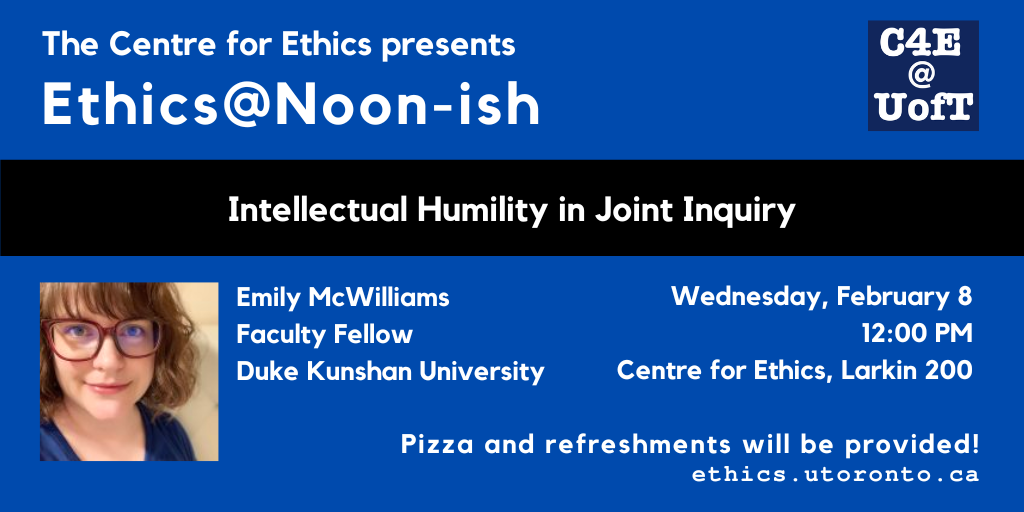
► To stay informed about other upcoming events at the Centre for Ethics, opportunities, and more, please sign up for our newsletter.
Intellectual Humility in Joint Inquiry
► this event is in-person at the Centre for Ethics (Larkin building, room 200)

Emily McWilliams
Faculty Fellow
Duke Kunshan University
12:00 PM - 01:30 PM
Centre for Ethics, University of Toronto
200 Larkin - Tue, Feb 7, 2023
Brian Baigrie, Public Trust as a Substantive Value for Public Health Ethics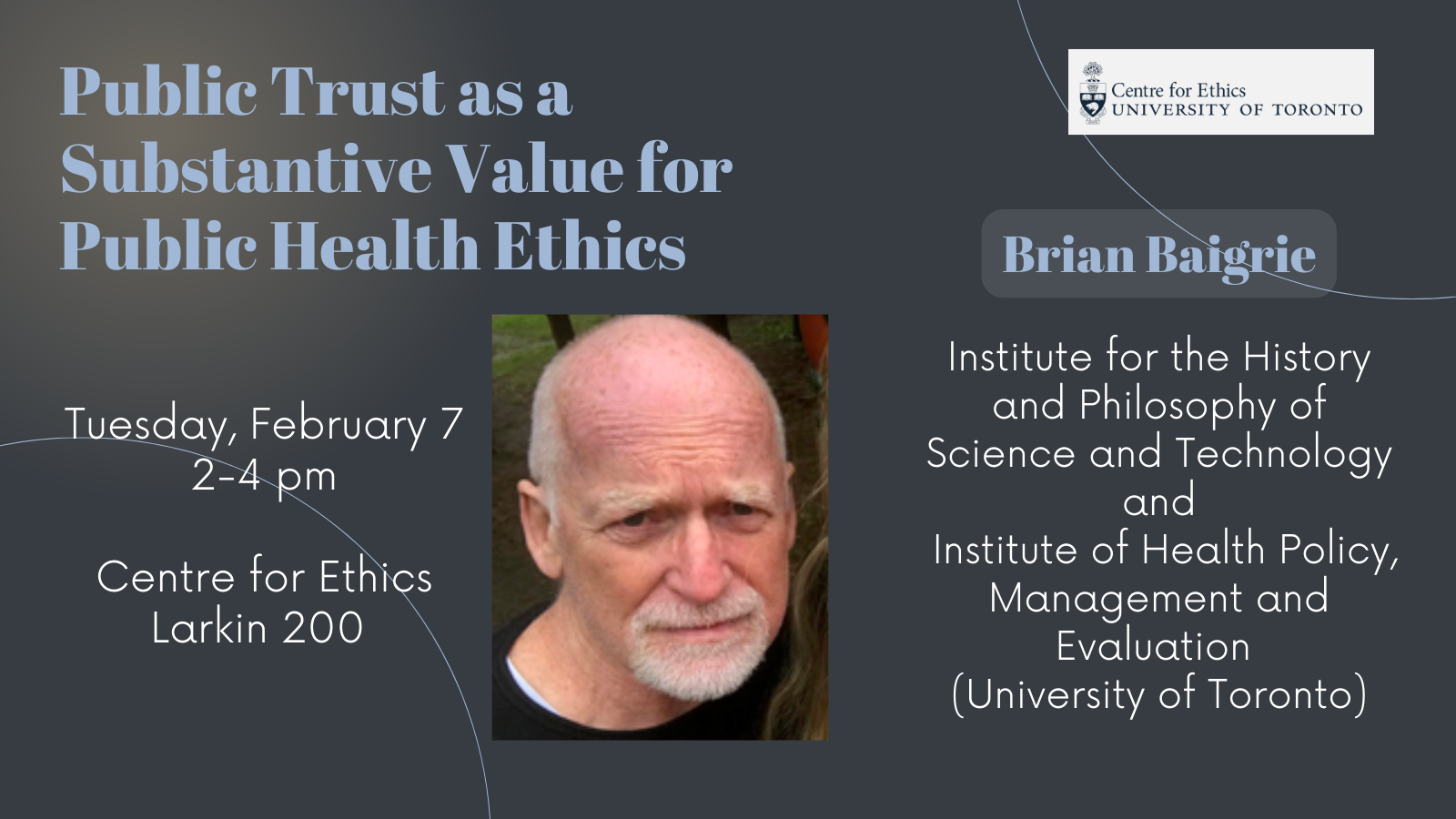
► To stay informed about other upcoming events at the Centre for Ethics, opportunities, and more, please sign up for our newsletter.
Public Trust as a Substantive Value for Public Health Ethics
There is a growing consensus among academics and commentators that public trust in science and scientists is at a low ebb across a range of issues of public concern, from the contribution of human activity to climate change, to the safety of vaccines, and the effectiveness of public health interventions during the recent (and ongoing) Covid-19 pandemic. This talk will focus on the perceived erosion of trust in public health, which is deeply concerning given that support for public health interventions is essential (at least in a democracy) for the achievement of public health goals. To this end, this talk will outline a conceptual model of public trust that is fit for the narrowly focused goals of public health and distinct from and other forms of trust (e.g., social trust, institutional trust, generalized inter-personal trust) that are often conflated with public trust, and (b) mount an argument for positioning public trust as a substantive value for public health ethics.
► this event is in-person at the Centre for Ethics (Larkin building, room 200)

Brian Baigrie
Institute for the History and Philosophy of Science and Technology and Institute of Health Policy, Management and Evaluation (University of Toronto)
02:00 PM - 04:00 PM
Centre for Ethics, University of Toronto
200 Larkin - Mon, Feb 6, 2023
Lisa McKeown, Acknowledging Passionate Utterances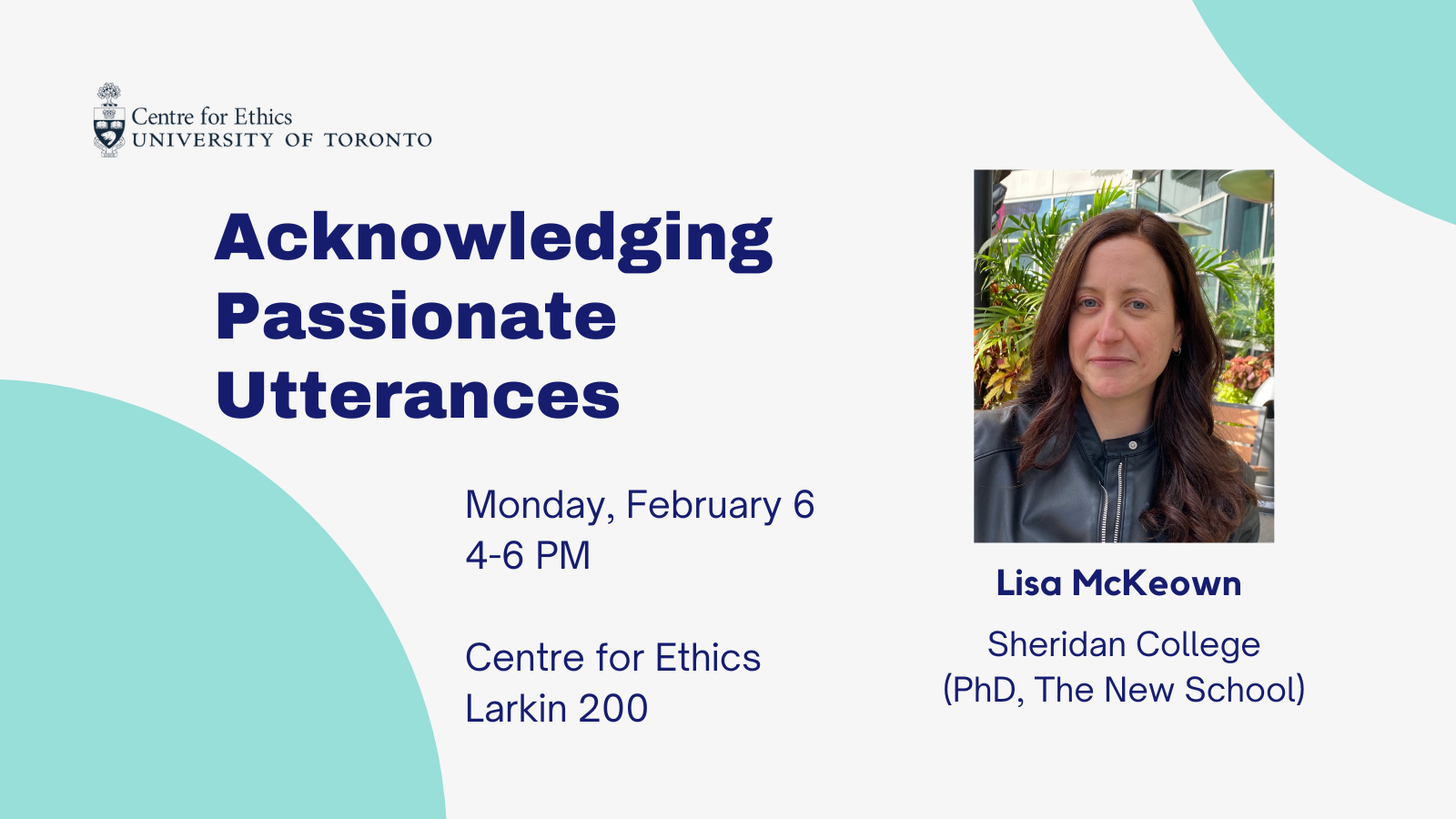
► To stay informed about other upcoming events at the Centre for Ethics, opportunities, and more, please sign up for our newsletter.
Acknowledging Passionate Utterances
In the #MeToo movement, we see a spectrum of perpetrators: on the one hand, we have those who knowingly violate their victims (think Weinstein or Cosby). On the other hand, we have those who transgress without realizing (think Aziz Ansari). The latter case often happens because the transgressors do not realize their partner is trying to refuse them. But how is this possible? Lisa McKeown uses Stanley Cavell’s notion of “passionate utterances” to respond to Rae Langton’s theory that pornography implies women’s refusals shouldn’t be taken seriously. She argues that acknowledgement is a practical, emotional skill necessary for conversational ethics and understanding systematic, gendered miscommunication.
► this event is hybrid. Join in person at the Centre for Ethics (Larkin building, room 200) or online at the link below:

Lisa McKeown
Sheridan College (PhD, The New School)
04:00 PM - 06:00 PM
Centre for Ethics, University of Toronto
200 Larkin - Fri, Feb 3, 2023
Reading Series
New Books in Sex and Ethics Reading Group
► To stay informed about other upcoming events at the Centre for Ethics, opportunities, and more, please sign up for our newsletter.
New Books in Sex and Ethics Reading Group
Organized by Professor John Paul Ricco (Comparative Literature, Art History, Visual Studies)
Graduate Students, Faculty, Postdoctoral Fellows, and Advanced Undergraduates are invited to join this Reading Group, where we will discuss some of the top books recently published on the topic of sex and ethics.
► The reading group will be held in-person at the Centre for Ethics (Larkin building, room 200)
Reading group dates:
- February 3, 2023: Katherine Angel, Tomorrow Sex Will be Good Again: Women and Desire in the Age of Consent (2021)
- March 3, 2023: Amia Srinivasan, The Right to Sex: Feminism in the Twenty-First Century (2021)
- April 14, 2023: Oliver Davis and Tim Dean, The Hatred of Sex (2021)
- May 5, 2023: Jean-Luc Nancy, Sexistence (2021)
- June 2, 2023: Avgi Saketopoulou, Sexuality Beyond Consent: Risk, Race, Traumatophilia (February 2023)
Participants are asked to acquire their own copies of the books. The Hatred of Sex and Sexistence are available online through the University of Toronto library catalogue. The other books will be put on hold at Robarts. If you need help finding a copy of any book, please contact Lauren Bialystok at lauren.bialystok@utoronto.ca.
11:00 AM - 01:00 PMNo RSVP required, but if you plan to participate for the term, it would help to let us know in advance. Please contact ethics@utoronto.ca.
► For more information, please contact ethics@utoronto.ca
Centre for Ethics, University of Toronto
200 Larkin - Wed, Feb 1, 2023
Reading Series
Epistemic Injustice in Academia and Education Reading Group
► To stay informed about other upcoming events at the Centre for Ethics, opportunities, and more, please sign up for our newsletter.
Epistemic Injustice in Academia and Education Reading Group
► The reading group will be held in-person at the Centre for Ethics (Larkin building, room 200)
► For more information, please contact Bowen Chan, C4E Doctoral Fellow, at bowench.chan@mail.utoronto.ca
Reading group dates:
- October 26, 2022
- November 9, 2022
- November 23, 2022
- January 18, 2023
- February 1, 2023
- February 15, 2023
- March 8, 2023
- March 22, 2023
12:00 PM - 01:30 PM
Centre for Ethics, University of Toronto
200 Larkin - Mon, Jan 30, 2023
Educational Ethics
Meira Levinson, Why We Need a Field of Educational Ethics (Educational Ethics)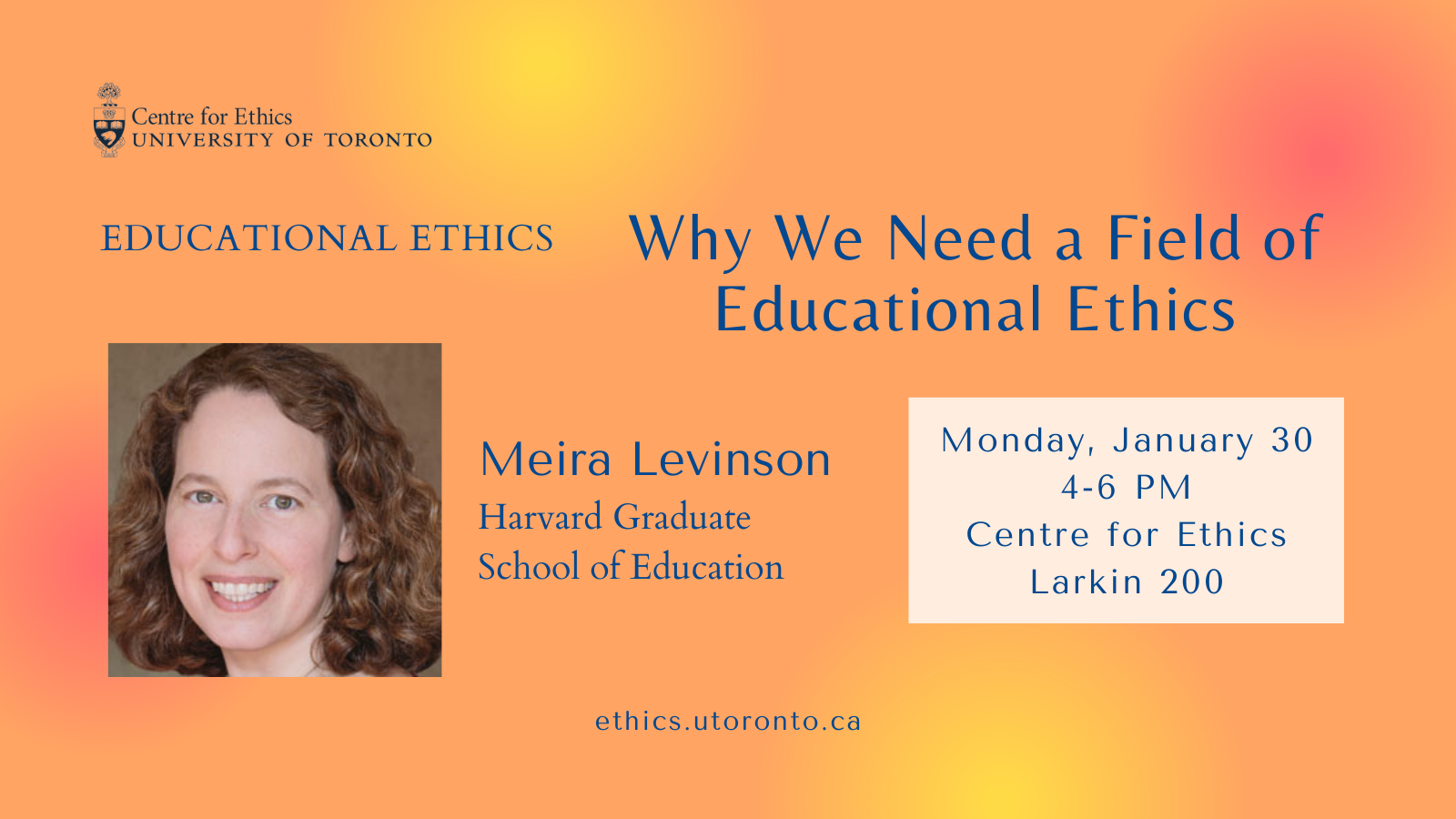
► To stay informed about other upcoming events at the Centre for Ethics, opportunities, and more, please sign up for our newsletter.
Why We Need a Field of Educational Ethics
Educators, administrators, and policy makers regularly face ethical dilemmas in their work. For example: Should teachers factor effort into grades as a way of recognizing and motivating students’ hard work, or base grades solely on achievement so they clearly communicate students’ academic mastery? In the face of budget shortfalls, should a school reduce the size of its gifted and talented program, fire its family liaison specialist, or cut its after-school programming? Which impacts, on whom, should it care about in making this decision, and why? As parent scrutiny of curriculum heats up, how much leeway (if any) should districts give parents to opt their children out of specific lessons? What limits, if any, should be placed on states’ uses of predictive analytics to target students preemptively for intervention services? In light of these and other dilemmas, Meira Levinson argues, we need a field of educational ethics that can provide the theoretical and practical tools educators need to address core values and decision-making at the heart of their work.
► this event is hybrid. Join in person at the Centre for Ethics (Larkin building, room 200) or on Zoom at the link below:
Meeting ID: 842 0877 8987Passcode: 350205

Meira Levinson
Harvard Graduate School of Education
04:00 PM - 06:00 PM
Centre for Ethics, University of Toronto
200 Larkin - Wed, Jan 25, 2023
Ethics at Noon
Logan Gates, Human Rights in the Latin American Tradition: A dialogue between Bartolomé de las Casas and John Locke (Ethics@Noon-ish)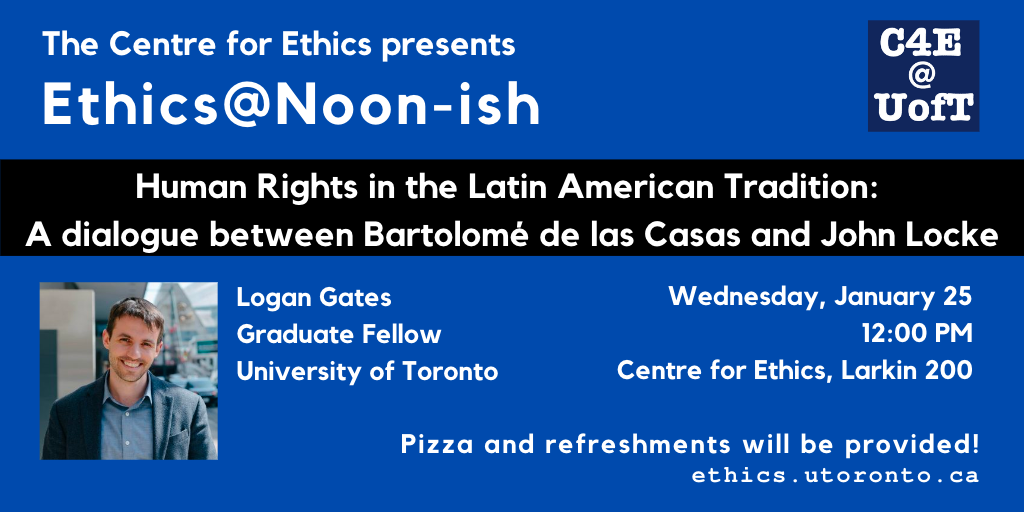
► To stay informed about other upcoming events at the Centre for Ethics, opportunities, and more, please sign up for our newsletter.
Human Rights in the Latin American Tradition: A dialogue between Bartolomé de las Casas and John Locke
► this event is in-person at the Centre for Ethics (Larkin building, room 200)

Logan Gates
Doctoral Fellow
University of Toronto
12:00 PM - 01:30 PM
Centre for Ethics, University of Toronto
200 Larkin - Wed, Jan 18, 2023
Reading Series
Epistemic Injustice in Academia and Education Reading Group
► To stay informed about other upcoming events at the Centre for Ethics, opportunities, and more, please sign up for our newsletter.
Epistemic Injustice in Academia and Education Reading Group
► The reading group will be held in-person at the Centre for Ethics (Larkin building, room 200)
► For more information, please contact Bowen Chan, C4E Doctoral Fellow, at bowench.chan@mail.utoronto.ca
Reading group dates:
- October 26, 2022
- November 9, 2022
- November 23, 2022
- January 18, 2023
- February 1, 2023
- February 15, 2023
- March 8, 2023
- March 22, 2023
12:00 PM - 01:30 PM
Centre for Ethics, University of Toronto
200 Larkin - Wed, Jan 11, 2023
Ethics at Noon
Kate Mitchell, Taking Prisoners' Rights Seriously (Ethics@Noon-ish)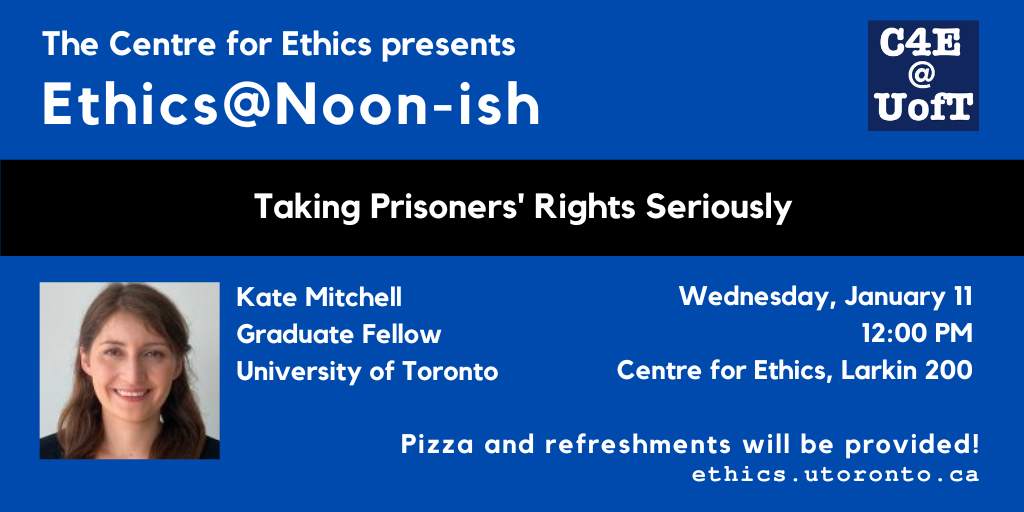
► To stay informed about other upcoming events at the Centre for Ethics, opportunities, and more, please sign up for our newsletter.
Taking Prisoners’ Rights Seriously
► this event is in-person at the Centre for Ethics (Larkin building, room 200)

Kate Mitchell
Doctoral Fellow
University of Toronto
12:00 PM - 01:30 PM
Centre for Ethics, University of Toronto
200 Larkin - Fri, Dec 9, 2022
Race, Ethics + Power: Emerging Scholars
Enna Kim, Yestermorrow: Speculative Tales of a Possible Repair Future (Race, Ethics + Power: Emerging Scholars) ► To stay informed about other upcoming events at the Centre for Ethics, opportunities, and more, please sign up for our newsletter.
► To stay informed about other upcoming events at the Centre for Ethics, opportunities, and more, please sign up for our newsletter.Yestermorrow: Speculative Tales of a Possible Repair Future
► please register here or email ethics@utoronto.ca

Enna Kim
05:00 PM - 06:30 PM
Communication & Culture York University
Centre for Ethics, University of Toronto
200 Larkin - Fri, Dec 9, 2022
Cindy Holder, Holism, Standing and Collective Selves: A Human Rights Approach to Land Claims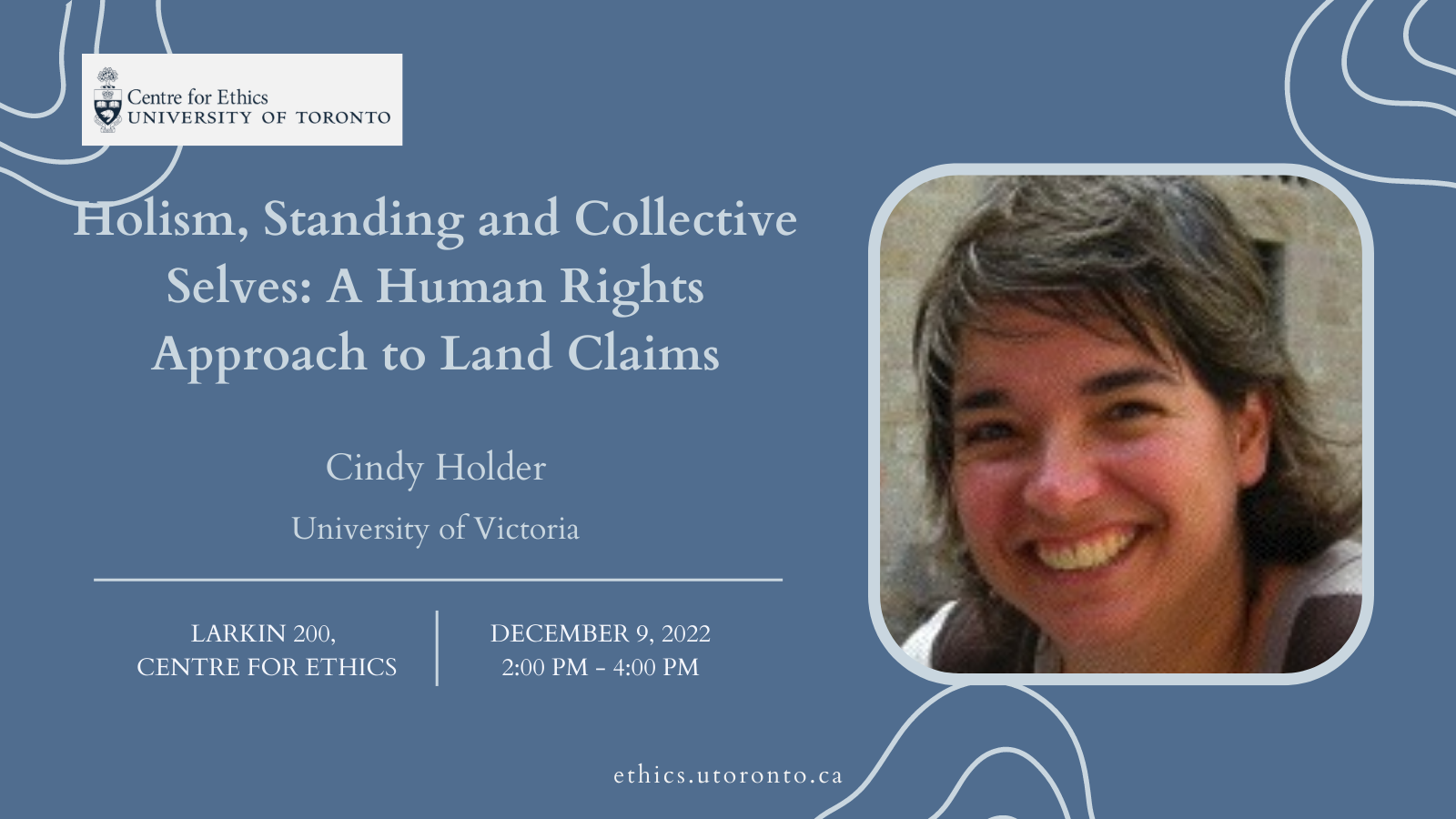
► To stay informed about other upcoming events at the Centre for Ethics, opportunities, and more, please sign up for our newsletter.
Holism, Standing and Collective Selves: A Human Rights Approach to Land Claims
A human rights framing is strategically very attractive in advocacy for land claims, because of its international reach and influence. However, there are a number of well-documented concerns about the way human rights characterizes what is at issue, both in its own terms and as means of advancing the larger purposes within which many land claims are embedded, especially in relation to land claims by Indigenous peoples. In this paper I set out features of human rights that can and should be emphasized to make a human rights framing not only usable for claims with respect to land but useful and effective. I argue that the holistic approach to human life and experience, the role of standing in explicating and establishing claims, and the conceptualization of subjectivity as collective and not only individuated make it possible to leverage universalism to shift the justificatory onus onto those who would deny a land claim without presupposing a universal self or subject. In so doing, a human rights framing offers resources for exposing the bad faith that is at the heart of many denials of land claims with respect to land. A human rights framing is statist and this this has to be borne in mind when deciding whether to deploy it in a particular circumstance. However, there are claims with respect to land that statism will not distort or undermine, and a human rights framing can be of use in those cases.
► this event is in-person at the Centre for Ethics (Larkin building, room 200)

Cindy Holder
University of Victoria
02:00 PM - 04:00 PM
Centre for Ethics, University of Toronto
200 Larkin - Wed, Dec 7, 2022
Ethics at Noon
Spencer Albert, Reparations Without Collective Agency (Ethics@Noon-ish)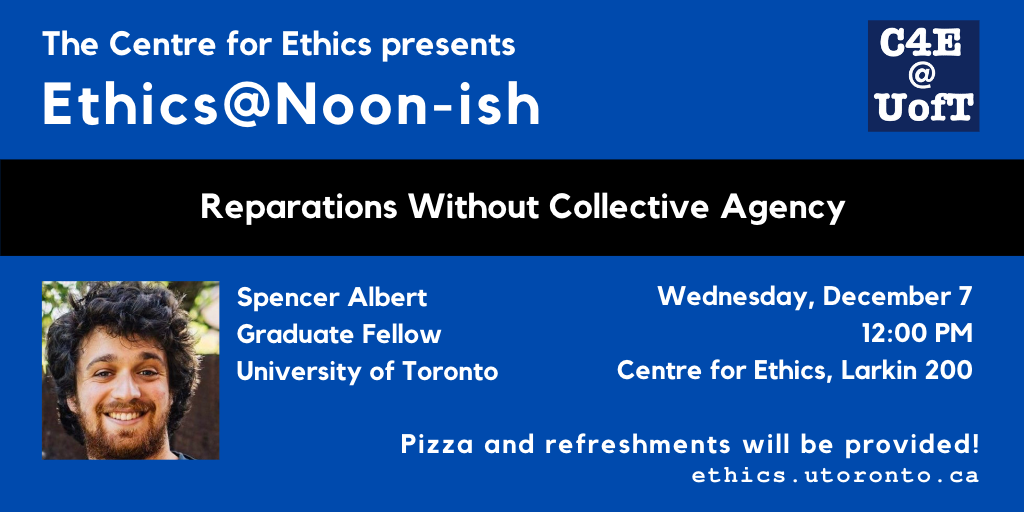
► To stay informed about other upcoming events at the Centre for Ethics, opportunities, and more, please sign up for our newsletter.
Reparations Without Collective Agency
► this event is in-person at the Centre for Ethics (Larkin building, room 200)

Spencer Albert
Doctoral Fellow
University of Toronto
12:00 PM - 01:30 PM
Centre for Ethics, University of Toronto
200 Larkin - Fri, Dec 2, 2022
Author Meets Critics
Arthur Ripstein, Kant and the Law of War (Author-Meets-Critics)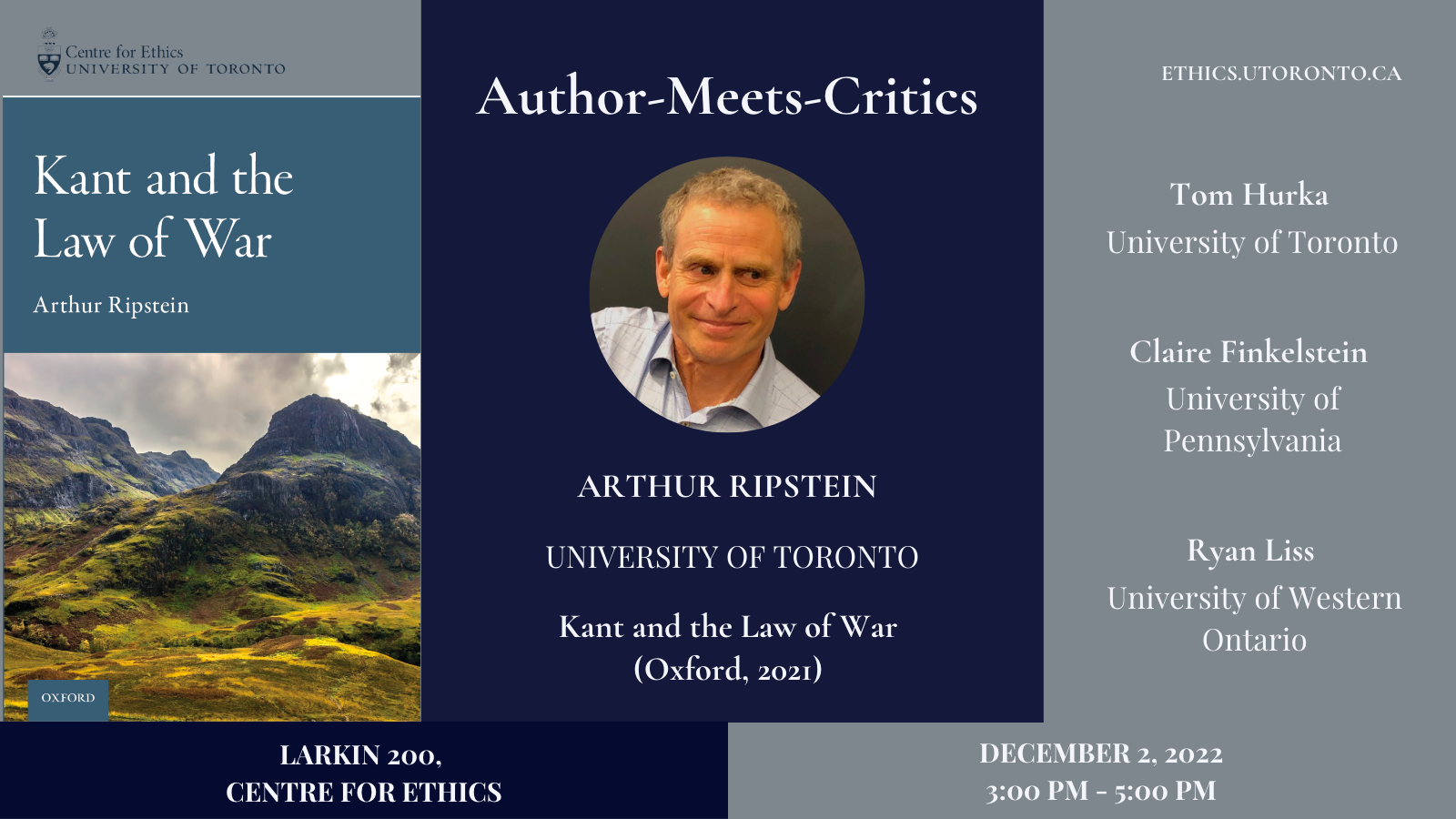
► To stay informed about other upcoming events at the Centre for Ethics, opportunities, and more, please sign up for our newsletter.
Kant and the Law of War (Oxford, 2021)
The past two decades have seen renewed scholarly and popular interest in the law and morality of war. Positions that originated in the late Middle Ages through the seventeenth century have received more sophisticated philosophical elaboration. Although many contemporary writers appeal to ideas drawn from Kant’s moral philosophy, his explicit discussions of war have not yet been brought into their proper place in these debates. Ripstein argues that a special morality governs war because of its distinctive immorality: the wrongfulness of entering or remaining in a condition in which force decides everything provides the standards for evaluating the grounds of initiating war, the ways in which wars are fought, and the results of past wars.
The book is a major intervention into just war theory from the most influential contemporary interpreter and exponent of Kant’s political and legal theories. Beginning from the difference between governing human affairs through words and through force, Ripstein articulates a Kantian account of the state as a public legal order in which all uses of force are brought under law. Against this background, he provides innovative accounts of the right of national defence, the importance of conducting war in ways that preserve the possibility of a future peace, and the distinctive role of international institutions in bringing force under law.► this event is in-person at the Centre for Ethics (Larkin building, room 200)

Arthur Ripstein
University of TorontoRespondents:
Tom Hurka (University of Toronto) Claire Finkelstein (University of Pennsylvania) Ryan Liss (University of Western Ontario)
03:00 PM - 05:00 PM
Centre for Ethics, University of Toronto
200 Larkin - Wed, Nov 30, 2022
Ethics at Noon
Joseph Dattilo, Augustinian Moral Psychology and the Origins of Toleration (Ethics@Noon-ish)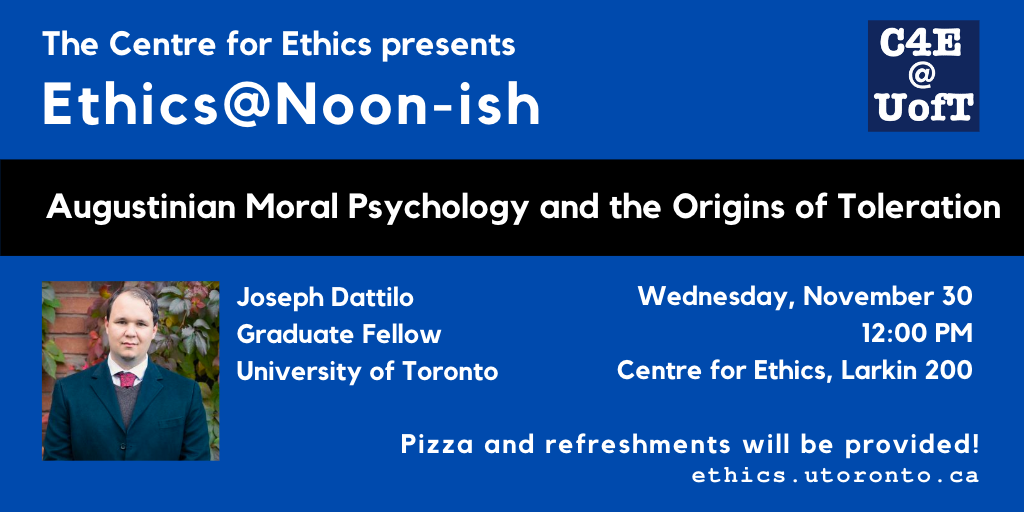
► To stay informed about other upcoming events at the Centre for Ethics, opportunities, and more, please sign up for our newsletter.
Augustinian Moral Psychology and the Origins of Toleration
► this event is in-person at the Centre for Ethics (Larkin building, room 200)

Joseph Dattilo
Doctoral Fellow
University of Toronto
12:00 PM - 01:30 PM
Centre for Ethics, University of Toronto
200 Larkin - Tue, Nov 29, 2022
Paul Bloom, Theories of Perverse Actions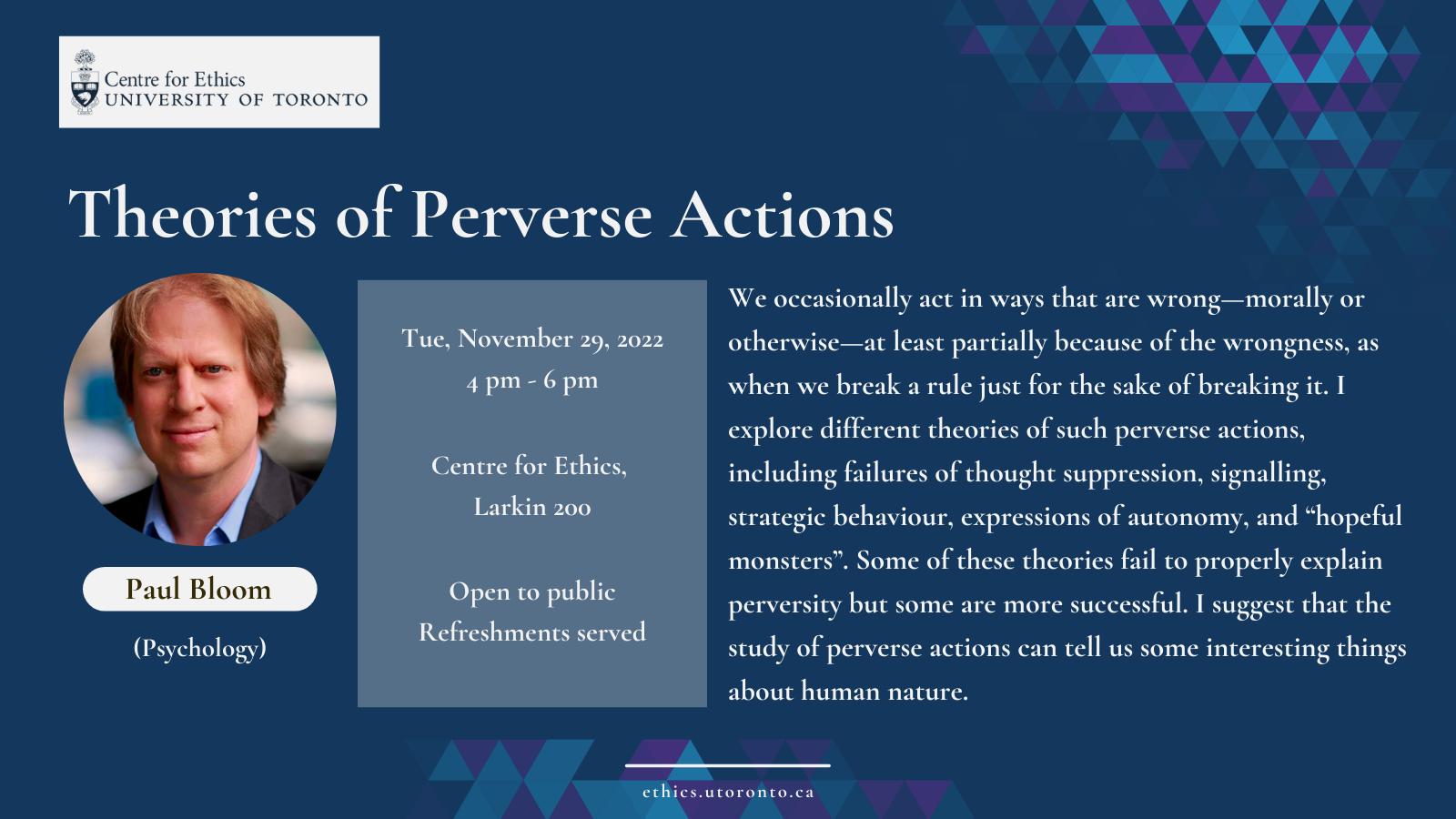
► To stay informed about other upcoming events at the Centre for Ethics, opportunities, and more, please sign up for our newsletter.
Theories of Perverse Actions
We occasionally act in ways that are wrong—morally or otherwise—at least partially because of the wrongness, as when we break a rule just for the sake of breaking it. I explore different theories of such perverse actions, including failures of thought suppression, signalling, strategic behaviour, expressions of autonomy, and “hopeful monsters”. Some of these theories fail to properly explain perversity but some are more successful. I suggest that the study of perverse actions can tell us some interesting things about human nature.
► this event is in-person at the Centre for Ethics (Larkin building, room 200)

Paul Bloom
Professor
Psychology University of Toronto
04:00 PM - 06:00 PM
Centre for Ethics, University of Toronto
200 Larkin - Wed, Nov 23, 2022
Reading Series
Epistemic Injustice in Academia and Education Reading Group
► To stay informed about other upcoming events at the Centre for Ethics, opportunities, and more, please sign up for our newsletter.
Epistemic Injustice in Academia and Education Reading Group
► The reading group will be held in-person at the Centre for Ethics (Larkin building, room 200)
► For more information, please contact Bowen Chan, C4E Doctoral Fellow, at bowench.chan@mail.utoronto.ca
Reading group dates:
- October 26, 2022
- November 9, 2022
- November 23, 2022
- January 18, 2023
- February 1, 2023
- February 15, 2023
- March 8, 2023
- March 22, 2023
12:00 PM - 01:30 PM
Centre for Ethics, University of Toronto
200 Larkin - Fri, Nov 18, 2022
Race, Ethics + Power: Emerging Scholars
Atif Khan, Narrating Hauntings Everywhere: Towards the Edges of Territorial Pakistan (Race, Ethics + Power: Emerging Scholars) ► To stay informed about other upcoming events at the Centre for Ethics, opportunities, and more, please sign up for our newsletter.
► To stay informed about other upcoming events at the Centre for Ethics, opportunities, and more, please sign up for our newsletter.Narrating Hauntings Everywhere: Towards the Edges of Territorial Pakistan
This conversation works to unsettle the territorial enclosure of the postcolonial Pakistani state by raising a series of interdisciplinary questions. Through an intertextual reading of Pakistani-American artist and printmaker Zarina Hashmi (1937-2020) and the Pashtun Tahafuz Movement (PTM), I offer an alternative account to the ongoing militarization of the Pakistani state that has continued to dispossess the most marginal living today in Pakistan. More broadly, I place the Pakistani context within a transnational feminist framework thinking about how historical crossings in the fifteenth century onwards build a critical language to anchor ongoing questions of political violence in the twenty-first century.
► please register here or email ethics@utoronto.ca

Atif Khan
Visual Studies University of TorontoAtif M. Khan (b. Lahore) is an independent researcher, writer and curator exploring experimental text and image-making based in what is currently called Rexdale, Toronto. His current research driven practice intersects key themes of multi-scalar political violence, textual gaps and contemporary exhibition-making. He is currently a Master of Visual Studies student in Curatorial Studies at the University of Toronto, where he is also a Junior Fellow at Massey College.
05:00 PM - 06:30 PM
Centre for Ethics, University of Toronto
200 Larkin - Wed, Nov 16, 2022
Ethics at Noon
Felix Lambrecht, Nothing Can Ever Make It Right: Reparations for Historical Injustice and the Infeasibility of Objection (Ethics@Noon-ish)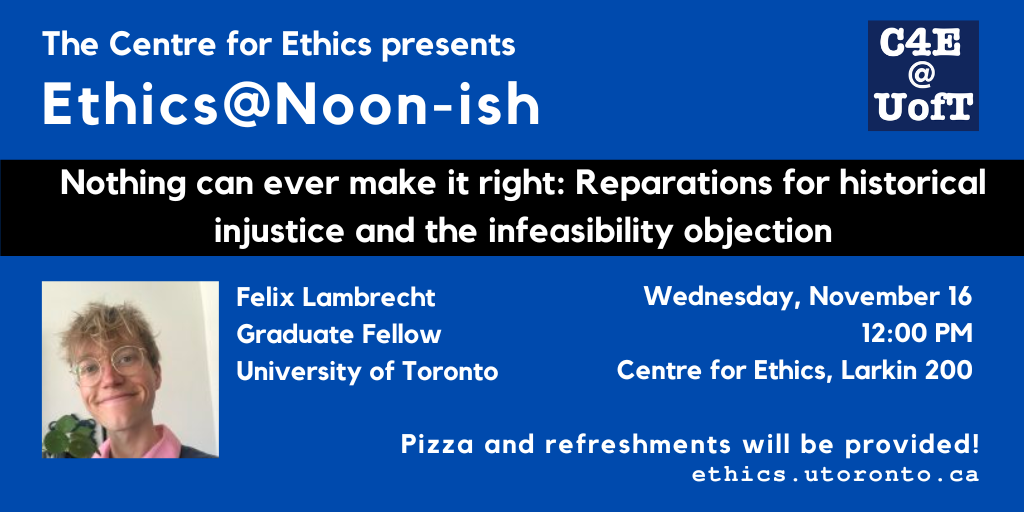
► To stay informed about other upcoming events at the Centre for Ethics, opportunities, and more, please sign up for our newsletter.
Nothing Can Ever Make It Right: Reparations for Historical Injustice and the Infeasibility of Objection
► this event is in-person at the Centre for Ethics (Larkin building, room 200)

Felix Lambrecht
Doctoral Fellow
University of Toronto
12:00 PM - 01:30 PM
Centre for Ethics, University of Toronto
200 Larkin - Wed, Nov 9, 2022
Reading Series
Epistemic Injustice in Academia and Education Reading Group
► To stay informed about other upcoming events at the Centre for Ethics, opportunities, and more, please sign up for our newsletter.
Epistemic Injustice in Academia and Education Reading Group
► The reading group will be held in-person at the Centre for Ethics (Larkin building, room 200)
► For more information, please contact Bowen Chan, C4E Doctoral Fellow, at bowench.chan@mail.utoronto.ca
Reading group dates:
- October 26, 2022
- November 9, 2022
- November 23, 2022
- January 18, 2023
- February 1, 2023
- February 15, 2023
- March 8, 2023
- March 22, 2023
12:00 PM - 01:30 PM
Centre for Ethics, University of Toronto
200 Larkin - Wed, Nov 2, 2022
Ethics at Noon
Jared Riggs, Moral Status and the Ontology and Sociology of AI Agents (Ethics@Noon-ish)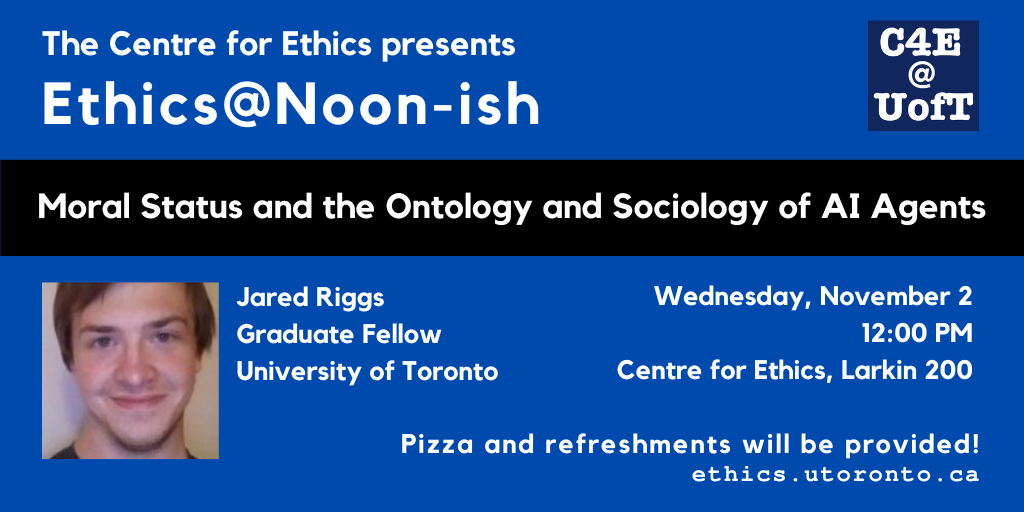
► To stay informed about other upcoming events at the Centre for Ethics, opportunities, and more, please sign up for our newsletter.
Moral Status and the Ontology and Sociology of AI Agents
► this event is in-person at the Centre for Ethics (Larkin building, room 200)

Jared Riggs
Doctoral Fellow
University of Toronto
12:00 PM - 01:30 PM
Centre for Ethics, University of Toronto
200 Larkin - Wed, Oct 26, 2022
Reading Series
Epistemic Injustice in Academia and Education Reading Group
► To stay informed about other upcoming events at the Centre for Ethics, opportunities, and more, please sign up for our newsletter.
Epistemic Injustice in Academia and Education Reading Group
► The reading group will be held in-person at the Centre for Ethics (Larkin building, room 200)
► For more information, please contact Bowen Chan, C4E Doctoral Fellow, at bowench.chan@mail.utoronto.ca
Reading group dates:
- October 26, 2022
- November 9, 2022
- November 23, 2022
- January 18, 2023
- February 1, 2023
- February 15, 2023
- March 8, 2023
- March 22, 2023
12:00 PM - 01:30 PM
Centre for Ethics, University of Toronto
200 Larkin - Fri, Oct 21, 2022
Race, Ethics + Power: Emerging Scholars
Angelica Pesarini, "We can't welcome them all" The Grammar of Race in the Italian Political Discourse (Race, Ethics + Power: Emerging Scholars) ► To stay informed about other upcoming events at the Centre for Ethics, opportunities, and more, please sign up for our newsletter.
► To stay informed about other upcoming events at the Centre for Ethics, opportunities, and more, please sign up for our newsletter.“We can’t welcome them all” The Grammar of Race in the Italian Political Discourse
► please register here or email ethics@utoronto.ca

Angelica Pesarini
04:30 PM - 06:00 PM
Assistant Professor in Italian Studies and Diaspora & Transnational Studies University of Toronto
Centre for Ethics, University of Toronto
200 Larkin - Wed, Oct 19, 2022
Ethics at Noon
Sarah (Sadie) Warren, Food for Thought: Foraging, Identity, and the Roots of Ecological Progress (Ethics@Noon-ish)
► To stay informed about other upcoming events at the Centre for Ethics, opportunities, and more, please sign up for our newsletter.
Food for Thought: Foraging, Identity, and the Roots of Ecological Progress
► this event is in-person at the Centre for Ethics (Larkin building, room 200)

Sarah (Sadie) Warren
Postdoctoral Fellow
University of Toronto
12:00 PM - 01:30 PM
Centre for Ethics, University of Toronto
200 Larkin - Wed, Oct 12, 2022
Ethics at Noon
Bowen Chan, Tough Love, White Lies, Hard Truths, and Mixed Motives (Ethics@Noon-ish)
► To stay informed about other upcoming events at the Centre for Ethics, opportunities, and more, please sign up for our newsletter.
Tough Love, White Lies, Hard Truths, and Mixed Motives
► this event is in-person at the Centre for Ethics (Larkin building, room 200)

Bowen Chan
Doctoral Fellow
University of Toronto
12:00 PM - 01:30 PM
Centre for Ethics, University of Toronto
200 Larkin - Wed, Sep 21, 2022
Ethics at Noon
Federica Berdini, Coping, Agency, and Responsibility: Conceptual and Normative Aspects (Ethics@Noon-ish)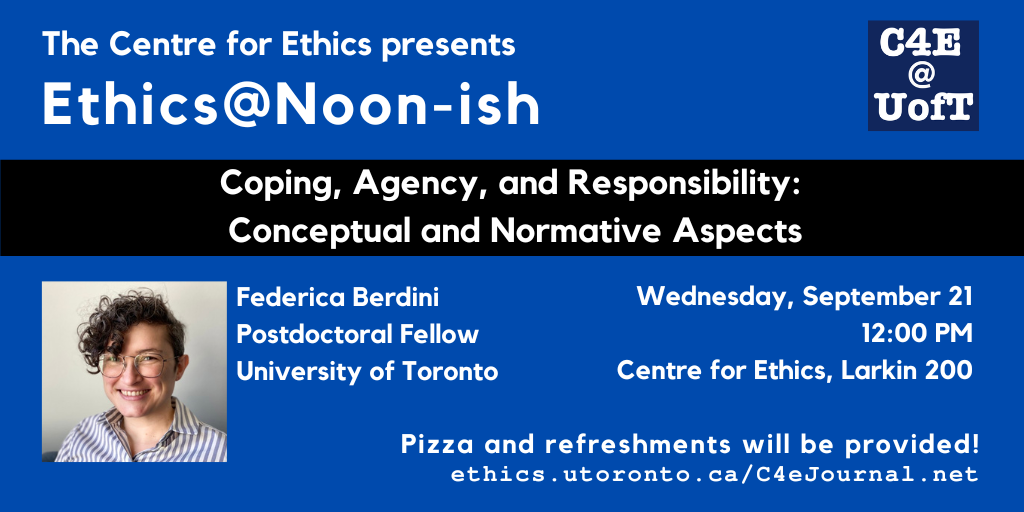
► To stay informed about other upcoming events at the Centre for Ethics, opportunities, and more, please sign up for our newsletter.
Coping, Agency, and Responsibility: Conceptual and Normative Aspects
Psychological resilience is commonly understood as the ability agents exhibit in stressful, uncertain, or challenging situations, when they ‘bounce back,’ adapt, and thrive despite adversity. It is, arguably, the buzz term of our times, pervading common talk in our everyday lives as well as strategic plans in the private, corporate, and public spheres, and is often characterized as a very desirable and sought-after state, quality, or virtue. Philosophy has also demonstrated a novel interest in both the epistemic dimension of resilience and its ethical aspects. Unlike resilience, which remains an elusive construct, coping – construed as a process with the potential to produce resilience – has a longer and better-established history in psychology, and yet remains unexplored in philosophy. This paper begins outlining philosophical characterization of coping by addressing two sets of questions pertaining to its nature and normative assessment.
► this event is in-person at the Centre for Ethics (Larkin building, room 200)

Federica Berdini
Postdoctoral Fellow
University of Toronto
12:00 PM - 01:30 PM
Centre for Ethics, University of Toronto
200 Larkin - Sat, Jul 2, 2022
Conferences
Ethics, Healing & Reconciliation (C4E Undergraduate Research Conference 2022)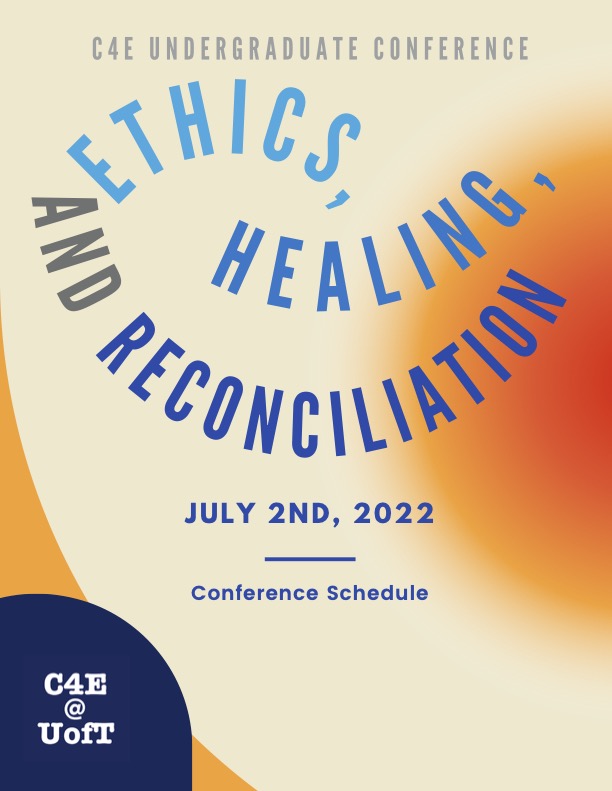
The second C4E Undergraduate Research Conference, entitled Ethics, Healing & Reconciliation, brings together UofT students and recent graduates from across disciplines to present and discuss research in the spirit of the C4E’s mission to explore the ethical dimensions of individual, social, and political life. Additionally, we shall publish the selected papers in the Centre’s multimedia online journal, C4eJournal.
About the theme: The global pandemic is an ongoing battle that affects all spheres of life—including: politics, education, economics, healthcare, and our interpersonal relationships. Such dramatic changes warrant thoughtful reflection on how society shall “heal” in both a literal and figurative sense. We are interested in investigating questions such as: what constitutes an ethical approach to resuming activities given the health and access-based inequities wrought by the pandemic? What is the place of “reconciliation” in quotidian life at a personal level and a larger policy level? In light of these questions, we have selected diverse projects that either focus on the pandemic directly or concern the themes of reconciliation, community building, and overcoming adversity.
★ This is an online event. It will be live streamed on the Centre for Ethics YouTube Channel on July 2, 2022. Channel subscribers will receive a notification at the start of the live stream.
► please register here (free)
► To stay informed about other upcoming events at the Centre for Ethics, opportunities, and more, please sign up for our newsletter.
Conference Schedule
12 pm – Welcome
Panel I — Evaluating Fairness in the Community
12:05 pm – Ana Brinkerhoff, Unenforced Policy in Ontario’s Long-Term Care Homes: Unequal Access in Public and Private Healthcare in a Pandemic
12:15 pm – Cheryl Cheung, A Brave New Age of Damages: The Need for Independent and Reimagined Autonomous Vehicle Insurance
12:25 pm — Panel I Question and Answer Period
Panel II — Promoting Reconciliation and Inclusivity
12:45 pm – Michael Demone, Public History, Ethics, and Reconciliation
12:55 pm – James Ralph, Gender Dysphoria does not Belong in the DSM
1:05 pm — Panel II Question and Answer Period
Panel III — The Philosophy of Human Flourishing
1:25 pm – Ariel LaFayette, Marriage in Modernity
1:35 pm — Radheesh Ameresekere, Towards a Perfectionist Account of Human Rights
1:45 pm — Panel III Question and Answer Period
Biographies
 Ana Brinkerhoff (she/her) is a fourth-year undergraduate student graduating in Political Science and Sociology. Ana’s research interests lie at the crossroads of her two disciplines, particularly in the social impacts of failures of democracy. Her current research examines senior residents in long-term care homes during the COVID-19 pandemic and considers how the state’s failure to intervene harmed the lives of many residents. Ana hopes to expand her research interests at the graduate level in the future.
Ana Brinkerhoff (she/her) is a fourth-year undergraduate student graduating in Political Science and Sociology. Ana’s research interests lie at the crossroads of her two disciplines, particularly in the social impacts of failures of democracy. Her current research examines senior residents in long-term care homes during the COVID-19 pandemic and considers how the state’s failure to intervene harmed the lives of many residents. Ana hopes to expand her research interests at the graduate level in the future. Cheryl Cheung (she/her) is a recent graduate who double-majored in political science and in American studies. She is also a visual artist whose work has appeared at venues such as Myseum, OCAD’s Ada Slaight Gallery, and Arts Etobicoke. Previously, she was a Fulbright Killam Fellow on exchange at American University in Washington, D.C. Currently, she is an Undergraduate Fellow in the Ethics of AI at the University of Toronto’s Centre for Ethics. There, she is exploring the moral limitations of computerization. She is also a graduate fellow at the School of Cities, where she is producing a documentary to demonstrate the politics of community resource access in Toronto’s inner suburbs. Outside of class, she enjoys playing the guitar, skiing, and walking her mum’s dog, Haidyn.
Cheryl Cheung (she/her) is a recent graduate who double-majored in political science and in American studies. She is also a visual artist whose work has appeared at venues such as Myseum, OCAD’s Ada Slaight Gallery, and Arts Etobicoke. Previously, she was a Fulbright Killam Fellow on exchange at American University in Washington, D.C. Currently, she is an Undergraduate Fellow in the Ethics of AI at the University of Toronto’s Centre for Ethics. There, she is exploring the moral limitations of computerization. She is also a graduate fellow at the School of Cities, where she is producing a documentary to demonstrate the politics of community resource access in Toronto’s inner suburbs. Outside of class, she enjoys playing the guitar, skiing, and walking her mum’s dog, Haidyn. James Ralph (they/them) is pursuing a philosophy major/bioethics minor in co-op at the University of Toronto, Scarborough. They are particularly interested in ethics and bioethics and participated in the 2021-22 Socrates Project at UTSC in the bioethics stream. James hopes to use their education in bioethics to enable better healthcare for all, especially for queer people and other marginalized groups. In their free time, they enjoy reading, cooking, and being outdoors.
James Ralph (they/them) is pursuing a philosophy major/bioethics minor in co-op at the University of Toronto, Scarborough. They are particularly interested in ethics and bioethics and participated in the 2021-22 Socrates Project at UTSC in the bioethics stream. James hopes to use their education in bioethics to enable better healthcare for all, especially for queer people and other marginalized groups. In their free time, they enjoy reading, cooking, and being outdoors. Michael Demone (he/him) is a graduate of the University of Toronto and plans to continue on to graduate school. His research interests include Canadian history, politics and foreign affairs, medieval manuscript culture, cybersecurity, and civic life in the digital age. He has worked with the Centre for Human Resources and Industrial Relations, the Canadian Centre for the Responsibility to Protect, the G7/G8 Research Group, the Global Summitry Journal, and the Centre for the Study of the Processes of Government in Canada, and the Canadian Executive Research Foundation.
Michael Demone (he/him) is a graduate of the University of Toronto and plans to continue on to graduate school. His research interests include Canadian history, politics and foreign affairs, medieval manuscript culture, cybersecurity, and civic life in the digital age. He has worked with the Centre for Human Resources and Industrial Relations, the Canadian Centre for the Responsibility to Protect, the G7/G8 Research Group, the Global Summitry Journal, and the Centre for the Study of the Processes of Government in Canada, and the Canadian Executive Research Foundation. Ariel LaFayette (she/her) is a recent graduate and research fellow at the Centre for Ethics. She is passionate about her research in the history of philosophy, which focuses on the evolution of hermeneutics and phenomenology within the philosophy of religion. During Ariel’s undergraduate studies, she was the co-editor in chief of both UofT’s philosophy undergraduate journal and the Canadian national philosophy undergraduate journal. Next year, she will start her Ph.D. in Philosophy at UofT and collaborate with the Centre for Jewish Studies. When she is not working, you will find her at concerts or writing in her journal about her traveling adventures.
Ariel LaFayette (she/her) is a recent graduate and research fellow at the Centre for Ethics. She is passionate about her research in the history of philosophy, which focuses on the evolution of hermeneutics and phenomenology within the philosophy of religion. During Ariel’s undergraduate studies, she was the co-editor in chief of both UofT’s philosophy undergraduate journal and the Canadian national philosophy undergraduate journal. Next year, she will start her Ph.D. in Philosophy at UofT and collaborate with the Centre for Jewish Studies. When she is not working, you will find her at concerts or writing in her journal about her traveling adventures.
12:00 PM - 02:00 PM Radheesh Ameresekere (he/him) is an undergraduate philosopher working primarily on moral philosophy, political philosophy, and the many intersections of these fields. Substantially influenced by both Kant and Aristotle, he is particularly interested in dignity, flourishing, and the good life. Radheesh’s moral and political work has been published in various undergraduate journals, including Critique, Duke Medical Ethics Journal, and Polis. He is also an editor for the university’s own Noēsis. Outside of philosophy, Radheesh enjoys hiking, playing the guitar, and a good cup of tea.
Radheesh Ameresekere (he/him) is an undergraduate philosopher working primarily on moral philosophy, political philosophy, and the many intersections of these fields. Substantially influenced by both Kant and Aristotle, he is particularly interested in dignity, flourishing, and the good life. Radheesh’s moral and political work has been published in various undergraduate journals, including Critique, Duke Medical Ethics Journal, and Polis. He is also an editor for the university’s own Noēsis. Outside of philosophy, Radheesh enjoys hiking, playing the guitar, and a good cup of tea.
Centre for Ethics, University of Toronto
- Thu, Jun 23, 2022
Conferences, Race, Ethics + Power
Anatomies of Grief: Conversations on an Ethics of Living (A Race, Ethics + Power Conference)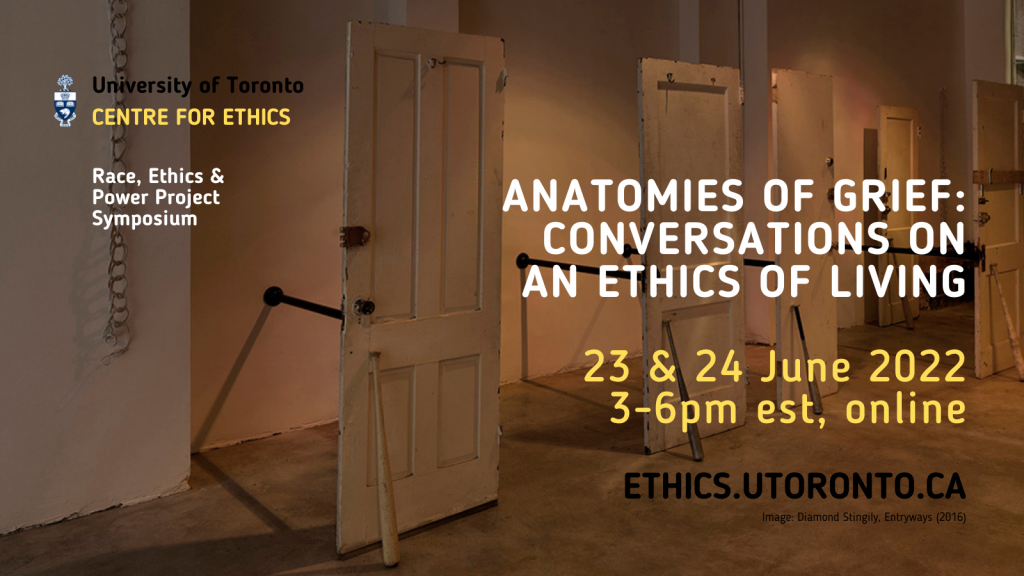
Anatomies of Grief: Conversations on an Ethics of Living
While there has been sustained discussion on grief in relation to illness, war, and death, what is at stake when we explore this affective landscape in relation to loss and sadness, which illuminate grief in the realm of the living?Without abandoning the phenomena of individual and collective mourning in relation to ongoing historical events and atrocities, how might we tend to the deeper revelations that “grief” offers us? What are these revelations that reside beneath “grief” and what do they offer? What ethical engagements with “grief” enable a critique of modern conceptions of temporality, spatiality, and corporeality that often compel, if not demand, a linear engagement with loss, which assumes an expiration of this affective relation? What livable futures might we imagine if we embraced grief as a radical affective resource for change?
This online gathering hosted by Race, Ethics, and Power (REP) Project considers multiple interpretations of grief, while accounting for the situational, local, and transcultural contexts of its emergence.
★ This is an online event. It will be live streamed on the Centre for Ethics YouTube Channel on June 23 & 24, 2022. Channel subscribers will receive a notification at the start of the live stream.
► please register here (free)
► To stay informed about other upcoming events at the Centre for Ethics, opportunities, and more, please sign up for our newsletter.
Thursday, 23 June 2022, 3-6pm
Session I – Black Mourning
Mackenzie Stephenson, Reflecting on ‘The End of White Supremacy, an American Romance’ by Saidiya Hartman
Michelle Aboagye, The Affective Pain of Black Women
Stephanie Latty, Listening to Ghosts: Grieving Dispossession Through HorrorSession II – Colonial Endings
Hazal Halavut, In Search of Grief: Afterlives in Colonial Erasure
Boron Usmon, Grieving a Future: Russian Colonialism, Kyrgyz Poetry, and the End of Times
Vasuki Shanmuganathan, Endless Mourning: Gardiner Expressway Protests and Speaking Tamil Bodies into BeingFriday, 24 June 2022, 3-6pm
Session III – Queer Grief
Ianna Hawkins Owen, Replaying the Record: Grief’s Temporalities
Sohini Chatterjee, Grief, Affective Politics, and Trans Activism as Collective Resistance in India
Christopher Smith, On Necrologies: Catalogues, Digital Archives, and the Limits of Collective MourningSession IV – Being Life
03:00 PM - 06:00 PM
Rebecca Beaulne-Stuebing, Grief Medicines
Jade Hui, A Buddhist ‘Love’ Letter to Hong Kong
Centre for Ethics, University of Toronto
- Mon, Jun 20, 2022
Conferences, Ethics of AI in Context
Conference: Trust and the Ethics of AI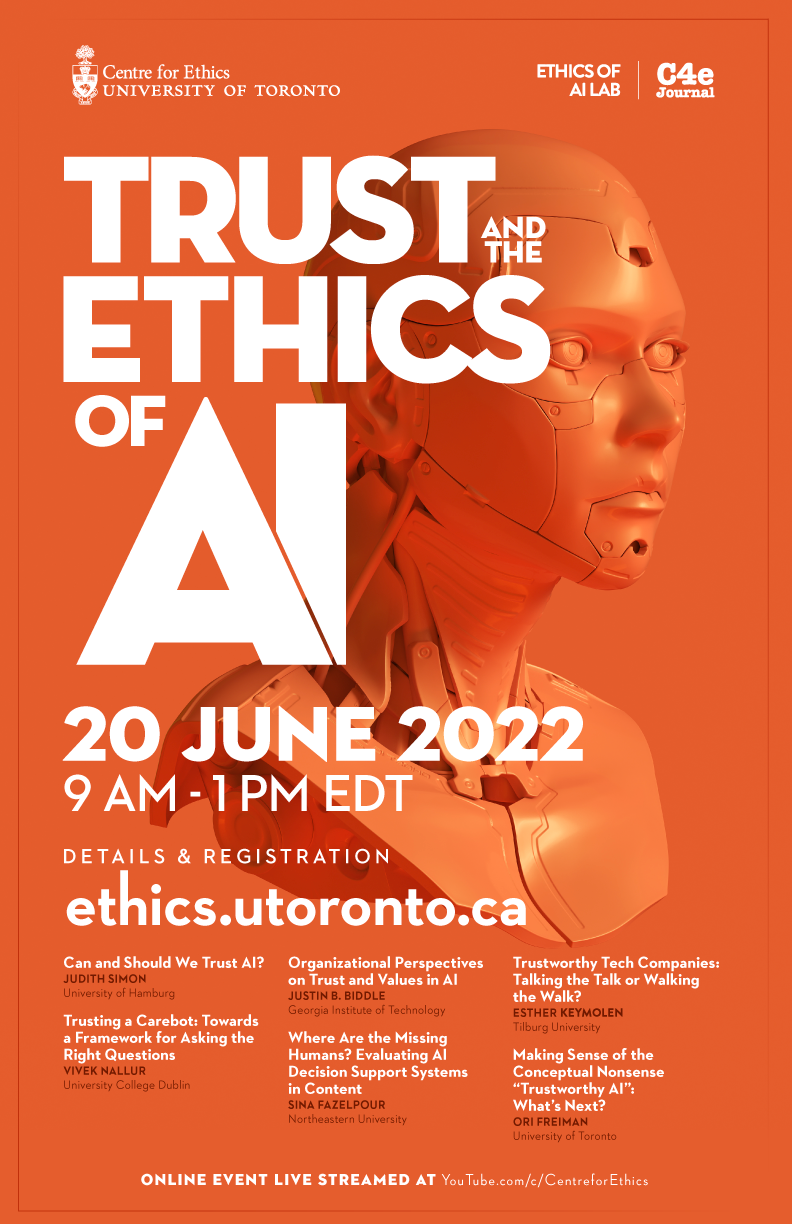 Trust and the Ethics of AI
Trust and the Ethics of AIIn the past few years, numerous policy documents have been crafted to ensure AIs are developed, used, and governed for the sake of the public. Many of these documents outline how we should establish trust in AI, offering ethical principles and guidelines.
The field of ethics of AI has pointed out the positive aspects and the limitations of these efforts. We have learned that AI-based technologies, commonly used by for-profit companies and oppressive law enforcement, often serve the powerful, further inequality, and exclude those who are affected from shaping them. At the same time, we see how research can inform activism and result in a meaningful change.
This workshop aims to address some of the insights that we have gained about the ethics of AI and the concept of trust. We critically explore practical and theoretical issues relating to values and frameworks, engaging with carebots, evaluations of decision support systems, and norms in the private sector. We assess the objects of trust in a democratic setting and discuss how scholars can further shift insights from academia to other sectors. Workshop proceedings will appear in a special symposium issue of C4eJournal.net.
This is an online event. It will be live streamed on the Centre for Ethics YouTube Channel at 9am, Monday, June 20. Channel subscribers will receive a notification at the start of the live stream.
► please register here (free)
Preliminary Schedule
09:00 AM - 01:00 PM9:00-9:10 Hellos and Opening Remarks9:10-9:40 Judith Simon (University of Hamburg): Can and Should We Trust AI?9:40-10:10 Vivek Nallur (University College Dublin): Trusting a Carebot: Towards a Framework for Asking the Right Questions10:10-10:40 Justin B. Biddle (Georgia Institute of Technology): Organizational Perspectives on Trust and Values in AI10:40-11:10 Sina Fazelpour (Northeastern University): Where Are the Missing Humans? Evaluating AI Decision Support Systems in Content11:10-11:40 Esther Keymolen (Tilburg University): Trustworthy Tech Companies: Talking the Talk or Walking the Walk?11:40-12:10 Ori Freiman (University of Toronto): Making Sense of the Conceptual Nonsense “Trustworthy AI”: What’s Next?12:10-12:30 Concluding Discussion and Closing Remarks
Centre for Ethics, University of Toronto
- Fri, Jun 3, 2022
Conferences
Conference: The Right to Have Rights Today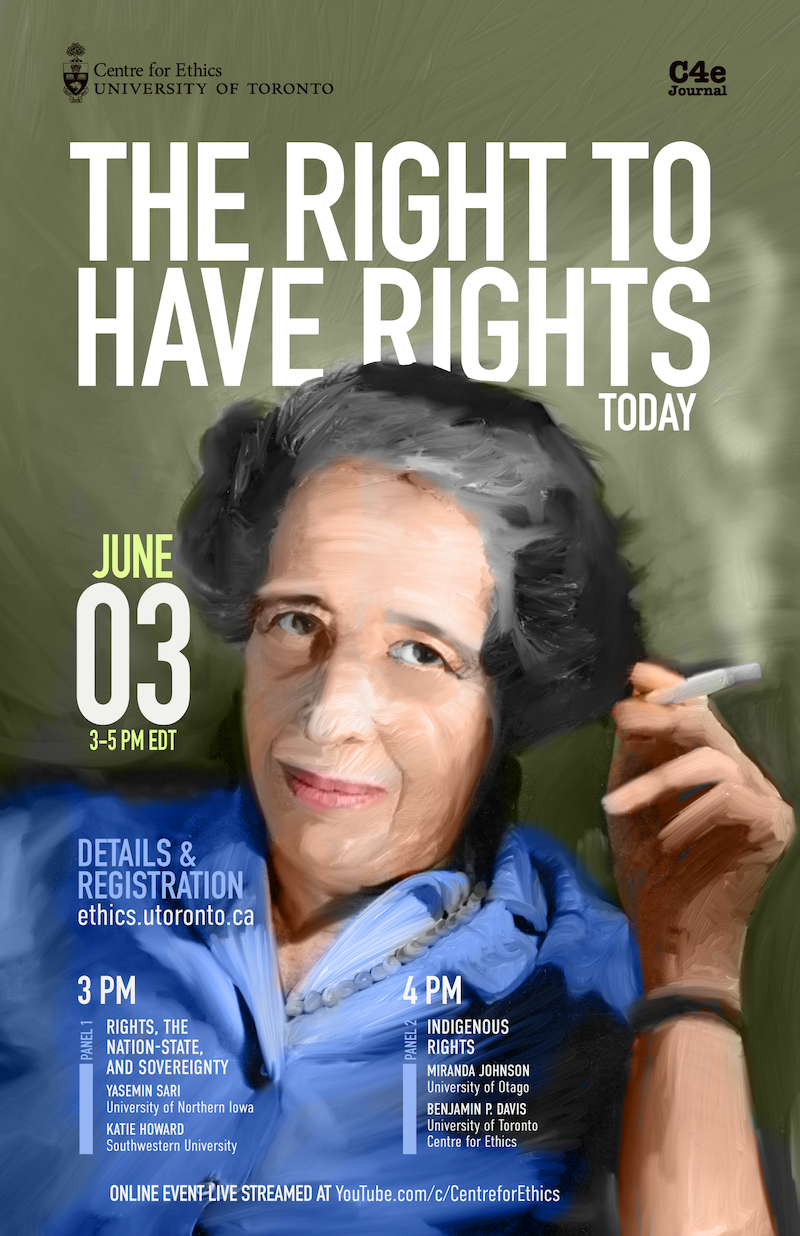
The Right to Have Rights Today
Hannah Arendt’s useful phrase ‘the right to have rights’ asks us to consider foundational rights—to consider on what ‘right’ other ‘rights’ are based. In The Rights of Others, Seyla Benhabib argues that the first right in Arendt’s phrase is addressed to humanity as a call to recognize political membership, where such a ‘right’ to membership entails legal entitlements (the plural ‘rights’). Working with a different literature, and calling into question the still-predominant North American priority of political rights over economic rights, in Basic Rights Henry Shue argues that security and subsistence rights are foundational for other rights. In still different fields and sites, theorists in Native Studies and centuries of Indigenous activism have called for land (back) as foundational to other meaningful economic or political rights, and others in Native Studies and Black Studies have asked theorists, advocates, and organizers to re-think both a strategic reliance on rights claims and a too-easy sense that the nation-state protects rights (e.g. Glen Coulthard, Red Skin, White Masks; Dionne Brand, A Map to the Door of No Return; and Rinaldo Walcott, The Long Emancipation). Finally, Paul Gilroy has recently asked us to re-imagine the history of human rights such that its genealogy begins not with Jefferson and the Declaration of Independence or Eleanor Roosevelt and the Universal Declaration, but with David Walker and Frederick Douglass (cf. Postcolonial Melancholia and Darker than Blue).
In other words, claims to human rights—what they have been, are, and could be—remain unstable into our present, part of a larger contradictory history that includes the South African white supremacist Jan Smuts calling for human rights in the preamble of the United Nations Charter while W. E. B. Du Bois took up the term in his contemporaneous Color and Democracy; or, more recently, when human rights have been invoked to argue both for and against the U.S. invasion of Iraq.
What are we to make of this conceptual instability? What histories, traditions, and cosmologies help us to understand rights claims in new ways? What sites of practice (well beyond political theory) leverage rights in the most useful ways, and what can we learn from these sites, struggles, and celebrations? At the very least, such a contested history of human rights requires what Arendt called thinking, and we look forward to thinking in community in June. Workshop proceedings will appear in a special symposium issue of C4eJournal.net.
► please register here (free)
Preliminary Schedule
3pm = 12pm Pacific/8pm UK/6am Melbourne
Panel 1: Rights, the Nation-State, and SovereigntyYasemin Sari, University of Northern Iowa
“The Right to Have Rights: Humanity and Substantive Belonging”
When Hannah Arendt published The Origins of Totalitarianism in 1951, statelessness—and hence, rightlessness—was the predicament of a post-War Europe. Her criticism of the condition of rightlessness struck right to the heart of the matter in her eloquent criticism of the so-called universal human rights, which since their birth in the 1789 French Declaration had been subject to a plethora of revisions and adoptions, without, however, changing what lay at their core: equality. To be sure, what Arendt diagnosed in this work was not only that human rights were being violated—for that was self-evident—but that statelessness had become a sign of the violation of what she called a “right to have rights.” What this expression implies, which I will try to make explicit, aims to lay the groundwork for articulating the conditions for the political agency of the refugee anew, while at the same time addressing Articles 3, 14, and 28 of the UDHR in the light of this analysis. By taking seriously Arendt’s argument that the right to have rights can only be “guaranteed by humanity itself,” I want to show what a concrete principle of humanity would entail in contrast to a metaphysical one that has informed previous rights-based accounts of what we owe to refugees. As such, I will argue that a concrete principle of humanity rests on a performative account of recognition that allows for the appearance of the refugee as a political agent, where such agency is rests on an “artificial equality” that motivates substantive belonging to a community.Katie Howard, Southwestern University
“The ‘Right to Have Rights,’ the ‘Right to Life,’ and the ‘Right to Maim’”
In The Origins of Totalitarianism, Hannah Arendt traces the process by which a condition of rightlessness is produced so that the “right to life” can be challenged. This account of “statelessness,” which Arendt understands expansively as the loss of a place in the world that guarantees humanity, provides both a critique of universal human rights as inadequate, as well as the basis for a recognition of what she calls “the right to have rights.” Here, I understand “the right to have rights” to refer to the exercise or enactment of a right to struggle for rights. As I will argue, the “right to have rights” is thus a theory of action—an early articulation of the plural, non-sovereign theory of political action that Arendt develops in her later work The Human Condition. In the paper, I return to statelessness as the biopolitical site where the “right to life” is challenged and the “right to have rights” becomes legible. Turning to Arendt’s early critique of Zionism, the paper develops an account of settler colonialism as producing a new statelessness, a state of suspension held in suspension–that is, a dispossession that must be sustained, never complete. This interminable dispossession requires a different model for theorizing sovereign power and points instead to the biopolitics of what Jasbir Puar has recently termed the “right to maim”: the exercise of sovereign power as an ongoing activity that simultaneously injures and sustains (Puar 2017). How does “the right to have rights” as a mode of enactment fare with respect to the “right to maim” understood as the production (in this case, the settler colonial production) of debility? This question will motivate the reflections offered in the paper’s conclusion, which explores the embodied, affective dimensions of Arendt’s “right to have rights.”Panel 2: Indigenous Rights
4pm = 1pm/9pm/7amMiranda Johnson, University of Otago
“Entangled Discourses: Becoming Historical Subjects, Claiming Indigenous Rights”
In my contribution to this discussion on the ‘right to have rights today’ I want to explore the relationship between indigenous rights activism and the writing of indigenous history in the second half of the twentieth century – the long era of decolonization. The two discourses are entangled with each other such that one discourse often provides the justification for the other: the writing of indigenous history is often founded in a claim that to do so is to recognize indigenous people as rights-bearing political subjects; to make a rights claim stick often relies on a historicizing of the rights-holder. I will draw on examples from around the settler world where ‘indigenous’ was redefined in the era of decolonization. Whereas in earlier European imperial discourse, ‘native’ had referred to all peoples subject to colonial rule, in the second half of the twentieth century the term ‘indigenous’ began to be used to denote those minority peoples surrounded by permanent settler states. Over this period, discourses of indigenous rights also changed from what I have called elsewhere a discourse of ‘native assimilative rights’ to one of ‘postcolonial indigenous rights’. The emergence of postcolonial indigenous rights – where ‘postcolonial’ is more complicated than denoting the achievement of new statehood but instead refers both to the continued salience of colonial-era discourses of treaty, native title and so on along with assertions of indigenous self-determination – provoked new kinds of history-writing about indigenous peoples. The fields of Native American, Aboriginal, Māori history etc. emerged in academic discourse. Indigenous peoples were represented as historical subjects and agents not simply objects in the way of frontier settlement. Thus, I argue that the right to have rights in relation to indigeneity is bound up with the writing of indigenous people as historical subjects.Benjamin P. Davis, University of Toronto, Centre for Ethics
“The Right to Have Rights in the Americas: Arendt, Mariátegui, and Monture in Dialogue”
This paper starts from Hannah Arendt’s use of the phrase ‘the right to have rights’ in order to consider which rights ground other rights. To read the right to have rights in the context of the Americas, I start from two contemporary readers of Arendt. First, I follow Seyla Benhabib’s form of reading the first right as the base of the second right(s), but the content I posit is different. My argument is that, in the American context, the first ‘right’ should compel justice-oriented actors to demand the repatriation of federal land to Indigenous nations, whom states such as the U.S. and Brazil have cut off from the realm of public life by forcing them onto reservations. Like the Nazi ‘herding… into ghettos and concentration camps’ that Arendt poignantly documents, American nation-states have followed such forced population transfers with ongoing deprivations of Indigenous rights, including rights to religion and voting rights. But the duty bearer for the right to have rights, in the way I am reading it here, is not just the nation-state. I also want to draw on Lida Maxwell’s reading of ‘to have’ as a call to create and to sustain a world where it is easier to achieve rights. Indeed, to assume that Indigenous nations are demanding simply increased state support can overlook claims to self-determination and the fact that in many cases what is at issue remains unceded land. To flesh out the first right in ‘the right to have rights’ as a right to land, I turn to the Peruvian Marxist José Carlos Mariátegui. Mariátegui insisted that what was called, in his time, the problem of the Indigenous person (el problema del indio) was in fact the problem of an economic order. ‘We are not content with demanding Indigenous rights to education, culture, progress, love, and heaven’, he writes against the humanitarian sentiment that loomed large in his time (and remains in ours). ‘We start by categorically demanding the right to land’. Notably, his is a challenge to taking second- and third-generation rights (here to education and culture) as foundational. Instead, he prioritizes the right to land—it is the first demand, the starting point, of those who approach questions of Indigenous rights, he says, ‘from a socialist point of view’. An interlocutor might here ask whether a right to land is simply a right to property. I conclude in dialogue with Patricia Monture’s language of a right to responsibility to land to underscore that a different epistemology, an Indigenous epistemology around land, grounds the right to land in the Americas. Thus, staging a conversation among Arendt, political theory, and Native Studies, this paper presses that basic rights in the Americas—that the right to have rights in the Americas—have always been about not simply speech or subsistence, but about the land itself.This is an online event. It will be live streamed on the Centre for Ethics YouTube Channel at 3pm, Friday, June 3. Channel subscribers will receive a notification at the start of the live stream.
03:00 PM - 05:00 PM
Centre for Ethics, University of Toronto
- Fri, May 13, 2022
Conferences, Ethics of AI in Context, Critical Race Studies, Race, Ethics + Power
Workshop: Afrofuturism and the Law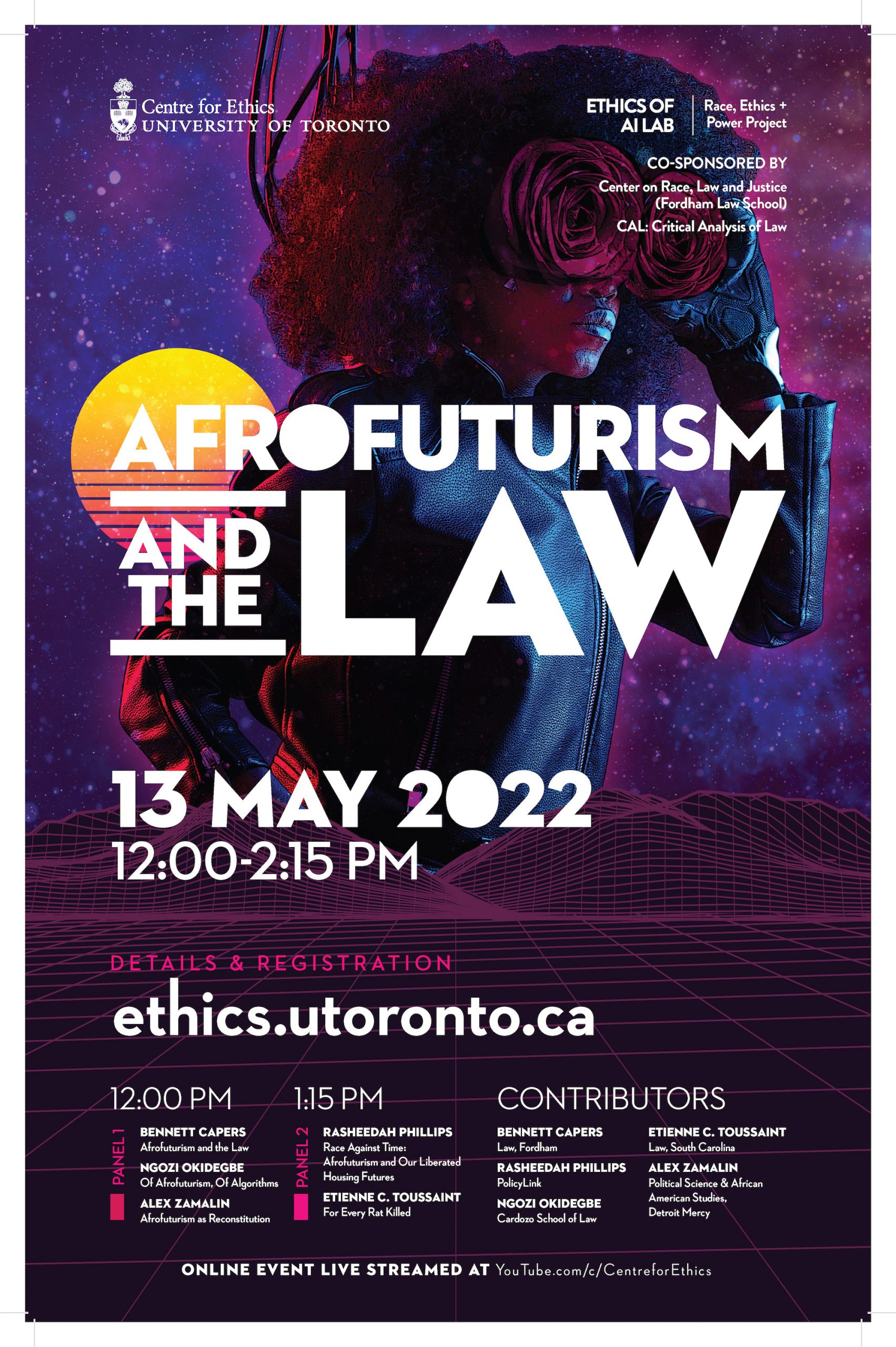
► To stay informed about other upcoming events at the Centre for Ethics, opportunities, and more, please sign up for our newsletter.
Afrofuturism and the Law
Long before the film Black Panther captured the public’s imagination, the cultural critic Mark Dery had coined the term “Afrofuturism” to describe “speculative fiction that treats African-American themes and addresses African-American concerns in the context of twentieth-century technoculture.” Since then, the term has been applied to speculative creatives as diverse as the pop artist Janelle Monae, the science fiction writer Octavia Butler, and the visual artist Nick Cave. But only recently have thinkers turned to how Afrofuturism might guide, and shape, law. The participants in this workshop explore the many ways Afrofuturism can inform a range of legal issues, and even chart the way to a better future for us all.
★ This free online workshop will feature contributors to a special issue, guest edited by Bennett Capers (Law, Fordham), in the open-access online journal Critical Analysis of Law: An International & Interdisciplinary Law Review, published in March 2022. ► Access the special issue here.
► please register here (free)
Schedule
12pm-12:15
Introduction (Bennett Capers)
12:15-1:15
Panel 1
12:15 Of Afrofuturism, Of Algorithms (Ngozi Okidegbe)
12:30 Afrofuturism as Reconstitution (Alex Zamalin)
12:45 Discussion & Q&A1:15-2:15
Panel 2
1:15 Race Against Time: Afrofuturism and Our Liberated Housing Futures (Rasheedah Phillips)
1:30 For Every Rat Killed (Etienne C. Toussaint)
1:45 Discussion & Q&AThis is an online event. It will be live streamed on the Centre for Ethics YouTube Channel at 12pm, Friday, May 13. Channel subscribers will receive a notification at the start of the live stream.
Contributors
- Bennett Capers (Law, Fordham)
- Ngozi Okidegbe (Law Cardozo)
- Alex Zamalin (Political Science & African American Studies, Detroit Mercy)
- Rasheedah Phillips (PolicyLink)
- Etienne C. Toussaint (Law, South Carolina)
Co-sponsors Center on Race, Law and Justice, Fordham Law School
Center on Race, Law and Justice, Fordham Law School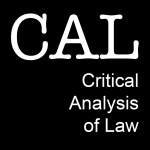 Critical Analysis of Law: An International & Interdisciplinary Law Review
Critical Analysis of Law: An International & Interdisciplinary Law Review
12:00 PM - 02:15 PM
Centre for Ethics, University of Toronto
- Bennett Capers (Law, Fordham)
- Mon, May 2, 2022
Conferences
Workshop: The Ethics of Humanism: Human Rights, Cosmopolitanism, and Resistance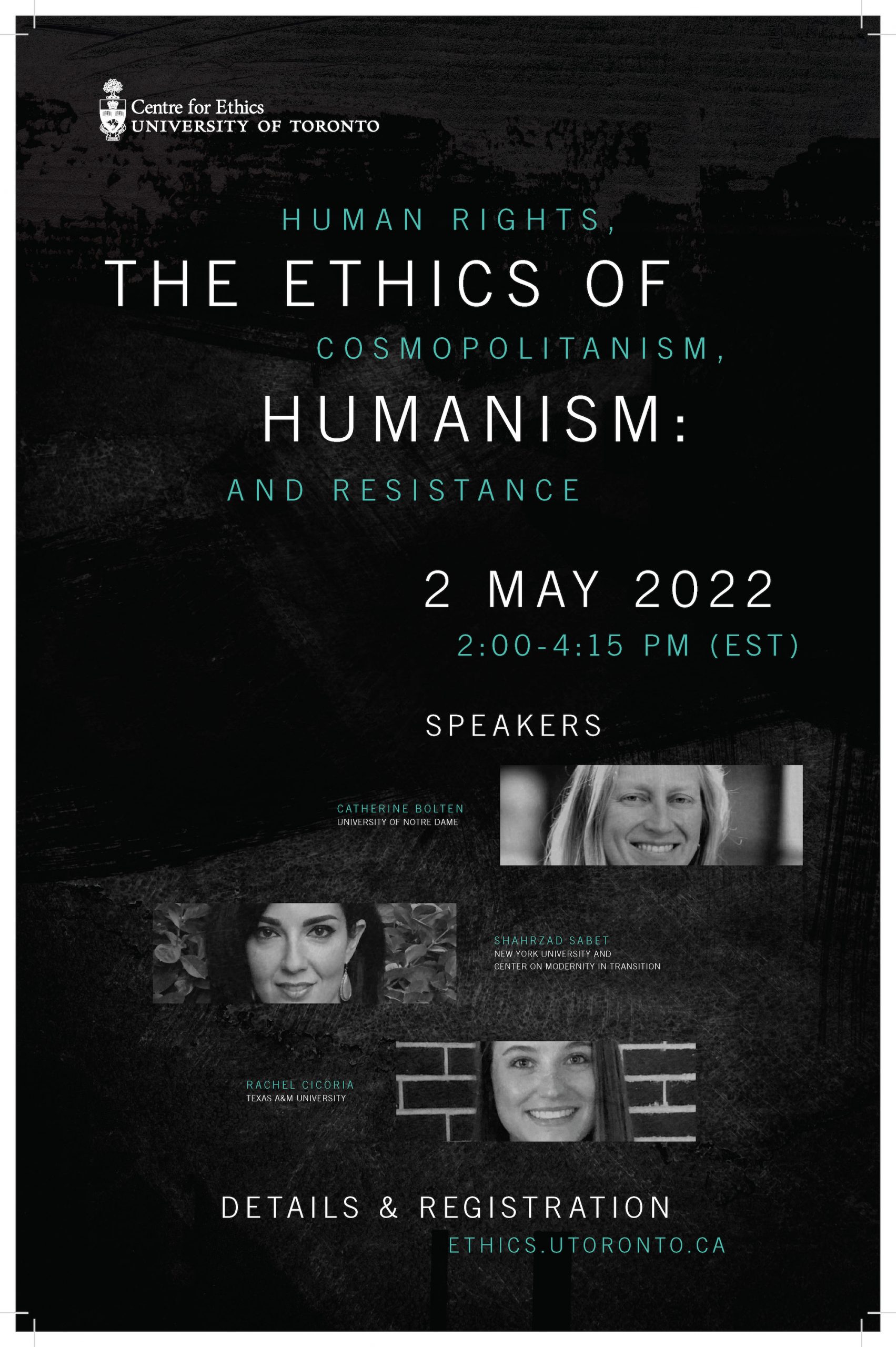
► To stay informed about other upcoming events at the Centre for Ethics, opportunities, and more, please sign up for our newsletter.
The Ethics of Humanism: Human Rights, Cosmopolitanism, and Resistance
Some contemporary ethical theory exhibits skepticism regarding both humanism and rights discourse. Although there is a tradition of critical theory that calls into question Eurocentric humanism while maintaining the need for a new humanism (e.g. Aimé Césaire, Frantz Fanon, Sylvia Wynter, Edward Said), increasingly there is a group of “post-humanists” making a call to abandon “the human” as an aspirational ethical category. Further, the aforementioned humanists as well as the post-humanists take different approaches to claims to human rights, with some maintaining a faith in human rights (e.g. Said) and others wanting to strategically abandon such claims as part of the broader refusal of the category of the human. This interdisciplinary panel will continue this critical conversation by “unpacking” ideas of humanism, human rights, cosmopolitanism, and resistance through raising the following questions: Who counts as human? And what and whom does the category of the human foreclose? What is a right? What political paths and imaginaries do rights claims open and exclude? What is the relationship between cosmopolitanism and humanism? And could humanism open or close paths of resistance?
► please register here (free)
Preliminary Schedule
2pm = 11am Pacific/7pm UK/5am Melbourne
Catherine Bolten, University of Notre Dame
“What Counts as a Right? Formal Education, Vocational Training, and Bad Faith in Sierra Leone”In enacting the “right to education” in Sierra Leone, all the emphasis was placed on formal education, in spite of the fact that the CRC guarantees vocational education on par with formal education. Sierra Leone has an extremely small formal sector and a large and productive artisanal sector, which, I argue, reveals that “the right to education” in Sierra Leone was implemented in bad faith. This takes the form of a refusal to fund artisanal workshops as credible educational institutions, instead pouring all funding, effort, and visibility into a formal education sector that consistently produces high drop-out rates and low attendance at tertiary education, with an even lower level of formal employment for those graduates. This bad-faith implementation of the right to education adversely affects the credibility of the most productive economic sector with children and their parents, and exacerbates economic and social inequalities by pushing counterproductive sacrifices from parents to ‘educate’ children who end up as unskilled, unemployed adults.2:40pm = 11:40/7:40/5:40
Shahrzad Sabet, New York University and Center on Modernity in Transition
“Social Identity and a Reimagined Cosmopolitanism: Liberating the Particular Through the Universal”
The recent surge of nationalism and tribalism across the globe brings renewed salience to questions of collective identity. Notably, it exposes the pervasive tension between bounded social identities and attachments, on the one hand, and universalist yearnings and commitments, on the other. I turn to the cosmopolitan tradition in political theory and argue that some of cosmopolitanism’s most powerful contributions to this debate have been underdeveloped and undervalued. Specifically, this paper draws on empirical research in psychology to argue that cosmopolitanism—and a genuinely cosmopolitan (i.e., universal human) social identity, in particular—represents not just an extension of scope from the national to the global, as is widely conceived, but rather, a qualitatively distinct shift that permeates all identities, and serves to fundamentally protect and liberate our particular attachments from their otherwise inherent instabilities and contradictions. I make the case that it is by leaning into a genuine and thickly conceived universalism that the diversity of our particular identities is secured and promoted.3:20 = 12:20/8:20/6:20
Rachel Cicoria, Texas A&M University
“Resistance Beyond Subjectivity: Rape, Solitude, and Reciprocity”
Using Lugones’ human/non-human distinction as constituting incommensurable socialities, and her situating of the modern subject within a human sociality, this paper explores sexual violation from the experience of those deemed non-subjects and nonhuman. I engage Alcoff’s work on the effects of rape on sexual subjectivity as within a “human” sociality, and explore this in relation to Merleau-Ponty’s phenomenology of touch, Arendt’s account of solitude, and the constitutive role that the experience of revulsion can have on subject formation. Based on Lugones’ decolonial feminism, I show as an alternative to this account a different modality of embodied resistance to sexual violation that is not subjectively but collectively centered, in practices and communities invisible to “human” sociality. My intent is to articulate resistance lived by colonized bodies, one that is not based on the subjective formations of those who are deemed “human.”This is an online event. It will be live streamed on the Centre for Ethics YouTube Channel at 2pm, Monday, May 2. Channel subscribers will receive a notification at the start of the live stream.
02:00 PM - 04:15 PM
Centre for Ethics, University of Toronto
- Fri, Apr 29, 2022
Ethics of Protest
Michael Randall Barnes, Whose Tweets? Our Tweets!: The Challenges of Online Protest (Ethics of Protest)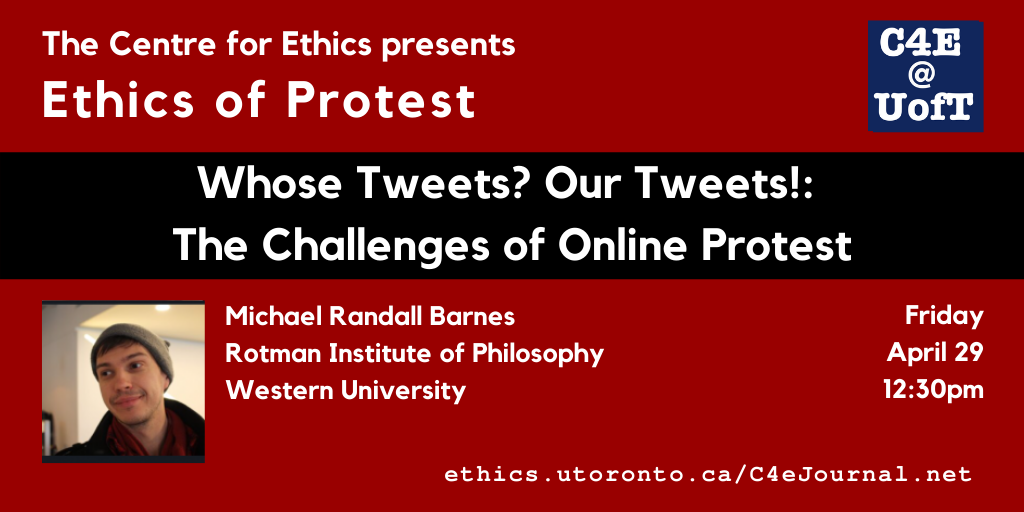 ► To stay informed about other upcoming events at the Centre for Ethics, opportunities, and more, please sign up for our newsletter.
► To stay informed about other upcoming events at the Centre for Ethics, opportunities, and more, please sign up for our newsletter.The type of street protest typical of mass social movements is, paradigmatically, an in-person affair. This has important consequences for how we understand the type of political speech act protest is. Features like its publicness and its embodiedness play significant roles in giving the demands of protest a distinct type of authority that is inseparable from its speakers—and the plurality of speakers is itself pragmatically noteworthy. The rise of online communication platforms, however, offer new opportunities for social movements to leverage public attention and expand their reach. Across the political spectrum, specifically online protest is forcing real world changes at a relentless pace. But the diverse mechanisms of online speech pull against our normal understanding of protest and its rootedness in identifiable speakers making their voices heard at sometimes significant risks to themselves. We can seriously ask whether online protest even is really protest? This talk will explore how features of online speech—its algorithmic mediation, the anonymity/pseudonymity it permits, its global nature yet beholdenness to American businesses, and more—challenge our understanding of protest and force a re-conceptualization of its central features.
► please register here
This is an online event, available on the Centre for Ethics YouTube Channel, on Friday, April 29. Channel subscribers will receive a notification at the start. (For other events in the series, and to subscribe, visit YouTube.com/c/CentreforEthics.)
Michael Randall Barnes
12:30 PM - 01:45 PM
Rotman Institute of Philosophy
Western University
Centre for Ethics, University of Toronto
200 Larkin - Mon, Apr 11, 2022
Ethics & Caribbean Philosophy
Samantha Noël, Tropical Aesthetics of Black Modernism (Ethics & Caribbean Philosophy)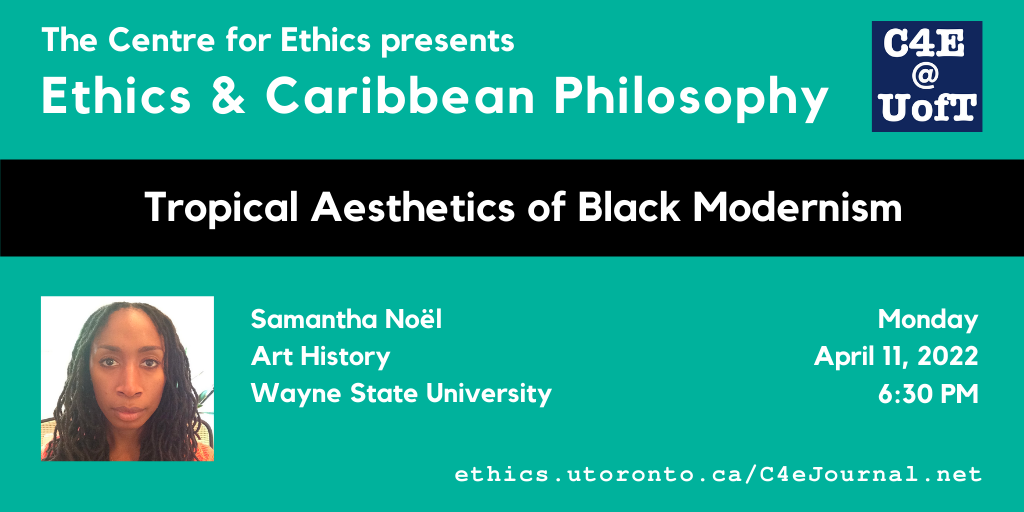 ► To stay informed about other upcoming events at the Centre for Ethics, opportunities, and more, please sign up for our newsletter.
► To stay informed about other upcoming events at the Centre for Ethics, opportunities, and more, please sign up for our newsletter.Tropical Aesthetics of Black Modernism
This is a conversation about Noël’s 2021 book Tropical Aesthetics of Black Modernism. The book focuses on the contributions of Black Caribbean and American artists in the twentieth century, including Wifredo Lam and Maya Angelou. We will hear Noël discuss the history of and readings put forth in the book before moving to audience Q&A.
► please register here
This is an online event, available on the Centre for Ethics YouTube Channel, on Monday, April 11. Channel subscribers will receive a notification at the start. (For other events in the series, and to subscribe, visit YouTube.com/c/CentreforEthics.)
Samantha Noël
Art History
Wayne State UniversityHost:
06:30 PM - 07:45 PM Benjamin P. Davis
Benjamin P. Davis
Postdoctoral Fellow in Ethics
Centre for Ethics
University of Toronto
Centre for Ethics, University of Toronto
200 Larkin - Wed, Apr 6, 2022
Ethics of AI in Context, Ethics of AI in Context: Emerging Scholars
Nathan Olmstead, We are All Ghosts: Sidewalk Toronto, Urban Data, and the Transtemporal Intersubjectivity of Digital Rights (Ethics of AI in Context)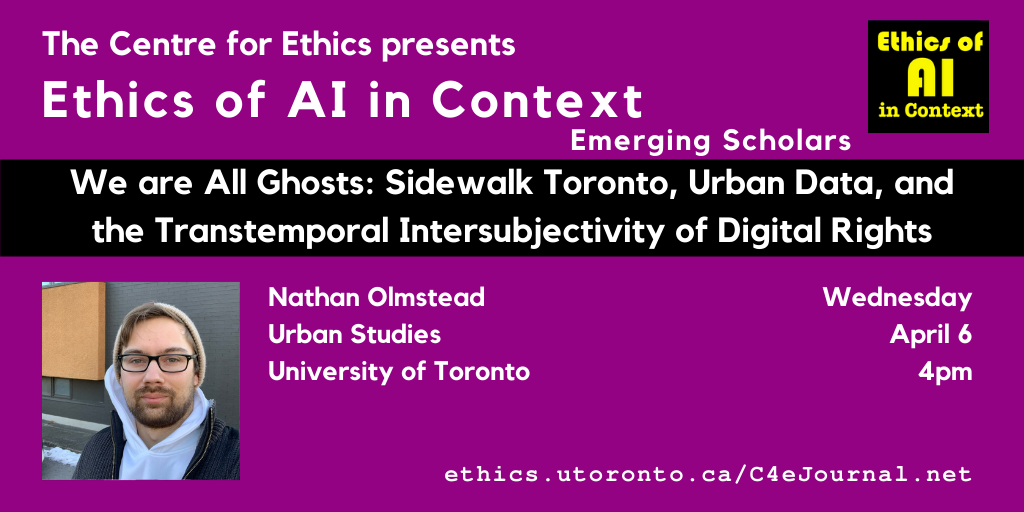
► To stay informed about other upcoming events at the Centre for Ethics, opportunities, and more, please sign up for our newsletter.
We are All Ghosts: Sidewalk Toronto, Urban Data, and the Transtemporal Intersubjectivity of Digital Rights
As the fabric of the city becomes increasingly fibreoptic, enthusiasm for the speed and ubiquity of digital infrastructure abounds. From Toronto to Abu Dhabi, new technologies promise the ability to observe, manage, and experience the city in so-called real-time, freeing cities from the spatiotemporal restrictions of the past. In this project, I look at the way this appreciation for the real-time is influencing our understanding of the datafied urban subject. I argue that this dominant discourse locates digital infrastructure within a broader metaphysics of presence, in which instantaneous data promise an unmediated view of both the city and those within it. The result is a levelling of residents along an overarching, linear, and spatialized timeline that sanitizes the temporal and rhythmic diversity of urban spaces. This same levelling effect can be seen in contemporary regulatory frameworks, which focus on the rights or sovereignty of a largely atomized urban subject removed from its spatiotemporal context. A more equitable alternative must therefore consider the temporal diversity, relationality, and inequality implicit within the datafied city, an alternative I begin to ground in Jacques Derrida’s notion of the spectre. This work is conducted through an exploration of Sidewalk Labs pioneering use of term urban data during their foray in Toronto, which highlights the potentiality of alternative, spectral data governance models at the same time it reflects the limitations of existing frameworks.
► please register here
This is an online event, available on the Centre for Ethics YouTube Channel, on Wednesday, April 6. Channel subscribers will receive a notification at the start. (For other events in the series, and to subscribe, visit YouTube.com/c/CentreforEthics.)

Nathan Olmstead
Urban Studies
University of Toronto
04:00 PM - 05:30 PM
Centre for Ethics, University of Toronto
200 Larkin - Thu, Mar 31, 2022
Race, Ethics + Power
Nadha Hassen & Yuliya Rackal, Critical Perspectives on Race, Place & Health: Anti-Racism in Healthcare as a Case Study (Race, Ethics + Power)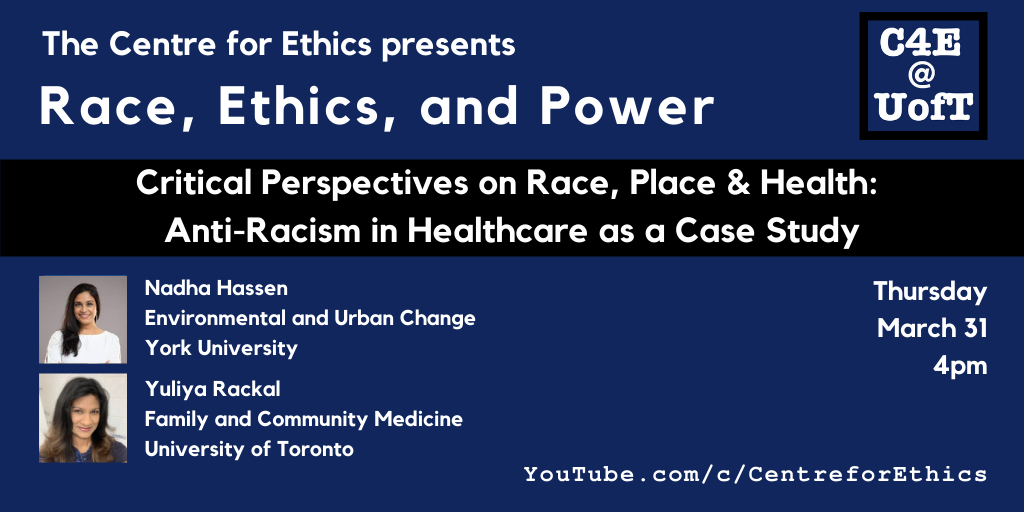
► To stay informed about other upcoming events at the Centre for Ethics, opportunities, and more, please sign up for our newsletter.
Critical Perspectives on Race, Place & Health: Anti-Racism in Healthcare as a Case Study
Racism towards Black, Indigenous and People of Colour is pervasive and continues to exist across different spaces. This racism is built upon a global history of white supremacy, colonialism, and slavery, and has left lasting and ongoing impacts on how people of colour use, navigate and are perceived in different settings/places. A critical approach to understanding the broader links between race, place and health is key, through attention to critical theory and the social and structural determinants of health.
Exploring healthcare settings as a case study, this talk will discuss findings from a scoping review of anti-racism interventions in healthcare settings and present key processes, principles, and strategies for consideration when anti-racism interventions are planned and executed at various levels in healthcare.
► please register here
This is an online event, available on the Centre for Ethics YouTube Channel, on Thursday, March 31. Channel subscribers will receive a notification at the start. (For other events in the series, and to subscribe, visit YouTube.com/c/CentreforEthics.)

Nadha Hassen
Environmental and Urban Change
York UniversityYuliya Rackal
04:00 PM - 05:30 PM
Family and Community Medicine
University of Toronto
Centre for Ethics, University of Toronto
200 Larkin - Wed, Mar 30, 2022
Ethics of AI in Context, Ethics of AI in Context: Emerging Scholars
Erina Moon & Kamilah Ebrahim, Building Algorithms that Work for Everyone: Natural Language Processing Tools for Bias Reduction in Child Welfare Systems (Ethics of AI in Context)
► To stay informed about other upcoming events at the Centre for Ethics, opportunities, and more, please sign up for our newsletter.
Building Algorithms that Work for Everyone: Natural Language Processing Tools for Bias Reduction in Child Welfare Systems
Oftentimes, the development of algorithms are divorced from the environments where they will eventually be deployed. In high stakes contexts, like child welfare services, policymakers and technologists must exercise a high degree of caution in the design and deployment of decisionmaking algorithms or risk further marginalising already vulnerable communities. This talk will seek to explain the status quo of child welfare algorithms, what we miss when we fail to include context in the development of algorithms, and how the addition of qualitative text data can help to make better algorithms.
► please register here
This is an online event, available on the Centre for Ethics YouTube Channel, on Wednesday, March 30. Channel subscribers will receive a notification at the start. (For other events in the series, and to subscribe, visit YouTube.com/c/CentreforEthics.)

Kamilah Ebrahim
iSchool
University of Toronto
Erina Moon
04:00 PM - 05:30 PM
iSchool
University of Toronto
Centre for Ethics, University of Toronto
200 Larkin - Wed, Mar 30, 2022
Ethics at Noon
Gail Super, Precarious Penality and the Myth of Liberal Punishment: Lessons from South Africa (Ethics@Noon-ish)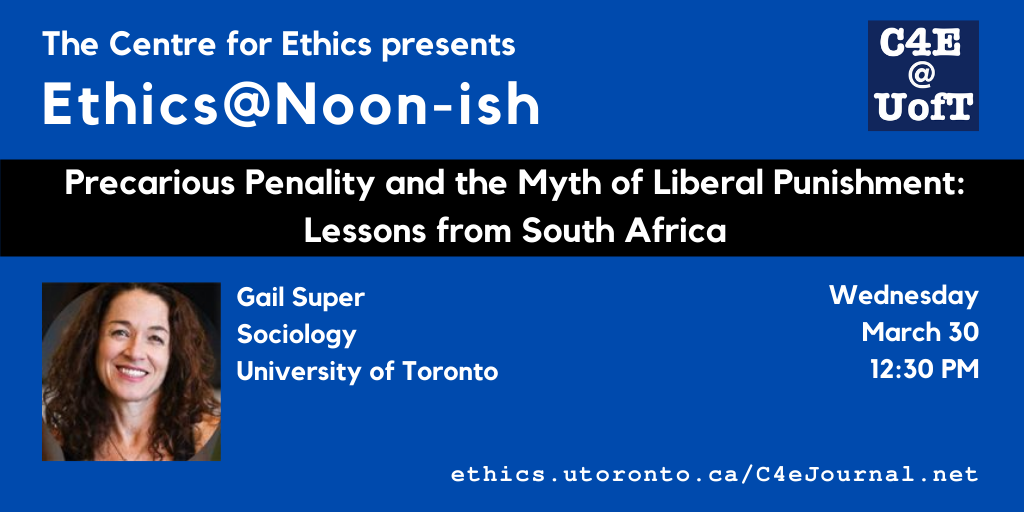
► To stay informed about other upcoming events at the Centre for Ethics, opportunities, and more, please sign up for our newsletter.
Precarious Penality and the Myth of Liberal Punishment: Lessons from South Africa
While liberal law provides that only a judicial officer can impose punishment (during court proceedings, in a certain space, and during specific hours) in practice, the police, prison wardens and civilian actors also punish – but outside of the courts’ spacetime, for different (albeit potentially overlapping) purposes, and in contexts where the protective procedures and principles of liberal law are destabilized. I refer to this as extrajudicial punishment. One of the core arguments I make in this paper is that penal punitiveness cannot be measured through rates of imprisonment alone. This is very apparent in South Africa, where a steep drop in imprisonment rates (from 403 per 100 000 in 2004 to 248 in 2020) has been accompanied by a 2000% increase in prisoners serving life terms, and an increase in recorded cases of extrajudicial penal violence (by inter alia civilians, police officers, and prison wardens). I use the term ‘precarious penality’ to describe this form of penality, where extrajudicial penal violence plays a central role, along with liberal penal forms (such as life imprisonment). The term precarious refers to both the precarity resulting from socio-economic inequality and also to the instability (precarity) of penal forms (for example when a lawful arrest collapses into unlawful violence, or when a lawfully constituted neighborhood watch patrol inflicts extrajudicial punishment). South Africa, with its history of state sanctioned extrajudicial punishment, legal pluralism, and spatialized racism is an obvious example of how precarious and liberal penality interface with, and mutually constitute, each other. Although the discourse of liberal penality centres on the state and its lawful power to punish, in practice extrajudicial punishment (by both state and civilian) actors exists alongside, in the shadow (or underside) of lawful state punishment. Thus, I argue that one cannot discuss extrajudicial punishment without anchoring it in the violence inherent in the liberal state’s penal power. Despite being based on the principles of the Rule of Law, due process, and rationality, liberal punishment is at core exclusionary and unstable. In South Africa, where the boundary between lawful and extrajudicial punishment is blurred and porous, this instability and punitiveness is particularly apparent.
► please register here
This is an online event, available on the Centre for Ethics YouTube Channel, on Wednesday, March 30. Channel subscribers will receive a notification at the start. (For other events in the series, and to subscribe, visit YouTube.com/c/CentreforEthics.)

Gail Super
Sociology
University of Toronto
Co-sponsored by:
12:30 PM - 01:45 PM
Centre for Ethics, University of Toronto
200 Larkin - Fri, Mar 25, 2022
Ethics of Protest
Meena Krishnamurthy, Martin Luther King on Fear and Fearlessness (Ethics of Protest)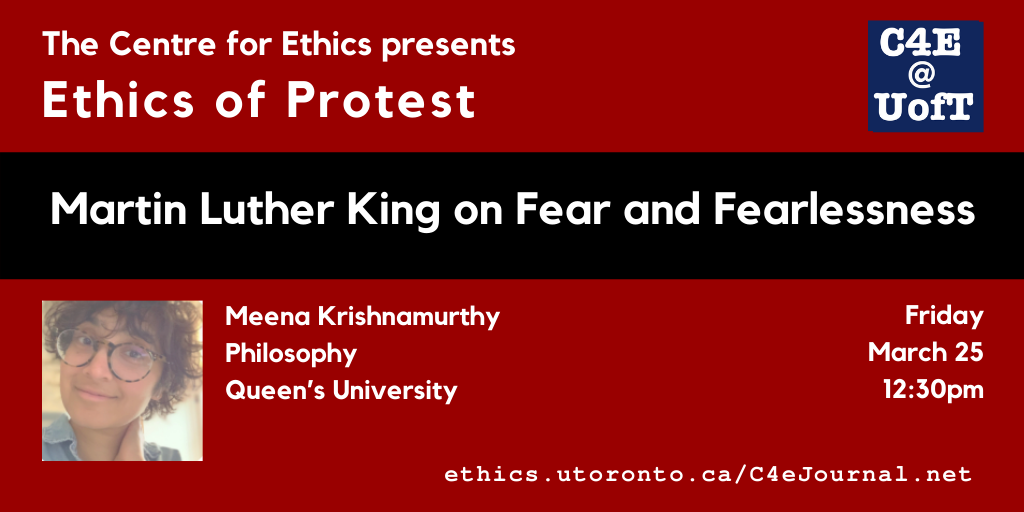 ► To stay informed about other upcoming events at the Centre for Ethics, opportunities, and more, please sign up for our newsletter.
► To stay informed about other upcoming events at the Centre for Ethics, opportunities, and more, please sign up for our newsletter.Martin Luther King on Fear and Fearlessness
Drawing on my book, The Emotions of Nonviolence, I argue that King’s famous “Letter from Birmingham Jail” is not merely a justification of civil disobedience but is also and perhaps even primarily an essay on political motivation. It aims to address a central problem in democratic theory: namely, how can and ought we motivate the (racially) oppressed to engage in civil disobedience or, as King called it, nonviolent direct action. King’s answer is that we must appeal to the political emotions, both positive and negative. In this chapter, I discuss how rational and legitimate fear can stand in the way of political action and how King hoped to overcome this kind of fear through fearlessness. I also discuss the relevance of King’s ideas to the current political situation in the US.
► please register here
This is an online event, available on the Centre for Ethics YouTube Channel, on Friday, March 25. Channel subscribers will receive a notification at the start. (For other events in the series, and to subscribe, visit YouTube.com/c/CentreforEthics.)
Meena Krishnamurthy
12:30 PM - 01:45 PM
Philosophy
Queen’s University
Centre for Ethics, University of Toronto
200 Larkin - Mon, Mar 21, 2022
Ethics & Caribbean Philosophy
Don Deere, Édouard Glissant’s Sense of Space (Ethics & Caribbean Philosophy)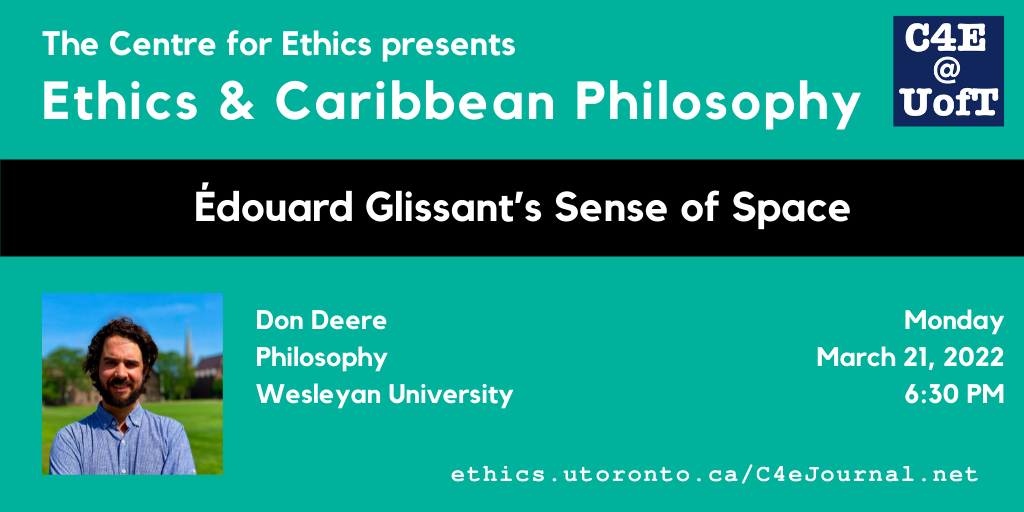 ► To stay informed about other upcoming events at the Centre for Ethics, opportunities, and more, please sign up for our newsletter.
► To stay informed about other upcoming events at the Centre for Ethics, opportunities, and more, please sign up for our newsletter.Édouard Glissant’s Sense of Space
Édouard Glissant is known for articulating a number of concepts, including Relation, opacity, and the all-world or world entire (tout-monde). He also made an important distinction regarding time, insisting on the difference between History (as an official story) and histories (as the stories of peoples, often relayed orally as opposed to being put down in writing). But what about his theories of space, including land? This conversation considers what Glissant offers for thinking about space and place..► please register hereThis is an online event, available on the Centre for Ethics YouTube Channel, on Monday, March 21. Channel subscribers will receive a notification at the start. (For other events in the series, and to subscribe, visit YouTube.com/c/CentreforEthics.)
Don Deere
Wesleyan UniversityHost:
06:30 PM - 07:45 PM Benjamin P. Davis
Benjamin P. Davis
Postdoctoral Fellow in Ethics
Centre for Ethics
University of Toronto
Centre for Ethics, University of Toronto
200 Larkin - Fri, Mar 18, 2022
Ethics of Protest
Candice Delmas, The Right to Hunger Strike (Ethics of Protest) ► To stay informed about other upcoming events at the Centre for Ethics, opportunities, and more, please sign up for our newsletter.
► To stay informed about other upcoming events at the Centre for Ethics, opportunities, and more, please sign up for our newsletter.The Right to Hunger Strike
Hunger strikes are prohibited and repressed in prison, despite human rights advocates’ insistence that incarcerated persons have a right to hunger strike. Physicians and medical ethicists generally ground the right to hunger strike in the right to refuse medical treatment. Lawyers and legal scholars defend hunger strikers’ free speech rights. Philosophers might view the right to hunger strike as an application of the moral right to civil disobedience. All three models of the right to hunger strike are theoretically defective; they misrepresent the hunger strike and fail to properly account for why incarcerated persons resort to hunger strikes in the first place. I put forth the remedial and constructive models as alternative, complementary models of the right to hunger strike. On the remedial model, the right to hunger strike should be recognized and legally protected as a right to petition for redress, given incarcerated persons’ vulnerability to abuse and prisons’ inadequate grievance mechanisms. The constructive model derives the right to hunger strike from the right to resist oppression and stresses the normative permissibility and transformative potential of the use of coercive tactics to defend one’s freedom and self-determination in context of carceral oppression.
► please register here
Candice Delmas
12:30 PM - 01:45 PM
Philosophy of Religion and Political Science
Northeastern University
Centre for Ethics, University of Toronto
200 Larkin - Thu, Mar 17, 2022
Race, Ethics + Power
The Long Emancipation: Readings, Reflections & Provocations (Race, Ethics + Power)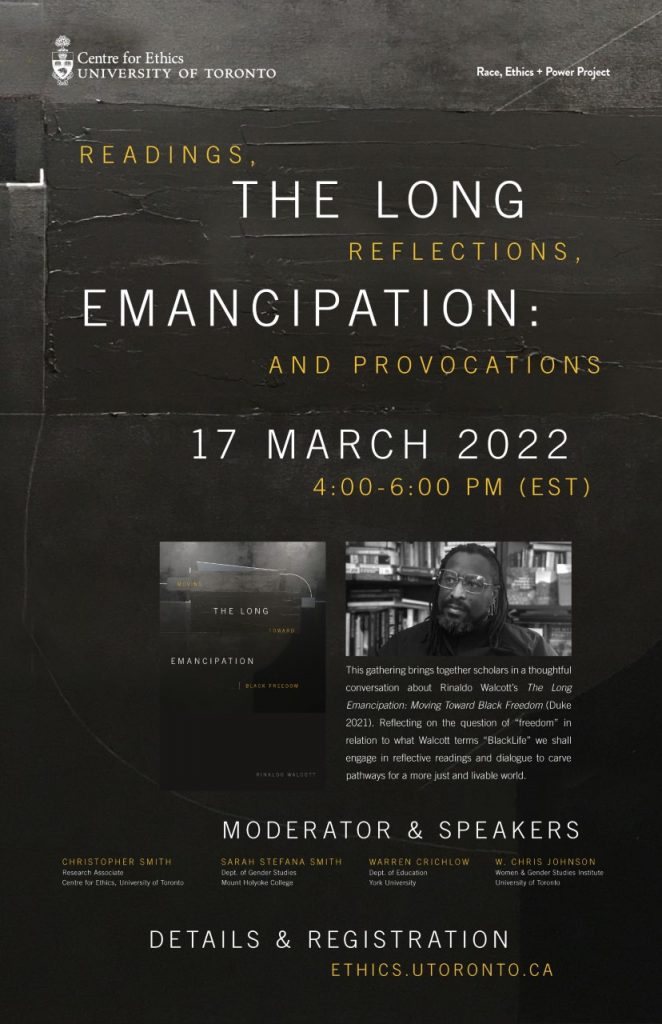
► To stay informed about other upcoming events at the Centre for Ethics, opportunities, and more, please sign up for our newsletter.
The Long Emancipation: Readings, Reflections & Provocations
This gathering brings together scholars in a thoughtful conversation about Rinaldo Walcott’s The Long Emancipation: Moving Toward Black Freedom (Duke 2021). Reflecting on the question of “freedom” in relation to what Walcott terms “BlackLife” we shall engage in reflective readings and dialogue to carve pathways for a more just and livable world.
The format is a reflective conversation wherein each speaker will select and recite a passage from an inspiring chapter from the book and offer their reflections on how the book sets new directions for their own practice in Black studies. Moderated by Dr. Christopher Smith, Research Associate – Centre for Ethics, Race Ethics + Power Project
After the presentations (15 min each) we will have a conversation among ourselves, followed by Rinaldo’s response. We will close the event with a Q&A.
► This is an online event. It will be live streamed on the Centre for Ethics YouTube Channel at 4pm, Thursday, March 17. Channel subscribers will receive a notification at the start of the live stream. (For other C4E events, and to subscribe, visit YouTube.com/c/CentreforEthics.)
► please register here
Rinaldo Walcott

Women & Gender Studies Institute, UofTRinaldo Walcott is Professor of Black Diaspora Cultural Studies in the Women and Gender Studies Institute at the University of Toronto. He is the author of The Long Emancipation: Moving Toward Black Freedom (Duke 2021) and On Property (Biblioasis, 2021) which was short-listed for the Toronto Book Award.
Warren Crichlow

Dept. of Education, York UniversityWarren Crichlow is Associate Professor at York University Toronto, Canada where he teaches cultural studies and education. He is a co-editor of Race, Identity and Representation in Education, Routledge, 1993 & 2005; Toni Morrison and the Curriculum (Cultural Studies, 1995) and Spaces of New Colonialism: Reading Schools, Museums and Cities in the Tumult of Globalization (Peter Lang, 2020), and a co-editor of Unsettling Complacency: Hope and Ethical Responsibility in the Writing of W. G. Sebald (Routledge, forthcoming).
Sarah Stefana Smith

Dept. of Gender Studies, Mount Holyoke CollegeSarah Stefana Smith is a visual artist and scholar. Smith currently holds the position of Assistant Professor of Gender Studies at Mount Holyoke College. Smith received a Ph.D. from the University of Toronto (2016) and MFA from Goddard College (2010). Their research examines the intersections of visuality, queerness and affect in Black art and culture. Smith has published in the Black Scholar, Women & Performance, and South Atlantic Quarterly to name a few. Smith is currently working on their book project, Poetics of Bafflement: Aesthetics of Frustration. For more information, visit: www.sarahstefanasmith.com.
W. Chris Johnson

Women & Gender Studies Institute, UofTW. Chris Johnson is an assistant professor in the Women & Gender Studies Institute and Department of History at the University of Toronto. His teaching and writing explore Black feminist genealogies and transnational histories of gender and Black liberation.
Co-sponsored by:
04:00 PM - 06:00 PM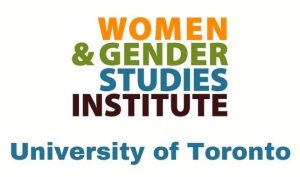
Centre for Ethics, University of Toronto
200 Larkin - Wed, Mar 16, 2022
Ethics of AI in Context, Ethics of AI in Context: Emerging Scholars
Sharon Ferguson, Increasing Diversity in Machine Learning and Artificial Intelligence: A Model of Student Persistence (Ethics of AI in Context)
► To stay informed about other upcoming events at the Centre for Ethics, opportunities, and more, please sign up for our newsletter.
Increasing Dversity in Machine Learning and Artificial Intelligence: A Model of Student Persistence
Machine Learning and Artificial Intelligence are powering the applications we use, the decisions we make, and the decisions made about us. We have already seen numerous examples of what happens when these algorithms are designed without diversity in mind: facial recognition algorithms, recidivism algorithms, and resume reviewing algorithms all produce non-equitable outcomes. As Machine Learning (ML) and Artificial Intelligence (AI) expand into more areas of our lives, we must take action to promote diversity among those working in this field. A critical step in this work is understanding why some students who choose to study ML/AI later leave the field. In this talk, I will outline the findings from two iterations of survey-based studies that start to build a model of intentional persistence in the field. I will highlight the findings that suggest drivers of the gender gap, review what we’ve learned about persistence through these studies, and share open areas for future work.
► please register here
This is an online event, available on the Centre for Ethics YouTube Channel, on Wednesday, March 16. Channel subscribers will receive a notification at the start. (For other events in the series, and to subscribe, visit YouTube.com/c/CentreforEthics.)
 Sharon Ferguson
Sharon Ferguson
Industrial Engineering
University of Toronto
04:00 PM - 05:30 PM
Centre for Ethics, University of Toronto
200 Larkin - Wed, Mar 9, 2022
Ethics of AI in Context, Ethics of AI in Context: Emerging Scholars
Julian Posada, The Coloniality of Data Work for Machine Learning (Ethics of AI in Context)
► To stay informed about other upcoming events at the Centre for Ethics, opportunities, and more, please sign up for our newsletter.
The Coloniality of Data Work for Machine Learning
Many research and industry organizations outsource data generation, annotation, and algorithmic verification—or data work—to workers worldwide through digital platforms. A subset of the gig economy, these platforms consider workers independent users with no employment rights, pay them per task, and control them with automated algorithmic managers. This talk explores how the coloniality of data work is characterized by an extractivist method of generating data that privileges profit and the epistemic dominance of those in power. Social inequalities are reproduced through the data production process, and local worker communities mitigate these power imbalances by relying on family members, neighbours, and colleagues online. Furthermore, management in outsourced data production ensures that workers’ voices are suppressed in the data annotation process through algorithmic control and surveillance, resulting in datasets generated exclusively by clients, with their worldviews encoded in algorithms through training.
► please register here
This is an online event, available on the Centre for Ethics YouTube Channel, on Wednesday, March 9. Channel subscribers will receive a notification at the start. (For other events in the series, and to subscribe, visit YouTube.com/c/CentreforEthics.)
 Julian Posada
Julian Posada
Faculty of Information
University of Toronto
04:00 PM - 05:30 PM
Centre for Ethics, University of Toronto
200 Larkin - Tue, Mar 8, 2022
Ethics of AI in Context
Tom Yeh & Benjamin Walsh, Is AI Creepy or Cool? Teaching Teens About AI and Ethics (Ethics of AI in Context)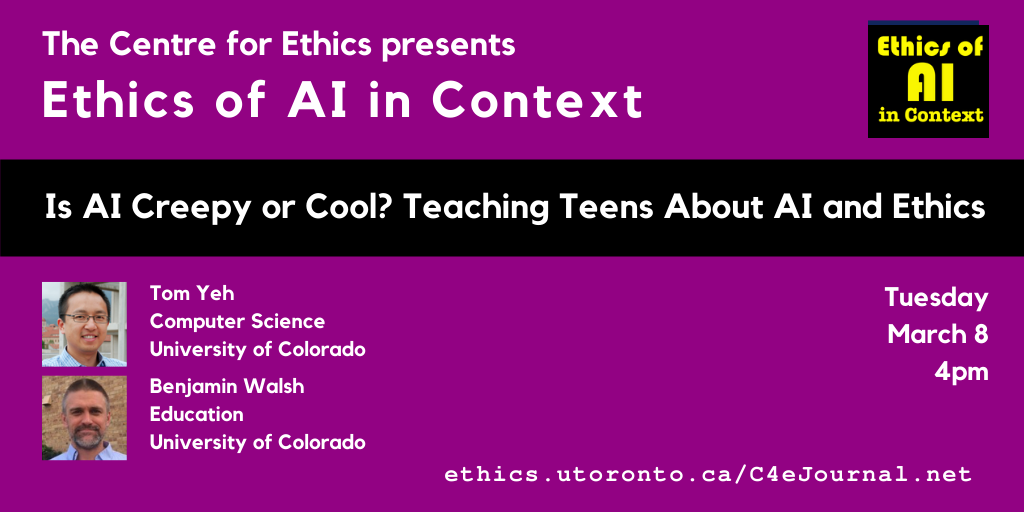
► To stay informed about other upcoming events at the Centre for Ethics, opportunities, and more, please sign up for our newsletter.
Teens have different attitudes toward AI. Some are excited by AI’s promises to change their future. Some are afraid of AI’s problems. Some are indifferent. There is a consensus among educators that AI is a “must-teach” topic for teens. But how? In this talk, we will share our experiences and lessons learned from the Imagine AI project, funded by the National Science Foundation and advised by the Center for Ethics (C4E). Unlike other efforts focusing on AI technologies, Imagine AI takes a unique approach by focusing on AI ethics. Since 2019, we have partnered with more than a dozen teachers to teach hundreds of students in different classrooms and schools about AI ethics. We tried a variety of pedagogies and tested a range of AI ethics topics to understand their relative effectiveness to educate and abilities to engage. We found promising opportunities, such as short stories, as well as tensions. Our short stories are original, centering on young protagonists, and contextualizing ethical dilemmas in scenarios relatable to teens. We will share what stories are more engaging than the others, how teachers are using the stories in classrooms, and how students are responding to the stories.
Moreover, we will discuss the tensions we identified. For students, there is a tension of balance: how can we teach AI ethics without inducing a chilling effect? For teachers, there is a tension of authority: which teacher, a social study teacher well-versed in social issues, a science teacher skilled in modern technology, or an English literacy teacher experienced in discussing dilemmas and critical thinking, would be the most authoritative to teach about AI ethics? Another tension is urgency: while teachers agree AI ethics is an urgent topic because of AI’s far-reaching influence on teens’ future, they struggle to meet teens’ even more urgent and immediate needs such as social-emotional issues worsened by the pandemic, interruption of education, loss of housing, and even school shootings. Is now really a good time to talk about AI ethics? But if not now, when? We will discuss the implications of these tensions and potential solutions. We will conclude with a call for action for experts on AI and ethics to partner with educators to help our future generations “imagine AI.”
► please register here
This is an online event, available on the Centre for Ethics YouTube Channel, on Tuesday, March 8. Channel subscribers will receive a notification at the start. (For other events in the series, and to subscribe, visit YouTube.com/c/CentreforEthics.)

Tom Yeh
Computer Science
University of Colorado
Benjamin Walsh
04:00 PM - 05:30 PM
Education
University of Colorado
Centre for Ethics, University of Toronto
200 Larkin - Fri, Mar 4, 2022
Ethics of Protest
Erin Pineda, An Entire World in Motion: Civil Disobedience as Decolonizing Praxis (Ethics of Protest) ► To stay informed about other upcoming events at the Centre for Ethics, opportunities, and more, please sign up for our newsletter.
► To stay informed about other upcoming events at the Centre for Ethics, opportunities, and more, please sign up for our newsletter.An Entire World in Motion: Civil Disobedience as Decolonizing Praxis
Civil disobedience is often situated within the bounds of the democratic, constitutional state: protestors break the law in letter but appeal to its spirit by appealing to democracy’s core principles–a form of action epitomized by, and often linked to, the example of the US civil rights movement. This chapter develops an alternative framework for understanding the civil disobedience of civil rights activists: as a decolonizing praxis that linked their dissent to that of anticolonial activists, and tied the context of Jim Crow to global white supremacy. If the constitutional, democratic state formed the normative horizon for liberal understandings of civil disobedience, activists’ horizon was defined by processes of imaginative transit – the process of thinking and traveling across boundaries and disparate contexts, though which activists in motion constructed civil disobedience as a means of transforming worldwide structures of racist imperialism, colonial rule, apartheid, and Jim Crow. Between 1920 and 1960, African American, Indian, South African, and Ghanaian activists proposed, debated, and wielded nonviolent direct action as a means of self-liberation from white supremacy’s structures of fear and violence, and a way of disrupting and transforming the practices that held those structures in place.
► please register here
This is an online event, available on the Centre for Ethics YouTube Channel. Channel subscribers will receive a notification at the start. (For other events in the series, and to subscribe, visit YouTube.com/c/CentreforEthics.)

Erin Pineda
12:30 PM - 01:45 PM
Assistant Professor of Government
Smith College
Centre for Ethics, University of Toronto
200 Larkin - Thu, Mar 3, 2022
Race, Ethics + Power
Jonathan Hamilton-Diabo, Fill the Earth and Subdue: Exploring Domination, Responsibilities and Relationships through Land Acknowledgements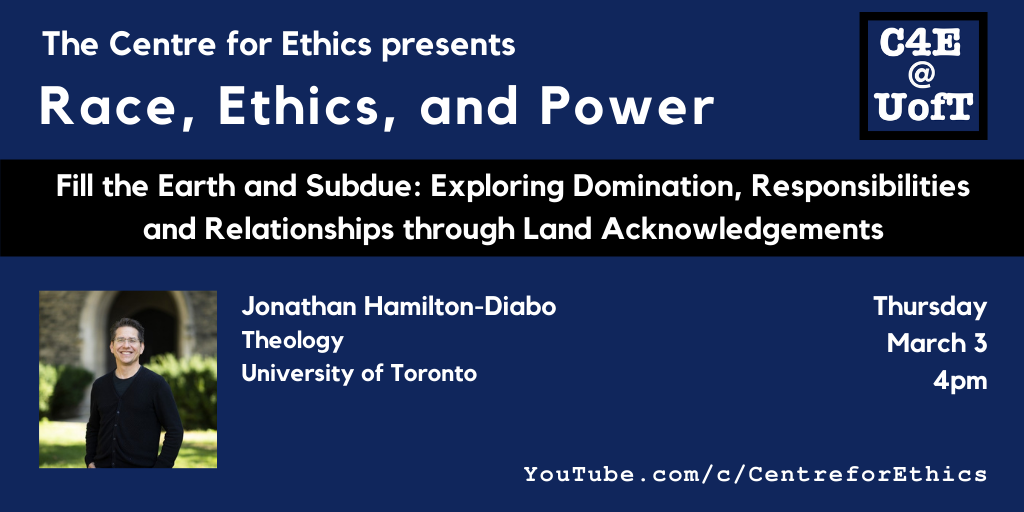
► To stay informed about other upcoming events at the Centre for Ethics, opportunities, and more, please sign up for our newsletter.
Fill the Earth and Subdue: Exploring Domination, Responsibilities and Relationships through Land Acknowledgements
Land acknowledgements have become common place for many institutions (government, schools, religious organizations). Many look to develop one in order to contribute to reconciliation with Indigenous communities, however there are misconceptions while being developed or lack of understanding when being used. Using Creation Stories from Christian and Indigenous perspectives, this session will explore themes of power imbalance, exploitation and responsibilities.
► please register here

Jonathan Hamilton-Diabo
04:00 PM - 05:30 PM
Theology
University of Toronto
Centre for Ethics, University of Toronto
200 Larkin - Wed, Mar 2, 2022
Ethics of AI in Context, Ethics of AI in Context: Emerging Scholars
Mishall Ahmed, Difference Centric yet Difference Transcended (Ethics of AI in Context)
► To stay informed about other upcoming events at the Centre for Ethics, opportunities, and more, please sign up for our newsletter.
Difference Centric yet Difference Transcended: The Reliance on Difference in the Ethics of AI
Developed along existing asymmetries of power, AI and its applications further entrench, if not exacerbate social, racialized, and gendered inequalities. As critical discourse grows, scholars make the case for the deployment of ethics and ethical frameworks to mitigate harms disproportionately impacting marginalized groups. However, there are foundational challenges to the actualization of harm reduction through a liberal ethics of AI. In this talk I will highlight the foundational challenges posed to goals of harm reduction through ethics frameworks and its reliance on social categories of difference.
► please register here

Mishall Ahmed
04:00 PM - 05:30 PM
Political Science
York University
Centre for Ethics, University of Toronto
200 Larkin - Tue, Mar 1, 2022
Ethics of AI in Context
Dafna Dror-Shpoliansky & Yuval Shany, It’s the End of the (Offline) World as We Know It: From Human Rights to Digital Human Rights – A Proposed Typology (Ethics of AI in Context)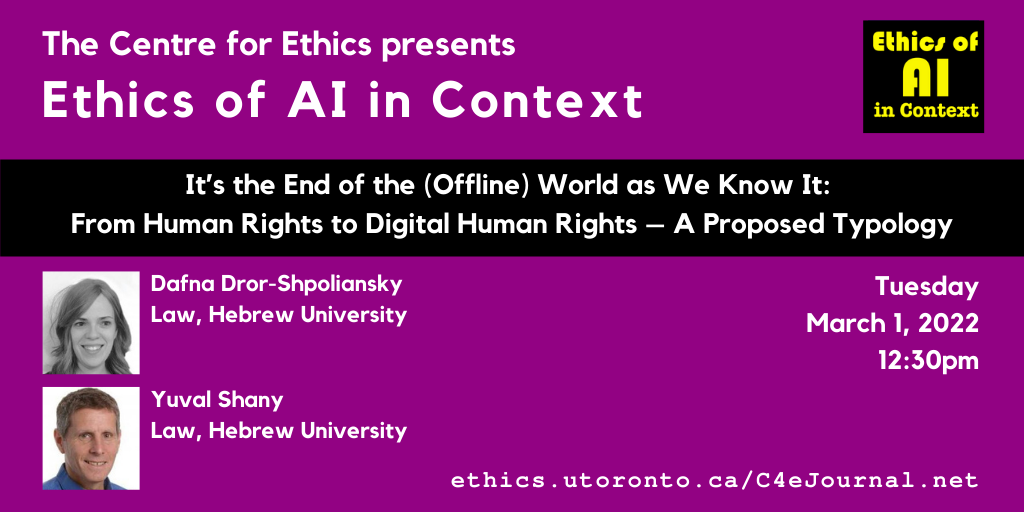
► To stay informed about other upcoming events at the Centre for Ethics, opportunities, and more, please sign up for our newsletter.
It’s the End of the (Offline) World as We Know It: From Human Rights to Digital Human Rights – A Proposed Typology
‘The same rights that people have offline must also be protected online’ is used in recent years as a dominant concept in international discourse about human rights in cyberspace. But does this notion of ‘normative equivalency’ between the ‘offline’ and the ‘online’ afford effective protection for human rights in the digital age?
The presentation reviews the development of human rights in cyberspace as they were conceptualized and articulated in international fora and critically evaluate the normative equivalency paradigm adopted by international bodies for the online application of human rights. It then attempts to describe the contours of a new digital human rights framework, which goes beyond the normative equivalency paradigm, and presents a typology of three ‘generations’ or modalities in the evolution of digital human rights.
In particular, we focus on the emergence of new digital human rights and present two prototype rights – the right to Internet access and the right not to be subject to automated decision – and discuss the normative justifications invoked for recognizing these new digital human rights. We propose that such a multilayered framework corresponds better than the normative equivalency paradigm to the unique features and challenges of upholding human rights in cyberspace.
► please register here
This is an online event, available on the Centre for Ethics YouTube Channel, on Tuesday, March 1. Channel subscribers will receive a notification at the start. (For other events in the series, and to subscribe, visit YouTube.com/c/CentreforEthics.)
 Dafna Dror-Shpoliansky
Dafna Dror-Shpoliansky
Hebrew University
Law
12:30 PM - 01:45 PM Yuval Shany
Yuval Shany
Hebrew University
Law
Centre for Ethics, University of Toronto
200 Larkin - Fri, Feb 25, 2022
Race, Ethics + Power, Ethics of Protest
Myisha Cherry, On James Baldwin and Black Rage (Ethics of Protest)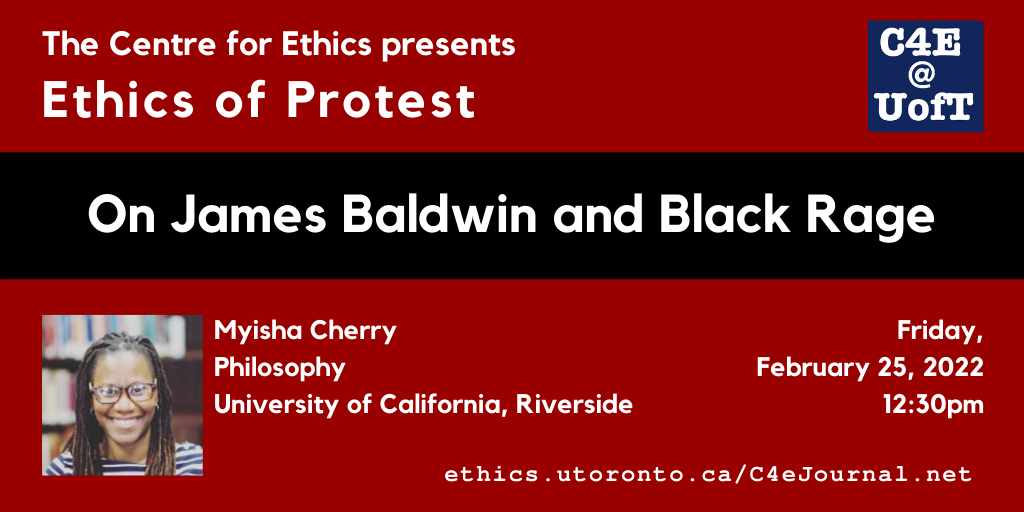
► To stay informed about other upcoming events at the Centre for Ethics, opportunities, and more, please sign up for our newsletter.
On James Baldwin and Black Rage
What I aim to elucidate in this talk is Baldwin’s moral psychology of anger in general, and black rage in particular, as seen in his nonfiction. I’ll show that Baldwin’s thinking is significant for moral psychology and is relevant to important questions at the intersection of philosophy of emotion, race, and social philosophy. It also has pragmatic application to present-day anti-racist struggle. Baldwin’s theoretical account of Black rage, I’ll argue, (1) dignifies Blacks by centering them as people with agential capacities and (2) provides them with a pragmatic politics of rage that is useful in the fight against white supremacy and racial injustice.
► please register here

Myisha Cherry
12:30 PM - 01:45 PM
Assistant Professor of Philosophy
University of California, Riverside
Centre for Ethics, University of Toronto
200 Larkin - Wed, Feb 23, 2022
Ethics at Noon
Clayton Chin, Recognition as Acknowledgement: Symbolic Politics in Multicultural Democracies (Ethics@Noon-ish)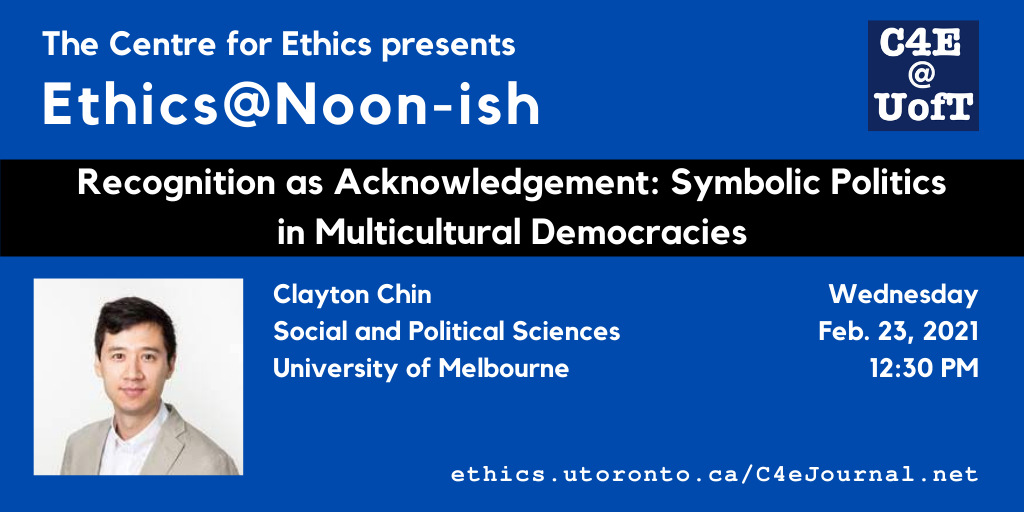
► To stay informed about other upcoming events at the Centre for Ethics, opportunities, and more, please sign up for our newsletter.
Recognition as Acknowledgement: Symbolic Politics in Multicultural Democracies
Political symbolism is both integral to the social unity of democratic states and a source of deep controversy. Many of these debates concern the problem of symbolic inclusion: the extent to which democratic states should actively transform political identity to be more inclusive of their constituent groups. This article argues that the two dominant philosophical approaches to defending multiculturalism, liberal cultural rights theory and recognition theory, conceptualize recognition in ways that neglect the symbolic inclusion of immigrant groups. This is because members of minorities may formally enjoy individual rights and state accommodations of their cultures and yet still be symbolically marginalized. To address this, we develop a specifically multicultural concept of recognition as a form of acknowledgment. Such acknowledgement addresses the political belonging and democratic standing of immigrant communities, and takes general (e.g. valuing diversity) and specific (addressing particular communities) forms. The analysis suggests new lines of cross-national research.
► please register here
This is an online event, available on the Centre for Ethics YouTube Channel. Channel subscribers will receive a notification at the start. (For other events in the series, and to subscribe, visit YouTube.com/c/CentreforEthics.)
 Social and Political SciencesUniversity of MelbourneCommentator:
Social and Political SciencesUniversity of MelbourneCommentator: Political ScienceUniversity of Toronto12:30 PM - 01:45 PM
Political ScienceUniversity of Toronto12:30 PM - 01:45 PM
Centre for Ethics, University of Toronto
200 Larkin - Mon, Feb 21, 2022
Ethics & Caribbean Philosophy
Romy Opperman, Sylvia Wynter’s Caribbean Critique (Ethics & Caribbean Philosophy)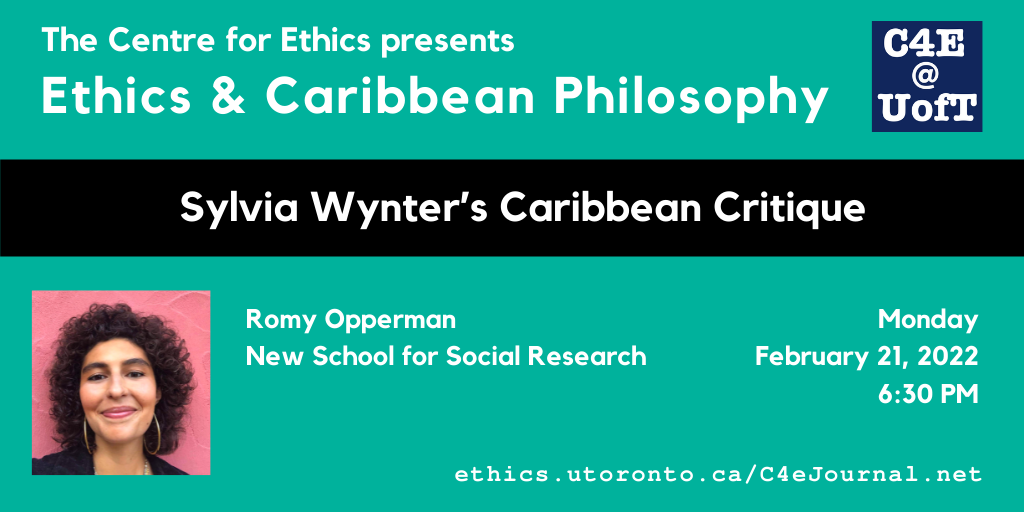
► To stay informed about other upcoming events at the Centre for Ethics, opportunities, and more, please sign up for our newsletter.
Sylvia Wynter’s Caribbean Critique
In this discussion, we will examine Sylvia Wynter’s engagement with Frankfurt School theorists Theodor Adorno and Walter Benjamin. This examination is our starting point for considering in detail Wynter’s early work. We will pay particular attention to Wynter’s concept of “Creole critique”—its foundations as well as what it implies for intellectual, critical, and ethical life.
► please register hereThis is an online event, available on the Centre for Ethics YouTube Channel, on Monday, February 21. Channel subscribers will receive a notification at the start. (For other events in the series, and to subscribe, visit YouTube.com/c/CentreforEthics.)
Romy Opperman
New School for Social ResearchHost:
06:30 PM - 07:45 PM Benjamin P. Davis
Benjamin P. Davis
Postdoctoral Fellow in Ethics
Centre for Ethics
University of Toronto
Centre for Ethics, University of Toronto
200 Larkin - Thu, Feb 17, 2022
Race, Ethics + Power
Chandni Desai, Disrupting Settler Colonial Economies Across Geographies (Race, Ethics, and Power)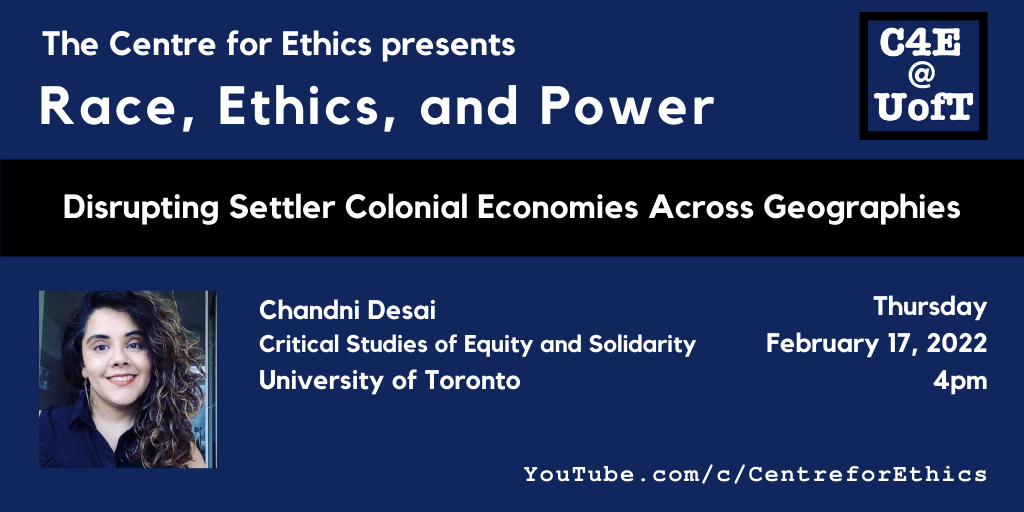
► To stay informed about other upcoming events at the Centre for Ethics, opportunities, and more, please sign up for our newsletter.
Disrupting Settler Colonial Economies Across Geographies
This talk explores the ongoing colonial violence taking place in Canada and Israel/Palestine and the practices of resistance that have been deployed to disrupt the political economies of settler colonial states. Historicizing this resurgence within a longer period (over 50 years) of anti-colonial resistance, the talk attends to the distinct historical, political-economic, and juridical formations that undergird settler colonialism in Canada and Israel/Palestine. It contends with some of the theoretical limits of the settler-colonial framework by centring analysis of the political economy which considers capitalist imperialist violence (including forced migration and labour regimes) and what this means for settler geographies. An analysis of the political economy of Israel/Palestine and Canada also demonstrates how anti-colonial resistance accelerated economic crises that led both settler states to enter into “negotiations” with the colonized (reconciliation in one case, and peace talks in the other) as a strategy to maintain capitalist settler control over stolen lands. The talk will also outline implications this has for transnational social movements today.
► please register here
This is an online event, available on the Centre for Ethics YouTube Channel. Channel subscribers will receive a notification at the start. (For other events in the series, and to subscribe, visit YouTube.com/c/CentreforEthics.)

Chandni Desai
Critical Studies of Equity and Solidarity
University of TorontoChandni Desai is an Assistant Professor at the University of Toronto. Desai has written articles on settler colonial economies, resurgent solidarities, security regimes, Palestinian oral history, cultural production, memory, and archives, published in the Journal of Palestine Studies; Race and Class; Curriculum Inquiry; Decolonization: Indigeneity, Education and Society and several anthologies. She coedited a special issue on decolonization and Palestine for the journal Decolonization. She is the Principal Investigator on a SSHRC Insight Development Grant that explores global histories of third world internationalism through the work of cultural producers and the infrastructures of dissent and solidarity they build. She is working on her first book tentatively titled Revolutionary Circuits of Liberation: The Radical Tradition of Palestinian Resistance Culture and Internationalism. Desai is the host of the Liberation Pedagogy Podcast.
04:00 PM - 05:30 PM
Centre for Ethics, University of Toronto
200 Larkin - Tue, Feb 15, 2022
Ethics of AI in Context
Wendy Wong, Data You and the Challenge for Data Rights (Ethics of AI in Context)
► To stay informed about other upcoming events at the Centre for Ethics, opportunities, and more, please sign up for our newsletter.
Data You and the Challenge for Data Rights
Human rights are one of the major innovations of the 20th century. Their emergence after World War II and global uptake promised a new world of universalized humanity in which human dignity would be protected, and individuals would have agency and flourish. The proliferation of digital data (i.e. datafication) and its intertwining with our lives, coupled with the growth of AI, signals a fundamental shift in the human experience. To date, human rights have not yet grappled fully with the implications of datafication. Yet, they remain our best hope for ensuring human autonomy and dignity, if they can be rebooted to take into account the “stickiness” of data. The talk will discuss how international human rights are structured, introduce the notion of Data You, why Data You is here to stay, and how this affects notions of data rights.
► please register here
This is an online event, available on the Centre for Ethics YouTube Channel, on Tuesday, February 15. Channel subscribers will receive a notification at the start. (For other events in the series, and to subscribe, visit YouTube.com/c/CentreforEthics.)

Wendy Wong
04:00 PM - 05:30 PM
Political Science
University of Toronto
Centre for Ethics, University of Toronto
200 Larkin - Wed, Feb 9, 2022
Ethics at Noon
Rebecca Livernois, Why Set a Carbon Tax Rate at the Social Cost of Carbon? (Ethics@Noon-ish)
► To stay informed about other upcoming events at the Centre for Ethics, opportunities, and more, please sign up for our newsletter.
Why Set a Carbon Tax Rate at the Social Cost of Carbon?
Economists typically recommend a carbon tax on the basis of the economic theory of externalities. The theoretical solution to the Pareto inefficiency caused by an externality is to set a tax on an unpriced activity at the value of the externality in equilibrium, called a Pigovian tax. Guided by this theoretical result, climate economists such as William Nordhaus (2014) use integrated assessment models (IAMs) to estimate the value of the externality generated by carbon dioxide emissions, called the social cost of carbon (SCC), with an aim of recommending an optimal carbon tax rate. This project has received significant criticism largely centred on the social discount rate embedded in the analysis. In this talk, I instead question the project of estimating the SCC on conceptual grounds. I argue that the SCC, as it is measured in a prominent IAM, is more akin to a productivity externality than a Pigovian externality. This implies that the theoretical justification for recommending a carbon tax rate to be set at the social cost of carbon does not hold in this context. Even if there were a consensus among climate economists on the best estimate of the value of the SCC, it would still not indicate the ‘correct’ or ‘optimal’ carbon tax rate. I conclude this talk by discussing implications of this result, both for climate policy and for debates surrounding the social discount rate.
► please register here
This is an online event, available on the Centre for Ethics YouTube Channel, on Wednesday, February 9. Channel subscribers will receive a notification at the start. (For other events in the series, and to subscribe, visit YouTube.com/c/CentreforEthics.)

Rebecca Livernois
Centre for Ethics Visiting Postdoctoral Fellow
Philosophy
University of Toronto
12:30 PM - 01:45 PM
Centre for Ethics, University of Toronto
200 Larkin - Tue, Feb 1, 2022
Ethics of AI in Context
Kelly Hannah-Moffat, Algorithmic Adaptability and Ethics Washing: Appropriating the Critique (Ethics of AI in Context)
► To stay informed about other upcoming events at the Centre for Ethics, opportunities, and more, please sign up for our newsletter.
Algorithmic Adaptability and Ethics Washing: Appropriating the Critique
The emergence of artificial intelligence (AI) and, more specifically, machine learning analytics fuelled by big data, is altering some legal and criminal justice practices. Harnessing the abilities of AI creates new possibilities, but it also risks reproducing the status quo and further entrenching existing inequalities. The potential of these technologies has simultaneously enthused and alarmed scholars, advocates, and practitioners, many of whom have drawn attention to the ethical concerns associated with the widespread use of these technologies. In the face of sustained critiques, some companies have rebranded, positioning their AI technologies as more ethical, transparent, or accountable. However even if a technology is defensibly ‘ethical,’ its combination with pre-existing institutional logics and practices reinforces patterns of inequality. In this paper we focus on two examples, legal analytics and predictive policing, to explore how companies are mobilizing the language and logics of ethical algorithms to rebrand their technologies. We argue this rebranding is a form of ethics washing, which obfuscates the appropriateness and limitations of these technologies in particular contexts.
► please register here
This is an online event, available on the Centre for Ethics YouTube Channel, on Tuesday, February 1. Channel subscribers will receive a notification at the start. (For other events in the series, and to subscribe, visit YouTube.com/c/CentreforEthics.)

Kelly Hannah-Moffat
University of Toronto
Criminology & Sociolegal Studies and Sociology
Vice-President, People Strategy, Equity and Cultureco-sponsored by:
04:00 PM - 05:30 PM

Centre for Ethics, University of Toronto
200 Larkin - Thu, Jan 27, 2022
Race, Ethics + Power
Mark V. Campbell & Huda Hassan, Hip-Hop Futurities: Riddims, Resistance, Reading (Race, Ethics, and Power)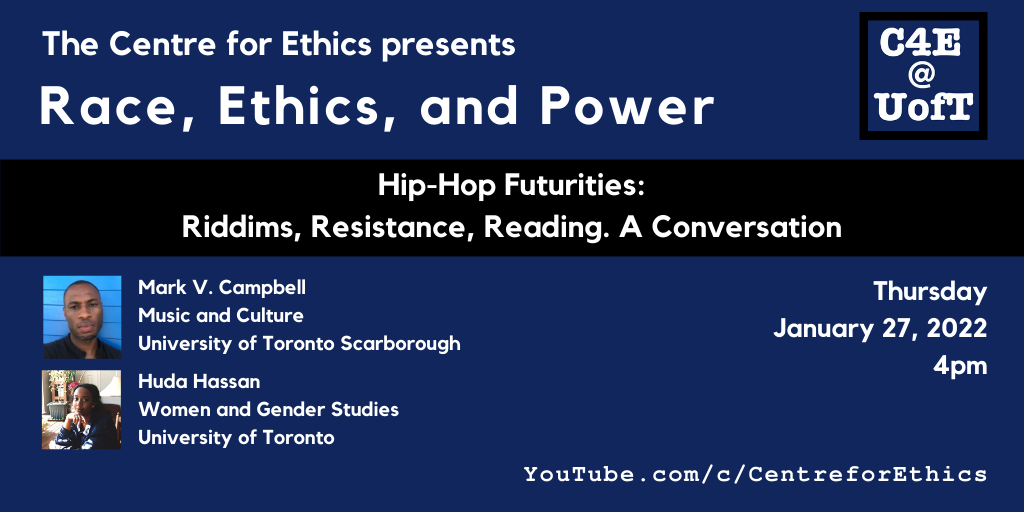
► To stay informed about other upcoming events at the Centre for Ethics, opportunities, and more, please sign up for our newsletter.
Hip-Hop Futurities: Riddims, Resistance, Reading
This dialogue brings together emerging and established scholars to imagine the radical trajectories of Black diasporic cultural production in/through Canada. How has contemporary hip-hop studies scholarship, fostered not solely by centering Canada, but by emphasizing the diasporic circuits that enabled the form to emerge on a global scale? How do Black expressive forms such as hip-hop in Canada offer a different critical lens to comprehend global anti-blackness?
► please register here
This is an online event, available on the Centre for Ethics YouTube Channel. Channel subscribers will receive a notification at the start. (For other events in the series, and to subscribe, visit YouTube.com/c/CentreforEthics.)

Mark V. Campbell
Music and Culture
University of Toronto Scarborough
Huda Hassan
04:00 PM - 05:30 PM
Women and Gender Studies
University of Toronto
Centre for Ethics, University of Toronto
200 Larkin - Wed, Jan 26, 2022
Ethics at Noon
Muhammad Kavesh, Hospitality and Hostility: Rethinking Possibilities of Hosting Foreign Pigeons in South Asia (Ethics@Noon-ish)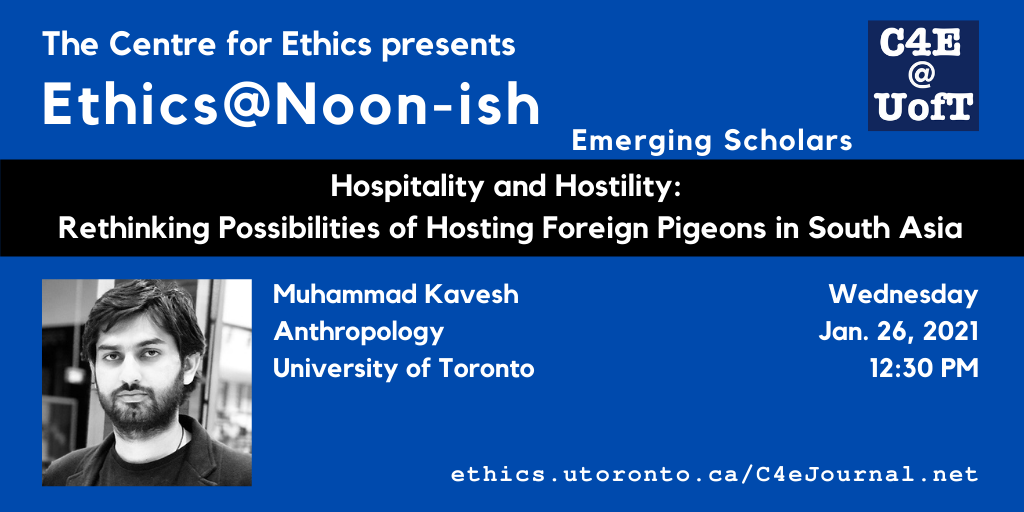
► To stay informed about other upcoming events at the Centre for Ethics, opportunities, and more, please sign up for our newsletter.
Hospitality and Hostility: Rethinking Possibilities of Hosting Foreign Pigeons in South Asia
In this talk, I ask what it means for a pigeon “to come from abroad” in politically and economically transforming circumstances in South Asia and how mutually shared values of hospitality and hostility emerge and interplay when a pigeon arrives in a foreign land as an invited guest or an uninvited spy. I explore the rooted, albeit waning, Punjabi value of hospitality, usually summarized in a Punjabi phrase, jee aya nu (welcome, or yes to all who arrive), and consider its co-existence with hostility, or an attitude of inhospitability to the more-than-human visitor at home. I suggest that hospitality and hostility are unified as well as separate cultural values that have distinct cultural roots and generally operate through the structure of reciprocity. This develops the first part of my argument and leads me to suggest that the disappearance of reciprocity breaks the norm of hospitality and hostility, and diminishes pre-existing relationality. In the second part of my argument, I engage in conversation with the ethical writings of philosopher Jacques Derrida, a Punjabi poet Waris Shah, and philosopher Jonardon Ganeri, and suggest that the absence, instead of the presence, of reciprocity in hospitality and hostility initiates novel relatedness and provides a way to structure the ethic of unconditional hospitality.
► please register here
This is an online event, available on the Centre for Ethics YouTube Channel. Channel subscribers will receive a notification at the start. (For other events in the series, and to subscribe, visit YouTube.com/c/CentreforEthics.)

Muhammad Kavesh
12:30 PM - 01:45 PM
Postdoctoral Fellow in Anthropology
University of Toronto
Centre for Ethics, University of Toronto
200 Larkin - Tue, Jan 25, 2022
Ethics of AI in Context, Ethics in the City
Kristen Thomasen, Suzie Dunn, & Kate Robertson: Algorithmic Policing Policies through a Human Rights and Substantive Equality Lens: The Case of the TPSB AI Policy (Ethics of AI in Context)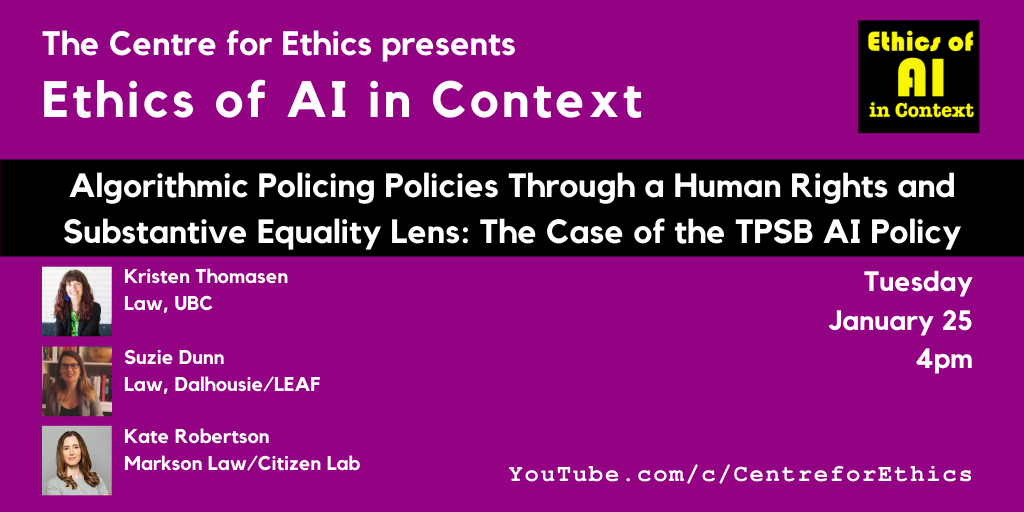
► To stay informed about other upcoming events at the Centre for Ethics, opportunities, and more, please sign up for our newsletter.
Algorithmic Policing Policies through a Human Rights and Substantive Equality Lens: The Case of the TPSB AI Policy
This panel will discuss Citizen Lab and LEAF’s collaborative submission to the Toronto Police Services Board’s public consultation on its draft policy for AI use by the Toronto police with the three co-authors of the submission. The submission made 33 specific recommendations to the TPSB with a focus on substantive equality and human rights. The panelists will discuss some of those recommendations and the broader themes identified in the draft policy.
► please register here
This is an online event, available on the Centre for Ethics YouTube Channel, on Tuesday, January 25. Channel subscribers will receive a notification at the start. (For other events in the series, and to subscribe, visit YouTube.com/c/CentreforEthics.)
 Kristen Thomasen
Kristen Thomasen
Law, University of British Columbia Suzie Dunn
Suzie Dunn
Law, Dalhousie
LEAF Kate Robertson
Kate Robertson
Markson Law
Citizen Labco-sponsored by:
04:00 PM - 05:30 PM

Centre for Ethics, University of Toronto
200 Larkin - Fri, Jan 21, 2022
Ethics of Protest
Kimberley Brownlee, Disobedience: The Rarest and Most Courageous of the Virtues? (Ethics of Protest)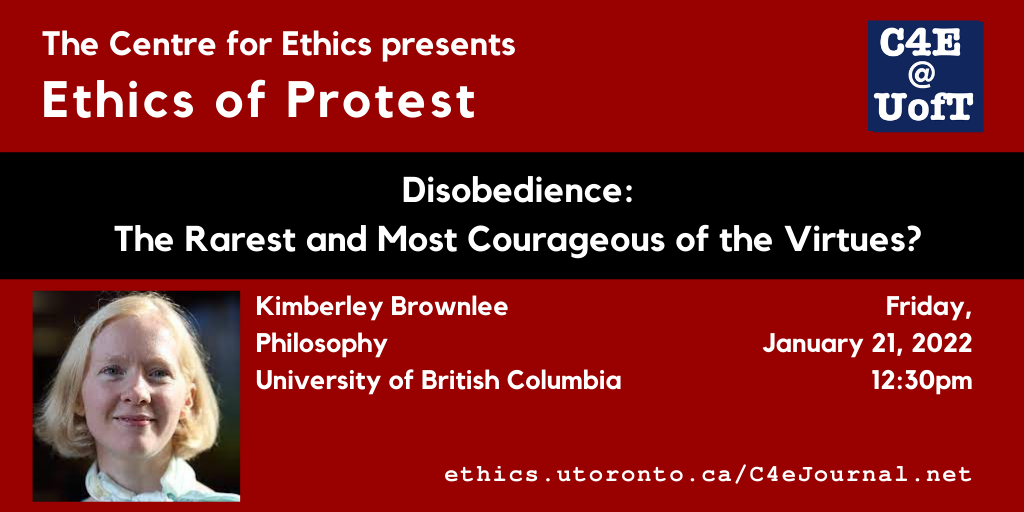
► To stay informed about other upcoming events at the Centre for Ethics, opportunities, and more, please sign up for our newsletter.
Disobedience: The Rarest and Most Courageous of the Virtues?
George Bernard Shaw’s Maxims for Revolutionists declares that: ‘Disobedience, the rarest and most courageous of the virtues, is seldom distinguished from neglect, the laziest and commonest of the vices.’ Yet, disobedience is often seen not as neglect, but as disrespect, offensiveness, and aggression. We tend to ‘shoot’ the dissenter in the moment and praise her only later, if at all. This talk teases out why we tend to find disobedience threatening and why genuine disobedience is radical, if not always virtuous. The talk considers seven types of disobedience, beginning with civil disobedience and then turning to six types that press at the boundaries of civil disobedience: 1. collective disobedience, 2. uncivil obedience, 3. globalized disobedience, 4. digital disobedience, 5. aesthetic disobedience, and 6. non-conscientious disobedience.
► please register here
This is an online event, available on the Centre for Ethics YouTube Channel, on Friday, January 21. Channel subscribers will receive a notification at the start. (For other events in the series, and to subscribe, visit YouTube.com/c/CentreforEthics.)
12:30 PM - 01:45 PM Kimberley Brownlee
Kimberley Brownlee
Philosophy
University of British Columbia
Centre for Ethics, University of Toronto
200 Larkin - Tue, Jan 18, 2022
Ethics of AI in Context
Ori Freiman, The Ethics of Central Bank Digital Currency (Ethics of AI in Context)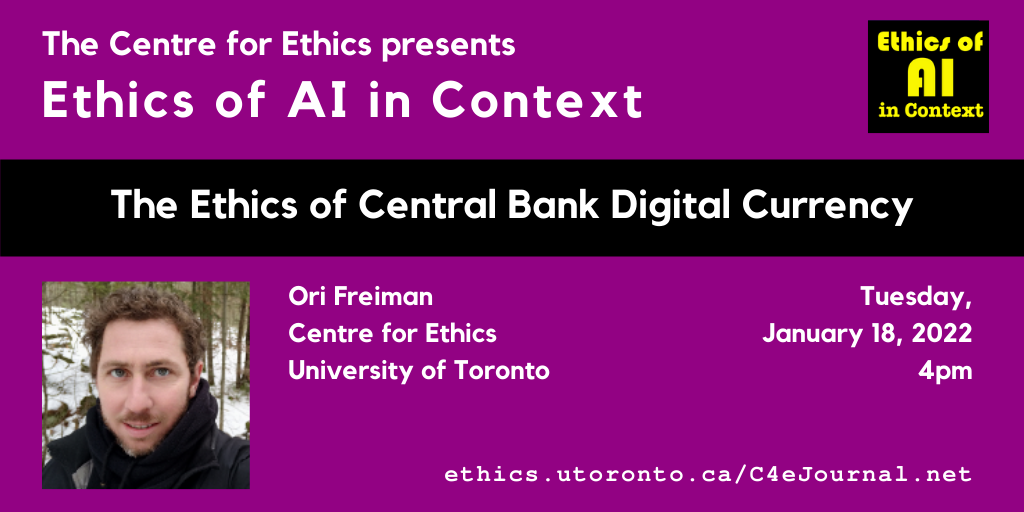
► To stay informed about other upcoming events at the Centre for Ethics, opportunities, and more, please sign up for our newsletter.
The Ethics of Central Bank Digital Currency
No one has any doubt that the future of the economic system is digital. Central banks worldwide worry that the rising popularity and adoption of cryptocurrencies and other means of payments, and new financial instruments, pose a risk to early fintech adopters and the economy at large. As an alternative, most central banks worldwide, led by the Bank of International Settlements, consider the issuance of a CBDC (Central Bank Digital Currency) – the digital form of a country’s fiat money. A CBDC differs from existing cashless payment forms such as card payments and credit transfers: it represents a direct claim on a central bank rather than a financial obligation to an institution.
The digital nature of the transactions, together with algorithms, AIs, and the vast amount of data that such a system produces can lead to many advantages: money supply, interest rates, and other features of the system, are expected to be automatically aligned with the monetary policy to achieve financial stability. In addition, tracking digital money routes reduces the ability to launder money, hide payments for illegal activities, and make it harder to evade taxes (and easier to accurately and automatically collect them).
As with any promising technology, this digital manifestation of money has a dystopian side, too. In this presentation, I focus on identifying the ethical concerns and considerations – for individuals and the democratic society. I will describe how data from such a system can lead to unjust discrimination, how it enables surveillance in its utmost sense, how social developments are at risk of being stalled, and how such technology can encourage self-censorship and cast a shadow over the freedom of expression and association.
I’ll end with normative recommendations. System designers, developers, infrastructure builders, and regulators must involve civic organizations, public experts, and others to ensure the representation of diverse public interests. Inclusion and diversity are the first lines of defence against discrimination and biases in society, business, and technology.
► please register here
This is an online event, available on the Centre for Ethics YouTube Channel, on Tuesday, January 18. Channel subscribers will receive a notification at the start. (For other events in the series, and to subscribe, visit YouTube.com/c/CentreforEthics.)

Ori Freiman
Postdoctoral Fellow in Ethics of AI
Centre for Ethics
University of Toronto
04:00 PM - 05:30 PM
Centre for Ethics, University of Toronto
200 Larkin - Mon, Jan 17, 2022
Ethics & Caribbean Philosophy
Tavia Nyong’o, Black Humanitarianism and the Human Rights Archive (Ethics & Caribbean Philosophy)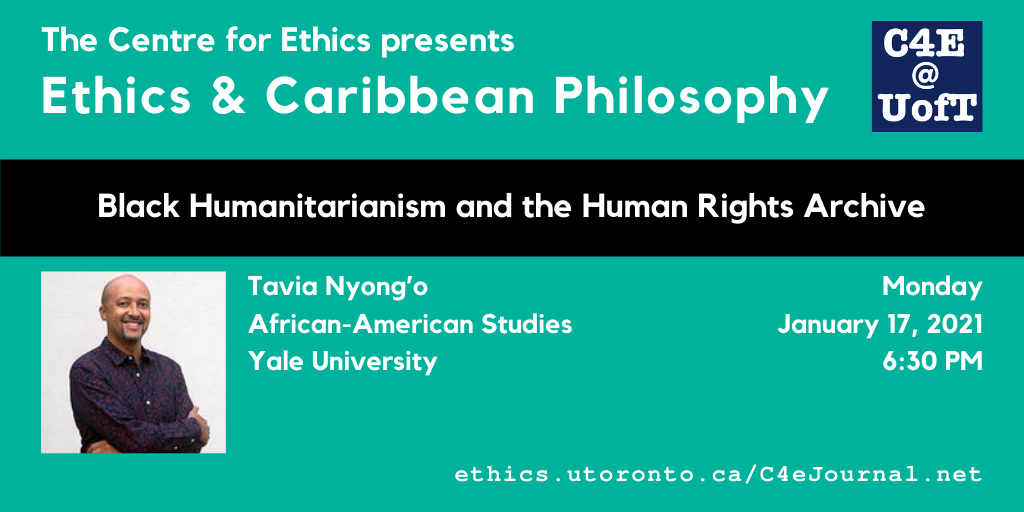
► To stay informed about other upcoming events at the Centre for Ethics, opportunities, and more, please sign up for our newsletter.
This conversation discusses Nyong’o’s chapter ‘Black Humanitarianism’ in the 2014 volume Retrieving the Human: Reading Paul Gilroy. We will focus on Nyong’o’s reading of Gilroy’s ‘critical sympathy’ with human rights and humanitarian projects as well as his suggestion that abolitionism can be understood as a human rights campaign.
► please register here
This is an online event, available on the Centre for Ethics YouTube Channel. Channel subscribers will receive a notification at the start. (For other events in the series, and to subscribe, visit YouTube.com/c/CentreforEthics.)
Tavia Nyong’o
African-American Studies
Yale UniversityHost:
06:30 PM - 07:45 PM Benjamin P. Davis
Benjamin P. Davis
Postdoctoral Fellow in Ethics
Centre for Ethics
University of Toronto
Centre for Ethics, University of Toronto
200 Larkin - Thu, Jan 13, 2022
Race, Ethics + Power
Janelle Joseph, Race, Ethics, and Intersectional Social Justice in Kinesiology (Race, Ethics, and Power)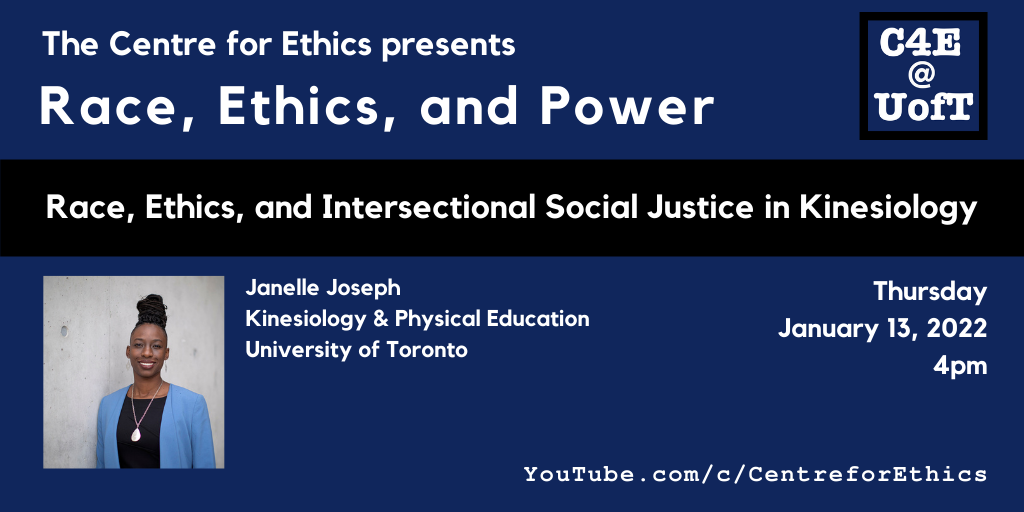
► To stay informed about other upcoming events at the Centre for Ethics, opportunities, and more, please sign up for our newsletter.
Race, Ethics, and Intersectional Social Justice in Kinesiology
Kinesiology is a discipline that relies on colonial, scientific understandings of health and the moving body. In addition, ethics courses in Kinesiology predominantly draw from Eurocentric philosophies and legal paradigms. In this talk, however, I draw from a new model of ethics that adds a greater emphasis on decolonial praxis and intersectional social justice. This process of decolonizing Kinesiology ethics requires accounting for colonial and racist legacies in curricula and acknowledging the power relations sustained by White, patriarchal, ableist, capitalist systems. This presentation will detail the Decolonizing Kinesiology Ethics Model and highlight how teaching and learning in Kinesiology can adopt an ethical, anti-racist stance.
► please register here
This is an online event, available on the Centre for Ethics YouTube Channel. Channel subscribers will receive a notification at the start. (For other events in the series, and to subscribe, visit YouTube.com/c/CentreforEthics.)

Janelle Joseph
Kinesiology and Physical Education
University of TorontoDr. Janelle Joseph is an Assistant Professor in the Faculty of Kinesiology and Physical Education with 22 years of experience in university teaching and award winning research including three books. Her most recent book is titled Sport in the Black Atlantic, Cricket, Canada and the Caribbean Diaspora. She is currently working on a multifaceted theoretical, empirical and auto-ethnographic project on experiences within Black Physical cultures such as kizomba, vogue, capoeira and soca and experiences of Black women and girls in basketball, running, surfing, and gymnastics. Her qualitative research focuses decoloniality and critical race studies. Dr Joseph is the former Director of Academic Success at the University of Toronto and the former Assistant Director of the Transitional Year Programme. Her community work spans extracurricular educational programs for Black children and anti-racism pedagogy for organizations such as Jays Care Foundation, Hockey Diversity Alliance, Coaching Association of Canada, and Ontario University Athletics.
04:00 PM - 05:30 PM
Centre for Ethics, University of Toronto
200 Larkin - Wed, Jan 12, 2022
Ethics at Noon
Allison Weir, Indigenous Feminisms and Relational Rights (Ethics@Noon-ish)
► To stay informed about other upcoming events at the Centre for Ethics, opportunities, and more, please sign up for our newsletter.
Indigenous Feminisms and Relational Rights
This paper considers the struggles of Indigenous women against the historic violation of their rights to belong to their communities in Canada, to argue that Indigenous women have developed unique formulations of relational rights, rooted in and oriented toward the grounded normative ideal of relationality. Indigenous women’s struggles for rights to full inclusion in their communities have developed through critique of the discourse of self-determination as only the right of noninterference, and through critique of discourses of abstract individual rights and equal gender rights within the colonizing state. Working both with and against these discourses, Indigenous feminist theorists and activists have formulated unique understandings of the right to have rights, understood as rights to participate in relations of responsibility for the wellbeing of individuals and communities. These rights are rooted in conceptions of rights to land not as property rights but as rights to responsibility for land. Against the assumption of a binary opposition between rights claims and decolonial politics, Indigenous feminist formulations of rights have been central to the politics of Indigenous resurgence: to the critical revaluation of Indigenous law in struggles for individual and community wellbeing, in resistance to heteropatriarchal colonization.
► please register here
This is an online event, available on the Centre for Ethics YouTube Channel. Channel subscribers will receive a notification at the start. (For other events in the series, and to subscribe, visit YouTube.com/c/CentreforEthics.)

Allison Weir is a Canadian social and political philosopher. She co-founded the Institute for Social Justice in Sydney, Australia, where she was Research Professor and Director of the Doctoral Program in Social Political Thought. Before moving to Australia she was a Professor in Philosophy and in Women and Gender Studies at Wilfrid Laurier University.
She is currently a Visiting Scholar in the Centre for Ethics at the University of Toronto and a Fellow of the Centre for Humanities and Social Change at Humboldt University in Berlin. She is the author of Identities and Freedom (Oxford) and Sacrificial Logics (Routledge). Her newest book, Decolonizing Freedom, will be published by Oxford University Press in 2022.
12:30 PM - 01:45 PM
Centre for Ethics, University of Toronto
200 Larkin - Thu, Dec 2, 2021
Race, Ethics + Power: Emerging Scholars
Tsang, Kirubainathan, Igros, Senkiw, The Rising Problem of Homelessness in Later Life: Exploring Health and Social Service Provision in Toronto (Race, Ethics + Power: Emerging Scholars)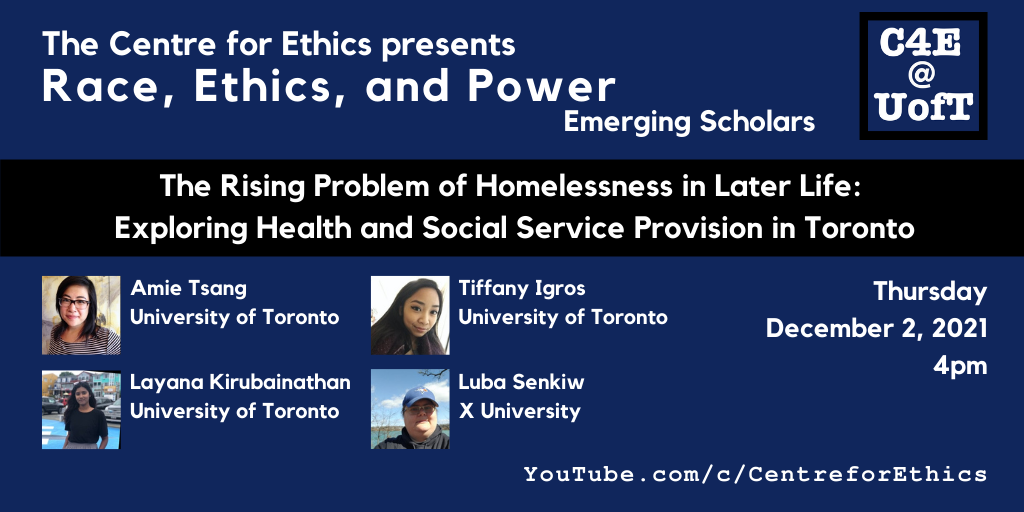 ► To stay informed about other upcoming events at the Centre for Ethics, opportunities, and more, please sign up for our newsletter.
► To stay informed about other upcoming events at the Centre for Ethics, opportunities, and more, please sign up for our newsletter.The Rising Problem of Homelessness in Later Life: Exploring Health and Social Service Provision in Toronto
The COVID-19 pandemic has spotlighted health disparities in Canada’s long term care home system, and in housing and homelessness services. However, there has been less discussion on the intersecting inequalities of ageism (discrimination against individuals based on their old age) and socioeconomic inequalities (e.g. unaffordable housing & lack of government support), which result in compounding vulnerabilities. Historically marginalized groups experiencing homelessness are expected to encounter unique compounding barriers in later life, as a result of additional intersecting inequalities (i.e. colonialism, homophobia, racism, sexism). This includes Indigenous, LGBTQ+, immigrants, and other racialized groups who are over-represented in the homeless population in Toronto, and in Canada as a whole.
As part of a Masters of Occupational Science and Occupational Therapy graduate-level research project, we spoke to service providers, gathering their insights to better understand the complexities of service provision for this population. We heard many stories of hope, resilience, and like-minded people coming together to preserve dignity for older adults who are at risk of or experiencing homelessness. However, the current state of the service system is not sustainable. Service providers encounter many obstacles to providing adequate care, which can lead to burnout, further decreasing care. Meanwhile, the older adults they support are also stuck in a cycle of poverty. These systemic challenges affect some of the most vulnerable in our society – those at the intersection of age and homelessness. In this presentation, we will explore these complexities through an intersectional lens, and offer change ideas from our research.
► please register here
This is an online event, available on the Centre for Ethics YouTube Channel. Channel subscribers will receive a notification at the start. (For other events in the series, and to subscribe, visit YouTube.com/c/CentreforEthics.)

Amie Tsang, O.T. Reg. (Ont.), is an occupational therapist and freelance journalist whose career is dedicated to working in partnership with presently and historically marginalized populations, centring narratives of personal resilience in systemic oppression. She has frontline experience in mental health and housing and is most recently the Health Equity Facilitator at CMHA-Toronto. She is an Adjunct Lecturer in the Department of OS&OT at the University of Toronto and a recent graduate of the Dalla Lana Fellowship in Global Journalism.

Layana Kirubainathan is a recent graduate of the Master of Occupational Therapy program at the University of Toronto. She is also an alumna of the University of Waterloo’s Health Studies program. Her research interests lie in exploring social determinants of health, wellness, health equity and access for immigrant, refugee, and marginalized populations. Her masters level research project, completed with her research partner, Tiffany Igros, explored the experiences of service providers working with older adults at risk of or experiencing
homelessness in Toronto.
Tiffany Igros is a recent graduate from the Occupational Therapy program at the University of Toronto. She has also received her bachelors of science in Physiology and Immunology at the University of Toronto. Together with her research partner, Layana Kirubainathan, they explored the experiences of service providers working within the aging and homelessness sector and received the Aging and Caregiving Award at the Thelma Cardwell Research Day. Her clinical experiences and interests involve working with older adults within rehabilitation and acute care settings.
04:00 PM - 05:30 PM
Luba Senkiw is a Hons. Bachelor of Social Work graduate from X (Ryerson) University with a minor in politics. Luba also holds a diploma in Practical Nursing from Humber College. Her work was primarily in mental health and housing, and she loves being a part of both helping professions. Luba is currently a Leukemia Warrior. She is a volunteer at Positive Living Niagara, making safe inhalation kits, and she is an outspoken, mad-identified advocate. At the moment, being a caregiver to her dad and beating Leukemia take up most of Luba’s time.
Centre for Ethics, University of Toronto
200 Larkin - Wed, Dec 1, 2021
Ethics at Noon
Shozab Raza, The Sufi and the Sickle: Mystical Marxism in Rural Pakistan (Ethics@Noon-ish)
► To stay informed about other upcoming events at the Centre for Ethics, opportunities, and more, please sign up for our newsletter.
The Sufi and the Sickle: Mystical Marxism in Rural Pakistan
In worlds of difference, how might certain unities be forged for liberation? This presentation pursues this question from the vantage-point of the dialectical tension between Marxism and religion. While some scholars have noted parallels between the two, philosophers of critical realism have aimed to establish a deeper equivalence between Marxism and religion. This presentation, however, considers how an equivalence may be forged by subaltern actors in the context of political struggles—how a religious Marxism might look as a theoretical and political practice. I do this by historically reconstructing the life of “Sufi” Sibghatullah Mazari, a locally influential communist from Pakistan who equated Sufism with Mao-inflected Marxism.
► please register here
12:30 PM - 01:45 PM Shozab Raza
Shozab Raza
PhD Candidate, Anthropology
University of Toronto
Centre for Ethics, University of Toronto
200 Larkin - Tue, Nov 30, 2021
Ethics of AI in Context
Frank Pasquale & Gianclaudio Malgieri, Unlawful AI…“until proven otherwise”: The New Turn on AI Accountability from the EU Regulation and Beyond (Ethics of AI in Context)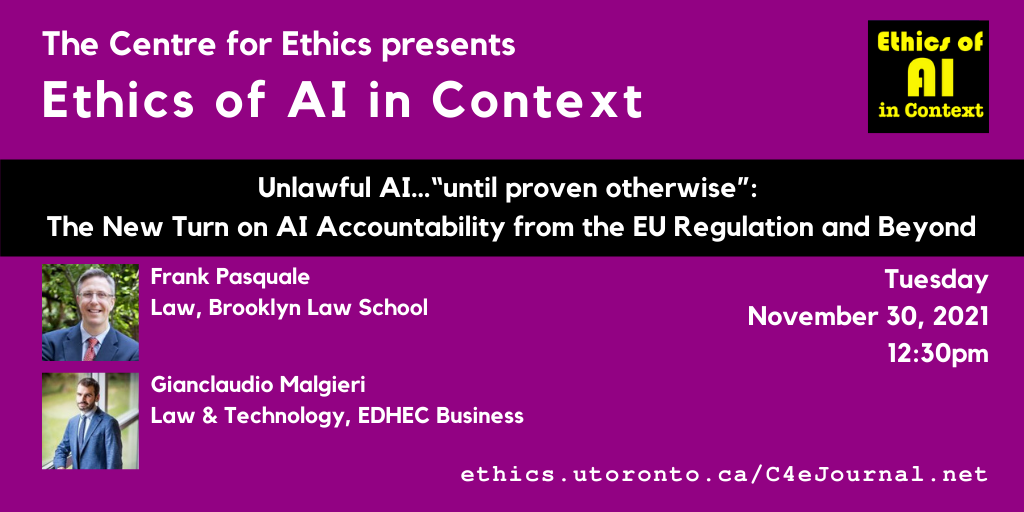
► To stay informed about other upcoming events at the Centre for Ethics, opportunities, and more, please sign up for our newsletter.
Unlawful AI…“until proven otherwise”: The New Turn on AI Accountability from the EU Regulation and Beyond
In the last years, legal scholars and computer scientists have discussed widely how to reach a good level of AI accountability and fairness. The first attempts focused on the right to an explanation of algorithms, but such an approach has proven often unfeasible and fallacious due to the lack of legal consensus on the existence of that right in different legislations, on the content of a satisfactory explanation and the technical limits of a satisfactory causal-based explanation for deep learning models. In the last years, several scholars have indeed shifted their attention from the legibility of the algorithms to the evaluation of the “impacts” of such autonomous systems on human beings, through “Algorithmic Impact Assessments” (AIA).
This paper, building on the AIA frameworks, advances a policy-making proposal for a test to “justify” (rather than merely explaining) algorithms. In practical terms, this paper proposes a system of “unlawfulness by default” of AI systems, an ex-ante model where the AI developers have the burden of the proof to justify (on the basis of the outcome of their Algorithmic Impact Assessment) that their autonomous system is not discriminatory, not manipulative, not unfair, not inaccurate, not illegitimate in its legal bases and in its purposes, not using unnecessary amount of data, etc.
In the EU, the GDPR and the new proposed AI Regulation already tend to a sustainable environment of desirable AI systems, which is broader than any ambition to have “transparent” AI or “explainable” AI, but it requires also “fair”, “lawful”, “accurate”, “purpose-specific”, data-minimalistic and “accountable” AI.
This might be possible through a practical “justification” process and statement through which the data controller proves in practical terms the legality of an algorithm, i.e., the respect of all data protection principles (that in the GDPR are fairness, lawfulness, transparency, purpose limitation, data minimization, accuracy, storage limitation, integrity, accountability). This justificatory approach might also be a solution to many existing problems in the AI explanation debate: e.g., the difficulty to “open” black boxes, the transparency fallacy, the legal difficulties to enforce a right to receive individual explanations.
Under a policy-making approach, this paper proposes a pre-approval model in which the Algorithms developers before launching their systems into the market should perform a preliminary risk assessment of their technology followed by a self-certification. If the risk assessment proves that these systems are at high-risk, an approval request (to a strict regulatory authority, like a Data Protection Agency) should follow. In other terms, we propose a presumption of unlawfulness for high-risk models, while the AI developers should have the burden of proof to justify why the algorithms is not illegitimate (and thus not unfair, not discriminatory, not inaccurate, etc.)
The EU AI Regulation seems to go in this direction. It proposes a model of partial unlawfulness-by-default. However, it is still too lenient: the category of high-risk AI systems is too narrow (it excludes commercial manipulation leading to economic harms, emotion recognitions, general vulnerability exploitation, AI in the healthcare field, etc.) and the sanction in case of non-conformity with the Regulation is a monetary sanction, not a prohibition.
► please register here
This is an online event, available on the Centre for Ethics YouTube Channel. Channel subscribers will receive a notification at the start. (For other events in the series, and to subscribe, visit YouTube.com/c/CentreforEthics.)
 Frank Pasquale
Frank Pasquale
Law
Brooklyn Law School
Gianclaudio Malgieri
Law & Technology
EDHEC Business
12:30 PM - 02:00 PM
Centre for Ethics, University of Toronto
200 Larkin - Tue, Nov 23, 2021
Ethics of AI in Context
Kiel Brennan-Marquez, The (Non)Automatability of Equity (Ethics of AI in Context)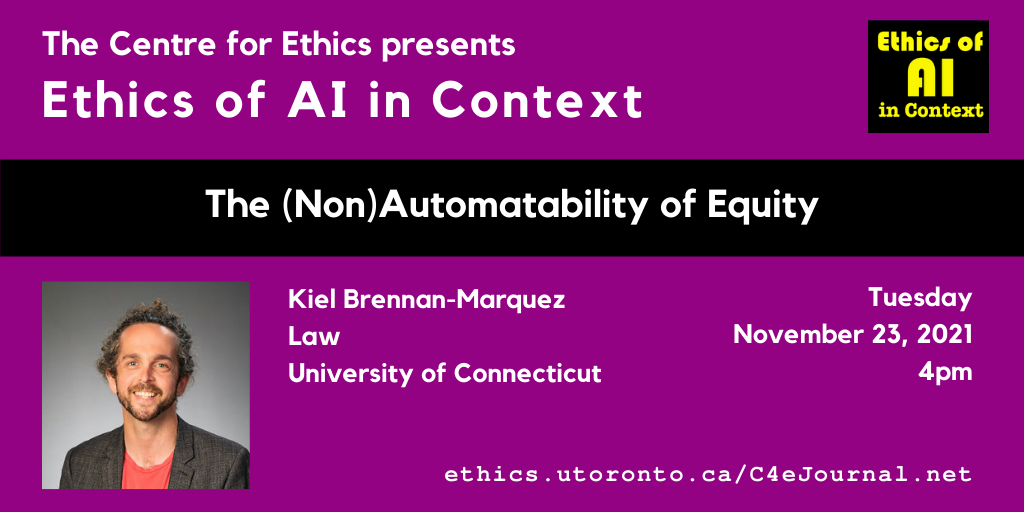
► To stay informed about other upcoming events at the Centre for Ethics, opportunities, and more, please sign up for our newsletter.
The (Non)Automatability of Equity
We are in the midst of ongoing debate about whether, in principle, the enforcement of legal rules—and corresponding decisional processes—can be automated. Often neglected in this conversation is the role of equity, which has historically worked as a particularized constraint on legal decision-making. Certain kinds of equitable adjustments may be susceptible to automation—or at least, just as susceptible as legal rules themselves. But other kinds of equitable adjustments will not be, no matter how powerful machines become, because they require non-formalizable modes of judgment. This should give us pause about all efforts toward legal automation, because it is not clear—or even conceptually determinate—which kinds of legal decisions will end up, in practice, implicating non-automatable forms of equity.
► please register here
04:00 PM - 05:30 PM Kiel Brennan-Marquez
Kiel Brennan-Marquez
University of Connecticut
Associate Professor of Law
Faculty Director of the Center on Community Safety, Policing and Inequality
Centre for Ethics, University of Toronto
200 Larkin - Thu, Nov 18, 2021
Race, Ethics + Power: Emerging Scholars
Manvinder Kaur Gill, Germs of Rot: Colonialism, Culture, and Immigrant Mental Health Discourse (Race, Ethics + Power: Emerging Scholars)
► To stay informed about other upcoming events at the Centre for Ethics, opportunities, and more, please sign up for our newsletter.
Germs of Rot: Colonialism, Culture, and Immigrant Mental Health Discourse
In Wretched of the Earth, Frantz Fanon writes, “Imperialism leaves behind germs of rot which we must clinically detect and remove from our land but from our minds as well.” In exploring how contemporary mental health discourse continues to perpetuate colonial ideals, I will use a case study about the relationship Sikh Canadians have with alcohol wherein community members argue that Panjabi culture promotes the consumption of alcohol while Sikhi prohibits it. I will unravel this binary through an exploration of the racialization of culture, internalized colonialism, and power.
Looking more broadly towards popular discourse around mental health within larger South Asian diasporas, although there has been a growing urge to “normalize” conversations about mental health and create “culturally competent” resources for racialized communities, these resources continue to rely on and perpetuate colonial tropes that paint white communities as progressive and forward thinking and racialized communities as inherently and reprehensibly flawed and backwards. I will argue that much of South Asian mental health discourse functions from a deficit-based model, where there appears to be a clear monolithicizing, mythologizing, and infantilizing of immigrant parents which functions to recreate colonial hierarchies wherein the child of immigrants (creator of this discourse) has become the colonizer, the holder of the “correct” knowledge. In conclusion, I will propose key considerations for what decolonization can look like in practice and how we can detect and remove this rot from our minds.
► please register here
This is an online event, available on the Centre for Ethics YouTube Channel. Channel subscribers will receive a notification at the start. (For other events in the series, and to subscribe, visit YouTube.com/c/CentreforEthics.)
04:00 PM - 05:30 PM Manvinder Kaur Gill is currently a SSHRC-funded Master of Social Work student at the University of Toronto where she holds a research assistantship on a project titled “Border(ing) Practices: Systemic Racism, Immigration, and Child Welfare” and is completing a clinical and research internship at Women’s Health in Women’s Hands, a community health centre providing primary healthcare to Black Women and Women of Colour from Caribbean, African, Latin American, and South Asian communities in Toronto.
Manvinder Kaur Gill is currently a SSHRC-funded Master of Social Work student at the University of Toronto where she holds a research assistantship on a project titled “Border(ing) Practices: Systemic Racism, Immigration, and Child Welfare” and is completing a clinical and research internship at Women’s Health in Women’s Hands, a community health centre providing primary healthcare to Black Women and Women of Colour from Caribbean, African, Latin American, and South Asian communities in Toronto.
Centre for Ethics, University of Toronto
200 Larkin - Wed, Nov 17, 2021
Ethics at Noon
Aden Dur-e-Aden, Mobilization of Individuals within Radical Right-Wing Groups in Canada: Ethics of Researching Contentious Politics (Ethics@Noon-ish)
► To stay informed about other upcoming events at the Centre for Ethics, opportunities, and more, please sign up for our newsletter.
Mobilization of Individuals within Radical Right-Wing Groups in Canada: Ethics of Researching Contentious Politics
Radicalization, Extremism, Terrorism; all these words carry political baggage and are not always easy to define. Both inside and outside academia, these concepts remain contested, subjective, and up until recently, were often used to describe the actions of religiously inspired individuals and groups. While radical right-wing groups are not a new phenomenon in Canada, the topic is now gaining more attention due to recent events in the news. In this talk, I discuss the ethical issues I had to navigate while researching the mobilization of individuals within radical right-wing groups; both as a researcher who was required to treat her subjects with respect irrespective of their views, and as a person of color who was an outsider trying to understand the inner workings of this milieu.
► please register here
This is an online event, available on the Centre for Ethics YouTube Channel, on Wednesday, November 17. Channel subscribers will receive a notification at the start. (For other events in the series, and to subscribe, visit YouTube.com/c/CentreforEthics.)
12:30 PM - 01:45 PM Aden Dur-e-Aden
Aden Dur-e-Aden
Centre for Ethics Doctoral Fellow
Political Science
University of Toronto
Centre for Ethics, University of Toronto
200 Larkin - Thu, Nov 4, 2021
Race, Ethics + Power: Emerging Scholars
Maandeeq Mohamed, Every Discipline You're Practicing Ceases to Exist: Errant Reading and Black Visual Cultures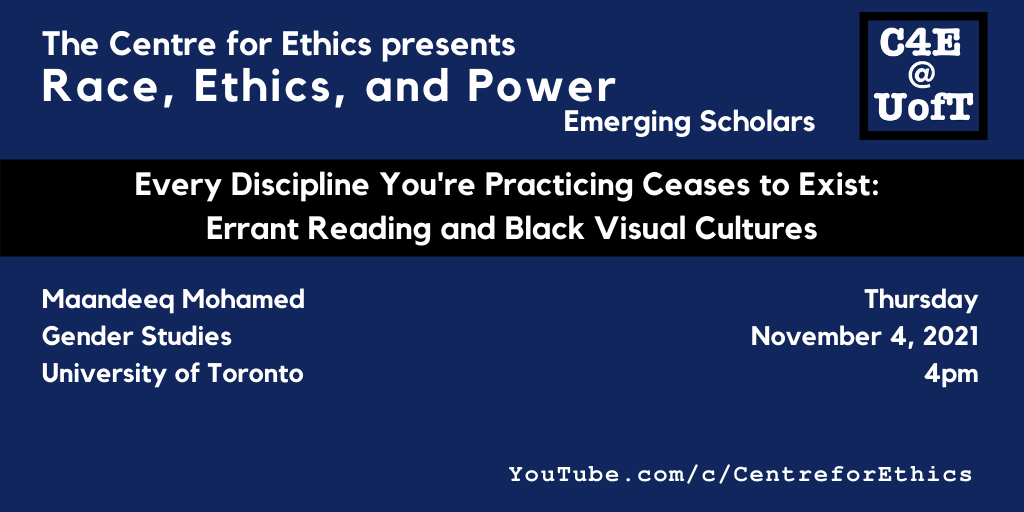
► To stay informed about other upcoming events at the Centre for Ethics, opportunities, and more, please sign up for our newsletter.
Every Discipline You’re Practicing Ceases to Exist: Errant Reading and Black Visual Cultures
There is a moment in Charmaine Nelson’s “The Hottentot Venus in Canada,” where she engages the Art Gallery of Toronto’s (the precursor to today’s AGO) 1927 censoring of Max Weber’s paintings for referencing Saartjie Baartman. Almost a century after the AGO’s censoring of Weber, ethnography and portraiture also bump up against each other on the AGO’s walls, in the work of Sandra Brewster. In Brewster’s Blur, we encounter portraits of Black people who are directed to move while their photo is taken. Brewster employs the technique of long exposures, resulting in portraits of swirling blurs: the flooding light from the long exposure cannot fully capture Black movement with the camera. Against the enclosure of daguerreotype, and the medical diagram, Brewster gives us opaque images of Blackness in motion. Through Brewster and Nelson as a starting point, this talk engages how Black visual cultures call for errant reading practices where, after Sylvia Wynter, “every discipline you’re practicing ceases to exist.”
► please register here
This is an online event, available on the Centre for Ethics YouTube Channel, on Thursday, November 4. Channel subscribers will receive a notification at the start. (For other events in the series, and to subscribe, visit YouTube.com/c/CentreforEthics.)
Maandeeq Mohamed is a writer engaging Black Studies and related cultural production. Her writing is featured in Real Life, C Magazine, and Canadian Art. Maandeeq is currently a PhD student in English and Gender Studies at the University of Toronto, where she is a SSHRC Joseph-Armand Bombardier Doctoral Scholar.
04:00 PM - 05:30 PM
Centre for Ethics, University of Toronto
200 Larkin - Wed, Nov 3, 2021
Ethics at Noon
Henry Krahn, Between Persuasion and Coercion: Protest as Holding Accountable (Ethics@Noon-ish)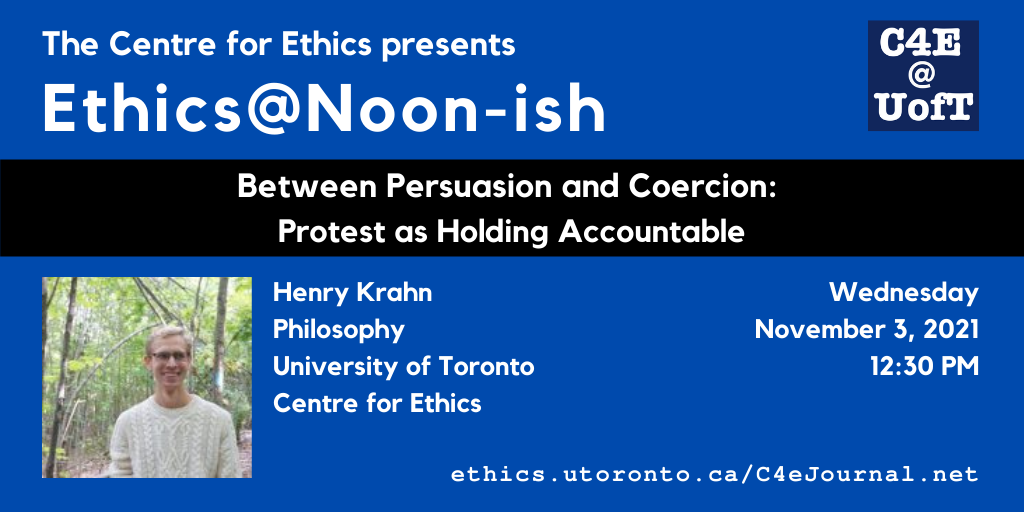
► To stay informed about other upcoming events at the Centre for Ethics, opportunities, and more, please sign up for our newsletter.
Between Persuasion and Coercion: Protest as Holding Accountable
In this talk, I argue that understanding forceful protest as a form of holding others accountable allows us to see how forceful protest can be neither persuasive nor coercive. As a result, I contend, this view of protest allows us to resolve some troubling justificatory questions facing forceful protest. I begin by presenting two parallel problems in political and moral theory, respectively. The first is the problem of coercive protest. Philosophical writing on civil disobedience often responds to a tension between the force of protest and respect for one’s fellow citizens. Contemporary protest movements often make use of forceful tactics, such as in blockades. But the language of force can evoke worries about coercion or of forcing one’s views on others. The second is the problem of sanctioning. On one hand, holding others accountable often involves sanctioning them—treating them harshly to get them to change their behaviour. On the other, moral philosophers often claim that viewing others as responsible agents requires that we reason with them, rather than train or manipulate them. But sanctioning might seem more like manipulation than reasoning.
I use these problems to motivate a view of holding accountable that presents a solution to both. Sanctions, on this view, are not a form of reasoning, but are reasons-structured. Properly sanctioning requires that we endorse the moral claims we uphold, and that we care about the ones we sanction changing their behaviour for the right reason. I contend that sanctioning is thus compatible with respect for others as rational agents. I then extend this account to offer a similar solution to the first problem: forceful protest can involve the symbolic imposition of sanctions which, although forceful, is nevertheless reasons-structured and so compatible with respect for one’s fellow citizens.
► please register here
This is an online event, available on the Centre for Ethics YouTube Channel. Channel subscribers will receive a notification at the start. (For other events in the series, and to subscribe, visit YouTube.com/c/CentreforEthics.)
12:30 PM - 01:45 PM Henry Krahn
Henry Krahn
Centre for Ethics Doctoral Fellow
Philosophy
University of Toronto
Centre for Ethics, University of Toronto
200 Larkin - Wed, Oct 27, 2021
Ethics of AI in Context: Emerging Scholars
Mathew Iantorno, Automating Care, Manufacturing Crisis (Ethics of AI in Context: Emerging Scholars)
► To stay informed about other upcoming events at the Centre for Ethics, opportunities, and more, please sign up for our newsletter.
Automating Care, Manufacturing Crisis
Artificially intelligent agents that provide care for human beings are becoming an increasing reality globally. From disembodied therapists to robotic nurses, new technologies have been framed as a means of addressing intersecting labour shortages, demographic shifts, and economic shortfalls. However, as we race towards AI-focused solutions, we must scrutinize the challenges of automating care. This talk engages in a two-part reflection on these challenges. First, issues of building trust and rapport in such relationships will be examined through an extended case study of a chatbot intended to help individuals quit smoking. Second, the institutional rationale for favouring machine-focused solutions over human-focused ones will be questioned through the speaker’s concept of crisis automation. Throughout, new equitable cybernetic relationships between those provisioning and receiving care will be platformed.
► please register here
This is an online event, available on the Centre for Ethics YouTube Channel. Channel subscribers will receive a notification at the start. (For other events in the series, and to subscribe, visit YouTube.com/c/CentreforEthics.)

Mathew Iantorno
04:00 PM - 05:30 PM
iSchool
University of Toronto
Centre for Ethics, University of Toronto
200 Larkin - Tue, Oct 26, 2021
Ethics of AI in Context
Avery Slater, The Golem and the Game of Automation (Ethics of AI in Context)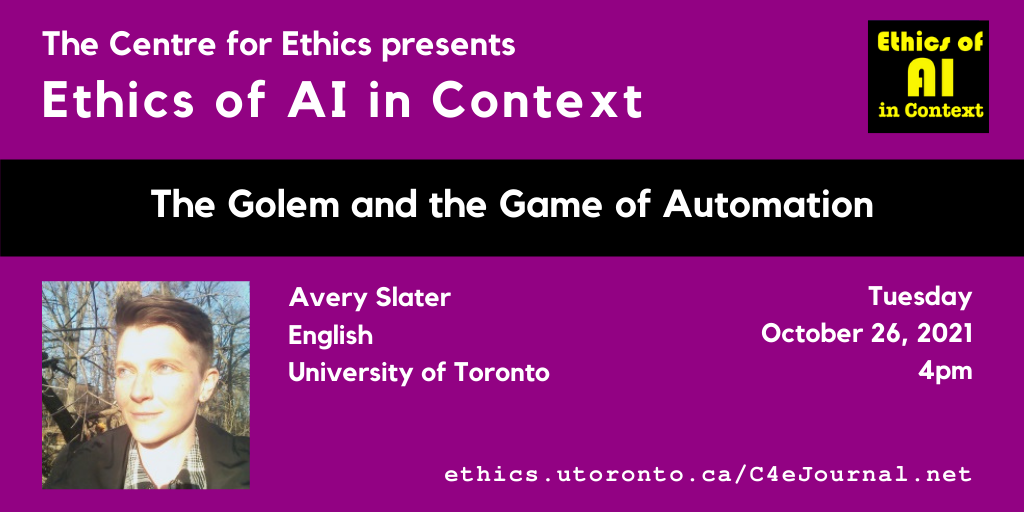
► To stay informed about other upcoming events at the Centre for Ethics, opportunities, and more, please sign up for our newsletter.
The Golem and the Game of Automation
Norbert Wiener, a foundational force in cybernetics and information theory, often used the allegory of the Golem to represent the ethical complexities inherent in machine learning. Recent advances in the field of reinforcement learning (RL) deal explicitly with problems laid out by Wiener’s earlier writings, including the importance of games as learning environments for the development of AI agents. This talk explores issues from contemporary machine learning that express Wiener’s prescient notion of developing a “significant game” between creator and machine.
► please register here
This is an online event, available on the Centre for Ethics YouTube Channel. Channel subscribers will receive a notification at the start. (For other events in the series, and to subscribe, visit YouTube.com/c/CentreforEthics.)

Avery Slater
04:00 PM - 05:30 PM
English
University of Toronto
Centre for Ethics, University of Toronto
200 Larkin - Thu, Oct 21, 2021
Race, Ethics + Power: Emerging Scholars
Cornel Grey, (Call Me Something Other than 'Stranger') Call Me 'Human'/'Life-Form'/'Kin': Notes on Black Queer Diasporic Intimacies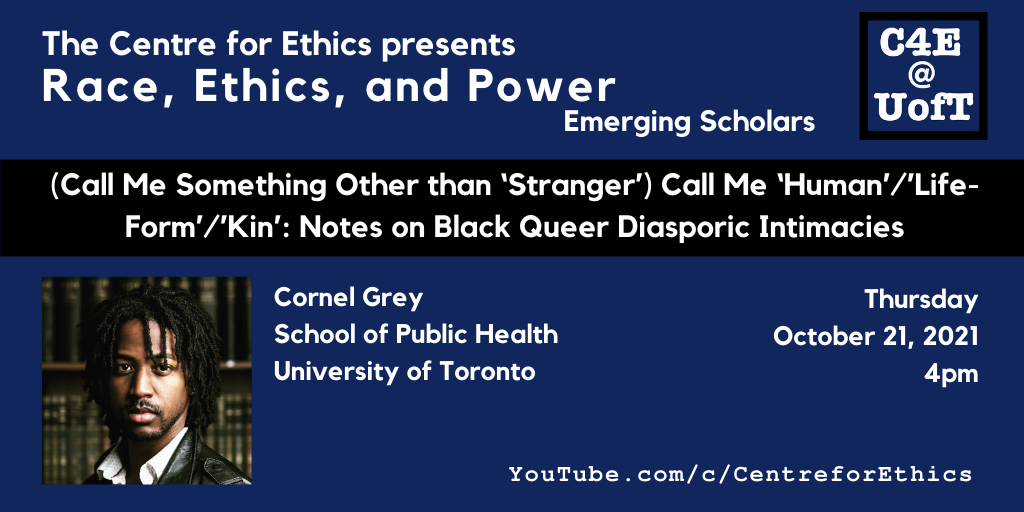
► To stay informed about other upcoming events at the Centre for Ethics, opportunities, and more, please sign up for our newsletter.
(Call Me Something Other than ‘Stranger’) Call Me ‘Human’/’Life-Form’/’Kin’: Notes on Black Queer Diasporic Intimacies
The centuries-long theft of black folks from the African continent to various sites in the Americas disrupted the formation of familial structures among enslaved peoples. Atlantic enslavement, to echo Rinaldo Walcott, also created conditions that fundamentally challenged what relationality can look like (TVO Docs 2009). This paper builds on Walcott’s argument to examine how black queer sociality opens up space for more capacious forms of connection. I begin with a name and the process of naming as a point of departure for thinking through how black queer folks come to understand family and belonging. I then consider how black queer folks negotiate heteropatriarchal definitions of kinship through redefinition and refusal. I argue that black queer diasporic forms of relationality allow black folks to breathe through touch. In closing, I suggest that contact during the event of Atlantic enslavement was instructive for developing a knowledge system that allows black folks to survive under conditions of violence.
► please register here
This is an online event, available on the Centre for Ethics YouTube Channel. Channel subscribers will receive a notification at the start. (For other events in the series, and to subscribe, visit YouTube.com/c/CentreforEthics.)

Cornel Grey is a Ph.D. Candidate at the Women & Gender Studies Institute and a Postdoctoral Fellow at the Dalla Lana School of Public Health (DLSPH), University of Toronto. His doctoral research examines how black queer men enact kinship and intimacy through physical touch. Cornel works through the tensions of skin-to-skin touch as a form of medicine for black queer folks and as the occasion of violence against the black body. Using public health as a point of departure, Cornel’s research considers how black queer socialities challenge us to think differently about questions of risk, breath, health, and relationality. As a Postdoctoral Fellow at DLSPH, Cornel is currently examining the impact of the COVID-19 pandemic on the social and sexual lives of gay, bisexual and queer men.
04:00 PM - 05:30 PM
Centre for Ethics, University of Toronto
200 Larkin - Wed, Oct 20, 2021
Ethics at Noon
Benjamin P. Davis, Hannah Arendt’s Right to Have Rights in the American Context (Ethics@Noon-ish)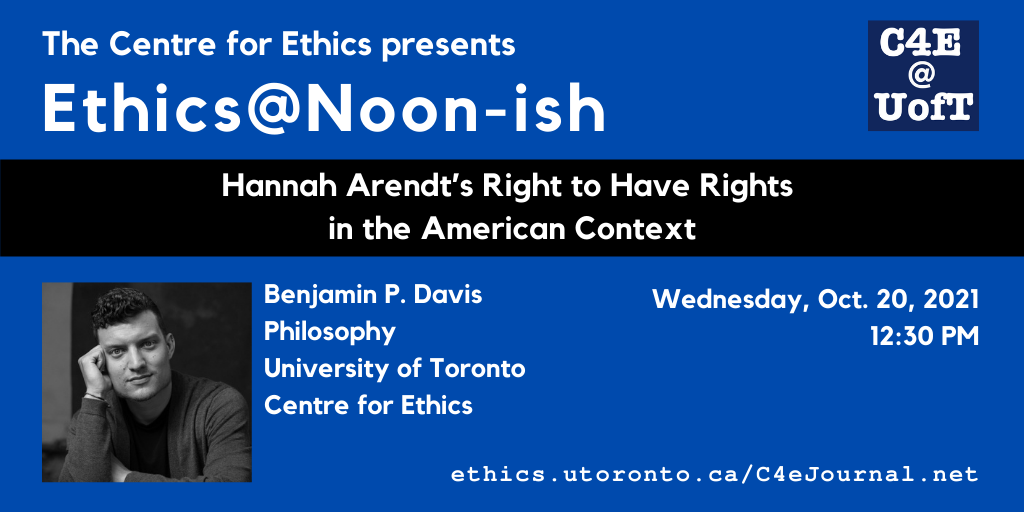
► To stay informed about other upcoming events at the Centre for Ethics, opportunities, and more, please sign up for our newsletter.
Hannah Arendt’s Right to Have Rights in the American Context
To interpret the political theorist Hannah Arendt’s phrase ‘the right to have rights’ in the context of the Americas, I look to the Marxist José Carlos Mariátegui, who argued for the priority of land rights for Indigenous nations. Following Mariátegui, I argue that the first ‘right’ in Arendt famous phrase, the right on which other rights are based, should be understood in the American context as a right to land.
► please register here
This is an online event, available on the Centre for Ethics YouTube Channel. Channel subscribers will receive a notification at the start. (For other events in the series, and to subscribe, visit YouTube.com/c/CentreforEthics.)
12:30 PM - 01:45 PM Benjamin P. Davis
Benjamin P. Davis
Centre for Ethics Postdoctoral Fellow
Philosophy
University of Toronto
Centre for Ethics, University of Toronto
200 Larkin - Wed, Oct 13, 2021
Ethics of Songs
Juliet Palmer on "Down in the River" (The Ethics of Songs)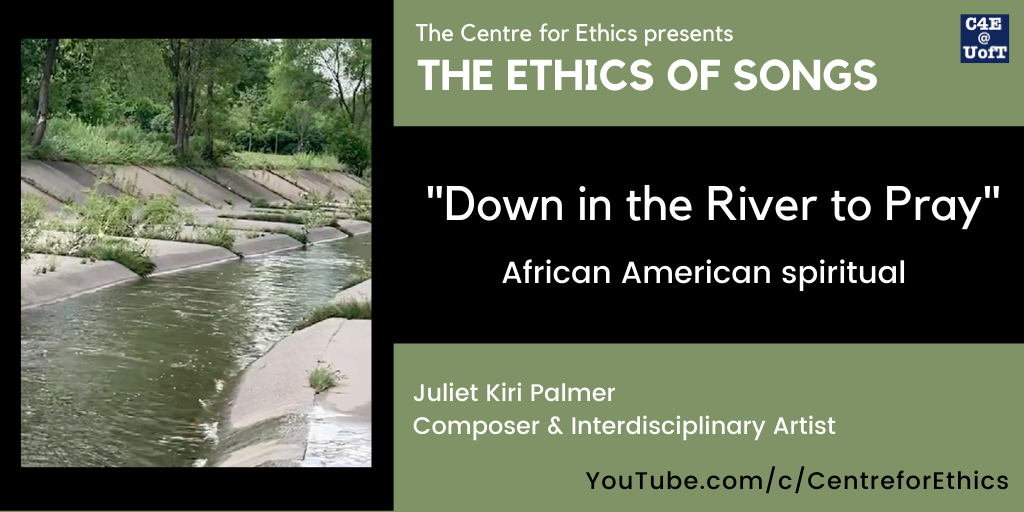
► To stay informed about other upcoming events at the Centre for Ethics, opportunities, and more, please sign up for our newsletter.
Join us for the return of The Ethics of Songs, the Centre for Ethics YouTube series that explores the ethical dimensions of songs familiar and new! (The full schedule is available here.)
Juliet Palmer‘s music has come to life under a highway off-ramp, in a swimming pool, in the plastic flotsam of a remote beach and in concert halls across North America, Europe and Oceania. Originally from Aotearoa New Zealand, Juliet makes her home in Toronto where she is artistic director of Urbanvessel, a platform for interdisciplinary collaboration.
Juliet was composer-in-residence at the New Zealand School of Music and Orchestra Wellington (2011/12), and an OAC Artist-in-Residence at Sunnybrook Research Institute (2018). She is the winner of the Detroit Symphony’s Elaine 2018 Lebenbom Award, a Chalmers Arts Fellow (2018-19), and finalist for the Johanna Metcalf Performing Arts Prize (2019). Juliet holds a PhD in composition from Princeton University and an M.Mus in performance, composition and time-based art from Auckland University.
► please register here
This is an online event, available on the Centre for Ethics YouTube Channel. Channel subscribers will receive a notification at the start. (For other events in the series, and to subscribe, visit YouTube.com/c/CentreforEthics.)
03:00 PM - 03:30 PM
Centre for Ethics, University of Toronto
200 Larkin - Thu, Oct 7, 2021
Race, Ethics + Power: Emerging Scholars
Michael Sooriyakumaran, Inventing the Asian Community: The Toronto Reel Asian International Film Festival as Discourse and Collective Performance (Race, Ethics + Power: Emerging Scholars)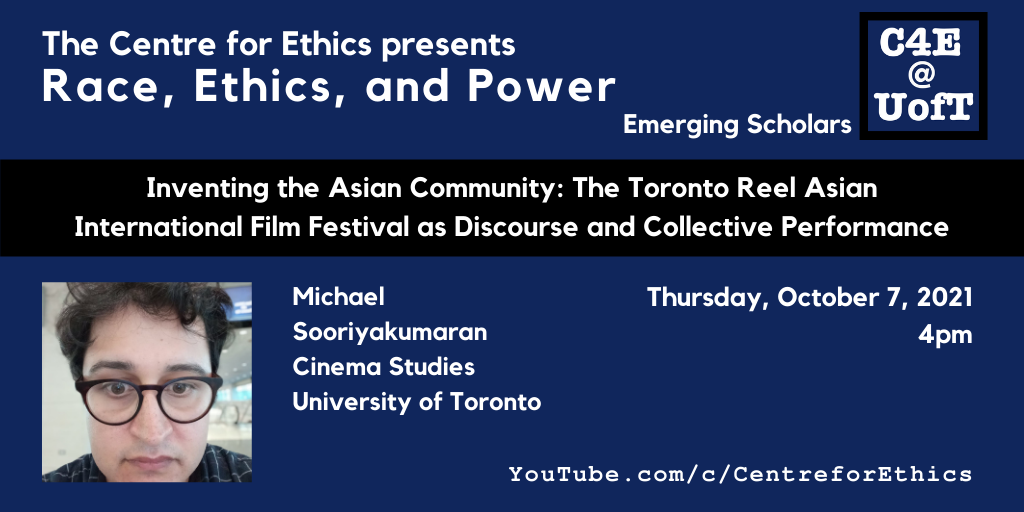
► To stay informed about other upcoming events at the Centre for Ethics, opportunities, and more, please sign up for our newsletter.
Inventing the Asian Community: The Toronto Reel Asian International Film Festival as Discourse and Collective Performance
This talk will examine how the Toronto Reel Asian International Film Festival constructs an imagined Asian community and how spectators of the festival perform their cultural identities at screenings and on social media. By screening films from some Asian nations and diasporas and not others, and by screening a disproportionate number of films by East Asian filmmakers and North American filmmakers of East Asian heritage, Reel Asian’s programming selections imply that some Asian societies are more oriental than others and posit certain essentialized cultural practices associated with those societies as being emblematic of the Orient as a whole. At screenings and on social media, spectators actively position themselves either as insiders who identify with the Orient or as westerners who imaginatively project themselves into an oriental culture through an act of sympathetic understanding. Through an analysis of Reel Asian, this talk will demonstrate how identity-based film festivals function as sites where an imagined community becomes visible to itself and to the general public for a short period of time.
► please register here
This is an online event. It will be live streamed on the Centre for Ethics YouTube Channel on Thursday, October 7. Channel subscribers will receive a notification at the start of the live stream. (For other events in the series, and to subscribe, visit YouTube.com/c/CentreforEthics.)
04:00 PM - 05:30 PM Michael Sooriyakumaran is a Ph.D. candidate in Cinema Studies at the University of Toronto. His writing has appeared in Asian Cinema, Frames Cinema Journal, Mise-en-scène: The Journal of Film & Visual Narration, and Offscreen.
Michael Sooriyakumaran is a Ph.D. candidate in Cinema Studies at the University of Toronto. His writing has appeared in Asian Cinema, Frames Cinema Journal, Mise-en-scène: The Journal of Film & Visual Narration, and Offscreen.
Centre for Ethics, University of Toronto
200 Larkin - Wed, Oct 6, 2021
Ethics at Noon
Nikolas Kompridis, Ousmane Sembène’s Moolaadé: “Sacred Space” as Political Sanctuary and Political Agency (Ethics@Noon-ish)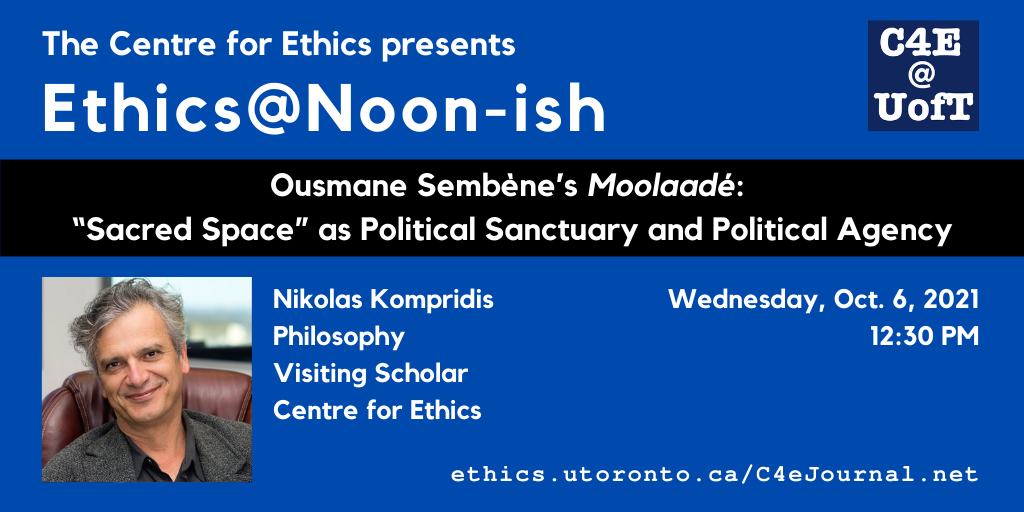
► To stay informed about other upcoming events at the Centre for Ethics, opportunities, and more, please sign up for our newsletter.
Ousmane Sembène’s Moolaadé: “Sacred Space” as Political Sanctuary and Political Agency
Moolaadé (2004), Ousmane Sembène’s final film, crowned an astonishing sequence of feature films that began in 1966 with Black Girl (La Noire de…). Perhaps the most successful realization of his activist conception of cinema, Moolaadé may also be his most deceptively complex film. A Jula/Bambara word, moolaadé can be translated appositely either as “sanctuary” or as “sacred space”. Translating it as “sanctuary” does not fully convey in English the inviolability of the mooladé, its standing as a sacred space, standing out from and against the profane spaces that surround it. In Moolaadé, this standing is owed to a pre-colonial, animistic tradition of belief that is interwoven with the founding history of the people whose contemporary descendants inhabit the secluded Burkino Faso village in which the film is set. The characters in the film are as unhesitating in their acknowledgment of its inviolability as they are fearful of its disruptive power. This is because the mooladé is no passive entity, internally limited to sheltering those inside its protective space. It possesses an uncontainable, vexatious agency of its own.
Its significance is reducible neither to a narrative device that initiates a story of heroic resistance to the practice of female genital cutting nor to a troublesome remnant of a pre-Islamic African “religion” in conflict with Islam. Indeed, the moolaadé does not fit comfortably on either side of the sacred/profane or secularism/religion binaries. Rather, it exposes their conceptual limits by incarnating the fluidity, revisability, and permeability of the spatial boundaries that putatively wall off the sacred from the profane. But much more than that, the moolaadé emancipates spaces “occupied” through colonial dispossession and forced conversion, refiguring them in the name of a utopian and transformative aspiration: to bring about once and for all “not only the demise of colonialism, but also the demise of the colonized” (Frantz Fanon). As a consequence, Sembène’s complexly creative reinterpretation of the moolaadé as both a political sanctuary and political agency compels us to rethink how we understand sacred space, and what we understand the sacred to be.
► please register here
This is an online event, available on the Centre for Ethics YouTube Channel. Channel subscribers will receive a notification at the start. (For other events in the series, and to subscribe, visit YouTube.com/c/CentreforEthics.)

Nikolas Kompridis
12:30 PM - 01:45 PM
Centre for Ethics Visiting Scholar
Philosophy
Centre for Ethics, University of Toronto
200 Larkin - Tue, Oct 5, 2021
Ethics of AI in Context
Abdi Aidid, Legal Prediction and Calcification Risk (Ethics of AI in Context)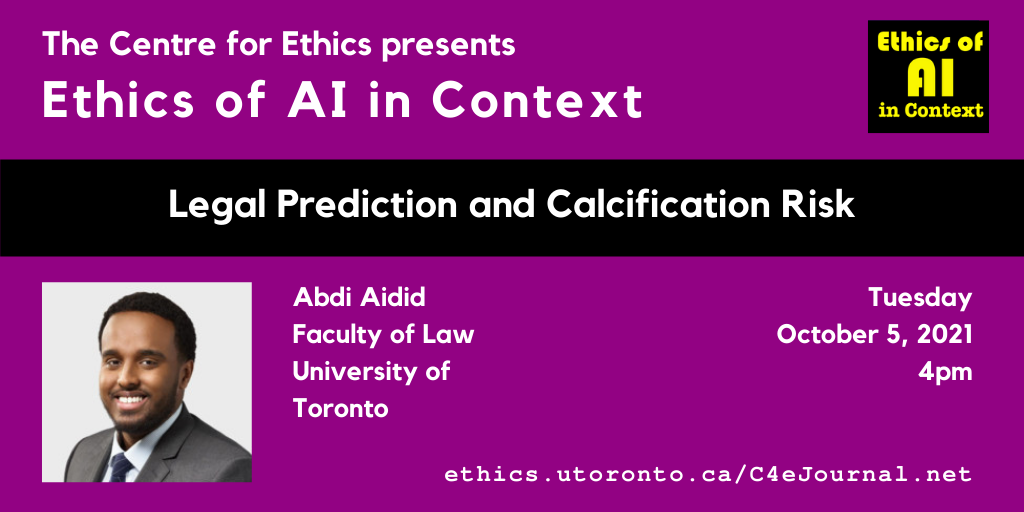
► To stay informed about other upcoming events at the Centre for Ethics, opportunities, and more, please sign up for our newsletter.
Legal Prediction and Calcification Risk
The application of artificial intelligence (AI) to the law has enabled lawyers and judges to predict – with some accuracy – how future courts are likely to rule in new situations. Machine learning algorithms do this by synthesizing historical case law and applying that corpus of precedent to new factual scenarios. Early evidence suggests that these tools are enjoying steady adoption and will continue to proliferate in legal institutions.
Though AI-enabled legal prediction has the potential to significantly augment human legal analyses, it also raises ethical questions that have received scant coverage in the literature. This talk focuses on one such ethical issue: the “calcification problem.” The basic question is as follows: If predictive algorithms rely chiefly on historical case law, and if lawyers and judges depend on these historically-informed predictions to make arguments and write judicial opinions, is there a risk that future law will merely reproduce the past? Put differently, will fewer and fewer cases depart from precedent, even when necessary to achieve legitimate and just outcomes? This is a particular concern for areas of law where societal values change at a rate faster than new precedents are produced. This talk describes the legal, political and ethical dimensions of the calcification problem and suggests interventions to mitigate the risk of calcification.
► please register here
This is an online event, available on the Centre for Ethics YouTube Channel. Channel subscribers will receive a notification at the start. (For other events in the series, and to subscribe, visit YouTube.com/c/CentreforEthics.)
 Abdi Aidid
Abdi Aidid
Law
University of Toronto
04:00 PM - 05:30 PM
Centre for Ethics, University of Toronto
200 Larkin - Wed, Sep 29, 2021
Ethics of Songs
Joshua Pilzer on "Changbu taryeong" (The Ethics of Songs)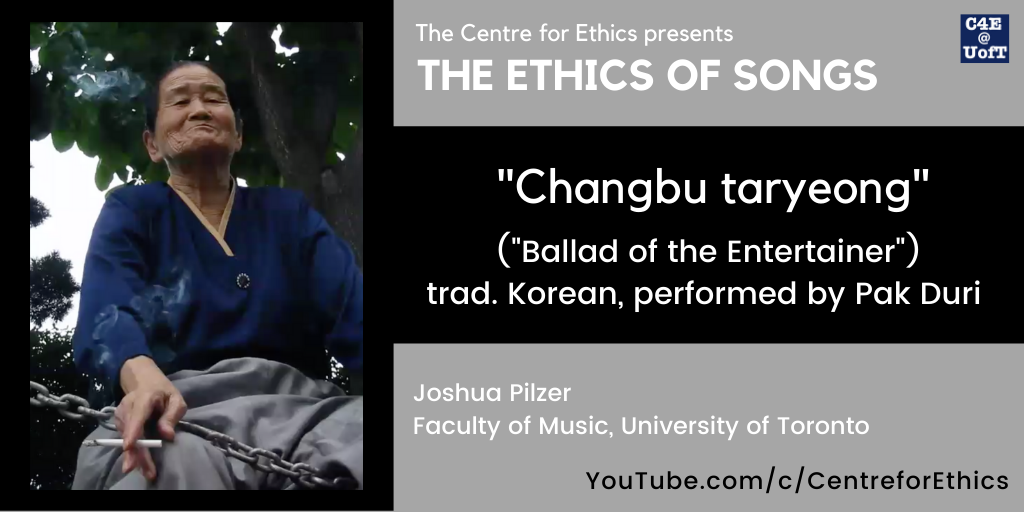
► To stay informed about other upcoming events at the Centre for Ethics, opportunities, and more, please sign up for our newsletter.
Join us for the return of The Ethics of Songs, the Centre for Ethics YouTube series that explores the ethical dimensions of songs familiar and new! (The full schedule is available here.)
Joshua Pilzer
Faculty of Music
University of Toronto► please register here
This is an online event, available on the Centre for Ethics YouTube Channel. Channel subscribers will receive a notification at the start. (For other events in the series, and to subscribe, visit YouTube.com/c/CentreforEthics.)
03:00 PM - 03:30 PM
Centre for Ethics, University of Toronto
200 Larkin - Wed, Sep 15, 2021
Ethics of Songs
James Rolfe on "We Will Rock You" by Queen (The Ethics of Songs)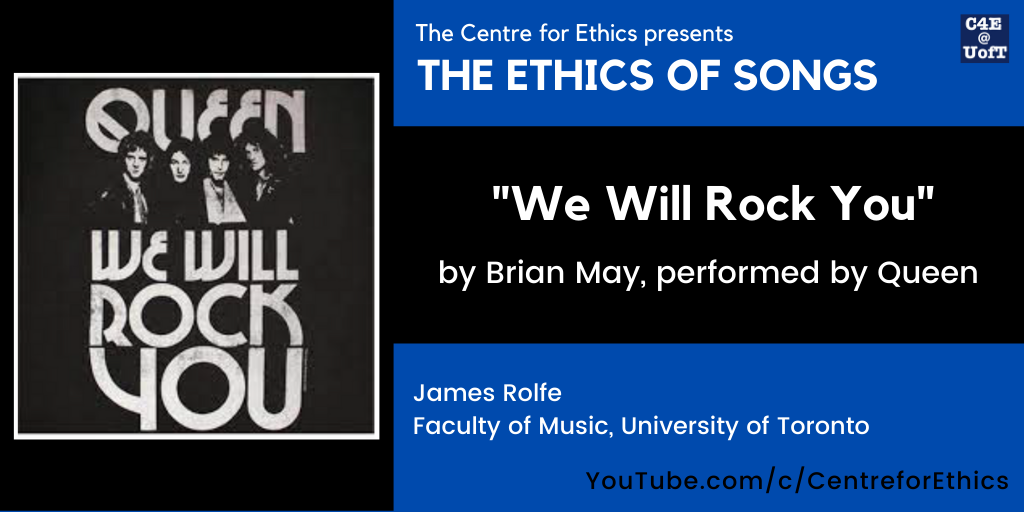
► To stay informed about other upcoming events at the Centre for Ethics, opportunities, and more, please sign up for our newsletter.
Join us for the return of The Ethics of Songs, the Centre for Ethics YouTube series that explores the ethical dimensions of songs familiar and new! (The full schedule is available here.)
Toronto composer James Rolfe has been commissioned and performed
by soloists, ensembles, orchestras, choirs, theatres, and opera companies in
Canada, the USA, Europe, Asia, Australia, and New Zealand. Among his awards
are a Guggenheim Fellowship, the K. M. Hunter Music Award, the Johanna Metcalf
Performing Arts Prize, and the Jules Léger Prize for New Chamber Music. His operas
have been performed in Toronto, Halifax, Vancouver, Banff, Edmonton, and New York;
his most recent opera The Overcoat was premiered by Tapestry Opera with Canadian
Stage and Vancouver Opera, and was nominated for 10 Dora Awards. Two solo CDs
(raW, 2011, and Breathe, 2018, JUNO Award nomination) are available on Centrediscs.► please register here
This is an online event, available on the Centre for Ethics YouTube Channel. Channel subscribers will receive a notification at the start. (For other events in the series, and to subscribe, visit YouTube.com/c/CentreforEthics.)
03:00 PM - 03:30 PM
Centre for Ethics, University of Toronto
200 Larkin - Wed, Sep 1, 2021
Ethics of Songs
Chris White on "Circle of Song" by Tony Turner (The Ethics of Songs)
► To stay informed about other upcoming events at the Centre for Ethics, opportunities, and more, please sign up for our newsletter.
Join us for the return of The Ethics of Songs, the Centre for Ethics YouTube series that explores the ethical dimensions of songs familiar and new! (The full schedule is available here.)
Based in Ottawa, Chris White is a festival and event producer, radio and video host, singer-songwriter, teacher and community organizer who loves connecting people with one another through music. After working as a high school teacher and software designer, he co-founded the Ottawa Folk Festival in 1993 and served as Artistic Director for 16 years, creating an environment of celebration, collaboration, inclusion and participation. Chris produces and hosts ‘Canadian Spaces’ – Canada’s longest-running folk music radio program – on CKCU FM in Ottawa. He also provides support to ‘Welcome To My World, a weekly radio show that aims to “change the conversation about disability”. As well, he produces and hosts ‘Canadian Faces’, a live video variety show that showcases musicians and other artists from across Canada.
An accomplished songwriter, Chris led the Writer’s Bloc songwriting collective for many years, organizing events such as the Great Canadian Song-Along, an annual songwriting challenge. He also produced Gil’s Hootenanny, a May Day sing-along event featuring songs of hope and protest. He has released three albums of original songs, and also collaborated with several other musicians to record an album that explores their Afro-Métis (Black/White/Indigenous) ancestry. As a community choir leader, Chris has directed singing groups for children, newcomers, seniors, church congregations and people with dementia. Chris has presented numerous festivals, concerts and community events through his company, Folkzone, and has served on the board of several national folk music organizations. He is currently writing a memoir about his experiences in the world of music.
► please register here
This is an online event, available on the Centre for Ethics YouTube Channel. Channel subscribers will receive a notification at the start. (For other events in the series, and to subscribe, visit YouTube.com/c/CentreforEthics.)
03:00 PM - 03:30 PM
Centre for Ethics, University of Toronto
200 Larkin - Wed, Aug 18, 2021
Ethics of Songs
Laura Risk on Ginger Smock (The Ethics of Songs)
Join us for the return of The Ethics of Songs, the Centre for Ethics YouTube series that explores the ethical dimensions of songs familiar and new! (The full schedule is available here.)
Laura Risk is an Assistant Professor of Music and Culture in the Department of Arts, Culture and Media at the University of Toronto Scarborough, with a graduate cross-appointment at the Faculty of Music at the University of Toronto. Her research examines the formation of musical genres and the mechanics of innovation within aural musical communities, with a focus on traditional music from Quebec. She has published articles in Ethnomusicology, MUSICultures, and Critical Studies in Improvisation, and her co-production of the CD “Douglastown: Music and Song from the Gaspé Coast” received the 2014 Mnémo Prize for documentation of Quebec’s intangible heritage. Dr. Risk is co-editor of the recent triple special issue on “Improvisation, Musical Communities, and the COVID-19 Pandemic” for the journal Critical Studies in Improvisation / Études critiques en improvisation.
► please register here
This is an online event, available on the Centre for Ethics YouTube Channel. Channel subscribers will receive a notification at the start. (For other events in the series, and to subscribe, visit YouTube.com/c/CentreforEthics.)
03:00 PM - 03:30 PM
Centre for Ethics, University of Toronto
200 Larkin - Wed, Aug 4, 2021
Ethics of Songs
Andrew Balfour on "I Pity the Country" by Willie Dunn (The Ethics of Songs)
Join us for the return of The Ethics of Songs, the Centre for Ethics YouTube series that explores the ethical dimensions of songs familiar and new! (The full schedule is available here.)
Of Cree descent, Andrew Balfour has written a body of more than 30 choral, instrumental and orchestral works, including Take the Indian, Empire Étrange: The Death of Louis Riel, Migiis: A Whiteshell Soundscape, Bawajigaywin, Gregorioʼs Nightmare, Wa Wa Tey Wak (Northern Lights), Fantasia on a Poem by Rumi, Missa Brevis and Medieval Inuit. He has been commissioned by the Winnipeg, Regina and Toronto Symphony Orchestras, Ensemble Caprice, the Winnipeg Singers, the Kingston Chamber Choir, Tafelmusik, Toronto Mendelssohn Choir, Vancouver Chamber Choir, Luminous Voices and Camerata Nova, among many others. His works have been performed and/or broadcast locally, nationally and internationally.
Andrew is also the founder and Artistic Director of the innovative, 14-member vocal group Camerata Nova. Founded in 1996, Winnipeg-based Camerata Nova presents an annual concert series as well as special performances. With CamerataNova, Andrew specializes in creating “concept concerts” (Wa Wa Tey Wak (Northern Lights), Medieval Inuit, Chant!, Tricksters and Troubadours ) exploring a theme through an eclectic array of music, including new works, arrangements and innovative inter-genre and interdisciplinary collaborations. Andrew is passionate about music education and outreach, particularly in schools located in low-income areas of Winnipeg and northern communities. Since 2008 he has worked on behalf of organizations such as the National Arts Centre, Camerata Nova, the Winnipeg Symphony Orchestra and various Manitoba school divisions, offering young students empowering sessions in the joy and freedom of self-expression through music.
Andrew was Curator and Composer-in-Residence of the WSOʼs Indigenous Festivals in 2009 and 2010 and in 2007 received the Mayor of Winnipegʼs Making a Mark Award, sponsored by the Winnipeg Arts Council to recognize the most promising midcareer artist in the City. In 2017, Andrew was awarded the Canadian Senate artistic achievement medal.► please register here
This is an online event, available on the Centre for Ethics YouTube Channel. Channel subscribers will receive a notification at the start. (For other events in the series, and to subscribe, visit YouTube.com/c/CentreforEthics.)
03:00 PM - 03:30 PM
Centre for Ethics, University of Toronto
200 Larkin - Fri, Jul 23, 2021
Conferences, Ethics of AI in Context
POSTPONED … Conference: The Ethics of AI in Medicine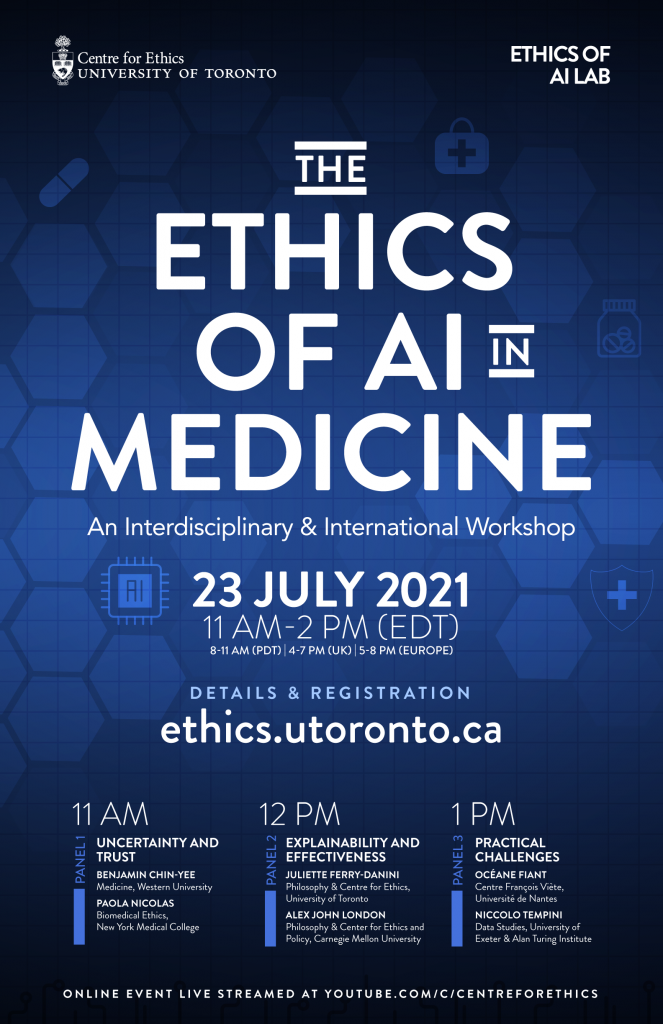
► This event has been postponed until further notice.
The Ethics of AI in Medicine: An Interdisciplinary & International Workshop:
There is a growing literature in the ethics and philosophy of AI on one side and an already strong literature in the philosophy of medicine and medical ethics on the other side. Few attempts at bringing together the two disciplines have been made, despite many connections. The questions of bias or of transparency, for instance, have been studied in both disciplines, yet in a somewhat disjointed manner. This workshop thus aims to confront different disciplines on the topic of AI in medicine: philosophy of medicine, ethics and social sciences. The goal is to understand how conceptual and ethical issues in AI in medicine interact and may impact health.
Schedule
11am [= 8am Pacific/4pm UK/5pm Europe]
Panel 1: Uncertainty and Trust
Benjamin Chin-Yee (Medicine, Western University), AI, Ethics and the Quest for Medical Certainty
Paola Nicolas (Biomedical Ethics, New York Medical College), Mistrust and Fear of Replaceability in the Age of Big Data in Health Care
12pm [= 9am/5pm/6pm]
Panel 2: Explainability and Effectiveness
Juliette Ferry-Danini (Philosophy & Centre for Ethics, University of Toronto), What Is the Problem with the Opacity of Artificial Intelligence in Medicine?
Alex John London (Philosophy & Center for Ethics and Policy, Carnegie Mellon University), The Structure of Clinical Translation: Why We Need Prospective Clinical Trials of AI in Medicine1pm [= 10am/6pm/7pm]
Panel 3: Practical Challenges
Océane Fiant (Centre François Viète, Université de Nantes), The Deployment of Artificial Intelligence in Medicine: A Perspective Based on the Study of the Use of a Decision Tree for the Diagnosis of Pulmonary Embolisms in Emergency Medicine
Niccolo Tempini (Data Studies, University of Exeter & Alan Turing Institute), Practical Considerations for Ethics Review of DS/AI Research: A Preliminary Summary of Challenges and Best Practices
11:00 AM - 02:00 PMThis is an online event. It will be live streamed on the Centre for Ethics YouTube Channel at 11am, Friday, July 23 [= 8am Pacific/4pm UK/5pm Central Europe]. Channel subscribers will receive a notification at the start of the live stream.
Centre for Ethics, University of Toronto
- Sat, Jul 17, 2021
Conferences
Ethics, Intersections, Reflections (C4E Undergraduate Research Conference 2021)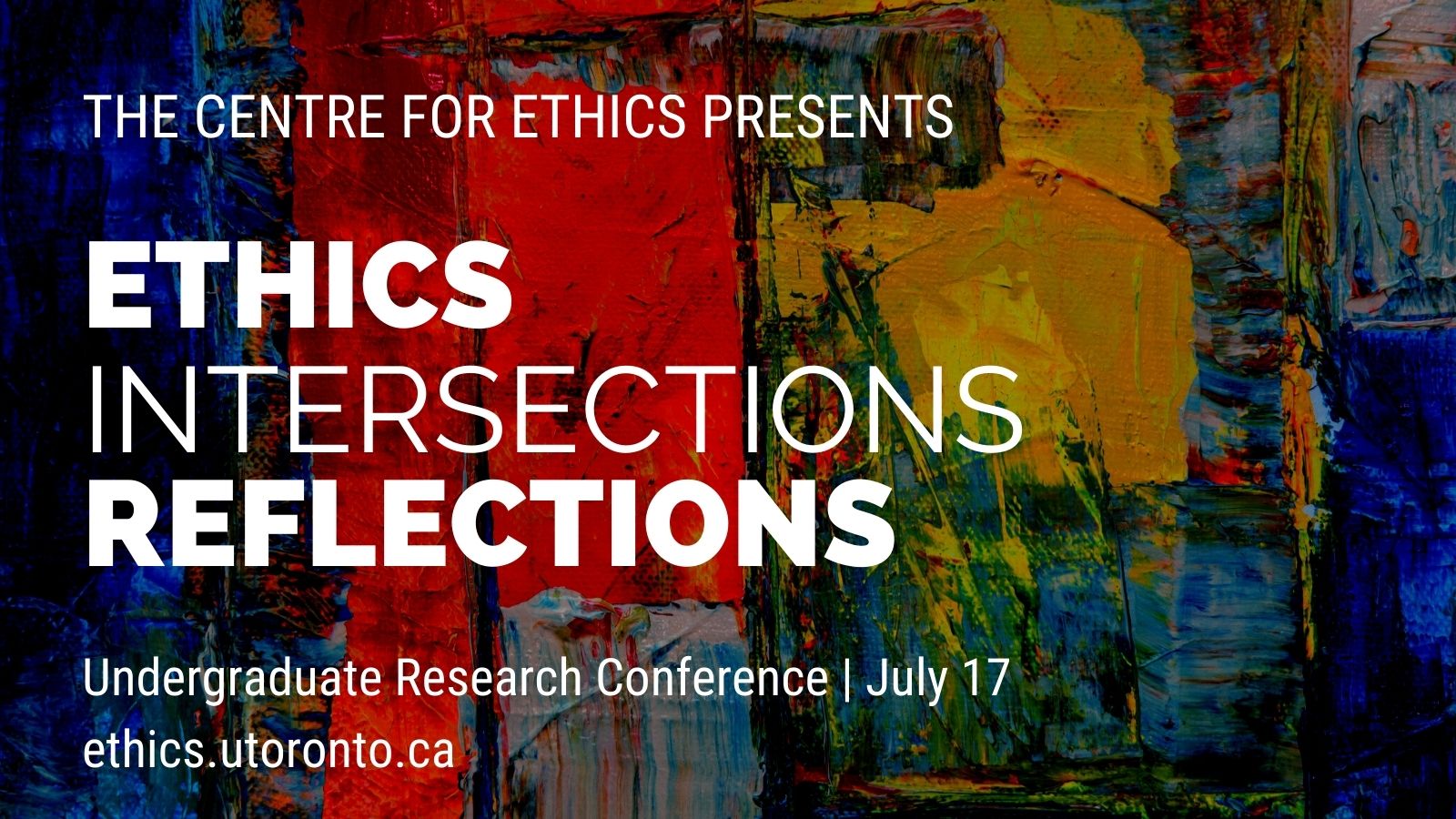
Ethics, Intersections, Reflections (C4E Undergraduate Research Conference 2021)
The conference will bring together UofT students and recent graduates from across disciplines to present and discuss research on current issues, in the spirit of the C4E’s mission to explore the ethical dimensions of individual, social, and political life. We aim to publish a special conference symposium in the Centre’s multimedia online journal, C4eJournal. All departmental affiliations and disciplines are welcome!
➡️ Registration is required to attend this event. Register here to receive the Zoom link for the conference.
Conference Schedule
12 pm – Welcome
Panel I Ethics in Context
12:05 – Jeffrey Ma, Rearranging Arranged Marriage in Modern India: How Netflix’s Indian Matchmaking Elucidates the Positionality of the Modern Neoliberal Subject
12:15 pm – Bailey Irene Midori Hoy, My Family’s Haunted Left Stairway: An Autoethnography on Trauma and Memory through the Lense of Haunting Studies, Japanese Folklore and Material Culture
12:25 pm Discussion
Panel II Ethics in Policy
12:45 pm – Maliha Sarwar, It Takes a Village… Or Maybe a Lottery?: Contextualizing Covid-19 Vaccine Hesitancy Among Black Americans
12:55 pm – Tsitsi Macherera, Surveillance in Higher-Education and How Campuses Can Resist
1:05 pm – Discussion
Panel III Ethics in Theory
1:25 pm – Alex Heyman, Information Utilitarianism
1:35 pm – Ariel LaFayette, An Existentialist Challenge to Karl Marx’s Vision of Jewish Emancipation
1:45 pm – Discussion
Speakers
 Jeffrey Ma is a recent graduate of the University of Toronto, having completed his undergraduate Bachelors of Arts degree with a major in History and Anthropology in 2021. He is looking forward to pursuing a J.D. at the University of Michigan Law School starting this fall. His academic interests involve topics related to the history of the Asian diaspora in North America, the history and development of cultural foodways, as well as the realities of neoliberalism and globalization in Asia. In his free time, he enjoys baking, listening to podcasts, and a variety of arts & crafts.
Jeffrey Ma is a recent graduate of the University of Toronto, having completed his undergraduate Bachelors of Arts degree with a major in History and Anthropology in 2021. He is looking forward to pursuing a J.D. at the University of Michigan Law School starting this fall. His academic interests involve topics related to the history of the Asian diaspora in North America, the history and development of cultural foodways, as well as the realities of neoliberalism and globalization in Asia. In his free time, he enjoys baking, listening to podcasts, and a variety of arts & crafts. Bailey Irene Midori Hoy is a recent graduate of the University of Toronto. A fourth generation Japanese Canadian, she developed an interest in her community’s history while completing a history specialist. This passion, coupled with an interest in fashion, has led to work related to diaspora, feminism, and material culture. In 2020 she was a co-recipient of the Richard Lee Insights Through Asia Challenge, where she conducted research on the relationship between kimono and Japanese Canadian women, currently under review for publication in Re: locations journal. Recently, she finished her senior thesis on Japanese American Beauty Queens. Bailey is currently working as a research assistant, and helping curate an exhibit on origami for the Japanese Canadian Cultural Centre. Other interests include historical reenactment, stand-up paddleboarding, and bubble tea.
Bailey Irene Midori Hoy is a recent graduate of the University of Toronto. A fourth generation Japanese Canadian, she developed an interest in her community’s history while completing a history specialist. This passion, coupled with an interest in fashion, has led to work related to diaspora, feminism, and material culture. In 2020 she was a co-recipient of the Richard Lee Insights Through Asia Challenge, where she conducted research on the relationship between kimono and Japanese Canadian women, currently under review for publication in Re: locations journal. Recently, she finished her senior thesis on Japanese American Beauty Queens. Bailey is currently working as a research assistant, and helping curate an exhibit on origami for the Japanese Canadian Cultural Centre. Other interests include historical reenactment, stand-up paddleboarding, and bubble tea. Maliha Sarwar (she/her) is pursuing a double major at the University of Toronto in Sociocultural Anthropology and History. Her presentation at the Ethics Intersections Reflections conference examines the institutional medical racism in the United States, and its impact on COVID-19 vaccine uptake in Black Americans. Through her research she hopes to shed light on the importance of working directly with communities to better understand intergenerational medical trauma and create long term solutions for a more equitable future. Maliha is incredibly interested in the intersection of ethics and policy, and enjoys examining contemporary global issues through a historical lens. When she’s not working, Maliha loves to take long walks through Toronto and explore new parts of the city.
Maliha Sarwar (she/her) is pursuing a double major at the University of Toronto in Sociocultural Anthropology and History. Her presentation at the Ethics Intersections Reflections conference examines the institutional medical racism in the United States, and its impact on COVID-19 vaccine uptake in Black Americans. Through her research she hopes to shed light on the importance of working directly with communities to better understand intergenerational medical trauma and create long term solutions for a more equitable future. Maliha is incredibly interested in the intersection of ethics and policy, and enjoys examining contemporary global issues through a historical lens. When she’s not working, Maliha loves to take long walks through Toronto and explore new parts of the city. Tsitsi Macherera is a recent graduate from the University of Toronto. Their research interests include black feminist thought, urban planning, and more recently surveillance studies. In her free time, she enjoys film photography, jump rope, and finding new music.
Tsitsi Macherera is a recent graduate from the University of Toronto. Their research interests include black feminist thought, urban planning, and more recently surveillance studies. In her free time, she enjoys film photography, jump rope, and finding new music.
Ana Brinkerhoff is a fourth-year undergraduate student at University College. She is completing Majors in Political Science and Sociology. Her research interests include political sociology, intersectional gender studies, critical carceral studies, and unenforced policy. Ana wishes to continue her education at the graduate level in the future and hopes to conduct research on the failures of the Canadian state and how this failure reinforces societal inequalities. Ana is from Vancouver, BC and is excited to return to campus in the Fall.
 Alex Heyman is a former C4E Undergraduate Fellow (2020-21) and a recent graduate from U of T (Class of 2021) with a BSc in Computer Science and Cognitive Science, plus a Philosophy minor. They have been interested in philosophy since being introduced to it by their parents in middle school, with chief interests including ethics, metaphysics, epistemology, and philosophy of mind. They take a consequentialist approach to ethics, and hope to help integrate ethical and safety concerns into the field of AI research in their future career. Outside of academia, they are an amateur writer of both fiction and non-fiction, as well as a hobbyist designer and programmer of retro-style video games.
Alex Heyman is a former C4E Undergraduate Fellow (2020-21) and a recent graduate from U of T (Class of 2021) with a BSc in Computer Science and Cognitive Science, plus a Philosophy minor. They have been interested in philosophy since being introduced to it by their parents in middle school, with chief interests including ethics, metaphysics, epistemology, and philosophy of mind. They take a consequentialist approach to ethics, and hope to help integrate ethical and safety concerns into the field of AI research in their future career. Outside of academia, they are an amateur writer of both fiction and non-fiction, as well as a hobbyist designer and programmer of retro-style video games.
Ariel LaFayette‘s research interests are in the phenomenology of religious experience and ethical debates in the philosophy of mind. She is particularly interested in how topics in the philosophy of religion can be re-interpreted to shed light on progressive solutions to contemporary ethical problems. Ariel is also an editor of Pensées Canadiennes—the national philosophy undergraduate journal, and the editor-in-chief of Noesis—UofT’s philosophy undergraduate journal. She is currently in the final year of her undergraduate degree, double-majoring in philosophy and cognitive science.
12:00 PM - 02:00 PM
Centre for Ethics, University of Toronto
- Thu, Jul 15, 2021
Conferences, Race, Ethics + Power
Unbound Questions / Ethical Interventions (Race, Ethics + Power Capstone Event)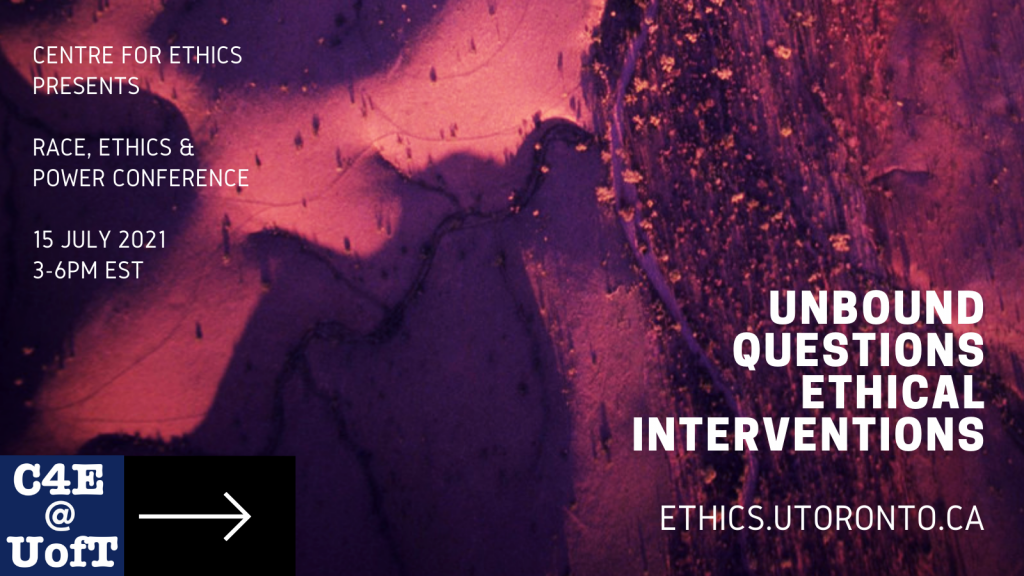
Unbound Questions / Ethical Interventions (Race, Ethics + Power Capstone Event)
This gathering brings together undergraduate and graduate fellows as well as research associates as they share their current scholarly work as part of the Race, Ethics, and Power project. As an interdisciplinary collective of researchers, the presentations offer interventions across a variety of fields of study to address ethical concerns regarding methodology and practice.
Session I: Ethical Geography and Itinerancy
Chelsey Liu, Ethics in Research: Exploring Indigeneity
My research will centre around the ethics of research in Indigenous communities, and the ways it should be conducted in order to preserve and strengthen Indigenous ecological knowledge and culture. Drawing from guidelines such as Linda Smith’s “Decolonizing Methodologies”, which uses Kaupapa Maori as an approach to culturally appropriate research protocols and methodologies, I want to evaluate the impacts of colonial research and how to de-colonialize current Indigenous ecological research conducted for extraction and the expansion of Western knowledge. When it comes to Indigenous ecological knowledge, how can extractivism occur with knowledge? How should Indigenous ecological knowledge research be conducted when considering the complex cultural layering of principles which have emerged through colonization? By engaging with various methodologies, I endeavour to explore the importance of research in establishing self-determination, legitimacy, and resistance for Indigenous peoples.Andrew M. Thomas, Ontological Abduction: Black Geographies & Bodies as Problem of Thought within Germany
This research project is a thematic literature review of the source of and reality of anti-Black racism within present-day Germany. It explores the early sources of anti-or proto-anti-African (Black) racism that stretches back to antiquity, found in medieval cartography, in medieval literature, and within modernity’s school of thought. Specifically, it explores proto-anti-African thought or rather cartographical race or racism that Europeans projected onto the African continent and its people that continues to haunt people of African heritage in Germany.Christopher Smith, Route Thoughts: Wandering, Intuition, Itinerancy
Itinerancy denotes various forms of movement and mobility and acquires manifold meanings through its synonyms such as “wandering,” “roaming,” and so on. In this presentation I opt for a notion of itinerancy to assemble a language to illuminate how Black queer diasporic performances of dissent disrupt and/or augment Pride festivities to offer alternate routes for Black LGBT+ communion. Thus, itinerancy or an “itinerant hospitality” enables a grammar that attends to moments of “surprise” instantiated by Black LGBT+ presence from an “elsewhere” that falls outside of and yet contests dominant historical accounts of queer liberation and its Black queer and Trans* progenitors.Session II: Colonial Failure & Systems Analysis
Kamilah Ebrahim, The Limits of Anti-Trust Regulation: Refocusing Towards Epistemic Power
The current monopoly over data production, collection and information platforms centralizes epistemic power and the capacity to accumulate economic capital through data. At the same time this process dispossesses marginalized and racialized communities from the data they are producing. The result is a dynamic that mirrors the dispossession created through colonialism in a new form of “techno-imperialism”. Current debates surrounding monopoly structures in technology tend to focus on the economic effects rather than the epistemic consequences, this talk will refocus this conversation and consider the pros and cons of anti-trust policy solutions currently being considered in Canada.Vasuki Shanmuganathan, Colonial Failure and Race in Paul Heyse’s Medea
In the nineteenth century, European imperialists were long used to being at a crossroad with biopolitics reshaping constructions of race, global abolitionism, and violent uprisings in the colonies. Studying debates in a post-abolitionist Germany and its literary salons and parliaments suggests ethics became central to deliberations on the conditions of racialized people albeit through the understanding of a relational and comparative approach to other imperialists.I demonstrate how German literature contributed to writing race histories within a global narrative of race, and illustrate how works were often influenced by and compared to the Second French Empire. I examine the novella Medea (1898) and early poem Urica (1852) by German writer Paul Heyse as an example where this relational and comparative mode of ethics is seen as initially hopeful. Heyse uses this understanding as a departure point to criticize genealogies of violence against the racialized body. He does this by casting the Black woman as protagonist in both his works and living legacies of violence. Through mentions of their family lineage, children, and other modes of reading gendered bodies, the reader learns that a sense of ethics among Europeans was entangled with economic survival of imperialists and less so about the changes abolitionists long called for.
Kamilah Ebrahim is a Master of Information candidate concentrating in Human Centred Data Science at the University of Toronto. Kamilah recently graduated from the University of Waterloo with an Honours Bachelor of Arts in Economics. She is also a graduate fellow at the University of Toronto Center for Ethics where she hopes to explore her research interests in the intersection of technology and the political economies of data collection globally and locally. When Kamilah is not in class or working on her research, she enjoys finding new spots for gnocchi in Toronto.
Chelsey Liu is an undergraduate student at UofT studying Political Science, Environmental Studies, and a minor in Environmental Ethics. This year, she is an undergraduate Fellow with the Race, Ethics, and Power project. Through her position as a fellow, she hopes to broaden her knowledge and research interests on the intersectionalities between climate justice, race, and ethics, and exploring the ways that political governance and hegemonic structures of racial inequality shape societal movements. During her free time, Chelsey enjoys snacking while curled up on the couch with a good book/movie.
Dr. Vasuki Shanmuganathan is a Research Associate at the Centre for Ethics with the Race, Ethics, and Power (REP) Project. Her research is at the intersections of race, colonialism, and health. As a Research Lead with the SHADES study supported by Women’s College Hospital, she examines the impact of shadeism across racialized communities. Previously, she studied what constitutes promising care practices in Canadian Long Term Care as part of a national research team with YU-CARE at the Faculty of Health, York University. Her current project looks at concepts of race and health in the colonial context and its impact on current policies. She is also the founder of the Tamil Archive Project (TAP).
Dr. Christopher Smith (they/them) is a Research Associate at the Center for Ethics at University of Toronto with the Race, Ethics, and Power Project. They received their Ph.D. from the Dept. of Social Justice Education – Ontario Institute for Studies in Education (OISE) / University of Toronto in 2020. Their research interests reside in the productive interstices of Black Diaspora Cultural Studies, Black expressive cultures and practices, Queer and Feminist Theory, including Post-Colonial and Decolonial studies.
Andrew M. Thomas (he/him) is a queer Jamaican-born Canadian settler who has lived much of his life in Canada. However, he now splits his time between Munich, Germany, and Toronto, Canada with his partner and two cats, Reds and Fats, while pursuing graduate studies in human geography at the University of Toronto, St. George. His interest spans various subjects that include, but is not limited to, Black feminist thoughts, post-colonialism, queer colour of critique, intersectionality, native studies, philosophy of knowledge, ontology, and affect theory. Through the Race, Ethics, and Power fellowship, he hopes to interrogate the ethics of understanding racism as primarily, as advanced by its advocates, as rooted in implicit bias, through which racism and racial hegemony can be dismantled through the implicit bias test, as taken up by many institutions both here in North America, and Europe. During the summers, he works as an English camp counsellor and as an ESL facilitator in Munich, Germany, working with children, teens, and adults, and where he has lived and worked for the last twelve years.
➨ please register here
★ This is an online event. It will be live streamed on the Centre for Ethics YouTube Channel on July 15, 2021. Channel subscribers will receive a notification at the start of the live stream.
► To stay informed about other upcoming events at the Centre for Ethics, opportunities, and more, please sign up for our newsletter.
03:00 PM - 06:00 PM
Centre for Ethics, University of Toronto
- Fri, Jul 9, 2021
Conferences
CANCELLED … Conference: The Ethics of Human Rights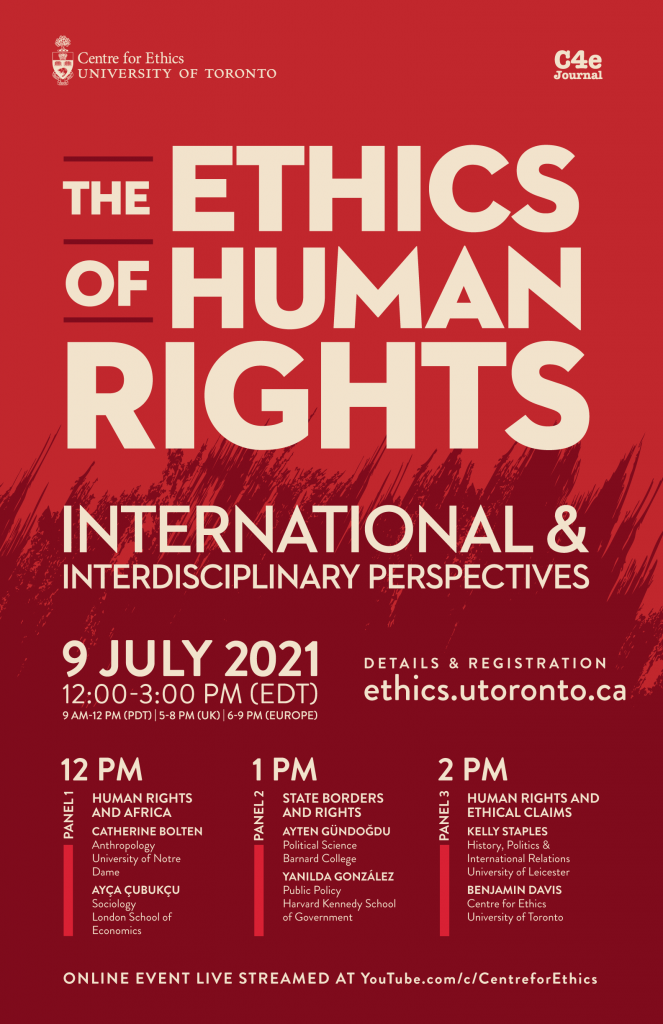
► This event has been cancelled until further notice.
The Ethics of Human Rights
This international and interdisciplinary conference tackles several key questions concerning human rights today: What is the most claims to human rights can achieve? How can human rights be a starting point for making claims on the nation-state? Are human rights claims necessarily addressed to nation-states? And what alternative political visions do human rights exclude? Panels of leading anthropologists, legal theorists, political scientists, and philosophers will discuss and debate these questions. Workshop proceedings will appear in a special symposium issue of C4eJournal.net.
Preliminary Schedule
12pm [= 9am Pacific/5pm UK/6pm Central Europe]
Panel 1: Human Rights and Africa
Catherine Bolten, Associate Professor of Anthropology, University of Notre Dame
“What Counts as a Right? Formal Education, Vocational Training, and Bad Faith in Sierra Leone”
The right to education was enacted into law in Sierra Leone in 2007. This right ostensibly enabled universal access to education; in practice it codified a devaluation of vocational training, implying that apprentices have “failed” at their rights, and that artisans who train apprentices are encouraging children to “violate their own rights.” The government focused on packing children into overcrowded and under-resourced classrooms, even as they did not alter the policy that forces children to leave school when they fail their exams, and fewer than 1% of students advance to tertiary education. School dropouts often seek vocational training, however, because of the government’s narrow emphasis on formal instruction, most vocational workshops are unfunded, under-resourced, and are denied credibility as educational institutes because they are not allowed to issue paperwork certifying the qualifications of their journeymen. I argue that the emphasis on formal education—especially in an economy that relies on artisanal work and has an extremely small professional sector—reveals that “the right to education” in Sierra Leone was designed and implemented as a bad-faith imitation of the Global North. Rather than creating opportunities for people to reach their potential and recognizing the diversity of that potential, this narrow conceptualization of rights has unethically prioritized a sector that benefits only a few, exacerbating social and economic inequalities rather than overcoming them.Ayça Çubukçu, Associate Professor in Human Rights and Co-Director of LSE Human Rights, London School of Economics
“On Afropolitanism”
In Out of the Dark Night (2021), Achille Mbembe develops the notion of Afropolitanism as he points toward new, “liberatory” models of community and humanity. In this talk, I will think with Mbembe about Afropolitanism in an effort to rethink the imperial trappings of liberal cosmopolitanism as an ethics of human rights.1pm [= 10am/6pm/7pm]
Panel 2: State Borders and Rights
Ayten Gündoğdu, Tow Associate Professor of Political Science, Barnard College
“Border Deaths and the Crisis of Human Rights”
Borders have become increasingly lethal with the adoption of ever more restrictionist policies and technologies of immigration control. Taking its starting point from the regime of impunity surrounding migrant deaths, this paper offers a critique of existing juridico-political frameworks, including universal human rights norms, that render migrants precarious in life and in death. I mobilize the term “forced disappearances” to capture how various border control practices push migrants beyond the pale of the law, make it difficult for their families and friends to locate their whereabouts, and render their lives disposable. To the extent that domestic and international laws offer various justifications of these practices in the name of territorial sovereignty, they actively participate in making migrants invisible, or “dead,” in the eyes of the law. A form of civil death precedes migrants’ physical deaths, in other words, and it can help explain why the latter remain unaccounted for, legally and politically.Yanilda González, Assistant Professor of Public Policy, Harvard Kennedy School of Government
“Democratic Participation in Policing and the Reproduction of Asymmetric Citizenship: The Contradictions of Participatory Security in São Paulo, Brazil”
This paper explores a fundamental paradox between democratic participation and policing. For some citizens, formal spaces for participation in policing can expand their citizenship rights by opening up access to the state and by fomenting government responsiveness to their demands. Yet for marginalized groups, expanded opportunities for citizen participation in policing often generates demands for repression against them, thereby contracting their citizenship rights. We contend that democratic participation in policing often engenders these contradictions, resulting in what we call asymmetric citizenship: when the expansion of rights for some citizens is achieved through the contraction of others’ citizenship rights. We propose three mechanisms by which participatory security institutions, which create formal spaces for citizen participation in policing and security, produce asymmetric citizenship: (1) by defining some groups as virtuous citizens while labeling marginalized groups as security threats; (2) by acting as gatekeeper that amplifies the voice of virtuous citizens and silences those deemed to be security threats; and (3) by articulating demands for police repression of security threats to protect the rights of virtuous citizens. We illustrate the framework through a qualitative analysis of São Paulo’s Community Security Councils, demonstrating how that expanding citizen participation in policing deepens the experience of citizenship for some by generating exclusion and police repression of marginalized segments of society. In contrast to much of the literature on participatory democracy, our analysis elucidates mechanisms through which democratic participation can reproduce, rather than ameliorate, unequal policing.2:00pm [= 11am/7pm/8pm]
Panel 3: Human Rights and Ethical Claims
Kelly Staples, Associate Professor of International Politics, School of History, Politics and International Relations, University of Leicester
“Claiming Human Rights: Solidarity and Statelessness”
This talk will consider human rights claims in the context of stateless persons and refugees, considering both to be in the position of having to claim their human rights. The perspective on human rights which underpins the talk is a quasi-foundational one in which what it means to “claim” human rights is argued to be contingent on the relationship between claimant and community. Given the continuing role of nation-states in protecting, respecting and fulfilling human rights, the talk will first consider what might be achieved through claims on states. However, it will also attempt to de-center the state by considering the role of other sub- and supra-state communities in responding to the human rights claims of refugees and stateless persons. Given the challenges in particular of ending statelessness, this opens up an alternative vision for their emancipation and empowerment.Benjamin Davis, Post-doctoral Fellow in Ethics, University of Toronto, Centre for Ethics
“Stuart Hall’s Use of Human Rights: An Ethics for the Left”
In developing a method for cultural studies, Stuart Hall endorsed the use of human rights. Rights claims, he suggested, are a key part of a Left vocabulary. In this talk, I develop Hall’s claim by arguing that human rights are a starting point not only for Left politics, but also for Left ethics. “The Left has rarely talked about that space in which the difference between the ‘good’ and the ‘bad’ is defined,” Hall maintained in his final lecture of what became Cultural Studies 1983. Human rights, I suggest, provide a secular mode for Left ethics to enter this ethical space, what Hall calls “the domain of the moral.” In addition to reading his lectures on cultural studies, I also consider his essay “Marx’s Notes on Method,” where he suggests that social phenomena can only be understood in particular contexts. Taken together, Hall’s lectures and essay present Left actors today with a way to address the traditional tension between the universal and the particular in rights claims: the vocabulary gains traction only through ethical reiterations in varying contexts.This is an online event. It will be live streamed on the Centre for Ethics YouTube Channel at 12pm, Friday, July 9 [= 9am Pacific/5pm UK/6pm Central Europe]. Channel subscribers will receive a notification at the start of the live stream.
12:00 PM - 03:00 PM
Centre for Ethics, University of Toronto
- Wed, Jun 9, 2021
Author Meets Critics, Ethics in the City, Ethics in Context
POSTPONED … Author Meets Critics: Mark Kingwell, The Ethics of Architecture (Ethics in Context)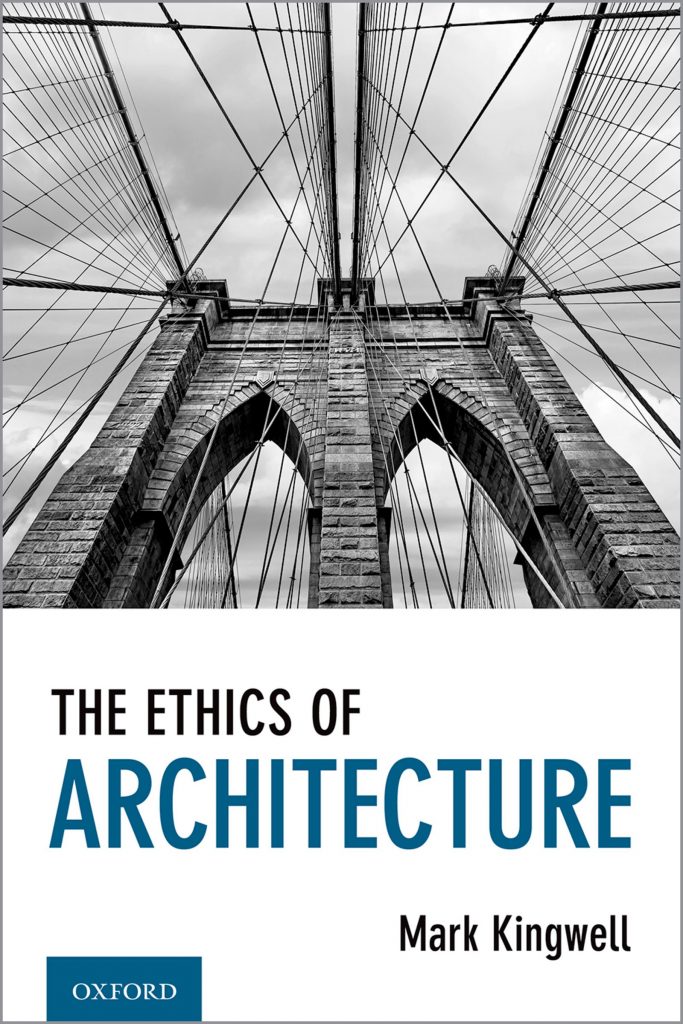
► This event has been postponed until further notice.
The Ethics of Architecture (OUP 2021)
Mark Kingwell
Department of Philosophy
University of TorontoParticipants
Martin Bressani (McGill, Architecture)
Theresa Enright (UofT, Political Science)
Mary Louise Lobsinger (UofT, Architecture)
Thilo Schaefer (UofT, Political Science) (moderator)The Book: The Ethics of Architecture
A lively and accessible discussion of how architecture functions in a complex world of obligation and responsibility, with a preface offering specific discussion of architecture during and after the COVID-19 pandemic.
What are the special ethical obligations assumed by architects? Because their work creates the basic material conditions that make all other human activity possible, architects and their associates in building enjoy vast influence on how we all live, work, play, worship, and think. With this influence comes tremendous, and not always examined, responsibility. This book addresses the range of ethical issues that architects face, with a broad understanding of ethics. Beyond strictly professional duties – transparency, technical competence, fair trading – lie more profound issues that move into aesthetic, political, and existential realms. Does an architect have a duty to create art, if not always beautiful art? Should an architect feel obliged to serve a community and not just a client? Is justice a possible orientation for architectural practice? Is there such a thing as feeling compelled to “shelter being” in architectural work? By taking these usually abstract questions into the region of physical creation, the book attempts a reformulation of “architectural ethics” as a matter of deep reflection on the architect’s role as both citizen and caretaker. Thinkers and makers discussed include Le Corbusier, Martin Heidegger, Lewis Mumford, Rem Koolhaas, Jane Jacobs, Arthur Danto, and John Rawls.
The Series: Ethics in Context
The Ethics of Architecture is the first book in a new series, Ethics in Context, published by Oxford University Press under the auspices of the Centre for Ethics, University of Toronto, that explores the ethical dimensions of interesting, provocative, and timely questions. Written to be read, and priced to be bought, books in the series are accessible, yet provide something rigorous that stimulates thought and debate, in keeping with the interdisciplinary and inclusive vision that animates the Centre for Ethics at the interface between academic research and public discourse.
Like its institutional home, Ethics in Context takes a broad, contextual, view of ethics: not as falling within the purview of a specific discipline but as a mode of normative analysis particularly well suited for interdisciplinary and public-facing reflection.
This is an online event. It will be live streamed on the Centre for Ethics YouTube Channel at 4pm, Wednesday, June 9. Channel subscribers will receive a notification at the start of the live stream. (For other C4E events, and to subscribe, visit YouTube.com/c/CentreforEthics.)► To stay informed about other upcoming events at the Centre for Ethics, opportunities, and more, please sign up for our newsletter.
04:00 PM - 05:30 PM
Centre for Ethics, University of Toronto
Rm 200, Larkin Building - Fri, May 7, 2021
Conferences, Ethics of AI in Context
Conference: Transparency in the Digital Environment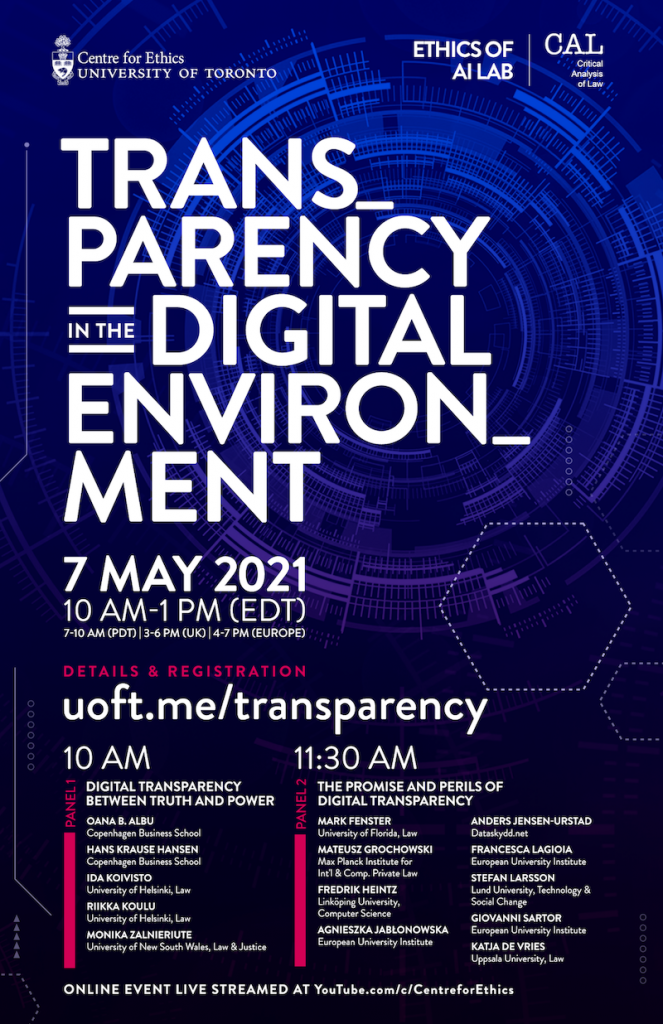
Transparency in the Digital Environment
Transparency has become an astonishingly popular ideal over the last couple of decades. Its traditional habitats, public law and political theory, have lost their monopoly to define it. It has globalized and spilled over to new disciplinary discourses – quite prominently, in algorithms and automation – thus becoming a well-nigh self-justificatory virtue, “the cultural signifier of neutrality.” Transparency promises that we can witness, immediately, what happens in the chambers of power, and by virtue of this witnessing, fix what needs to be fixed.
Can we, really? In the wake of post-truth politics, fake news and alternative facts, this promise needs to be reassessed. Governance uses increasingly computerized forms, automated decision-making and even machine learning, often taking place in opaque “black boxes.” At the same time, due to our online behavior, big data and even deliberate manipulation, we are pulled towards solipsistic realities: echo chambers and filter bubbles. These trends may distance us from interactive democratic deliberation, which presupposes some shared understanding of reality.
Can transparency deliver its promise in a digitalized environment? Does power hide not only from transparency but in transparency? Is it just a figurative placeholder for information release practices, or has it become a meta-discourse to assess the successfulness of those practices? To what extent is it legal, social, cultural, technical, material? These questions are important.
Algorithmic governance may not have a human understandable form to represent. What would be made visible, then?
There is a growing literature on critical transparency studies which argues convincingly that transparency is not an avenue to objective truth. Additionally, critical algorithm studies suggest, in turn, that algorithmization of our society cannot take place in a social vacuum. So far, law has not contributed much to those debates. To a large extent, it seems to subscribe quite uncritically to the realist theory of knowledge and concentrate on doctrinal analysis of freedom of information acts, or data protection law.
★ This online conference will feature contributors to a special issue, guest edited by Ida Koivisto (Law, Helsinki), in the open-access online journal Critical Analysis of Law: An International & Interdisciplinary Law Review. ► Access the special issue here.
Schedule
10am [= 7am Pacific/3pm UK/4pm Central Europe/5pm Finland]
Panel 1: Digital Transparency Between Truth and Power
10:00 Introduction
10:05 “Transparency-Washing” in the Digital Age: A Corporate Agenda of Procedural Fetishism (Monika Zalnieriute, in absentia) (summary by Ida Koivisto)
10:10 Crafting Digital Transparency: Implementing Legal Values into Algorithmic Design
(Riikka Koulu)
10:25 The Digital Rear Window: Epistemologies of Digital Transparency
(Ida Koivisto)
10:40 Three Sides of the Same Coin: Datafied Transparency, Biometric Surveillance, and Algorithmic Governmentalities (Oana B. Albu & Hans Krause Hansen)
10:55 Discussion & Q&A11:30am [= 8:30am/4:30pm/5:30pm/6:30pm]
Panel 2: The Promise and Perils of Digital Transparency
11:30 Algorithmic Transparency and Explainability for EU Consumer Protection: Unwrapping the Regulatory Premises (Mateusz Grochowski, Agnieszka Jabłonowska, Francesca Lagioia & Giovanni Sartor)
11:45 Notified But Unaware: Third-Party Tracking Online (Stefan Larsson, Anders Jensen-Urstad, & Fredrik Heintz)
12:00 A “Public” Journey Through COVID-19: Donald Trump, Twitter, and the Secrecy of U.S. Presidents’ Health (Mark Fenster)
12:15 Transparent Dreams (Are Made of This): Counterfactuals as Transparency Tools in ADM (Katja de Vries)
12:30 Discussion & Q&A► please register here
This is an online event. It will be live streamed on the Centre for Ethics YouTube Channel at 10am, Friday, May 7 [= 7am Pacific/3pm UK/4pm Central Europe/5pm Finland]. Channel subscribers will receive a notification at the start of the live stream.
Contributors:
- Oana B. Albu, Copenhagen Business School
- Mark Fenster, University of Florida, Law
- Mateusz Grochowski, Max Planck Institute for International and Comparative Private Law (Hamburg)
- Hans Krause Hansen, Copenhagen Business School
- Fredrik Heintz, Linköping University, Computer Science
- Agnieszka Jabłonowska, European University Institute
- Anders Jensen-Urstad, Dataskydd.net
- Ida Koivisto, University of Helsinki, Law
- Riikka Koulu, University of Helsinki, Law
- Francesca Lagioia, European University Institute
- Stefan Larsson, Lund University, Technology and Social Change
- Giovanni Sartor, European University Institute
- Katja de Vries, Uppsala University, Law
- Monika Zalnieriute, University of New South Wales, Law & Justice
Co-sponsor:
10:00 AM - 01:00 PM
Centre for Ethics, University of Toronto
- Wed, Apr 28, 2021
Ethics of AI in Context: Emerging Scholars
Julian Posada, Disembeddedness in Data Annotation for Machine Learning (Ethics of AI in Context: Emerging Scholars)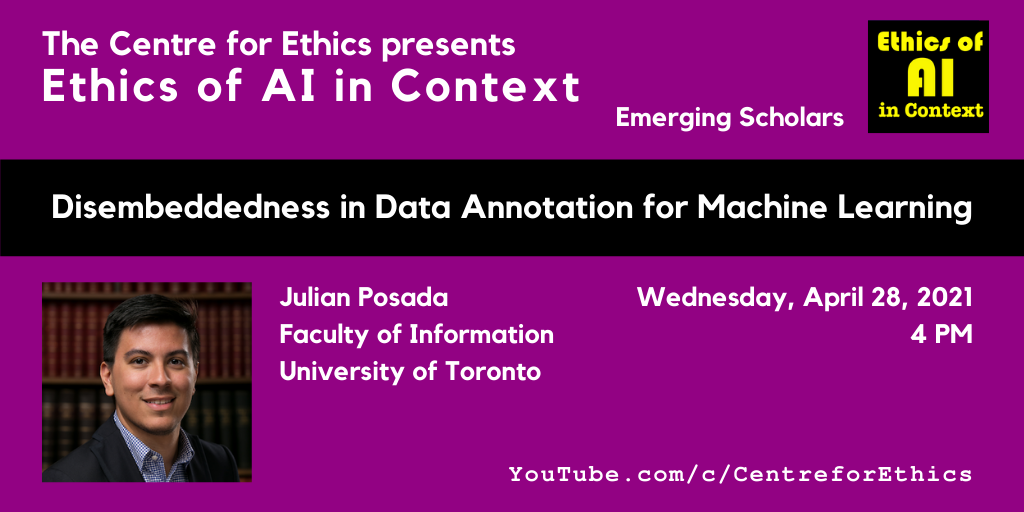
Disembeddedness in Data Annotation for Machine Learning
What happens when data annotation and algorithmic verification occurs in a significantly deregulated market? Today, many AI companies outsource these essential steps in developing machine learning algorithms to workers worldwide through digital labour platforms. This labour market has experienced a race to the bottom environment where most of the workers are situated in Venezuela, a country experiencing a profound social, political, and economic crisis, with the world’s highest inflation rates. This talk presents preliminary findings of ongoing research to explore how the “disembededness” of this market, in which economic activity is unconstrained (or deregulated) by institutions, affects workers’ livelihoods and, ultimately, the algorithms they are shaping. The talk explores this situation through the working conditions of platform users, the composition of their local networks, and the power relations between them, ML developers, and platforms.
► please register here
This is an online event. It will be live streamed on the Centre for Ethics YouTube Channel on Wednesday, April 28. Channel subscribers will receive a notification at the start of the live stream. (For other events in the series, and to subscribe, visit YouTube.com/c/CentreforEthics.)
► To stay informed about other upcoming events at the Centre for Ethics, opportunities, and more, please sign up for our newsletter.
Julian Posada
04:00 PM - 05:00 PM
Faculty of Information
University of Toronto
Centre for Ethics, University of Toronto
200 Larkin - Wed, Apr 21, 2021
Ethics of Songs
The Ethics of Songs: Deep River (African American spiritual, arr. H.T. Burleigh), with Ellie Hisama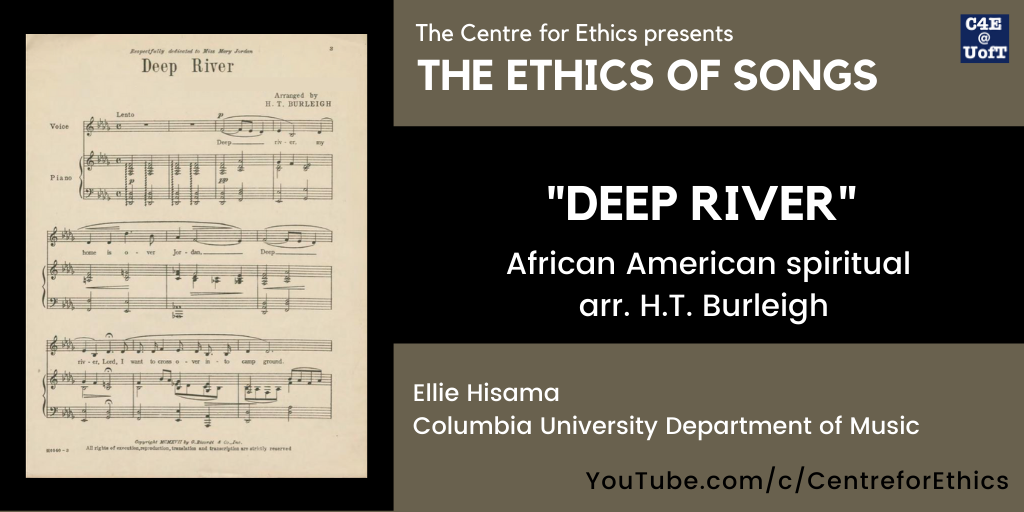
Join us for the Spring 2021 Season of The Ethics of Songs, the Centre for Ethics YouTube series that explores the ethical dimensions of songs familiar and new! (The full schedule is available here.)
Ellie Hisama
Music and Institute for Research on Women, Gender, and Sexuality
Columbia UniversityProduced and edited by Laura Menard (Music & Centre for Ethics, University of Toronto)
Ellie Hisama is Professor of Music and a member of the Institute for Research on Women, Gender, and Sexuality at Columbia University, where she has taught since 2006. The author of Gendering Musical Modernism, she has published on the music of Geri Allen, Joan Armatrading, Benjamin Britten, Ruth Crawford, Julius Eastman, and DJ Kuttin Kandi. She will join the University of Toronto’s Faculty of Music in July 2021 as Professor of Music and its next Dean.
► please register here
This is an online event, available on the Centre for Ethics YouTube Channel. Channel subscribers will receive a notification at the start. (For other events in the series, and to subscribe, visit YouTube.com/c/CentreforEthics.)
► To stay informed about other upcoming events at the Centre for Ethics, opportunities, and more, please sign up for our newsletter.
03:00 PM - 03:30 PM
Centre for Ethics, University of Toronto
200 Larkin - Wed, Apr 14, 2021
Ethics of AI in Context: Emerging Scholars
Noam Kolt, Predicting Consumer Contracts with GPT-3: A Legal Case Study in Computational Language Models (Ethics of AI in Context: Emerging Scholars)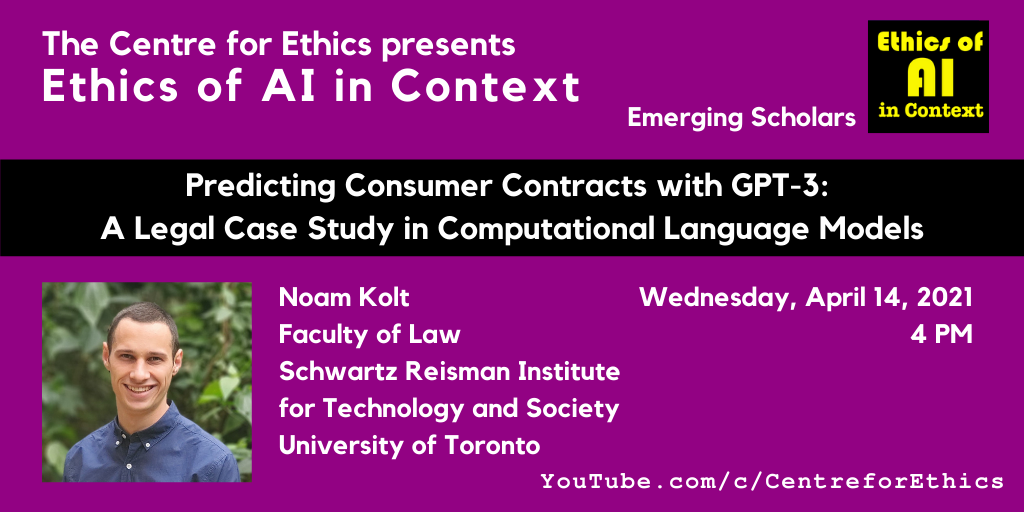
Predicting Consumer Contracts with GPT-3: A Legal Case Study in Computational Language Models
Computational language models can perform a wide range of complex tasks by predicting the next word in a sequence. In the legal domain, language models can summarize laws, draft case documents, and translate legal jargon into plain English. While language models could potentially empower consumers, they could also provide misleading legal advice and entrench harmful biases. By exploring the extent to which GPT-3 can understand consumer contracts, this case study sheds light on the opportunities and challenges of using language models to inform consumers of their legal rights and obligations.► please register hereThis is an online event. It will be live streamed on the Centre for Ethics YouTube Channel on Wednesday, April 14. Channel subscribers will receive a notification at the start of the live stream. (For other events in the series, and to subscribe, visit YouTube.com/c/CentreforEthics.)
► To stay informed about other upcoming events at the Centre for Ethics, opportunities, and more, please sign up for our newsletter.
 Noam KoltFaculty of LawSchwartz Reisman Institute for Technology and SocietyUniversity of Toronto
Noam KoltFaculty of LawSchwartz Reisman Institute for Technology and SocietyUniversity of Toronto
04:00 PM - 05:00 PM
Centre for Ethics, University of Toronto
200 Larkin - Mon, Apr 12, 2021
Public Lectures, Events on Campus
Aniruddhan Vasudevan, Translating Ethical Gestures: Notes on Language from Ethnographic Practice12:00 PM - 02:00 PM
Translating Ethical Gestures: Notes on Language from Ethnographic Practice
This is an academic talk hosted online by the JHI Working Group on Tamil Studies at the University of Toronto.
Important ethical acts are often accomplished in short stretches of language. In interactional settings, word choices, substitutions, juxtapositions, and avoidances can perform acts of care, signal inclusion, communicate ethical stances, and keep open or foreclose possibilities for relationality. This talk explores the pleasures and challenges of getting at the ethical surround of such interactional speech in ethnographic settings. Based on his ethnographic fieldwork with thirunangai-maruladis (thirunangai trans women committed to ecstatic devotion to the goddess) in Chennai, India, Vasudevan’s talk will explore both the ethical accomplishments of everyday Tamil speech among his thirunangai interlocutors as well as the scales of social context that come into play. How do people seize the ethical affordances of situations they encounter and the language that is available to them? What happens when they fail to do so, or think they have failed to do so? Do particular words and expressions shimmer with ethical significance? What kinds of translation can help us see the ethical labor our interlocutors do with language? The talk will explore such questions through ethnographic vignettes.
Dr. Aniruddhan Vasudevan is a sociocultural anthropologist whose research focuses on the intersections of gender and sexuality, religion, and ethics of relationality and care. He is also a translator of celebrated works of fiction by Tamil authors Ambai and Perumal Murugan. He is currently a Link-Cotsen Postdoctoral Fellow in the Society of Fellows and Lecturer in the Council of the Humanities and Anthropology at Princeton University.
► please register here
- Wed, Apr 7, 2021
Ethics, Aesthetics, Feminisms
Ara Osterweil, The Aesthetics of Care (Ethics, Aesthetics, Feminisms)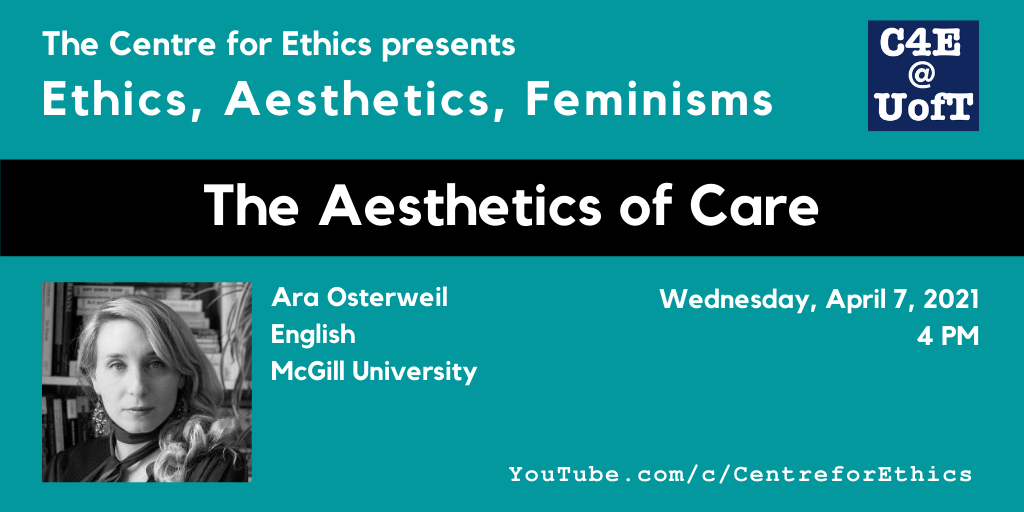
The Aesthetics of Care
In this talk, artist, scholar, and writer Ara Osterweil considers the tensions between art-making and caregiving. How does the ethical imperative to care for others conflict with the felt imperative to create? How can the constraints of caregiving be imagined anew as generative limits for more urgent and expansive ways of making art and being in the world? How has this eternal dilemma for women artists and writers been exacerbated in our current state crisis and emergency? Amidst considerations of the poems of Sylvia Plath, the paintings of Alice Neel, and the charged work of a handful of other women artists, Osterweil reflects on her own beleaguered practice as mother-artist-writer-teacher as a way of articulating the impossible necessity of an aesthetics of care.
► please register here
This is an online event. It will be live streamed on the Centre for Ethics YouTube Channel on Wednesday, April 7. Channel subscribers will receive a notification at the start of the live stream. (For other events in the series, and to subscribe, visit YouTube.com/c/CentreforEthics.)
► To stay informed about other upcoming events at the Centre for Ethics, opportunities, and more, please sign up for our newsletter.
 Ara Osterweil
Ara Osterweil
English
McGill UniversityAra Osterweil is a writer, abstract painter, and scholar. She is also an Associate Professor of Cultural Studies in the English Department, as well as Director of the World Cinema Program at McGill University. Her first book, Flesh Cinema: The Corporeal Turn in American Avant-Garde Film (Manchester University Press, 2014), examines the representation of sexuality in experimental film of the 1960s and 1970s. She writes for Artforum and has published essays in the Los Angeles Review of Books, Film Quarterly, Film Culture, Camera Obscura, Little Joe, Framework, The Brooklyn Rail, and Millennium Film Journal. She is currently working on two books: The Pedophilic Imagination: A History of American Film, and a collection of experimental prose entitled Stains & Fragments. You can explore more of her work here: www.araosterweil.com
04:00 PM - 05:30 PM
Centre for Ethics, University of Toronto
200 Larkin - Wed, Apr 7, 2021
Ethics of Songs
The Ethics of Songs: "Glück, das mir verblieb" from Die tote Stadt (by Erich Wolfgang Korngold), with Amanda Hsieh
Join us for the Spring 2021 Season of The Ethics of Songs, the Centre for Ethics YouTube series that explores the ethical dimensions of songs familiar and new! (The full schedule is available here.)
Amanda Hsieh
Historical Musicology
Chinese University of Hong KongProduced and edited by Laura Menard (Music & Centre for Ethics, University of Toronto)
Amanda Hsieh is Research Assistant Professor of Historical Musicology at the Chinese University of Hong Kong. Their scholarship explores categories of gender and nation and their intertwined manifestations within opera of the late nineteenth and the early twentieth centuries. While their doctoral work locates opera in the Austro-German context, their next book-length project treats opera as a transnational—and even global—phenomenon between Germany and Japan. They are the latest winner of the Jerome Roche Prize and their work has been supported by grants and fellowships from, among others, the DAAD, the Austrian Cultural Forum New York, and the Jackman Humanities Institute at the University of Toronto. Their writing can be found in the Journal of the Royal Musical Association and Music & Letters. They have just been appointed as Reviews Editor of both the Journal of the Royal Musical Association and the RMA Research Chronicle.
► please register here
This is an online event, available on the Centre for Ethics YouTube Channel. Channel subscribers will receive a notification at the start. (For other events in the series, and to subscribe, visit YouTube.com/c/CentreforEthics.)
► To stay informed about other upcoming events at the Centre for Ethics, opportunities, and more, please sign up for our newsletter.
03:00 PM - 03:30 PM
Centre for Ethics, University of Toronto
200 Larkin - Tue, Mar 30, 2021
Ethics of AI in Context
Ben Green, Algorithmic Governance: The Promises and Perils of Government Algorithms (Ethics of AI in Context)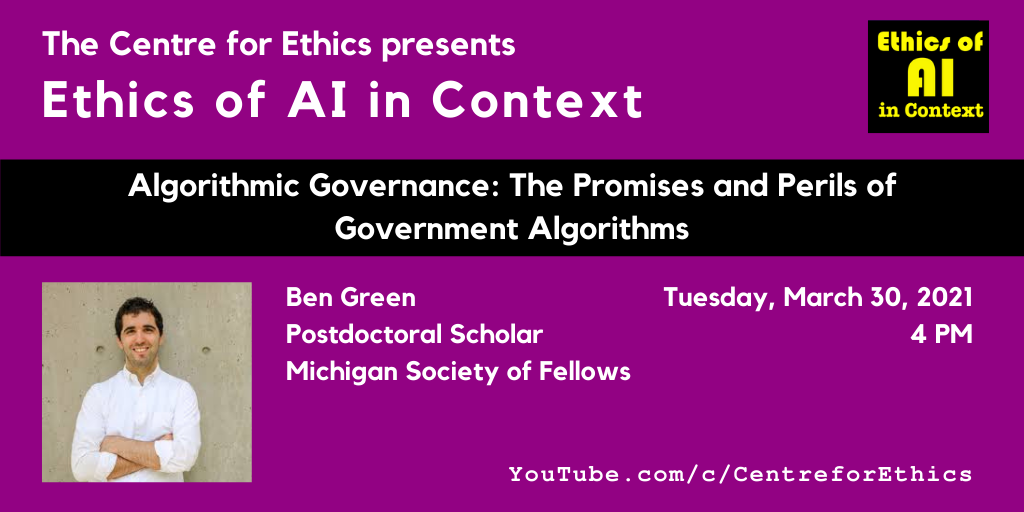
Algorithmic Governance: The Promises and Perils of Government Algorithms
Governments increasingly use algorithms (such as machine learning predictions) as a central tool to distribute resources and make important decisions. Although these algorithms are often hailed for their ability to improve public policy implementation, they also raise significant concerns related to racial oppression, surveillance, inequality, technocracy, and privatization. While some government algorithms demonstrate an ability to advance important public policy goals, others—such as predictive policing, facial recognition, and welfare fraud detection—exacerbate already unjust policies and institutions. This talk will explore some of the technical, political, and institutional factors that lead to algorithmic harms and will introduce an agenda for developing and regulating algorithms in the interest of equity and social justice.
► please register here
This is an online event. It will be live streamed on the Centre for Ethics YouTube Channel on Tuesday, March 30. Channel subscribers will receive a notification at the start of the live stream. (For other events in the series, and to subscribe, visit YouTube.com/c/CentreforEthics.)
► To stay informed about other upcoming events at the Centre for Ethics, opportunities, and more, please sign up for our newsletter.
Ben Green
04:00 PM - 05:30 PM
Postdoctoral Scholar
Michigan Society of Fellows
Centre for Ethics, University of Toronto
200 Larkin - Thu, Mar 25, 2021
Critical Race Studies, Race, Ethics + Power
Michael Dawson, Why Race and Capitalism Not Racial Capitalism? (Critical Race Studies: Interdisciplinary Perspectives)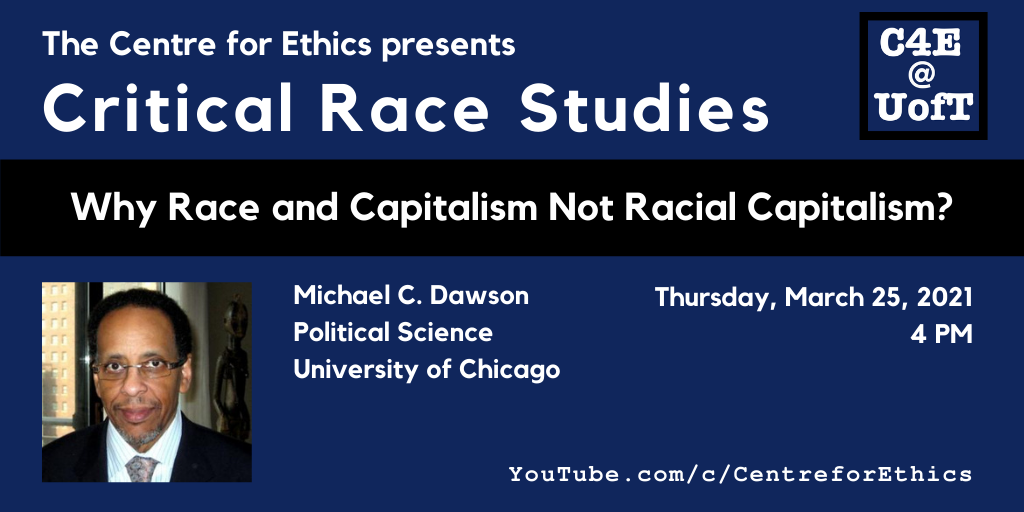
Why Race and Capitalism Not Racial Capitalism?
I discuss three frameworks that are designed to describe and analyze the interaction between race and capitalism. They are Cedric Robinson’s original framework of “racial capitalism;” the framework of “race and capitalism” frame adopted by me and some colleagues at the National Race and Capitalism Project; and a third category that Satnam Virdee has labeled “racialized capitalism.” All three frameworks specify the relationship between race, (usually signifying a structural phenomenon such as systemic racism, institutional racism, and/or white supremacy), and capitalism or the capitalist social order.* There is substantial divergence on how capital/capitalism/the capitalist social order is conceived. A key question is whether structural racism and/or patriarchy are internal to, if constitutive of a capitalist social order, or if patriarchy, white supremacy, and capitalism represent three systems of domination that while tightly articulated with each other still have their own internal logics (including sets of privileges, exclusions, and modes of violence specific to each). I conclude by analyzing what is at stake, what are the critical differences and where do the family resemblances end.
* There are extensive literatures that I do not address in this chapter. For example, as Peter Hudson and Adom Getachew have independently demonstrated, there is an extensive literature on “race and class” that emerges from the struggles in Southern Africa, the Caribbean as well as anti-racist struggles in continental Europe and the United Kingdom. On both sides of the Atlantic, particularly during the 20th century there was extensive discussion of the relationship between race, class, and sometimes gender by theorists such as Claudia Jones, CLR James, W.E.B. Du Bois, and later during the black power era those such as James Boggs. These literatures are not addressed here but will be in future work. As Hudson has forcefully argued, the term seems to first have been used extensively in South Africa. See Jenkins and Leroy, p. 4, for a specific citation of a South African theorist’s usage.
► please register here
This is an online event. It will be live streamed on the Centre for Ethics YouTube Channel on Thursday, March 25. Channel subscribers will receive a notification at the start of the live stream. (For other events in the series, and to subscribe, visit YouTube.com/c/CentreforEthics.)
► To stay informed about other upcoming events at the Centre for Ethics, opportunities, and more, please sign up for our newsletter.
 Michael Dawson
Michael Dawson
Political Science
University of Chicago
04:00 PM - 05:30 PM
Centre for Ethics, University of Toronto
200 Larkin - Wed, Mar 24, 2021
Ethics, Aesthetics, Feminisms
Grace Lavery, Pleasure and Efficacy: Techniques of Trans Feminist Criticism (Ethics, Aesthetics, Feminisms)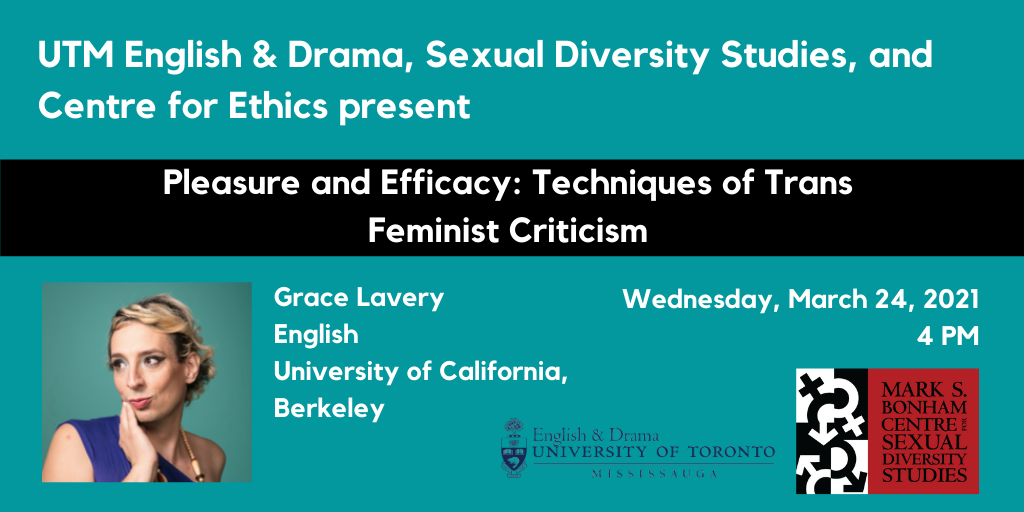
Pleasure and Efficacy: Techniques of Trans Feminist Criticism
“She really knows how to have a good time.” Such an assessment presupposes two premises, neither of which we conventionally take for granted: that following certain procedures will produce a good time, and that those procedures can be known in advance. In this lecture, I will explore the logical foundations of these claims, and their implications for the techniques of pleasure-giving and receiving that I take to be essential to the possibility of trans feminist thriving, and the focus of both suppressive patriarchal epistemologies, and anti-trans feminist thought. Through brief and critical readings in the work of the feminist eugenicist Marie Stopes, the cult leader and science fiction writer L. Ron Hubbard, and the anonymously published “big book” of Alcoholics Anonymous, I sketch an historiography of the “one weird trick your doctor doesn’t want you to know,”– by which feminists can create anew our own bodies, communities, and politics. In so doing, I aim to refresh Michel Foucault’s call in 1977, to “withdraw allegiance from the old categories of the Negative (law, limit, castration, lack, lacuna), which Western thought has so long held sacred as a form of power and an access to reality,” and instead to rebuild our world with our own knowledge-practices, trained not on what satisfies, intrigues, or expresses, but on what works.
► please register here
This is an online event co-hosted by the Mark S. Bonham Centre for Sexual Diversity Studies and the English & Drama Department at University of Toronto, Mississauga. It will be live streamed on the Centre for Ethics YouTube Channel on Wednesday, March 24. Channel subscribers will receive a notification at the start of the live stream. (For other events in the series, and to subscribe, visit YouTube.com/c/CentreforEthics.)
► To stay informed about other upcoming events at the Centre for Ethics, opportunities, and more, please sign up for our newsletter. Grace Lavery
Grace Lavery
English
University of California, BerkeleyGrace Lavery is Associate Professor in the Department of English at UC Berkeley, and general editor of Transgender Studies Quarterly. She is the author of Quaint, Exquisite: Victorian Aesthetics and the Idea of Japan (Princeton 2020), which won the NAVSA “Best Book of the Year” prize, and of Please Miss, an experimental memoir which will be published by Seal Press in 2021. Her essays have appeared in Critical Inquiry, Differences: A Journal of Feminist Cultural Studies, English Literary History, and elsewhere. She is currently completing two books––one on trans feminist rhetorics of technique, from which this lecture is drawn, and one on the problem of narrative closure in the age of the sitcom.
Co-sponsored by:

04:00 PM - 05:30 PM
Centre for Ethics, University of Toronto
200 Larkin - Wed, Mar 24, 2021
Ethics of Songs
The Ethics of Songs: Collegiate A Cappella, with Roger Mantie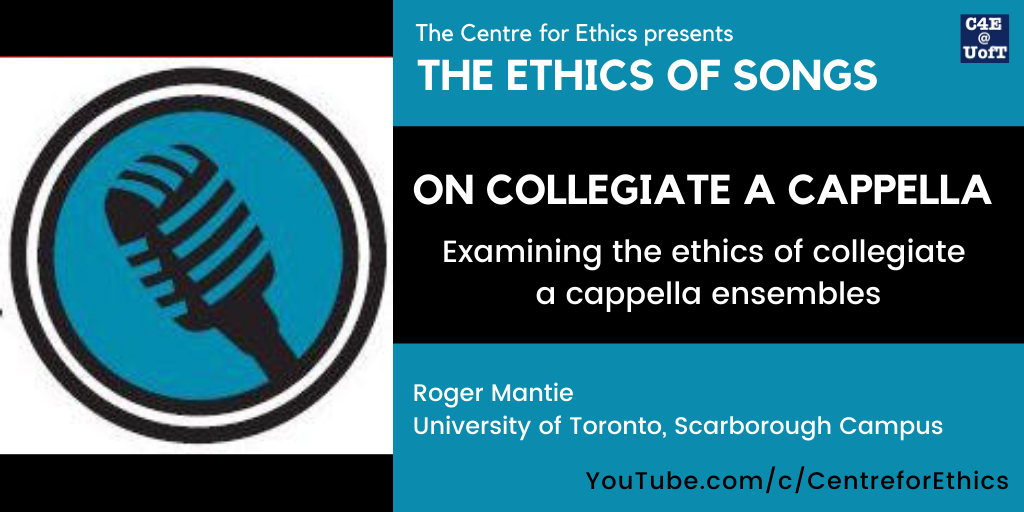
Join us for the Spring 2021 Season of The Ethics of Songs, the Centre for Ethics YouTube series that explores the ethical dimensions of songs familiar and new! (The full schedule is available here.)
Collegiate A Cappella: Examining the Ethics of Collegiate A Cappella Ensembles Centre for Ethics, University of Toronto, March 24, 2021
Roger Mantie
Arts, Culture & Media
University of TorontoProduced and edited by Laura Menard (Music & Centre for Ethics, University of Toronto)
Roger Mantie (PhD) is Associate Professor, Department of Arts, Culture and Media at University of Toronto Scarborough, with a graduate appointment at the Ontario Institute for Studies in Education. Mantie is co-author (with Brent Talbot) of Education, Music, and the Social Lives of Undergraduates: Collegiate A Cappella and the Pursuit of Happiness (Bloomsbury Press), and co-editor (with Alex Ruthmann) of the Oxford Handbook of Technology and Music Education (2017) and co-editor (with Gareth Dylan Smith) of the Oxford Handbook of Music Making and Leisure (2016). Complete info at rogermantie.com
► please register here
This is an online event, available on the Centre for Ethics YouTube Channel. Channel subscribers will receive a notification at the start. (For other events in the series, and to subscribe, visit YouTube.com/c/CentreforEthics.)
► To stay informed about other upcoming events at the Centre for Ethics, opportunities, and more, please sign up for our newsletter.03:00 PM - 03:30 PM
Centre for Ethics, University of Toronto
200 Larkin - Mon, Mar 22, 2021
Ethics & Caribbean Philosophy
Miguel Gualdrón Ramírez, Édouard Glissant’s Ethics (Ethics & Caribbean Philosophy)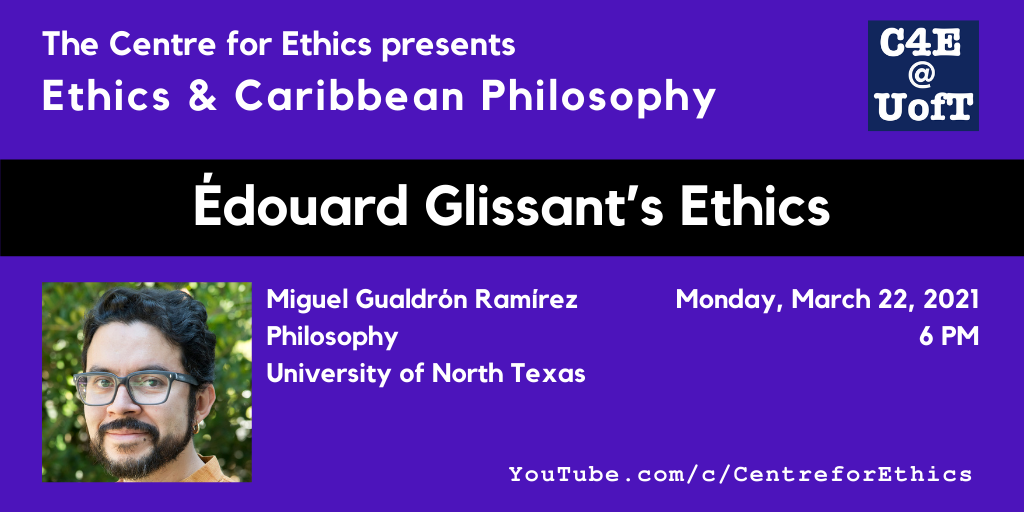
Édouard Glissant’s Ethics
Miguel Gualdrón Ramírez is Assistant Professor of Philosophy at The University of North Texas. His work focuses on the interconnection between history, politics, and aesthetics in Latin America and the Caribbean, and philosophical attempts at approaching these topics collectively. In his Ethics and Caribbean Philosophy presentation, we will discuss his recent essay “To ’stay where you are’ as a decolonial gesture: Glissant’s philosophy of Caribbean history in the context of Césaire and Fanon.”
► please register here
This is an online event. It will be live streamed on the Centre for Ethics YouTube Channel on Monday, March 22. Channel subscribers will receive a notification at the start of the live stream. (For other events in the series, and to subscribe, visit YouTube.com/c/CentreforEthics.)
06:00 PM - 07:30 PM Miguel Gualdrón Ramírez
Miguel Gualdrón Ramírez
Philosophy
University of North Texas
Centre for Ethics, University of Toronto
200 Larkin - Thu, Mar 18, 2021
Race, Ethics + Power: Emerging Scholars
Jonathan Kwan, Transitional Legitimacy: A Framework for Theorizing Structural Racism, (Race, Ethics + Power: Emerging Scholars)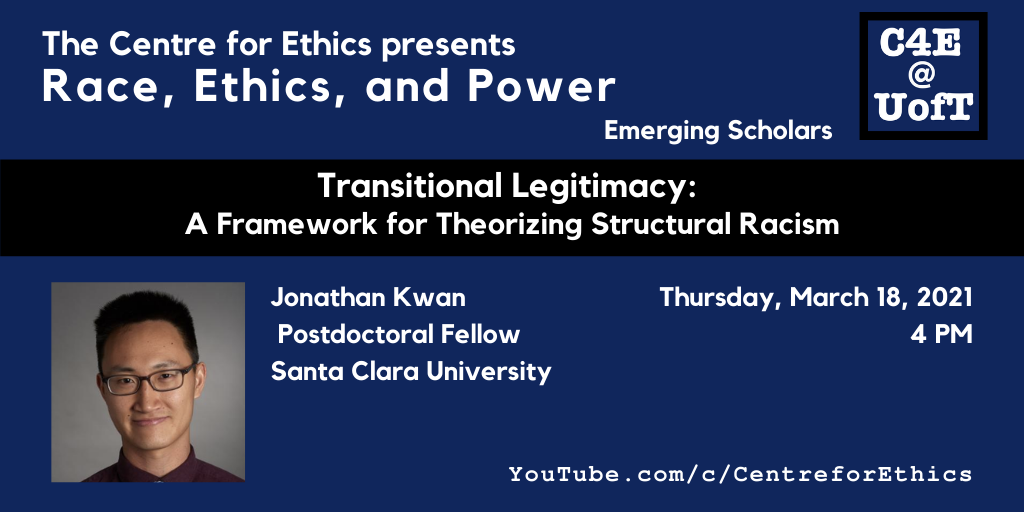
Transitional Legitimacy: A Framework for Theorizing Structural Racism
Structural racism is not only unjust but also undermines the legitimacy of political institutions. Legitimacy makes a weaker but prior demand to justice and refers to a political entity’s right to rule in the first place whereas justice concerns whether that rule is exercised in keeping with what subjects are owed. By analogy to the concept of transitional justice which applies to post-conflict or post-war societies, I argue that a concept of transitional legitimacy is needed for theorizing how to realize legitimate political institutions from within ill-ordered societies marked by structural racism and oppression. Theories of legitimacy by themselves are inadequate to the task because they simply specify the conditions that constitute legitimacy and operate from within an ideal theory approach that does not sufficiently account for non-ideal circumstances of oppression and domination. Taking structural racism against African Americans in the U.S. as a case study, I argue that transitional legitimacy requires the public affirmation of everyone’s equal political status (via e.g., truth commissions and legitimate apologies for past harm), the rule of law to guard against racial discrimination, the dismantling of racialized mass incarceration, de facto protection of democratic rights rather than voter suppression, and reparations for past and enduring injustices.
► please register here
This is an online event. It will be live streamed on the Centre for Ethics YouTube Channel on Thursday, March 18. Channel subscribers will receive a notification at the start of the live stream. (For other events in the series, and to subscribe, visit YouTube.com/c/CentreforEthics.)
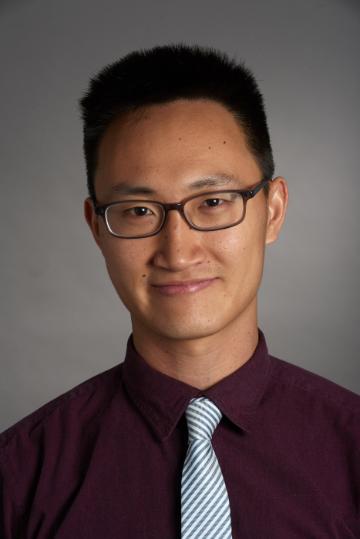 Jonathan Kwan is the Inclusive Excellence Postdoctoral Fellow in Immigration Ethics at the Markkula Center for Applied Ethics at Santa Clara University. As a social and political philosopher, Jonathan works on contemporary issues such as immigration, climate justice, Indigenous rights, and structural racism. He also has interests in Chinese philosophy, Buddhist philosophy, and the philosophy of art. He earned his philosophy PhD and a Women’s Studies Certificate from The Graduate Center, CUNY. He has taught at Hunter College, Brooklyn College, Baruch College, and LaGuardia Community College and served as the Managing Editor of the Journal of Social Philosophy.
Jonathan Kwan is the Inclusive Excellence Postdoctoral Fellow in Immigration Ethics at the Markkula Center for Applied Ethics at Santa Clara University. As a social and political philosopher, Jonathan works on contemporary issues such as immigration, climate justice, Indigenous rights, and structural racism. He also has interests in Chinese philosophy, Buddhist philosophy, and the philosophy of art. He earned his philosophy PhD and a Women’s Studies Certificate from The Graduate Center, CUNY. He has taught at Hunter College, Brooklyn College, Baruch College, and LaGuardia Community College and served as the Managing Editor of the Journal of Social Philosophy.
04:00 PM - 05:00 PM
Centre for Ethics, University of Toronto
200 Larkin - Wed, Mar 10, 2021
Ethics, Aesthetics, Feminisms
Rey Chow & Austin Safar, "We Other Victorians"? Novelistic Remains, Therapeutic Devices, Contemporary Televisual Dramas (Ethics, Aesthetics, Feminisms)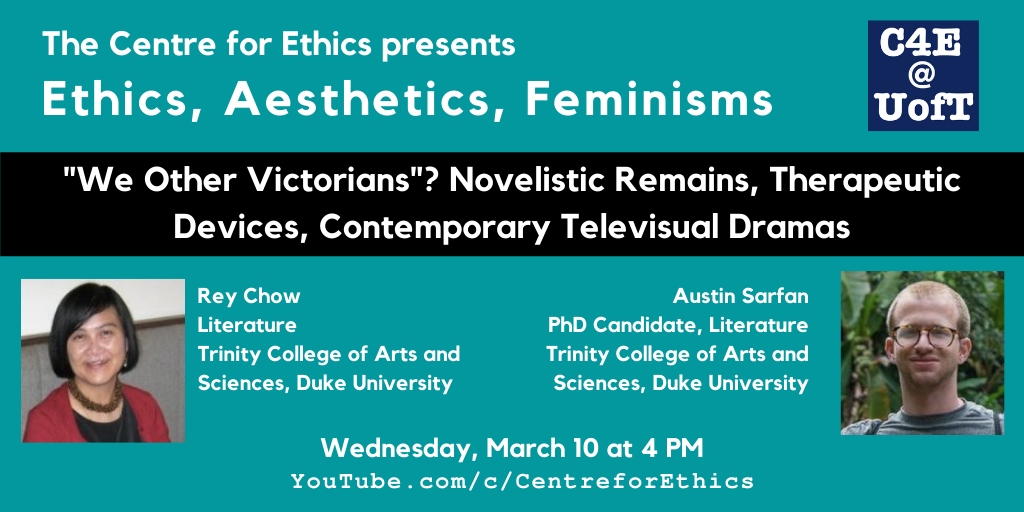
As part of our Ethics, Aesthetics, Feminisms series, the Centre for Ethics is excited to present a unique seminar event with Dr. Rey Chow and Austin Safar where they will discuss their recent co-authored paper, ‘”We Other Victorians”? Novelistic Remains, Therapeutic Devices, Contemporary Televisual Dramas.’ This seminar will take place on Wednesday, March 10th, 4-5:30pm EDT. This event will not be live-streamed, so attendees must register in advance to receive the seminar’s Zoom link. We will be capping the event at 100 participants. Please register with your name and email using this form. Attendees should also read the paper in advance of our meeting. You can find the paper here. Please contact Doctoral Fellow Amanda Greer with any questions or concerns at amanda.greer@mail.utoronto.ca.
 Rey Chow
Rey Chow
Literature
Trinity College of Arts and Sciences, Duke UniversityAustin Sarfan is a Ph.D. candidate in the Program in Literature at the Trinity College of Arts and Sciences at Duke University. He is completing a dissertation on the postcolonial reception of Joseph Conrad’s Heart of Darkness, with broad research interests in literary modernism, poststructuralism, and the cultural study of the emotions.
04:00 PM - 05:30 PM
Centre for Ethics, University of Toronto
200 Larkin - Wed, Mar 10, 2021
Ethics of Songs
The Ethics of Songs: Making Plans for Nigel (by XTC), with David Jager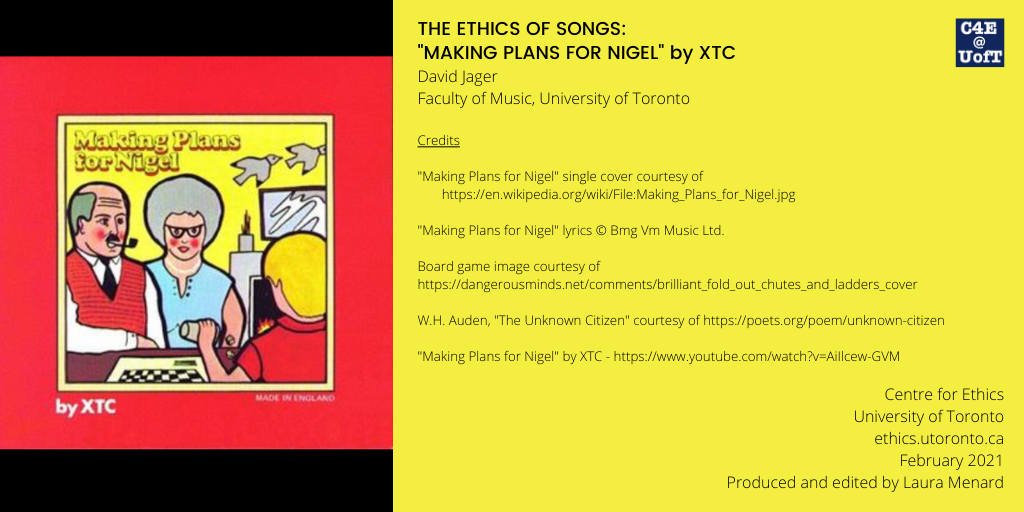
Join us for the Spring 2021 Season of The Ethics of Songs, the Centre for Ethics YouTube series that explores the ethical dimensions of songs familiar and new! (The full schedule is available here.)
David Jager
Faculty of Music
University of TorontoProduced and edited by Laura Menard (Music & Centre for Ethics, University of Toronto)
David Jager is a writer, musician and performer living in Toronto. He has been keyboardist for the Montreal Ska Band The Kingpins, lead singer and pianist for French Jazzy swing band Swing Dynamique, and was musical director and arranger for the Toronto avant-burlesque troupe The Scandelles. David shifted to composition with his original musical “Get To Nomi”, about the New Wave counter tenor Klaus Nomi, which debuted at NYC’s La Mama Theatre in 2016. He currently has two additional scripts in production. David Jager recently completed his doctorate at the U of T faculty of music, addressing the philosophy of Gilles Deleuze and its possible implications for music education, titled “Listening to Difference: Deleuze and Music Education”.
► please register here
This is an online event, available on the Centre for Ethics YouTube Channel. Channel subscribers will receive a notification at the start. (For other events in the series, and to subscribe, visit YouTube.com/c/CentreforEthics.)
03:00 PM - 03:30 PM
Centre for Ethics, University of Toronto
200 Larkin - Mon, Mar 8, 2021
Perspectives on Ethics
Rima Basu, Normative Expectations (Perspectives on Ethics)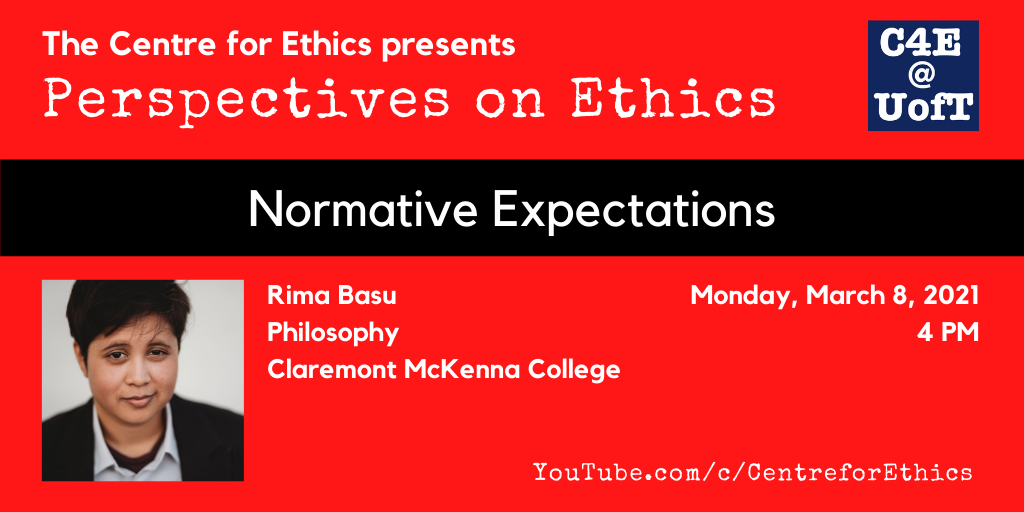
Normative Expectations
In supplementing the familiar ways that our interpersonal relationships are morally fraught, recent work in epistemology on doxastic wronging has highlighted how these relationships can be epistemically fraught as well. However, in focusing predominantly on beliefs— mental states that arguably constitute a small fraction of our mental lives—these theories have their own theoretical blindspots. In this paper, I expand the scope of analysis to expectations. Typically, we notice the failures of expectations when we’re the targets of them: when we let our loved ones down. Key indicators of normative expectations are feelings of disappointment and betrayal. Contexts in which we these feelings manifest most vividly involve parents and their hopes and dreams for our lives. Focusing on these contexts, I argue that normative expectations play three distinctive roles: a predictive role, a prescriptive role, and a proleptic role. Each role, I conjecture, comes with its own avenue for moral, epistemic, and conceptual failure. Ultimately, in precisifying the heterogeneous class of attitudes that constitute normative expectations, I reveal just how expansive the ‘doxastic’ in doxastic wronging ought be.
► please register here
This is an online event. It will be live streamed on the Centre for Ethics YouTube Channel on Monday, March 8. Channel subscribers will receive a notification at the start of the live stream. (For other events in the series, and to subscribe, visit YouTube.com/c/CentreforEthics.)
04:00 PM - 05:30 PM Rima Basu
Rima Basu
Philosophy
Claremont McKenna College
Centre for Ethics, University of Toronto
200 Larkin - Fri, Mar 5, 2021
Race, Ethics + Power
Ricky Varghese & Benjamin Weil, Privilege, Race & Imagined Immunities in the Time of COVID (Race, Ethics + Power Flash Event)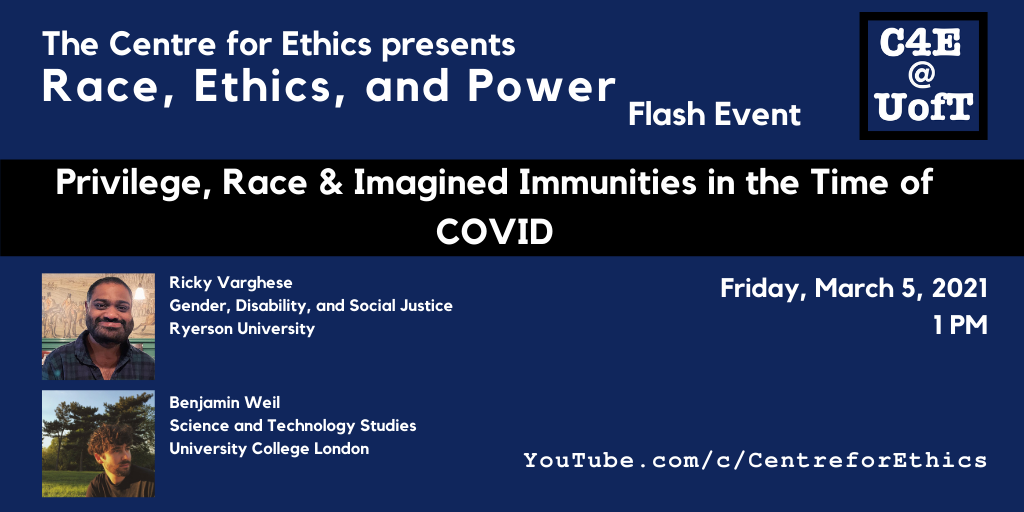
Privilege, Race & Imagined Immunities* in the Time of COVID
As the COVID-19 pandemic endures into 2021 there are many ways to describe this moment such as “catastrophic”. We might also add “revelatory” to this list of descriptors. Revelatory in the sense that in moments of crisis, such as a pandemic, power structures of racial and economic inequality and inaccessibility to health care become more visible. These structures were present prior to, yet become more acute, when we consider the profile of the “good” or “responsible” citizen. But what constitutes the “bad or irresponsible citizen”? For example, individuals who ignore lockdown protocols, travel restrictions, or in recent trends wherein elites utilize power and privilege to travel and acquire a vaccine from regions with vulnerable communities? The desire to imagine the “bad citizen” is equally revelatory because in their actions an assumed social contract – perhaps founded upon an ethics of “care” has been breached or disregarded entirely. Who is empowered to do so without impunity? More importantly do crises such as a pandemic prompt us to critically question the “social contract” assumed to encapsulate an ethics of care that is seen as a collective aspiration and practice, but enacted differently?
*Wald, Priscilla. Contagious: Cultures, Carriers and the Outbreak Narrative. Duke UP (2008)
► please register here
This is an online event. It will be live streamed on the Centre for Ethics YouTube Channel on Friday, March 5. Channel subscribers will receive a notification at the start of the live stream. (For other events in the series, and to subscribe, visit YouTube.com/c/CentreforEthics.)
 Ricky Varghese
Ricky Varghese
Gender, Disability, and Social Justice
Ryerson UniversityRicky Varghese received his PhD in Sociology of Education from the University of Toronto. He holds the Tanis Doe postdoctoral research fellowship in Gender, Disability, and Social Justice at the School of Disability Studies at Ryerson University. He will be heading a SSHRC-funded speakers’ series titled “Sex and the Pandemic: Convergences and Divergences in Queer Men’s Sexual Health in the Midst of HIV/AIDS and COVID-19” which will run from May through to October of this year. He is also a psychotherapist in private practice since 2014, and a candidate in training to become a psychoanalyst through the Toronto Institute of Psychoanalysis.
 Benjamin Weil
Benjamin Weil
Science and Technology Studies
University College LondonBenjamin Weil is a PhD candidate in the Science and Technology Studies Department at University College London. His thesis, supported by the Economic and Social Research Council, is a critical inquiry into the protest of the so-called “gay blood ban” in the UK. He works at the intersection of queer and science and technology studies and is also a founding member of the Decolonise STEM collective.
01:00 PM - 02:30 PM
Centre for Ethics, University of Toronto
200 Larkin - Wed, Mar 3, 2021
Ethics, Aesthetics, Feminisms
Jodi Byrd, What Remains: Colonial Racial Capitalism, Videogames, and an Empire in Play (Ethics, Aesthetics, Feminisms)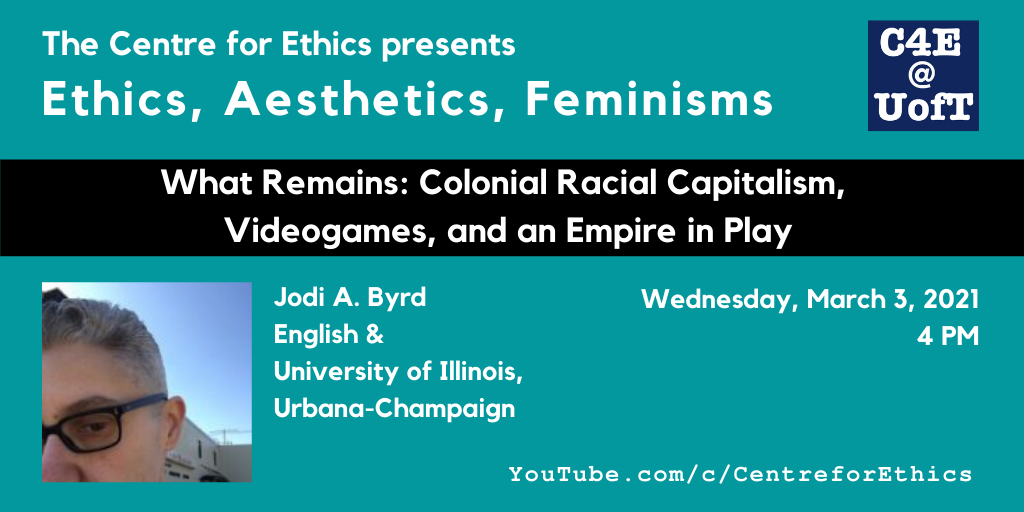
What Remains: Colonial Racial Capitalism, Videogames, and an Empire in Play
As videogame designers respond to critiques of and demands for gendered and racial representations, more and more games have started to offer alternative embodiments and narratives to consider the gendered dynamics of who is imagined to design, play, and otherwise consume videogames. In a close reading of two videogames, What Remains of Edith Finch (Giant Sparrow/Annapurna, 2017) and Until Dawn (Supermassive Games/Sony, 2015), Jodi Byrd will present a chapter from her next book, Indigenomicon: American Indians, Videogames, and the Strutures of Play, and discuss how the lingering imperial horror of settlement and capitalism shape how race and indigeneity are (not) legible within the stories videogames want us to inhabit through play. In requiring but not engaging settlement as a structure of the sublime, the horror that both games produce ultimately obscures US settler imperialism shaped through what Iyko Day terms alien capital and in the process flattens indigeneity into the environments and atmospheres of each game’s denouement of families unable to survive and grieve.
Jodi A. Byrd is a citizen of the Chickasaw Nation of Oklahoma, Associate Professor of English and gender and women’s studies at the University of Illinois at Urbana-Champaign, and a faculty affiliate at the National Center for Supercomputing Applications. Byrd is the author of The Transit of Empire: Indigenous Critiques of Colonialism (Minneapolis: University of Minnesota Press, 2011) and their work has appeared most recently in Social Text, South Atlantic Quarterly, and in Joanne Barker’s Critically Sovereign: Indigenous Gender, Sexuality, and Feminist Studies (Duke UP, 2017).
► please register here
This is an online event. It will be live streamed on the Centre for Ethics YouTube Channel on Wednesday, March 3. Channel subscribers will receive a notification at the start of the live stream. (For other events in the series, and to subscribe, visit YouTube.com/c/CentreforEthics.)
04:00 PM - 05:30 PM Jodi Byrd
Jodi Byrd
Illinois
English & Gender and Women’s Studies
Centre for Ethics, University of Toronto
200 Larkin - Mon, Mar 1, 2021
Perspectives on Ethics
Clare Hemmings, Unnatural Feelings: The Affective Life of ‘Anti-Gender’ Mobilisations (Perspectives on Ethics)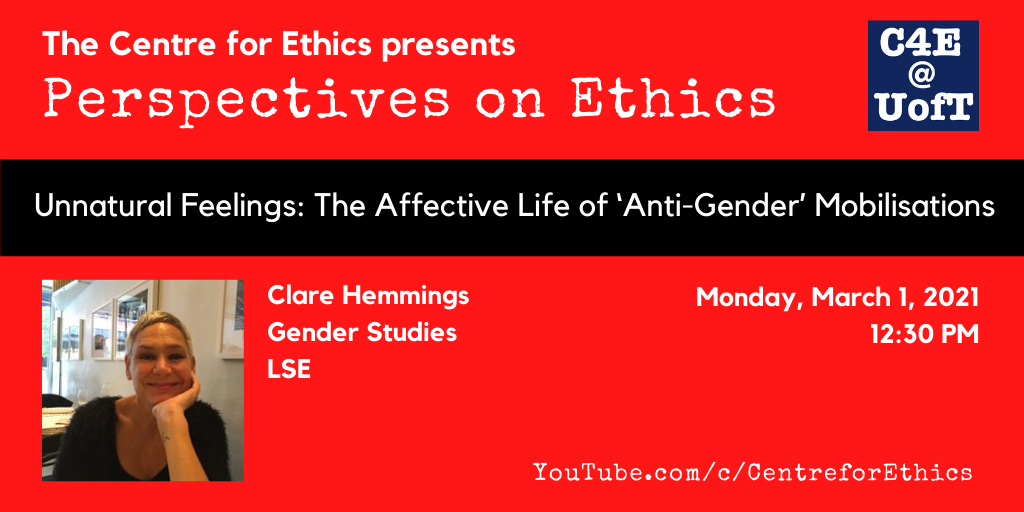
Unnatural Feelings: The Affective Life of ‘Anti-Gender’ Mobilisations
This paper explores the spatio-temporal and affective tricks that are central to the success of current, transnational ‘anti-gender’ mobilisations. In these increasingly powerful movements (in Europe, the US, and Latin America in particular) gender equality is presented as needing to be tempered by the ‘common sense’ of ‘sex’ over ‘gender, as a way of resisting the destructiveness of both a feminism gone too far, and the reactionary cultural patriarchalism of the interloper. The focus here is on the affective life of anti-‘gender ideology’ claims, as a way of trying to short-circuit efforts to displace violence onto feminist, queer or migrant others. I explore the ‘anti-gender’ logic of the privileging of ‘sex’ as natural and complementary as precisely the locus of aggression, and make a claim for the importance of rooting feminist, queer and critical race approaches in anti-white supremacist affect in turn. Overall, I am interested in exploring feminist methods for undoing the misogynist, homophobic and racist fantasies of annihilation – their own and ours – as an urgent task for our troubled present.
► please register here
This is an online event. It will be live streamed on the Centre for Ethics YouTube Channel on Monday, March 1. Channel subscribers will receive a notification at the start of the live stream. (For other events in the series, and to subscribe, visit YouTube.com/c/CentreforEthics.)
Clare Hemmings
12:30 PM - 01:45 PM
Gender Studies
LSE
Centre for Ethics, University of Toronto
200 Larkin - Thu, Feb 25, 2021
Race, Ethics + Power: Emerging Scholars
Gayathri Naganathan, Shadeism, Sexual Health, and Diasporic Women's Experiences (Race, Ethics + Power: Emerging Scholars)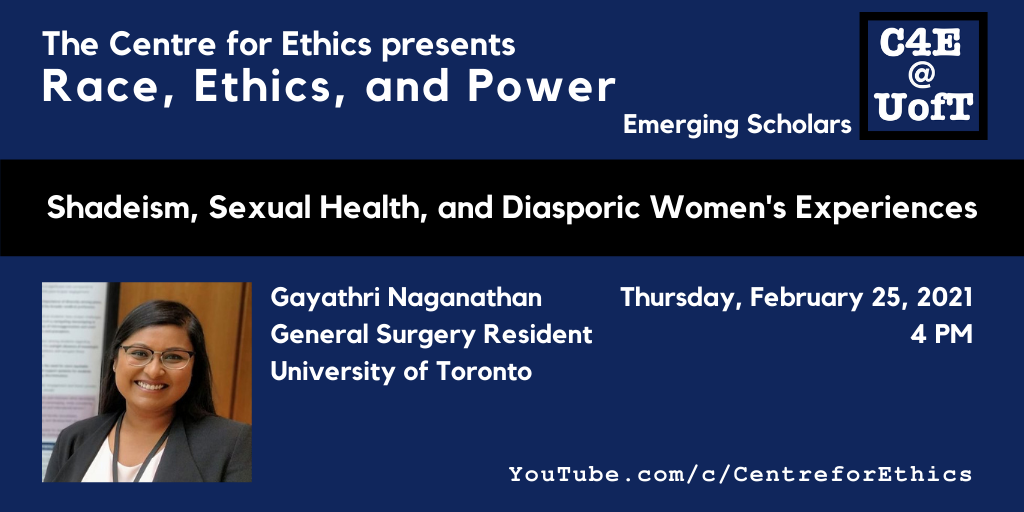
Shadeism, Sexual Health, and Diasporic Women’s Experiences
Shadeism is the process by which lighter skin is equated with perceived health and social benefits. Studies suggest racialized women have an additional burden to adhere to Eurocentric beauty standards in order to be seen as employable, attractive, and socially and culturally desirable (Charles & McLean 2017; Veenstra, 2011). However, what remains to be studied is how shadeism mediates 1) priorities (gender, self-image, lifestyle, social relationships, familial networks, employment, social mobility, class, caste) leading to lightening practices; 2) the narrative of ‘looking healthy’ to be connected to lighter skin beauty; and 3) how the ethics of researching racialized communities influences which health issues are prioritized. How racialized women treat their skin reveals much about the pressures of societal expectations (Rozen et al., 2012). Through a combination of informant interviews, focus groups with arts-based activities (photo voice, oral histories (Forbear, 2016) and one-on-one interviews, this qualitative pilot project led by ASAAP first aims to examine how racialized cis and transwomen ages 16-35 from the Caribbean, South Asian, Middle Eastern and North African (MENA) regions are affected by shadeism and how it impacts their sexual health. The approach will be from an anti-oppressive, Intersectional Feminist analysis, and in this talk I will call attention to the complex ways in which shadeism, gender, sex, caste, race, class, location, religion, and age inequities create societal pressure for cis and transwomen.
► please register here
This is an online event. It will be live streamed on the Centre for Ethics YouTube Channel on Thursday, February 25. Channel subscribers will receive a notification at the start of the live stream. (For other events in the series, and to subscribe, visit YouTube.com/c/CentreforEthics.)
 Gayathri Naganathan
Gayathri Naganathan
General Surgery Resident
University of Toronto
Dr. Naganathan is a General Surgery Resident Physician at the University of Toronto and an alumna of McMaster University Medical School. She also holds a Master of Science in Health Services Research from the Institute for Health Policy, Management, and Evaluation at the University of Toronto. Her body of work includes research examining the experiences of immigrants, refugees, homeless, and racialized communities in the areas of primary care, mental health, migration, and aging. Her current interests include health policy, health equity, global health, and the application of qualitative methodology within health systems and surgical research.
04:00 PM - 05:00 PM
Centre for Ethics, University of Toronto
200 Larkin - Wed, Feb 24, 2021
Ethics of AI in Context: Emerging Scholars
Suzanne Kite and Scott Benesiinaabandan, Indigenous Protocols and Artificial Intelligence (Ethics of AI in Context: Emerging Scholars)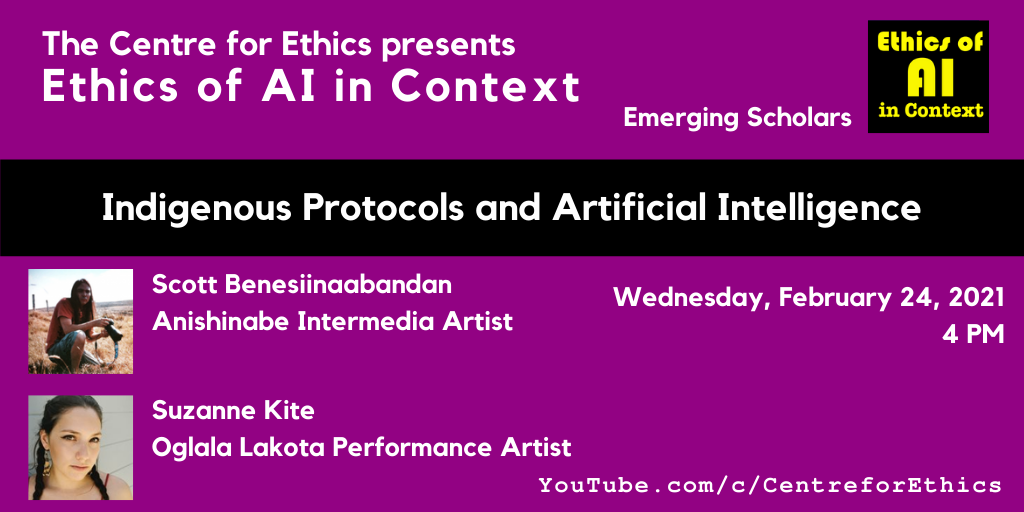
Indigenous Protocols and Artificial Intelligence
Scott Benesiinaabandan and Suzanne Kite will be in conversation around their research, practice, and contributions to the Indigenous Protocol and Artificial Intelligence Position Paper.
This is an online event. It will be live streamed on the Centre for Ethics YouTube Channel on Wednesday, February 24. Channel subscribers will receive a notification at the start of the live stream. (For other events in the series, and to subscribe, visit YouTube.com/c/CentreforEthics.)
► please register here
Kite
 aka Suzanne Kite is an Oglala Lakota performance artist, visual artist, and composer raised in Southern California, with an MFA from Bard College’s Milton Avery Graduate School, and is a PhD candidate at Concordia University, Research Assistant for the Initiative for Indigenous Futures, and a 2019 Trudeau Scholar. Her research is concerned with contemporary Lakota ontologies through research-creation, computational media, and performance practice. Recently, Kite has been developing a body interface for movement performances, carbon fiber sculptures, immersive video & sound installations.
aka Suzanne Kite is an Oglala Lakota performance artist, visual artist, and composer raised in Southern California, with an MFA from Bard College’s Milton Avery Graduate School, and is a PhD candidate at Concordia University, Research Assistant for the Initiative for Indigenous Futures, and a 2019 Trudeau Scholar. Her research is concerned with contemporary Lakota ontologies through research-creation, computational media, and performance practice. Recently, Kite has been developing a body interface for movement performances, carbon fiber sculptures, immersive video & sound installations.Scott Benesiinaabandan

Anishinabe Intermedia ArtistScott Benesiinaabandan is an Anishinaabe intermedia artist that currently works in experimental image-making and sonic materials. Scott’s current research interests are intersections of artificial intelligence and Anishinaabemowin, Scott has completed international residencies at Parramatta Artist Studios in Australia, Context Gallery in Derry, North of Ireland, and University Lethbridge/Royal Institute of Technology iAIR residency, along with international collaborative projects in both the U.K and Ireland. Scott has completed residencies with Initiative for Indigenous Futures and AbTec in Montreal. Scott is currently based in Montreal, where he is completing a MFA in photography.
04:00 PM - 05:00 PM
Centre for Ethics, University of Toronto
200 Larkin - Tue, Feb 23, 2021
Ethics of AI in Context
Elettra Bietti, From Ethics Washing to Ethics Bashing: Viewing Tech Ethics from Within Moral Philosophy (Ethics of AI in Context)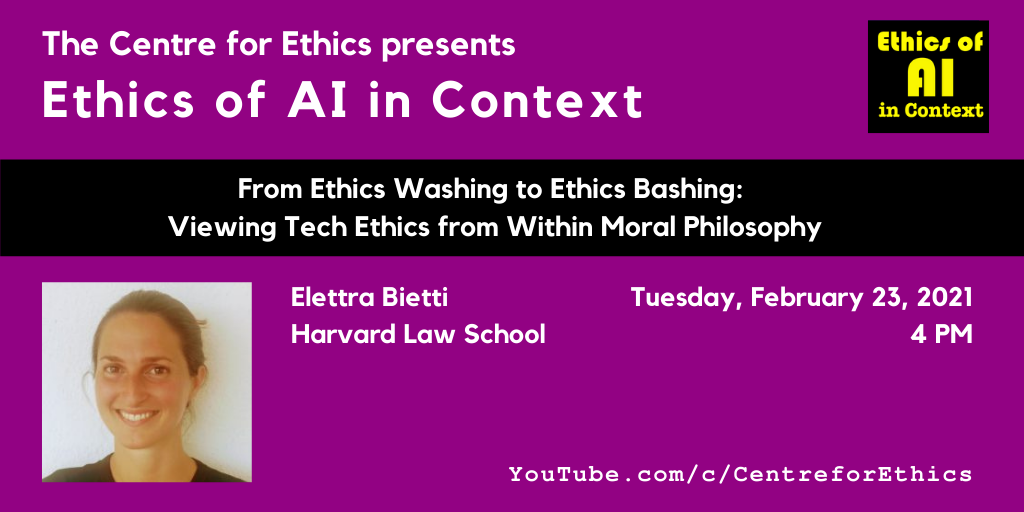 From Ethics Washing to Ethics Bashing: Viewing Tech Ethics from Within Moral Philosophy
From Ethics Washing to Ethics Bashing: Viewing Tech Ethics from Within Moral PhilosophyThe word ‘ethics’ is overused in technology policy circles. Weaponized in support of deregulation, self-regulation or hands-off governance, “ethics” is increasingly identified with technology companies’ self-regulatory efforts and with shallow appearances of ethical behavior. So-called “ethics washing” by tech companies is on the rise, prompting criticism and scrutiny from scholars and the tech community at large. In parallel to the growth of ethics washing, its condemnation has led to a tendency to engage in “ethics bashing.” This consists in the trivialization of ethics and moral philosophy now understood as discrete tools or pre-formed social structures such as ethics boards, self-governance schemes or stakeholder groups.
The misunderstandings underlying ethics bashing are at least three-fold: (a) philosophy is understood in opposition and as alternative to law, political representation and social organizing; (b) philosophy and “ethics” are seen as a formalistic methodology, vulnerable to instrumentalization and abuse, and thus ontologically flawed; and (c) engagement in moral philosophy is downplayed and portrayed as mere “ivory tower” intellectualization of complex problems that need to be dealt with through alternative and more practical methodologies.
This talk argues that the rhetoric of ethics and morality should not be reductively instrumentalized, either by the industry in the form of “ethics washing,” or by scholars and policy-makers in the form of “ethics bashing.” Grappling with the role of philosophy and ethics requires moving beyond simplification and seeing ethics as a mode of inquiry that facilitates the evaluation of competing tech policy strategies. In other words, we must resist narrow reductivism of moral philosophy as instrumentalized performance and renew our faith in its intrinsic moral value as a mode of knowledge-seeking and inquiry. Far from mandating a self-regulatory scheme or a given governance structure, moral philosophy in fact facilitates the questioning and reconsideration of any given practice, situating it within a complex web of legal, political and economic institutions. Moral philosophy indeed can shed new light on human practices by adding needed perspective, explaining the relationship between technology and other worthy goals, situating technology within the human, the social, the political.
► please register here
This is an online event. It will be live streamed on the Centre for Ethics YouTube Channel on Tuesday, February 23. Channel subscribers will receive a notification at the start of the live stream. (For other events in the series, and to subscribe, visit YouTube.com/c/CentreforEthics.)
Elettra Bietti
04:00 PM - 05:30 PM
Harvard Law School
Centre for Ethics, University of Toronto
200 Larkin - Thu, Feb 18, 2021
Race, Ethics + Power: Emerging Scholars
Senthuran Varatharajah, Where Are You From? The Ethical Dilemma of Writing Dis/placed (Race, Ethics + Power: Emerging Scholars)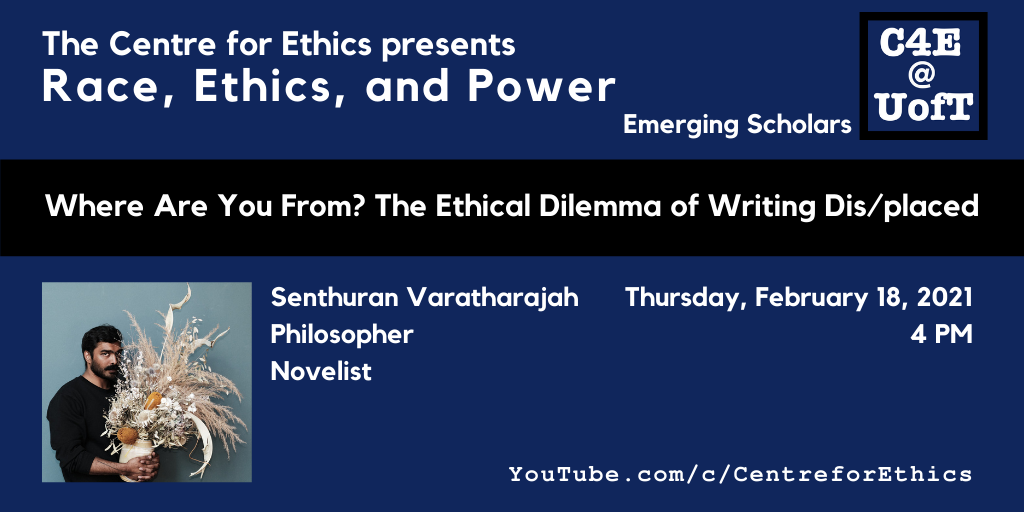
Where Are You From? The Ethical Dilemma of Writing Dis/placed
In conversation with novelist Senthuran Varatharajah, psychoanalyst Ricky Varghese explores a series of interconnected topics centering on the question: what responsibilities does a racialized writer hold through their writing? What promises cannot be made? How does trauma, remembrance, form, diasporic conditions, and theology impact living, writing, and representation for Varatharajah?
► please register here
This is an online event. It will be live streamed on the Centre for Ethics YouTube Channel on Thursday, February 18. Channel subscribers will receive a notification at the start of the live stream. (For other events in the series, and to subscribe, visit YouTube.com/c/CentreforEthics.)
Senthuran Varatharajah

Philosopher
NovelistSenthuran Varatharajah is a novelist and philosopher based in Berlin. Varatharajah studied Philosophy, Theology and Comparative Cultural and Religious Studies in Marburg, Berlin and London. His critically acclaimed first novel, Vor der Zunahme der Zeichen, was published in 2016 by S. Fischer. Varatharajah received several major awards, including the 3Sat-Preis, the Kranichsteiner Literaturförderpreis, the Bremer Literaturförderpreis, the Chamisso-Förderpreis and the Rauriser Literaturpreis. His second novel Rot (Hunger) will be published in 2021 by S. Fischer.
04:00 PM - 05:00 PM
Centre for Ethics, University of Toronto
200 Larkin - Mon, Feb 15, 2021
Ethics & Caribbean Philosophy
Kris Sealey, Creolizing the Nation: Nationalism and Caribbean Philosophy (Ethics & Caribbean Philosophy)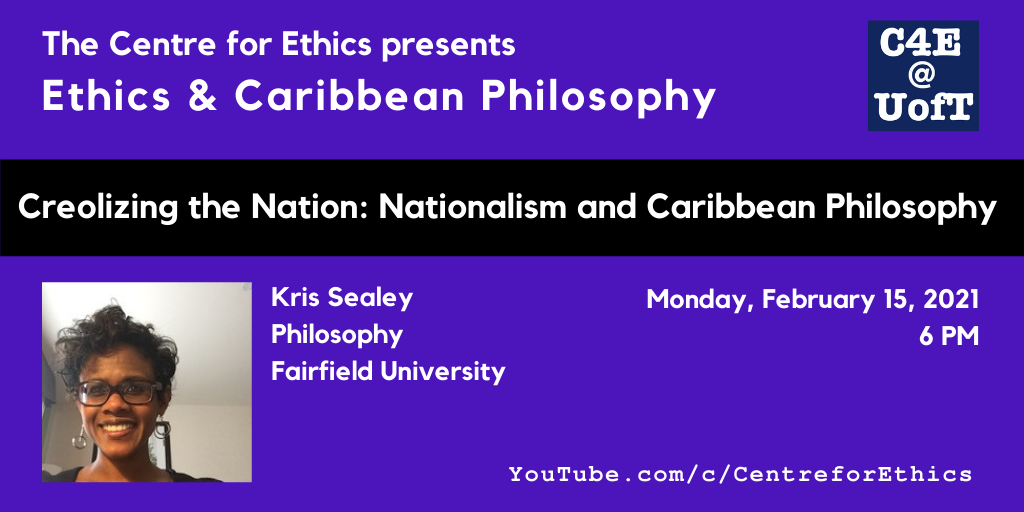
Creolizing the Nation: Nationalism and Caribbean Philosophy
Kris Sealey is Associate Professor of Philosophy at Fairfield University. Her scholarship is in the areas of Critical Philosophy of Race, Caribbean Philosophy and Decolonial Theory. In her most recent book, Creolizing the Nation, Dr. Sealey investigates how everyday practices of freedom shape both subject formation and community formation in decolonial contexts. Her book offers creolization as a conceptual tool through which such formations might be theorized and brought to bear on contemporary understandings of the nation. In her talk, we will discuss her new book.
► please register here
This is an online event. It will be live streamed on the Centre for Ethics YouTube Channel on Monday, February 15. Channel subscribers will receive a notification at the start of the live stream. (For other events in the series, and to subscribe, visit YouTube.com/c/CentreforEthics.)
Kris Sealey
06:00 PM - 07:30 PM
Philosophy
Fairfield University
Centre for Ethics, University of Toronto
200 Larkin - Thu, Feb 11, 2021
Critical Race Studies, Race, Ethics + Power
Dorothy Kim, Race, Gender, and Sexuality: Premodern Critical Intersectionality (Critical Race Studies: Interdisciplinary Perspectives)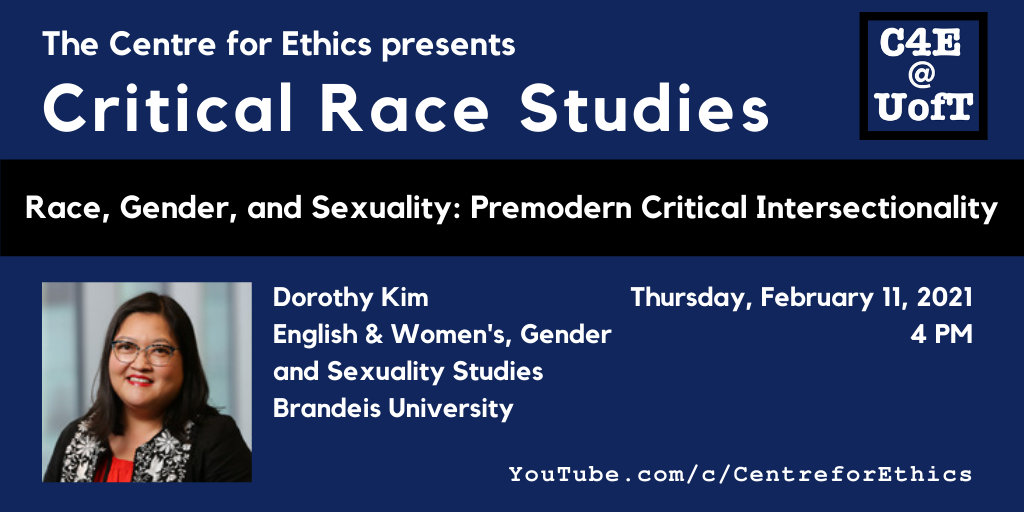
Race, Gender, and Sexuality: Premodern Critical Intersectionality
Sumi Cho, Kimberlé Crenshaw, and Leslie McCall, in their 2013 article “Toward a Field of Intersectionality Studies: Theory, Applications, and Praxis” (Cho et al. 2013) define the tripartite structure of Intersectionality Studies as “first consisting of applications of an intersectional framework or investigation of intersectional dynamics, the second consisting of discursive debates about the scope and content of intersectionality as a theoretical and methodological paradigm, and the third consisting of political interventions employing an intersectional lens” (Cho et al. 2013: 785). The first intersectional “engagement” really considers how a multi-axis, intersectional frame can help rethink specific, contextual “research and teaching projects” (Cho et al. 2013: 785). The second intersectional “engagement” addresses “theory and methodology,” and asks “whether there is an essential subject of intersectionality and, if so, whether the subject is statically situated in terms of identity, geography, or temporality or is dynamically constituted within institutions and structures that are neither temporally nor spatially circumscribed” (Cho et al. 2013: 785). This area is especially central to discussions in premodern fields because of the dynamic flux in constituting identities in different geographies and the transhistorical discussion that any work on premodern critical intersectionality must undertake. Finally, the third area addresses how intersectionality requires not just theory and methodology, but also praxis particularly in relation to politics, activism, and resistance. This talk resituates this work and then examines it in relation to the premodern archive. We demonstrate how premodern critical intersectionality should address all three areas discussed in Cho, Crenshaw, and McCall’s piece through two different medieval European case studies: St. Mary of Egypt in the Byzantine Empire and the legal documentation of Jewish women in court cases in medieval England. Of course, intersectionality is also always under construction, especially since the various identity categories we are discussing are always in flux in the premodern past. Thus, premodern critical intersectionality will also be dependent on local conditions, geographies, time periods, and group dynamics.
► please register here
This is an online event. It will be live streamed on the Centre for Ethics YouTube Channel on Thursday, February 11. Channel subscribers will receive a notification at the start of the live stream. (For other events in the series, and to subscribe, visit YouTube.com/c/CentreforEthics.)
Dorothy Kim
04:00 PM - 05:30 PM
English & Women’s, Gender and Sexuality Studies
Brandeis University
Centre for Ethics, University of Toronto
200 Larkin - Wed, Feb 10, 2021
Ethics, Aesthetics, Feminisms
Anjo-Marí Gouws, “EXTREMELY BAD MONOLOGUE IN HEAD”: Failure and Form in Anne Charlotte Robertson’s Confessionals (Ethics, Aesthetics, Feminisms)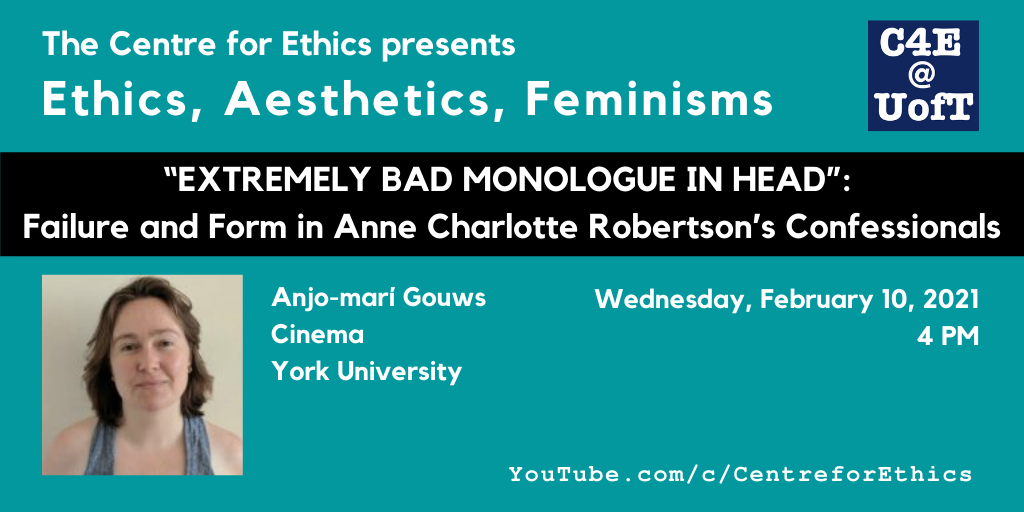
“EXTREMELY BAD MONOLOGUE IN HEAD”: Failure and Form in Anne Charlotte Robertson’s Confessionals
In therapy since the age of 17, filmmaker Anne Charlotte Robertson had, she noted, been given a range of diagnoses over the course of her life: “adult life-crisis adjustment, anxiety, borderline psychotic, manic-depressive, obsessive.” Little documentation survives of these diagnoses; from what does survive, it seems that the diagnoses most consistently made were that of bipolar depression, and of schizoaffective disorder. Her magnum opus Five Year Diary (1981-1998), a multi-modal diary project that includes a forty-hour long Super 8-diary film, at different instances both facilitated her obsessive states of delusion and became a tool for pushing back against the nonsensical. In this talk I am interested in how Robertson employed particular formal devices to make sense of her illness to herself, but also, in an expanded manner, to make sense of her illness to others. She did so through her use of the close-up, in a register of confessional sequences that proliferate throughout the latter part of the film; and through an incorporation of the failure of her apparatus into a larger conversation about the failure of her body. Throughout this analysis I position Robertson’s interventions against the backdrop of the larger history of women’s psychiatric profiling and its capture on camera.
► please register here
This is an online event. It will be live streamed on the Centre for Ethics YouTube Channel on Wednesday, February 10. Channel subscribers will receive a notification at the start of the live stream. (For other events in the series, and to subscribe, visit YouTube.com/c/CentreforEthics.)

Dr Anjo-marí Gouws is a SSHRC postdoctoral fellow at the Department of Cinema and Media Arts at York University. She is working on a monograph titled Recording the Work of a World: Anne Charlotte Robertson and the Domestication of Cinema.
04:00 PM - 05:30 PM
Centre for Ethics, University of Toronto
200 Larkin - Wed, Feb 10, 2021
Ethics at Noon
Miriam Hird-Younger, The Productivity of Mistrust: The Ethics of Development Partnerships in Ghana (Ethics@Noon-ish)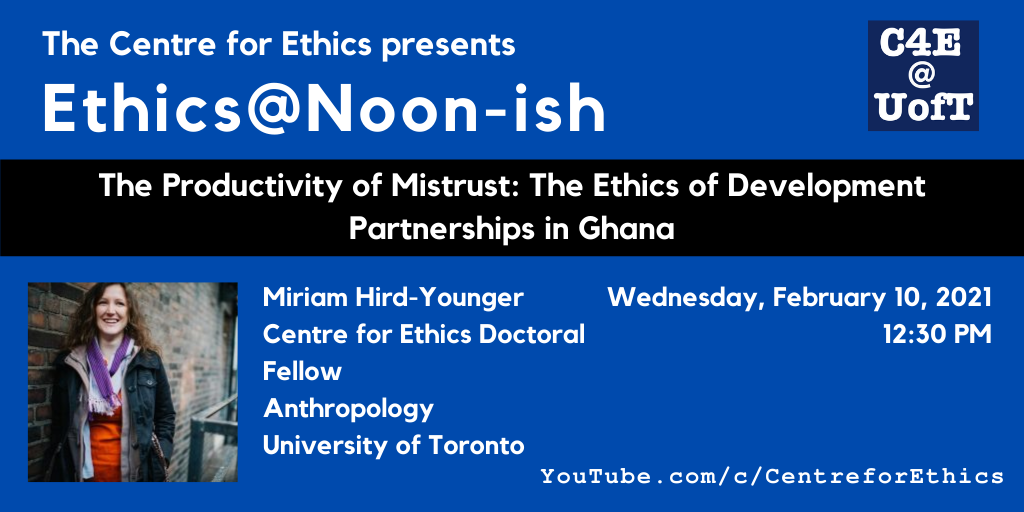
The Productivity of Mistrust: The Ethics of Development Partnerships in Ghana
Trust has been a central tenet of foreign aid for decades, resting on the notion that trust-building will foster the right kind of social relations for development. Expectations on the need to build trust are associated with requirements to work through partnerships with government and private companies for Non-Governmental Organizations (NGOs) working on the Sustainable Development Goals (SDGs) in Ghana. This presentation explores how Ghanaian NGOs experience the growing expectation that they work through an ethics of trust and the ways that they affirm, negotiate, and contest collaborations. This research draws on data collected during fifteen months of participant observation and in-depth interviews with national NGOs in an emerging and prominent network on the SDGs. By moving away from approaching trust as a disinterested truism and moral “good,” I identify the counterintuitive ways that mistrust is often an important ethical stance for NGO leaders in the partnerships I studied. Specifically, practices of mistrust are productive for the credibility and legitimacy of NGO-government partnerships. I illustrate how NGO leaders consider eating an “ethical thing” and that when they refuse to eat food at government events, they are publicly demonstrating an independence from government through a practice of mistrust. The perceived “uncompromised” position of NGOS is critical to the successful recognition of the NGO-government partnership by global development agencies. Thus, I open up to empirical study and theoretical consideration the productive potentiality of mistrust and the counterintuitive ways that mistrust can actually be required for a successful partnership.
► please register here
This is an online event. It will be live streamed on the Centre for Ethics YouTube Channel on Wednesday, February 10. Channel subscribers will receive a notification at the start of the live stream. (For other events in the series, and to subscribe, visit YouTube.com/c/CentreforEthics.)
Miriam Hird-Younger
12:30 PM - 01:45 PM
Centre for Ethics Doctoral Fellow
Anthropology
University of Toronto
Centre for Ethics, University of Toronto
200 Larkin - Tue, Feb 9, 2021
Ethics of AI in Context, Race, Ethics + Power
Devin Guillory, Combatting Anti-Blackness in the AI Community (The Ethics of AI in Context)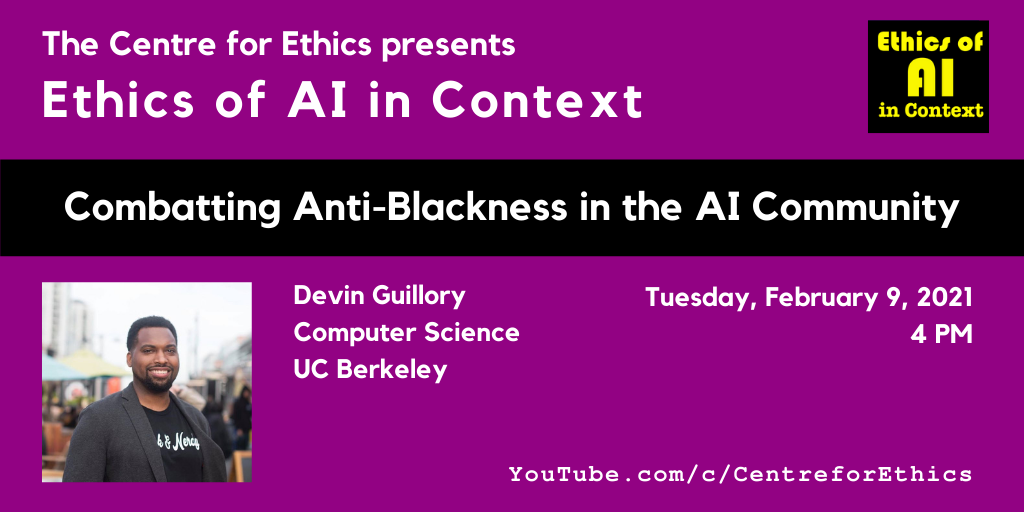
Combatting Anti-Blackness in the AI Community
The creation of Artificial Intelligence technologies is a communal act. As such, which ideas, people, and technologies are developed are deeply rooted in societal structures that are rarely questioned or thoroughly examined by AI researchers. This talk will focus on mechanisms within the AI community that perpetuate or amplify Anti-Blackness, both within our community and our greater societal structures. From research agendas and funding sources to collaborations and job opportunities, there are countless places where inequality manifest within our community. In addition to describing where and how Anti-Blackness occurs this talk will share lessons learned from community organizing within the AI community and describe some immediate steps that can be taken to build a more just community.
► please register here
This is an online event. It will be live streamed on the Centre for Ethics YouTube Channel on Tuesday, February 9. Channel subscribers will receive a notification at the start of the live stream. (For other events in the series, and to subscribe, visit YouTube.com/c/CentreforEthics.)
Devin Guillory
04:00 PM - 05:30 PM
Computer Science
UC Berkeley
Centre for Ethics, University of Toronto
200 Larkin - Fri, Feb 5, 2021
Race, Ethics + Power: Emerging Scholars
Ola Mohammed, The Black Nowhere: The Social and Cultural Politics of Listening to Black Canada[s] (Race, Ethics + Power: Emerging Scholars)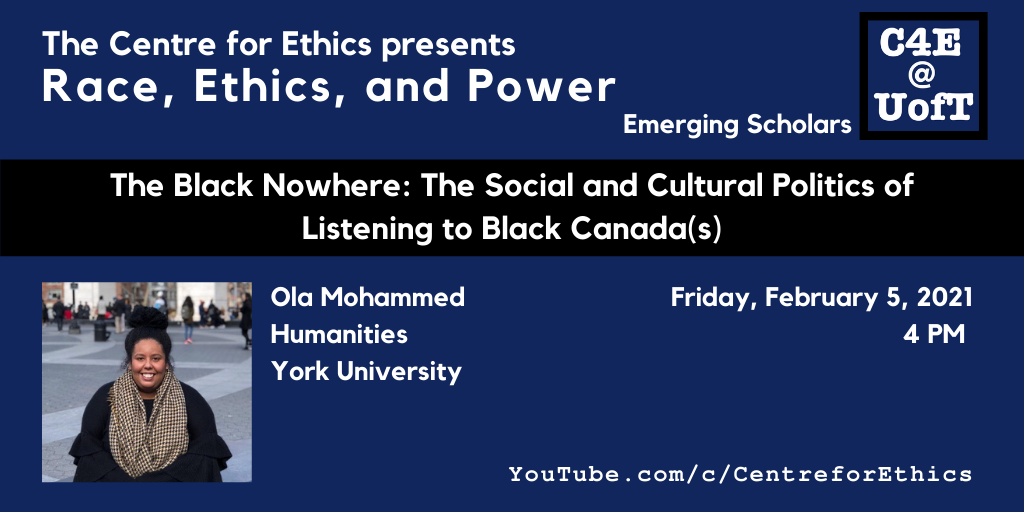
The Black Nowhere: The Social and Cultural Politics of Listening to Black Canada(s)
In “Black Like Who” cultural theorist Rinaldo Walcott suggests “settler colonies can be characterized by their struggles over race and space [and that] Canada is no exception” (43).
More specifically these troublings with race become particularly clear in discussions of the nations’ contentious relation with Blackness. When it comes to Blackness in Canada national historical narratives tend to “render these racial geographies invisible, and many people continue to believe that any black presence in Canada is a recent and urban one spawned by black Caribbean, and now continental African, migration” (Walcott, 43).
As such, my work explores how listening, despite often being deemed an unmediated physical act, is “an interpretive socially constructed practice conditioned by historically contingent and culturally specific value systems riven with power relations” (Stoever 14). I ask, what disruptive possibilities exist via sound-thinking to our most conventional ways of thinking about and engaging in historical, social and political reflection of Blackness and anti-Black racism in Canada? How can listening transform the way we think about spatiality and power by tuning into “Black absented presences” (McKittrick 22), or what I call “The Black Nowhere”—which I define as a generative space that demands a nuanced understanding of black being in Canada—in order to consider how sound and forms of hearing play a crucial role in producing and policing spaces.
Ola Mohammed (she/her) is an Assistant Professor of Black Popular Culture at York University, Toronto, Canada. Ola specializes in interdisciplinary research exploring Black cultural production, Black social life and Black being as sites of possibility. Her current project, The Black Nowhere: The Social and Cultural Politics of Listening to Black Canada(s), examines the sonic dimension of Black social life and anti-Blackness in Canada. Ola has an extensive background in student activism, and is a founding member of the York Black Graduate Students’ Collective which advocated and worked to implement Black Studies/ Black Canadian Studies at York at the undergraduate and graduate level. Some of her key sites of research interests include: Black Popular Music, Black Studies, Sound Studies, Diaspora Studies, Performance Theory and Digital Culture.
► please register here
This is an online event. It will be live streamed on the Centre for Ethics YouTube Channel on Friday, February 5. Channel subscribers will receive a notification at the start of the live stream. (For other events in the series, and to subscribe, visit YouTube.com/c/CentreforEthics.)
 Ola Mohammed
Ola Mohammed
Humanities
York University
04:00 PM - 05:00 PM
Centre for Ethics, University of Toronto
200 Larkin - Thu, Feb 4, 2021
Critical Race Studies, Race, Ethics + Power
Yolonda Wilson, Death, Pandemic, and Intersectionality: What the Failures in an End-of-Life Case Can Teach About Structural Justice and COVID-19 (Critical Race Studies: Interdisciplinary Perspectives)
Death, Pandemic, and Intersectionality: What the Failures in an End-of-Life Case Can Teach About Structural Justice and COVID-19
The case of Jahi McMath came to national prominence in December 2013 after McMath suffered brain death following a tonsillectomy at Children’s Hospital and Research Center in Oakland, CA. That month, the state of California issued a death certificate for McMath. On June 22, 2018, the state of New Jersey also issued a death certificate for McMath.
Public sentiment about the case not only revealed fault lines along race and religion but also about what it means to die. Implicit in how the McMath case played out, both with various institutional decision-makers and in the court of public opinion, were sensibilities about the relative value of life when viewed through the lens of race, class, and disability.
Similarly, the current COVID-19 pandemic has also revealed differing value placed on some lives due to race, class, and disability. Public opinion regarding mask mandates, ventilator allocation guidelines, and vaccine distribution plans have all, at various points, reinforced a hierarchy of whose lives mater most. Governmental and other institutional responses have also reinforced this hierarchy.
Both the McMath case and the current pandemic highlight the importance of understanding how the conceptual framework of intersectionality could guide more just decision-making in individual cases and when creating institutional and government policies to address large-scale health crises.
► please register here
This is an online event. It will be live streamed on the Centre for Ethics YouTube Channel on Thursday, February 4. Channel subscribers will receive a notification at the start of the live stream. (For other events in the series, and to subscribe, visit YouTube.com/c/CentreforEthics.)
04:00 PM - 05:30 PM Yolonda Wilson
Yolonda Wilson
Health Care Ethics
Saint Louis University
Centre for Ethics, University of Toronto
200 Larkin - Fri, Jan 29, 2021
Author Meets Critics, Ethics of AI in Context, Ethics in the City
Smart Cities in Canada: Digital Dreams, Corporate Designs (Author Meets Critics)
Smart Cities in Canada: Digital Dreams, Corporate Designs (Mariana Valverde & Alexandra Flynn eds., 2020)
Mariana Valverde
Centre for Criminology & Sociolegal Studies
University of TorontoAlexandra Flynn
Peter A. Allard School of Law
University of British Columbia
Commentators:
Beth Coleman (Institute of Communication, Culture, Information and Technology & Faculty of Information, University of Toronto)
Renee Sieber (Geography, McGill University)
David Murakami Wood (Sociology, Queen’s University)
Moderator:
Jamie Duncan (Centre for Criminology & Sociolegal Studies, University of Toronto)“Smart cities” use surveillance, big data processing and interactive technologies to reshape urban life. Transit riders can see the bus coming on a map on their phones. Cities can measure and analyze the garbage collected from every household. Businesses can track individuals’ movements and precisely target advertisements.
Google’s failed Sidewalk Labs proposal in Toronto, which drew sharp criticism over surveillance and privacy concerns, is just one of the many smart city projects which have been proposed or are underway in Canada. Iqaluit, Edmonton, Guelph, Montreal, Toronto and other cities and towns are all grappling with how to use these technologies. Some cities have quickly partnered with digital giants like Uber, Bell and IBM. Others have kept their distance. Big tech companies are hard at work recruiting customers and shaping – sometimes making – public policy on data collection and privacy.
Smart Cities for Canada: Promise and Perils is the first book on smart cities in Canada. In this collection, experts from across the country investigate what this new approach means for the problems cities face, and expose the larger issues about urban planning and democracy raised by smart city technology.
► please register here
This is an online event. It will be live streamed on the Centre for Ethics YouTube Channel on Friday, January 29. Channel subscribers will receive a notification at the start of the live stream. (For other events in the series, and to subscribe, visit YouTube.com/c/CentreforEthics.)
03:00 PM - 05:00 PM
Centre for Ethics, University of Toronto
Rm 200, Larkin Building - Thu, Jan 28, 2021
Race, Ethics + Power: Emerging Scholars
Nisrine Rahal, A Real Battlefield for Emancipation: The Hamburg Kindergarten Movement 1849-1852 (Race, Ethics + Power: Emerging Scholars)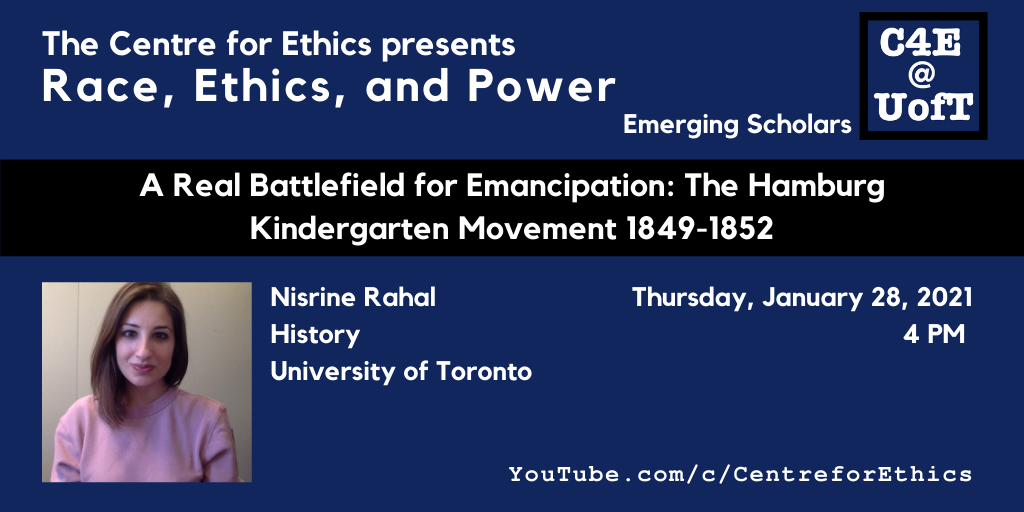 A Real Battlefield for Emancipation: The Hamburg Kindergarten Movement 1849-1852
A Real Battlefield for Emancipation: The Hamburg Kindergarten Movement 1849-1852From 1849 to 1852 a network of kindergartens were opened in the German port city of Hamburg. These kindergartens were funded and supported by the dissenting German-Catholic Congregation (established in the city in 1847), the Women’s Association to Support the German-Catholics, the Social Association for the Reconciliation of Confessional Differences, and the Women’s Association to Support Poor Welfare. These associations and the dissenting congregation provided the space for a new women’s activism that was centered on essentialized feminine characteristics such as maternal love and care. Love for these associations united women across religious lines and was essential for the project of social and cultural reform not only in the city-state but also for humanity. This love needed to be cultivated and practiced in educational and welfare institutions for the benefit of all of society. The kindergarten, these activists believed, was the ideal location for this love and care. My presentation will focus on unpacking these associations and their support for the kindergarten in Hamburg. It will shed light on the new language of rights, women’s activism, and religious freedom that characterized the movement for the kindergarten during the revolutionary 1840s and early 1850s in German-Speaking Europe.
► please register here
This is an online event. It will be live streamed on the Centre for Ethics YouTube Channel on Thursday, January 28. Channel subscribers will receive a notification at the start of the live stream. (For other events in the series, and to subscribe, visit YouTube.com/c/CentreforEthics.)
Nisrine Rahal is a doctoral candidate at the Department of History at the University of Toronto. Her dissertation, A Garden of Children and the Education of Citizens: The German Kindergarten Movement from 1837 to 1880 examines the early children’s education institution as a social reformist movement tied to the revolutionary 1840s. Her dissertation project follows the movement as a way to examine histories of social reform, gender, liberalism, and state power. Between June 2017 and March 2018, she was a doctoral fellow at the Leibniz Institute of European History. She also held a Leo Baeck Fellowship between October 2015 and October 2016. Her project received support from the Central European History Society, the Stiftung Preußischer Kulturbesitz, and the Bibliothek für Bildungsgeschichtliche Forschung (BBF) des Deutschen Instituts für Internationale Pädagogische Forschung (DIPF).
 04:00 PM - 05:00 PM
04:00 PM - 05:00 PMNisrine Rahal
History
University of Toronto
Centre for Ethics, University of Toronto
200 Larkin - Wed, Jan 27, 2021
Ethics of AI in Context: Emerging Scholars
Kamilah Ebrahim, The Limits of Anti-Trust Regulation: Reorienting Towards Considerations of Epistemic Power (Ethics of AI in Context: Emerging Scholars)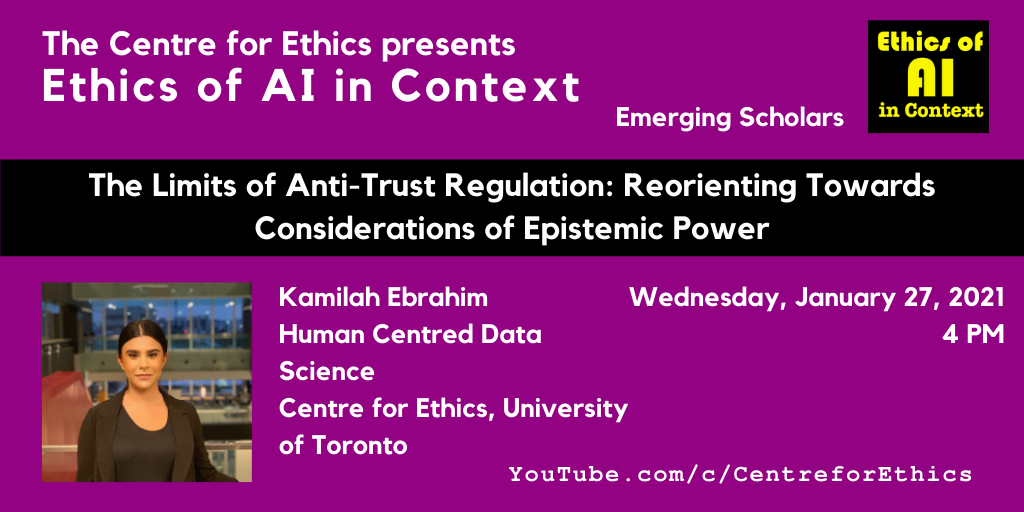
The Limits of Anti-Trust Regulation: Reorienting Towards Considerations of Epistemic Power
The current monopoly over data production, collection and information centralizes epistemic power and the capacity to accumulate economic capital through data. At the same time this process dispossesses marginalized and racialized communities from the data they are producing. The result is a dynamic that mirrors the dispossession created through colonialism in a new form of “techno-imperialism”. Current debates surrounding monopoly structures in technology tend to focus on the economic effects rather than the epistemic consequences, this talk will refocus this conversation and consider the pros and cons of anti-trust policy solutions currently being considered in Canada.
► please register here
This is an online event. It will be live streamed on the Centre for Ethics YouTube Channel on Wednesday, January 27. Channel subscribers will receive a notification at the start of the live stream. (For other events in the series, and to subscribe, visit YouTube.com/c/CentreforEthics.)
Kamilah Ebrahim received a B.A. in Economics from the University of Waterloo in 2019 and is currently pursuing a Masters of Information in Human Centred Data Science at the University of Toronto. Kamilah is a 2020-21 Graduate Fellow at the University of Toronto Centre for Ethics focusing on the intersection between race, economics and data monopolies in Canada. Prior to joining the University of Toronto she held roles at the United Nation Economic and Social Commission for Asia and the Pacific (UN ESCAP), as well as the Canadian federal government.
04:00 PM - 05:00 PM
Centre for Ethics, University of Toronto
200 Larkin - Wed, Jan 27, 2021
Ethics at Noon
Juliette Ferry-Danini, What Is the Problem with the Opacity of Artificial Intelligence in Medicine? (Ethics@Noon-ish)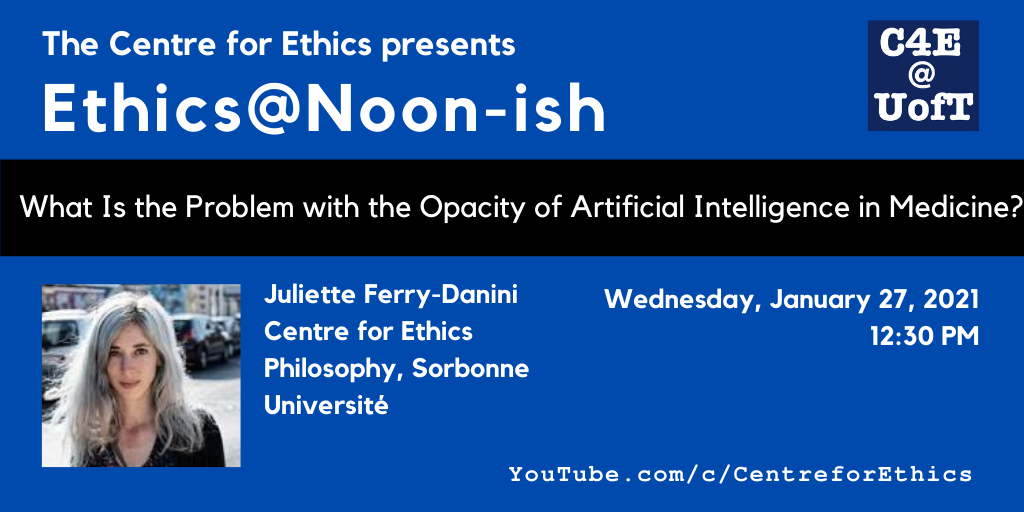
What Is the Problem with the Opacity of Artificial Intelligence in Medicine?
Artificial intelligence has been met with great enthusiasm by the scientific community. However, philosophers and especially ethicists have voiced some concerns. The concepts of “opacity” and “transparency” of algorithms have been coined with the presupposition that opacity in AI is something to avoid and conversely transparency is a goal to achieve in the field. Numerous guidelines have been published on the ethics of AI, resulting in several reviews (Jobin, Ienca, and Vayena 2019; Rothenberger, Fabian, and Arunov 2019; Hagendorff 2020). In these guidelines, transparency is routinely described as one of the key ethical principles the field of AI should follow. The concept, however, is not straightforward. It could first be defined in an epistemic way: an algorithm is transparent if and only if we understand how it works and we can explain it. Here transparency could be synonymous with “explainability.” In the case of medicine and decision-making algorithms, the main worry concerns how health professionals may be able to justify a diagnostic without being able to explain how they came to it and why (Goodman 2016). However, it could be argued that such an epistemic opacity is already constitutive of evidence-based medicine, where mechanisms are often not known and explanations of efficiency never certain (London 2019). Yet, there is at least a second meaning attached to the concepts of “transparency” or “opacity” which goes beyond the issue of explainability. In the ethics of AI’s literature, notably, the issues at stake have also been framed as how we came to the knowledge we now claim to have and more specifically, how the data have been selected to build a specific algorithm.
The aim of this talk will thus be twofold: first, to map the different meanings of the concept of “transparency” and its mirror concept “opacity” both in the ethics of AI, on the one hand, and in the philosophy of medicine and bioethics, on the other hand. Second, my goal will be to pave the way to understand in which sense – ethical and/or epistemological – opacity should be avoided both in medicine and in AI (and a fortiori in AI in medicine). What is the problem with the opacity of artificial intelligence in medicine?
► please register here
This is an online event. It will be live streamed on the Centre for Ethics YouTube Channel on Wednesday, January 27. Channel subscribers will receive a notification at the start of the live stream. (For other events in the series, and to subscribe, visit YouTube.com/c/CentreforEthics.)
Juliette Ferry-Danini
12:30 PM - 01:45 PM
Centre for Ethics Postdoctoral Fellow in Ethics of Artificial Intelligence
Philosophy, Sorbonne Université
Centre for Ethics, University of Toronto
200 Larkin - Tue, Jan 26, 2021
Ethics of AI in Context
Ishtiaque Ahmed, Whose Intelligence? Whose Ethics?: Ethical Pluralism and Postcolonial Computing (Ethics of AI in Context)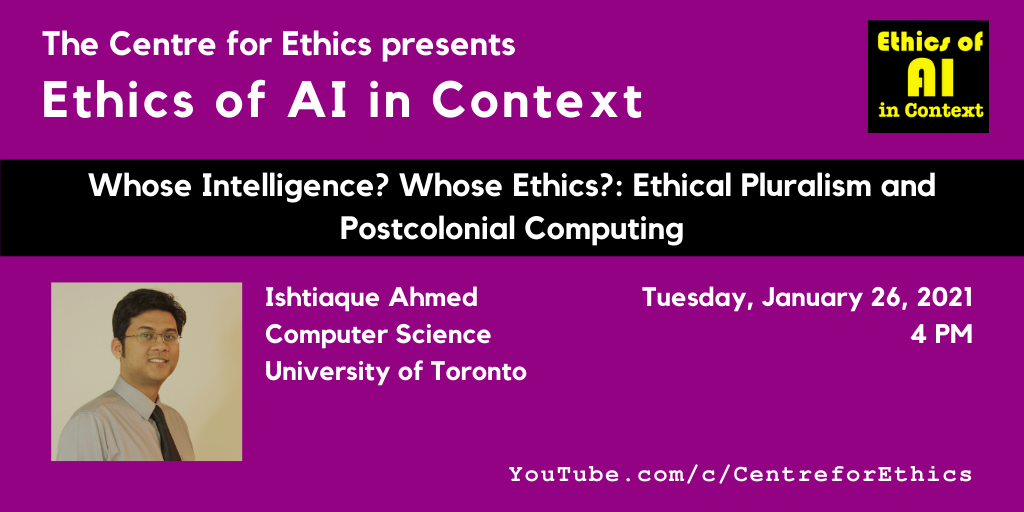
Whose Intelligence? Whose Ethics?: Ethical Pluralism and Postcolonial Computing
With the unprecedented advancement of Artificial Intelligence (AI) in the last decade, several ethical concerns AI technologies have also emerged. Researchers today are concerned about bias, discrimination, surveillance, and privacy breaching in the use of AI technologies, just to mention a few. However, most of this discourse around “Ethics in AI” has become centered on western societies, and the concerns are emerging from and getting shaped by ethical values that more common in the West than in other parts of the world. To this end, my research explores this ethical concerns of AI in the context of the Global South, especially in the Indian Subcontinent. Based on my decade-long work in Bangladesh and India, I present in this talk, how data-driven AI technologies are challenging local faith, familial values, customs, and traditions, and imposing scientific rationality through various postcolonial computing practices. I further explore how a novel kind of intelligence can be imagined by incorporating local values and community participation.
► please register here
This is an online event. It will be live streamed on the Centre for Ethics YouTube Channel on Tuesday, January 26. Channel subscribers will receive a notification at the start of the live stream. (For other events in the series, and to subscribe, visit YouTube.com/c/CentreforEthics.)
04:00 PM - 05:30 PM Ishtiaque Ahmed
Ishtiaque Ahmed
Computer Science
University of Toronto
Centre for Ethics, University of Toronto
200 Larkin - Mon, Jan 25, 2021
Perspectives on Ethics
Loubna El Amine, Status, Hierarchy, and the State: Women in the Confucian Classics (Perspectives on Ethics)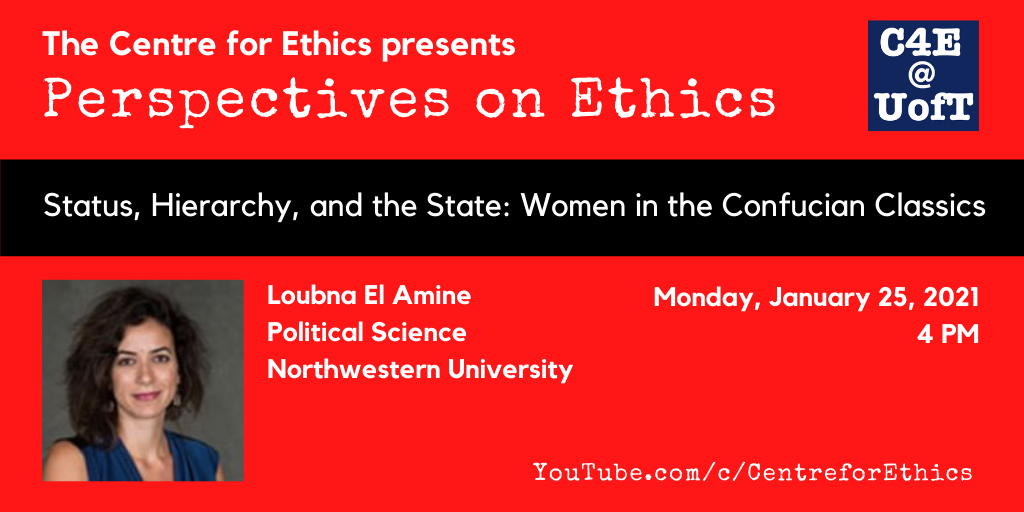
Status, Hierarchy, and the State: Women in the Confucian Classics
Early Confucian philosophical texts, like the Analects and the Mencius, rarely mention women but the other ancient Classics, including the Rituals and the Annals, a chronicle of events from the city of Lu, are full of descriptions and ancedotes about them. In this talk, I analyze these descriptions and ancedotes, arguing that the place of women in social and political life, and the distinction between men and women, were not key issues of concern in those Classics dating from the Warring States period (479-221 BCE)—a time when the boundaries of the political community were only loosely defined. It is only after the rise of the Han Dynasty in the 3rd century BCE that ideas about what women as a general category should or should not do, in contradistinction with men, start significantly appearing in the Classics. Gender can be viewed as part of a larger attempt by the Han to fashion a new centralized, and strongly defined, political entity. I also suggest that themes that structure how women are presented in early Greek writings, particularly in Greek Classical tragedies, are not nearly as prominent in the Chinese Classics: these themes are war and military prowess, pregnancy and birth, and, following from the previous two, the grieving mother. Finally, I return to the Confucian philosophical texts and attempt to make sense of the absence of women in them.
► please register here
This is an online event. It will be live streamed on the Centre for Ethics YouTube Channel on Monday, January 25. Channel subscribers will receive a notification at the start of the live stream. (For other events in the series, and to subscribe, visit YouTube.com/c/CentreforEthics.)
04:00 PM - 05:30 PM Loubna El Amine
Loubna El Amine
Political Science
Northwestern University
Centre for Ethics, University of Toronto
200 Larkin - Wed, Jan 20, 2021
Ethics, Aesthetics, Feminisms
Joy James, Captive Maternal Love and War Stories (Ethics, Aesthetics, Feminisms)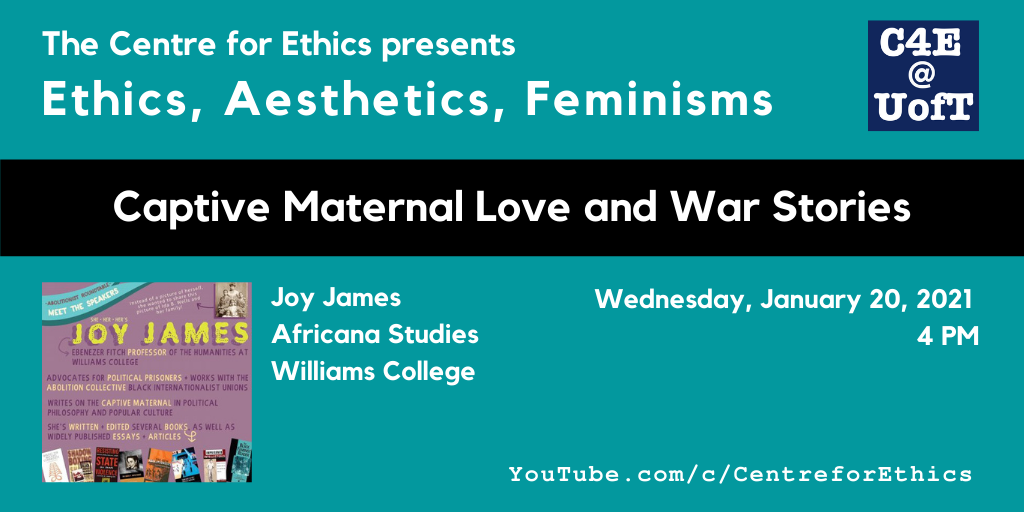
Captive Maternal Love and War Stories
Captive Maternals are nongendered providers within black communities forged under the legacies of enslavement/colonialism and material/existential extractions. Moving beyond the limits of hegemonic (black) feminism/intersectionality, I explore the Captive Maternal and political ideology to analyze nonelite/radical black actors who labor as: conflicted/contradictory caretakers; movement activists; maroons; war resisters. The concept of the Captive Maternal is outlined in “The Womb of Western Theory”, which can be found here.
► please register here
This is an online event. It will be live streamed on the Centre for Ethics YouTube Channel on Wednesday, January 20. Channel subscribers will receive a notification at the start of the live stream. (For other events in the series, and to subscribe, visit YouTube.com/c/CentreforEthics.)
04:00 PM - 05:30 PM Joy James
Joy James
Africana Studies
Williams College
Centre for Ethics, University of Toronto
200 Larkin - Mon, Jan 18, 2021
Ethics & Caribbean Philosophy
Zifeng Liu, Claudia Jones and China (Ethics & Caribbean Philosophy)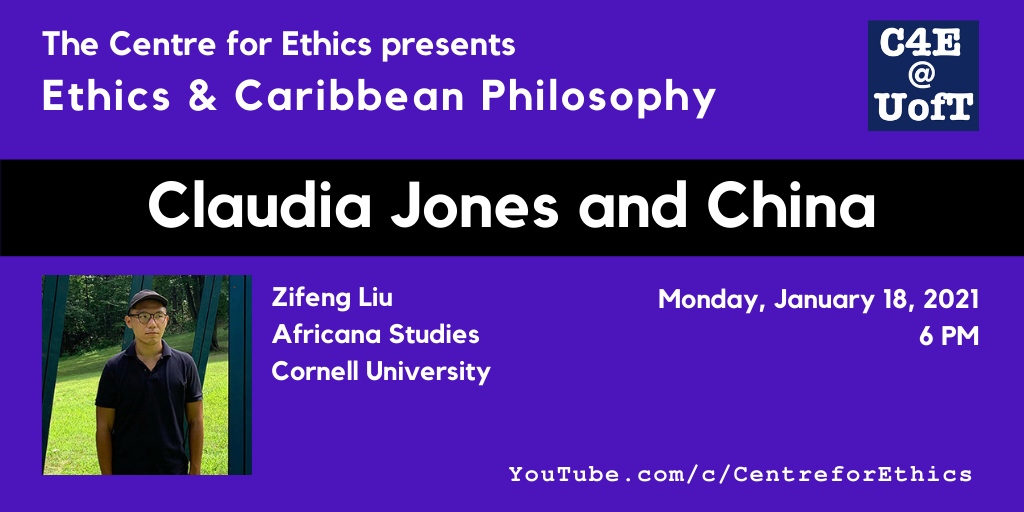
Claudia Jones and China
Zifeng Liu is a doctoral candidate in Africana Studies at Cornell University. He studies Black transnationalism/internationalism, Black feminism, and anticolonial thought. His dissertation, entitled “Redrawing the Balance of Power: Black Left Feminists, Mao’s China, and the Making of an Afro-Asian Political Imaginary,” examines the feminist interchanges and collaborations between the African American freedom struggle and the Chinese socialist construction of modernity from 1949 through 1978. His essays and reviews in English and Chinese on African American culture, politics, and history have been published and forthcoming in the Journal of Intersectionality, Journal of African American History, Journal of Beihang University, The Paper, Initium Media, and SINA News.
► please register here
This is an online event. It will be live streamed on the Centre for Ethics YouTube Channel on Monday, January 18. Channel subscribers will receive a notification at the start of the live stream. (For other events in the series, and to subscribe, visit YouTube.com/c/CentreforEthics.)
Zifeng Liu
06:00 PM - 07:30 PM
Africana Studies
Cornell University
Centre for Ethics, University of Toronto
200 Larkin - Tue, Jan 12, 2021
Ethics of AI in Context
Robert Soden, Responsible AI in Disaster Risk Management: A Community of Practice Perspective (Ethics of AI in Context)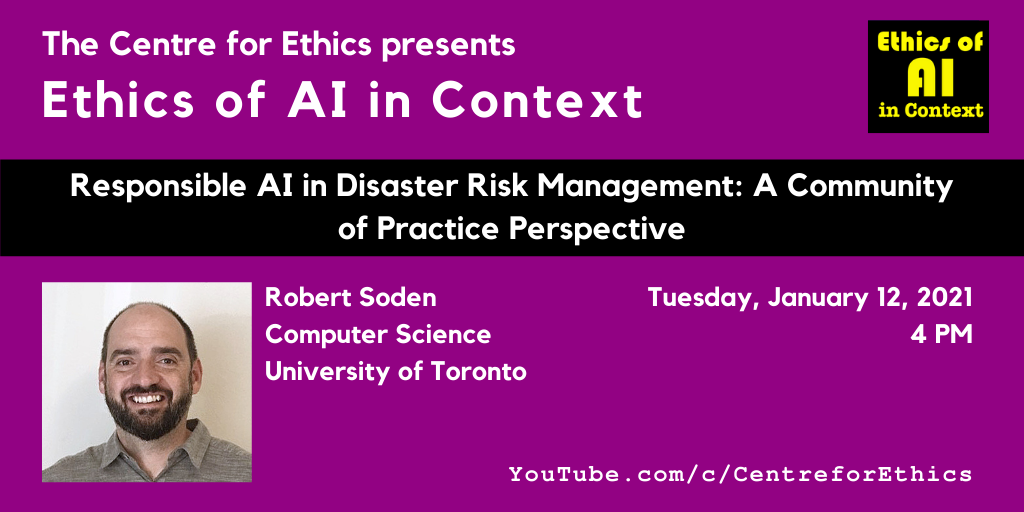
Responsible AI in Disaster Risk Management: A Community of Practice Perspective
The use of AI, and in particular machine learning, is increasingly being taken up as part of efforts to better understand and mitigate the potential impacts of disasters like earthquakes or floods. Experts and practitioners believe that these tools can help support societal efforts to inform decisions ranging from emergency preparedness to infrastructure retrofitting and the design of disaster insurance products. Despite widespread concerns over the role of AI tools in domains such as criminal justice, banking, and healthcare, little guidance is available for experts working on the tools in the area of disasters. This talk will report on an ongoing effort by organizations including the Red Cross, the World Bank, and several academic institutions to examine the potential for negative consequences of AI in the field of disaster management.
► please register here
This is an online event. It will be live streamed on the Centre for Ethics YouTube Channel on Tuesday, January 12. Channel subscribers will receive a notification at the start of the live stream. (For other events in the series, and to subscribe, visit YouTube.com/c/CentreforEthics.)
04:00 PM - 05:30 PM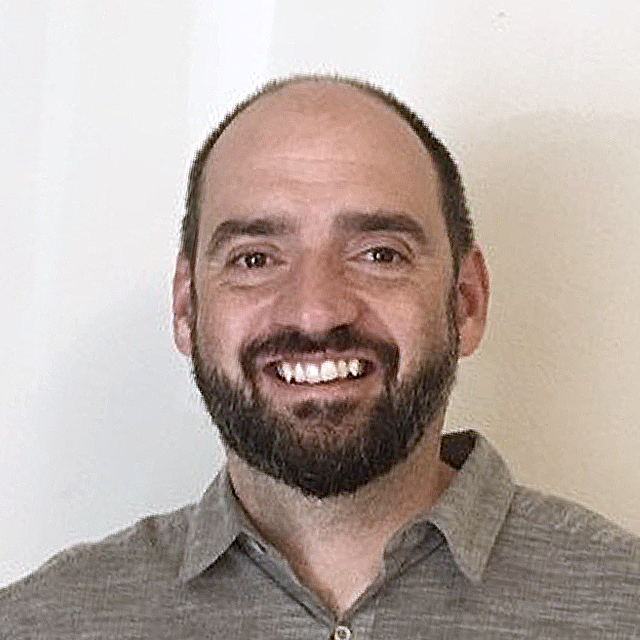 Robert Soden
Robert Soden
Computer Science
University of Toronto
Centre for Ethics, University of Toronto
200 Larkin - Thu, Dec 10, 2020
Race, Ethics + Power: Emerging Scholars
Laura Kwak, The Seat, the Table, the Terms of Incorporation: a Critical Discussion on Representation and the Roles of Racialized Political Elites (Race, Ethics + Power: Emerging Scholars)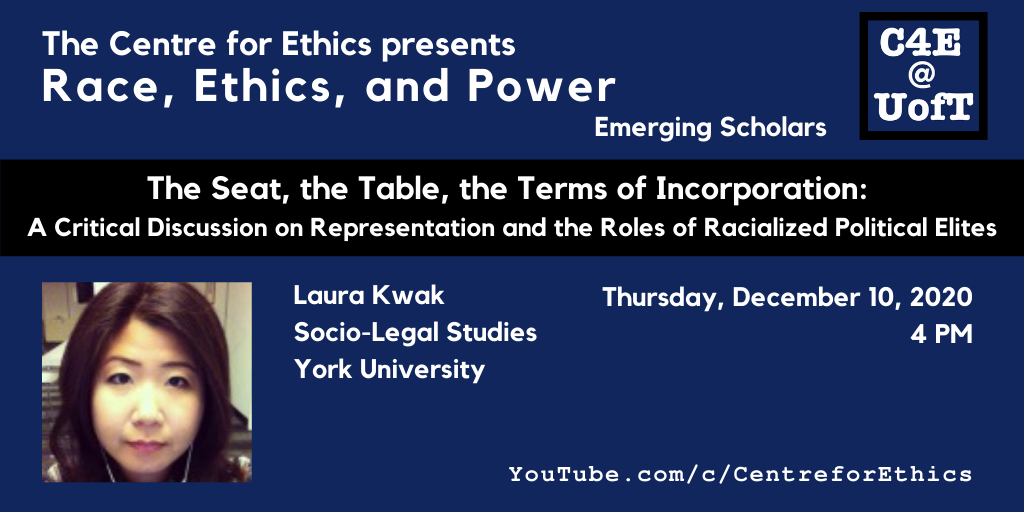
The Seat, the Table, the Terms of Incorporation: a Critical Discussion on Representation and the Roles of Racialized Political Elites
The inclusion of racialized politicians has become a key feature of liberal democracies. Indeed, the political inclusion of previously excluded racialized populations matters. This presentation is concerned with how it matters. The dominant presumption is that the presence of racialized parliamentarians guarantees that debates important to racialized groups will move in more socially just directions. However, recent scholarship in critical race socio-legal studies have suggested that the incorporation of select racialized elites has not substantively challenged dominant political discourses and/or policies. Rather, paradoxically their inclusion can foreclose possibilities for substantive diversity and justice. If we understand racial governmentality as flexible, this research is concerned with questions that will better meet the needs of racial justice in a world where post-racial discourses persist alongside explicit racial violence.
► please register here
This is an online event. It will be live streamed on the Centre for Ethics YouTube Channel on Thursday, December 10. Channel subscribers will receive a notification at the start of the live stream. (For other events in the series, and to subscribe, visit YouTube.com/c/CentreforEthics.)
04:00 PM - 05:00 PM Laura Kwak is Assistant Professor in the Law and Society Program at York University. Her research has been published in the Oñati Socio-Legal Series, Ethnic and Racial Studies, the Canadian Journal of Women and the Law, and Amerasia Journal. She is developing her first monograph “Playing by the Racial Rule(s): Asian Conservatives in Canada’s Federal Legislature,” which challenges the supposed incommensurability of racialized identity and Conservative politics. Her SSHRC Insight Development Grant (2020-2022) funded research project “Race and Representation in Canada’s Parliament, 2006-2019” will examine the contributions of racialized MPs across Canada’s three main federal political parties.
Laura Kwak is Assistant Professor in the Law and Society Program at York University. Her research has been published in the Oñati Socio-Legal Series, Ethnic and Racial Studies, the Canadian Journal of Women and the Law, and Amerasia Journal. She is developing her first monograph “Playing by the Racial Rule(s): Asian Conservatives in Canada’s Federal Legislature,” which challenges the supposed incommensurability of racialized identity and Conservative politics. Her SSHRC Insight Development Grant (2020-2022) funded research project “Race and Representation in Canada’s Parliament, 2006-2019” will examine the contributions of racialized MPs across Canada’s three main federal political parties.
Centre for Ethics, University of Toronto
200 Larkin - Wed, Dec 9, 2020
Ethics of AI in Context: Emerging Scholars
Muriam Fancy, Governance of Ethical AI: Methodologies to Procure Low Risk AI for Public Use (Ethics of AI in Context: Emerging Scholars)
Governance of Ethical AI: Methodologies to Procure Low Risk AI for Public Use
AI is not without bias; our understanding of the risks it can pose is often unknown. However, this does not stop governments from procuring and deploying AI systems for the public. This talk will present case examples of how the government procures AI systems. Furthermore, the presentation will follow with methodologies of how to ensure that governments can deploy ethical and safe AI systems. The role of the public, government, and private stakeholders are all different yet necessary to reduce the risk caused when applying AI on a mass scale. The presentation will conclude by recommending policy solutions to avert the consequences of deploying risky AI systems.
Muriam Fancy is completing her final year of her Masters in Global Affairs with a specialization in innovation. Her work focuses are on global technology policy and designing ethical emerging technologies. She is an AI ethics researcher at the Montreal AI Ethics Institute. As well, she is the Research Coordinator at the AI + Society Initiative at uOttawa Centre for Law, Technology and Society.
► please register here
This is an online event. It will be live streamed on the Centre for Ethics YouTube Channel on Wednesday, December 9. Channel subscribers will receive a notification at the start of the live stream. (For other events in the series, and to subscribe, visit YouTube.com/c/CentreforEthics.)
Muriam Fancy
04:00 PM - 05:30 PM
AI Ethics Researcher
Montreal Ethics AI Institute
uOttawa
Centre for Ethics, University of Toronto
200 Larkin - Thu, Dec 3, 2020
Race, Ethics + Power: Emerging Scholars
Sarah Stefana Smith, Surface, Abstraction and Skin in Black Contemporary Art (Race, Ethics + Power: Emerging Scholars)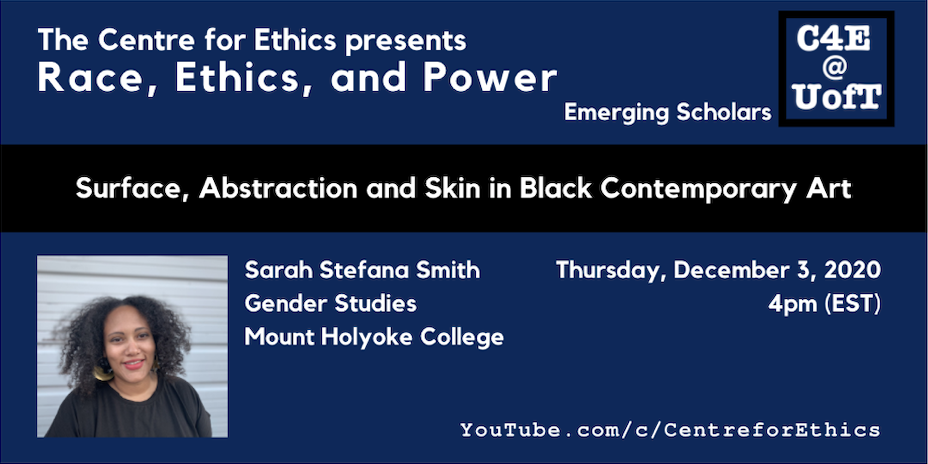 Surface, Abstraction and Skin in Black Contemporary Art
Surface, Abstraction and Skin in Black Contemporary ArtDiscussions of surface typical occur in the context of a binary—not being a deep articulation of a thing. Yet surface as a method of susceptibility is able to take seriously the “need for the Other” and one that orients the surface – rather than some lurking depth – as a significant site to engage meaning (Cheng 2009, 101; Best and Marcus 2009, 6). In the context of this talk, I use, surface play in order to embraces the surface as an affective and ethical stance, in opposition to a suspiciousness of what is concealed in the depths of the work. Taking a nod from Stuart Hall, play denotes a doubling of meaning. On the one hand, play suggests the impermanence of the surface itself; on the other, it pronounces the instability of the surface through strategies deployed in black aesthetics.
Thus, this talk meditates on surface play and queer potentiality in the work of artists Mickalene Thomas and Zanele Muholi. In 2014, Mickalene Thomas created the work Tête de Femme that deviated from the artists more representational work and towards abstract iterations of femme faces. Most recently, Zanele Muholi has returned to self-portraiture, in Somnyama Ngonyama: Hail the Dark Lioness utilizing the body, vernacular props and the skin as site. I look at Tête de Femme and Somnyama Ngonyama and towards surfaces at play, to negotiate a different orientation to the aesthetic.
Biography:
Sarah Stefana Smith is scholar and artist, currently holding the position of Assistant Professor of Gender Studies at Mount Holyoke College. Their research communicates between the fields of Black art and culture, queer of color critique and affect studies, performance and aesthetics. Smith’s studio practice looks towards the blur between abstraction and representation, infrastructure and materiality, space and ecology in photography, installation, and sculptural work. As a teacher Smith is interested in cross-pollination between matter and materiality and boundaries between human and species, lines of demarcation around difference—race, gender, sexuality—and how modes of difference are used to constitute and congeal belonging.
Smith was a recipient of an Art and Change Grant from the Leeway Foundation, an Ontario Arts Council Grant, and a John Pavlis Fellowship as an artist in residence at the Vermont Studio Center. Smith has published in The Black Scholar, Women & Performance, Drain Journal of Art and Culture, The Palgrave Handbook of Race and the Arts Education and in Ruptures: Anti-colonial and Anti-Racist Feminist Theorizing. Their residency experiences have included the University of Pittsburgh Creativities Project, Merriweather District AIR, 77Arts, and the Virginia Center for the Creative Arts among others. Smith has exhibited at various spaces including Waller Gallery, Arlington Art Center, DC Art Center, the Borland Project Space, and Gallery CA
► please register here
This is an online event. It will be live streamed on the Centre for Ethics YouTube Channel on Thursday, December 3. Channel subscribers will receive a notification at the start of the live stream. (For other events in the series, and to subscribe, visit YouTube.com/c/CentreforEthics.)
04:00 PM - 05:00 PM Sarah Stefana Smith
Sarah Stefana Smith
Gender Studies
Mount Holyoke College
Centre for Ethics, University of Toronto
200 Larkin - Wed, Dec 2, 2020
Ethics at Noon
Amanda Greer, Etiquette (Un)Seen: Post-WWII American Cinema and the Aesthetics of Politeness (Ethics@Noon)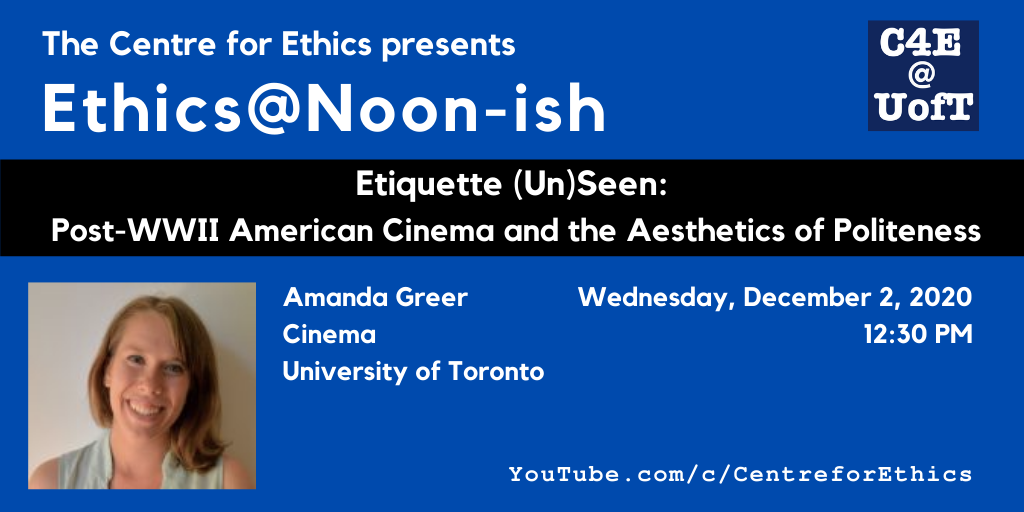
Etiquette (Un)Seen: Post-WWII American Cinema and the Aesthetics of Politeness
Etiquette surrounds us every day, infiltrating our social behaviour and shaping the aesthetic self-image we share with the world. Etiquette determines how we dress, how we eat, and how we speak—it is, as Raoul Vaneigem has put it, “what is most familiar.” Despite etiquette’s pervasiveness, little work in the humanities has taken the concept seriously; importantly, no work has considered etiquette’s profound impact on our popular aesthetic codes. Etiquette has been derisively termed a “little ethics,” tossed aside for its perceived femininity, its shallowness. This hasty dismissal has obscured etiquette’s importance in constructing popular aesthetics. Etiquette’s aesthetic form, and its creation of aesthetic forms, should no longer be ignored.
This talk will excavate etiquette from its theoretical obscurity. Etiquette, I argue, exists in and as cinematic form—an aesthetics of politeness. Post-WWII cinema is heavily informed by the era’s rampant conservatism and emphasis on images of a white suburban leisure class, binding etiquette and cinema most intimately. More specifically, etiquette in postwar cinema mobilizes an aesthetic of idealized, impossible white femininity to construct oppressive, racialized structures of politeness. By taking up the etiquette-adept figure of the social climber and her relationship to cinematic forms of looking, this talk offers a close reading of etiquette’s politicized aesthetics. Etiquette is not simply a frivolous, apolitical code; etiquette, embedded in popular cinematic form, determines the boundaries of social exclusivity through its aesthetic demands—its demands for an exclusionary mode of white femininity.
► please register here
This is an online event. It will be live streamed on the Centre for Ethics YouTube Channel on Wednesday, December 2. Channel subscribers will receive a notification at the start of the live stream. (For other events in the series, and to subscribe, visit YouTube.com/c/CentreforEthics.)
Amanda Greer
12:30 PM - 01:45 PM
Cinema
University of Toronto
Centre for Ethics, University of Toronto
200 Larkin - Wed, Nov 25, 2020
Ethics of AI in Context: Emerging Scholars
Anne-Marie Fowler, Differentiation Is Mechanics, Integration Is Art: Particularity, Community and the Digital Mind (Ethics of AI in Context: Emerging Scholars)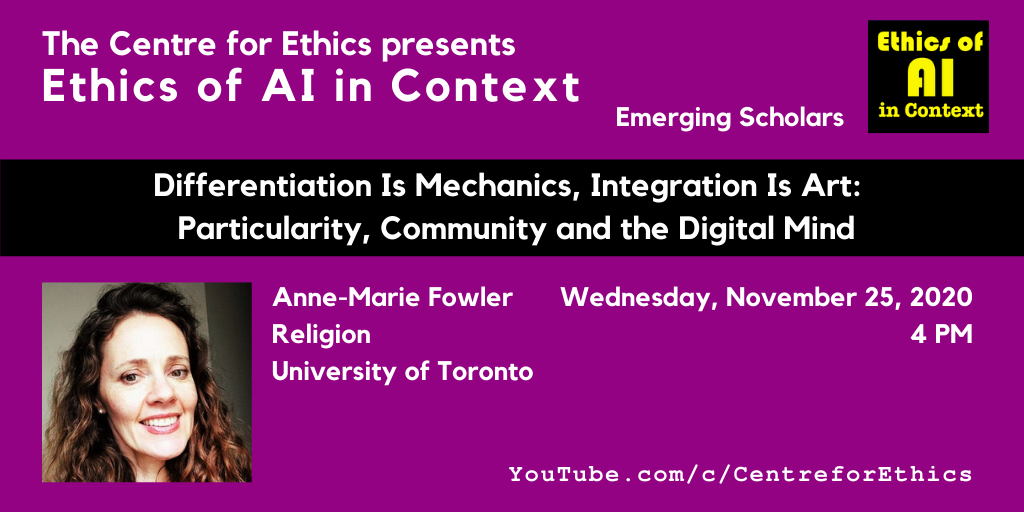
Differentiation is Mechanics, Integration is Art: Particularity, Community and the Digital Mind
A digital “mind” is not a human mind in lesser form; rather, it is entirely, and discretely, different. As such, it has been epitomized in terms of efficient prediction rather than origin and indeterminacy. However, both the human mind and the digital mind can be considered as sites of pure conception. Drawing principally from Hermann Cohen’s logic of origin, and applying an originary lens to philosophical inputs ranging from mathematics, aesthetics, and biology, I will point to an alternative modal framing of AI ethics that is potentially generative rather than solely corrective.
► please register here
This is an online event. It will be live streamed on the Centre for Ethics YouTube Channel on Wednesday, November 25. Channel subscribers will receive a notification at the start of the live stream. (For other events in the series, and to subscribe, visit YouTube.com/c/CentreforEthics.)
Anne-Marie Fowler, Doctoral Program, Department for the Study of Religion, in collaboration with the Anne Tanenbaum Centre for Jewish Studies, University of Toronto is a 2020-21 Graduate Research Fellow at the Centre for Ethics, focusing upon temporality, particularity and Ethics of AI in Context. Bringing prior professional background in finance, social entrepreneurship, philanthropy and public policy, she seeks to apply her current focus upon temporal design parameters in the AI setting to systemic questions of central banking and sovereign debt justice.
04:00 PM - 05:30 PM Anne-Marie Fowler
Anne-Marie Fowler
Religion
University of Toronto
Centre for Ethics, University of Toronto
200 Larkin - Mon, Nov 23, 2020
Ethics & Caribbean Philosophy
David Scott, Stuart Hall's Ethics (Ethics & Caribbean Philosophy)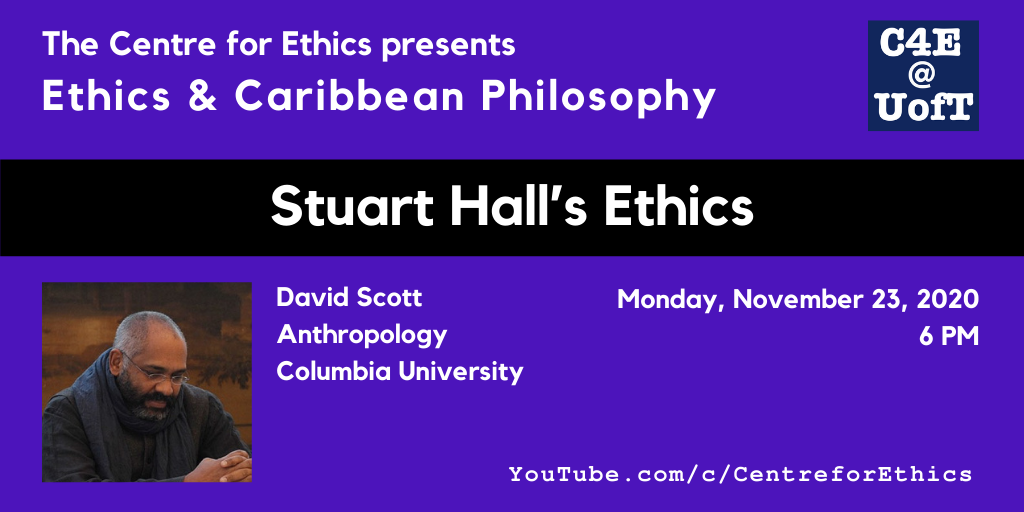
Stuart Hall’s Ethics
David Scott is Professor of Anthropology in the Institute for Research in African American Studies, Columbia University, New York. He is also the editor of the journal Small Axe. We will discuss his recent book, Stuart Hall’s Voice: Intimations of an Ethics of Receptive Generosity. Stuart Hall’s Voice explores the ethos of style that characterized Stuart Hall’s intellectual vocation. David Scott frames the book—which he wrote as a series of letters to Hall in the wake of his death—as an evocation of friendship understood as the moral and intellectual medium in which his dialogical hermeneutic relationship with Hall’s work unfolded. In this respect, the book asks: what do we owe intellectually to the work of those whom we know well, admire, and honor? Reflecting one of the lessons of Hall’s style, the book responds: what we owe should be conceived less in terms of criticism than in terms of listening.
► please register here
This is an online event. It will be live streamed on the Centre for Ethics YouTube Channel on Monday, November 23. Channel subscribers will receive a notification at the start of the live stream. (For other events in the series, and to subscribe, visit YouTube.com/c/CentreforEthics.)
David Scott
06:00 PM - 07:30 PM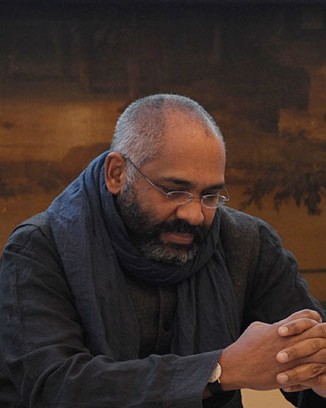
Anthropology
Columbia University
Centre for Ethics, University of Toronto
200 Larkin - Mon, Nov 23, 2020
Perspectives on Ethics
Iza Hussin, Translating Islamic Law: Mobility, History, Solidarity (Perspectives on Ethics)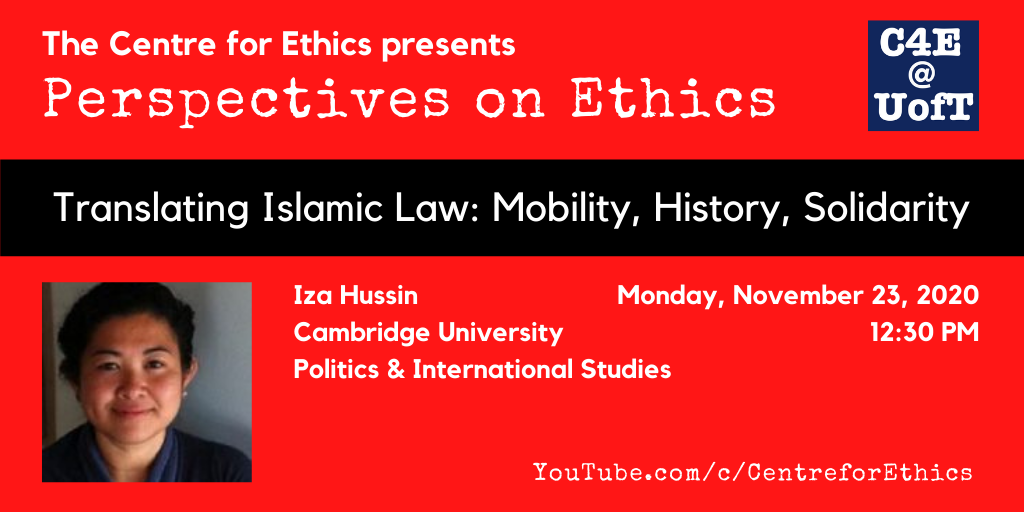
Translating Islamic Law: Mobility, History, Solidarity
Translation encapsulates a series of distinct moves in the study of Islamic law, each with its own ethical and methodological implications. These implications are often obscured when we emphasise textual and discursive translation, at the expense of institutional and material processes. This paper discusses the work that translation does in, and to, Islamic legal studies, including but not limited to: 1. shifting between semantic fields of meaning; 2. legal actors translating between idioms and institutions of law; and 3. facilitating (and resisting) the emergence of ‘universal’ categories and fields of law. It ends with a reflection on the implications of these translative dynamics for teaching, writing and publishing across languages and contexts in contemporary Islamic legal studies, considering translation as collaborative labour, in the context of displacement, migration, and war.
This is an online event. It will be live streamed on the Centre for Ethics YouTube Channel on Monday, November 23. Channel subscribers will receive a notification at the start of the live stream. (For other events in the series, and to subscribe, visit YouTube.com/c/CentreforEthics.)
Iza Hussin
12:30 PM - 01:45 PM
Cambridge University
Politics & International Studies
Centre for Ethics, University of Toronto
200 Larkin - Fri, Nov 20, 2020
C4E Flash Event, Race, Ethics + Power
Jonathan Kidd & Sonya Winton-Odamtten, Lovecraft Country: A Conversation on Afrofuturism, Black Aesthetics and the Endurance of Counter-Histories (Race, Ethics + Power Flash Event)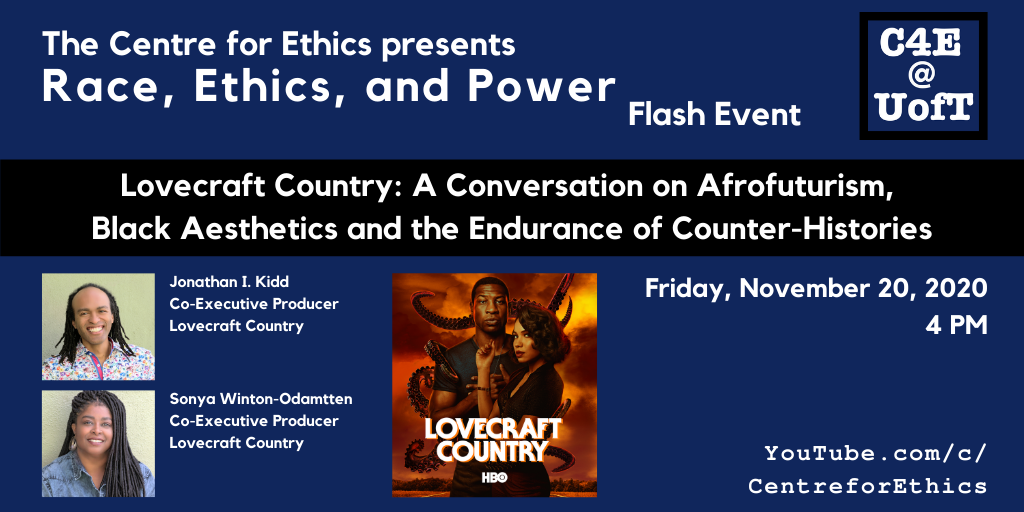
Lovecraft Country: A Conversation on Afrofuturism, Black Aesthetics and the Endurance of Counter-Histories
Afrofuturism is prominent force in popular culture and within Black critical thought. As an aesthetic we see examples in the visual expressions of musical artists such as Erykah Badu, and Janelle Monae, and a long history in literature by award winning novelists Octavia Butler and Nalo Hopkinson to name a few. Most recently we see Afrofuturist visions in the televisual landscape as seen with the recent success of HBO’s Lovecraft Country. But Afrofuturism and Black speculative thought has a long history within Black letters and expressive culture. What is Afrofuturism’s relationship to history, and how does it offer radical revisions of what we term “the past”?
We are excited to be joined by co-executive producers of Lovecraft Country, Jonathan Kidd and Sonya Winton-Odamtten to discuss the show in relation to the legacy of Afrofuturist thought and the politics of creating counter-histories.► please register here
This is an online event. It will be live streamed on the Centre for Ethics YouTube Channel on Friday, November 20. Channel subscribers will receive a notification at the start of the live stream. (For other events in the series, and to subscribe, visit YouTube.com/c/CentreforEthics.)
Playwrights and documentarians, Jonathan Kidd and Sonya Winton-Odamtten are the physical manifestation of a stellar collision. While Jonathan grew up in the farmlands of Mansfield, Ohio, Sonya was reared by her creative-hippie parents in the metropole of Los Angeles. No one could have predicted that their paths would cross while pursuing their PhD’s at Yale University…changing their lives forever… Jonathan earned his Bachelor’s degree with honors from The University of Michigan in African Studies, African American Studies, and English. He received his Master’s of Art, Master’s of Philosophy, and Doctoral degree from Yale University in African American Studies and English. Sonya earned her Bachelor’s degree with honors from Spelman College, where she majored in Political Science. She received her Master’s in Public Administration from Columbia University’s School of International and Public Affairs, a Master’s of Art, and Master’s of Philosophy in African American Studies and Political Science from Yale University. Sonya received her Doctorate in African American Studies and Political Science from Yale University. In 2001, while at Yale, Jonathan and Sonya founded a non-profit theater company, Adam, Eve, & Steve Productions (AES) and directed and produced a number of successful theater productions that include: Jonathan’s There Must Be A God Somewhere, Jan Henson Dow and Robert Schroeder’s Shaka, and Sonya’s Matri-focal Concentric Zones of Violence Revisited: Part One. In 2003-04, they took two years off from their studies to complete a documentary on youth mobilization during the Presidential election covering such groups as: ROCK THE VOTE, THE NATIONAL HIP HOP POLITICAL CONVENTION, STONEWALL DEMOCRATS, COLLEGE REPUBLICANS, HEADCOUNT, NEW VOTERS PROJECT, LEAGUE OF PISSED OFF VOTERS, CITIZEN CHANGE, and PUNKVOTER. In 2006, they were one of the featured theatre non-profits selected to participate in Suzan-Lori Parks’ 365 DAYS/365 PLAYS national festival. Parks remarked on the “unforgettable” productions staged by Jonathan and Sonya, at sites of contestation around greater Los Angeles (for example, the intersection of Florence and Normandie avenues, where Reginald Denny was beaten during the Rodney King rebellion). In 2007, Sonya and Jonathan taught theatre to teenagers in South Los Angeles through the LAUSD after school program Beyond 2 The Bell which utilized intensive readings of the works of Shakespeare, Lorraine Hansberry, and August Wilson to help students create their own one act plays addressing issues such as environmental justice, class inequality, and bullying. After stints as professors, playwrights, and documentarians, Sonya and Jonathan turned their eye toward a television career and were chosen for the Warner Brothers Television Writers Workshop in 2009. In addition to staffing on a number of shows, most notably ABC’s THE WHOLE TRUTH; FOX’s TOUCH; and AMAZON’s OASIS, Kidd/Winton- Odamtten found success in selling several of their spec pilots: THE 4TH REICH (Showtime with Robert De Niro, Jane Rosenthal, and CBS Studios attached as producing partners); Warner Horizon, the 1970s period drama RODEO DRIVE; and Lifetime, the dynastic family drama, SOUTHERN GOTHIC which Catherine Hardwick was attached to direct and Alfre Woodard and Melissa Leo set to star in. At the close of 2018, Kidd/Winton-Odamtten signed an overall with HBO to develop new projects while continuing their work on LOVECRAFT as CO-EP’s. Finally, through their philanthropic work Kidd/Winton-Odamtten recently launched the Feed Black Covid-19 Health Workers Challenge. After partnering with Frontline Foods, the duo recruited over 40 other Black Hollywood writers in order to support health care workers in underserved Black communities around the country. Thus far, their outreach has fed hospital, nursing home, and health clinic staffs in Downtown Los Angeles, St. Louis, New York, Dallas, Houston, Durham, Chicago, Pittsburgh, Providence, Inglewood, Boston, Memphis, and Minneapolis-St. Paul.
Jonathan I. Kidd
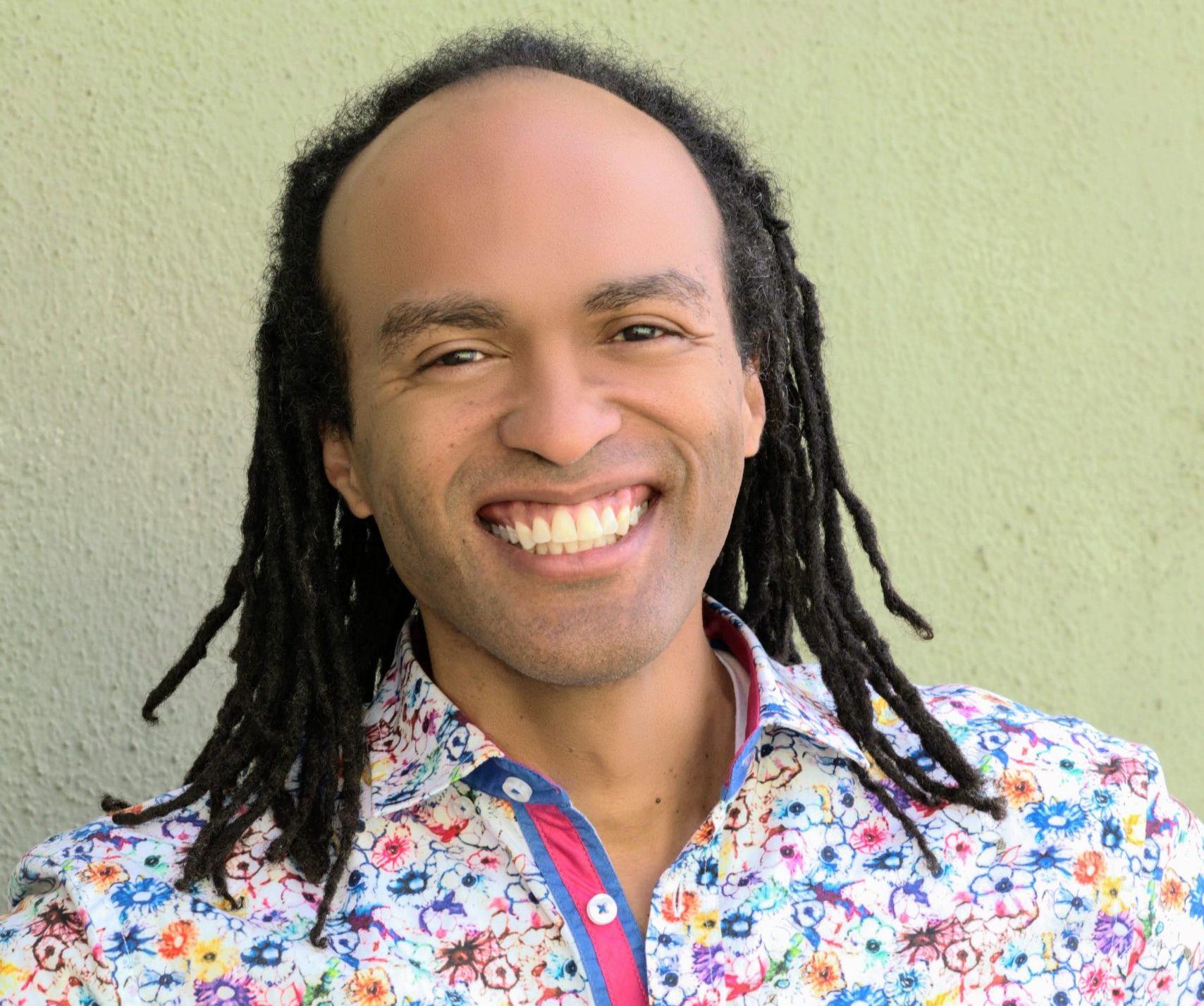
Co-Executive Producer
Lovecraft CountrySonya Winton-Odamtten
04:00 PM - 05:30 PM
Co-Executive Producer
Lovecraft Country
Centre for Ethics, University of Toronto
200 Larkin - Thu, Nov 19, 2020
Race, Ethics + Power: Emerging Scholars
Watufani Poe, Representação vs. Representatividade: Analyzing Black LGBTQ+ Identity Politics in Brazil (Race, Ethics + Power: Emerging Scholars)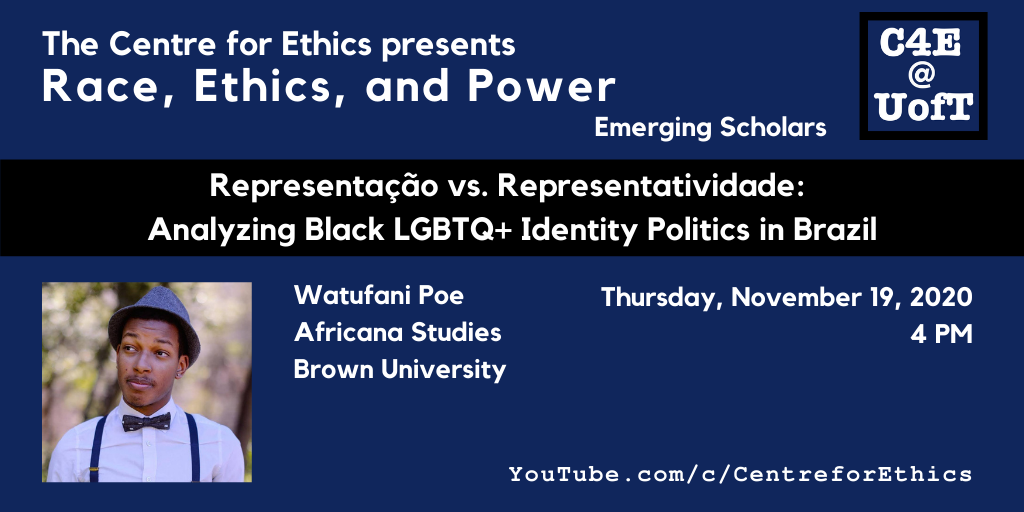
Representação vs. Representatividade: Analyzing Black LGBTQ+ Identity Politics in Brazil
The last five years in Brazil has seen an explosion of Black LGBTQ+ politicians enter elected positions. While many of these candidates ran on platforms that centered their own standpoint as a power analysis to help understand and deconstruct systemic inequality through policy, some candidates utilized their identities to work against a politics of social equity. In this presentation, I look at the various iterations of representation that have taken place for Black LGBTQ politicians in recent years, analyzing how different candidates weaponize their identities, and how these forms or representation impact the larger Black LGBTQ+ community.
► please register here
This is an online event. It will be live streamed on the Centre for Ethics YouTube Channel on Thursday, November 19. Channel subscribers will receive a notification at the start of the live stream. (For other events in the series, and to subscribe, visit YouTube.com/c/CentreforEthics.)
04:00 PM - 05:00 PM Watufani Poe is a PhD Candidate in Africana Studies at Brown University. He earned his B.A. from Swarthmore College in Africana Studies and his A.M. in History at Brown University. His dissertation entitled “Resisting Fragmentation: The Radical Possibilities of Black LGBTQ+ Activism in Brazil and the United States” looks at Black LGBTQ+ social and political activism in both countries to understand the ways Black LGBTQ people push for freedom across various movement spaces. His research has been funded by the Social Sciences Research Council, the Mellon Foundation, The US Fulbright Program, The Tinker Foundation, and the Brown University Brazil Initiative.
Watufani Poe is a PhD Candidate in Africana Studies at Brown University. He earned his B.A. from Swarthmore College in Africana Studies and his A.M. in History at Brown University. His dissertation entitled “Resisting Fragmentation: The Radical Possibilities of Black LGBTQ+ Activism in Brazil and the United States” looks at Black LGBTQ+ social and political activism in both countries to understand the ways Black LGBTQ people push for freedom across various movement spaces. His research has been funded by the Social Sciences Research Council, the Mellon Foundation, The US Fulbright Program, The Tinker Foundation, and the Brown University Brazil Initiative.
Centre for Ethics, University of Toronto
200 Larkin - Thu, Nov 19, 2020
Ethics of AI in Context
Catherine D'Ignazio and Lauren F. Klein, Data Feminism (Ethics of AI in Context)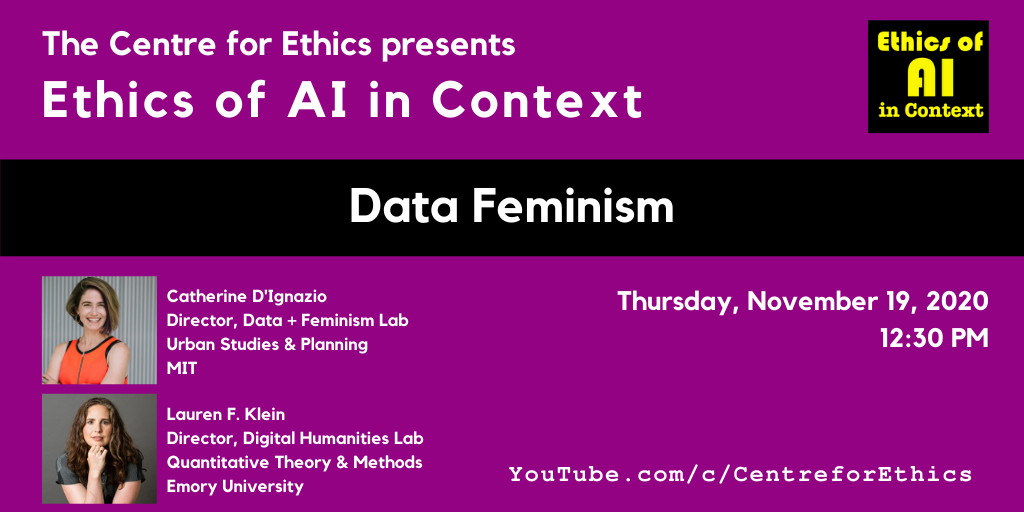
Data Feminism
As data are increasingly mobilized in the service of governments and corporations, their unequal conditions of production, their asymmetrical methods of application, and their unequal effects on both individuals and groups have become increasingly difficult for data scientists–and others who rely on data in their work–to ignore. But it is precisely this power that makes it worth asking: “Data science by whom? Data science for whom? Data science with whose interests in mind? These are some of the questions that emerge from what we call data feminism, a way of thinking about data science and its communication that is informed by the past several decades of intersectional feminist activism and critical thought. Illustrating data feminism in action, this talk will show how challenges to the male/female binary can help to challenge other hierarchical (and empirically wrong) classification systems; it will explain how an understanding of emotion can expand our ideas about effective data visualization; how the concept of invisible labor can expose the significant human efforts required by our automated systems; and why the data never, ever “speak for themselves.” The goal of this talk, as with the project of data feminism, is to model how scholarship can be transformed into action: how feminist thinking can be operationalized in order to imagine more ethical and equitable data practices.
► please register here
This is an online event. It will be live streamed on the Centre for Ethics YouTube Channel on Thursday, November 19. Channel subscribers will receive a notification at the start of the live stream. (For other events in the series, and to subscribe, visit YouTube.com/c/CentreforEthics.)
Catherine D’Ignazio

Director, Data + Feminism Lab
Urban Studies and Planning
MITLauren F. Klein
12:30 PM - 01:45 PM
Director, Digital Humanities Lab
Quantitative Theory & Methods
Emory University
Centre for Ethics, University of Toronto
200 Larkin - Wed, Nov 18, 2020
Ethics at Noon
Morag M. Kersel, Legal or Right? The Negative Consequences of the Legal Trade in Antiquities (Ethics@Noon-ish)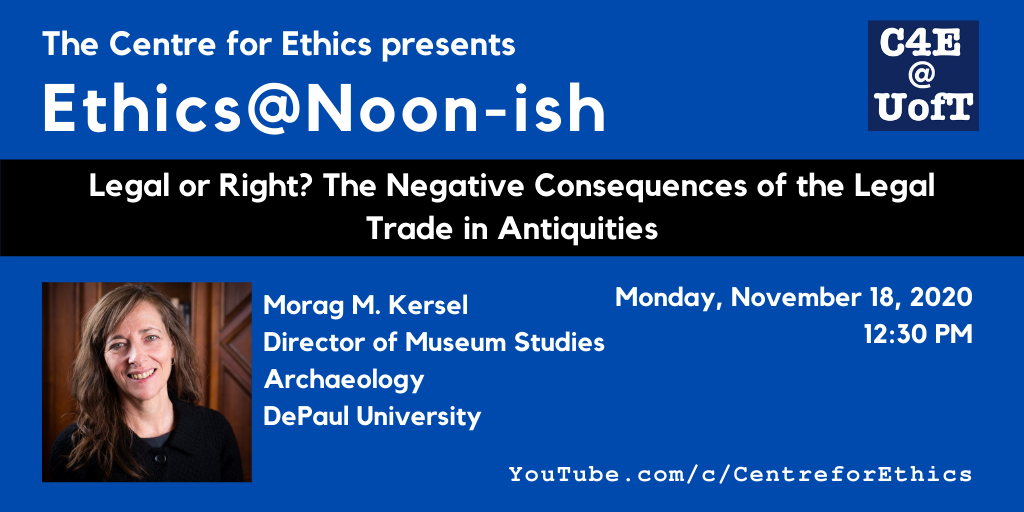
Legal or Right? The Negative Consequences of the Legal Trade in Antiquities
It is legal to sell artifacts in licensed antiquities markets such as those in the United States, the United Kingdom, and Israel, but is it right to buy an artifact with a murky past? Certain “legal quirks” (a term coined by noted cultural heritage lawyer Patty Gerstenblith) in national and international legal regimes allow for a blurring of illegal and legal elements in the antiquities trade. Such legal quirks often result in a market supplied by the looting of archaeological sites, and thefts from museums and archaeological storehouses. A study focused on the legal and illegal movement of Holy Land artifacts demonstrates that the market in Israel, while legal in name, possesses a number of illegal elements, which allow recently looted artifacts to be laundered and then legitimately traded. Where does our own ethical discernment and idea of what is right in the demand for antiquities fit into the diverse spectrum of the effects of such demand on local people and archaeological landscapes?
► please register here
This is an online event. It will be live streamed on the Centre for Ethics YouTube Channel on Wednesday, November 18. Channel subscribers will receive a notification at the start of the live stream. (For other events in the series, and to subscribe, visit YouTube.com/c/CentreforEthics.)
Morag M. Kersel
12:30 PM - 01:45 PM
Director of Museum Studies, DePaul University
Archaeology
Centre for Ethics, University of Toronto
200 Larkin - Thu, Nov 12, 2020
Critical Race Studies, Race, Ethics + Power
Olúfẹmi O. Táíwò, Compound Crisis: Cops, Climate, and COVID (Critical Race Studies: Interdisciplinary Perspectives)
Compound Crisis: Cops, Climate, and COVID
Although the COVID-19 pandemic and the climate crisis are both provoked by natural phenomena, the dangers they present are just as political as the crisis of police violence. Moreover, these crises overlap and compound each other in important ways. The size, scope, and longevity of the suffering they trigger will be largely decided by the institutional responses to challenges and the power dynamics that structure them. A historic debate about the relationship of famine to colonialism and democracy helps show why the compound crisis could lead to intensification of racist police violence, climate apartheid, and climate colonialism.
► please register here
This is an online event. It will be live streamed on the Centre for Ethics YouTube Channel on Thursday, November 12. Channel subscribers will receive a notification at the start of the live stream. (For other events in the series, and to subscribe, visit YouTube.com/c/CentreforEthics.)
Olúfẹmi O. Táíwò
04:00 PM - 05:30 PM
Georgetown University
Philosophy
Centre for Ethics, University of Toronto
200 Larkin - Thu, Oct 29, 2020
Race, Ethics + Power: Emerging Scholars
Bianca Beauchemin, Sensuous Interdisciplinary Opening: Re-imagining Diasporic Black Radical Insurgency (Race, Ethics + Power: Emerging Scholars)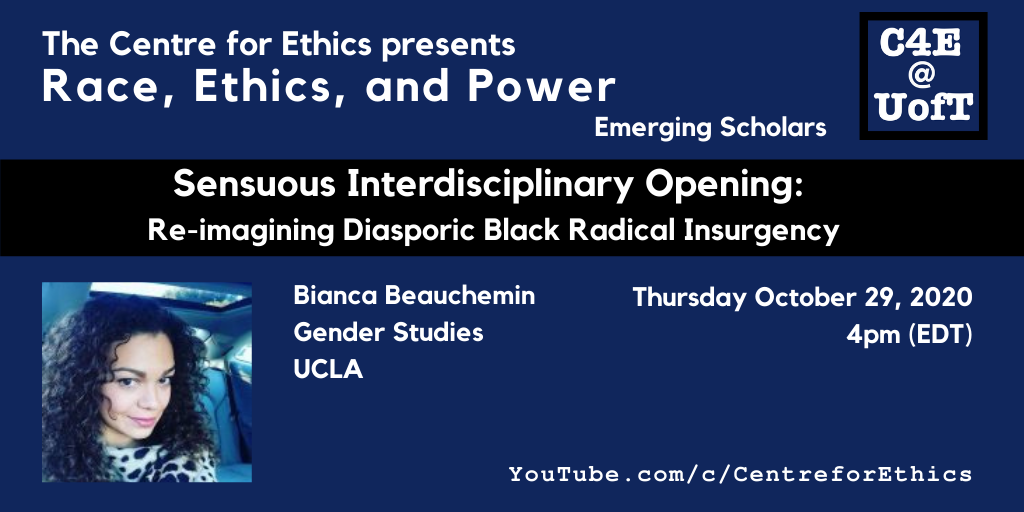
Sensuous Interdisciplinary Opening: Re-imagining Diasporic Black Radical Insurgency
In his influential book Silencing the Past, Michel-Rolph Trouillot invites us to find out “how history works, rather than what history is”, thus insisting that what we call the “archive” is not only a repository site of information, but also constitutes a methodological concept. He attests that the Haitian Revolution entered history as being “unthinkable,” which suggests in part, a narrow and power-laden methodological framework, foreclosing the epistemic and liberatory promises of this world-altering insurrection. How can we ethically re-narrate this historical event? What can be uncovered to inform other and more current struggles for liberation? Informed by my current dissertation project, this talk seeks to unearth the possibilities of the Haitian Revolution through a queerly black feminist approach.
► please register here
This is an online event. It will be live streamed on the Centre for Ethics YouTube Channel on Thursday, October 29. Channel subscribers will receive a notification at the start of the live stream. (For other events in the series, and to subscribe, visit YouTube.com/c/CentreforEthics.)
04:00 PM - 05:00 PM Bianca Beauchemin is a PhD candidate in Gender Studies at UCLA. Her dissertation research explores the interplay of the unintelligibility of Black female sexuality and Black feminist possibilities through the spatial-temporal landscape of the Haitian Revolution. Some of her key sites of research interests also include Black diasporic studies, Black queer studies, Black feminism, postcolonial literature, feminist geography, histories of revolutions, Caribbean history, and histories of slavery.
Bianca Beauchemin is a PhD candidate in Gender Studies at UCLA. Her dissertation research explores the interplay of the unintelligibility of Black female sexuality and Black feminist possibilities through the spatial-temporal landscape of the Haitian Revolution. Some of her key sites of research interests also include Black diasporic studies, Black queer studies, Black feminism, postcolonial literature, feminist geography, histories of revolutions, Caribbean history, and histories of slavery.
Centre for Ethics, University of Toronto
200 Larkin - Wed, Oct 28, 2020
Ethics of AI in Context: Emerging Scholars
Vinith Suriyakumar, Chasing Your Long Tails: Differentially Private Prediction in Health Care Settings (Ethics of AI in Context: Emerging Scholars)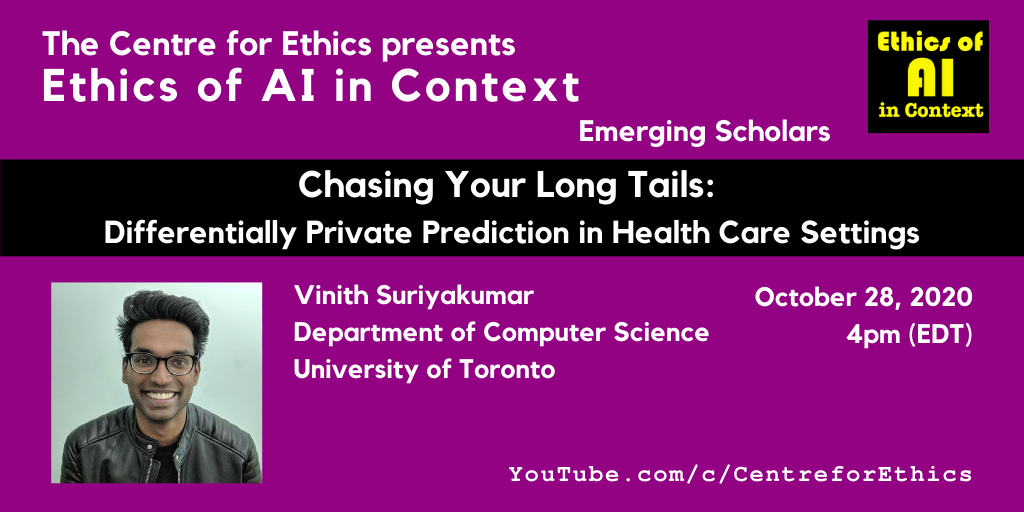
Chasing Your Long Tails: Differentially Private Prediction in Health Care Settings
Machine learning has the potential to improve health care through its ability to extract information from data. Unfortunately, machine learning is susceptible to privacy attacks which leak information about the data it was trained on. This can have dire consequences in health care where protecting patient privacy is of the utmost importance. Differential privacy has been proposed as the leading technique to defend against privacy attacks and has had successful use by the US Census, Google, and Apple. This talk will present the challenges of using differentially private machine learning in health care and how future solutions might address them.
► please register here
This is an online event. It will be live streamed on the Centre for Ethics YouTube Channel on Wednesday, October 28. Channel subscribers will receive a notification at the start of the live stream. (For other events in the series, and to subscribe, visit YouTube.com/c/CentreforEthics.)
04:00 PM - 05:00 PM Vinith Suriyakumar
Vinith Suriyakumar
Department of Computer Science
University of Toronto
Centre for Ethics, University of Toronto
200 Larkin - Wed, Oct 28, 2020
Ethics of Songs
Antía González Ben on "Que non mo neguen" (They Can't Deny It) (The Ethics of Songs)
Join us for The Ethics of Songs, the Centre for Ethics YouTube series that explores the ethical dimensions of songs familiar and new! (The full schedule is available here.)
► please register here
Dr. Antía González Ben
Faculty of Music
University of TorontoThis is an online event, available on the Centre for Ethics YouTube Channel. Channel subscribers will receive a notification at the start. (For other events in the series, and to subscribe, visit YouTube.com/c/CentreforEthics.)
03:00 PM - 03:30 PM
Centre for Ethics, University of Toronto
200 Larkin - Wed, Oct 28, 2020
Ethics at Noon
Lauren Bialystok, The Authority of Identity in Academic Practice (Ethics@Noon-ish)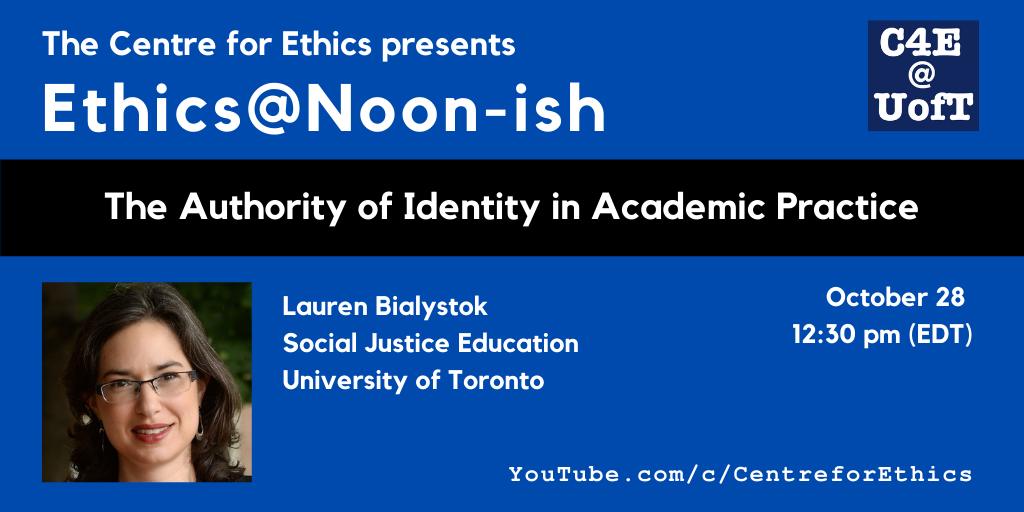
The Authority of Identity in Academic Practice
Academics increasingly feel obliged to “situate” themselves relative to the content of what they have to say and their presumed authority to say it, in both written scholarship and verbal dialogue or teaching. What kind of epistemic or ethical goods are secured by the use of positionality (“As a [race], [gender], [etc.], I…”) to attenuate our roles in political or philosophical discussions? Intended as a gesture of inclusion, these declarations – especially coming from those of us with greater unearned social privilege – can communicate self-awareness in a context where background conditions of unequal power are an exhausting, even prohibitive, hurdle to some people’s participation. Such intentions can also motivate includes pronoun checks, land acknowledgements, and other inclusion-oriented strategies. These practices have become culturally mandatory in some academic milieus, to the point that not partaking in them may immediately raise suspicions. I argue that positionality, while symbolically important, depends on implausible assumptions about identity and knowledge. Worse, it can function as a proxy for the deeper philosophical and educational work that we ought to do to further social justice. Self-positioning should be voluntary and calibrated to the epistemic value of having or not having a certain identity.
► please register here
This is an online event. It will be live streamed on the Centre for Ethics YouTube Channel on Wednesday, October 28. Channel subscribers will receive a notification at the start of the live stream. (For other events in the series, and to subscribe, visit YouTube.com/c/CentreforEthics.)
Lauren Bialystok
12:30 PM - 01:45 PM
University of Toronto
Social Justice Education, OISE
Centre for Ethics, University of Toronto
200 Larkin - Thu, Oct 22, 2020
Critical Race Studies, Race, Ethics + Power
Eddie Bruce-Jones, Black Lives and German Exceptionalism (Critical Race Studies: Interdisciplinary Perspectives)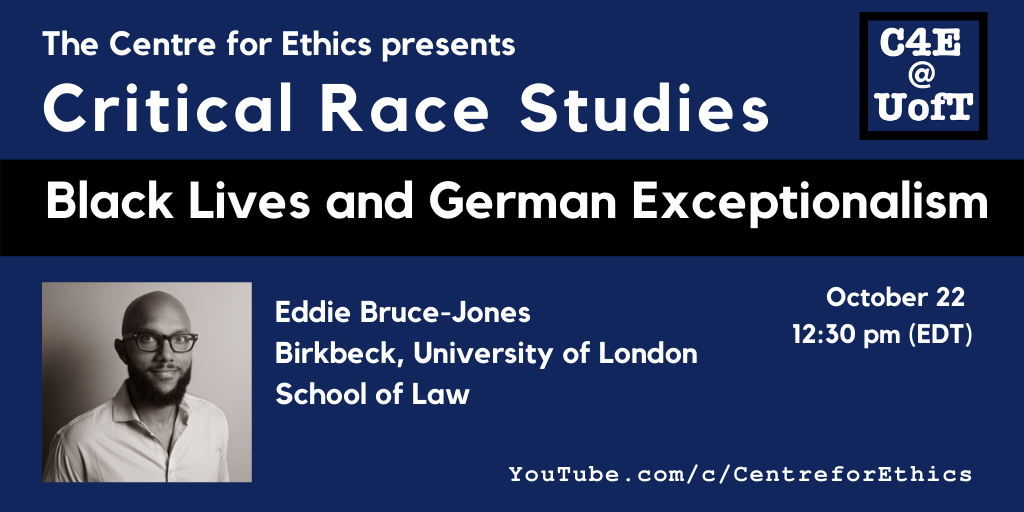
Black Lives and German Exceptionalism
This presentation will address the issues of institutional and structural racism in Europe by using the legal situation of racism in Germany, and specifically racism against Black people, as a lens. The paper will touch upon discursive, linguistic and legal concepts that highlight the specificity of the German context as well as continuities in approaches across Europe. Ultimately, the paper argues that, contrary to a persistent notion that ‘race’ is a US-American obsession ill-fitted to European social life, race is a useful analytical category for understanding exclusion in Europe and that the structural dimension of racism must be acknowledged in order to address the pervasive forms of racism that affect the daily lives and interests of all of Europe’s residents.
► please register here
This is an online event. It will be live streamed on the Centre for Ethics YouTube Channel on Thursday, October 22. Channel subscribers will receive a notification at the start of the live stream. (For other events in the series, and to subscribe, visit YouTube.com/c/CentreforEthics.)
Eddie Bruce-Jones
12:30 PM - 01:45 PM
Birkbeck, University of London
School of Law
Centre for Ethics, University of Toronto
200 Larkin - Tue, Oct 20, 2020
Ethics of AI in Context, Race, Ethics + Power
Rodrigo Ochigame, Actuarialism and Racial Capitalism (Ethics of AI in Context)
Actuarialism and Racial Capitalism
As national and regional governments form expert commissions to regulate “automated decision-making,” a new corporate-sponsored field of research proposes to formalize the elusive ideal of “fairness” as a mathematical property of algorithms and especially of their outputs. Computer scientists, economists, lawyers, lobbyists, and policy reformers wish to hammer out, in advance or in place of regulation, algorithmic redefinitions of “fairness” and such legal categories as “discrimination,” “disparate impact,” and “equal opportunity.”
But general aspirations to fair algorithms have a long history. This talk recounts some past attempts to answer questions of fairness through the use of algorithms. In particular, it focuses on “actuarial” practices of individualized risk classification in private insurance firms, consumer credit bureaus, and police departments since the late nineteenth century. The emerging debate on algorithmic fairness may be read as a response to the latest moral crisis of computationally managed racial capitalism.
► please register here
This is an online event. It will be live streamed on the Centre for Ethics YouTube Channel on Tuesday, October 20. Channel subscribers will receive a notification at the start of the live stream. (For other events in the series, and to subscribe, visit YouTube.com/c/CentreforEthics.)
Rodrigo Ochigame
04:00 PM - 05:30 PM
History, Anthropology, & Science, Technology, and Society
MIT
Centre for Ethics, University of Toronto
200 Larkin - Mon, Oct 19, 2020
Perspectives on Ethics, Race, Ethics + Power
CANCELLED – Denise Ferreira da Silva, Unpayable Debt (Perspectives on Ethics)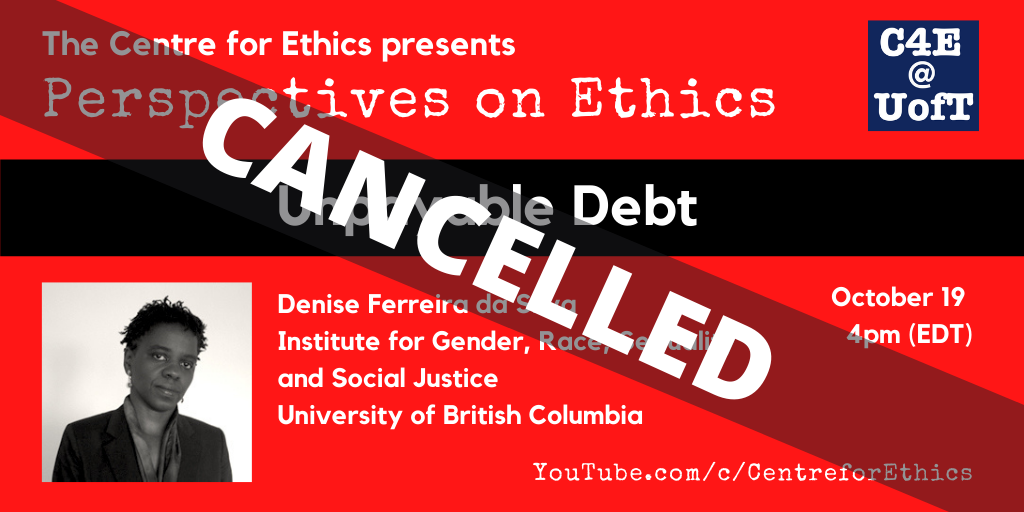
Unfortunately, this event has been cancelled. We apologize for any inconvenience, we hope to reschedule at a later date. Any and all updates will be posted here, on the Centre for Ethics website, ethics.utoronto.ca. We thank to all those who registered for your continued support.
Unpayable Debt
In this talk I sketch a black feminist poethical figure with which I seek to capture how coloniality and raciality operate in Global Capital. Framed as a dialectical image, it guides a reading of the notion of value that traces the continuous operation of coloniality in the modern economic and ethical scenes. With a focus on the philosophical infrastructure of the notion of value, Unpaybable Debt exposes global capital as a juridic-economic architecture and attendant ethical grammar, in which raciality (the symbolic figuring of coloniality) justifies otherwise ethically untenable deployments of total violence that allow for the continued expropriation (of labour) and extraction (of resources) of Europe’s racial others and their lands.
Denise Ferreira da Silva
04:00 PM - 05:30 PM
University of British Columbia
Institute for Gender, Race, Sexuality and Social Justice
Centre for Ethics, University of Toronto
200 Larkin - Fri, Oct 16, 2020
C4E Flash Event, Race, Ethics + Power
#Say Her Name… Breonna Taylor! Race, Ethics & “Justice”? – A Dialogue with Beverly Bain, Idil Abdillahi, and El Jones (Race, Ethics & Power Flash Event)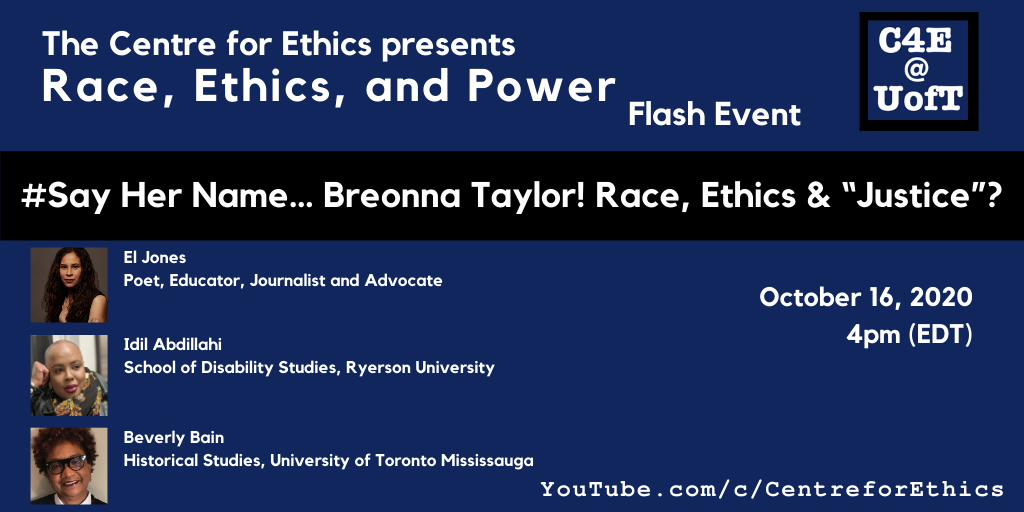
#Say Her Name… Breonna Taylor! Race, Ethics & “Justice”? – A Dialogue with Beverly Bain, Idil Abdillahi, and El Jones
With the recent grand jury decision to indict on a lesser charge of “wanton endangerment” in the death of Breonna Taylor, there is an urgency to examine the implications of these actions to fully understand future demands for justice. What does it mean to understand state-violence on, and against Black women’s bodies, and personhood, as a “wanton” act? What is the historicity of such a designation that exonerates the perpetrator of said violence against Black women’s personhood? “Wanton” as adjective, is defined as “of a cruel or violent action – that is deliberate and unprovoked.”
Posing these questions invites us all, those that are willing, to consider conversations about the confluence of anti-black violence as it manifests in not only legal procedure and deliberation but also within popular discourse.
Centering Black women’s critical work on law-enforcement and the carceral state, our invited panelists will engage in a critical dialogue considering the following guiding questions;
1) What are the implications of “civil” rulings, such as wrongful death suits, in relation to what we conceive as “justice?”
2) How do such decisions undermine pursuits for accountability from law-enforcement in the realm of the criminal justice system?
3) How is “Black life” and social death deeply intertwined with questions of monetary value as seen in the wrongful death case that preceded the grand jury decision?
4) How do we grapple with this question of “value” in relation to Black women’s lives?
5) How does the above, set a precedent for how Black people will seek justice in the future?
This is an online event. It will be live streamed on the Centre for Ethics YouTube Channel on Friday, October 16. Channel subscribers will receive a notification at the start of the live stream. (For other events in the series, and to subscribe, visit YouTube.com/c/CentreforEthics.)
► please register here

Beverly Bain is a Black queer feminist scholar –activist and teaches in Women and Gender Studies in the Department of Historical Studies at the University of Toronto Mississauga. She currently teaches and researches in the area of The Black Queer Feminist Radical Tradition, Black and Caribbean diasporic sexualities, Gender, Feminism and Post Colonial Theories and Gender, Violence and Resistance. Bain is the author of “Fire, Passion and Politics: The Creation of Blockorama as Black Queer Diasporic Space in the Toronto Pride Festivities.” In We Still Demand: Defining Resistance in Sex and Gender Struggles. Edited by Patrizia Gentile, Gary Kinsman and L Pauline Rankin. UBC Press, 2017; “Wake Work and The Coronavirus”. Tilting 2, The Society for the Diffusion of Useful Knowledge. May 2020, Blackwood Gallery as well as several other articles. Bain is currently working on a series of essays on Black radical feminist queer activism in Toronto from the 80’s to the present.
 Idil Abdillahi is an Assistant Professor in the School of Disability Studies and the Advisor to the Dean in the Faculty of Community Services on issues of anti-Black racism. She is a founding member of the Black Legal Action Centre (BLAC) and currently serves as the vice-chair of the board of directors. Idil has published on a wide array of topics, such as mental health, prisons/policing, poverty, HiV/AIDS, organizational development, and several other key policy areas at the intersection of BlackLife and state interruption. In 2019 Idil co-authored “BlackLife. Post BLM and the Struggle from Freedom”, and she is completing, her forthcoming book “Blackened Madness: Medicalization, and Everyday Life in Canada” also published by ARP Books.
Idil Abdillahi is an Assistant Professor in the School of Disability Studies and the Advisor to the Dean in the Faculty of Community Services on issues of anti-Black racism. She is a founding member of the Black Legal Action Centre (BLAC) and currently serves as the vice-chair of the board of directors. Idil has published on a wide array of topics, such as mental health, prisons/policing, poverty, HiV/AIDS, organizational development, and several other key policy areas at the intersection of BlackLife and state interruption. In 2019 Idil co-authored “BlackLife. Post BLM and the Struggle from Freedom”, and she is completing, her forthcoming book “Blackened Madness: Medicalization, and Everyday Life in Canada” also published by ARP Books.
04:00 PM - 05:30 PM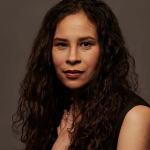 El Jones is a poet, educator, journalist and advocate. She was the fifth Poet Laureate of Halifax, and the 15th Nancy’s Chair in Women’s Studies at Mount Saint Vincent University. El is a 2016 recipient of the Nova Scotia Human Rights Commission Burnley “Rocky” Jones award. El is a co-founder of the Black Power Hour, a radio show developed collectively with prisoners. Her advocacy and work fights anti-Black racism in Canada, walking in the path of our great-grandmothers who resisted relentlessly. Her book of poetry and essays on state violence, Canada is So Polite will be released in the winter from Gaspereau Press.
El Jones is a poet, educator, journalist and advocate. She was the fifth Poet Laureate of Halifax, and the 15th Nancy’s Chair in Women’s Studies at Mount Saint Vincent University. El is a 2016 recipient of the Nova Scotia Human Rights Commission Burnley “Rocky” Jones award. El is a co-founder of the Black Power Hour, a radio show developed collectively with prisoners. Her advocacy and work fights anti-Black racism in Canada, walking in the path of our great-grandmothers who resisted relentlessly. Her book of poetry and essays on state violence, Canada is So Polite will be released in the winter from Gaspereau Press.
Centre for Ethics, University of Toronto
200 Larkin - Wed, Oct 14, 2020
Ethics at Noon
Teresa Heffernan, AI, the Immortality Industry, and the Ethics of Death (Ethics@Noon)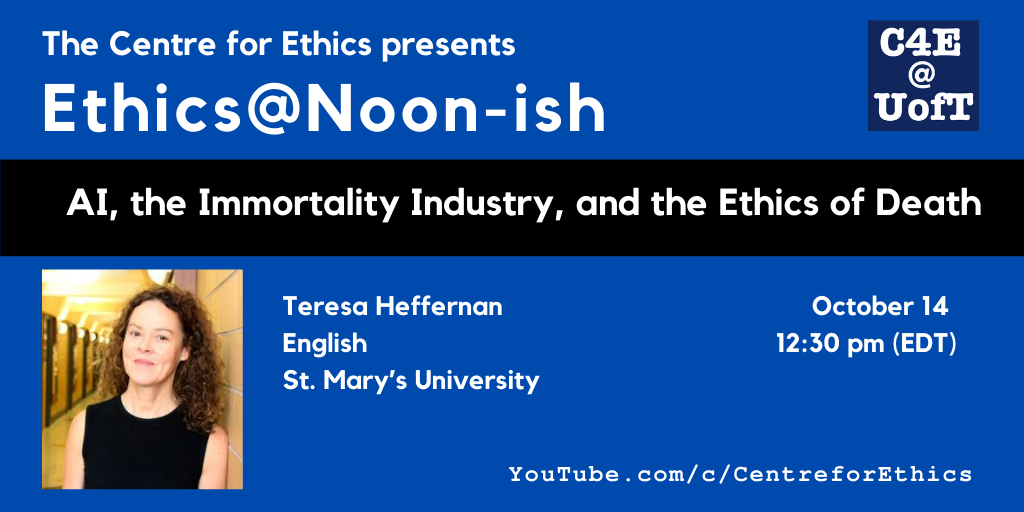
AI, the Immortality Industry, and the Ethics of Death
This talk considers the far reaches of the multi-billion-dollar immortality industry and the money and power behind the scenes that fuels this fantasy science even as the planet teeters on the brink of collapse. After examining some contemporary fictions that challenge big tech and its paradoxical escalation of the end of all life even as it hankers after life without death in its relentless focus on a future that is always “future,” this talk then turns to archaeology and the future’s archaic longings. One of the oldest and longest surviving stories in the world, The Epic of Gilgamesh, is about a tyrannical king who wants immortality. In failing in his quest, however, Gilgamesh learns what it means to live as an ethical human being. Drawing on the lesson in this ancient epic, the talk ends with a reflection on the connection between mortality, responsibility, and freedom
► please register here
This is an online event. It will be live streamed on the Centre for Ethics YouTube Channel on Wednesday, October 14. Channel subscribers will receive a notification at the start of the live stream. (For other events in the series, and to subscribe, visit YouTube.com/c/CentreforEthics.)
Teresa Heffernan
12:30 PM - 01:45 PM
St. Mary’s University
English
Centre for Ethics, University of Toronto
200 Larkin - Tue, Oct 13, 2020
Ethics of AI in Context, Race, Ethics + Power
Andre Brock, Black Morpheus: Race in the Technocultural Matrix (Ethics of AI in Context)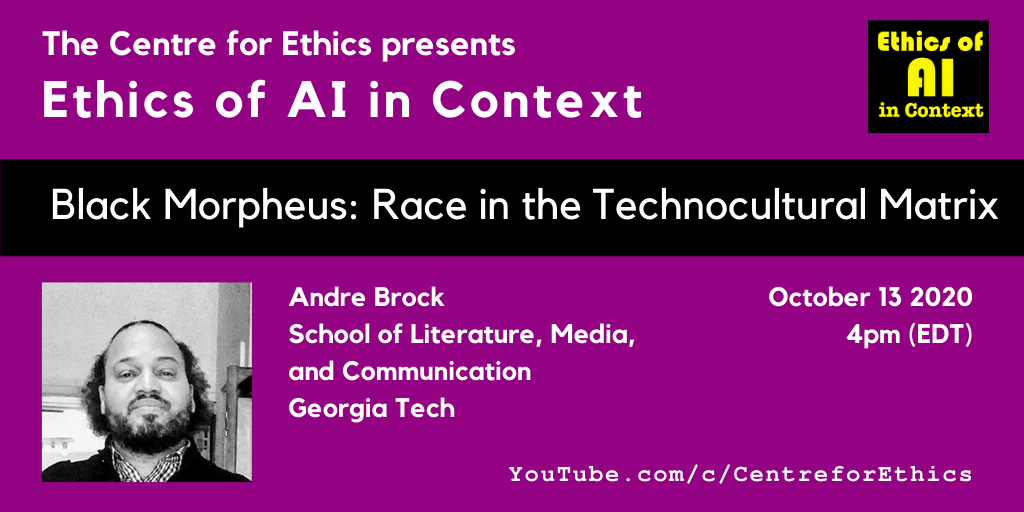
Black Morpheus: Race in the Technocultural Matrix
Where does Blackness manifest In the ideology of Western technoculture? Technoculture is the American mythos and ideology; a belief system powering the coercive, political, and carceral relations between culture and technology. Once enslaved, historically disenfranchised, and never deemed literate, Blackness is understood as the object of Western technical and civilizational practices. This presentation is a critical intervention for internet research and science and technology studies (STS), reorienting Western technoculture’s practices of “race-as-technology” to visualize Blackness as technological subjects rather than as “things”. Hence, Black technoculture.
► please register here
This is an online event. It will be live streamed on the Centre for Ethics YouTube Channel on Tuesday, October 13. Channel subscribers will receive a notification at the start of the live stream. (For other events in the series, and to subscribe, visit YouTube.com/c/CentreforEthics.)
Andre Brock
04:00 PM - 05:30 PM
School of Literature, Media, and Communication
Georgia Tech
Centre for Ethics, University of Toronto
200 Larkin - Fri, Oct 9, 2020
C4E Flash Event, Ethics of AI in Context
Mohamed Abdalla, The Grey Hoodie Project: Big Tobacco, Big Tech, and the Threat on Academic Integrity (Ethics of AI in Context)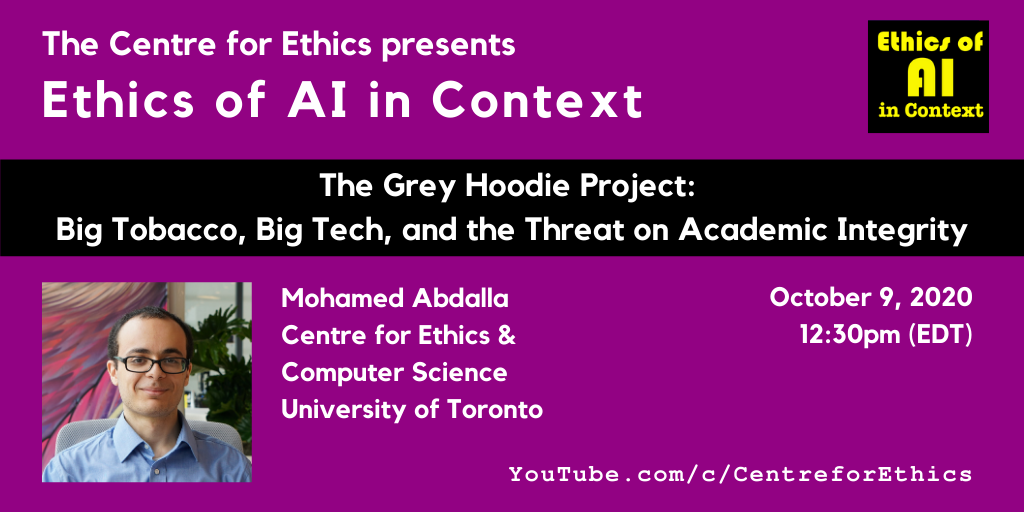 The Grey Hoodie Project: Big Tobacco, Big Tech, and the Threat on Academic Integrity
The Grey Hoodie Project: Big Tobacco, Big Tech, and the Threat on Academic IntegrityAs governmental bodies rely on academics’ expert advice to shape policy regarding Artificial Intelligence, it is important that these academics not have conflicts of interests that may cloud or bias their judgement. Our work explores how Big Tech is actively distorting the academic landscape to suit its needs. By comparing the well-studied actions of another industry, that of Big Tobacco, to the current actions of Big Tech we see similar strategies employed by both industries to sway and influence academic and public discourse. We examine the funding of academic research as a tool used by Big Tech to put forward a socially responsible public image, influence events hosted by and decisions made by funded universities, influence the research questions and plans of individual scientists, and discover receptive academics who can be leveraged. We demonstrate, in a rigorous manner, how Big Tech can affect academia from the institutional level down to individual researchers. Thus, we believe that it is vital, particularly for universities and other institutions of higher learning, to discuss the appropriateness and the tradeoffs of accepting funding from Big Tech, and what limitations or conditions should be put in place. (As featured in Wired.)
► please register here
This is an online event. It will be live streamed on the Centre for Ethics YouTube Channel on Friday, October 9. Channel subscribers will receive a notification at the start of the live stream. (For other events in the series, and to subscribe, visit YouTube.com/c/CentreforEthics.)
Mohamed Abdala
12:30 PM - 01:45 PM
Centre for Ethics & Department of Computer Science
University of Toronto
Centre for Ethics, University of Toronto
200 Larkin - Mon, Oct 5, 2020
Perspectives on Ethics
Sophie Grace Chappell, Forgiveness in Classical Greece: Socrates, Plato, Aristotle, and Their Background Culture (Perspectives on Ethics)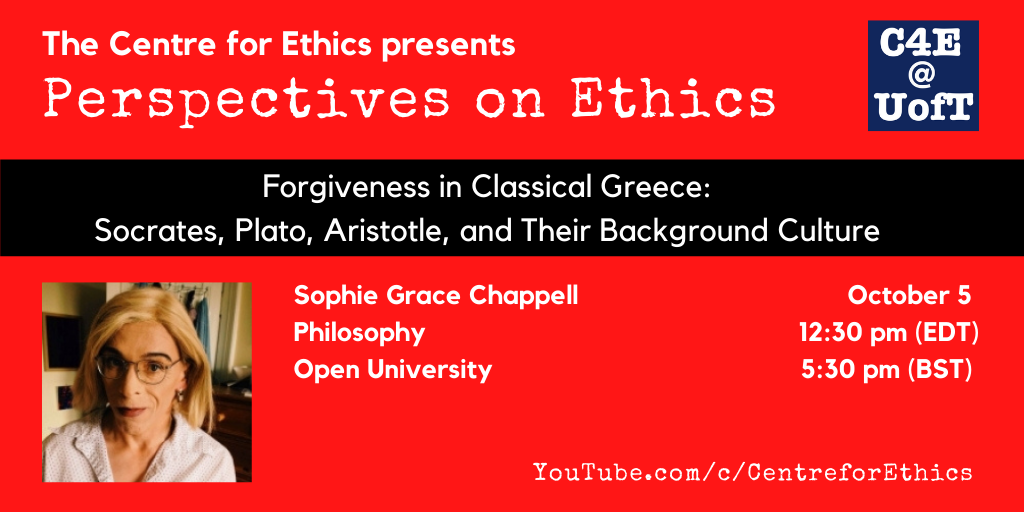
Forgiveness in Classical Greece: Socrates, Plato, Aristotle, and Their Background Culture
In the Christian tradition that we have inherited, there is a two-stranded conception of forgiveness: forgiveness is both kindness and grace about wrongdoing, and also cancellation of wrongdoing. Moreover, the focal Augustinian articulation of this tradition works with a very special (and specially problematic) conception of what the wrongdoing is that the forgiver forgives. None of these ideas are central to the classical Greek ethical tradition. Most of them are not there at all. In fact, we might plausibly say that in pagan ancient-Greek ethics there is not much evidence of any concept of forgiveness. The nearest approach is that there is some idea of gracious kindness towards those who do us wrong. But in its pagan Greek version this does not involve any contrastive narrative of moral or spiritual conversion or transformation; above all, there is in pagan Greek ethics no notion at all of the kind of wrongdoing that at least Augustinian Christianity later came to focus on.
This is an online event. It will be live streamed on the Centre for Ethics YouTube Channel on Monday, October 5. Channel subscribers will receive a notification at the start of the live stream. (For other events in the series, and to subscribe, visit YouTube.com/c/CentreforEthics.)
Sophie Grace Chappell
12:30 PM - 01:45 PM
Philosophy
Open University
Centre for Ethics, University of Toronto
200 Larkin - Fri, Oct 2, 2020
C4E Flash Event, Ethics of AI in Context
To Surveil and Predict: A Human Rights Analysis of Algorithmic Policing in Canada (Ethics of AI in Context)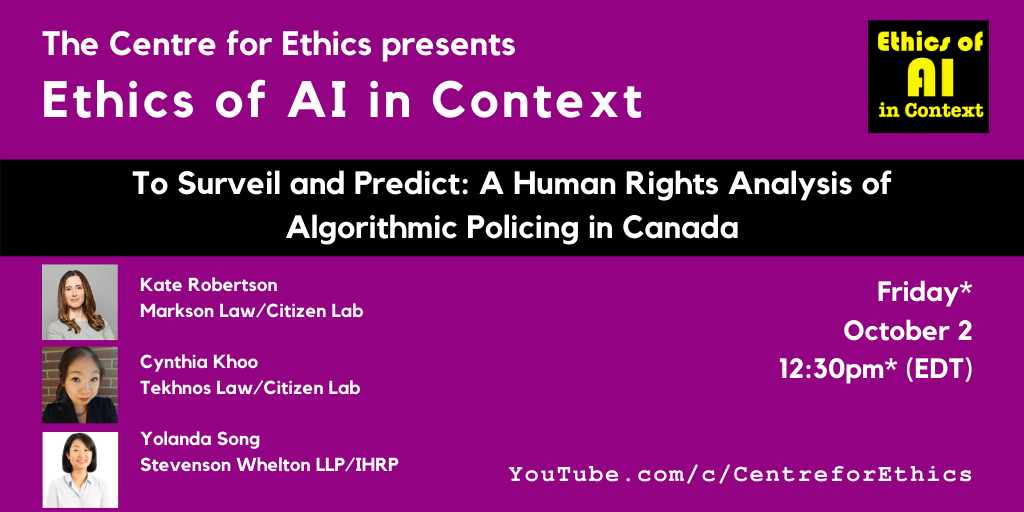
To Surveil and Predict: A Human Rights Analysis of Algorithmic Policing in Canada
A collaboration between the International Human Rights Program and the Citizen Lab at the University of Toronto, To Surveil and Predict: A Human Rights Analysis of Algorithmic Policing in Canada examines algorithmic technologies that are designed for use in criminal law enforcement systems in Canada. Algorithmic policing is an area of technological development that, in theory, is designed to enable law enforcement agencies to either automate surveillance or to draw inferences through the use of mass data processing in the hopes of predicting potential criminal activity. The report finds that the use of algorithmic policing technologies by law enforcement can raise many potential constitutional and civil liberties violations under the Canadian Charter of Rights and Freedoms and international human rights law. In their presentation, the authors of this report discuss their findings, including what steps governments and the public in Canada should consider taking in light of human rights dangers at stake.
► please register here
This is an online event. It will be live streamed on the Centre for Ethics YouTube Channel on Friday, October 2. Channel subscribers will receive a notification at the start of the live stream. (For other events in the series, and to subscribe, visit YouTube.com/c/CentreforEthics.)
Kate Robertson
Markson Law
Citizen Lab Research FellowCynthia Khoo
Tekhnos Law
Citizen Lab Research FellowYolanda Song
12:30 PM - 01:45 PM
Stevenson Whelton LLP
IHRP Research Associate
Centre for Ethics, University of Toronto
200 Larkin - Thu, Oct 1, 2020
Critical Race Studies, Race, Ethics + Power
Xine Yao, The Cultural Politics of Unfeeling: Considering Race and Affect From Below (Critical Race Studies: Interdisciplinary Perspectives)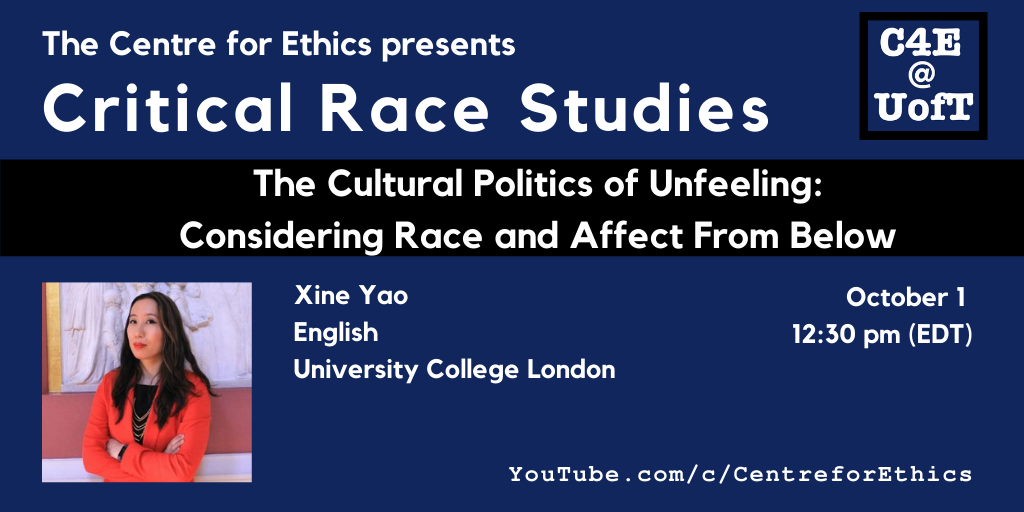
The Cultural Politics of Unfeeling: Considering Race and Affect From Below
Dominant cultural fantasies of justice still depend upon reformed models of sympathy to recognize minoritized feelings. What if we considered unfeeling not as a strategy from above, but as a tactic from below? In my forthcoming book Disaffected: The Cultural Politics of Unfeeling in Nineteenth Century America (Duke University Press) I take an antisocial approach to affect theory. According to theorist Denise Ferreira da Silva, “affectability” is constructed as the intrinsic property of non-white others. Drawing from queer of colour critique, I refuse the usual move to recuperate unfeeling as legible feeling; instead I stress how unfeeling indexes disaffection in the political, causal, and affective senses. Unfeeling is a means of survival and a catalyst for the emergence of alternative structures of feeling. For my talk I will discuss Oriental inscrutability as a queer, racialized mode of unfeeling in its potential for what I call insurgent counterintimacies with the intertwined struggles of Black and Indigenous peoples. By discussing writings by early Black nationalist Martin R. Delany and the first Asian North American woman writer Edith Maude Eaton/Sui Sin Far, I hope to model how Asian diasporic settlers like myself should refuse the colonial politics of recognition toward the hard work of BIPOC solidarity.
This is an online event. It will be live streamed on the Centre for Ethics YouTube Channel on Thursday, October 1. Channel subscribers will receive a notification at the start of the live stream. For other events in the series, and to subscribe, visit YouTube.com/c/CentreforEthics. For information on the Centre for Ethics, including upcoming events, visit ethics.utoronto.ca.
Xine Yao
12:30 PM - 01:45 PM
English
University College London
Centre for Ethics, University of Toronto
200 Larkin - Wed, Sep 30, 2020
Ethics of Songs, Race, Ethics + Power
George Elliott Clarke on "Ride On, King Jesus" (Ethics of Songs)
Join us for The Ethics of Songs, the Centre for Ethics YouTube series that explores the ethical dimensions of songs familiar and new! (The full schedule is available here.)
► please register here
George Elliott Clarke
Poet / Professor
University of TorontoThis is an online event, available on the Centre for Ethics YouTube Channel. Channel subscribers will receive a notification at the start. (For other events in the series, and to subscribe, visit YouTube.com/c/CentreforEthics.)
03:00 PM - 03:30 PM
Centre for Ethics, University of Toronto
200 Larkin - Wed, Sep 30, 2020
Ethics at Noon
Simon Stern, Reasonable Doubters: Cross-Examination, Detection, Mystification (Ethics@Noon)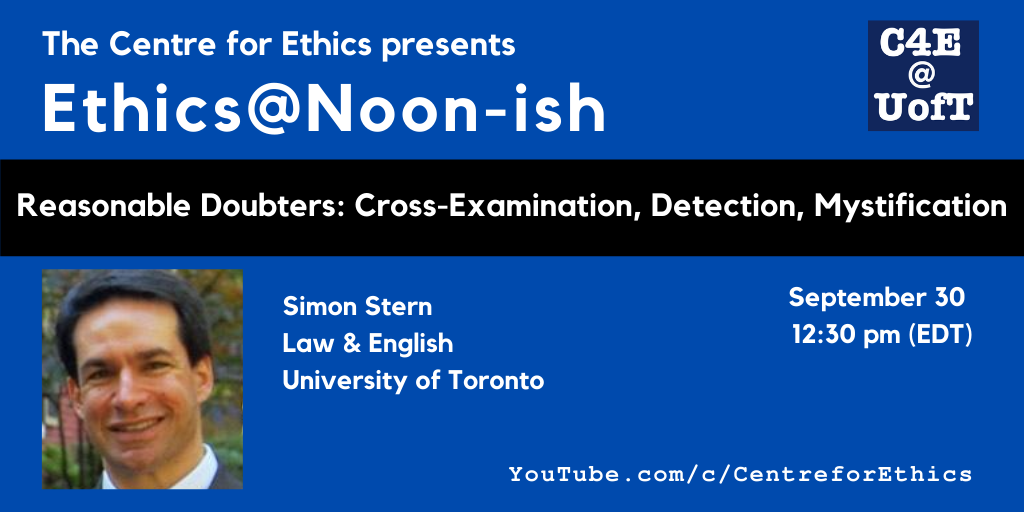
Reasonable Doubters: Cross-Examination, Detection, Mystification
The methods of the detective and the cross-examiner can help to get at the truth, but they can also cloud the truth, creating doubt where none existed. After a brief discussion of the rise of cross-examination, in the late eighteenth century and through the nineteenth century, I will turn to a series of developments in the detective story that increasingly stressed the unreliability of evidence. These changes, accompanied by developments in forensic science, identified new ways to “de-authenticate” legitimate documents while justifying the skeptic’s questions as merely the expression of a reasonable observer’s doubts. Unlike those who freely attach the label of “fake news” to whatever they disagree with, the reasonable doubter makes a show of adhering to proof standards – but the results may be equally dangerous.
This is an online event. It will be live streamed on the Centre for Ethics YouTube Channel on Wednesday, September 30. Channel subscribers will receive a notification at the start of the live stream. (For other events in the series, and to subscribe, visit YouTube.com/c/CentreforEthics.)
Simon Stern
12:30 PM - 01:45 PM
Law & English
University of Toronto
Centre for Ethics, University of Toronto
200 Larkin - Tue, Sep 22, 2020
Ethics of AI in Context, Critical Race Studies
Alex Hanna, Data, Transparency, and AI Ethics (Ethics of AI in Context)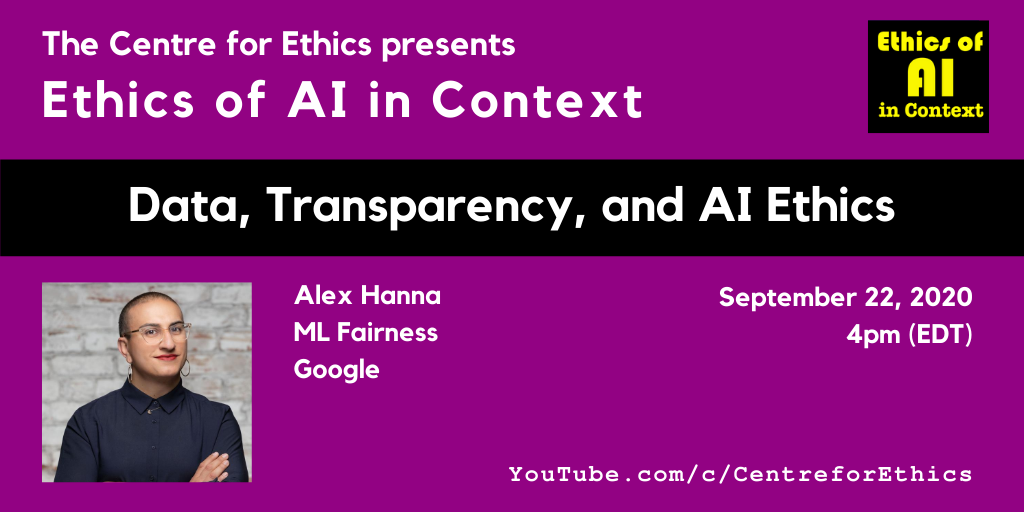
Data, Transparency, and AI Ethics
The interdisciplinary field of AI ethics has started new debates into the fairness of particular algorithms and the role of algorithms in automated decision making systems. In the first part of this talk, I introduce the reporting and transparency work that Google’s Ethical AI team has been pursuing around the models and data involved in these systems. A major assumption of this work is the stability of particular ontologies of socially salient characteristics. In the second part of this talk, I turn to critical race theory and sociological work on race and ethnicity to ground conceptualizations of race for algorithmic fairness and machine learning more broadly. Lastly, I outline a research program around the genealogy of data used in machine learning research. While machine learning has seen a rapid proliferation of new methods, the datasets which undergird these methods have received comparatively little attention. A research program around the genealogy of these datasets should be attentive to the constellation of organizations and stakeholders involved in their creation, the intent, values, and assumptions of their authors and curators, and the adoption of datasets by subsequent researchers.
This is an online event. It will be live streamed on the Centre for Ethics YouTube Channel on Tuesday, September 22. Channel subscribers will receive a notification at the start of the live stream. (For other events in the series, and to subscribe, visit YouTube.com/c/CentreforEthics.)
► please register here
Alex Hanna
04:00 PM - 05:30 PM
ML Fairness
Google
Centre for Ethics, University of Toronto
200 Larkin - Mon, Sep 21, 2020
Perspectives on Ethics
Sally Haslanger, Systemic Injustice, Ideology, and Agency (Perspectives on Ethics)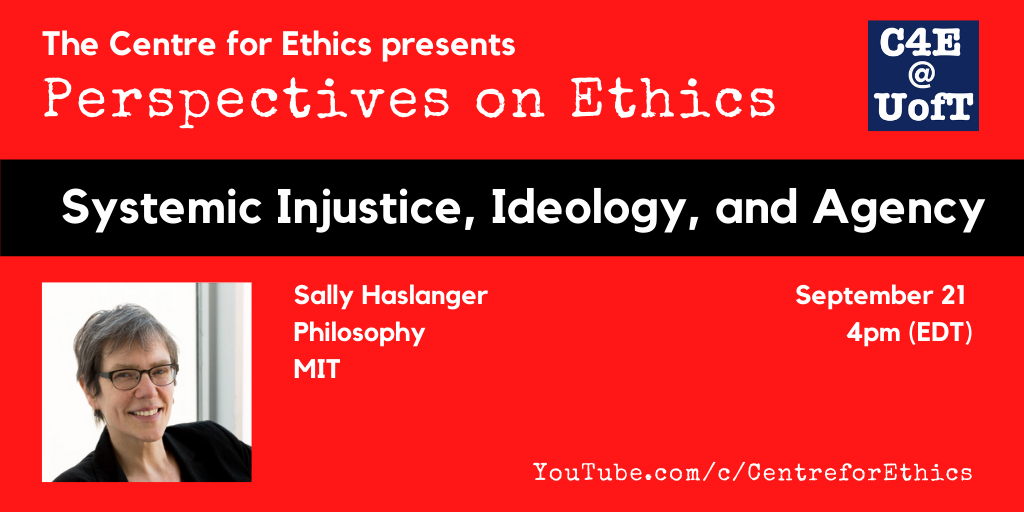
Systemic Injustice, Ideology, and Agency
Racism, sexism, and other forms of systemic injustice are more than just bad attitudes. In a stratified society, there are mechanisms – including law, policy, culture, technology, and the built environment – that stably position groups hierarchically. But attitudes play a role. How central is that role? In this lecture Haslanger argues that social practices are patterns of interaction guided by social meanings that distribute things of value. In the case of unjust practices the network of meanings is ideological and is internalized in habits of mind that distort, obscure, and occlude important facts and result in a failure to recognize the interests of subordinated groups. How do we disrupt such practices to achieve greater justice? Haslanger argues that resistance to systemic injustice requires us to do more than just challenge false beliefs; social movements change the material and cultural conditions of agency.
This is an online event. It will be live streamed on the Centre for Ethics YouTube Channel on Monday, September 21. Channel subscribers will receive a notification at the start of the live stream. (For other events in the series, and to subscribe, visit YouTube.com/c/CentreforEthics.)
► please register here
Sally Haslanger
04:00 PM - 05:30 PM
Philosophy
MIT
Centre for Ethics, University of Toronto
200 Larkin - Wed, Sep 16, 2020
Ethics of Songs, Race, Ethics + Power
Elizabeth Gould on "Mississippi Goddam" (Ethics of Songs)
Join us for The Ethics of Songs, the Centre for Ethics YouTube series that explores the ethical dimensions of songs familiar and new! (The full schedule is available here.)
► please register here
Elizabeth Gould
Faculty of Music
University of TorontoThis is an online event, available on the Centre for Ethics YouTube Channel. Channel subscribers will receive a notification at the start. (For other events in the series, and to subscribe, visit YouTube.com/c/CentreforEthics.)
03:00 PM - 03:30 PM
Centre for Ethics, University of Toronto
200 Larkin - Wed, Sep 16, 2020
Ethics at Noon
Gail Super, Punitive Welfare on the Margins of the State: Narratives of Punishment and (In)Justice in Masiphumelele (Ethics@Noon)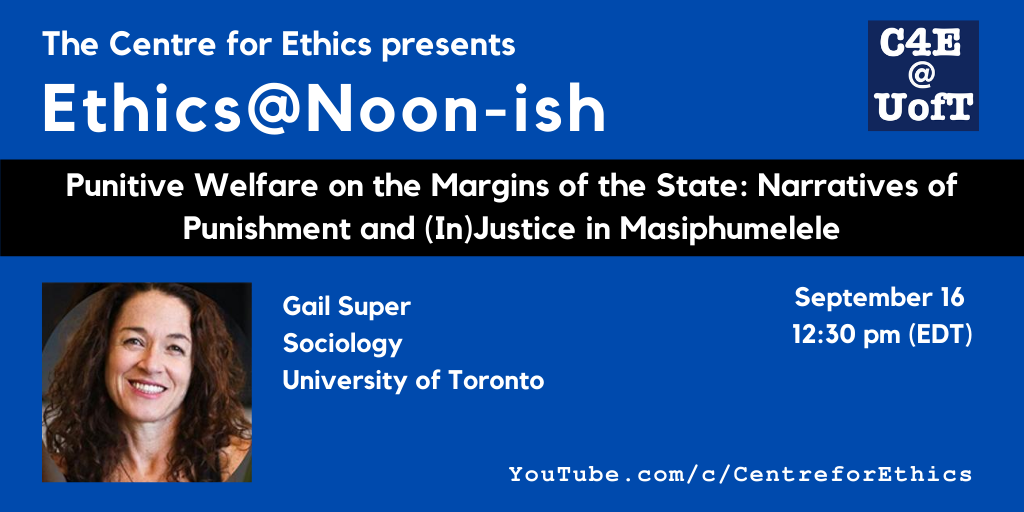
Punitive Welfare on the Margins of the State: Narratives of Punishment and (In)Justice in Masiphumelele
While there is an established literature on the relationship between political economy and state punishment, there is less work on how punishment is constituted from below in contexts of inequality. In this talk I analyse the discourse around incidents of lethal collective violence that occurred in 2015 in a former ‘black township’ in South Africa. I use this discourse as a lens for examining how punitive forms of popular justice interact with state punishment. Whether via the slow violence of racialized structural inequality or the viscerally corporeal high rates of interpersonal violence, my interviewees were intimately acquainted with violence. Although they supported long-term imprisonment, and the expulsion of ‘criminals’ from their communities, none of them came across as conservative right-wing populists. Instead, they adopted complex positions, calling for a type of punitive welfarism, which combined harsh solutions to crime with explicit recognition of the importance of dealing with ‘root causes’. I argue that when the state is perceived to be failing to both impose punishment and provide welfare, violence becomes a technology of exchange, which simultaneously seeks both more punishment and more welfare. The result is an assemblage of exclusionary penal forms, many of which stem from and/or overlap with the violence (penal and otherwise), that was deployed by colonial and apartheid rulers as a means to control their racialized subjects.
This is an online event. It will be live streamed on the Centre for Ethics YouTube Channel on Wednesday, September 16. Channel subscribers will receive a notification at the start of the live stream. (For other events in the series, and to subscribe, visit YouTube.com/c/CentreforEthics.)
► please register here
Gail Super
12:30 PM - 01:45 PM
Sociology
University of Toronto
Centre for Ethics, University of Toronto
200 Larkin - Tue, Sep 15, 2020
Ethics of AI in Context, Critical Race Studies, Race, Ethics + Power
I. Bennett Capers, A New Country: Afrofuturism, Critical Race Theory, and Policing in the Year 2044 (Critical Race Studies: Interdisciplinary Perspectives)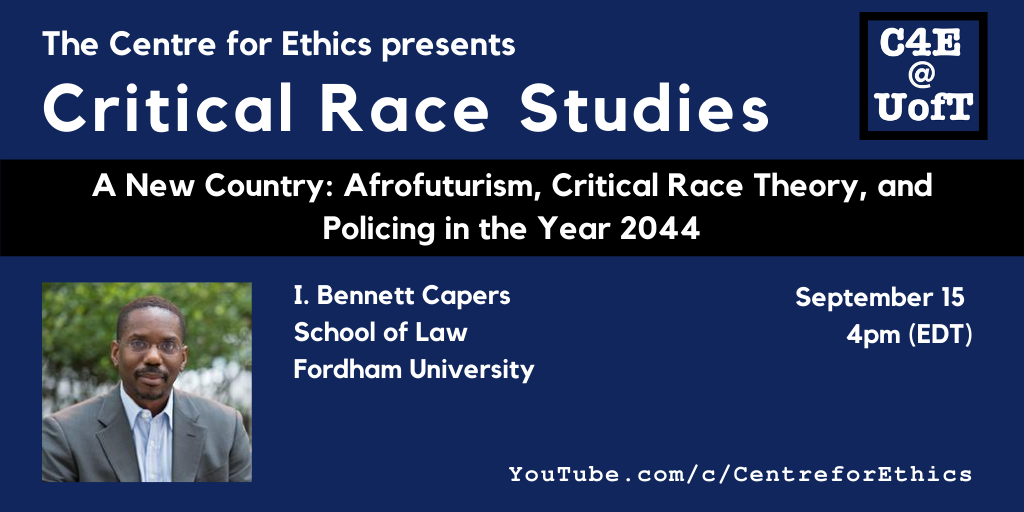
A New Country: Afrofuturism, Critical Race Theory, and Policing in the Year 2044
In his presentation, Professor Capers will turn to Afrofuturism and Critical Race Theory as a way to imagine what policing could look like in a majority-minority future where people of color make up the majority in terms of numbers, and also wield the majority of political and economic power. In short, he imagines a new country
This is an online event. It will be live streamed on the Centre for Ethics YouTube Channel on Tuesday, September 15. Channel subscribers will receive a notification at the start of the live stream. (For other events in the series, and to subscribe, visit YouTube.com/c/CentreforEthics.)
► please register here
I. Bennett Capers
04:00 PM - 05:30 PM
Law School
Fordham University
Centre for Ethics, University of Toronto
200 Larkin - Wed, Sep 2, 2020
Ethics of Songs
David Fallis on "Tiny Perfect Moles" (Ethics of Songs)
Join us for The Ethics of Songs, the Centre for Ethics YouTube series that explores the ethical dimensions of songs familiar and new! (The full schedule is available here.)
➡︎ please register here
David Fallis
Faculty of Music
University of TorontoThis is an online event, available on the Centre for Ethics YouTube Channel. Channel subscribers will receive a notification at the start. (For other events in the series, and to subscribe, visit YouTube.com/c/CentreforEthics.)
03:00 PM - 03:30 PM
Centre for Ethics, University of Toronto
200 Larkin - Wed, Aug 19, 2020
Ethics of Songs
Nasim Niknafs on "لالایی" (Lālāi) (Ethics of Songs)
Join us for The Ethics of Songs, the Centre for Ethics YouTube series that explores the ethical dimensions of songs familiar and new! (The full schedule is available here.)
➡︎ please register here
Dr. Nasim Niknafs
Faculty of Music
University of TorontoThe Ethics of Songs
Centre for Ethics, University of Toronto
August 19, 2020Credits:
Image
Rob Niebrugge, www.wildnatureimages.comCentre for Ethics
University of Toronto
ethics.utoronto.ca
July 2020
Produced and edited by Laura MenardThis is an online event, available on the Centre for Ethics YouTube Channel. Channel subscribers will receive a notification at the start. (For other events in the series, and to subscribe, visit YouTube.com/c/CentreforEthics.)
03:00 PM - 03:30 PM
Centre for Ethics, University of Toronto
200 Larkin - Wed, Aug 5, 2020
Ethics of Songs
Anna Shternshis on "Es geyen yesomim" ("Orphan's Walk") (Ethics of Songs)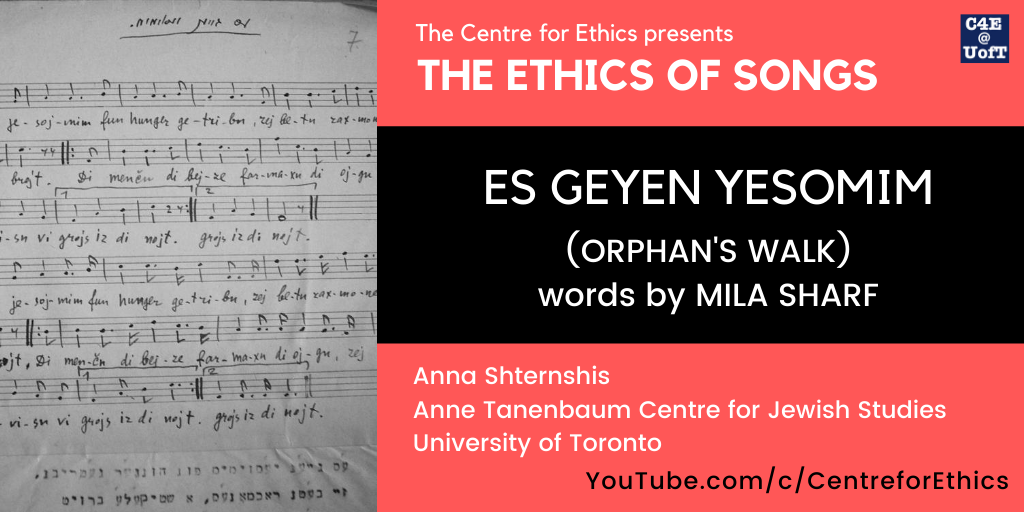
Join us for The Ethics of Songs, the Centre for Ethics YouTube series that explores the ethical dimensions of songs familiar and new! (The full schedule is available here.)
Anna Shternshis
Anne Tanenbaum Centre for Jewish Studies
University of TorontoCredits:
“Es geyen yesomim” archival photo courtesy of Anna Shternshis
Video recording of “Es geyen yesomim” courtesy of Anna Shternshis
Vocals: Psoy Korolenko
Cello: Beth Silver Accordion: Sergiu Popa
Clarinet: Julian Milkis Part of the “Yiddish Glory Project”
Creators: Anna Shternshis and Psoy Korolenko
Producer: Dan RosenbergCentre for Ethics
University of Toronto
ethics.utoronto.ca
July 2020
Produced and edited by Laura MenardAdditional Resources:
For more on Yiddish Glory, see https://www.yiddishglory.com/
For press, see http://danrosenberg.net/press_yiddish_glory
For an academic article, “Hitler Hanging on the Tree: Humor and Violence in Soviet Yiddish Folklore of World War II,” in Laughter After: Humor and the Holocaust, edited by Avinom Platt, David Slucki and Gabriel Finder, pp.15 – 37, Wayne State University Press, 2020 (http://tiny.cc/jnamsz)
This is an online event, available on the Centre for Ethics YouTube Channel. Channel subscribers will receive a notification at the start. (For other events in the series, and to subscribe, visit YouTube.com/c/CentreforEthics.)
03:00 PM - 03:30 PM
Centre for Ethics, University of Toronto
200 Larkin - Wed, Jul 15, 2020
Ethics of Black Lives Matter
Daniel Loick & Vanessa E. Thompson, Breathing and Unbreathing: The Chokeholds of Racism (The Ethics of Black Lives Matter)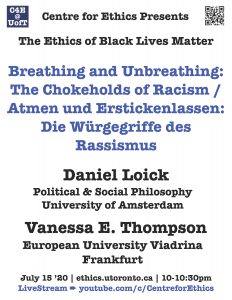
Join the Centre for Ethics for The Ethics of Black Lives Matter, an interdisciplinary series of online events featuring short video takes.
Breathing and Unbreathing: The Chokeholds of Racism
The recent murder of George Floyd, Breonna Taylor and Tony McDade have sparked resistance against policing and carcerality as articulations of racial gendered capitalism globally. Black, brown and migrant communities are protesting and trace the transnational connections and historical continuities of present murderous institutions such as the police, in their respective contexts and show that these protests are not only about the US. The systemic killings of black people in these various contexts present the most repressive and deadly function of policing. This is however only one part of the problem. The repression and oppression of black, brown and migrant folks is inextricably linked to the empowerment and normalization of dominant segments of the population.
In this input, we discuss the differential functionality of policing and how it plays out in the field of subjectivation and identification. We explore the condition of unbreathing for some (and inherent to the policing of blackness and race) in relationship to the breathability of others by drawing on accounts of the policing of black lives, black radical, feminist and critical social theory. Finally, we propose a subjective and collective dis-dentification with the police as a precondition for a world in which we all can breathe.
This conversation will take place in German language.
Atmen und Erstickenlassen: Die Würgegriffe des Rassismus
Die Morde an George Floyd, Breonna Taylor und Tony McDade haben einen weltweiten Widerstand gegen das System des Polizierens und Einsperrens als Ausdruck eines rassifizierten und vergeschlechtlichten Kapitalismus ausgelöst. Der Protest Schwarzer und migrantischer Communities verweist in seinen jeweiligen Kontexten auf die transnationalen Verbindungen und historischen Kontinuitäten der gegenwärtigen Gewaltinstitutionen wie der Polizei. Dieser Protest ist somit nicht allein auf die USA bezogen. Die systematische Tötung Schwarzer Menschen in diesen verschiedenen Kontexten sind der tödlichste und repressivste Ausdruck des Polizierens. Sie sind aber nur die eine Seite der polizeilichen Logik. Die Unterdrückung von Menschen of Color ist untrennbar verknüpft mit der Ermächtigung und Normalisierung dominanter Teile der Bevölkerung.
In diesem Input diskutieren wir die differentielle Funktionsweise der Polizei und ihre Auswirkungen auf die Subjektivierung und Identifizierung. Wir wollen den Ursachen dessen nachgehen, dass einigen die Luft zum Atmen genommen wird (ein Effekt, der dem Polizieren Schwarzer Menschen inhärent ist), während andere frei atmen können. Dafür konsultieren wir einige radikale Schwarze Ansätze sowie feministische und kritische Gesellschaftstheorien. Wir schlagen schließlich eine subjektive und kollektive Des-Identifikation mit der Polizei als Vorbedingung einer Welt vor, in der wir alle atmen können.
Das Gespräch findet in deutscher Sprache statt.
This is an online event. It will be live streamed on the Centre for Ethics YouTube Channel at 10am EDT (= 4pm CET), on Wednesday, July 15. Channel subscribers will receive a notification at the start of the live stream. (For other events in the series, and to subscribe, visit YouTube.com/c/CentreforEthics.)
➡︎ please register here
 Daniel Loick is associate professor of Political and Social Philosophy at the University of Amsterdam
Daniel Loick is associate professor of Political and Social Philosophy at the University of Amsterdam
 Vanessa E. Thompson is postdoctoral researcher and lecturer at the European University Viadrina Frankfurt
Vanessa E. Thompson is postdoctoral researcher and lecturer at the European University Viadrina Frankfurt
10:00 AM - 10:30 AM
Centre for Ethics, University of Toronto
200 Larkin - Mon, Jul 13, 2020
Ethics of Black Lives Matter
Charisse Burden-Stelly & Sandy Placido, Radical Ethics and Black Lives Matter: Pan-Caribbean Perspectives on Capitalism, Imperialism, State Violence, and Antiblackness (The Ethics of Black Lives Matter)
Join the Centre for Ethics for The Ethics of Black Lives Matter, an interdisciplinary series of online events featuring short video takes.
Radical Ethics and Black Lives Matter: Pan-Caribbean Perspectives on Capitalism, Imperialism, State Violence, and Antiblackness
In this conversation Drs. Charisse Burden-Stelly and Sandy Plácido offer an internationalist and pan-Caribbean perspective on the radical ethics of Black Lives Matter though an analysis of capitalism, imperialism, state violence, and antiblackness. From the police murders of George Floyd, Breonna Taylor, and Rashard Brooks in the United States to the intensification of far-right anti-Haitian violence in the Dominican Republic to the contested elections in Guyana, profound questions are being raised about the relationship of Blackness to both domination and liberation.
The antagonism between Black life and “law and order,” of which the brutality and
dehumanization of policing is only one manifestation, provides insight into repression as a means of contending with constitutive lack emanating from histories of (neo-)colonialism and imperialism, capitalist exploitation and neoliberal austerity, and their rootedness in processes of racialization and regimes of antiblackness. Plácido and Burden-Stelly consider how this current iteration of uprisings and demands on the state require a disaggregation of “mass mobilization,” which is coming from both the left and the right; an interrogation of the peculiar appeal of fascist-like nationalism to populations historically subjected to imperial and colonial domination; and a consideration of the benefits and limitations of “popular front”—that is, ideologically heterogenous—demands for equality and justice. Additionally, the Professors take up the radical ethics of Black lives matter as a heuristic to interrogate state power as a function of ruling class interests, on the one hand, and the potential for people’s power to enact meaningful change, on the other hand.This is an online event. It will be live streamed on the Centre for Ethics YouTube Channel at 3pm, on Monday, July 13. Channel subscribers will receive a notification at the start of the live stream. (For other events in the series, and to subscribe, visit YouTube.com/c/CentreforEthics.)
➡︎ please register here
 Charisse Burden-Stelly
Charisse Burden-Stelly
Africana Studies & Political Science
Carleton CollegeSandy Placido
03:00 PM - 03:30 PM
History
Queens College, City University of New York
Centre for Ethics, University of Toronto
200 Larkin - Wed, Jul 8, 2020
Ethics of Black Lives Matter
Norman Ajari & Vincent Lloyd, Black Dignity: The Moral Vocabulary of Black Lives Matter (The Ethics of Black Lives Matter)
Join the Centre for Ethics for The Ethics of Black Lives Matter, an interdisciplinary series of online events featuring short video takes.
Black Dignity: The Moral Vocabulary of Black Lives Matter
The recent racial justice protests represent not only an intensification and broadening of longstanding anti-racist activism. They represent the introduction to mainstream political discourse of a new moral vocabulary, one that unequivocally centers Blackness, transforms how we understand dignity, and orients the virtues to struggle. With reference to the French and US contexts, Norman Ajari and Vincent Lloyd will discuss what is new and what is old in the moral vocabulary of today’s racial justice movements.
This is an online event. It will be live streamed on the Centre for Ethics YouTube Channel at 3pm, on Wednesday, July 8. Channel subscribers will receive a notification at the start of the live stream. (For other events in the series, and to subscribe, visit YouTube.com/c/CentreforEthics.)
➡︎ please register here
 Norman Ajari
Norman Ajari
Philosophy
Villanova University Vincent Lloyd
Vincent Lloyd
Theology and Religious Studies
Africana Studies Program
Villanova University
03:00 PM - 03:30 PM
Centre for Ethics, University of Toronto
200 Larkin - Fri, Jul 3, 2020
Ethics of Black Lives Matter
Emmanuel Blanchard, Black Lives Matter in France: The Colonial Legacy of French Policing (The Ethics of Black Lives Matter)
Join the Centre for Ethics for The Ethics of Black Lives Matter, an interdisciplinary series of online events featuring short video takes.
Black Lives Matter in France: The Colonial Legacy of French Policing
This talk (given in French) will focus on a double riddle: the unique historical trajectory leading to a “French style of policing” characterized by its aggressive style in racialized communities, and the extreme circumspection of French policing studies when it comes to integrating post-colonial analyses and the colonial past into their analytical frameworks. The first to bring to the foreground the excesses of the colonial legacy were activists. This may explain why studies framed in terms of “internal colonialism,” as well as those highlighting continuities with policing practices shaped in colonial situations, were undervalued.
Domestic French policing was more directly impacted by its imperial legacy than was the case in Britain. The Algerian War (1954-1962) in particular considerably affected police-public relationships, leading to organizational, institutional, and practical innovations (an emphasis on “anti-crime” interventions; heavy reliance on stop-and-search; a tendency toward militarization) whose contemporary traces appear significant when it comes to comparing France to other European policing institutions.
* * * *
Black Lives Matter en France: les héritages coloniaux des pratiques de police
Cette contribution vise à proposer des pistes d’élucidation au sujet d’une double énigme : les trajectoire historique ayant conduit à un « style policier français » marqué par sa rugosité, en particulier en ce qui concerne les espaces et les populations racialisées ; la grande prudence avec laquelle les spécialistes français des police studies intègrent les analyses postcoloniales et le passé colonial des polices hexagonales à leurs grilles d’analyse. Les origines militantes de la dénonciation des héritages coloniaux ont contribué à mettre à distance les analyses en termes de « colonialisme interne » ainsi que celles relatives aux continuités ou aux rémanences de pratiques policières forgées en situation coloniale. Il reste que, pour en rester à comparaison franco-britannique, les polices hexagonales ont été plus directement touchées par les reconfigurations impériales que ne l’ont été leurs homologues d’outre-Manche. La période de la guerre d’Algérie (1954-1962) a ainsi considérablement infléchi les rapports police-population et conduit à des innovations organisationnelles, institutionnelles et pratiques (prégnance de « l’anticriminalité », des contrôle d’identité et de formes de militarisation…) dont les traces contemporaines apparaissent significatives quand il s’agit de comparer les polices françaises à d’autres institutions policières en Europe.
* * * *
This is an online event. It will be live streamed on the Centre for Ethics YouTube Channel at 11am EDT (= 5pm CET), on Friday, July 3. Channel subscribers will receive a notification at the start of the live stream. (For other events in the series, and to subscribe, visit YouTube.com/c/CentreforEthics.)
Emmanuel Blanchard
11:00 AM - 11:30 AM
Political Science
University of Versailles Saint-Quentin-en-Yvelines Sciences Po Saint-Germain-en-Laye
Centre for Ethics, University of Toronto
200 Larkin - Thu, Jul 2, 2020
Ethics of Black Lives Matter
Amadou Korbinian Sow, Black Lives Matter in Germany: What Does It Mean to Orient Oneself in White Jurisprudence? (The Ethics of Black Lives Matter)
Join the Centre for Ethics for The Ethics of Black Lives Matter, an interdisciplinary series of online events featuring short video takes.
Black Lives Matter in Germany: What Does It Mean to Orient Oneself in White Jurisprudence?
Jurisprudence need not be indifferent to matters of racial justice – even if its main perspective is a “white” one. Using the particularly palpable example of German “legal science”, the talk will explore how jurisprudence and the academy can be used as a lever (hypomochlium) for minoritarian issues.
This is an online event. It will be live streamed on the Centre for Ethics YouTube Channel at 12pm EDT (6pm CET), Thursday, July 2. Channel subscribers will receive a notification at the start of the live stream. (For other events in the series, and to subscribe, visit YouTube.com/c/CentreforEthics.)
➡︎ please register here
Amadou Korbinian Sow

Bucerius Law School
Hamburg
12:00 PM - 12:30 PM
Centre for Ethics, University of Toronto
200 Larkin - Mon, Jun 29, 2020
Ethics of Black Lives Matter
A Conversation Between Rachel Herzing and Amna Akbar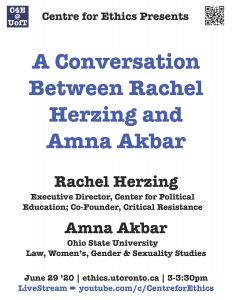
Join the Centre for Ethics for The Ethics of Black Lives Matter, an interdisciplinary series of online events featuring short video takes.
A Conversation Between Rachel Herzing and Amna Akbar
A conversation between Rachel Herzing and Amna Akbar on the organizing that came before, and the road ahead, toward prison abolition.
This is an online event. It will be live streamed on the Centre for Ethics YouTube Channel at 3pm, Monday, June 29. Channel subscribers will receive a notification at the start of the live stream. (For other events in the series, and to subscribe, visit YouTube.com/c/CentreforEthics.)
➡︎ please register here
 Rachel Herzing
Rachel Herzing
Executive Director, Center for Political Education
Co-Founder, Critical ResistanceAmna Akbar

Law
Women’s, Gender & Sexuality Studies
Ohio State University
03:00 PM - 03:30 PM
Centre for Ethics, University of Toronto
200 Larkin - Fri, Jun 26, 2020
Ethics of COVID
Natasha Tusikov, Going Cashless in an Era of Digital Payments & Surveillance (The Ethics of COVID)
Join the Centre for Ethics for The Ethics of COVID, an interdisciplinary series of online events featuring short video takes on the ethical dimensions of the COVID crisis.
Going Cashless in an Era of Digital Payments & Surveillance
The COVID-19 pandemic is accelerating the shift toward a cashless society, with consumers and retailers turning to payment cards and digital payments in efforts to avoid the perceived contagion from cash. While this shift offers some benefits, including convenience, it also penalizes those who prefer or rely upon cash. Methods of digital payments, from PayPal and Apple Pay to Square, operate surveillance-intensive business models that collect, interpret, and commodify data in order to augment existing products and create new ones. Payment platforms also have a troubling history of denying services to those they label “high risk,” including people working in the sex industry and distributing sexual or erotic content. With surveillance an intrinsic feature of digital-payment systems, what are the possible repercussions of a cashless society? What lessons can we draw from payment platforms’ campaign against sex workers to address financial exclusion and discrimination in a post-pandemic society?
This is an online event. It will be live streamed on the Centre for Ethics YouTube Channel at 3pm, Friday, June 26. Channel subscribers will receive a notification at the start of the live stream. (For other events in the series, and to subscribe, visit YouTube.com/c/CentreforEthics.)
➡︎ please register here
 Natasha Tusikov
Natasha Tusikov
Criminology Program
Department of Social Science
York University
03:00 PM - 03:30 PM
Centre for Ethics, University of Toronto
200 Larkin - Wed, Jun 24, 2020
Ethics of COVID
Vincent Chiao & Corey Brettschneider, Rights, Solidarity and the Power to Punish in States of Emergency
Join the Centre for Ethics for The Ethics of COVID, an interdisciplinary series of online events featuring short video takes on the ethical dimensions of the COVID crisis.
Rights, Solidarity and the Power to Punish in States of Emergency
Description: In the most urgent moments of the COVID-19 pandemic, apparently well-established discourses of individual rights collapsed immediately, with a wide array of social norms — e.g. concerning the use of public space, freedom of movement, freedom of contract and privacy — transforming almost literally overnight. Rights discourse proved ineffective, because unappealing; rights talk was replaced with calls for solidarity and deference to sweeping assertions of executive power, supplemented with formal and informal efforts to shame and punish those caught violating the new social norms. What lessons should we draw about how rights discourse functions in a theory of the modern administrative state? What is the place of punishment when in the face of disagreement about which social norms should prevail?
This is an online event. It will be live streamed on the Centre for Ethics YouTube Channel at 3pm, Wednesday, June 24. Channel subscribers will receive a notification at the start of the live stream. (For other events in the series, and to subscribe, visit YouTube.com/c/CentreforEthics.)
➡︎ please register here
Vincent Chiao

University of Toronto
LawCorey Brettschneider

Brown University
Political Science
03:00 PM - 03:30 PM
Centre for Ethics, University of Toronto
200 Larkin - Tue, Jun 23, 2020
Ethics of Black Lives Matter
Siddhant Issar, Reflecting on Black Lives Matter: Visions of Abolition Democracy (The Ethics of Black Lives Matter)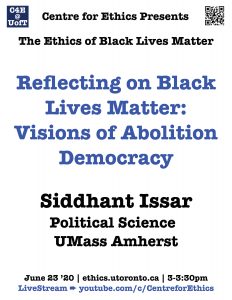
Join the Centre for Ethics for The Ethics of Black Lives Matter, an interdisciplinary series of online events featuring short video takes.
Reflecting on Black Lives Matter: Visions of Abolition Democracy
In the wake of the police murders of Breonna Taylor and George Floyd, longstanding activist demands to “defund the police” have finally gained traction. In this talk, I begin by situating contemporary demands for police abolition within the Movement for Black Lives’s (M4BL) critique of racial capitalism. The world-system of racial capitalism, for M4BL, is a foundational motor of historical and ongoing anti-Black violence. Subsequently, I argue that M4BL’s vision to contest racial capitalism—as found in their policy platform—revolves around an abolitionist democratic politics, including demands for the democratization of land and natural resources. I end by thinking about the political and normative implications of M4BL’s critique of and positive program to overcome anti-Black oppression.
This is an online event. It will be live streamed on the Centre for Ethics YouTube Channel at 3pm, Tuesday, June 23. Channel subscribers will receive a notification at the start of the live stream. (For other events in the series, and to subscribe, visit YouTube.com/c/CentreforEthics.)
➡︎ please register here
Siddhant Issar
03:00 PM - 03:30 PM
Political Science
UMass Amherst
Centre for Ethics, University of Toronto
200 Larkin - Mon, Jun 22, 2020
Ethics of COVID
Abi Adams-Prassl & Jeremias Adams-Prassl, COVID-19: Three Challenges for Labour Market Regulation (The Ethics of COVID)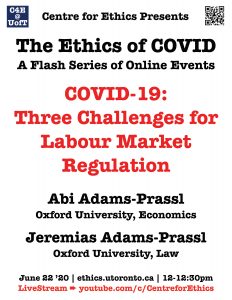
Join the Centre for Ethics for The Ethics of COVID, an interdisciplinary series of online events featuring short video takes on the ethical dimensions of the COVID crisis.
COVID-19: Three Challenges for Labour Market Regulation
Drawing on new survey evidence of the impact of Covid-19 on international labour markets, in this workshop, we set out three key challenges for Labour Market Regulation going forward. First, a number of issues raised by the explosion of working from home, including the fact that it is highly unequal, with a clear correlation between income and education/occupation: in the short run, low-income earners face significantly higher risk exposure; in the long run, how will employment law standards, from privacy to working time, have to adapt to be applicable away from the workplace? The second challenge relates to the emergency policies put in place to soften labour market impacts (such as the UK furlough scheme, or German Kurzarbeit), the curious incentives created by its rules, and the on-going confusion about its interaction with other norms, such as paid annual leave. Finally, emerging evidence suggests that women have been impacted disproportionately, raising a series about issues about the applicability of equality and anti-discrimination law.
This is an online event. It will be live streamed on the Centre for Ethics YouTube Channel at 12pm (5pm UK), Monday, June 22. Channel subscribers will receive a notification at the start of the live stream. (For other events in the series, and to subscribe, visit YouTube.com/c/CentreforEthics.)
➡︎ please register here
 Abi Adams-Prassl
Abi Adams-Prassl
Department of Economics
University of Oxford
Jeremias Adams-Prassl
12:00 PM - 12:30 PM
Faculty of Law
University of Oxford
Centre for Ethics, University of Toronto
200 Larkin - Fri, Jun 19, 2020
Ethics of Black Lives Matter
Luvell Anderson, Hermeneutical Impasses, Hermeneutical Injustices, and Progress (The Ethics of Black Lives Matter)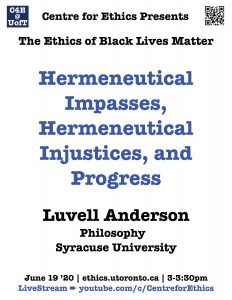
Join the Centre for Ethics for The Ethics of Black Lives Matter, an interdisciplinary series of online events featuring short video takes.
Hermeneutical Impasses, Hermeneutical Injustices, and Progress
With different voices and perspectives flooding the forum of public discourse over righting injustice, it is important to be reflective about the language of debate. The framing of public discourse can have implications for dialogue, substantive as opposed to symbolic justice, and progress.
This is an online event. It will be live streamed on the Centre for Ethics YouTube Channel at 3pm, Friday, June 19. Channel subscribers will receive a notification at the start of the live stream. (For other events in the series, and to subscribe, visit YouTube.com/c/CentreforEthics.)
03:00 PM - 03:30 PM Luvell Anderson
Luvell Anderson
Philosophy
Women’s and Gender Studies &
African American Studies
Syracuse University
Centre for Ethics, University of Toronto
200 Larkin - Tue, Jun 16, 2020
Ethics of Black Lives Matter
Ian Loader, Beyond Brutality: Political Visions in Black Lives Matter (The Ethics of Black Lives Matter)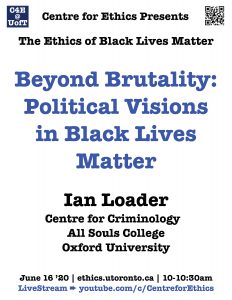
Join the Centre for Ethics for The Ethics of Black Lives Matter, an interdisciplinary series of online events featuring short video takes.
Beyond Brutality: Political Visions in Black Lives Matter
Black Lives Matter is a vibrant movement against racist brutality – in the US and far beyond. Its orientation is to expose, publicize and critique. But Black Lives Matter is also an idea. It is a movement that draws on ideas, that is animated by ideas, that is generative of ideas. So what ideas can be located in, and distilled from, the angry protests sparked by the killing of George Floyd? What different futures, what alternative political visions, animate Black Lives Matter?
This is an online event. It will be live streamed on the Centre for Ethics YouTube Channel at 10am EDT (5pm UK), Tuesday, June 16. Channel subscribers will receive a notification at the start of the live stream. (For other events in the series, and to subscribe, visit YouTube.com/c/CentreforEthics.)
➡︎ please register here
10:00 AM - 10:30 AM Ian Loader
Ian Loader
Centre for Criminology
All Souls College
University of Oxford
Centre for Ethics, University of Toronto
200 Larkin - Mon, Jun 15, 2020
Ethics of AI in Context, Ethics of COVID
Mireille Hildebrandt, Living with an Endemic Virus: EU Data Protection Law (The Ethics of COVID)➡︎ Unfortunately, this event has been cancelled. We hope to reschedule it in the future.

Join the Centre for Ethics for The Ethics of COVID, an interdisciplinary series of online events featuring short video takes on the ethical dimensions of the COVID crisis.
Living with an Endemic Virus: EU Data Protection Law
In this talk C4E-veteran Mireille Hildebrandt will discuss how EU data protection law is well suited to address the myriad balancing acts required when constitutional democracies face the prospect of hosting an enduring endemic virus. This concerns issues of human autonomy, confidentiality of communication, non-discrimination and freedom of information when preparing a return to the new normal, including workplace safety, physical distancing, contact tracing, immunity passports, and medical research. Focus of the discussion will be the aim of preventing infringements of all relevant fundamental rights, and the use of the purpose limitation principle as the core of the GDPR.
This is an online event. It will be live streamed on the Centre for Ethics YouTube Channel at 10am (4pm CET), Monday, June 15. Channel subscribers will receive a notification at the start of the live stream. (For other events in the series, and to subscribe, visit YouTube.com/c/CentreforEthics.)
➡︎ please register here
Mireille Hildebrandt
10:00 AM - 10:30 AM
Vrije Universiteit Brussels
Law Science Technology and Society Studies
Faculty of Law and Criminology
Centre for Ethics, University of Toronto
200 Larkin - Fri, Jun 12, 2020
Ethics of COVID
Nicola Lacetera, The Ethics and Economics of Paying Plasma Donors (The Ethics of COVID)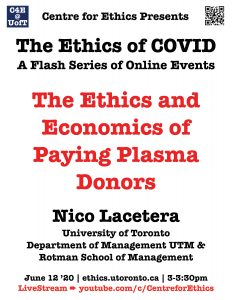
Join the Centre for Ethics for The Ethics of COVID, an interdisciplinary series of online events featuring short video takes on the ethical dimensions of the COVID crisis.
The Ethics and Economics of Paying Plasma Donors
Compensation for plasma donors—specifically, for the supply of plasma to be used for fractionation—and the establishment of for-profit plasma centers are legal activities in several countries, such as the United States, Czech Republic, and Austria. Many other countries prohibit payments.14 A common feature of most countries that ban compensation is that they run a deficit of plasma for domestic uses; therefore, they rely on imports, most often of plasma collected in countries where compensation is legal because, typically, these countries have a surplus of available plasma. The different legal status of payments to donors around the world and the international plasma procurement and allocation patterns are somewhat exemplary of the challenges in defining contested trades and in determining the reasons for bans to compensation.
In the past weeks, there has been an increased attention toward the collection of convalescent plasma. Convalescent plasma is drawn from someone who has recovered from a virus. When a person is infected with a virus, their body produces antibodies to fight it. These antibodies could be the key ingredient for a treatment to help other people with the same virus. In particular, some research is showing that plasma from recovered COVID-19 patients may help treating infected individuals. This treatment, however, requires very large quantities of plasma from recovered patients.
Should various jurisdictions reconsider their ban of payments, in order to provide stronger incentives?
In this talk, Professor Lacetera will review the ethical and economic arguments for and against compensating plasma donors. He will also review the current evidence on the social support to payments. Finally, he will expand from this specific case to discuss the challenges of policy making in the case of ethically contentious transactions.
This is an online event. It will be live streamed on the Centre for Ethics YouTube Channel at 3pm, Friday, June 12. Channel subscribers will receive a notification at the start of the live stream. (For other events in the series, and to subscribe, visit YouTube.com/c/CentreforEthics.)
➡︎ please register here
Nicola Lacetera
03:00 PM - 03:30 PM
University of Toronto
Department of Management UTM &
Rotman School of Management
Centre for Ethics, University of Toronto
200 Larkin - Wed, Jun 10, 2020
Ethics of COVID, Ethics of Black Lives Matter
Black Health Matters: Racism and Protest In the Midst of a Global Pandemic (The Ethics of Black Lives Matter)
Join the Centre for Ethics for The Ethics of Black Lives Matter, an interdisciplinary series of online events featuring short video takes.
Black Health Matters: Racism and Protest In the Midst of a Global Pandemic
In the midst of an unprecedented pandemic, we are now witnessing an unprecedented uprising, sparked by the death of George Floyd, both against police brutality as well as against white supremacy. Protests have spread across the US and, more recently, globally. We will talk about the ways in which long standing racial health inequalities, as well as the way in which the burdens of the pandemic are distributed unequally, intersect the current uprisings, including the ideologies of underlying conditions, the idea of violence as a pandemic (metaphorical and literal), and more.
This is an online event. It will be live streamed on the Centre for Ethics YouTube Channel at 3pm, Wednesday, June 10. Channel subscribers will receive a notification at the start of the live stream. (For other events in the series, and to subscribe, visit YouTube.com/c/CentreforEthics.)
➨ please register here
 Yolonda Yvette Wilson is a 2019-2020 fellow at the National Humanities Center and a 2019-2020 Encore Public Voices fellow. Her research interests include bioethics, social and political philosophy, race theory, and feminist philosophy. She is broadly interested in the nature and limits of the state’s obligations to rectify historic and continuing injustice, particularly in the realm of health care, and is developing an account of justice that articulates specific requirements for racial justice in health care at the end of life.
Yolonda Yvette Wilson is a 2019-2020 fellow at the National Humanities Center and a 2019-2020 Encore Public Voices fellow. Her research interests include bioethics, social and political philosophy, race theory, and feminist philosophy. She is broadly interested in the nature and limits of the state’s obligations to rectify historic and continuing injustice, particularly in the realm of health care, and is developing an account of justice that articulates specific requirements for racial justice in health care at the end of life.in conversation with:
03:00 PM - 03:30 PM Elena Comay del Junco is post-doctoral fellow at the Centre for Ethics, University of Toronto. Her work spans ancient philosophy and philosophy of race, with an emphasis on race and medicine
Elena Comay del Junco is post-doctoral fellow at the Centre for Ethics, University of Toronto. Her work spans ancient philosophy and philosophy of race, with an emphasis on race and medicine
Centre for Ethics, University of Toronto
200 Larkin - Mon, Jun 8, 2020
Ethics of COVID
Anna Su, Keeping the Faith During a Pandemic: Religion and COVID-19 (The Ethics of COVID)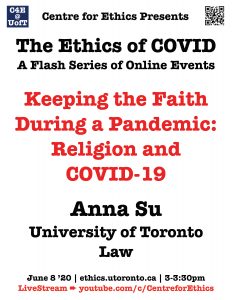
Join the Centre for Ethics for The Ethics of COVID, an interdisciplinary series of online events featuring short video takes on the ethical dimensions of the COVID crisis.
Keeping the Faith During a Pandemic: Religion and COVID-19
In this brief talk, I discuss how religion and religious liberty has been shaping comparative legal and policy responses to the COVID-19 pandemic. I also examine some of the arguments underlying the cases filed by churches against closures in US and Europe. I argue both religious communities and the outside world will have to adapt to our new reality as we urgently acknowledge how the current pandemic highlights the need for a life beyond bare existence.
This is an online event. It will be live streamed on the Centre for Ethics YouTube Channel at 3pm, Monday, June 8. Channel subscribers will receive a notification at the start of the live stream.
➡︎ please register here
Anna Su

University of Toronto
Law
03:00 PM - 03:30 PM
Centre for Ethics, University of Toronto
200 Larkin - Fri, Jun 5, 2020
Ethics of AI in Context, Ethics of COVID
Veena Dubal, Surveillance Is Not a Social Good: Technocapital, Public Health, and the Pandemic (The Ethics of COVID)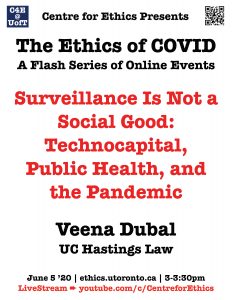
Join the Centre for Ethics for The Ethics of COVID, an interdisciplinary series of online events featuring short video takes on the ethical dimensions of the COVID crisis.
Surveillance Is Not a Social Good: Technocapital, Public Health, and the Pandemic
Technology companies are rapidly repurposing themselves amidst the global pandemic, leveraging and expanding existing surveillance economies in the name of public health. What are the potential implications and differential outcomes of these collaborations between health authorities and technocapital? This talk explores the nascent intersections of surveillance capitalism and public health and suggests a framework for anticipating and containing the anti-democratic and authoritarian practices that may emerge.
This is an online event. It will be live streamed on the Centre for Ethics YouTube Channel at 3pm, Friday, June 5. Channel subscribers will receive a notification at the start of the live stream.
➡︎ please register here
Veena Dubal

UC Hastings Law
03:00 PM - 03:30 PM
Centre for Ethics, University of Toronto
200 Larkin - Wed, Jun 3, 2020
Ethics of COVID
Benjamin P. Davis, Internationalism Under Lockdown (The Ethics of COVID)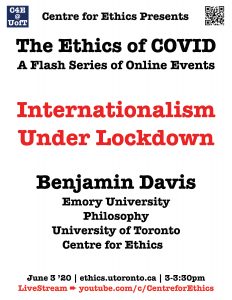
Internationalism Under Lockdown
This talk will focus on vocabularies of internationalism, solidarity, and belonging amidst the pandemic. What is the “normal” to which so many desire to return? Why are some events officially declared a “crisis” and others casually deemed business as usual? By considering the terms of the present, and by providing examples across the Americas, this discussion will offer points of connection across our taken-as-natural lines: nations, states, political memberships, and so on.
Join the Centre for Ethics for The Ethics of COVID, an interdisciplinary series of online events featuring short video takes on the ethical dimensions of the COVID crisis.
This is an online event. It will be live streamed on the Centre for Ethics YouTube Channel at 3pm, Wednesday, June 3. Channel subscribers will receive a notification at the start of the live stream.
➨ please register here
Benjamin P. Davis

Emory University/University of Toronto
Philosophy/Centre for Ethics
03:00 PM - 03:30 PM
Centre for Ethics, University of Toronto
200 Larkin - Mon, Jun 1, 2020
Conferences, Ethics of COVID
Steps from the Frontlines: Medical Student Perspectives During COVID-19 (The Ethics of COVID)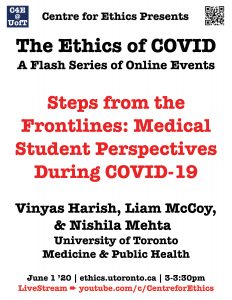
Steps from the Frontlines: Medical Student Perspectives During COVID-19
Three medical students at the University of Toronto, Vinyas Harish, Liam McCoy, and Nishila Mehta, discuss the sentiments, pressures and dilemmas associated with being a medical trainee during a global pandemic. Topics to be discussed include: (i) Learning medicine during COVID-19, (ii) “COVID competition” and pandemic productivity pressures (iii) what will change about medical education going forward.
This is an online event. It will be live streamed on the Centre for Ethics YouTube Channel at 3pm, Monday, June 1. Channel subscribers will receive a notification at the start of the live stream.
➡︎ please register here
 Vinyas Harish
Vinyas Harish
University of Toronto
Medicine and Public Health
Liam McCoy

University of Toronto
Medicine and Public Health
Nishila Mehta
03:00 PM - 03:30 PM
University of Toronto
Medicine and Public Health
Centre for Ethics, University of Toronto
200 Larkin - Fri, May 29, 2020
Ethics of COVID
John Ricco, Isolation, Loneliness, Solitude: The COVID-19 Pandemic Has Brought Us Too Close Together (The Ethics of COVID)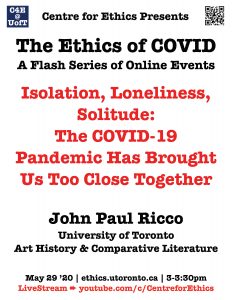
Join the Centre for Ethics for The Ethics of COVID, an interdisciplinary series of online events featuring short video takes on the ethical dimensions of the COVID crisis.
Isolation, Loneliness, Solitude: The COVID-19 Pandemic Has Brought Us Too Close Together
In this brief talk I discuss how distance is the spacing of the ethical, isolation is the evacuation of that space, loneliness is the deprivation of the self, and solitude is what we need to reclaim as the only means by which an ethical sense of the common might take place. Drawing upon the work of Arendt, Agamben, Blanchot, and Foucault, I proceed to explicate how it is that the COVID-19 pandemic has actually brought us too close together.
This is an online event. It will be live streamed on the Centre for Ethics YouTube Channel at 3pm, Friday, May 29. Channel subscribers will receive a notification at the start of the live stream.
➨ please register here
 John Paul Ricco
John Paul Ricco
University of Toronto
Art History &
Centre for Comparative Literature
03:00 PM - 03:30 PM
Centre for Ethics, University of Toronto
200 Larkin - Wed, May 27, 2020
Ethics of COVID
Alex Luscombe & Alexander McClelland, Policing the Pandemic: Counter Mapping the Expansion of COVID-19 Enforcement Across Canada (The Ethics of COVID)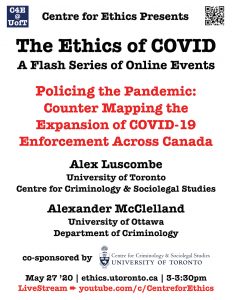
Join the Centre for Ethics for The Ethics of COVID, an interdisciplinary series of online events featuring short video takes on the ethical dimensions of the COVID crisis.
Policing the Pandemic: Counter Mapping the Expansion of COVID-19 Enforcement Across Canada
Across Canada, there has been an extraordinary scaling-up of police powers in response to the COVID-19 pandemic. Although initially, the idea circulated that COVID-19 impacted all people equally, this notion was quickly dispelled as the race and class dynamics of the pandemic became apparent. Concerned that these same dynamics would shape the application of laws and policing practices designed to contain illness, on April 4 2020, we began to monitor COVID-related police incidents across the country. Our project, called the Policing the Pandemic Mapping Project, has quickly grown into a living data repository of publicly accessible information and commentary about the emergent impacts of police responses to COVID-19. In this talk, we will reflect on the major findings of this project so far, situating them in a broader conversation about policing, inequality, and the criminalization of communicable disease. Particular attention will be paid to the dual crises currently faced by marginalized and racialized people across Canada, the crisis of COVID and the crisis of policing.
This is an online event. It will be live streamed on the Centre for Ethics YouTube Channel at 3pm, Wednesday, May 27. Channel subscribers will receive a notification at the start of the live stream.
➨ please register here
Alex Luscombe

University of Toronto
Centre for Criminology & Sociolegal Studies
 Alexander McClelland
Alexander McClelland
Department of Criminology
University of Ottawain conversation with:
 Jamie Duncan
Jamie Duncan
Ethics of AI Lab, Centre for Ethics
University of Toronto
Centre for Access to Information and Justice
University of Winnipegco-sponsored by:
03:00 PM - 03:30 PM

Centre for Ethics, University of Toronto
200 Larkin - Tue, May 26, 2020
Ethics of AI in Context, Ethics in the City
Sidewalk Toronto Revisited: Looking Back, Looking Ahead (Ethics in the City)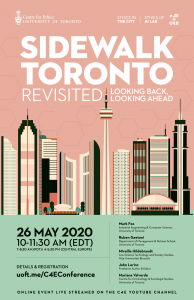
Sidewalk Toronto Revisited: Looking Back, Looking Ahead (Ethics in the City)
On January 24, 2018, the Centre for Ethics hosted what was billed as “a panel discussion of the [then nascent] Sidewalk Toronto Project, a collaboration of Google’s Sidewalk Labs and Waterfront Toronto.”
On May 7, 2020, Sidewalk Labs announced that it will no longer pursue the Sidewalk Toronto Project.
On May 26, 2020, C4E will host a follow-up to the 2018 event, featuring most of the original panel members (Mark Fox, Ruben Gaetani, John Lorinc, and Mariana Valverde), plus Mireille Hildebrandt, a leading European expert on law & technology, who has previously lectured on Sidewalk Toronto at C4E.
Join us for this online livestreamed event, as the panelists take this opportunity to look back and ahead, to see what’s changed, what hasn’t, what we (and others?) have learned, both about our local “smart city” project and the idea–and reality–of smart cities in general, elsewhere and in the future. (Videos of the original presentations are available in the Ethics in the City playlist, here.)
This is an online event. It will be live streamed on the Centre for Ethics YouTube Channel at 10am, Tuesday, May 26. Channel subscribers will receive a notification at the start of the live stream.
➨ please register here
Panelists:
Mark Fox
Industrial Engineering & Computer Science
University of TorontoRuben Gaetani
Department of Management
Rotman School
University of TorontoMireille Hildebrandt
Vrije Universiteit Brussels
Law Science Technology and Society StudiesJohn Lorinc
Freelance Author & EditorMariana Valverde
10:00 AM - 11:30 AM
Centre for Criminology & Sociolegal Studies
University of Toronto
Centre for Ethics, University of Toronto
Rm 200, Larkin Building - Mon, May 25, 2020
Ethics of COVID
Rebecca Woods, No Magic Bullet: The COVID-19 Vaccine as Technological Fix (The Ethics of COVID)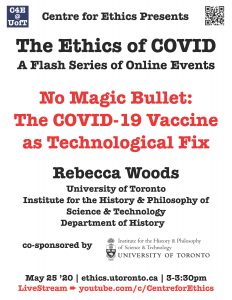
Join the Centre for Ethics for The Ethics of COVID, an interdisciplinary series of online events featuring short video takes on the ethical dimensions of the COVID crisis.
No Magic Bullet: The COVID-19 Vaccine as Technological Fix
In the throes of the current pandemic, many of us–the public, politicians, epidemiologists and other experts–are eagerly anticipating the development of a vaccine for COVID-19. As the virus migrates around the globe, and more and more people experience the disruption and hardships of lockdowns, the tendency to pin our hopes for salvation and deliverance to a vaccine–a tangible measure that promises to protect us all against the physical and economic risks of COVID-19–is more than understandable. But the impulse to approach complex societal problems (like the current pandemic) as if all they need for resolution or amelioration is a novel technology is itself problematic. Such “technological fixes,” often promoted as magic bullets, invariably produce problems of their own, creating a cascade effect in which challenge upon challenge seems to demand more and more novel fixes (often technological). In this conversation we will consider the hope and demand for a covid vaccine from this angle, examining the impulse to turn to a technological fix, why such an approach is almost destined to be a complicated and partial solution to the pandemic at most, and how thinking critically about the role of technology and society can help us come to grips with this aspect of the pandemic.
This is an online event. It will be live streamed on the Centre for Ethics YouTube Channel at 3pm, Monday, May 25. Channel subscribers will receive a notification at the start of the live stream.
➨ please register here
Rebecca Woods

Institute for the History & Philosophy of
Science & Technology
Department of History
in conversation with:
 Catherine Evans
Catherine Evans
University of Toronto
Centre for Criminology & Sociolegal Studies
Department of History
co-sponsored by:
03:00 PM - 03:30 PM
Centre for Ethics, University of Toronto
200 Larkin - Fri, May 22, 2020
Ethics of COVID
John Lorinc, The Ethics of Publishing COVID-19 Drug Research in Real Time (The Ethics of COVID)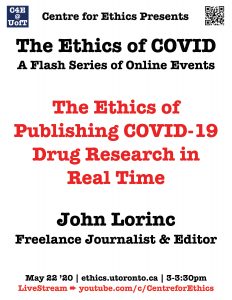
Join the Centre for Ethics for The Ethics of COVID, an interdisciplinary series of online events featuring short video takes on the ethical dimensions of the COVID crisis.
The Ethics of Publishing COVID-19 Drug Research in Real Time
The hype around hydroxychloroquine, an old malaria drug that has been informally used to treat COVID-19 , took off as rapidly as the virus spread. Inconclusive research about its efficacy spread from footnote to journal article, and finally to social media, pitched first by Elon Musk and later Donald Trump. The hype died down just as rapidly, partly due to overdose deaths but also because the Trump twitter circus moved on. Yet an abundance of serious medical research into hydroxychloroquine is ongoing, and will produce conclusive results later this year. John Lorinc will discuss his reporting about how the run on hydroxychloroquine backfired on legacy patients, exposed profound supply chain problems, and raised questions about the ethics of publishing, and then posting online, highly preliminary research results from small sample studies.
This is an online event. It will be live streamed on the Centre for Ethics YouTube Channel at 3pm, Friday, May 22. Channel subscribers will receive a notification at the start of the live stream.
➨ please register here
03:00 PM - 03:30 PM John Lorinc
John Lorinc
John Lorinc is a Toronto journalist and editor. He writes about urban affairs, politics, business and technology for national and local media, including The Globe and Mail, Maclean’s, Toronto Star and Walrus. He is a senior editor of Spacing Magazine and the Toronto non-fiction editor for Coach House Books, which has published five anthologies he’s co-edited, including The Ward. For 2019-2020, John holds the Atkinson Fellowship in Public Policy, and is researching the governance of smart city technologies.
Centre for Ethics, University of Toronto
200 Larkin - Wed, May 20, 2020
Conferences, Ethics of COVID
Racial Inequality During a Pandemic: Philosophical and Historical Perspectives (The Ethics of COVID)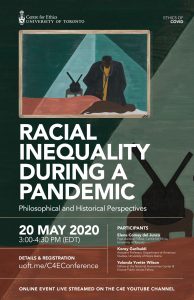
Racial Inequality During a Pandemic: Philosophical and Historical Perspectives
Among the many axes of racial inequality, disparities in health and medicine remain particularly stark. The pandemic has only exacerbated this longstanding reality, especially in the United States, where the lack of publicly funded universal health care means that poor and working-class people – among whom, as everywhere, there are disproportionate numbers of non-white racial and ethnic minorities – are at a particular disadvantage within the healthcare system(s). And, in the US, even controlling for class-based metrics, African Americans, in particular, are more likely to suffer from a panoply of health risks at significantly higher rates than their counterparts. Across the country, Black and Latino people have been vastly overrepresented among COVID victims. This workshop brings together historical and philosophical perspectives, tracing the mutations of health inequality over time, reflecting on the roots and context of the currently unfolding crisis.
This is an online event. It will be live streamed on the Centre for Ethics YouTube Channel at 3pm, Wednesday, May 20. Channel subscribers will receive a notification at the start of the live stream.
➨ please register here
 Elena Comay del Junco is post-doctoral fellow at the Centre for Ethics, University of Toronto. Her work spans ancient philosophy and philosophy of race, with an emphasis on race and medicine.
Elena Comay del Junco is post-doctoral fellow at the Centre for Ethics, University of Toronto. Her work spans ancient philosophy and philosophy of race, with an emphasis on race and medicine.
Korey Garibaldi is Assistant Professor in the Department of American Studies at Notre Dame. Garibaldi studies the social and intellectual history of the United States, with a special interest in the history of late nineteenth and twentieth-century literary production. He also studies the cultural history of race and medicine in the 20th century.
03:00 PM - 04:30 PM Yolonda Yvette Wilson is a 2019-2020 fellow at the National Humanities Center and a 2019-2020 Encore Public Voices fellow. Her research interests include bioethics, social and political philosophy, race theory, and feminist philosophy. She is broadly interested in the nature and limits of the state’s obligations to rectify historic and continuing injustice, particularly in the realm of health care, and is developing an account of justice that articulates specific requirements for racial justice in health care at the end of life.
Yolonda Yvette Wilson is a 2019-2020 fellow at the National Humanities Center and a 2019-2020 Encore Public Voices fellow. Her research interests include bioethics, social and political philosophy, race theory, and feminist philosophy. She is broadly interested in the nature and limits of the state’s obligations to rectify historic and continuing injustice, particularly in the realm of health care, and is developing an account of justice that articulates specific requirements for racial justice in health care at the end of life.
Centre for Ethics, University of Toronto
200 Larkin - Mon, May 18, 2020
Ethics of COVID
Matthew Smith, Reproducing Freedom (The Ethics of COVID)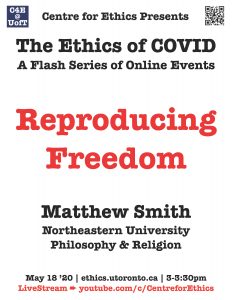
Join the Centre for Ethics for The Ethics of COVID, an interdisciplinary series of online events featuring short video takes on the ethical dimensions of the COVID crisis.
Reproducing Freedom
Contemporary political battles around COVID-19 have focused on the state-implemented lock-downs, which many on the Right are calling assaults on individual freedom. The response to these challenges is usually to gesture at “the science,” as if epidemiologists and medical doctors were obviously the philosopher-kings of the day. This talk explores how the pandemic helps us to see a richer conception of freedom – one that allows us both to challenge right wing resistance to lock-downs and to resist the simplistic medicalization of our politics as represented by the epidemiological models
This is an online event. It will be live streamed on the Centre for Ethics YouTube Channel at 3pm, Monday, May 18. Channel subscribers will receive a notification at the start of the live stream.
➨ please register here
Matthew Smith

Northeastern University
Philosophy and Religion
03:00 PM - 03:30 PM
Centre for Ethics, University of Toronto
200 Larkin - Fri, May 15, 2020
Conferences, Ethics of AI in Context
Conference: The Future of Work in the Age of Automation and AI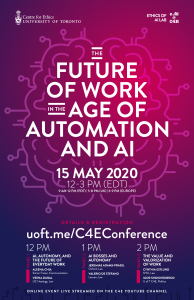
The Future of Work in the Age of Automation and AI
This international and interdisciplinary workshop, spanning nine timezones, is designed to explore the implications and complications that automation and AI have introduced into the work-leisure matrix, by considering possible futures of work that have been framed in terms of ideas and proposals such as post-work, the distribution of care-work, and the implementation of a universal basic income. The workshop aims to take a broad approach to its subject matter, by including a wide spectrum of disciplinary perspectives, ranging from moral and political philosophy to law and political economy. Workshop proceedings will appear as a symposium in the Centre’s open-access journal.
➨ please register here
Schedule
12pm [= 9am Pacific/5pm UK/6pm Central Europe]
Panel 1: AI, Autonomy, and the Future of Everyday Work
Aleena Chia (Simon Fraser, Communication), Self-making and Game-making in the Future of Work
Veena Dubal (UC Hastings, Law), The Time Politics of Digital Piecework1pm [= 10am/6pm/7pm]
Panel 2: AI Bosses and Autonomy
Jeremias Adams-Prassl (Oxford, Law), When Your Boss Comes Home: Three Fault Lines for the Future of Work in the Age of Automation, AI, and COVID-19
Valerio de Stefano (Leuven, Law), Algorithmic Bosses and How to Tame Them2pm [= 11am/7pm/8pm]
Panel 3: The Value and Valorization of Work
Cynthia Estlund (NYU, Law), Why Work Is a Social Good and Freedom Is Overrated
Igor Shoikhedbrod (U of T C4E, Politics), Revaluing and Re-Politicizing the Future of Work in the Age of Automation and AIThis is an online event. It will be live streamed on the Centre for Ethics YouTube Channel at 12pm, Friday, May 15 [= 9am Pacific/5pm UK/6pm Central Europe]. Channel subscribers will receive a notification at the start of the live stream.
12:00 PM - 03:00 PM
Centre for Ethics, University of Toronto
- Wed, May 13, 2020
Ethics of COVID
Trudo Lemmens, Pandemic Clinical Triage Protocols: Adding Insult to Injury for People with Disabilities (The Ethics of COVID)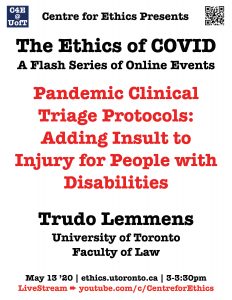
Join the Centre for Ethics for The Ethics of COVID, an interdisciplinary series of online events featuring short video takes on the ethical dimensions of the COVID crisis.
Pandemic Clinical Triage Protocols: Adding Insult to Injury for People with Disabilities
In the context of the COVID-19 pandemic, triage protocols and guidance documents have been drafted to facilitate decisions about access to critical care in situations of acute shortages. Several of these have evoked debate about their compatibility with human rights standards, even when they are presented as based on objective clinical criteria. For many people with disabilities, who feel already disproportionately affected by the pandemic and by measures to control it, some of these protocols add insult to injury. This presentation will explore why some of the Canadian documents are discriminatory and how the concerns they raise can be addressed.
This is an online event. It will be live streamed on the Centre for Ethics YouTube Channel at 3pm, Wednesday, May 13. Channel subscribers will receive a notification at the start of the live stream.
➨ please register here
Trudo Lemmens

University of Toronto
Faculty of Law
03:00 PM - 03:30 PM
Centre for Ethics, University of Toronto
200 Larkin - Tue, May 12, 2020
Ethics of COVID
Sophia Moreau & Sabine Tsuruda, The Moral and Legal Risks of Immunity Passports (The Ethics of COVID)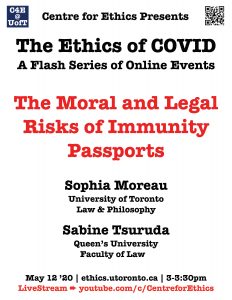
Join the Centre for Ethics for The Ethics of COVID, an interdisciplinary series of online events featuring short video takes on the ethical dimensions of the COVID crisis.
The Moral and Legal Risks of Immunity Passports
A number of policymakers have recently begun to consider whether to require “immunity passports” certifying immunity to COVID-19 before returning to workplaces, and even stores, museums, and other public spaces. While critics question the reliability of available antibody tests, such an exit strategy has yet to be seriously challenged on moral and legal grounds. This talk discusses how immunity passports—whether for natural immunity now, or for vaccines at a later date—would unfairly burden the least privileged members of society in ways that raise major civil rights concerns.
This is an online event. It will be live streamed on the Centre for Ethics YouTube Channel at 3pm, Tuesday, May 12. Channel subscribers will receive a notification at the start of the live stream.
➨ please register here
 Sophia Moreau
Sophia Moreau
University of Toronto
Faculty of Law
Department of Philosophy
03:00 PM - 03:30 PM Sabine Tsuruda
Sabine Tsuruda
Queen’s University
Faculty of Law
Centre for Ethics, University of Toronto
200 Larkin - Mon, May 11, 2020
Ethics of COVID
Padraic X. Scanlan, Beats Working: Wage-Replacements in Past and the Present (The Ethics of COVID)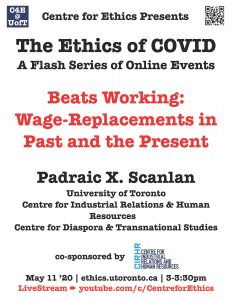
Join the Centre for Ethics for The Ethics of COVID, an interdisciplinary series of online events featuring short video takes on the ethical dimensions of the COVID crisis.
Beats Working: Wage-Replacements in Past and the Present
In response to the COVID-19 pandemic, governments across the world have experimented with schemes to prevent layoffs and encourage workers to stay home by paying some, or all, of their wages. In the late eighteenth and early nineteenth centuries, the ruptures of industrialisation – automation, downward pressure on wages, rapid urbanisation – provoked some governments to top up labourers’ wages to a minimum. However, by the 1830s, most of these programs had been swept away by the rise of liberalism and laissez-faire capitalism. To some critics, wage subsidies seemed to violate the putatively natural laws of the market. To others, they seemed to present a moral hazard: why would labourers continue to work if they did not need wages to survive? The pandemic, and government responses to it, have reignited these foundational debates about the purpose of wages, the nature of the labour market, and the role of governments in political economy.
This is an online event. It will be live streamed on the Centre for Ethics YouTube Channel at 3pm, Monday, May 11 [video]. Channel subscribers will receive a notification at the start of the live stream.
➨ please register here
Padraic X. Scanlan

University of Toronto
Centre for Industrial Relations & Human Resources
Centre for Diaspora & Transnational Studies
In conversation with:
 Dionne Pohler
Dionne Pohler
Centre for Industrial Relations and Human Resources
University of Toronto
and Christopher M. Florio
Christopher M. Florio
Department of History
Hollins Universityco-sponsored by:
03:00 PM - 03:30 PM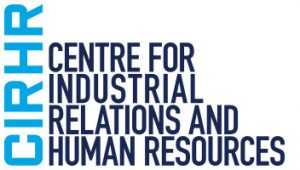
Centre for Ethics, University of Toronto
200 Larkin - Fri, May 8, 2020
Ethics of COVID
Tanya L. Sharpe, Moving from a Moment to a Movement: #30@8:30 (The Ethics of COVID)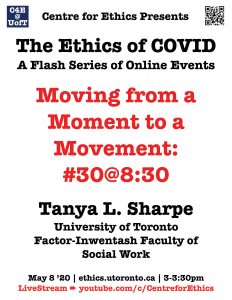
Join the Centre for Ethics for The Ethics of COVID, an interdisciplinary series of online events featuring short video takes on the ethical dimensions of the COVID crisis.
Moving from a Moment to a Movement: #30@8:30
How is COVID-19 affecting some of our most vulnerable populations & how can we ensure that we are responding to their needs? Efforts to responds to these questions sparked the evolution of The Centre for Research & Innovation for Black Survivors of Homicide Victims (The CRIB) “30@8:30” — weekly, 7-part series of Instagram Live talks focused on COVID-19’s impact on vulnerable populations throughout our global community.
This is an online event. It will be live streamed on the Centre for Ethics YouTube Channel at 3pm, Friday, May 8. Channel subscribers will receive a notification at the start of the live stream.
➨ please register here
Tanya L. Sharpe

University of Toronto
Factor-Inwentash Faculty of Social Work
03:00 PM - 03:30 PM
Centre for Ethics, University of Toronto
200 Larkin - Wed, May 6, 2020
Ethics of COVID
Teresa Scassa, Pandemic Privacy (The Ethics of COVID)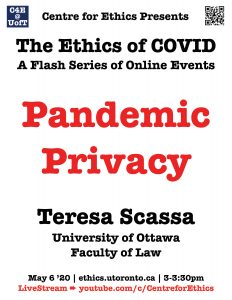
Join the Centre for Ethics for The Ethics of COVID, an interdisciplinary series of online events featuring short video takes on the ethical dimensions of the COVID crisis.
Pandemic Privacy
The COVID-19 pandemic raises a number of privacy issues ranging from tracking and surveillance to increased pooling and sharing of public and private sector data. These issues tend to pit privacy rights against a public interest sharpened by a health crisis and unprecedented economic disruption. Data-driven technological solutions are being developed and deployed with astonishing speed. Using contact-tracing apps as an illustration, this talk explores the particular features and preoccupations of pandemic privacy.
This is an online event. It will be live streamed on the Centre for Ethics YouTube Channel at 3pm, Wednesday, May 6. Channel subscribers will receive a notification at the start of the live stream.
➨ please register here
Teresa Scassa

University of Ottawa
Faculty of Law
03:00 PM - 03:30 PM
Centre for Ethics, University of Toronto
200 Larkin - Mon, May 4, 2020
Ethics of COVID
Catherine Evans, Expertise and Objectivity in Crisis: A Historical Perspective (The Ethics of COVID)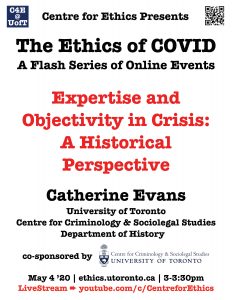
Join the Centre for Ethics for The Ethics of COVID, an interdisciplinary series of online events featuring short video takes on the ethical dimensions of the COVID crisis.
Expertise and Objectivity in Crisis: A Historical Perspective
In recent years, scholars and commentators have decried what some have seen as the decline of the expert. Dismissed as stooges of the liberal elite or as peddlers of ‘fake news’, doctors, scientists, epidemiologists, psychologist and others, including historians, have criticized the public and government officials for privileging common sense over deep learning. COVID-19 has thrown these debates over expertise and authority into sharp relief. Politicians in Canada and elsewhere now look to science, and scientists, to guide us. As they do, they often hail science as apolitical, pledging to proceed only as, and when, public health authorities recommend. But is science ever ‘objective’? If it isn’t, should we care? Here, I offer some thoughts on the history of expertise, objectivity, and authority, and how a historical perspective can help us to approach ethical decision-making in turbulent times.
This is an online event. It will be live streamed on the Centre for Ethics YouTube Channel at 3pm, Monday, May 4. Channel subscribers will receive a notification at the start of the live stream.
➨ please register here
 Catherine Evans
Catherine Evans
University of Toronto
Centre for Criminology & Sociolegal Studies
Department of History
in conversation with:
Rebecca Woods
Institute for the History & Philosophy of
Science & Technologyco-sponsored by:
03:00 PM - 03:30 PM

Centre for Ethics, University of Toronto
200 Larkin - Fri, May 1, 2020
Ethics of COVID
Roberta K. Timothy, Race Matters: Ethical Implications of COVID-19 (The Ethics of COVID)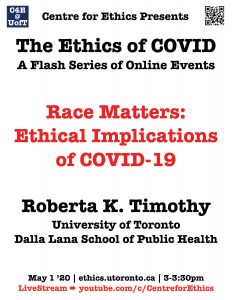
Join the Centre for Ethics for The Ethics of COVID, an interdisciplinary series of online events featuring short video takes on the ethical dimensions of the COVID crisis.
Race Matters: Ethical Implications of COVID-19
The actions and omissions of world leaders,public health leaders, and policy makers in charge of fighting the COVID-19 pandemic will reveal historical and current impacts of colonial violence and continued health inequities among African, Indigenous, racialized, and marginalized folks. Utilizing a critical intersectional decolonizing framework, this discussion will talk about the ethical dilemmas within the COVID-19 responses.
This is an online event. It will be live streamed on the Centre for Ethics YouTube Channel at 3pm, Friday, May 1. Channel subscribers will receive a notification at the start of the live stream.
➨ please register here
 Roberta K. Timothy
Roberta K. Timothy
University of Toronto
Dalla Lana School of Public Health
03:00 PM - 03:30 PM
Centre for Ethics, University of Toronto
200 Larkin - Wed, Apr 29, 2020
Ethics of COVID
Nina Sun & Livio Zilli, Criminalization & COVID-19: Public Health and Human Rights Implications (The Ethics of COVID)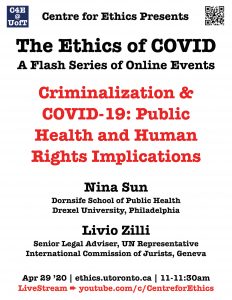
Join the Centre for Ethics for The Ethics of COVID, an interdisciplinary series of online events featuring short video takes on the ethical dimensions of the COVID crisis.
Criminalization & COVID-19: Public Health and Human Rights Implications
As the COVID-19 pandemic continues, countries are increasingly turning to criminal sanctions as a means to enforce social distancing and control the epidemic. Taking an interdisciplinary approach of law, policy-making and public health, our speakers discuss the health and human rights considerations of criminalization of COVID-19.
This is an online event. It will be live streamed on the Centre for Ethics YouTube Channel at 11am, Wednesday, April 29. Channel subscribers will receive a notification at the start of the live stream.
➡︎ please register here
 Nina Sun
Nina Sun
Deputy Director – Global Health
Assistant Clinical Professor – Community Health and Prevention
Dornsife School of Public Health
Drexel University, PhiladelphiaLivio Zilli
11:00 AM - 11:30 AM
Senior Legal Adviser, UN Representative
International Commission of Jurists, Geneva
Centre for Ethics, University of Toronto
200 Larkin - Mon, Apr 27, 2020
Ethics of COVID
Elena Comay del Junco & Gal Katz, Philosophers as Pundits (During a Pandemic) (The Ethics of COVID)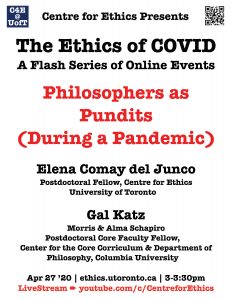
Join the Centre for Ethics for The Ethics of COVID, an interdisciplinary series of online events featuring short video takes on the ethical dimensions of the COVID crisis.
Philosophers as Pundits (During a Pandemic)
Any major event generates an avalanche of punditry, and this pandemic is no exception. Inevitably, much of this commentary consists of bad takes. And, philosophers seem particularly prone to embarrassing themselves. We consider a few initial responses to the current crisis from prominent philosophers, and situate these in a longer lineage of philosophers trying to comment on current events. Despite the predominance of bad takes, it’s precisely the naivete of philosophers that makes their interventions of value.
This is an online event. It will be live streamed on the Centre for Ethics YouTube Channel at 3pm, Monday, April 27. Channel subscribers will receive a notification at the start of the live stream.
➨ please register here
Elena Comay del Junco

University of Toronto
Postdoctoral Fellow, Centre for Ethics
03:00 PM - 03:30 PM Gal Katz
Gal Katz
Morris & Alma Schapiro Postdoctoral Core Faculty Fellow
Center for the Core Corriculum &
Department of Philosophy, Columbia University
Centre for Ethics, University of Toronto
200 Larkin - Fri, Apr 24, 2020
Ethics of COVID
Petra Molnar, Borders and Pandemics: Surveillance Won’t Stop the Coronavirus (The Ethics of COVID)
Join the Centre for Ethics for The Ethics of COVID, an interdisciplinary series of online events featuring short video takes on the ethical dimensions of the COVID crisis.
Borders and Pandemics: Surveillance Won’t Stop the Coronavirus
Pandemic responses are political, just like responses to people crossing borders. As governments increasingly move toward biosurveillance to contain the spread of the pandemic, we are already seeing an increase in tracking, automated drones and other types of technologies presented as viable solutions to manage the outbreak and control migration. However, if previous use of technology is any indication, refugees and people crossing borders will be disproportionately targeted. Virus-killing robots, cellphone tracking and artificially intelligent thermal cameras can all be used against refugees and people crossing borders, with far-reaching results and impacts of various human rights.
This is an online event. It will be live streamed on the Centre for Ethics YouTube Channel at 3pm, Friday, April 24. Channel subscribers will receive a notification at the start of the live stream.
➡︎ please register here
03:00 PM - 03:30 PM Petra Molnar
Petra Molnar
International Human Rights Program
University of Toronto
Centre for Ethics, University of Toronto
200 Larkin - Wed, Apr 22, 2020
Ethics of COVID
Nicola Lacetera, The Social and Ethical Support of Markets in a Pandemic (The Ethics of COVID)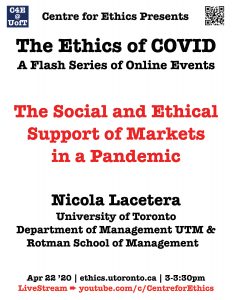
Join the Centre for Ethics for The Ethics of COVID, an interdisciplinary series of online events featuring short video takes on the ethical dimensions of the COVID crisis.
The Social and Ethical Support of Markets in a Pandemic
I plan to provide an introduction to the idea of social support of markets and to what a “repugnant transaction” is. I will then discuss some of the ethical issues with the normal functioning of markets during this pandemic. In particular, I will discuss price gouging as well as the production of vaccines and other covid-related products (from hand sanitizers to ventilators and vaccines…).
This is an online event. It will be live streamed on the Centre for Ethics YouTube Channel at 3pm, Wednesday, April 22. Channel subscribers will receive a notification at the start of the live stream.
➡︎ please register here
Nicola Lacetera
03:00 PM - 03:30 PM
University of Toronto
Department of Management UTM &
Rotman School of Management
Centre for Ethics, University of Toronto
200 Larkin - Mon, Apr 20, 2020
Ethics of COVID
Sunit Das, Terraforming the Ethical Landscape: COVID-19 and the Principle of Justice (The Ethics of COVID)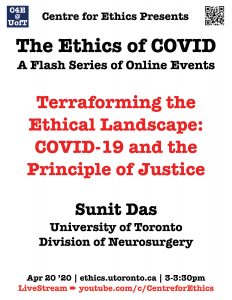
Join the Centre for Ethics for The Ethics of COVID, an interdisciplinary series of online events featuring short video takes on the ethical dimensions of the COVID crisis.
Terraforming the Ethical Landscape: COVID-19 and the Principle of Justice
The four principle approach to medical ethics, balancing prima facie obligations to beneficence, nonmaleficence, autonomy, and justice, has supplied a common language for the application of ethical analysis to medical practice for the last four decades. The frayed edges of this edifice are made visible, however, by the ongoing COVID-19 pandemic (and other historical circumstances of severe resource limitation in the healthcare system). Here, we interrogate ethical considerations involved in the state of medical care during the COVID-19 pandemic, as demonstrated by reconsiderations of cancer care, in which the pillar of justice is exposed as internally divided. Specifically, we identify both patient-oriented and system-oriented principles of justice constituting a broader collective, unique among the classical four principles. This leads us to suggest a formal recognition of justice as a divided category, and a reclassification of the term into two subcategories which serve fundamentally different interests. The result is a more cohesive four principle approach in which all principles favour the deontological relationships fostered between patients and providers, which exists in constant balance with the utilitarian interests of the broader medical system.
This is an online event. It will be live streamed on the Centre for Ethics YouTube Channel at 3pm, Monday, April 20. Channel subscribers will receive a notification at the start of the live stream.
➡︎ please register here
Sunit Das
03:00 PM - 03:30 PM
University of Toronto Faculty of Medicine, Division of Neurosurgery, St. Michael’s Hospital & Centre for Ethics, University of Toronto
Centre for Ethics, University of Toronto
200 Larkin - Fri, Apr 3, 2020
Author Meets Critics
Brian Cantwell Smith, The Promise of Artificial Intelligence: Reckoning and Judgment (Author Meets Critics)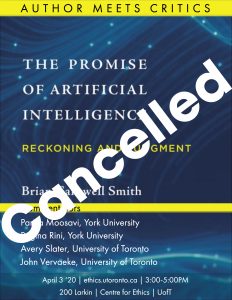
Per University of Toronto COVID-19 instructions, this event is cancelled until further notice.
The Promise of Artificial Intelligence: Reckoning and Judgment (MIT Press 2019)
Brian Cantwell Smith
Faculty of Information
University of TorontoCommentators:
Parisa Moosavi (York University, Philosophy)
Regina Rini (York University, Philosophy)
Avery Slater (University of Toronto, English)
John Vervaeke (University of Toronto, Cognitive Science)☛ please register here
In this provocative book, Brian Cantwell Smith argues that artificial intelligence is nowhere near developing systems that are genuinely intelligent. Second wave AI, machine learning, even visions of third-wave AI: none will lead to human-level intelligence and judgment, which have been honed over millennia. Recent advances in AI may be of epochal significance, but human intelligence is of a different order than even the most powerful calculative ability enabled by new computational capacities. Smith calls this AI ability “reckoning,” and argues that it does not lead to full human judgment—dispassionate, deliberative thought grounded in ethical commitment and responsible action. Taking judgment as the ultimate goal of intelligence, Smith examines the history of AI from its first-wave origins (“good old-fashioned AI,” or GOFAI) to such celebrated second-wave approaches as machine learning, paying particular attention to recent advances that have led to excitement, anxiety, and debate. He considers each AI technology’s underlying assumptions, the conceptions of intelligence targeted at each stage, and the successes achieved so far. Smith unpacks the notion of intelligence itself—what sort humans have, and what sort AI aims at.
Smith worries that, impressed by AI’s reckoning prowess, we will shift our expectations of human intelligence. What we should do, he argues, is learn to use AI for the reckoning tasks at which it excels while we strengthen our commitment to judgment, ethics, and the world.
03:00 PM - 05:00 PM
Centre for Ethics, University of Toronto
Rm 200, Larkin Building - Wed, Apr 1, 2020
Ethics at Noon
Lauren Bialystok, Authenticity and Social Justice (Ethics@Noon)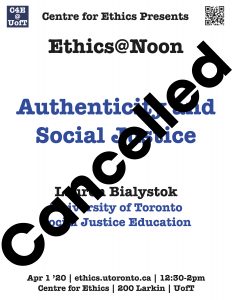
Per University of Toronto COVID-19 instructions, this event is cancelled until further notice.
Authenticity and Social Justice
When discussions of social justice hinge on the politics of identity, as they currently seem to, we rely on unreflective assessments of authenticity to verify people’s identities. But these determinations can be arbitrary and yield contradictory intuitions. I use two case studies to illustrate this problem: Joseph Boyden, whose indigeneity was more or less revoked, and the CAMH Gender Identity Clinic for children that was recently closed down. In the first case, social justice advocates sided against Boyden, arguing that he was not authentically indigenous and therefore should not have the authority to continue representing indigenous Canadians. In the second case, the clinic was censured for supposedly failing to recognize the authenticity of transgender children, which social justice advocates are loath to question. Yet both cases involve an elusive internal identity that resists empirical or political confirmation. The demands of progressiveness, or allyship to vulnerable communities (such as indigenous peoples and trans people), appear to pull in opposing directions on these hot-button issues, with potentially far-reaching consequences. I use theories of authenticity to analyze the assumptions that give rise to these political intuitions, and argue for an ethics of difference that is less tethered to judgments of identity.
☛ please register here
Lauren Bialystok
12:30 PM - 02:00 PM
University of Toronto
Social Justice Education
Centre for Ethics, University of Toronto
200 Larkin - Tue, Mar 31, 2020
Ethics of AI in Context
Azim Shariff, Moral Machines: The Social Dilemmas of Self-Driving Cars (Ethics of AI in Context)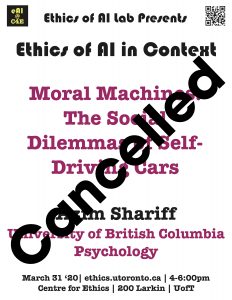
Per University of Toronto COVID-19 instructions, this event is cancelled until further notice.
Moral Machines: The Social Dilemmas of Self-Driving Cars
With the rapid approach of self-driving cars, we are poised to yield autonomy to millions of machines that will have the power over life and death. The road to this future has a bright promise, but as we are beginning to see, there are numerous psychological roadblocks. Many of these involve thorny ethical challenges that come when the moral decisions that are today made by individual drivers are turned over to preprogrammed algorithms. How should these cars be programmed to mete out risks to the various people on road? Who determines the ethics of these algorithms? I will discuss the recent work with my collaborators on the social psychological challenges that await us in the age of moral machines.
☛ please register here
Azim Shariff
04:00 PM - 06:00 PM
University of British Columbia
Psychology
Centre for Ethics, University of Toronto
200 Larkin - Fri, Mar 27, 2020
Reading Series, Ethics & the Arts
Poetics/Ethics: New Work by Queer Poets IV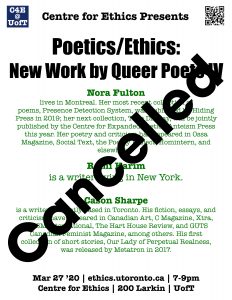
Per University of Toronto COVID-19 instructions, this event is cancelled until further notice.
Poetics/Ethics: New Work by Queer Poets IV
This is the fourth of four readings that will showcase contemporary queer poets, based on the notion that ethics should be conceived as encompassing not just academic research but also literary writing. Each of these poets crafts new languages to describe and confront the interplay of lived experience and political critique. By bringing them together, we hope not only to foster a conversation between the authors of some of the most exciting poetry being written today, but also some of the most complex and subtle thinking about gender and sexuality and their intersections with race, class, migration and other positions.
☛ please register here
 Nora Fulton lives in Montreal. Her most recent collection of poems, Presence DetectionSystem, was published by Hiding Press in 2019; her next collection, Thee Display, will be jointly published by the Centre for Expanded Poetics/Anteism Press this year. Her poetry and criticism has appeared in Ossa Magazine, Social Text, the Poetry Project, Homintern, and elsewhere.”
Nora Fulton lives in Montreal. Her most recent collection of poems, Presence DetectionSystem, was published by Hiding Press in 2019; her next collection, Thee Display, will be jointly published by the Centre for Expanded Poetics/Anteism Press this year. Her poetry and criticism has appeared in Ossa Magazine, Social Text, the Poetry Project, Homintern, and elsewhere.”
Rami Karim is a writer living in New York.

Cason Sharpe is a writer currently based in Toronto. His fiction, essays, and criticism haveappeared in Canadian Art, C Magazine, Xtra, PRISM International, The Hart House Review, and GUTS Canadian Feminist Magazine, among others. His first collection of short stories, Our Lady of Perpetual Realness, was released by Metatron in 2017.
07:00 PM - 09:00 PM
Centre for Ethics, University of Toronto
200 Larkin - Thu, Mar 26, 2020
Ethics of Pedagogy
Simone Weil Davis & Lorraine Pinnock, Teaching, Learning, and Unlearning Together: Walls to Bridges as a Pedagogical Practice (Ethics of Pedagogy)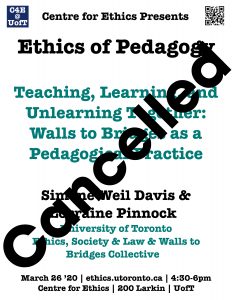
Per University of Toronto COVID-19 instructions, this event is cancelled until further notice.
Walls to Bridges brings together incarcerated students and university-based students in courses that emphasise dialogue, collaboration, whole-self learning and the building of a classroom community based on mutual respect and honest, shared inquiry. In this presentation two longstanding members of the Walls to Bridges Collective, Lorraine and Simone Davis, will introduce this innovative educational model. An emphasis on two of its features — dialogue across (multiple) differences and the role of emotions in the classroom — will open up questions about the classroom as ethical terrain.
Presenters:
Simone Weil Davis, Associate Director of the Ethics, Society & Law program at Trinity College, is also a proud member of the Walls to Bridges Collective, and co-founded the national Walls to Bridges program in 2011. W2B brings together university-based students and incarcerated students as classmates in courses that emphasize the importance of teaching, learning and unlearning through dialogue and collaboration. Her written work includes the co-edited Turning Teaching Inside Out: A Pedagogy of Transformation for Community-Based Learning (2013), lead volume in Palgrave’s Community Engagement in Higher Education series (Palgrave 2013).
Lorraine Pinnock is on a mission to help people as they transition from the criminal injustice system to healthy communities. After spending nearly five years under correctional institution supervision, she believes that providing disadvantaged people with some form of higher education and academic development can radically ensure one’s success and break the revolving door trap of admission, discharge, and re-admission to incarceration.
She is a founding member of the Walls-to-Bridges Collective, based in Kitchener, Ontario. She holds a Bachelor of Arts in Women’s Studies from Laurentian University. She counts spending time with her family and dog Wiley, running, traveling and soup-tasting among her myriad interests.
☛ please register here
04:30 PM - 06:00 PM
Centre for Ethics, University of Toronto
200 Larkin - Fri, Mar 20, 2020
C4E Flash Event
Corporate Social Responsibility Meets International Human Rights Law: The Nevsun Case (C4E Flash Event)
Per University of Toronto COVID-19 instructions, this event is cancelled until further notice.
Corporate Social Responsibility Meets International Human Rights Law: The Nevsun Case
The Supreme Court of Canada recently handed down its judgment in Nevsun Resources v Araya et al., a landmark case at the intersection of corporate social responsibility and international human rights law. The Court decided that a Canadian mining company (Nevsun Resources Ltd.) can be sued in Canada for alleged human-rights abuses abroad (including slavery; forced labour; cruel, unusual, or degrading treatment; and crimes against humanity).
The University of Toronto Law School’s International Human Rights Program (IHRP) intervened in the case, represented by Cory Wanless (JD 2008), Professor Audrey Macklin (UofT Law), and former IHRP research associate Yolanda Song (JD 2017), to argue–successfully–that corporations cannot rely on the “act of state” doctrine in Canadian courts by arguing that the acts in question were the acts of a foreign government (in this case, Eritrea). The IHRP team also included Madeline Torrie (2L) and Nicole Thompson (2L).
☛ please register here
Panelists will include:
Yolanda Song (Stevenson Whelton LLP)
12:00 PM - 02:00 PM
Cory Wanless (Waddell Phillips PC)
Jutta Brunée (University of Toronto, Law)
Roxanna Banu (Queen Mary University, London, Law) [remotely]
Hasko von Kriegstein (Ryerson University, Ted Rogers School of Management)
Centre for Ethics, University of Toronto
200 Larkin - Wed, Mar 18, 2020
Ethics at Noon
Teresa Heffernan, Fiction Writes Back: “Limitless Profit,” Artificial Intelligence, and the Immortality Industry (Ethics@Noon)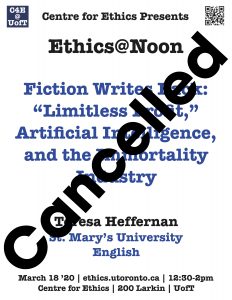
Per University of Toronto COVID-19 instructions, this event is cancelled until further notice.
Fiction Writes Back: “Limitless Profit,” Artificial Intelligence, and the Immortality Industry
This talk begins with an investigation of the far reaches of the multi-billion-dollar immortality/AI industry and the money and power behind the scenes that fuels fantasy science as the planet teeters on the brink of collapse. It considers contemporary fictions that have, in turn, challenged the tech industry and its use of fiction to market this science, exposing its ideological underpinnings and its paradoxical escalation of the end of all life even as it hankers after immortality. While the tech industry is relentlessly focused on a future that is always “future” and never part of a past, I consider its archaeology by unearthing the future’s archaic longings: one of the oldest and longest surviving stories in the world, The Epic of Gilgamesh, is about a tyrannical king who wants immortality. In failing in his quest, however, Gilgamesh learns what it means to live as an ethical human being. Drawing on the lesson in this ancient epic, the talk concludes with a reflection on the connection between mortality, responsibility, and freedom. Exposing the branding of fiction as science by the AI/immortality industry, reclaiming the potential of fiction to cultivate an ethical imagination, and restoring the importance of death to life are important steps, this talk argues, in halting the catastrophic decline of the planet.
☛ please register here
Teresa Heffernan
12:30 PM - 02:00 PM
St. Mary’s University
English
Centre for Ethics, University of Toronto
200 Larkin - Tue, Mar 17, 2020
Ethics of AI in Context
Igor Shoikhedbrod, Re-Politicizing the Future of Work in the Age of Automation and AI (Ethics of AI in Context)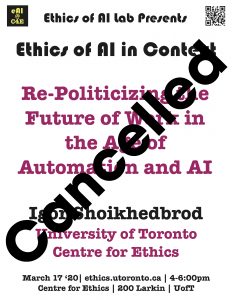
Per University of Toronto COVID-19 instructions, this event is cancelled until further notice.
Re-Politicizing the Future of Work in the Age of Automation and AI
The spectre of generalized automation and the unprecedented pace of developments in intelligent machine learning have brought into question the future of work and its normative value. The issues raised by ongoing debates about the future of work are undeniably interdisciplinary in scope—ranging from considerations in moral and political philosophy to economics, labour studies, and even futurism. With this interdisciplinary terrain in mind, the talk will take as its point of departure the ethical implications of automation and AI through a critical dialogue between normative political philosophy and political economy. I will begin by outlining the widespread empirical evidence suggesting that automation and AI will radically transform the ways that human beings conceive, perform, and grapple with work. Such empirical considerations, which include prognoses of mass unemployment, under-employment, as well as utopian and dystopian renditions of complete automation, necessitate a prior discussion about the normative value that is assigned to work and working. Indeed, even the most pragmatic policy questions about whether automation should be welcomed or discouraged are predicated upon the value or disvalue that commentators assign to work. I will argue that the meaning of work should be fundamentally rethought and contested in the age of automation and AI. Rather than calling for the abolition of work (i.e. post-work) and resigning to an abstractly-conceived universal basic income, priority should be given to reducing necessary labour-time through regulatory constraints that are wrested politically. Such a reduction in necessary labour-time should coincide with a diversification of the range of skills and activities that are performed by human beings in the age of automation and AI. However, these goals can only be achieved by revaluing and re-politicizing the future of work.
➡︎ please register here
04:00 PM - 06:00 PM Igor Shoikhedbrod
Igor Shoikhedbrod
University of Toronto
Centre for Ethics
Centre for Ethics, University of Toronto
200 Larkin - Wed, Mar 11, 2020
Ethics of AI in Context: Emerging Scholars
Matthew Mahmoudi, Urban Technologies and Refugee Integration: Reinforcing Marginality? (Ethics of AI Emerging Scholars)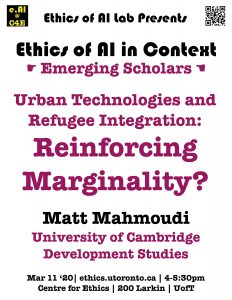
Urban Technologies and Refugee Integration: Reinforcing Marginality?
As emergent digital integration strategies are increasingly shaping urban refuge in cities such as Berlin and New York, it is important to interrogate whether they exclude, adversely include, or empower vulnerable migrant populations. The concept of the “smart city” is no longer sufficient to describe the ways these technologies invariably sort and control migrant bodies. Rather, the implications of this transition of technology actors into an emergent mobility-tech industry is better understood through an acknowledgement of a “digital periphery”– a digital enclosure in which the iconography of non-agentic others sustain value extraction from racialised bodies and places.
☛ please register here
Matt Mahmoudi

Cambridge
Development StudiesMatt Mahmoudi is a PhD candidate in Development Studies at the University of Cambridge, where he is also Program Lead at TheWhistle.org, an academic spin-out developing and researching digital human rights reporting suites. As Jo Cox Scholar, his research focuses on technological marginalisation in refugees and asylum seekers and examines the justice implications of new digital boundaries to life in cities in an era of “datafied refuge”. Matt co-coordinates the Cambridge branch of Amnesty International’s Digital Verification Corps, and co-founded and co-produces Declarations: The Human Rights Podcast at Cambridge’s Centre of Governance & Human Rights. Matt is a coauthor on forthcoming OUP book ‘Digital Witness’.
04:00 PM - 05:30 PM
Centre for Ethics, University of Toronto
200 Larkin - Mon, Mar 9, 2020
Events in the Community
Hilary Evans Cameron, Better Refugee Status Decisions, One Road Sign at a Time
The Ethics, Society, and Law Students’ Association invites you to come out on March 9, 2020 to the Centre for Ethics (LA200) seminar room from 12:30pm-2pm, where Dr. Hilary Evans Cameron will discuss decision-making in refugee claims proceedings.
For more than a decade, Dr. Evans Cameron has studied the legal environment in which adjudicators decide claims to refugee status, with a focus on their fact-finding and credibility judgments. In this talk, she discusses her research, which uses a range of methodologies and looks beyond the law to insights from the social sciences. She argues that crucial changes are needed to improve these high-stakes decisions.
☛ please register here
12:30 PM - 02:00 PM
Centre for Ethics, University of Toronto
Rm 200, Larkin Building - Wed, Mar 4, 2020
Ethics & the Arts, Ethics & Film: Lights, Camera, Ethics!, Ethics in the City
My Winnipeg (2007) (Ethics in the City Films)Guy Maddin blends fact and fiction, documentary and drama, reality and myth in this dreamy black-and-white tour of Winnipeg. Widely regarded as Maddin’s best film, My Winnipeg won the award for Best Canadian Feature Film when it premiered at the 2007 Toronto International Film Festival (TIFF). A 2015 poll conducted by TIFF named it one of the Top 10 Canadian films of all time, while another in 2016 listed it as one of 150 essential works in Canadian cinema history.
☛ please register here
06:00 PM - 08:00 PM
Centre for Ethics, University of Toronto
Rm 200, Larkin Building - Wed, Mar 4, 2020
Ethics at Noon
Christina Starmans, How Temptation Makes Us Moral (Ethics@Noon)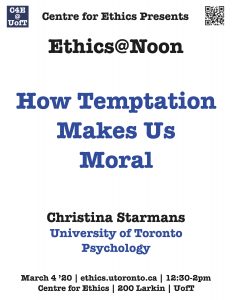
How Temptation Makes Us Moral
People often know the right thing to do, but also feel tempted to do the wrong thing: to cheat on our taxes or our spouses, lie to avoid trouble, or to skip out on a promise. How do these struggles with temptation affect our moral judgments?
Two opposing answers to this question arise from two strands of moral philosophy. One might agree with Aristotle, who argued that an act should only be considered moral if it is easy for the actor to do. Or one might side with Kant, who argued that an action is only truly moral if it is difficult—actions done simply out of desire should not count as particularly moral. Which of these philosophies—if either—captures our everyday moral psychology?
To explore these questions, I will review a series of studies examining how both adults and young children reason about inner conflict and temptation. The first series of studies reveals that in many cases, adults take a Kantian perspective on temptation, and judge that someone who has acted morally in the face of temptation deserves more moral credit than someone who acted morally and was never tempted to be immoral. Conversely, children (aged 3-8 years) take a more Aristotelian stance, and give more moral credit to the person who was never tempted to act immorally. I will then discuss a series of studies exploring what factors lead to children’s moral judgments developing into an adult framework, and how these factors may also shed light on adults’ moral reasoning.
A final series of studies explores the circumstances under which adults will give others credit for overcoming temptation. The findings above are puzzling in light of other work on adult moral judgments, which find that when someone makes a good moral choice quickly (which suggests that they are not internally conflicted), they are given more moral praise than someone who makes a good moral choice after long deliberation (which suggests that they are internally conflicted). Investigating these conflicting findings reveals that adults, like Kant, consider the presence of (at least some degree of) temptation to be necessary in order for someone to deserve moral credit.
☛ please register here
Christina Starmans
12:30 PM - 02:00 PM
University of Toronto
Psychology
Centre for Ethics, University of Toronto
200 Larkin - Mon, Mar 2, 2020
C4E Flash Event
Tom Angier, The Ethics of Brexit (C4E Flash Event)
The Ethics of Brexit
After the EU referendum of June 2016, the UK experienced three and half years of political and social dissension, of a depth and on a scale unprecedented in the modern period. The strife was particularly marked on social media, focusing passions in an increasingly polarised and irrational fashion. Grown adults often lost all inhibition, generating levels of vituperation that might serve to let off steam, but failed to cast much (if any) light on the issues. Now the atmosphere has cooled, there is more room to put forward arguments in the dispassionate mode to which philosophers are accustomed. I will be putting forward three arguments, under the broad headings of (1) immigration, (2) populism and (3) nostalgia. Overall, my contention will be that the UK’s departure from the EU should be understood as a legitimate exercise in democratic self-governance, and that competing interpretations lack sufficient warrant. Whatever side one is on – including neither – now is the time for careful, patient consideration of the issues. And if we still end up disagreeing, we will do so, at least, on a clear and reasoned basis.
☛ please register here
 Tom Angier
Tom Angier
University of Cape Town
PhilosophyDiscussant:
04:00 PM - 06:00 PM
Willem Maas
Glendon College, York University
Political Science
Centre for Ethics, University of Toronto
200 Larkin - Thu, Feb 27, 2020
Ethics of Pedagogy
C Dalrymple-Fraser, Disability, Evidence, and Policy: Reappraising Research on Restricting Student Laptop Use (Ethics of Pedagogy)04:30 PM - 06:00 PM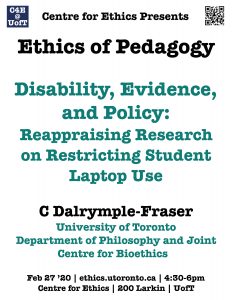
Disability, Evidence, and Policy: Reappraising Research on Restricting Student Laptop Use
How should we appraise pedagogical research when designing course policies? This workshop explores course policies that restrict student use of electronics, including so-called “laptop bans”. Many have argued that these policies impede flexibility in learning, and that they discriminate against disabled students and others for whom electronics can be important accessibility tools. In defence of these policies, many gesture to personal experiences and research which suggest that restricted-use policies actually support learning. In this session, we will survey some of this research and its limitations, including how the persistent exclusion of disability from study reports raises challenges to the apparent usefulness and persuasiveness of that research for inclusive policy design. Finally, we’ll turn from these specific policies to discuss general issues in appraising evidence, and the potential of designing Critical Appraisal Tools (CATs) for pedagogical research.
☛ please register here
C Dalrymple-Fraser

University of Toronto
Department of Philosophy and Joint Centre for Bioethics
Centre for Ethics, University of Toronto
200 Larkin - Wed, Feb 26, 2020
Ethics of AI in Context: Emerging Scholars
Sabelo Mhlambi, The Moral Limitations of Rationality and Their Implications for the Ethics of AI (Ethics of AI in Context: Emerging Scholars)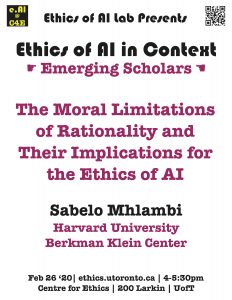
The Moral Limitations of Rationality and Their Implications for the Ethics of AI
The origins of artificial intelligence were founded on the premise that computers could be built to be like humans: rational and autonomous. The desire to create machines that can, through learning, match or surpass human thinking and ability, is firmly based on western philosophy’s traditional view of personhood based on rationality and autonomy. This view of personhood has shaped western economic, political and social structures, which in turn shape the creation and use of artificial intelligence; has provided the foundation for machine learning’s uncritical imitation of social patterns within its input data; and its use presents significant ethical and human rights challenges worsened by the use of artificial intelligence. Rationality without context that comes from knowing the other (relationality) leads to discriminatory effects. This talk will use the relational view of personhood, with examples from Postcolonial African philosophy, to examine the role of rationality in the creation of Lull’s logic machines to Turing’s “thinking machines” and modern AI, and the limits of rationality now more apparent in automated decision making systems.
☛ please register here
Sabelo Mhlambi
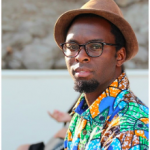
Harvard
Berkman Klein CenterMr. Sabelo Mhlambi is a researcher at Harvard’s Berkman Klein Center and the Carr Center for Human Rights whose work focuses on the intersection of human rights, ethics and technology. In particular, Mr. Mhlambi’s research examines the human rights implications of algorithmic technology and proposes a new ethical framework for governing the creation and use of AI for maximizing the public good. Mr. Mhlambi’s work expands on the conversation on Ethics and AI by introducing non-western frameworks for examining the effects of automated decision making technology. Mr. Mhlambi’s work is also supplemented by more than a decade of building large scale software, open-source software and content recommendation systems.
04:00 PM - 05:30 PM
Centre for Ethics, University of Toronto
200 Larkin - Tue, Feb 25, 2020
Ethics of AI in Context
Ida Koivisto, Thinking Inside the Box: The Promise and Boundaries of Transparency in Automated Decision-Making (Ethics of AI in Context)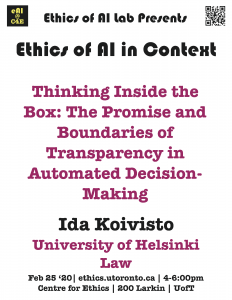
Thinking Inside the Box: The Promise and Boundaries of Transparency in Automated Decision-Making
At break-neck pace, computers seem to be gaining abilities to do things we never thought to be possible. As humans are known to be biased and unreliable, should we hand decision-making over to computer programs and algorithms? Especially in routine cases, automated decision-making– computer-based decision-making without human influence (‘ADM’) – could help us overcome our deficiencies and lead to increased perception of fairness. So, problem solved?
This seems not to be the case. There is growing evidence that human bias cannot be totally erased, at least for now. It can linger in ADM in many ways. As a result, it is not clear, who is accountable. Are the codes involved to blame? Or the creators of those codes? What about machine learning and algorithms created by other algorithms? The difficulty to answer these questions is often referred to as ‘the black box problem’. We cannot be sure how the inputs transform into outputs in the ‘black box’ between, and who is to blame if something goes wrong.
Consequently, transparency is often proposed as a solution. For example, the call for transparency features in a great majority of AI ethics codes as well as in the EU’s General Data Protection Regulation. No more black boxes, but transparent ones! The belief in transparency is hardly surprising, as its promise as a governance ideal is overwhelmingly positive. Although transparency can be approached in a plethora of ways, as a normative metaphor, its basic idea is simple. It promises legitimacy by making an object or behavior visible and, as such, controllable.
In this talk, I will argue that the legitimation narrative of transparency cannot really deliver in its quest for resolving the black box problem in ADM. To that end, I will argue that transparency is a more complex an ideal that is portrayed in mainstream narratives. My main claim is that transparency is inherently performative in nature and cannot but be. This performativity goes counter the promise of unmediated visibility, vested in transparency. Subsequently, in order to ensure the legitimacy of ADM – if we, indeed, are after its legitimacy – we need to be mindful of this hidden functioning logic of the ideal of transparency. As I will show, when transparency is brought to the context of algorithms, its peculiarities will come visible in a new way.
☛ please register here
Ida Koivisto
04:00 PM - 06:00 PM
Law
University of Helsinki
Centre for Ethics, University of Toronto
200 Larkin - Mon, Feb 24, 2020
Perspectives on Ethics
Ashwini Vasanthakumar Transnational Solidarity: Exiles as Solidary Intermediaries (Perspectives on Ethics)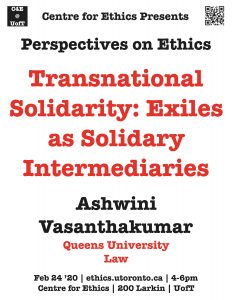
Transnational Solidarity: Exiles as Solidary Intermediaries
In The Ethics of Exile, I examine the normative underpinnings of exile politics. In particular, I explore the rights and duties exiles have in their communities of origin, and the resulting roles they play in these communities and in transnational politics more broadly. Having argued that exiles have samaritan duties and outlined what these duties may entail, I turn to how they may discharge these. In this chapter, I focus on how exiles can enable transnational solidarity. I draw on Avery Kolers’ recent account of solidarity; among other things, it seeks to remedy the asymmetric relationship between those in need of solidarity and those in a position to extend it–an asymmetry that is particularly acute in the context of exile. I identify possible limitations with Kolers’ model and discuss whether and how exiles can act as solidary intermediaries to overcome these limitations.
☛ please register here
Ashwini Vasanthakumar
04:00 PM - 06:00 PM
Queen’s University
Law
Centre for Ethics, University of Toronto
200 Larkin - Fri, Feb 14, 2020
Reading Series, Ethics & the Arts
Poetics/Ethics: New Work by Queer Poets III
Poetics/Ethics: New Work by Queer Poets III
This is the third of four readings that will showcase contemporary queer poetry by authors working in Canada, based on the notion that ethics should be conceived as encompassing not just academic research but also literary writing. Each of these poets crafts new languages to describe and confront the interplay of lived experience and political critique. By bringing them together, we hope not only to foster a conversation between the authors of some of the most exciting poetry being written today, but also some of the most complex and subtle thinking about gender and sexuality and their intersections with race, indigeneity, migration, and colonialism
☛ please register here
 Aisha Sasha John’s medium is energy. She is author of the 2018 Griffin Poetry Prize nominated collection, I have to live. (M&S 2017), as well as THOU (Book*hug 2014), finalist for the Trillium and Relit Poetry Awards. She served as guest faculty for the 2019 Writing Studio residency program at The Banff Centre and was the 2018 Writer-in-Residence at the University of Toronto (Scarborough). Aisha is also a choreographer and the 2019-2022 Dancemakers’ Resident Artist; in March 2020 she will remount her solo show the aisha of is which premiered at the Whitney Museum in 2017.
Aisha Sasha John’s medium is energy. She is author of the 2018 Griffin Poetry Prize nominated collection, I have to live. (M&S 2017), as well as THOU (Book*hug 2014), finalist for the Trillium and Relit Poetry Awards. She served as guest faculty for the 2019 Writing Studio residency program at The Banff Centre and was the 2018 Writer-in-Residence at the University of Toronto (Scarborough). Aisha is also a choreographer and the 2019-2022 Dancemakers’ Resident Artist; in March 2020 she will remount her solo show the aisha of is which premiered at the Whitney Museum in 2017.
Gail Scott‘s iconic feminist novel Heroine (Toronto : Coach House, 2019) has been re-issued with an introduction by Eileen Myles. Other novels include The Obituary (New York, Nightboat, 2012; Coach House, 2010), a ghost story set in a Montréal triplex, a 2011 finalist for Le Grand Prix du Livre de la Ville de Montréal. My Paris (Dalkey Archive), about a sad diarist in conversation with Gertrude Stein and Walter Benjamin in late 20th century Paris ; Main Brides ; Heroine (1987 edition), Spare Parts Plus 2 (stories and manifestoes). Essays are collected in Spaces Like Stairs and La Théorie, un dimanche (translated as Theory, A Sunday, New York : Belladonna, 2013). Scott is co-editor of the New Narrative anthology: Biting the Error: Writers Explore Narrative (Coach House, 2004). Her translation of Michael Delisle’s Le désarroi du matelot was shortlisted for the Governor General’s award. A memoir, based in Lower Manhattan during the early Obama years, is forthcoming.
07:00 PM - 09:00 PM
Fan Wu is freshly depleted of desire circa this Year of the Metal Rat. He runs creative writing and critical reading workshops across art galleries in Toronto. A litany of his obsessions: translation, melancholia, meta-relationality, sex as a question. You can read his writing online in baest journal, MICE Magazine, Aisle 4, and Koffler Digital.
Centre for Ethics, University of Toronto
200 Larkin - Wed, Feb 12, 2020
Ethics of AI in Context: Emerging Scholars
Suzanne van Geuns, Seduction, Scripts, and Self-Improvement: Antifeminist Forums and the Cultural Legacy of AI (Ethics of AI in Context: Emerging Scholars)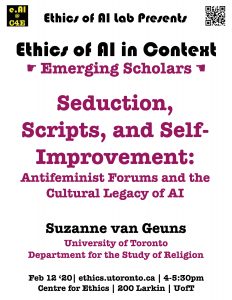
Seduction, Scripts, and Self-Improvement: Antifeminist Forums and the Cultural Legacy of AI
Debates about AI usually revolve around the futures AI applications enable and support, often neglecting how past visions of the AI future continue to shape culture today. Antifeminist ‘seduction’ forums are one example of AI’s cultural legacy. Such forums provide men with detailed procedural instructions: from ‘models’ for making women laugh at jokes, to a predetermined ‘ladder’ along which physical touch is to be ‘escalated’ gradually. Seduction instructions promise that men can conquer feminist indoctrination and become sexually successful alpha males by internalizing the proper scripts. This talk shows how the historical entanglement between cybernetics and cognitive psychology in early AI efforts reverberates in seduction instructions’ rhetorical tendency to imagine men as machines that need to be ‘re-programmed’ in order to improve themselves. Cultural visions of a future governed by ever-improving algorithms persist long after computational applications: seduction forums’ procedural and instructional approach to the ‘problem’ of feminism is inextricable from the imaginary horizon of AI.
☛ please register here
Suzanne van Geuns
04:00 PM - 05:30 PM
University of Toronto
Religion
Centre for Ethics, University of Toronto
200 Larkin - Wed, Feb 12, 2020
Ethics at Noon
Anna Su, The Promise and Perils of International Human Rights Law for AI Governance (Ethics@Noon)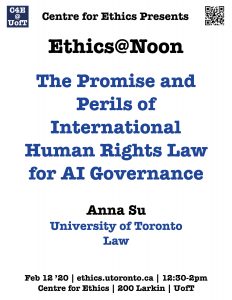
The Promise and Perils of International Human Rights Law for AI Governance
The increasing use and deployment of artificial intelligence (AI) poses many challenges for human rights. This paper is largely a mapping exercise and explores the advantages and disadvantages of using international human rights law to regulate AI applications. Particularly, it examines existing strategies by international bodies, national governments, corporations and non-profit partnerships on how to govern and consequently ensure the development of AI is consistent with the protection of human rights. Not all of these strategies refer to or include references to human rights law or principles. In fact, most of them are self-adopted ethical guidelines or self-regulating norms based on a variety of sources to mitigate the risks and challenges of, as well as identifying the opportunities brought about by AI-powered systems. In recent years, academic and policy literature from a variety of disciplines has emphasized the importance of a human rights-based approach to AI governance. That means identifying risks to recognized human rights, obliging governments to incorporate their human rights obligations in their respective national policies, and even applying international human rights law itself. This was encapsulated in the Toronto Declaration, issued last May 2018 by a group of academics and civil liberties groups, which called on states and companies to meet their existing responsibilities to safeguard human rights. But save for few exceptions, it remains a question what and how that approach concretely looks like, and why it is beneficial to do so in the first place.
☛ please register here
Anna Su
12:30 PM - 02:00 PM
University of Toronto
Law
Centre for Ethics, University of Toronto
200 Larkin - Thu, Feb 6, 2020
Ethics of Pedagogy
Ameera Ali, Transcending Equality: Increasing Equity and Accessibility in University Classrooms04:30 PM - 06:00 PM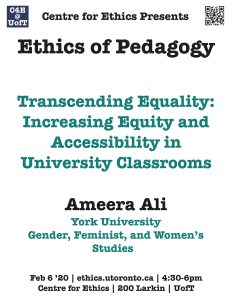
Transcending Equality: Increasing Equity and Accessibility in University Classrooms
This interactive talk will discuss how to make university classrooms more equitable and accessible through the implementation of Universal Design for Learning (UDL)—a framework for accessible teaching and learning. The talk will introduce participants to the tenets of UDL and we will discuss how to implement these principles in university classrooms through our pedagogy and praxis, to create accessible educational spaces and opportunities for students. As maintained by UDL, the classroom environment is to be a space where all students can thrive; as such, this talk will also evoke how UDL works to make classrooms more accessible for many equity seeking groups. Lastly, although the term ‘universal’ remains directly embedded within its name, this talk will also touch on the ways in which UDL may not be entirely universal as we consider how particular strategies may be effective for some students, yet inadvertently disadvantage others. We will discuss these implications while being mindful of the ethical considerations of teaching and learning.
☛ please register here
Ameera Ali
 York University
York University
Gender, Feminist, and Women’s Studies
Centre for Ethics, University of Toronto
200 Larkin - Wed, Feb 5, 2020
Ethics & the Arts, Ethics & Film: Lights, Camera, Ethics!, Ethics in the City
The Last Black Man in San Francisco (2019) (Ethics in the City Films)06:00 PM - 08:00 PM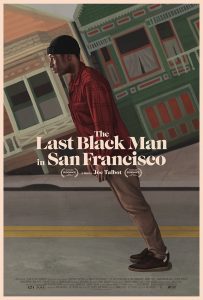
The Last Black Man in San Francisco
Jimmie Fails is in love with a Victorian house built by his grandfather in San Francisco’s Fillmore District. When the house’s current occupants leave for good, Jimmie and his friend Mont attempt to repair and reclaim the place that Jimmie most considers home, despite its prohibitive price tag and place in a gentrified, rapidly changing neighbourhood. Based on a true story, Joe Talbot’s directorial debut is a love letter to a disappearing side of San Francisco and a touching look at how communities are made — and kept alive — by the people who care for them.
➨ please register here
Centre for Ethics, University of Toronto
Rm 200, Larkin Building - Fri, Jan 31, 2020
Reading Series, Ethics & the Arts
Poetics/Ethics: New Work by Queer Poets II
Poetics/Ethics: New Work by Queer Poets II
This is the second of four readings that will showcase contemporary queer poets working in Canada, based on the notion that ethics should be conceived as encompassing not just academic research but also literary writing. Each of these poets crafts new languages to describe and confront the interplay of lived experience and political critique. By bringing them together, we hope not only to foster a conversation between the authors of some of the most exciting poetry being written today, but also some of the most complex and subtle thinking about gender and sexuality and their intersections with race, indigeneity, migration, and colonialism. (Further editions will take place in February and March, and will feature writers including Gail Scott, Nora Fulton, and others.)
☛ please register here

Sina Queyras is the author most recently of My Ariel. They live in Montreal.

Lena Suksi is a Toronto based writer whose first book, The Nerves, will be out with Metatron this spring.
Gwen Benaway is a trans girl of Anishinaabe and Métis descent. She is the author of three previous collections of poetry—Ceremonies for the Dead, Passage, and Holy Wild, winner of the 2019 Governor General’s Literary Award for Poetry. It was also a finalist for the Trillium Book Award for Poetry, the Lambda Literary Award for Transgender Poetry, and the Publishing Triangle Award for Trans and Gender-Variant Literature, and was longlisted for the Pat Lowther Memorial Award. She is the editor of an anthology of fantasy short stories titled Maiden Mother and Crone: Fantastical Trans Femmes. She has been a finalist for the Dayne Ogilvie Prize for LGBTQ Writers from the Writers’ Trust of Canada, and her personal essay, “A Body Like A Home,” was the Gold Prize Winner for the National Magazine Awards in Personal Journalism. She is also currently editing a book of creative nonfiction, trans girl in love. day/break is her fourth book of poetry. She lives in Toronto, Ontario, and is a Ph.D. student at the University of Toronto in the Women and Gender Studies Institute.
07:00 PM - 09:00 PM
Centre for Ethics, University of Toronto
200 Larkin - Thu, Jan 30, 2020
Ethics of Pedagogy
Michael Barnes, The Diversity of Strategies for Diversifying Syllabi (Ethics of Pedagogy)
The Diversity of Strategies for Diversifying Syllabi
This workshop will explore the aims, strategies, and challenges of inclusive syllabus-design—especially (though not solely) from my situation as a white professor teaching topics outside of my lived experience. The main goal is to clarify ideas about what inclusive pedagogy is for, and broaden our ideas about what it looks like. To do so, we’ll consider a variety of models of inclusive syllabus-design, along with corresponding accounts of the problem(s) each is meant to address. Through a discussion of the challenges, limits, and the necessity of anti-oppressive education, participants can expect to leave this session with a more expansive conception of inclusive pedagogy they can put into action.
☛ please register here
04:30 PM - 06:00 PM Michael Barnes
Michael Barnes
University of Toronto and Ryerson University
Philosophy
Centre for Ethics, University of Toronto
200 Larkin - Wed, Jan 29, 2020
Ethics of AI in Context: Emerging Scholars
Vinyas Harish & Nuwan Perera, Machine Learning for Health at the Public-Private Boundary: Questions to Consider (Ethics of AI in Context: Emerging Scholars)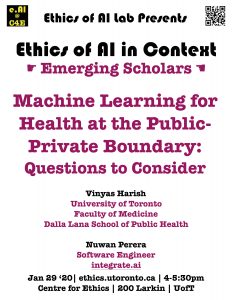
Machine Learning for Health at the Public-Private Boundary: Questions to Consider
Recent advances in artificial intelligence (AI) have spurred much interest and investment in the ‘disruption’ of healthcare. Major breakthroughs in numerous areas of machine learning (ML) are leading to the creation of ‘decision support systems’ which promise to aid physicians throughout the trajectory of a patient’s care. Numerous major technology companies (e.g. Microsoft, Apple, Google) have identified healthcare as an untapped opportunity and key vertical for their business. As seen with recent headlines in the media (e.g. Google’s Project Nightingale), we propose that ML for health at the public-private boundary brings forward unique ethical considerations not seen with other technologies. There is limited academic literature to inform decision-making by non-technical stakeholders and a lack of clarity around the practical discussion around what should be done when considering a [public-private?] partnership in this space. We provide a series of questions to guide the framework around making responsible decisions when partnering with private sector to design and deploy AI/ML solutions for health.
☛ please register here
Vinyas Harish

University of Toronto
Medicine and Public Health
04:00 PM - 05:30 PM Nuwan Perera
Nuwan Perera
Software Engineer
integrate.ai
Centre for Ethics, University of Toronto
200 Larkin - Wed, Jan 29, 2020
Ethics at Noon
Josée Johnston & Shyon Baumann, What is “Good” Food? How Foodies Negotiate Status and Ethics in Food Choices (Ethics@Noon)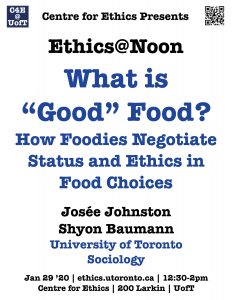
What Is “Good” Food? How Foodies Negotiate Status and Ethics in Food Choices
How do foodies decide what is “good” food — food worthy of eating, discussing, researching and photographing? This talk will draw from research on foodies to discuss the ways that foods become venerated as high status choices. Our research charts the rise of an omnivorous food culture that values high-class cuisine alongside street-stand tacos and diner meals. Besides identifying key markers of foodie status, we will discuss how food choices relate to ethical consumption deals like democratic openness, multiculturalism, and sustainability. Drawing from a survey with Toronto-based food shoppers, we explore the intersection of foodie culture and ethical consumption. This data suggests the emergence of a high-status foodie who appreciates the finest, most delicious foods, while also seeking to feel ethically virtuous at the dining table.
☛ please register here
Shyon Baumann

University of Toronto
SociologyJosée Johnston
12:30 PM - 02:00 PM
University of Toronto
Sociology
Centre for Ethics, University of Toronto
200 Larkin - Tue, Jan 28, 2020
Ethics of AI in Context
Parisa Moosavi, If Non-Sentient Organisms Can Have Rights, Why Can’t Robots? (Ethics of AI in Context)
If Non-Sentient Organisms Can Have Rights, Why Can’t Robots?
The fact that artificially intelligent machines are becoming increasingly capable of emulating human intelligent behavior has led some authors to speculate that at some point we would have to grant moral rights to these machines. Some such arguments are indirect and appeal to claims about how our treatment of robots affects us. But when it comes to direct argument about the moral status of machines, the discussion has mostly focused on the possibility that robots would one day develop sentience or mental capabilities like consciousness and self-awareness.
However, the idea that the capacity for sentience is a necessary condition for moral considerability has been contested. Some environmental ethicists argue that non-sentient biological organisms, species, and ecosystems can potentially have a moral status, because they have a good of their own. This raises the question whether non-sentient robots can similarly enjoy a moral status.
In this paper, I first give an account of what makes non-sentient organisms potentially morally considerable, and then explain why this moral considerability does not extend to non-sentient robots. I argue that the same considerations that keep us from thinking that the simplest artifacts like a toaster or a bicycle fall short of having a good of their own also apply in the case of more complex, artificially intelligent machines. Thus, I argue that unlike biological entities, non-sentient intelligent machines have no greater claim to moral rights than the simplest artifacts.
☛ please register here
Parisa Moosavi
04:00 PM - 06:00 PM
York University
Philosophy
Centre for Ethics, University of Toronto
200 Larkin - Wed, Jan 22, 2020
Ethics & the Arts, Ethics & Film: Lights, Camera, Ethics!, Ethics in the City
Ethics & Film: Michael Haneke's Caché (2005) (feat. Daniel Adleman)
Michael Haneke’s Caché (or Hidden) is the story of Georges, a French public intellectual who lives with his wife and child in Paris. One day, the family begins to receive anonymous deliveries of video tape surveillance of their home and frightening child-like drawings. As the images become more personal, Georges undertakes a journey to find their harasser.
Haneke’s film brilliantly stages a collision-course between the personal and the political-historical in contemporary postcolonial France. After watching the movie, we’ll discuss its representations of violence, its allegorical dimensions, and its notoriously ambiguous ending.
☛ please register here
Daniel Adleman is Assistant Professor of Writing and Rhetoric at the University of Toronto’s Innis College, where he teaches Writing for Social Change, Digital Rhetoric, and Rhetoric of Health and Medicine.
06:00 PM - 08:00 PM
Centre for Ethics, University of Toronto
Rm 200, Larkin Building - Wed, Jan 15, 2020
Ethics of AI in Context: Emerging Scholars
Mohamed Abdalla, Quantifying (Un)Fairness (Ethics of AI in Context: Emerging Scholars)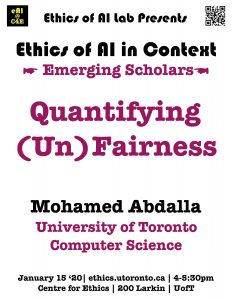
Quantifying (Un)Fairness
In the machine learning fairness literature, the majority of fairness definitions are formalized for the binary case. This binary formalization allows for simple hypothetical demonstrations of the fairness definitions and provides researchers the ability to prove theorems. However, in clinical settings, the binary case is often too simple. As a consequence, we must expand machine learning definitions of fairness beyond these binary formulations. In this work, we analyze different ways of expanding fairness definitions beyond the binary case, highlighting edge cases where such expansions do not work as expected. We perform empirical analysis on a clinical task to assess how likely each edge case is for non-binary expansion, and consider the clinical feasibility and ramifications of such decisions.
☛ please register here
Mohamed Abdalla
04:00 PM - 05:30 PM
University of Toronto
Computer Science
Centre for Ethics, University of Toronto
200 Larkin - Wed, Jan 15, 2020
Ethics at Noon
Nikolas Kompridis, Agency: Human and Non-Human (Ethics@Noon)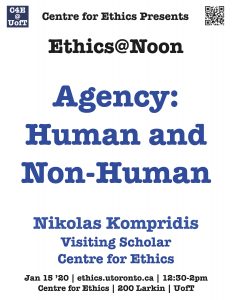
Agency: Human and Non-Human
Recent discussions of non-human agency—the agency of “things” or of “actants”—have challenged the putative differences between human and non-human agency, particularly in the work of Jane Bennett and Bruno Latour. But their reliance on an insufficiently questioned picture of human agency continues to undermine their attempts to make sense of non-human agency, and to think anew the relation between human and non-human agency, a task which has become all the more urgent as we come to grips with the implications of the Anthropocene. In this paper, I propose an alternative conception of agency that better captures what is distinctive to both human and non-human agency.
☛ please register here

Nikolas Kompridis
12:30 PM - 02:00 PM
Visting Scholar
Centre for Ethics
Centre for Ethics, University of Toronto
200 Larkin - Tue, Jan 14, 2020
Ethics of AI in Context
Zack Lipton, Fairness, Interpretability and the Dangers of Solutionism (Ethics of AI in Context)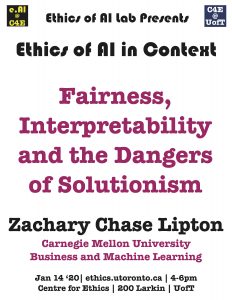 04:00 PM - 06:00 PM
04:00 PM - 06:00 PMFairness, Interpretability and the Dangers of Solutionism
Supervised learning algorithms are increasingly operationalized in real-world decision-making systems. Unfortunately, the nature and desiderata of real-world tasks rarely fit neatly into the supervised learning contract. Real data deviates from the training distribution, training targets are often weak surrogates for real-world desiderata, error is seldom the right utility function, and while the framework ignores interventions, predictions typically drive decisions. While the deep questions concerning the ethics of AI necessarily address the processes that generate our data and the impacts that automated decisions will have, neither ML tools nor proposed ML-based mitigation strategies tackle these problems head on. This talk explores the consequences and limitations of employing ML-based technology in the real world, the limitations of recent solutions (so-called fair and interpretable algorithms) for mitigating societal harms, and contemplates the meta-question: when should (today’s) ML systems be off the table altogether?
☛ please register here
Centre for Ethics, University of Toronto
200 Larkin - Mon, Jan 13, 2020
Perspectives on Ethics
Yannik Thiem, Trans*Formative Philosophy: Queer, Ordinary, Intimate (Perspectives on Ethics)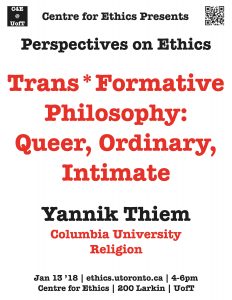
Trans*Formative Philosophy: Queer, Ordinary, Intimate
The “new normal” is a moving target these days. Visible representations of queer people and people of color are becoming more ordinary, but racism, sexism, and all kinds of phobic resentments and violence seem only to crop up in new and different shapes. In this presentation, I will explore how aesthetic practices generally inscribe norms, especially through advertising and the visual discourse that surrounds us and with which we interact in semi-conscious ways. Specifically, I am interested in how as queer bodies of color are given greater force and presence, it becomes often harder to grasp the structural persistence of whiteness as norm and goal.
Examining two commercials that develop “queer aesthetics” around gender, sex, race, and class, I will show that, perhaps counter-intuitively, the centering and privileging of whiteness is often also enshrined in our cultural and political imaginary exactly through the expansion of genderqueer gains and often particularly insidiously when the queer bodies made visible and celebrated as exceptional are queer bodies of color. As a counterpoint I will suggest that visceral expansions of ordinariness, which comprise intimacy and anonymity at the same time, may aid us in fashioning anti-racist queer and trans methods of exploring, learning, and collective world-making.
☛ please register here
Yannik Thiem
04:00 PM - 06:00 PM
Columbia University
Religion
Centre for Ethics, University of Toronto
200 Larkin - Thu, Dec 5, 2019
Events on Campus, Ethics of AI in Context
Barbara J. Grosz, From Ethical Challenges of Intelligent Systems to Embedding Ethics in Computer Science EducationFrom Ethical Challenges of Intelligent Systems to Embedding Ethics in Computer Science Education
Computing technologies have become pervasive in daily life, sometimes bringing unintended but harmful consequences. For students to learn to think not only about what technology they could create, but also whether they should create that technology and to recognize the ethical considerations that should constrain their design, computer science curricula must expand to include ethical reasoning about the societal value and impact of these technologies. This talk will describe Harvard’s Embedded EthiCS initiative, a novel approach to integrating ethics into computer science education that incorporates ethical reasoning throughout courses in the standard computer science curriculum. It changes existing courses rather than requiring wholly new courses. The talk will begin with a short description of my experiences teaching the course “Intelligent Systems: Design and Ethical Challenges” that inspired the design of Embedded EthiCS. It will then describe the goals behind the design, the way the program works, lessons learned and challenges to sustainable implementations of such a program across different types of academic institutions.
 Barbara J. Grosz
Barbara J. Grosz
Higgins Research Professor of Natural Sciences
Harvard Universitypresented by:11:10 AM - 01:00 PM
Department of Computer Science, University of Toronto
St. George Street - Wed, Nov 27, 2019
Ethics of AI in Context: Emerging Scholars
Petra Molnar, Immigration, Iris-Scanning, and iBorderCtrl: The Human Rights Impacts of Technological Experiments in Migration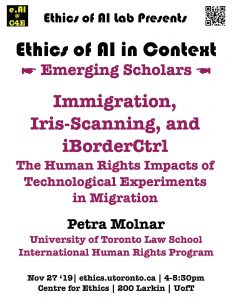
Immigration, Iris-Scanning, and iBorderCtrl: The Human Rights Impacts of Technological Experiments in Migration
Mandatory detention of migrants at the US-Mexico border. The wrongful deportation of 7,000 foreign students accused of cheating on a language test. Racist or sexist discrimination based on social media profiles. What do these examples have in common? In every case, an algorithm made a decision with serious consequences for people’s lives.
This presentation explores the human rights impacts of experimental and unregulated technologies that are used to manage migration. Nearly 70 million people are currently on the move due to conflict, instability, environmental factors, and economic reasons. As a result, states and international organizations involved in migration management are exploring various automated decision-making experiments to increase efficiency and support border security. These experiments range from big data predictions about population movements in the Mediterranean, to Canada’s use of automated decision-making in immigration and refugee applications, to AI lie detectors deployed at European borders. However, these technologies are developed with little oversight, transparency, and accountability and often fail to account for the far-reaching impacts on human lives and human rights, resulting in potentially serious breaches of human rights and civil liberties.
☛ please register here
Petra Molnar
04:00 PM - 05:30 PM
International Human Rights Program
Faculty of Law
University of Toronto
Centre for Ethics, University of Toronto
200 Larkin - Tue, Nov 26, 2019
Ethics of AI in Context
Daniel Greene, Making Ethics in Machine Learning (Ethics of AI in Context)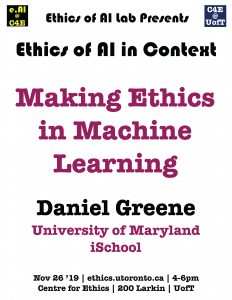
Making Ethics in Machine Learning
Machine learning systems are implemented by all the big tech companies in everything from ad auctions to photo-tagging, and are supplementing or replacing human decision making in a host of more mundane, but possibly more consequential, areas like loans, bail, policing, and hiring. And we’ve already seen plenty of dangerous failures; from risk assessment tools systematically rating black arrestees as riskier than white ones, to hiring algorithms that learned to reject women. There’s a broad consensus across industry, academe, government, and civil society that there is a problem here, one that presents a deep challenge to core democratic values, but there is much debate over what kind of problem it is and how it might be solved. Taking a sociological approach to the current boom in ethical AI and machine learning initiatives that promise to save us from the machines, this talk explores how this problem becomes a problem, for whom, and with what solutions. Comparing today’s high-profile ethics manifestos with earlier moments in the history of technology allows us to see a nascent consensus around an approach we term ‘ethical design.’ At the same time, the recent surge in labor activism inside tech companies and anti-racist organizing outside them suggests how this expert-driven vision for more humane systems might be replaced or augmented with something more revolutionary. This talk draws on research conducted with Anna Lauren Hoffmann (UW), Luke Stark (MSR Montreal), and designer Geneviève Patterson.
☛ please register here
Daniel Greene
04:00 PM - 06:00 PM
University of Maryland
iSchool
Centre for Ethics, University of Toronto
200 Larkin - Thu, Nov 21, 2019
Ethics of Pedagogy
Vicki Zhang, The "Invisible Majority"?: Sampling the Chinese International Students' Experiences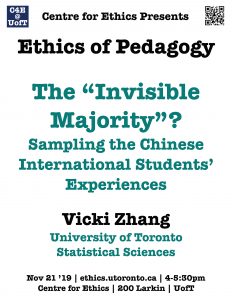
The “Invisible Majority”?: Sampling the Chinese International Students’ Experiences
With the internationalization of Higher Education in Canada, universities have been striving to provide a welcoming and inclusive environment for international students. However, sometimes their efforts fall short due to a lack of deep understanding of the international student body. This talk focuses on one particular international student group – students from mainland China – and aims to uncover some of the crucial reasons behind the widely reported self-segregation of Chinese students (Cheng & Erben, 2011). It sets to understand why many students from mainland China feel turned off by cross-national communications with students from the host nation (Dewan, 2008). Various frameworks will be used to understand the phenomenon, including host nation hospitality, social identity theory, and the impact of colonial mentality and Chinese nationalism. The goal of the talk is to shed light on strategies educators may employ to help mitigate the self-segregation pattern among Chinese international students and encourage more inclusive learning environments and communities.
☛ please register here
04:00 PM - 05:30 PM Vicki Zhang
Vicki Zhang
University of Toronto
Statistical Sciences
Centre for Ethics, University of Toronto
200 Larkin - Wed, Nov 20, 2019
Ethics at Noon
Natasha Hay, The Ethics of Study: Walter Benjamin’s Counter-Pedagogy and the Communicability of Historical Violence (Ethics@Noon)
The Ethics of Study: Walter Benjamin’s Counter-Pedagogy and the Communicability of Historical Violence
I will investigate some ways in which the ethical practice of study, the use of language, and the critique of force, authority, or violence (Gewalt) come together in Walter Benjamin’s reflections on pedagogical strategies in the research seminar. Deeply concerned with the histories of violence that state power perpetuates and occludes in the civic institutions that structure social life, Benjamin was even more attuned to the modalities of this historical violence inscribed in the languages of cultural texts. His concept of history will bring out both the emancipatory and the counter-revolutionary power of certain practices of study that enter into relation with the irreconcilable ambiguity of these archives in which “there is no document of culture that is not at the same time a document of barbarism.” Reading some key publications from Benjamin’s participation in the student movement in conjunction with his early writings on language and translation, I will focus particularly on the ethical significance of silence and listening for the construction of a linguistic medium of study that is capable of letting itself be addressed by and perhaps in turn redressing the semiotic effects of structural violence. The guiding purpose of this talk will be to elucidate the ethical stakes of the communicability of histories of violence that is resistant to and can radically alter the paradigms in which the research seminar functions as a privileged site for knowing mastery over objects of reference and as an ‘ideal speech situation’ for intersubjective discourse.
➨ please register here
Natasha Hay
12:30 PM - 02:00 PM
University of Toronto
Comparative Literature
Centre for Ethics, University of Toronto
200 Larkin - Tue, Nov 19, 2019
Ethics of AI in Context
Anna Goldenberg, Advances and Challenges of AI in Healthcare (Ethics of AI in Context)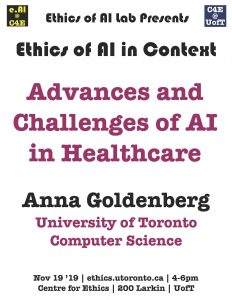
Advances and Challenges of AI in Healthcare
The great promise of AI in healthcare is taking time to materialize. Besides difficulties with access to the data and unrealistic expectations of the AI due to the hype fueled by the media, there are many fundamental machine learning advances that need to be made to achieve the widespread use of AI in healthcare. I will start my talk by discussing what AI can and cannot do at present by illuminating not only definitions but also the common misconceptions. I will then provide several examples of successes of AI in healthcare followed by a set of challenges that still exist both from the technical and cultural perspective.
➨ please register here
Anna Goldenberg
04:00 PM - 06:00 PM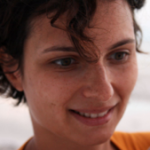
University of Toronto
Computer Science
Centre for Ethics, University of Toronto
200 Larkin - Mon, Nov 18, 2019
Perspectives on Ethics
Sunit Das, Encountering Moral Distress in Neurosurgery (Perspectives on Ethics)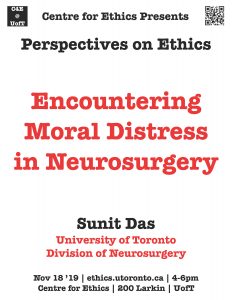
Encountering Moral Distress in Neurosurgery
In a recent survey of neurosurgery residents in the US, a large majority of trainees stated that they felt inadequately trained to discuss issues of end-of-life care and palliation with patients. Further, 87% of respondents said they had participated in surgeries with which they disagreed. My own experience as a staff physician has suggested that the lack of clarity regarding end-of-life decisions in the care of neurosurgical patients is as present an issue following the completion of training and the primary assumption of these responsibilities. I will attempt to contextualize these issues with the following framework questions:
1. The burden of uncertainty–how do we proceed when we don’t know what is “right”? How do we cope when it doesn’t turn out as we had hoped?
2. The burden of hope–how do we proceed when we are asked to pursue the nominal? Our hope, our patients’s hope, our patients’s family’s hope.
3. The burden of duty–what is the cost of action that we do not believe in or feel is a wrong choice?
➡︎ please register here
Sunit Das
04:00 PM - 06:00 PM
University of Toronto Faculty of Medicine, Division of Neurosurgery, St. Michael’s Hospital & Centre for Ethics, University of Toronto
Centre for Ethics, University of Toronto
200 Larkin - Fri, Nov 15, 2019
Author Meets Critics
Sophia Moreau, Faces of Inequality: A Theory of Wrongful Discrimination (Author Meets Critics)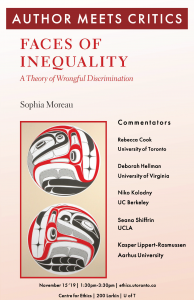
Faces of Inequality: A Theory of Wrongful Discrimination (OUP 2020)
Sophia Moreau
Faculty of Law
University of TorontoCommentators:
Rebecca Cook (University of Toronto, Law)
Deborah Hellman (University of Virginia, Law)
Niko Kolodny (UC Berkeley, Philosophy)
Seana Shiffrin (UCLA, Philosophy)
Kasper Lippert-Rasmussen (Aarhus University, Political Science)
☛ please register here
This book defends an original and pluralist theory of when and why discrimination wrongs people. Starting from actual legal cases in which claimants have alleged wrongful discrimination by other people or by the state, Sophia Moreau argues that we can best understand these people’s complaints by thinking of them as complaints about different ways in which they have not been treated as equals in their societies–in particular, through unfair subordination, through the violation of their right to a particular deliberative freedom, or through the denial to them of access to a basic good, that is, a good that this person must have access to if they are to be, and to be seen as, an equal in their society. The book devotes a chapter to each of these wrongs, exploring in detail what unfair subordination consists of; what deliberative freedoms are, and when each of us has a right to them; and what it means to deny someone access to a basic good. The author explains why these wrongs are each distinctive, but are each a different way of failing to treat some people as the equals of others. Finally the author argues that both the state and we as individuals have a duty to treat others as equals, in these three specific senses.
01:30 PM - 03:30 PM
Centre for Ethics, University of Toronto
Rm 200, Larkin Building - Thu, Nov 14, 2019
Ethics of Pedagogy
Marie A. Green, Length, Breadth, Height: Dimensions of Culturally Responsive and Relevant Pedagogy (Ethics of Pedagogy)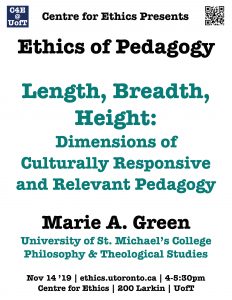
Length, Breadth, Height: Dimensions of Culturally Responsive and Relevant Pedagogy
Research conducted in recent years (James 2019; Segeren and Kutsyurub 2012) reveals the failure of Ontario’s Equity and Inclusive Policy to effectively trickle down to the classroom. The findings of a 2019 study that examines the experiences of racialized students in Southern Ontario Catholic schools will be shared. A Kingian framework is applied to the theory of Culturally Responsive and Relevant Pedagogy (Ladson-Billings 1995; Gay 2000) and tangible techniques are proposed for achieving more engaging, interactive, and digitally relevant classrooms where all students feel included. This session will feature a multi-modal presentation and participant engagement.
☛ please register here
04:00 PM - 05:30 PM Marie A. Green
Marie A. Green
University of St. Michael’s College
Philosophy & Theological Studies
Centre for Ethics, University of Toronto
200 Larkin - Wed, Nov 13, 2019
Ethics & the Arts, Ethics & Film: Lights, Camera, Ethics!, Ethics in the City
The Land of Many Palaces (2015) (Ethics in the City Films)In Ordos, China, thousands of farmers are being relocated into a new city under a government plan to modernize the region. “The Land of Many Palaces” follows a government official whose job is to convince these farmers that their lives will be better off in the city, and a farmer in one of the last remaining villages in the region who is pressured to move. The film explores a process that will take shape on an enormous scale across China, since the central government announced plans to relocate 250,000,000 farmers to cities across the nation, over the next 20 years.
➨ please register here
06:00 PM - 08:00 PM
Centre for Ethics, University of Toronto
Rm 200, Larkin Building - Wed, Nov 13, 2019
Ethics of AI in Context: Emerging Scholars
Jaspreet Sahota, The Problem of Historical Bias in Supervised Machine Learning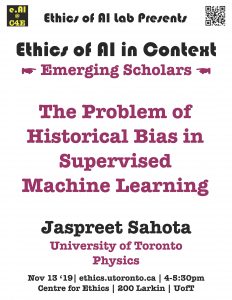
The Problem of Historical Bias in Supervised Machine Learning
Machine learning algorithms are becoming ubiquitous in business and government. Algorithms are routinely deployed that make decisions about wehow live: e.g. credit adjudication, parole approval, resume screening, insurance costs, etc. Training supervised algorithms on the basis of historical data has the risk of perpetuating historical biases in contemporary society. This can lead to a pernicious feedback cycle that should be avoided by eliminating bias from training data and furthering research into deep learning models.
☛ please register here
Jaspreet Sahota
04:00 PM - 05:30 PM
Independent Researcher
Ph.D. Physics, University of Toronto
Centre for Ethics, University of Toronto
200 Larkin - Tue, Nov 12, 2019
Ethics of AI in Context
Kristen Thomasen, Out of Their Cages and Into the City: Robots, Regulation, and the Changing Nature of Public Spaces (Ethics of AI in Context)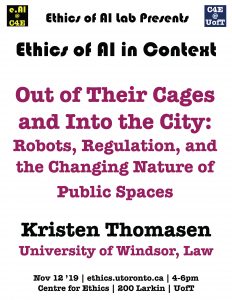
Out of Their Cages and Into the City: Robots, Regulation, and the Changing Nature of Public Spaces
Robots are an increasingly common feature in North American public spaces. From regulations permitting broader drone use in public airspace and autonomous vehicle testing on public roads, to delivery robots roaming sidewalks in some major U.S. cities, to the announcement of Sidewalk Toronto – a plan to convert waterfront space in one of North America’s largest cities into a robotics-filled smart community – the laws regulating North American public spaces are opening up to robots.
In many of these examples, the growing presence of robots in public space is associated with opportunities to improve human lives through intelligent urban design, environmental efficiency, and greater transportation accessibility. However, the introduction of robots into public space has also raised concerns about, for example, the commercialization of these spaces by the companies that deploy robots; increasing surveillance that will negatively impact physical and data privacy; or the potential marginalization or exclusion of some members of society in favour of those who can pay to access, use, or support the new technologies available in these spaces.
The laws that permit, regulate, or prohibit robotic systems in public spaces will in many ways determine how this new technology impacts the space and the people who inhabit that space. This begs the questions: how should regulators approach the task of regulating robots in public spaces? And should any special considerations apply to the regulation of robots because of the public nature of the spaces they occupy? This presentation will argue that the laws that regulate robots deployed in public space will affect the public nature of that space, potentially to the benefit of some human inhabitants of the space over others. For these reasons, this presentation will argue that special considerations should apply to the regulation of robots that will operate in public space, and will highlight some of these considerations.☛ please register here
Kristen Thomasen
04:00 PM - 06:00 PM
University of Windsor
Law
Centre for Ethics, University of Toronto
200 Larkin - Wed, Nov 6, 2019
Ethics of AI in Context: Emerging Scholars
Selena Lucien, Embedded Intelligence: What Technology Driven Innovation Means for Access to Justice and Legal Regulation (Ethics of AI in Context: Emerging Scholars)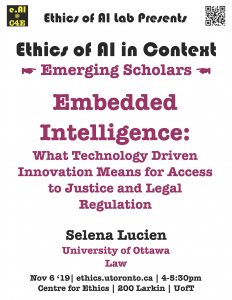
Embedded Intelligence: What Technology Driven Innovation Means
for Access to Justice and Legal RegulationThe legal world is changing. In recent years, Canada has witnessed the
proliferation of private innovative technologies that are transforming
the relationship between law and society. Technology is reconfiguring
the methods of traditional practice by giving rise to new forms of
legal service delivery. Access to justice is a growing collective
focus for the public, government, regulators, bar associations,
researchers and educators. It is also within this context that it has
been suggested that certain problems plaguing the legal system could
be addressed if it were to embrace and harness the power of
technology.
The interesting upshot of this techno-legal collision is
that the meaning of access to justice is being co-transformed through
the computational perspective of law. Access to justice problems have
influenced the design and purpose of various technologies, and the
technologies have transformed society’s perception and expectation of
justice through streamlining and simplifying the legal system. As
such, the criteria for improving access to justice are shaped by the
technological concerns, and the criteria for effective technology are
being shaped by access to justice problems, in a process of mutual
construction. Although much research has focused on how technological
innovation in the delivery of legal services can improve access to
justice, there is paucity of discussion around the ethical
implications of using technical tools to address social and political
problems. The presentation aims to explore how technology is
transforming the relationship between people, the legal system, and
the access to justice problem.☛ please register here
Selena Lucien

University of Ottawa
LawSelena Lucien was a Studio [Y] Innovation Fellow at MaRS Discovery District, where she founded the Small Claims Wizard to facilitate and simplify access to the Ontario Small Claims Court. Her venture was presented at Stanford Law School’s CodeX and incubated at the Legal Innovation Zone. During law school, Selena wrote a memorandum to the Minister of Foreign Affairs that outlines guiding principles to help construct policies to govern the ethical design and regulation of autonomous vehicles. She presented her findings at the Global Affairs Canada’s A.I and Human Rights Symposium. As a Technoship Fellow at University of Ottawa, Faculty of Law, she worked on a project funded by the PPOCIR to explore how artificial intelligence can facilitate access to legal information and empower consumers to be educated about their rights. She has co-authored a published encyclopedia series on innovative business and has written for the Canadian Bar Association’s The National. Selena received her graduate degree from the London School of Economics and was a recipient of the Alex Trebek Innovation Award. Selena is currently completing her articles at a leading Canadian law firm.
04:00 PM - 05:30 PM
Centre for Ethics, University of Toronto
200 Larkin - Fri, Nov 1, 2019
Reading Series, Ethics & the Arts
Poetics/Ethics: New Work by Queer Poets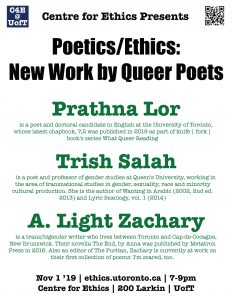
Poetics/Ethics: New Work by Queer Poets I
This is the first of three readings that will showcase contemporary queer poets working in Canada, based on the notion that ethics should be conceived as encompassing not just academic research but also literary writing. Each of these poets crafts new languages to describe and confront the interplay of lived experience and political critique. By bringing them together, we hope not only to foster a conversation between the authors of some of the most exciting poetry being written today, but also some of the most complex and subtle thinking about gender and sexuality and their intersections with race, indigeneity, migration, and colonialism. (Further editions will take place during the winter and spring, and will feature poets including Gwen Benaway, Sina Queyras, and others.)
☛ please register here
 Prathna Lor is a living poet.
Prathna Lor is a living poet. Trish Salah lives and writes in Toronto and is associate professor of Gender Studies at Queen’s University, Kingston. Her books are Wanting in Arabic and Lyric Sexology, Vol. 1 and she co-edited TSQ: Transgender Studies Quarterly 1.4 on Trans Cultural Production. Her writing appears in recent issues of Angelaki, Anomaly, The Medium, Prism International and in the collections Women of Resistance and Meanwhile Elsewhere: Science Fiction and Fantasy from Transgender Writers.
Trish Salah lives and writes in Toronto and is associate professor of Gender Studies at Queen’s University, Kingston. Her books are Wanting in Arabic and Lyric Sexology, Vol. 1 and she co-edited TSQ: Transgender Studies Quarterly 1.4 on Trans Cultural Production. Her writing appears in recent issues of Angelaki, Anomaly, The Medium, Prism International and in the collections Women of Resistance and Meanwhile Elsewhere: Science Fiction and Fantasy from Transgender Writers.
07:00 PM - 09:00 PM A. Light Zachary is a trans/bigender writer who lives between Toronto and Cap-de-Cocagne, New Brunswick. Their novella The End, by Anna was published by Metatron Press in 2016. Also an editor of The Puritan, Zachary is currently at work on their first collection of poems: I’m scared, too.
A. Light Zachary is a trans/bigender writer who lives between Toronto and Cap-de-Cocagne, New Brunswick. Their novella The End, by Anna was published by Metatron Press in 2016. Also an editor of The Puritan, Zachary is currently at work on their first collection of poems: I’m scared, too.
Centre for Ethics, University of Toronto
200 Larkin - Thu, Oct 31, 2019
Ethics of Pedagogy
Jessica Wright, Building Trauma-Informed Pedagogy for Consent Education to Help End Gender-Based Violence (Ethics of Pedagogy)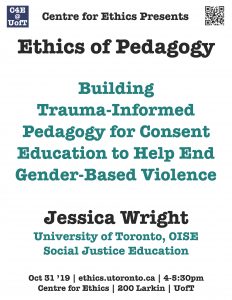
Building Trauma-Informed Pedagogy for Consent Education to Help End Gender-Based Violence
In recent years, there has been a proliferation of educational programming that centers the topic of sexual consent in order to address the epidemic of gender-based violence. However, these initiatives rely on a reductive, binary model of consent (“Yes!”/”No!”) that lacks an understanding of the psychosocial impacts of trauma and the particular struggles and access needs of some of the students most vulnerable to sexual re-victimization—trauma survivors. Drawing from research with diverse youth who self-identify as survivors of trauma, this talk will offer theoretical discussion and practical tools for shifting contemporary consent education to incorporate much-needed trauma-informed pedagogical approaches.
☛ please register here

Jessica Wright
04:00 PM - 05:30 PM
Social Justice Education
University of Toronto, OISE
Centre for Ethics, University of Toronto
200 Larkin - Wed, Oct 30, 2019
Ethics at Noon
Michael Lambek, On Sorcery: Life with the Concept (Ethics@Noon)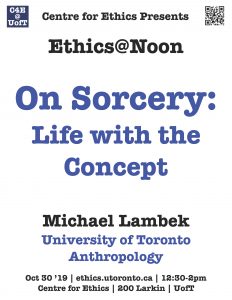
On Sorcery: Life with the Concept
The question of sorcery is less whether it is rational or ‘real’ than how people live with the concept. The paper draws from my mistakes in attempting to resolve a conflict over sorcery accusations among a group of siblings in Mayotte (Western Indian Ocean) in order to illuminate ethical dimensions of living with sorcery and also of studying it. I present a picture of some of the vulnerabilities and insights that life with sorcery offers.
☛ please register here
Michael Lambek
12:30 PM - 02:00 PM
University of Toronto
Anthropology
Centre for Ethics, University of Toronto
200 Larkin - Tue, Oct 29, 2019
Events in the Community
The Price of Rights: International Human Rights Law and Corporate Accountability
The Ethics, Society, and Law Students’ Association invites you to come out on October 29th to the Centre for Ethics (LA200) seminar room from 6:30pm-8pm to listen to two distinguished lawyers speak about transnational corporate legal accountability in cases of severe human rights abuse, and forced labor.
Cory Wanless, a visiting professor at the University of Toronto, and Grahame Russell, head of Guatemala-based non-profit human rights organization Rights Action, have worked extensively on the HudBay and Nevsun cases surrounding human rights abuse allegations against Canadian mining companies operating abroad in Guatemala and Eritrea respectively, both of which are still making their way through Canadian or international courts.
They will be speaking about their experiences working on these cases as well as the the stakes, complications, and implications of adopting international law on forced labour and slavery into Canadian domestic law.
Refreshments will be provided!
Itinerary:
6:30pm – 7:15pm: Cory and Grahame speak
7:15pm – 7:45pm: Questions and discussion
7:45pm – 8:00pm: Wrap-up and conclusions☛ please register here
06:30 PM - 08:00 PM
Centre for Ethics, University of Toronto
Rm 200, Larkin Building - Mon, Oct 28, 2019
Perspectives on Ethics
Kathryn Norlock, Do I Really Consent to Twitter's Terms of Service? (Perspectives on Ethics)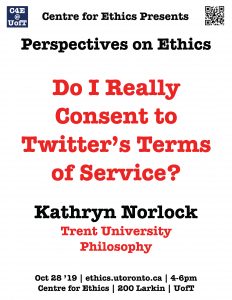
Do I Really Consent to Twitter’s Terms of Service?
Seemingly consent-capable social media users cannot fully appreciate the stakes of the gambles that we take in social media. The risks that I focus on include negatively transformative experiences stemming from negativity bias, to which most humans are prone, and which results in our remembering insults and hostility far more easily than compliments or kindness. Our abilities to satisfy risk-related consent standards require self-monitoring of the impact of negative experiences, which are undermined by our own online habituation and our desires to return to ludic loops of variable reward. I conclude that we can’t even implicitly consent, let alone click the consent checkbox for meaningfully explicit consent.
☛ please register here
Kathryn Norlock
04:00 PM - 06:00 PM
Trent University
Philosophy
Centre for Ethics, University of Toronto
200 Larkin - Thu, Oct 24, 2019
Ethics of AI in Context
Margit Sutrop, Should We Trust Artificial Intelligence? (Ethics of AI in Context)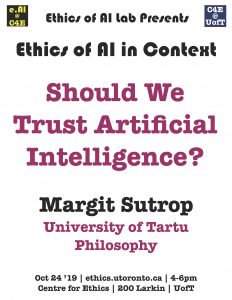
Should We Trust Artificial Intelligence?
Trust is believed to be a foundational cornerstone for artificial intelligence (AI). Recently the European Commission High Level Expert Group on AI adopted the Ethics Guidelines for Trustworthy AI (2019), stressing that human beings will only be able to confidently and fully reap the benefits of AI if they can trust the technology.
Although building trust in AI seems to be a shared aim, there is no overall agreement on what trust is, and what it depends on. In this talk, I will approach trust in AI from a philosophical perspective. On the basis of a conceptual analysis of trust I shall investigate under which conditions trust in AI is rational.
Philosophical accounts of trust differ on whether they argue that trust involves a belief that the trustee is trustworthy, an affective attitude or both. There is a consensus that trust involves the acceptance of risk and it is not compatible with excessive precautions. Several philosophers have pointed out that reasons for trust are preemptive reasons, i.e. reasons against taking precautions and against weighing available evidence of somebody’s trustworthiness.
We know that besides bringing substantive benefits to individuals and society, AI can also bring along serious risks. We should therefore ask if it is rational to be against taking precautions.
I am going to ask if instead of talking about building trust in AI and aiming at trustworthy AI, we should not focus on accountability of AI and trustworthiness of institutions designing and governing AI. Also, I shall point out that the metaphorical talk of trustworthy AI and ethically aligned AI ignores the real disagreements we have about ethical values.☛ please register here
Margit Sutrop
04:00 PM - 06:00 PM
University of Tartu
Philosophy
Centre for Ethics, University of Toronto
200 Larkin - Wed, Oct 23, 2019
Ethics of AI in Context: Emerging Scholars
Cylita Guy, Machine Learning for Prioritization in Conservation and Disease Surveillance (Ethics of AI in Context: Emerging Scholars)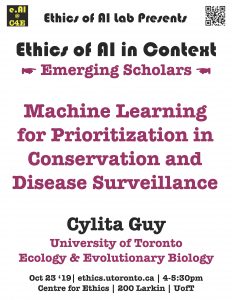
Machine Learning for Prioritization in Conservation
and Disease SurveillanceIn recent years, biologists have come up with a number of innovative applications for machine learning and computationally intensive approaches in ecology, evolution, and conservation. Often these methods are leveraged because they allow ecologists to capitalise on incomplete datasets in systems where the processes generating observed patterns are unknown. Further, because of their predictive nature these algorithms have proved useful for helping us to direct limited resources to the areas of greatest need. In this talk I will discuss two cases where I have applied machine learning in my research program. The first – dealing with predicting suitable habitat for Neotropical primates – will highlight how machine learning can be used for targeted conservation. The second – predicting which bat species may be future carriers of diseases capable of infecting humans – will touch on how these approaches can aid global sampling efforts under the One Health paradigm. Finally, I will finish with a discussion on the importance of communicating these results effectively to managers and the public, and the implications.
☛ please register here
 Cylita Guy
Cylita Guy
University of Toronto
Ecology & Evolutionary Biology
Dr. Cylita Guy obtained her PhD in the department of Ecology and Evolutionary Biology at the University of Toronto, where she currently works as a research associate. Using both fieldwork and computational methods, she is trying to understand why bats seem to be good at carrying viruses that they sometimes share with humans, but rarely get sick from themselves. Cylita is also an experienced science communicator. She spent 10 years working at the Ontario Science Centre, started a Junior Bat Biologist program with the High Park Nature Centre, and organized Canada’s first national science communication conference for graduate students. Cylita has also applied her computational skills to digital media data, previously working as a data scientist for the Canadian Broadcasting Corporation.
04:00 PM - 05:30 PM
Centre for Ethics, University of Toronto
200 Larkin - Wed, Oct 16, 2019
Ethics at Noon
Emma McClure, Microaffirmations, Privilege, and a Duty to Redistribute (Ethics@Noon)Microaffirmations, Privilege, and a Duty to Redistribute
Microaffirmations are the inverse of microaggressions: seemingly small acknowledgements that can accumulate into large positive impacts. Mary Rowe first proposed microaffirmations as a way for privileged people to consciously counter microaggressions. We could practice giving small supports to members of marginalized groups until these behaviors become habitual and replaced our propensity towards microaggressions.
Recent psychological discussions have uncritically adopted this conceptualization, but I point out the pitfalls of continuing along this path. The current discussion elides the fact that privileged people constantly receive small supports. Indeed, privilege is partially constituted by being the recipient of unceasing microaffirmations. Moreover, the feminist relational autonomy literature has shown that everyone—privileged and marginalized alike—requires social support in order to develop and maintain our autonomous capacities.
Thus, microaffirmations should not be thought of as providing vulnerable members of marginalized groups special treatment that we do not offer to anyone else. Instead, changing our microaffirmative practices would involve ending the special treatment we currently give by default to members of privileged groups. Ultimately, I argue for an imperfect moral duty to redistribute microaffirmations by supporting marginalized people and challenging privileged people’s assumed superiority.☛ please register here
Emma McClure
12:30 PM - 02:00 PM
University of Toronto
Centre for Ethics
Centre for Ethics, University of Toronto
200 Larkin - Thu, Oct 10, 2019
Ethics of Pedagogy
Paola Bohórquez, Beyond Deficit Thinking: Strategies for Engaging Linguistic Difference in the Multilingual Classroom (Ethics of Pedagogy)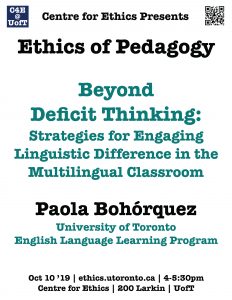
Beyond Deficit Thinking: Strategies for Engaging Linguistic Difference in the Multilingual Classroom
The presence of multilingual students and speakers of non-privileged varieties of English in our classrooms foregrounds linguistic difference as a key feature of university learning environments. Nevertheless, these students still face marginalization as their multilingual and multidialectal competencies are rendered invisible and inoperative in academic learning. Recent translingual approaches offer a new framework to rethink difference as constitutive of all communicative practices rather than as a feature of students’ diverse sociolinguistic identities. In this session, we will discuss practical strategies on how to engage our students’ linguistic multicompetencies in ways that may align our pedagogical practices with more expansive understandings of linguistic competence and academic literacy.
☛ please register here
04:00 PM - 05:30 PM Paola Bohórquez
Paola Bohórquez
University of Toronto
English Language Learning Program
Centre for Ethics, University of Toronto
200 Larkin - Wed, Oct 9, 2019
Ethics at Noon, Ethics of AI in Context
Jeff Behrends, Ethics Education in Computer Science: The Embedded EthiCS Approach (Ethics@Noon)Ethics Education in Computer Science: The Embedded EthiCS Approach
While scholarship on integrating ethical content into Computer Science curricula dates at least to the 1980s, recent moral crises in the tech industry have given rise to a period of intense interest in ethics education for computer scientists, both within academia and among the public at large. There can be little doubt at this point that a responsible education in computer science should equip students with some set of ethical knowledge and skills. But identifying precisely what that set ought to look like, and then designing a feasible curriculum to achieve it, are difficult tasks for a variety of reasons. At Harvard University, the Embedded EthiCS program marries the expertise from the faculty of Computer Science and Philosophy in an attempt to provide meaningful educational outcomes for students without significant investments in time for Computer Science faculty members, or a disruptive restructuring of the Computer Science curriculum. This talk will explain the basic structure of the program, and address its early successes and challenges.
☛ please register here
Jeff Behrends

Harvard University
Philosophy
co-sponsor:
12:30 PM - 02:00 PM

Centre for Ethics, University of Toronto
200 Larkin - Tue, Oct 8, 2019
Ethics of AI in Context
John Basl & Jeff Behrends, Why Everyone Has It Wrong About the Ethics of Autonomous Vehicles (Ethics of AI in Context)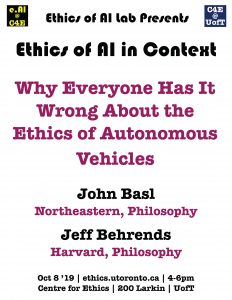
Why Everyone Has It Wrong About the Ethics of Autonomous Vehicles
Many of those thinking about the ethics of autonomous vehicles believe there are important lessons to be learned by attending to so-called Trolley Cases, while a growing opposition is dismissive of their supposed significance. The optimists about the value of these cases think that because AVs might find themselves in circumstances that are similar to Trolley Cases, we can draw on them to ensure ethical driving behavior. The pessimists are convinced that these cases have nothing to teach us, either because they believe that the AV and trolley cases are in fact very dissimilar, or because they are distrustful of the use of thought experiments in ethics generally.
Something has been lost in the moral discourse between the optimists and the pessimists. We too think that we should be pessimistic about the ways optimists have leveraged Trolley Cases to draw conclusions about how to program autonomous vehicles, but the typical defenses of pessimism fail to recognize how the tools of moral philosophy can and should be fruitfully applied to AV design. In this talk we first explain what’s wrong with typical arguments for dismissing the value of trolley cases and then argue that moral philosophers have erred by overlooking the significance of machine learning techniques in AV applications, highlighting how best to proceed.☛ please register here
John Basl

Northeastern University
Philosophy
Jeff Behrends
Harvard University
Philosophy
04:00 PM - 06:00 PM
Centre for Ethics, University of Toronto
200 Larkin - Mon, Oct 7, 2019
Perspectives on Ethics
John Basl, Artifact Welfare?: A Problem of Exclusion for Biocentrism (Perspectives on Ethics)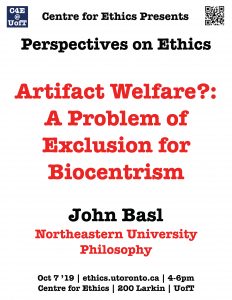
Artifact Welfare?: A Problem of Exclusion for Biocentrism
Biocentrism is the view that all and only living things have moral status or are deserving of direct moral concern. The project of defending Biocentrism includes adopting some strategy for excluding various kinds of things – biotic communities, ecosystems, species, and artifacts – from the domain of direct moral concern. This talk aims to showcase the failures of this strategy of exclusion specifically in the case of artifacts. The standard line for the Biocentrist is to argue that these things fail to meet the conditions for having a welfare or well-being, a necessary condition for having moral status of the relevant kind. The Biocentrist has, for good reason, typically adopted a view of non-sentient welfare that is teleological, grounding the welfare of non-sentient organisms in their goal-directed behaviors, and where pushed to articulate an account of goal-directedness, they have typically appealed to etiological account of function or teleology. When it comes to excluding artifacts, the reason artifacts are taken to lack a welfare is that, while goal-directed, their goal-directedness is derivative on our goals; whereas natural selection grounds genuine teleology, artificial selection does not. I explain why this appeal to natural selection can’t do the work the Biocentrist requires and consider a range of alternatives finding each lacking.
☛ please register here
John Basl
04:00 PM - 06:00 PM
Northeastern University
Philosophy
Centre for Ethics, University of Toronto
200 Larkin - Fri, Oct 4, 2019
Ethics & the Arts, Events in the Community
Not My Utopia: A ScreeningNot My Utopia: A Screening
Not My Utopia examines the technological status quo and looks towards other possible futures. Through inter-generational inquiry, this screening aims to provoke personal conversations between makers and audience about how to re-imagine the unfolding future. The present day urgency of Zeesy Power’s Smart City PSAs pushes back against libertarian utopias sold as the only answer to urban crises. Megan May Daalder’s documentary series Children of the Singularity questions assumptions of youth as passive consumers of the technologies and systems developed by their parents and invites them to be the preeminent philosophers of the future. Collectively, this screening look directly at the widespread gains and losses that are the legacy of technological development.
Presented by Pleasure Dome; a Toronto based, non-profit, artist-run presentation organization and publisher dedicated to experimental media.
07:30 PM - 10:00 PM
Ryerson Image Arts Centre
122 Bond St, RM 307 - Wed, Oct 2, 2019
Ethics & the Arts, Ethics & Film: Lights, Camera, Ethics!, Ethics in the City
Citizen Jane: Battle for the City (2016) (Ethics in the City Films)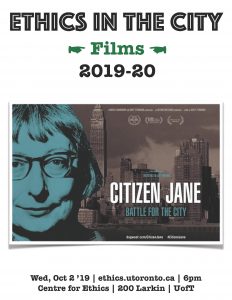
Writer and urban activist Jane Jacobs fights to save historic New York City during the ruthless redevelopment era of urban planner Robert Moses in the 1960s. Citizen Jane is a timely tale of what can happen when engaged citizens fight the power for the sake of a better world. Arguably no one did more to shape our understanding of the modern American city than Jane Jacobs, the visionary activist and writer who fought to preserve urban communities in the face of destructive development projects. Director Matt Tyrnauer (Valentino: The Last Emperor; Where’s My Roy Cohn?) vividly brings to life Jacobs’ 1960s showdown with ruthless construction kingpin Robert Moses over his plan to raze lower Manhattan to make way for a highway, a dramatic struggle over the very soul of the neighborhood.
Join us for a screening plus discussion (and cookies)!
☛ please register here
06:00 PM - 08:00 PM
Centre for Ethics, University of Toronto
Rm 200, Larkin Building - Wed, Oct 2, 2019
Ethics at Noon
Elena Comay del Junco, Aristotle and the Ethics of Nature (Ethics@Noon)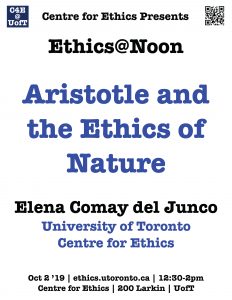
Aristotle and the Ethics of Nature
Aristotle holds certain natural beings to have greater or lesser degrees of value or perfection. This raises the question of what ethical entailments such a hierarchy might have. I argue for three main points: first, that there is no sense in which an ethical approach to the natural world can be straightforwardly derived from Aristotle’s form of natural hierarchy, since it does not entail viewing “lower” species instrumentally. Moreover, such a hierarchy is in fact fully compatible with strict limits on interspecies exploitation. Second, the one passage in which Aristotle seems to ground the exploitation of non-human nature by humans in his natural philosophy conflicts with his larger theoretical commitments. Third and finally, Aristotle himself – even if he is often unclear and self contradictory – provides powerful materials for an ethics of nature.
☛ please register here
Elena Comay del Junco
12:30 PM - 02:00 PM
University of Toronto
Centre for Ethics
Centre for Ethics, University of Toronto
200 Larkin - Tue, Oct 1, 2019
Ethics of AI in Context
Marzyeh Ghassemi, Can Machines Learn from Our Mistakes? (Ethics of AI in Context)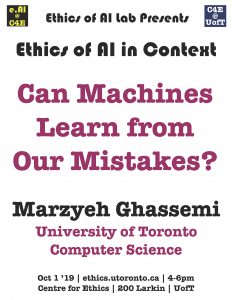
Can Machines Learn from Our Mistakes?
Healthcare runs on human-based algorithms, that routinely misdiagnose, mistreat, and mislead patients about their care. But what if mistakes aren’t bad? What if we could learn from these mistakes? And what does artificial intelligence have to do with it? Marzyeh Ghassemi’s talk will delve into how the machine learning revolution can be applied in a healthcare setting, to improve medical care and create actionable insights in human health.
☛ please register here
Marzyeh Ghassemi
04:00 PM - 06:00 PM
University of Toronto
Computer Science
Centre for Ethics, University of Toronto
200 Larkin - Mon, Sep 30, 2019
Perspectives on Ethics
Luvell Anderson, Navigating Racial Satire (Perspectives on Ethics)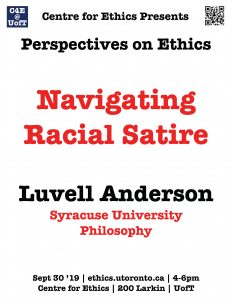
Navigating Racial Satire
What has to go wrong for racial satire to be racist? In 2014, Stephen Colbert came under fire for a tweet sent out on behalf of his show The Colbert Report. The tweet in question, “I am willing to show @Asian community I care by introducing the Ching-Chong-Ding-Dong Foundation for Sensitivity to Orientals or Whatever,” sparked a twitter response from writer and hashtag activist Suey Park. The tweet was a brief recap of a joke Colbert told on the show as a satirical response to Daniel Snyder’s creation of a charitable organization for Native Americans while continuing to maintain a racial slur for the same group as the name of his football team. We typically think of humor as a non-serious context. These sorts of contexts affect how we interpret utterances. Normally, we don’t interpret humorous utterances as straightforward assertions. In fact, some responses to the charge of racism against Colbert’s satirical performance claimed that recognizing it as satire was enough to exonerate the humor of the charge. But if this is so, what explains when charges of racism against satire persist? In this talk I critically explore candidate views of racist satire. I also draw a distinction between satire that is offensive and satire that is racist.
☛ please register here
Luvell Anderson
04:00 PM - 06:00 PM
Syracuse University
Philosophy
Centre for Ethics, University of Toronto
200 Larkin - Wed, Sep 18, 2019
Ethics at Noon
Jill Ross, Horatian Poetics and Moral Theory in the Middle Ages (Ethics@Noon)
Horatian Poetics and Moral Theory in the Middle Ages
One of the animating doctrines of medieval poetic theory is the avoidance of poetic error. Based on the first 37 lines of Horace’s Art of Poetry where the poet counsels against inept, monstrous composition, medieval commentators created a system of 6 poetic errors that became a canonical element in the teaching of poetic technique in the standard artes poetriae of Geoffrey of Vinsauf and Matthew of Vendôme. The term used to refer to these poetic errors, vitia, carries with it a moral, ethical charge, with poetry placed firmly under the philosophical rubric of ethics. While this prescriptive system of avoiding poetic vice is a theoretical topos, what is less clear is how poets chose to intervene in such a fixed system. In this paper, I will use a case study of Juan Ruiz, a fourteenth-century Castilian poet who turns these poetic errors inside out in the process of narrating the moral, sexual sins of his protagonist whose unsuccessful efforts at seduction mirror the aesthetic lapses of the text itself. The poetic text of the Libro de buen amor (Book of Good Love) deliberately commits every aesthetic error condemned by Horace and his medieval readers in a poem that self-reflexively blurs the boundaries between poetics and ethics. I will then explore, through a sampling of commentary on Horace’s Ars Poetica, spanning the 12th to the 15th centuries, how and why the writing of poetry may constitute an ethical act. By placing the Horatian material in conversation with both Aristotelian ethics and the large Christian literature on sin, this paper will explore some possible avenues for theorizing and defining the kind of moral lapse that some commentators attributed to faulty poetic composition.
☛ please register here
Jill Ross
12:30 PM - 02:00 PM
University of Toronto
Comparative Literature and Medieval Studies
Centre for Ethics, University of Toronto
200 Larkin - Tue, Sep 17, 2019
Ethics of AI in Context
Teresa Heffernan, The Ethical Imagination: Humanities versus Artificial Intelligence (Ethics of AI in Context)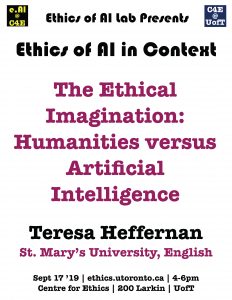
The Ethical Imagination: Humanities versus Artificial Intelligence
The era of “disruptive” technologies has given way to an ethical quagmire. Biased algorithms, invasive facial recognition software, proprietary black boxes, the theft and monetization of personal data, and the proliferation of hate-spewing bots and deepfakes have undermined democracy. Killer robots and the automation of war have led to a new arms raise with Vladimir Putin declaring whoever leads in AI will rule the world. The concentration of wealth and power of corporations that own most of this resource-intensive technology and the environmental price tag of AI can only hasten climate change. In response to these ethical problems, a number of research centres are now investing in the intersection of humanities and AI in order to study its impact on society, notably the Schwarzman College for Computing at MIT, the Schwartz Reisman Institute for Technology and Society at the University of Toronto, and The Schwarzman Centre’s Institute for Ethics in AI at Oxford. An article about the MIT initiative noted: “The approach has the potential not just to diversify tech but to help ‘techify’ everything else” while Geoffrey Hinton said: “My hope is that the Schwartz Reisman Institute will be the place where deep learning disrupts the humanities.” What these statements disavow, however, are the very different epistemological approaches that structure these fields. If we are to begin to deal with the ethical issues of AI, the humanities should not be “disrupted” and made to bow to the logic of big data, algorithms, and machines. In this talk, I will argue that it is only by keeping alive the tensions between artificial intelligence and the humanities that we can hope to have an informed debate about the limits and possibilities of this technology.
☛ please register here
Teresa Heffernan
04:00 PM - 06:00 PM
St. Mary’s University
English
Centre for Ethics, University of Toronto
200 Larkin - Tue, Sep 10, 2019
Ethics of AI in Context
Ifeoma Ajunwa, The Paradox of Automation as Anti-Bias Intervention (Ethics of AI in Context)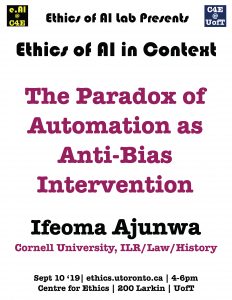
The Paradox of Automation as Anti-Bias Intervention
A received wisdom is that automated decision-making serves as an anti-bias intervention. The conceit is that removing humans from the decision-making process will also eliminate human bias. The paradox, however, is that in some instances, automated decision-making has served to replicate and amplify bias. With a case study of the algorithmic capture of hiring as heuristic device, this Article provides a taxonomy of problematic features associated with algorithmic decision-making as anti-bias intervention and argues that those features are at odds with the fundamental principle of equal opportunity in employment. To examine these problematic features within the context of algorithmic hiring and to explore potential legal approaches to rectifying them, the Article brings together two streams of legal scholarship: law and technology studies and employment & labor law.
Counterintuitively, the Article contends that the framing of algorithmic bias as a technical problem is misguided. Rather, the Article’s central claim is that bias is introduced in the hiring process, in large part, due to an American legal tradition of deference to employers, especially allowing for such nebulous hiring criterion as “cultural fit.” The Article observes the lack of legal frameworks that take into account the emerging technological capabilities of hiring tools which make it difficult to detect disparate impact. The Article thus argues for a re-thinking of legal frameworks that take into account both the liability of employers and those of the makers of algorithmic hiring systems who, as brokers, owe a fiduciary duty of care. Particularly related to Title VII, the Article proposes that in legal reasoning corollary to extant tort doctrines, an employer’s failure to audit and correct its automated hiring platforms for disparate impact could serve as prima facie evidence of discriminatory intent, leading to the development of the doctrine of discrimination per se. The article also considers other approaches separate from employment law such as establishing consumer legal protections for job applicants that would mandate their access to the dossier of information consulted by automated hiring systems in making the employment decision.☛ please register here
Ifeoma Ajunwa
04:00 PM - 06:00 PM
Cornell University
Labor Relations, Law, and History
Centre for Ethics, University of Toronto
200 Larkin - Wed, Aug 21, 2019
Ethics of AI in Context: Emerging Scholars
Automated Violence: Who Will Guard the Guards? (w/ Daniella Barreto & Nicole Leaver) (Ethics of AI in Context: Emerging Scholars) 04:00 PM - 05:30 PM
04:00 PM - 05:30 PM
Centre for Ethics, University of Toronto
200 Larkin - Fri, Aug 16, 2019
Public Issues Forum, Ethics of AI in Context
State of AI Ethics: A Critical Discussion on the Societal Impacts of AI (w/ Montreal AI Ethics Institute) 05:45 PM - 08:15 PM
Centre for Ethics, University of Toronto
Rm 200, Larkin Building - Wed, Aug 7, 2019
Ethics of AI in Context: Emerging Scholars
Business-as-Trust: Corporate Social Responsibility in the Era of AI (w/ Michael Motala) (Ethics of AI in Context: Emerging Scholars)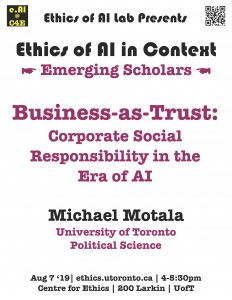
Business-as-Trust: Corporate Social Responsibility in the Era of AI
The new Artificial Intelligence-powered social technology economy has disrupted local and global markets with bewildering speed. From hoteling to online dating to urban transportation, GPS-enabled location-based apps like Uber, Facebook, Amazon, and Airbnb have broken down conventional axes of economic regulation, social interaction, and commercial power. Why and how must we reimagine the normative and practical foundations of corporate social responsibility and business ethics? Current approaches such as the stockholder and stakeholder theory of corporate social responsibility are vague, abstract, indeterminate, and have little relevance to the modern economy. To move past this impasse, this lecture, which is based on a forthcoming book entitled The New Business Ethics (Routledge, 2019), argues we must reimagine corporate social responsibility in five critical ways: as a practical process of decision-making and accountability that exists to foster and maintain trust in enterprise; as a dynamic and process-relational system of interconnected institutions and agents; as a discourse ethics concerned with articulating a new universal pragmatics; as an actor-centric model of market-state relations; and as a new social constitution of the digital economy grounded in the principles of responsibility, transparency, and accountability.
☛ please register here
 Michael Motala
Michael Motala
University of Toronto
Political ScienceMichael Motala is an Ethics of Artificial Intelligence Graduate Research Fellow at the University of Toronto’s Centre for Ethics, and a PhD student studying political science. Michael’s research interests lie at the intersection of law, economics, political science, and pragmatist moral philosophy. He holds degrees from Columbia University, Osgoode Hall Law School, the London School of Economics and Political Science, and the University of Toronto’s Trinity College.
04:00 PM - 05:30 PM
Centre for Ethics, University of Toronto
200 Larkin - Wed, Jul 24, 2019
Ethics of AI in Context: Emerging Scholars
The Labour Behind AI: Micro-Work and the Platform Economy (w/ Julian Posada) (Ethics of AI in Context: Emerging Scholars)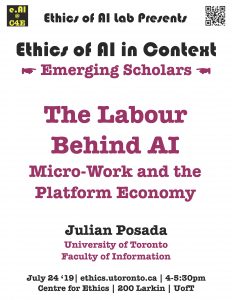
The Labour Behind AI: Micro-Work and the Platform Economy
From data collection and annotation to AI impersonation, platforms like Amazon Mechanical Turk and Upwork fragment and outsource tasks to millions of workers around the globe, many of them situated in developing countries. This seminar focuses on how human labour in the platform economy helps to create and maintain AI systems. It positions platforms as organizational paradigms and retraces their historical evolution within contemporary neo-liberal capitalism. While “micro-work” platforms generate employment in developing countries, they are often disengaged from the traditional social role of enterprises and do not provide any social and economic protections to their workers. Due to their international nature, effective regulation of these platforms is challenging. However, this seminar concludes by presenting other potential alternatives that could improve the working conditions of workers in the global platform economy such as the implementation of ethical work principles and the empowerment of workers through co-operation.
☛ please register here
Julian Posada
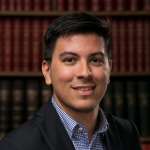
University of Toronto
Faculty of InformationJulian Posada is a Ph.D. student at the Faculty of Information of the University of Toronto and a Junior Fellow of Massey College. His research focuses on alternative forms of organization, fair labour, and worker co-operation in the platform economy. Previously, he worked for the French National Centre for Scientific Research (CNRS) and holds a master’s degree in economic sociology from the School for Advanced Studies in the Social Sciences (EHESS) and a bachelor’s degree in the Humanities from Sorbonne University.
04:00 PM - 05:30 PM
Centre for Ethics, University of Toronto
200 Larkin - Wed, Jul 10, 2019
Ethics of AI in Context: Emerging Scholars
AI and Medical Education (w/ Nishila Mehta & AIMSS) (Ethics of AI in Context: Emerging Scholars)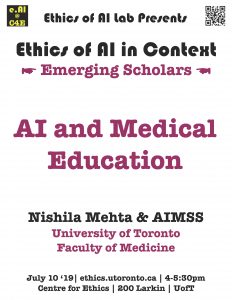
AI and Medical Education
Today, emerging technologies like artificial intelligence, gene editing, nanotechnology, and blockchain are being explored as ways to fundamentally “disrupt” medicine and healthcare. Despite the promises of such technologies, implementing them has presented countless unintended challenges. First and foremost, given the Hippocratic duties of healthcare providers to ‘do no harm’, it is essential that the role of these emerging technologies in medicine is carefully scrutinized by practitioners that understand and can think critically about them. Artificial intelligence (AI) can be broadly defined as the ability for a machine to perform human-like tasks after learning from experience. AI is poised to introduce significant changes to medicine and healthcare. Physicians will be expected to navigate these changes and use new technologies in a competent and ethical manner. Currently, curricular and extracurricular opportunities addressing AI in medicine across Ontario medical schools are sparse or nonexistent. Failing to prepare future physicians to respond and adapt to novel AI applications in medicine may lead to dire consequences including but not limited to decreased quality of care, exploitation of patient data, and widened health disparities. It is crucial that physicians, as patient advocates, are equipped with the skills and knowledge base to be a voice in the evolving dialogue surrounding the integration of AI into healthcare.
☛ please register here
 Nishila Mehta is a first-year medical student at the University of Toronto, and a recent graduate of York University’s Global Health program with a specialization in eHealth. She has diverse interests in health technology, quality improvement, and health equity, and has explored these by leading several research projects at hospital and university sites. Her interest in AI Ethics grew out of her undergraduate degree, where she observed the widespread societal consequences that emerging technologies could have. She has spent her year as an inaugural research fellow in Ethics of AI at the Centre for Ethics exploring the implications of Artificial Intelligence for medical education and global health equity. She has also worked alongside a student group at the faculty of medicine called the “Artificial Intelligence in Medicine Student Society” (AiMSS) to further explore how AI can be integrated into medical education.
Nishila Mehta is a first-year medical student at the University of Toronto, and a recent graduate of York University’s Global Health program with a specialization in eHealth. She has diverse interests in health technology, quality improvement, and health equity, and has explored these by leading several research projects at hospital and university sites. Her interest in AI Ethics grew out of her undergraduate degree, where she observed the widespread societal consequences that emerging technologies could have. She has spent her year as an inaugural research fellow in Ethics of AI at the Centre for Ethics exploring the implications of Artificial Intelligence for medical education and global health equity. She has also worked alongside a student group at the faculty of medicine called the “Artificial Intelligence in Medicine Student Society” (AiMSS) to further explore how AI can be integrated into medical education.The Artificial Intelligence in Medicine Society (AIMSS) is a group for medical students at the University of Toronto. It was established in 2017 after students noticed the growing impact of machine learning and artificial intelligence on the healthcare field. Our mission is to provide medical students with insight on how AI is being applied to healthcare as well as the challenges it raises (especially ethically), connect students with opportunities and resources in the Toronto health-tech space, and advocate for greater integration of AI into the medical curriculum to prepare future doctors for the healthcare environment of tomorrow. We do this through speaker series, interactive workshops, and publishing in the scientific and popular literature. Our latest paper is a position paper endorsed by the Ontario Medical Students’ Association which outlines how we can better prepare medical students for AI in healthcare. It can be accessed here: https://omsa.ca/en/position-papers/preparing-medical-students-impact-artificial-intelligence.
04:00 PM - 05:30 PM
Centre for Ethics, University of Toronto
200 Larkin - Thu, Jun 27, 2019
Events on Campus
Media Ethics: Human Ecology in a Connected World12:00 AM - 11:59 PMThe 20th Annual Convention of the Media Ecology Association
International Conference
Toronto, 27-30 June 2019Presented by:
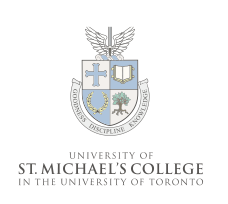
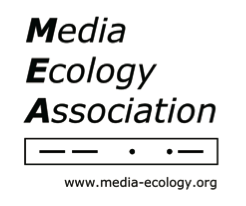


St Michael's College
81 St. Mary Street - Wed, Jun 26, 2019
Ethics of AI in Context: Emerging Scholars
Rebooting Regulation: Insights from a Series of Cross-Country AI Policy Labs (w/ Sarah Villeneuve) (Ethics of AI in Context: Emerging Scholars)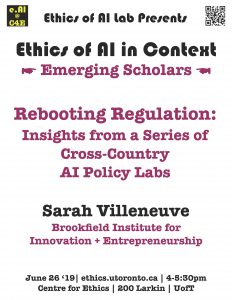
Rebooting Regulation: Insights from a Series of Cross-Country AI Policy Labs
Breakthroughs in artificial intelligence (AI) technologies, like prediction, natural language processing, and pattern and image recognition, offer promising opportunities and the potential for better services. Yet, they also pose challenges in areas such as fairness, privacy, and safety. There is an increasing need to build capacity within the public policy field to ensure AI technologies are developed, implemented, and governed in ways that align with public interest objectives. In this session, Sarah will share insights from discussions with policymakers across Canada around the ethical implications and policy considerations of AI development, as part of the AI Futures Policy Lab series co-designed by the Brookfield Institute for Innovation + Entrepreneurship and CIFAR.
☛ please register here
04:00 PM - 05:30 PM Sarah Villeneuve is an interdisciplinary researcher investigating the socio-economic impacts of artificial intelligence with the aim of influencing technology design and public policy in Canada. She is currently a Policy Analyst at the Brookfield Institute for Innovation + Entrepreneurship where she explores the impact of AI on public policy and the labour market, as well as public attitudes towards emerging technologies. Sarah holds a Master of Science in Data and Society from the London School of Economics and Political Science and a Bachelor of Arts in Political Science and International Relations from the University of London. Her previous research has focused on algorithmic discrimination, smart-city marginalization, and predictive analytics for governance.
Sarah Villeneuve is an interdisciplinary researcher investigating the socio-economic impacts of artificial intelligence with the aim of influencing technology design and public policy in Canada. She is currently a Policy Analyst at the Brookfield Institute for Innovation + Entrepreneurship where she explores the impact of AI on public policy and the labour market, as well as public attitudes towards emerging technologies. Sarah holds a Master of Science in Data and Society from the London School of Economics and Political Science and a Bachelor of Arts in Political Science and International Relations from the University of London. Her previous research has focused on algorithmic discrimination, smart-city marginalization, and predictive analytics for governance.
Centre for Ethics, University of Toronto
200 Larkin - Mon, Jun 17, 2019
Author Meets Critics, Ethics of AI in Context
Mark Kingwell, Wish I Were Here: Boredom and the Interface (Author Meets Critics)
Wish I Were Here: Boredom and the Interface (McGIll 2019)
Mark Kingwell
Department of Philosophy
University of TorontoCommentators:
Lauren Bialystok (Social Justice Education, OISE, University of Toronto)
Molly Sauter (Communication Studies, McGill University)
Ira Wells (Victoria College, University of Toronto)
☛ register here
Offering a timely meditation on the profound effects of constant immersion in technology, also known as the Interface, Wish I Were Here draws on philosophical analysis of boredom and happiness to examine the pressing issues of screen addiction and the lure of online outrage. Without moralizing, Mark Kingwell takes seriously the possibility that current conditions of life and connection are creating hollowed-out human selves, divorced from their own external world. While scrolling, swiping, and clicking suggest purposeful action, such as choosing and connecting with others, Kingwell argues that repeated flicks of the finger provide merely the shadow of meaning, by reducing us to scattered data fragments, Twitter feeds, Instagram posts, shopping preferences, and text trends captured by algorithms.
Written in accessible language that references both classical philosophers and contemporary critics, Wish I Were Here turns to philosophy for a cure to the widespread unease that something is amiss in modern waking life.
04:15 PM - 06:15 PM
Centre for Ethics, University of Toronto
Rm 200, Larkin Building - Wed, Jun 12, 2019
Ethics of AI in Context: Emerging Scholars
Humanistic Management of Artificial Intelligence (w/ Ryan Khurana) (Ethics of AI in Context: Emerging Scholars)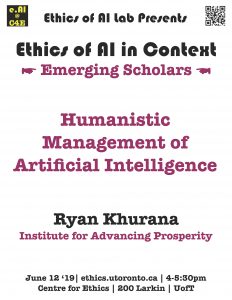
Humanistic Management of Artificial Intelligence
Artificial intelligence is challenging the dominant paradigm of scientific management by increasing the importance of judgement in decision-making, which has been historically undervalued. The highly specialised jobs and process-driven bureaucratic structures that dominate large organizations favour excessive automation. This would reduce the number of roles available for qualified workers while simultaneously increasing the risk of catastrophic prediction failure, as humans are likely to be prematurely removed “from the loop.” In order to ensure the productivity benefits promised by artificial intelligence while avoiding large scale failure, a program of humanistic management that allows for error and values qualitative judgement needs to be adopted.
☛ please register here
04:00 PM - 05:30 PM Ryan Khurana is the Executive Director of the Institute for Advancing Prosperity, a technology policy think tank in Toronto. Prior to this, he held roles in technology policy at the Competitive Enterprise Institute in Washington, D.C., and at the Institute of Economic Affairs in London, UK.
Ryan Khurana is the Executive Director of the Institute for Advancing Prosperity, a technology policy think tank in Toronto. Prior to this, he held roles in technology policy at the Competitive Enterprise Institute in Washington, D.C., and at the Institute of Economic Affairs in London, UK.
Centre for Ethics, University of Toronto
200 Larkin - Wed, Jun 5, 2019
Ethics of AI in Context
What Society Must Require from AI (w/ Ron Baecker)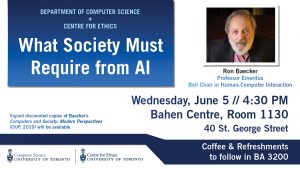
What Society Must Require from AI
Presented By: Ron Baecker, Professor Emeritus and Bell Chair in Human-Computer Interaction
☛ register here
Abstract:
Artificial intelligence (AI) algorithms, especially machine learning (ML) programs, are now being employed or proposed for use in:
a) scanning résumés to weed out job applicants;
b) evaluating risks children face in their families;
c) informing judicial decisions about bail, sentencing, and parole;
d) diagnosing medical conditions, and not just classifying medical images;
e) identifying faces in the crowd for the police;
f) caring for seniors;
g) driving autonomous vehicles; and
h) guiding and directing drones in eliminating terrorists.I will propose what society must require of algorithms that affect human welfare, health, life, and death. I shall discuss concepts including reliability, openness, transparency, explainability, trustworthiness, responsibility, accountability, empathy, compassion, fairness, and justice. The results will aid researchers in prioritizing problems for AI and HCI research, and will assist policy makers and citizens in determining when and how AI technology should be deployed.
Biography:
Ron Baecker is Emeritus Professor of Computer Science and Bell Chair in Human-Computer Interaction at the University of Toronto.
He co-founded the Dynamic Graphics Project, and founded the university’s Knowledge Media Design Institute and its Technologies for Aging Gracefully lab (TAGlab). Recently, he has been a research lead in AGE-WELL, Canada’s technology and aging network.
He has been named one of the 60 Pioneers of Computer Graphics by ACM SIGGRAPH, has been elected to the CHI (Computers and Human Interaction) Academy by ACM SIGCHI, has been named an ACM Fellow, and has been given the Canadian Human Computer Communications Society Achievement Award and a Canadian Digital Media Pioneer Award.
He is the author of 5 books including Computers and Society: Modern Perspectives (Oxford University Press, 2019) and is the founding Editor of the Synthesis Lectures on Assistive, Rehabilitative, and Health-preserving Technologies (Morgan & Claypool, Publisher).This is a joint lecture with the Department of Computer Science and the Centre for Ethics.
04:30 PM - 06:30 PM
Department of Computer Science, University of Toronto
Bahen Centre for Information Technology, Room 1130 - Wed, May 29, 2019
Ethics of AI in Context: Emerging Scholars
Robotic Agents and the Evolving Nature of "Social" (w/ Shane Saunderson) (Ethics of AI in Context: Emerging Scholars)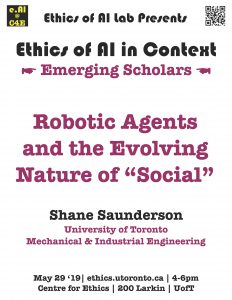
Robotic Agents and the Evolving Nature of “Social”
Building on The Media Equation (1996), which highlighted the reflexive way humans treat computers and other technologies as social actors, this seminar will explore the depths and implications of robots and other anthropomorphized technologies as they adopt increasingly humanlike traits. As these technologies learn to mimic and replicate the nuances of our interactions, what responsibility do we have for their deployment and transparency in use? How will the creation of increasingly humanlike technologies change the ways in which we work, play, and live? Even if we could create artificial people, should we?
☛ please register here
Shane Saunderson

University of Toronto
Mechanical and Industrial Engineering
Shane Saunderson received a B.Eng. in mechanical engineering from McGill University in 2005 and a M.B.A. in technology and innovation from Ryerson University in 2011. He is currently a Ph.D. candidate studying social Human-Robot Interaction under Prof. Goldie Nejat within the Autonomous Systems and Biomechatronics Laboratory (ASBLab) in the Department of Mechanical and Industrial Engineering at the University of Toronto. Shane holds a Vanier Canada Graduate Scholarship and is a Junior Fellow with Massey College. His research focuses on psychological influence caused by robots during social interactions with particular interest in topics such as persuasion, trust, and leadership.
04:00 PM - 05:30 PM
Centre for Ethics, University of Toronto
200 Larkin - Thu, May 23, 2019
Ethics of AI in Context
Nagla Rizk, Artificial Intelligence and Inequality in the Middle East: The Political Economy of Inclusion (Ethics of AI in Context)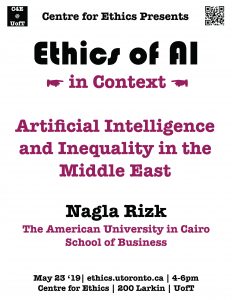
Artificial Intelligence and Inequality in the Middle East: The Political Economy of Inclusion
This paper explores the challenges, opportunities and tensions facing the equitable development of AI in the MENA region in the aftermath of the Arab Spring. While diverse in their natural and human resource endowments, countries of the region share a commonality in the predominance of a youthful population amidst complex political and economic contexts. The paper sheds light on how rampant unemployment, especially amongst a growing young population together with informality, gender and digital inequalities will likely shape the impact of AI technologies, especially in the region’s labour abundant resource poor countries. The paper attempts to unpack issues related to data, legislative environment, infrastructure and human resources as key inputs to AI technologies which in their current state may exacerbate existing inequalities. The promise for AI technologies for inclusion and helping mitigate inequalities lies in harnessing grounds up youth entrepreneurship and innovation initiatives driven by data and AI, with a few hopeful signs coming from national policies. The paper concludes that AI can concurrently serve to equalize and divide, underline the gap in focus between the economic and the political, and exemplify how investment in technology alone without developing human capital and an enabling environment would fail to achieve the desired objectives. With focus on political will, an awareness of these tensions informs the debate on AI and inclusion and helps mitigate the challenges and the threats that AI would exacerbate inequality in the region.
☛ please register here
Nagla Rizk
04:00 PM - 06:00 PM
The American University in Cairo
School of Business
Centre for Ethics, University of Toronto
200 Larkin - Fri, May 3, 2019
Conferences
The Ethics of Roles: Public, Professional, Personal (C4E Graduate Student Conference)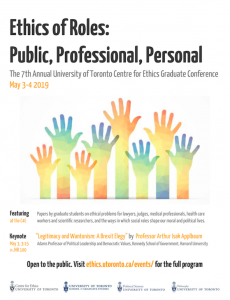
The 7th Annual Graduate Student Conference
Centre for Ethics, University of Toronto
May 3-4, 2019The Ethics of Roles: Public, Professional, Personal explores the place of roles in our ethical lives and the duties of public and professional role occupants. The conference features presentations by graduate students from Canada and abroad, with comments by the Centre for Ethics Graduate Associates. Topics range from ethical problems for specific roles, including lawyers, judges, medical professionals, care workers, and scientific researchers, to more general investigations of how social roles shape our moral and political lives. View the full conference program and the agenda package .
The conference also features a keynote address by Professor Arthur Applbaum of Harvard University. Applbaum is the author of Ethics for Adversaries: The Morality of Roles in Public and Professional Life (Princeton, 1999). His work has appeared in journals such as Philosophy & Public Affairs, Journal of the American Medical Association, Harvard Law Review, Ethics, and Legal Theory.
Note on locations: the graduate student papers will be presented at the Centre for Ethics, while the keynote address is at the Jackman Humanities Building. All locations are accessible and have accessible and gender-neutral washrooms.
If you have any questions, contact Hamish Russell at graduateassociates@gmail.com
Keynote Speaker:
12:00 AM - 11:59 PM
Arthur Applbaum
Adams Professor of Political Leadership and Democratic Values
Kennedy School of Government, Harvard University “Legitimacy and Wantonism: A Brexit Elegy” Fri, 3 May 2019
3:15 PM – 5:00 PM EDT
Jackman Humanities Building, Rm 100
170 St. George Street
☛ register for keynote here
Centre for Ethics, University of Toronto
Rm 200, Larkin Building - Wed, Apr 10, 2019
Ethics & the Arts, Ethics & Film: Lights, Camera, Ethics!, Ethics in the City
Ethics & Film: The Experimental City (Ethics in the City Film Series)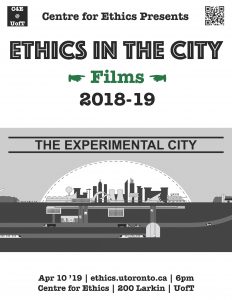 The Experimental City (2017)
The Experimental City (2017)In the 1960s, frustrated by the growing problem of urban pollution, Athelstan Spilhaus, a visionary scientist and futurist comic strip writer, assembled a team of experts to develop a bold experiment: the Minnesota Experimental City (MXC). MXC would be the city of the future, a domed metropolis for 250,000 pioneering residents, built from scratch and using cutting-edge technology to prevent urban sprawl and pollution. Things didn’t quite go as planned, as explored in Chad Friedrichs’ fascinating look back at the would-be city of tomorrow.
☛ please register here
06:00 PM - 08:00 PM
Centre for Ethics, University of Toronto
Rm 200, Larkin Building - Wed, Apr 10, 2019
Ethics in the City
Ethics in the City: Theresa Enright04:00 PM - 06:00 PM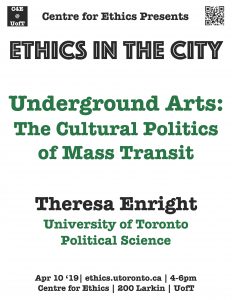
Underground Arts: The Cultural Politics of Mass Transit
Abstract: In the past two decades, cities around the world have tied investments in public transit to high-profile initiatives of art, design, architecture, and cultural programming. While transit art is proliferating, and has become a standard element of infrastructure planning, it is not well understood why municipalities and transit authorities are prioritizing the arts, or what function this cultural production plays in broader dynamics of urban development. This talk considers the close association between art and infrastructure investment with a focus on Toronto’s urban rail network. It asks: What accounts for the proliferation of transit art today? Where, how, and why is this occurring? And with what effects?
Through investigating the cultural politics of transit, the paper identifies transit art as an important means for representing, imagining, producing, and organizing urban space and urban society. In line with existing critical research on public art, the paper finds that art and design are being used to ‘clean up’ struggling and defunded public utilities, to promote speculative financial investment, and to rebrand aspiring cities through culture-led placemaking. However, it also finds that transit art and design have less obvious functions—turning transit networks into valuable cultural assets, promoting vibrant public spheres, building communities, generating dynamic metropolitan imaginaries, and placing people and neighbourhoods in a hypermobile world.
☛ please register here
 Theresa Enright
Theresa Enright
University of Toronto
Political Science
Centre for Ethics, University of Toronto
Rm 200, Larkin Building - Wed, Mar 27, 2019
Ethics & the Arts, Ethics & Film: Lights, Camera, Ethics!, Ethics in the City
Ethics & Film: Metropolis (Ethics in the City Film Series)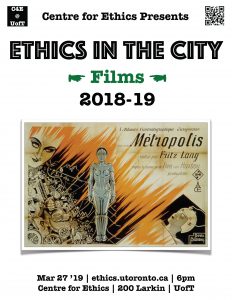
In a futuristic city sharply divided between the working class and the city planners, the son of the city’s mastermind falls in love with a working class prophet who predicts the coming of a savior to mediate their differences. (IMDb)
Join us for a screening plus discussion (and cookies)!
☛ please register here
06:00 PM - 08:00 PM
Centre for Ethics, University of Toronto
Rm 200, Larkin Building - Wed, Mar 27, 2019
Ethics at Noon
Ethics@Noon: Benjamin Berger
Indigenous Rights, Sovereignty, and the Heart of Religious Freedom
Recent years have seen the rise of religious freedom as the “most difficult right” in the Canadian legal landscape, just as it has become an increasingly contested constitutional concept in other jurisdictions. Freedom of religion has become a site for debate about the nature of the public/private divide, the balancing of competing rights, and the role of group and collective rights. Scholarship seeking to understand the right — and the place and workings of religious freedom within liberal constitutionalism — has tended to explore its relationship to broad concepts like “secularism” and multiculturalism, and to understand it either as an equality- or liberty-based protection. This talk will use the Supreme Court of Canada’s recent decision in Ktunaxa Nation v British Columbia as a pathway into a different understanding of the fundamental problematic at play in religious freedom. In Ktunaxa, an Indigenous nation sought protection of its religious beliefs and practices under section 2(a) of the Charter. Linking the case to other developments in Canada and abroad, this talk will argue that the Ktunaxa Nation’s decision to pursue their claim as a matter of freedom of religion — and the Court’s reasons for unanimously rejecting that claim — call our attention to the place of sovereignty in the architecture of religious freedom. The specific features of Indigenous religions in a colonial context, and their awkward treatment in law, illuminate more broadly what is so difficult about freedom of religion.
☛ please register here
Benjamin Berger
12:30 PM - 02:00 PM
York University
Osgoode Hall Law School
Centre for Ethics, University of Toronto
200 Larkin - Tue, Mar 26, 2019
Ethics of AI in Context
Ethics of AI in Context: Sheila McIlraith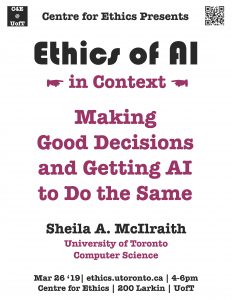
Making Good Decisions and Getting AI to Do the Same
As we contemplate a future in which AI systems are making decisions about everything from how long to toast our bagel to how fast our car should be driving on the icy roads, how do we ensure that these AI systems are making good decisions on our behalf? It has been suggested that highly autonomous AI systems adhere to the Value Alignment principle — that they be designed so that their goals and behaviours can be assured to align with human values throughout their operation — but how do we go about doing this? In this talk I will discuss technical approaches to building autonomous systems that “do the right thing” and the challenges to realizing this objective as we contemplate the elusive path from toasters to Artificial General Intelligence.
☛ please register here
04:00 PM - 06:00 PM Sheila A. McIlraith
Sheila A. McIlraith
University of Toronto
Computer Science
Centre for Ethics, University of Toronto
200 Larkin - Wed, Mar 13, 2019
Ethics & the Arts, Ethics & Film: Lights, Camera, Ethics!, Ethics in the City
Ethics & Film: The Human Scale (Ethics in the City Film Series)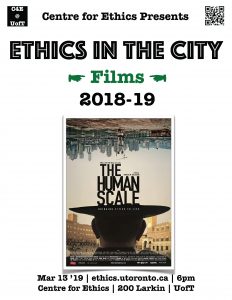
☛ please register here
06:00 PM - 08:00 PM
Centre for Ethics, University of Toronto
Rm 200, Larkin Building - Wed, Mar 13, 2019
Ethics at Noon
Ethics@Noon: Tom Parr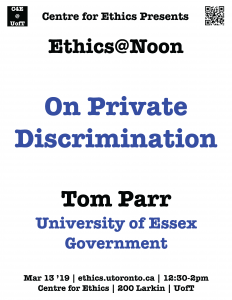
On Private Discrimination
On what basis, if any, may owners of small businesses discriminate against customers or their requests? In particular, should these vendors enjoy a right to refuse to manifest beliefs that they do not hold? And, if so, what are the contours of this right? On the one hand, there are those who deny that private discrimination of this kind is ever permissible; on the other hand, there are those who maintain that it is always permissible. Perhaps predictably, my view occupies a position in between these two extremes: small vendors should enjoy a prerogative to discriminate against customers and their requests, but this prerogative is restricted. My defence of this claim comes in two parts. First, I explain why owners of small businesses should enjoy such a prerogative to discriminate. Second, I set out three ways in which we should restrict the prerogative. ‘On Private Discrimination’: On what basis, if any, may owners of small businesses discriminate against customers or their requests? In particular, should these vendors enjoy a right to refuse to manifest beliefs that they do not hold? And, if so, what are the contours of this right? On the one hand, there are those who deny that private discrimination of this kind is ever permissible; on the other hand, there are those who maintain that it is always permissible. Perhaps predictably, my view occupies a position in between these two extremes: small vendors should enjoy a prerogative to discriminate against customers and their requests, but this prerogative is restricted. My defence of this claim comes in two parts. First, I explain why owners of small businesses should enjoy such a prerogative to discriminate. Second, I set out three ways in which we should restrict the prerogative.
☛ please register here
Tom Parr
12:30 PM - 02:00 PM
University of Essex
Department of Government
Centre for Ethics, University of Toronto
200 Larkin - Tue, Mar 12, 2019
Ethics of AI in Context
Ethics of AI in Context: Virginia Eubanks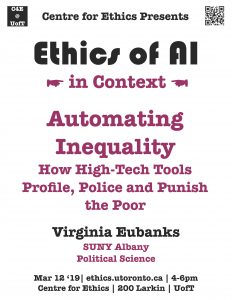
Automating Inequality: How High-Tech Tools Profile, Police and Punish the Poor
In Automating Inequality, Virginia Eubanks systematically investigates the impacts of data mining, policy algorithms, and predictive risk models on poor and working-class people in America. The book is full of heart-wrenching and eye-opening stories, from a woman in Indiana whose benefits are literally cut off as she lays dying to a family in Pennsylvania in daily fear of losing their daughter because they fit a certain statistical profile. “This book is downright scary,” says Naomi Klein, “but with its striking research and moving, indelible portraits of life in the ‘digital poorhouse,’ you will emerge smarter and more empowered to demand justice.”
☛ please register here
Virginia Eubanks
04:00 PM - 06:00 PM
SUNY Albany
Political Science
Centre for Ethics, University of Toronto
200 Larkin - Wed, Mar 6, 2019
Ethics in the City
Ethics in the City: Robert Vipond04:00 PM - 06:00 PM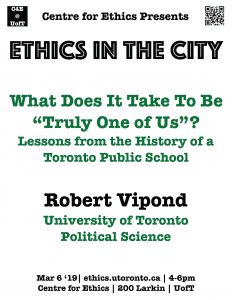
What Does It Take To Be “Truly One of Us”? Lessons from the History of a Toronto Public School
In 2017, the Pew Research Organization released a study of citizen attitudes to immigration and integration across thirteen countries, Canada among them. This paper attempts to understand the Canadian take on what it means “to be truly one of us.” To understand the Pew findings, I suggest that it may be helpful to take a longer view of debates over citizenship in Canada. One such example is furnished by the history of a gateway public school in Toronto, the Clinton Street Public School. Using Clinton Street School as a microcosm, I try to make sense of the Pew study by linking it to broader arguments about ideas of citizenship, especially those I develop in Making a Global City: How One Toronto School Embraced Diversity (UTP, 2017).
☛ please register here
Robert Vipond
University of Toronto
Political Science
Centre for Ethics, University of Toronto
Rm 200, Larkin Building - Tue, Mar 5, 2019
Ethics & the Arts, Ethics & Film: Lights, Camera, Ethics!, Ethics of AI in Context, Ethics of AI Film Series
Ethics & Film: Black Mirror (Ethics of AI Film Series)
☛ please register here
04:00 PM - 06:00 PM
Centre for Ethics, University of Toronto
Rm 200, Larkin Building - Mon, Mar 4, 2019
Perspectives on Ethics
Perspectives on Ethics: Jennifer Morton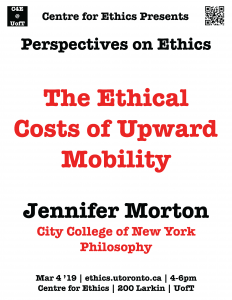
The Ethical Costs of Upward Mobility
In this talk, I argue that there are ethical costs upwardly mobile students must bear if they are to dramatically transform their life circumstances. These costs affect their relationships with family and friends, their sense of cultural identity, and their place in their community and they are ethical in so far as they concern those aspects of life that give it value and meaning. Using social science evidence, I show how these costs are the result of a complex tangle of economic, cultural, and structural factors that unjustly and disproportionately affect disadvantaged students and their communities. I suggest that we need to offer students a new ethical narrative of upward mobility that recognizes and acknowledges these ethical costs.
☛ please register here
Jennifer Morton
04:00 PM - 06:00 PM
City College of New York
Philosophy
Centre for Ethics, University of Toronto
200 Larkin - Fri, Mar 1, 2019
Conferences, Ethics of AI in Context
Toward a Handbook of Ethics of AI: An Interdisciplinary Workshop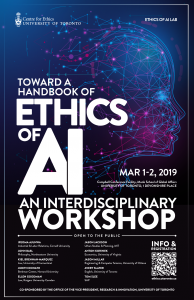
What has been left behind in the global rush to put the science of AI to work is the ethics of AI. We need to work together, within the university and beyond, to lay the groundwork for closing the gap between AI science and ethics, locally, nationally, and globally. Tackling the complex challenge of the ethics of AI requires an all-hands-on-deck effort that draws on the combined brain power and analytic tools of a global community of experts and scholars from a wide range of disciplines and backgrounds.
To help facilitate the much needed broadly-framed conversation about the ethics of AI, the Centre for Ethics launched Ethics of AI Lab, beginning with an interdisciplinary workshop series and a cross-divisional graduate course. Relatedly, the Oxford Handbook of Ethics of AI (forthcoming in early 2020) aims to lay the foundation for the emerging field of Ethics of AI as an inclusive and diverse enterprise. Edited by two Ethics of AI Lab members (Markus Dubber, Sunit Das) and a leading scholar in the field (Frank Pasquale, University of Maryland), the Handbook will be an interdisciplinary and international collection designed to capture and shape research and reflection on normative frameworks for the production, application, and use of artificial intelligence in all spheres of individual, commercial, social, and public life. The Handbook’s underlying conception of its subject matter will be reflected in its roster of contributors, which will include some fifty authors from several continents, ranging from current to future research leaders and representing a variety of methodological approaches, areas of expertise, and research agendas. Its content will be similarly wide and diverse in scope and substance, covering a range of perspectives, topics, and applications.
The workshop on March 1-2, 2019, brought together selected Handbook contributors to present and discuss their work-in-progress:
Friday, March 1
9-10 Judith Donath, Berkman Center, Harvard University: “Ethics of AI in Context: Society & Culture” Video: Judith Donath, Artificial Entities | Audio (SoundCloud)
10-11 Tom Slee, SAP: “Private Sector AI: Ethics and Incentives” Video: Tom Slee, Private Sector AI: Ethics and Incentives | Audio (SoundCloud)
11-12 John Basl, Philosophy, Northeastern University: “The Rights of Artificial Intelligences” Video: John Basl, AI Rights | Audio (SoundCloud)
12-1 Jason Millar, Engineering & Computer Science, University of Ottawa: “Perspectives on Ethics of AI: Engineering” Video: Jason Millar, Social Failure Modes in Technology – Implications for AI | Audio (SoundCloud)
1-2 Break
2-3 Anton Korinek, Economics, University of Virginia: “Perspectives on Ethics of AI: Economics” Video: Anton Korinek, Economic and Ethical Perspectives on the Rise of Artificial Intelligence | Audio (SoundCloud)
3-4 Avery Slater, English, University of Toronto: “Automating Origination: Perspectives from the Humanities” Video: Avery Slater, Computation and Creativity | Audio (SoundCloud)
4-5 Jason Jackson, Urban Studies & Planning, MIT: “Perspectives on Ethics of AI: Political Economy” Video: Jason Jackson, The Ethics of AI: A Political Economy Approach | Audio (SoundCloud)Saturday, March 2
9-10 Kiel Brennan-Marquez, Law, University of Connecticut: “Public Law & Policy: Notice, Predictability, and Due Process” Video: Kiel Brennan-Marquez, Kiel Brennan-Marquez, “Fair Notice” in the Age of Big Data | Audio (SoundCloud)
10-11 Ellen Goodman, Law, Rutgers University-Camden: “Smart City Ethics” Video: Ellen P. Goodman, Smart City Ethics | Audio (SoundCloud)The video symposium of the event is available here; all audio recordings are accessible here.
The event was co-sponsored by the Office of the Vice-President, Research & Innovation, University of Toronto
12:00 AM - 11:59 PM
Vivian and David Campbell Conference Facility
1 Devonshire Place - Wed, Feb 27, 2019
Ethics at Noon
Ethics@Noon: Thilo Schaefer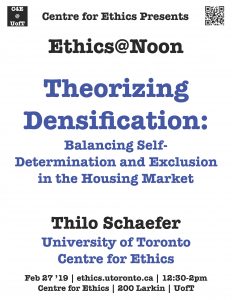
Theorizing Densification: Balancing Self-Determination and Exclusion in the Housing Market
Facing increasingly severe housing shortages, cities like San Francisco and Toronto are struggling to balance the need for more housing against the desires of current residents to maintain neighbourhood stability. Normative scholarship examining these conflicting considerations tends to focus on gentrification and the harms of residential displacement. This paper draws upon utopian theory to frame this challenge in terms of the tension between the utopias of the self-regulating free market and the self-determining community. A revised version of Nozick’s “framework for utopia” that takes into account the egalitarian critique is then developed. This revised framework establishes that communities should be able to exercise substantial self-determination over density regulations with compensation paid to offset the externalities resulting from any restrictions imposed. This approach could be extended to other issue areas where the exercise of community self-determination has harmful exclusionary consequences, such as immigration policy.
☛ please register here
Thilo Schaefer
12:30 PM - 02:00 PM
Centre for Ethics, University of Toronto
Doctoral Fellow
Centre for Ethics, University of Toronto
200 Larkin - Tue, Feb 26, 2019
Ethics of AI in Context
Ethics of AI in Context: Chelsea Barabas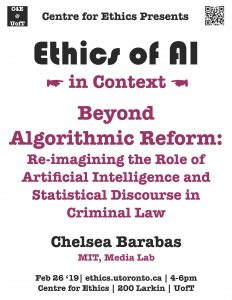
Beyond Algorithmic Reform: Re-imagining the Role of Artificial Intelligence and Statistical Discourse in Criminal Law
Data-driven decision-making regimes, in the form of predictive tools like crime hotspotting maps and risk assessment instruments, are rapidly proliferating across the criminal justice system as a means of addressing accusations of discriminatory and harmful practices by police and court officials. In recent times these data regimes have come under increased scrutiny, as critics point out the myriad ways that they can reproduce or even amplify pre-existing biases in the criminal justice system. These concerns have given rise to an influential community of researchers from both academia and industry who have formed a new regulatory science under the rubric of “fair, accountable, and transparent” algorithms, which seek to optimize accuracy and minimize bias in algorithmic decision making systems.
In this talk, I argue that the ethical, political, and epistemological stakes of criminal justice applications of AI cannot be understood simply as a question of bias and accuracy. Nor can we measure the impact of these tools if key outcome measures are left unexamined. I outline a more fundamental, abolitionist approach for excavating the ways that predictive tools reflect and reinforce the punitive practices that drive disparate outcomes in the criminal justice system. Finally, I will illustrate a more transformational approach to re-imagining the way data might be used to challenge the penal ideology and de-naturalize carceral state practices.
☛ please register here
Chelsea Barabas
 MIT
MIT
Media Lab
04:00 PM - 06:00 PM
Centre for Ethics, University of Toronto
200 Larkin - Wed, Feb 13, 2019
Ethics at Noon
Ethics@Noon: Ashley Rubin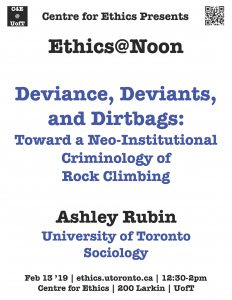
Deviance, Deviants, and Dirtbags: Toward a Neo-Institutional Criminology of Rock Climbing
Sociologists have long recognized that all social groups have their own sets of rules and norms and thus their own sets of deviants. Unfortunately, the sociology of deviance itself has become rather deviant in recent decades, relegated to criminology, where it is likewise a fairly marginal topic (when it is considered separately from criminal activity). In this project, I first describe the various reasons why deviance studies has become marginalized (especially in US sociology), focusing on the problem of a lack of theoretical vigor. Next, I outline a new approach to studying deviance, building on the neo-institutional tradition from organizational theory. I illustrate this approach using the case of rock climbing. After contextualizing rock climbing as a sport that began as a marginal, countercultural, and deviant endeavor that has since become mainstream, I trace the evolution of rock climbing ethics—focusing on the right way to climb and the right way to be a climber. I then apply neo-institutional theory to several specific episodes from the 1950s to today to understand how field-level dynamics help render certain activities deviant or normal. This neo-institutional framework distinguishes between rational considerations and cultural-cognitive considerations in ethical debates about the right way to climb and the right way to be a climber. It also explores the role of funders, regulators, experts, and particularly successful climbers in resolving these questions. Although rock climbing is a unique and rather colorful sport, many of the issues that come up will be familiar not only to other sports but also to other areas of leisure, work, and social life.
☛ please register here
Ashley Rubin
12:30 PM - 02:00 PM
University of Toronto
Sociology
Centre for Ethics, University of Toronto
200 Larkin - Mon, Feb 4, 2019
Ethics & Film: Lights, Camera, Ethics!
Ethics & Film: Sorry to Bother You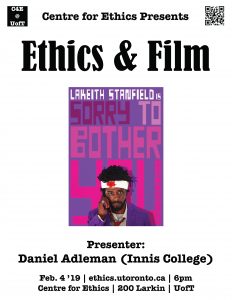
Presenter:
Daniel Adleman
Writing and Rhetoric
Innis College, University of Toronto☛ please register here
06:00 PM - 08:00 PM
Centre for Ethics, University of Toronto
Rm 200, Larkin Building - Wed, Jan 30, 2019
Ethics at Noon
Ethics@Noon: Brian Price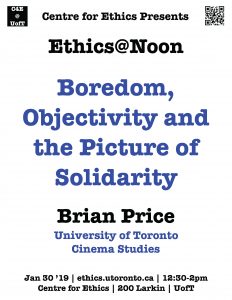
Boredom, Objectivity and the Picture of Solidarity
In this talk, I will propose that objectivity is only accessible in a state of boredom, and that boredom is an experience that is much rarer than we regularly suppose it to be. One consequence of this claim will be to add ballast, in temporal terms, to Richard Rorty’s well known contention that solidarity is a more reliable way of accessing agreement in the social, and for the sake of social change, than is any appeal we might make to objectivity. Yet, in my account, what follows or interrupts boredom are acts of picturing—attempts to feature for ourselves a different way of relating to what appears to us in the rare instant of boredom, and that divide us from each other just as much as unite us. At issue, then, will be the extent to which acts of picturing—described as a particular way of thinking and of regarding thought in relation to the failure of objectivity—produce an imaginative density across perceivers that might inhibit solidarity by virtue of the same procedures that compel it. At the heart of my discussion will be a little-seen film, Sleeping Dogs Lie (2006, d. Bobcat Golthwaite).
☛ please register here
12:30 PM - 02:00 PM Brian Price
Brian Price
University of Toronto
Cinema Studies
Centre for Ethics, University of Toronto
200 Larkin - Tue, Jan 29, 2019
Ethics of AI in Context
Ethics of AI in Context: Kelly Hannah-Moffat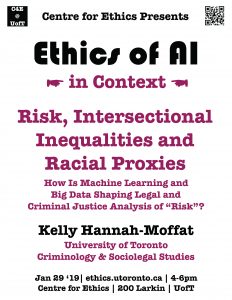
Risk, Intersectional Inequalities and Racial Proxies: How Is Machine Learning and Big Data Shaping Legal and Criminal Justice Analysis of “Risk”?
CJS and social justice organizations and individuals are challenging and redefining conventional risk episteme(s) through the use of big data analytics, which are shifting organizational risk practices, challenging social science methods of assessing risk, and affecting knowledge about risk. I argue that big data reconfigures risk by producing a form of algorithmic risk, which is different from the actuarial risk techniques already in use in many justice sectors; that new experts are entering the risk game: technologists who make data public and accessible to a range of stakeholders; and that big data analytics can be used to produce forms of usable knowledge but questions still persist on whether or not these technologies can learn how to limit bias and inequality.
☛ please register here
Kelly Hannah-Moffat
04:00 PM - 06:00 PM
University of Toronto
Criminology & Sociolegal Studies
Centre for Ethics, University of Toronto
200 Larkin - Mon, Jan 28, 2019
Perspectives on Ethics
Perspectives on Ethics: Rachel Nolan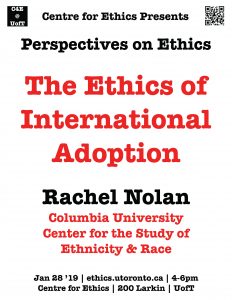
The Ethics of International Adoption
Illegal or gray adoptions are most frequently associated with armed conflicts and dirty wars in Argentina, Francoist Spain, and Nazi Germany. Cross-racial forcible adoption also has a painful history as part of settler colonial projects in Canada, the U.S., and Australia. This talk will consider a case that combines elements of both historical patterns: Guatemala during the twentieth century. International adoptions began during Guatemala’s civil war (1960-1996) and grew rapidly–overtaking other “sender” countries until 1 in 110 children born in Guatemala was relinquished at the height of the adoption boom. This talk will draw on oral histories, judicial records, and all of the state adoption files from the period to consider the adoptions of indigenous children during the most violent years of the war (1982-1986) without meaningful parental consent as part of a wider project to erase indigenous peoples. Forcible adoption is just now beginning to be understood, like sexual violence, as a tool of war and social control.
☛ please register here
Rachel Nolan
04:00 PM - 06:00 PM
Columbia University
Center for the Study of Ethnicity and Race
Centre for Ethics, University of Toronto
200 Larkin - Wed, Jan 23, 2019
Ethics & the Arts, Ethics & Film: Lights, Camera, Ethics!, Ethics in the City
Ethics & Film: The Social Life of Small Urban Spaces (Ethics in the City Film Series)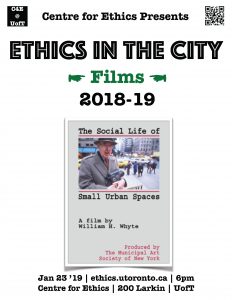
☛ watch preview here
This highly influential film in architecture and planning circles by William H. Whyte analyzes the success and failures of urban spaces. Observing the natural order of spaces and the way people move through them, Whyte provides an intuitive critique of urban spaces and ways these spaces can be improved. (IMDB; Luke Keller)
Join us for a screening plus discussion (and cookies)!
☛ please register here
06:00 PM - 08:00 PM
Centre for Ethics, University of Toronto
Rm 200, Larkin Building - Wed, Jan 23, 2019
Ethics at Noon
Ethics@Noon: Étienne Brown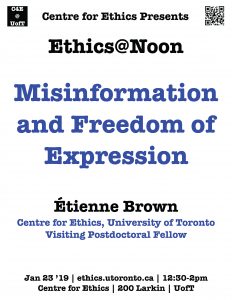
Misinformation and Freedom of Expression
With the rise of ‘fake news,’ European liberal democracies are currently in the midst of a debate about the value of laws that aim to regulate the spread of false information on the internet. One central objection directed against such laws is that they represent undue violations of our individual right to freedom of expression. In this presentation, I argue that they do not. More precisely, I contend that legal prohibitions against the intentional spread of false information can be justified on three main philosophical accounts of free speech: the epistemic account, the civic duties account, and the harm-based account. I then consider the objection according to which any legal prohibition against intentional misinformation will unjustly set back the interests of individuals who unintentionally misinform others.
☛ please register here
12:30 PM - 02:00 PM Étienne Brown
Étienne Brown
Centre for Ethics, University of Toronto
Visiting Postdoctoral Fellow
Centre for Ethics, University of Toronto
200 Larkin - Wed, Jan 16, 2019
Ethics of AI in Context, Ethics in the City
Ethics in the City: Tracey Lauriault04:00 PM - 06:00 PM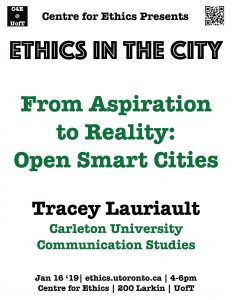
From Aspiration to Reality: Open Smart Cities
Open smart cities might become a reality for Canada. Globally there are a number of initiatives, programs, and practices that are open smart city like which means that it is possible to have an open, responsive and engaged city that is both socio-technologically enabled, but also one where there is receptivity to and a willingness to grow a critically informed type of technological citizenship (Feenberg). For an open smart city to exist, public officials, the private sector, scholars, civil society and residents and citizens require a definition and a guide to start the exercise of imagining what an open smart city might look like. There is much critical scholarship about the smart city and there are many counter smart city narratives, but there are few depictions of what engagement, participatory design and technological leadership might be. The few examples that do exist are project based and few are systemic. An open smart city definition and guide was therefore created by a group of stakeholders in such a way that it can be used as the basis for the design of an open smart city from the ground up, or to help actors shape or steer the course of emerging or ongoing data and networked urbanist forms (Kitchin) of smart cities to lead them towards being open, engaged and receptive to technological citizenship.
This talk will discuss some of the successes resulting from this Open Smart Cities work, which might also be called a form or engaged scholarship. For example the language for the call for tender of the Infrastructure Canada Smart City Challenge was modified to include as a requisite that engagement and openness be part of the submissions from communities. Also, those involved with the guide have been writing policy articles that critique either AI or the smart city while also offering examples of what is possible. These articles are being read by proponents of Sidewalk Labs in Toronto. Also, the global Open Data Conference held in Argentina in September of 2018 hosted a full workshop on Open Smart Cities and finally Open North is working toward developing key performance indicators to assess those shortlisted by Infrastructure Canada and to help those communities develop an Open Smart Cities submission. The objective of the talk is to demonstrate that it is actually possible to shift public policy on large infrastructure projects, at least, in the short term.
☛ please register here
Tracey Lauriault
Carleton University
Communication Studies
Centre for Ethics, University of Toronto
Rm 200, Larkin Building - Wed, Jan 16, 2019
Ethics at Noon
Ethics@Noon: Patti Tamara Lenard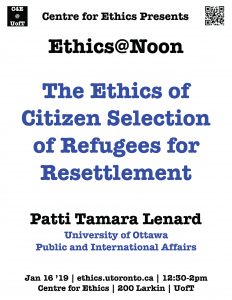
The Ethics of Citizen Selection of Refugees for Resettlement
One way that states discharge their duties to refugees is by admitting them for resettlement. Of the millions of refugees in places of refuge, only one million are specially designated by the UNHCR for resettlement in third countries. These individuals, identified by the UNCHR as either especially vulnerable, or particularly unlikely to find any alternative permanent solution, are prioritized for admission to third countries for resettlement. Of these, only a small number are actually selected by host countries for resettlement, however; last year, just over 100 000 found permanent homes in third countries. In this talk, I consider the ethics of one particular way of selecting refugees for resettlement, that is, by giving citizens the driver’s seat in selecting refugees for admission to resettlement. I ask whether it is morally acceptable to permit citizens to name specific refugees for resettlement, under the condition that they are willing to support – financially and emotionally – those whom they name. I argue, ultimately, that there are moral goods that derive from permitting citizens to select refugees for admission, but that they do not outweigh the importance of offering scarce resettlement spots to those who are most in need. Therefore, any refugee admission scheme that permits citizens to select refugees must constrain those who can be named for admission to those who are most in need. I conclude with some proposals for how this can be achieved.
☛ please register here
Patti Tamara Lenard
12:30 PM - 02:00 PM
University of Ottawa
Graduate School of Public and International Affairs
Centre for Ethics, University of Toronto
200 Larkin - Tue, Jan 15, 2019
Ethics of AI in Context
Ethics of AI in Context: Michael Kearns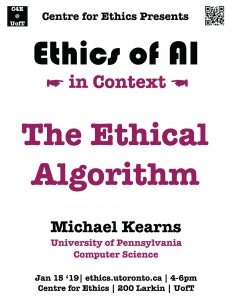
The Ethical Algorithm
Many recent mainstream media articles and popular books have raised alarms over anti-social algorithmic behavior, especially regarding machine learning and artificial intelligence. The concerns include leaks of sensitive personal data by predictive models, algorithmic discrimination as a side-effect of machine learning, and inscrutable decisions made by complex models. While standard and legitimate responses to these phenomena include calls for stronger and better laws and regulations, researchers in machine learning, statistics and related areas are also working on designing better-behaved algorithms. An explosion of recent research in areas such as differential privacy, algorithmic fairness and algorithmic game theory is forging a new science of socially aware algorithm design. I will survey these developments and attempt to place them in a broader societal context. This talk is based on the forthcoming book “The Ethical Algorithm”, co-authored with Aaron Roth (Oxford University Press, 2019).
☛ please register here
04:00 PM - 06:00 PM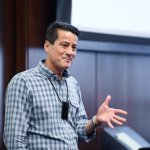 Michael Kearns
Michael Kearns
University of Pennsylvania
Computer Science
Centre for Ethics, University of Toronto
200 Larkin - Mon, Jan 14, 2019
Perspectives on Ethics
Perspectives on Ethics: Bonnie Honig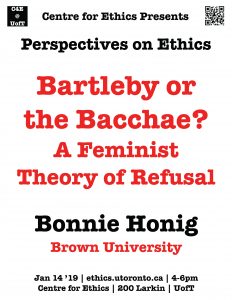
Bartleby or the Bacchae? A Feminist Theory of Refusal
“Where’s your spine?” we often say to those who seem to lack moral ‘backbone.’ How do such vertical metaphors limit and drive our imagination of refusal? Drawing on Adriana Cavarero’s work, Inclination, this lecture develops a postural analysis of refusal in the Antigone, the Bacchae, Thoreau’s “Walking”, and Leonardo da Vinci’s painting of the Madonna. Cavarero promotes inclination (the leaning in posture of maternal care) as the preferred posture for her ethics and politics. This lecture pluralizes the feminist subject position of inclination to include sorority, as well, and argues that the refusals we find in maternal and sororal care express not only love but rage, and promise not only the holding of community but also the dismemberment of revolution/new beginning.
☛ please register here
Bonnie Honig
04:00 PM - 06:00 PM
Brown University
Nancy Duke Lewis Professor of Modern Culture and Media and Political Science
Centre for Ethics, University of Toronto
200 Larkin - Sat, Jan 12, 2019
Symposium on "Grace" by Jane Doe (Nightwood Theatre)
Grace by Jane Doe – January 8-26, 2019 at Streetcar Crowsnest. A Nightwood Theatre production in association with Crow’s Theatre. Directed by Andrea Donaldson, starring Michaela Washburn, Rose Napoli, Brenda Robins and Conrad Coates.
In conjunction with its production of Grace, Nightwood Theatre is proud to present a symposium on Saturday, January 12th from 4pm-6pm, 2019 onstage at Streetcar Crowsnest. Free to attend. The symposium will consist of two panels: one on the challenges and failures of the legal system, with guest speakers Judge Donna Hakett, prosecutor Jill Witkin, Megan Savard and Deepa Mattoo, and moderated by Christine McGoey; and another on the psychology of memory.
Click here to RSVP for the free symposium.
co-sponsored by, among others:
04:00 PM - 06:00 PM
Streetcar Crowsnest
345 Carlaw Avenue - Tue, Jan 8, 2019
Ethics of AI in Context
Ethics of AI in Context: Sunit Das et al.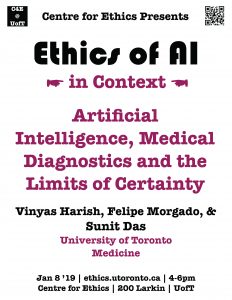
Artificial Intelligence, Medical Diagnostics and the Limits of Certainty
It is estimated that physicians are unable to reach a diagnosis that accounts for their patient’s symptoms in nearly 90% of outpatient patient encounters. Many proponents of artificial intelligence (AI) look to the movement from data gathering to diagnosis as limited by the finite nature of human analytic capability, and consider AI as a mechanism by which to refine this process. This leads us to two divergent perceptions of uncertainty in decision-making. On one hand, some view uncertainty as a bug and argue that optimal decision-making is based on the minimization of uncertainty. On the other hand, uncertainty can be taken as a core feature of the decision-making process in an attempt to weigh various solutions against one another. Here, we make the argument, using the experiences of IBM Watson on Jeopardy! and Watson for Oncology as examples, that the latter is a more likely explanation. This conclusion has significant implications for how we are to understand the integration of artificial intelligence into medical practice.
☛ please register here
Vinyas Harish, University of Toronto Faculty of Medicine04:00 PM - 06:00 PM
Felipe Morgado, University of Toronto Faculty of Medicine
Sunit Das, University of Toronto Faculty of Medicine, Division of Neurosurgery, St. Michael’s Hospital & Centre for Ethics, University of Toronto
Centre for Ethics, University of Toronto
200 Larkin - Tue, Jan 8, 2019
"Grace" by Jane Doe (Nightwood Theatre)
Grace by Jane Doe – January 8-26, 2019 at Streetcar Crowsnest. A Nightwood Theatre production in association with Crow’s Theatre. Directed by Andrea Donaldson, starring Michaela Washburn, Rose Napoli, Brenda Robins and Conrad Coates.
Exquisitely told in a stunning blend of documentary theatre, striking visual projections and choreography, Grace is a searing piece that ignites a pertinent discussion on the failures and limitations of the legal system. “There was no justice, there was just a legal outcome.” In the wake of a young woman’s disclosure of childhood sexual assault, a family presses charges. A true story about survival, hope, and the pursuit of justice at a time when provability still usurps truth in our courtrooms.
☛ tickets $25-$40 at crowstheatre.com.
co-sponsored by, among others:
04:00 PM - 06:00 PM
Streetcar Crowsnest
345 Carlaw Avenue - Thu, Nov 29, 2018
Perspectives on Ethics
Perspectives on Ethics: Arlie Loughnan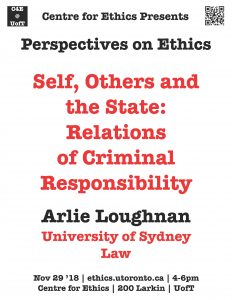
Self, Others and the State: Relations of Criminal Responsibility
The paper aims to make the case for a fresh examination of the topic of criminal responsibility. An assessment of the criminal law literature reveals that criminal responsibility is regarded as significant in three main ways: (1) as the normative heart of the criminal law; (2) as serving the coordination and legitimation needs of the criminal law; and (3) as a platform for the development of the modern criminal law. These three accounts of the significance of criminal responsibility correspond to the work of a group of scholars, or, in the case of (2) and (3), single scholars – Nicola Lacey and Lindsay Farmer – who have developed sui generis analyses. This is not all there is to the significance of criminal responsibility, however. I suggest that criminal responsibility is significant because it encodes keys sets of relations – between self, others and the state – as relations of responsibility. My account of criminal responsibility as encoding relations of responsibility assists in identifying the significance of criminal responsibility outside the criminal law. As I discuss in this chapter, on my account, the significance of criminal responsibility arises from the dynamic inter-relation between criminal responsibility and social ideas about responsibility, according to which considerations of power, subjectivity and relationality make themselves felt in the criminal law in particular ways.
☛ please register here
04:00 PM - 06:00 PM Arlie Loughnan
Arlie Loughnan
University of Sydney
Law
Centre for Ethics, University of Toronto
200 Larkin - Wed, Nov 28, 2018
Ethics at Noon
Ethics@Noon: John Enman-Beech
Contract as an Ethical Frame for Employment, Tenancy, and Consumption
What happens when we think employment, tenancy, and consumption (ETC) through the ethical frame of contract? This frame sees ETC as a collection of individual deals that assign obligations to the deals’ parties. The ETC system is justified if the individual deals are justified, and a deal is justified if it is the product of voluntary and informed agreement. But deals are rarely if ever fully voluntary and informed in ETC. This calls the contractual frame into question, but it continues to be used everywhere, from legal doctrine to economic analysis to political rhetoric to individuals’ conceptions of their relationships to their cell providers. My hypothesis: contract perversely conscripts people into choosing and re-choosing the existing social order, entrenching patterns of preferences and entitlements, and thereby (through people’s desire to feel in control of their choices) to identify with their roles.
☛ please register here
12:30 PM - 02:00 PM John Enman-Beech
John Enman-Beech
Centre for Ethics, University of Toronto
Doctoral Fellow
Centre for Ethics, University of Toronto
200 Larkin - Tue, Nov 27, 2018
Ethics of AI in Context
Ethics of AI in Context: Regina Rini & Leah Cohen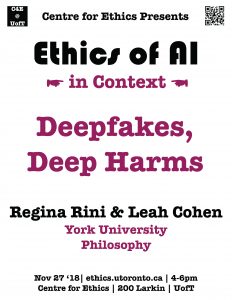
Deepfakes, Deep Harms
Imagine that an online video appears, showing you doing or saying something you would never do. You know it is fake, but not everyone believes you. This scenario may soon be possible, thanks to the use of machine learning to fabricate convincing video and audio recordings, so-called ‘deepfakes’. We look ahead to the dangers of this technology, distinguishing the variety of ways it can harm or wrong people: material, reputational, and existential.
☛ please register here
Regina Rini & Leah Cohen
York University
Philosophy
04:00 PM - 06:00 PM
Centre for Ethics, University of Toronto
200 Larkin - Mon, Nov 19, 2018
Perspectives on Ethics
Perspectives on Ethics: Murad Idris
Idealizations of Peace in Islamic Political Thought: The Case of Sayyid Qutb
“Before us today is the problem of universal peace,” Sayyid Qutb declares in the prologue to his much-neglected Universal Peace and Islam (1951). “Does Islam have an opinion on the matter? Does Islam have a solution?” Albeit popularly considered the ideologue of “Islamic jihad,” the Muslim Brotherhood’s leading theorist designed a plan for universal peace. Qutb’s plan pegs the emergence of universal peace to an immanent organization of individual states with laws in common. Its promise of peace is embedded in an Enlightenment script that claims to correct unjust savagery through the state and the law. This is a script that calls up Immanuel Kant and Thomas Hobbes, specifically their predications of peace upon law and statehood. Drawing attention to Kant’s discussions of “the Arab” and Hobbes’s references to empire, this talk unpacks the unacknowledged salience of denials of law, political economy, and settler-colonialism for theorizations of peace. Qutb’s adaptations of that familiar logic unwittingly expose its limits, culminating with perpetual war against enemies whose laws and form are ‘wrong. This talk draws on a chapter of Idris’s book, War for Peace: Genealogies of a Violent Ideal in Western and Islamic Thought, published by Oxford University Press in Fall 2018. This book deconstructs dominant formulations of peace in the writings of Plato, al-Farabi, Aquinas, Erasmus, Grotius, Gentili, Hobbes, Ibn Khaldun, Immanuel Kant, and Sayyid Qutb.
☛ please register here
Murad Idris
04:00 PM - 06:00 PM
University of Virginia
Department of Politics
Centre for Ethics, University of Toronto
200 Larkin - Wed, Nov 14, 2018
Ethics & the Arts, Ethics & Film: Lights, Camera, Ethics!, Ethics in the City
Ethics & Film: Marshall McLuhan's The Burning Would (Ethics in the City Film Series)
☛ please register here
06:00 PM - 08:00 PM
Centre for Ethics, University of Toronto
Rm 200, Larkin Building - Wed, Nov 14, 2018
Ethics of AI in Context, Ethics in the City
Ethics in the City: Ken Greenberg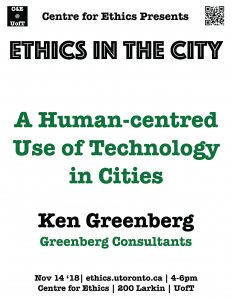
A Human-centred Use of Technology in Cities
Advances in technology inevitably play a critical part in the evolution of cities. How they are absorbed, and what impacts they have are open questions. We have good examples and uncomfortable ones. The uncritical euphoria with which we embraced the internal combustion engine in the decades after World War II led to many unforeseen consequences as we reshaped the urban world around the needs of the car. As we recover from that excess, we now have a new and pressing set of challenges in the digital area. The questions for me often come down to how a ‘human-centred’ urbanism could be aided by technology, not be subverted by it. Can we assess potential solutions against human values and decide when to say no, not exactly, bend, inflect and choose.
☛ please register here
Ken Greenberg
04:00 PM - 06:00 PM
Principal, Greenberg Consultants
Centre for Ethics, University of Toronto
Rm 200, Larkin Building - Wed, Nov 14, 2018
Ethics at Noon
Ethics@Noon: Nicola Lacetera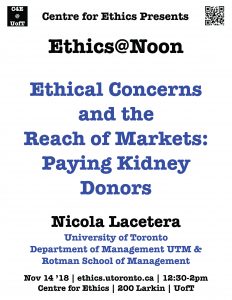
Ethical Concerns and the Reach of Markets: Paying Kidney Donors
Legislation and public policies are often the result of competition and compromise between different views and interests. In several cases, strongly held moral beliefs voiced by societal groups lead lawmakers to prohibit certain transactions or to prevent them from occurring through markets. However, there is limited evidence about the specific nature of the general population’s opposition to using prices in such contentious transactions. We conducted a choice experiment on a representative sample of Americans to examine preferences for payments to kidney donors. We found strong polarization, with many participants in favor or against payments regardless of potential supply gains. However, about 20% of respondents would switch to supporting payments for sufficiently large supply gains. Preferences for compensation have strong moral foundations. Participants especially oppose systems with payments by organ recipients, which they find in conflict with principles of fairness and dignity. We corroborate the interpretation of the findings with the analysis of a costly decision to donate money to a foundation that supports donor compensation.
☛ please register here
12:30 PM - 02:00 PM Nicola Lacetera
Nicola Lacetera
University of Toronto
Department of Management UTM &
Rotman School of Management
Centre for Ethics, University of Toronto
200 Larkin - Tue, Nov 13, 2018
Ethics of AI in Context
Ethics of AI in Context: Avery Slater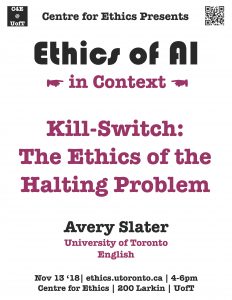
Kill-Switch: The Ethics of the Halting Problem
Two centuries of dystopian thought consistently imagined how technologies “out of control” can threaten humanity: with obsolescence at best, with violent systemic destruction at worst. Yet current advances in neural networked machine learning herald the advent of a new ethical question for this established history of critique. If a genuinely conscious form of artificial intelligence arises, it will be wired from its inception as guided by certain incentives, one of which might eventually be its own self-preservation. How can the tradition of philosophical ethics approach this emerging form of intelligence? How might we anticipate the ethical crisis that emerges when machines we cannot turn off cross the existential threshold, becoming beings we should not turn off?
☛ please register here
Avery Slater
04:00 PM - 06:00 PM
University of Toronto
Department of English
Centre for Ethics, University of Toronto
200 Larkin - Wed, Oct 31, 2018
The Precarious Pathways Project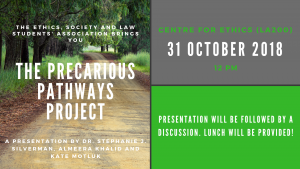
The Precarious Pathways Project
A growing number of people live in Canada with precarious immigration status. These migrants experience barriers accessing many social services, including education. Despite living in Canada and paying taxes, often for many years, they are unable to apply to university as domestic students and pay domestic fees. They are also unable to apply without fear that their immigration status will be discovered and they may be detained or deported. The term ‘precarious immigration status’ encompasses a wide range of experiences, including those who have entered Canada as a visitor but overstayed their visa, those who are still undergoing the – often lengthy – refugee determination process, or those who have come on a work-related visa and have lost their job, among many others.
Universities can easily reduce these barriers by admitting academically-qualified students with precarious immigration status and charging them domestic fees. It is important to note that it is legal for a university in Canada to admit students with precarious immigration status. Neither the Immigration and Refugee Protection Act nor the Immigration and Refugee Protection Regulations provide sanctions to punish institutions that do not enforce the requirement of a study permit. It is imperative that universities carefully consider privacy when admitting students with precarious immigration status, as the fear of their immigration status being released or reported is another major barrier to accessing education for this population.
☛ please register here
Presenters:
12:00 PM - 02:00 PM
Dr. Stephanie J. Silverman
Almeera Khalid
Kate Motluk
Centre for Ethics, University of Toronto
200 Larkin - Tue, Oct 30, 2018
Ethics of AI in Context
Ethics of AI in Context: John Vervaeke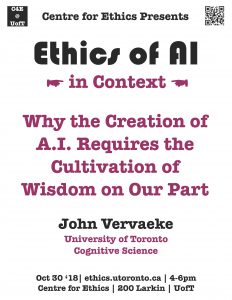
Why the Creation of A.I. Requires the Cultivation of Wisdom on Our Part
Abstract: Most considerations concerning the ethics of A.I. are concerned with the ethical issues posed by the potential threat of the machines or concerning their ambiguous moral status and the resulting unclarity of our ethical obligations towards them. However, a cognitive scientific approach suggests an additional ethical issue. There is converging theory and empirical evidence that while necessary, intelligence in not sufficient for rationality. Rationality requires acquiring skills for overcoming the biases and the self-deception that inevitably result from any cognitive agent using optimization strategies. These heuristic strategies often reinforce each other because of the complex and recursively self-organization nature of cognitive processing. As our A.I. moves increasingly into Artificial General Intelligence (A.G.I), these patterns of self-deception increasing become possible in our machines. This vulnerability is pertinent to us because we are often unaware of our biases or how we are building them implicitly into our simulations of intelligence. Since self-deception and foolishness are an inevitable result of intelligence, as we magnify intelligence will may also magnify the capacity for self-deception. Our lack of rational self-correcting self-awareness could very well be built into our machines. The examination of a couple of historical examples will add plausibility to this argument. Given this argument, i will further argue that we have an ethical obligation to seriously cultivate a cognitive style of self-correcting self-awareness, i.e., wisdom, in individuals and communities of individuals who are attempting to create A.G.I.☛ please register here
John Vervaeke
04:00 PM - 06:00 PM
University of Toronto
Cognitive Science
Centre for Ethics, University of Toronto
200 Larkin - Fri, Oct 26, 2018
Events on Campus, Ethics & the Arts, Ethics of AI in Context
Reading Frankenstein: Then, Now, Next. A Celebration of the 200th Anniversary of Mary Shelley’s Frankenstein (1818-2018)Reading Frankenstein: Then, Now, Next. A Celebration of the 200th Anniversary of Mary Shelley’s Frankenstein (1818-2018) (October 26-31, 2018)
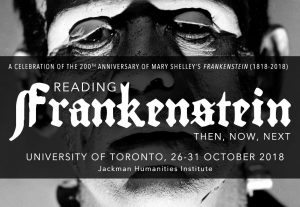
12:00 AM - 11:59 PM
- Thu, Oct 25, 2018
Perspectives on Ethics
Perspectives on Ethics: Derrick Darby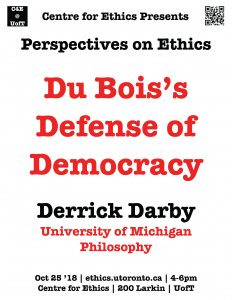
Du Bois’s Defense of Democracy
I will reconstruct W. E. B. Du Bois’s argument for democracy in Darkwater and draw a lesson about how to address America’s democratic crisis.
☛ please register here

Derrick Darby
04:00 PM - 06:00 PM
University of Michigan
Department of Philosophy
Centre for Ethics, University of Toronto
200 Larkin - Wed, Oct 24, 2018
Events on Campus
Peter Alilunas, Closed (to the Profane) Due to Pressure from the Morality Squad: The Cinema 2000, Porn Studies, and Cultural ConsecrationPeter Alilunas, Closed (to the Profane) Due to Pressure from the Morality Squad: The Cinema 2000, Porn Studies, and Cultural Consecration
The growth of Porn Studies has been accompanied by an exciting surge in research related to adult film history, which has started to fill in long-neglected gaps in traditional film histories. With this growth, however, the field has also slowly begun constructing familiar boundaries and barriers, valuing and foregrounding some objects of study as worthy of scholarly interest while dismissing or ignoring others. To explore these tensions, this presentation explores a wide variety of historical moments, spaces, and places, and foregrounds the Cinema 2000, the legendary Yonge Street adult theater originally created by Max Allen. Drawing on Pierre Bourdieu’s formulations of “legitimate” cultural pleasures—and the ways in which they must be “closed to the profane”—this presentation will ultimately argue for an open and reflexive approach to studying adult film history.
Peter Alilunas
University of Oregon
Cinema Studies
☛ please register here
co-sponsored by:
Bonham Centre for Sexual Diversity Studies
04:30 PM - 06:30 PM
Cinema Studies Institute | Centre for the Study of the United States
Canadian Studies Program | Centre for Ethics
Faculty of Information
140 St. George St. - Wed, Oct 24, 2018
Ethics at Noon
Ethics@Noon: Colin Grey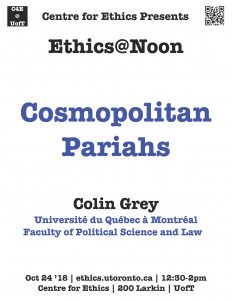
Cosmopolitan Pariahs: Exploring the Moral Rationale for Withholding Protection from Criminal Refugees
Article 1F of the 1951 Convention relating to the Status of Refugees excludes from refugee protection persons guilty of serious international and domestic crimes. Excluded persons are not eligible for refugee status even if they face a well-founded fear of persecution. This paper asks whether a coherent rationale for such exclusion is available, focusing on the influential—and strikingly unexamined—suggestion by UNHCR that Article 1F serves to exclude persons who are “undeserving” of refugee protection. If refugees are persons threatened with violations of their basic human rights, as several philosophical and legal accounts hold, we must ask: What could possibly justify abandoning them to their fate? I will argue that exclusion of refugees for past criminality is best explained as the institutional expression of a form of blame that is appropriate if we accept that all human beings on the Earth exist in a juridical relationship of cosmopolitan right, a Kantian construct that is plausibly seen as the animating idea behind the international refugee regime. The construal of the exclusion clauses as an institutional expression of blame, however, is ultimately inconsistent with a strong human rights reading of the international refugee regime. Instead, the exclusion clauses suggest refugee law represents an institutionalized form of humanitarianism. In other words, the ultimate claim of this paper is that we must choose between exclusion and a strong human rights reading of refugee law. We cannot have both.
☛ please register here
Colin Grey

Université du Québec à Montréal
Faculty of Political Science and Law
12:30 PM - 02:00 PM
Centre for Ethics, University of Toronto
200 Larkin - Tue, Oct 23, 2018
Ethics & the Arts, Ethics & Film: Lights, Camera, Ethics!, Ethics of AI in Context, Ethics of AI Film Series
Ethics & Film: WALL-E (Ethics of AI Film Series)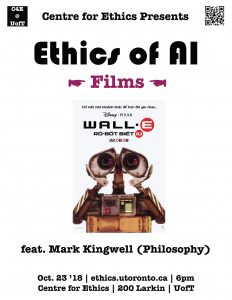
☛ please register here
06:00 PM - 08:00 PM
Centre for Ethics, University of Toronto
Rm 200, Larkin Building - Mon, Oct 22, 2018
Author Meets Critics
Author Meets Critics: Hilary Evans Cameron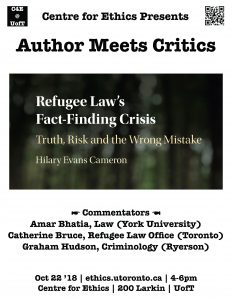
Refugee Law’s Fact-finding Crisis: Truth, Risk, and the Wrong Mistake (Cambridge 2018)
☛ please register here
Hilary Evans Cameron
Postdoctoral Affiliate, Centre for Ethics
University of TorontoCommentators:
04:00 PM - 06:00 PM
Amar Bhatia (Law, York University)
Catherine Bruce (Refugee Law Office, Toronto)
Graham Hudson (Criminology, Ryerson)
Centre for Ethics, University of Toronto
Rm 200, Larkin Building - Wed, Oct 17, 2018
Events on Campus
The Sexual Representation Collection Presents: Susanna Paasonen and Jenny SundènSusanna Paasonen: NSFW, or, Sex as Risk
The Internet slang term and social media tag NSFW—“Not Safe/Suitable for Work”— is widely used in Anglophone contexts (and beyond) to organize and regulate sexual content and pornographic imagery, often in connection with humor. Zooming in on the tag that functions as both a warning and a lure, this talk examines the logics of content classification and filtering connected to it. More specifically, it asks how the boundaries of risk and danger become drawn in connection with sexuality on online platforms, and on Facebook in particular, as well as what other avenues remain available for considering the distribution of risk and harm online. Refusing the default association of sex and risk, upon which the marker NSFW more or less playfully operates, I argue for shifting focus onto considerations of consent in the circulation of sexual content, as well as for highlighting the value of sexuality in and for people’s lives as these intersect with social media.
Susanna Paasonen
University of Turku, Finland
Media Studies
Jenny Sundén: Play, Secrecy, and Sensitive Data: On Networked Intimacy and Public Sex
Based on a new materialist analysis of ‘vibrant matter’ (Bennett 2010) to understand the disobedience of sexual objects in toy-based play, in this presentation I investigate the politics of thinking digital technologies as operating partly beyond human forms of agency and control. I use as my core examples privacy breaches and data leaks in the world of networked sex toys – such as a vibrator which allegedly audio recorded its clients’ play sessions without express permission – to engage with questions of intimacy and privacy in digital networks of humans and nonhumans. In particular, the discussion focuses on the consequences of new forms of publicness for how we can understand sexual intimacy and sexual play. What does it mean to be have an intimate moment when connected to a device, a medium, and a network that is by definition public, corporate, and promiscuous (cf. Chun 2016)? And how could we imagine other ways of being intimate and exposed – yet safe – in public digital networks?
Jenny Sundén
Södertörn University, Sweden
Gender Studies
☛ please register here
hosted by:
Bonham Centre for Sexual Diversity Studies
co-sponsored by:
04:00 PM - 06:00 PM
Centre for Ethics
Faculty of Information
140 St. George St. - Tue, Oct 16, 2018
Ethics of AI in Context
Ethics of AI in Context: Mark Fox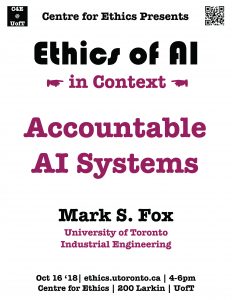
Accountable AI Systems
The most recent advances of AI technology, namely neural networks, and their application to sophisticated pattern recognition tasks, such as image classification in automated vehicles, has led to a plethora of concerns regarding accountability, often couched in terms of the capability of these algorithms to explain their decisions. This presentation will address a different type of accountability: system accountability. We will look at the architecture of intelligent systems that are made of large numbers of intelligent agents and explore the issues and possible solutions to accountability when decisions and actions are the result of large numbers of individual decisions made by interacting intelligent agents.
☛ please register here
Mark S. Fox
04:00 PM - 06:00 PM
University of Toronto
Distinguished Professor of Urban Systems Engineering
Centre for Ethics, University of Toronto
200 Larkin - Tue, Oct 16, 2018
Public Lectures
Ruth Gavison, Israel and the Legacy of World War II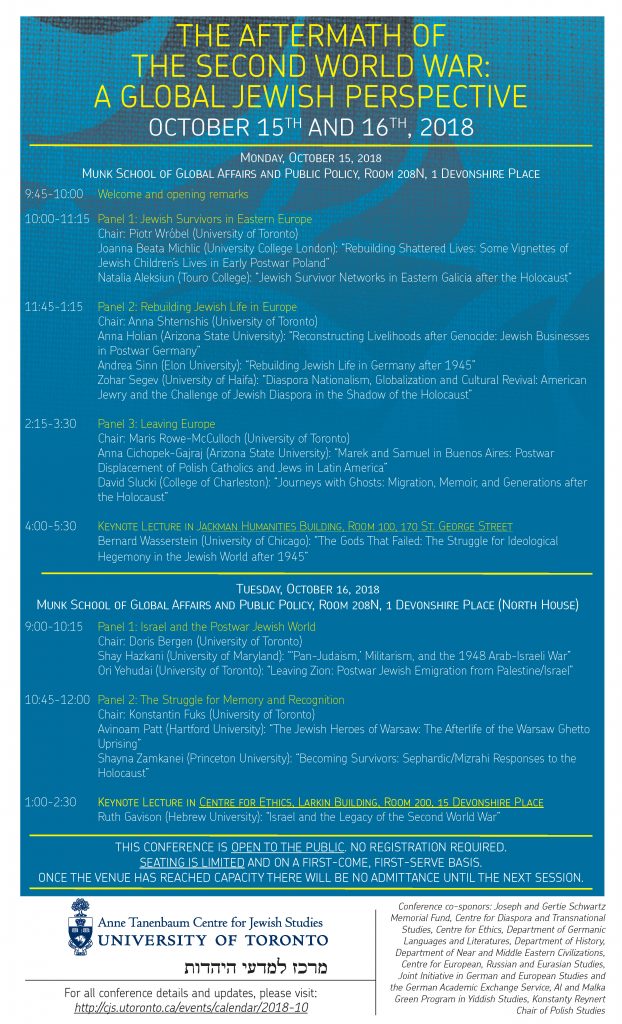
The lecture will address the question whether it was WWII that in fact enabled the foundation of Israel, and the question whether it is justified that the world make the Palestinians pay for the horrors of the Holocaust. While the Holocaust ‘helped,’ the Jewish national infrastructure built in Palestine from the 1880s was a critical necessary condition for Israel’s foundation in 1948.
Ruth Gavison
Hebrew University
Faculty of Law
presented by:
Anne Tanenbaum Centre for Jewish Studies
co-sponsored by:
01:00 PM - 02:30 PM
Department of Germanic Languages and Literatures | Centre for Diaspora and Transnational Studies | Centre for Ethics | Centre for European, Russian, and Eurasian Studies (Munk School of Global Affairs) | Department of History | Joint Initiative in German and European Studies and the German Academic Exchange Service | Department of Near and Middle Eastern Civilizations | Konstanty Reynert Chair of Polish History | Al and Malka Green Program in Yiddish Studies
Centre for Ethics, University of Toronto
Rm 200, Larkin Building - Mon, Oct 15, 2018
Perspectives on Ethics
Perspectives on Ethics: Nils Holtug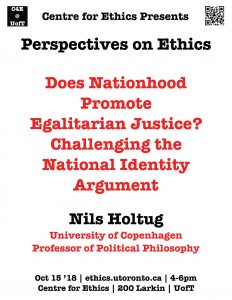
Does Nationhood Promote Egalitarian Justice? Challenging the National Identity Argument
According to the national identity argument, a shared national identity is important for two aspects of social cohesion that, in particular, are required for egalitarian, distributive justice, namely trust and solidarity. I critically discuss the national identity argument as it pertains to social justice. I first provide a more detailed account of the argument. Then I consider, in greater detail, different conceptions of the nation on which the national identity argument may rely. Furthermore, I assess two theoretical arguments for why we should expect national identities to promote social cohesion and so distributive justice. According to the first, a shared identity tends to produce the emotional disposition towards compatriots required for trust and solidarity. According to the second, sharing an identity with someone tends to make their behaviour more predictable which makes it easier to trust them. However, neither of these two accounts of the causal mechanism leading from a national identity to trust and solidarity establishes the need for a national identity, or so I argue. For the purpose of assessing the empirical studies that test the national identity argument, I then decompose the argument in terms of the different elements that may be thought to causally impact social cohesion. On this basis, I survey the empirical evidence for and against the national identity argument. One worry pertaining to these studies is that, very often, they do not appropriately distinguish between different conceptions of the nation, or at least do not do so along the lines that political theorists have thought important. Therefore, I go into greater depth with a recent Danish study I have conducted with two colleagues – a study that aims more specifically to test the impact on trust and solidarity of conservative and liberal nationalist identities. I conclude that, just as the theoretical explanations to which nationalists appeal do not sufficiently support the national identity argument, nor does the empirical evidence that has been gathered so far.
☛ please register here
Nils Holtug
04:00 PM - 06:00 PM
University of Copenhagen
Director, Centre for Advanced Migration Studies
Professor of Political Philosophy
Philosophy Section
Department of Media, Cognition and Communication
Centre for Ethics, University of Toronto
200 Larkin - Fri, Oct 12, 2018
C4E Flash Event, Ethics of AI in Context
Crime Prediction Support System (CPSS): A State-of-the-Art Artificial Intelligence Based Expert System for Crime Prediction (with E.G. Rajan) (Kelly Hannah-Moffat, commentator)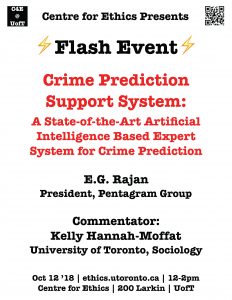
Crime Prediction Support System (CPSS): A State-of-the-Art Artificial Intelligence Based Expert System for Crime Prediction (w/ E.G. Rajan) (Kelly Hannah-Moffat, commentator)
We are in the process of developing a Reliable, Robust and Fast Crime Prediction Support System (CPSS) using novel machine learning techniques that work on genuine crime data bases without causing any damage to the dignity of any ethnic society.
Objective
1. To develop a state-of-the-art Crime Analytics and Prediction Support System that involves a plethora of software components and IoT
2. To customize the product for the benefit of individuals, security agencies, real estate businessmen, media, various research and service organizationsSub Objects
1. To help organize global old and current raw crime data for format standardization (to start with US and Indian crime data)
2. To train individuals and groups (intelligence agencies) in crime prediction and predictive policing
3. To develop various modules and integrate CPSS with RedZone Map (a pioneering product developed by Zone Technologies Inc)
4. To help maintain and upgrade CPSS periodically☛ please register here
 Presenter:
Presenter:
Prof. Dr. E.G. Rajan
President & Chairman
Pentagram Group of Companies
http://www.pentagramresearch.com
12:00 PM - 02:00 PM Commentator:
Commentator:
Kelly Hannah-Moffat
University of Toronto
Professor of Sociology
Vice-President, Human Resources & Equity
Centre for Ethics, University of Toronto
Rm 200, Larkin Building - Wed, Oct 10, 2018
Ethics of AI in Context, Ethics in the City
Ethics in the City: Mark Kingwell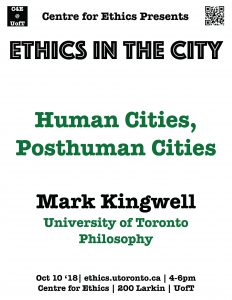
Human Cities, Posthuman Cities
Traditional urban philosophy has focussed on the relationship between humans and their built environments. Thus the emphasis on spaces, forms and circulatory systems as conditioned by the physical features of people. A standard injunction of such philosophy would then be to make cities ‘more human’. But what if the standard human body is no longer the baseline for consciousness within cities? In such a case, cities would have to be reconceived at a basic level.
☛ please register here
Mark Kingwell
04:00 PM - 06:00 PM
University of Toronto
Philosophy
Centre for Ethics, University of Toronto
Rm 200, Larkin Building - Wed, Oct 3, 2018
Ethics & the Arts, Ethics & Film: Lights, Camera, Ethics!, Ethics in the City
Ethics & Film: Urbanized (Ethics in the City Film Series)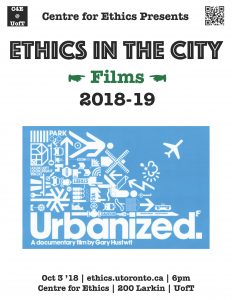
☛ please register here
06:00 PM - 08:00 PM
Centre for Ethics, University of Toronto
Rm 200, Larkin Building - Wed, Oct 3, 2018
Ethics at Noon
Ethics@Noon: Kimmo Nuotio
☛ please register here
What’s Wrong and What’s Right with Deterrence Theories in Criminal Law
Criminal law has many aims, one of them being that it seeks to influence human conduct. Criminal law has in-built theories about human action. Often some sort of rational action theory serves as a model. According to classical law and economics, human beings can be deterred by keeping the costs of offending high enough. The model of rational economic action has famously been challenged by findings of the so-called behavioral economics and law. Human beings simply fail to act rationally when studied empirically. Behavioral law and economics has created its own way, even its own language, to study law and regulation. We all know about ‘endowment’, ‘bounded rationality’, ‘nudging’, and ‘choice architecture’.
The theory of positive general prevention, well known to Continental criminal law scholars, works on somewhat different premises than classical law and economics. According to that theory, human beings are able to internalize the moral and ethical values that the criminal law tells about which in turn gives individuals additional reasons not to offend. This theory could even be linked with the theory of a democratic Rechtsstaat, since the citizens quite obviously have reasons to respect legitimate norms. Even legal doctrines which provide for legal security and predictability could contribute to the legitimacy of criminal law.
We should also mention regulatory theory, which has equally departed from classical law and economics. According to regulatory theory, at least if we read Christopher Hodges, no-blame cultures are most efficient as means to improve the quality of human action, be it in terms of security in civil aviation, or reducing malpractice by medical professionals. Often the solution seems to be to choose another regulatory option than criminal law. For serious violations of interests of others we may still need criminal law. From a regulatory point of view criminal law would still always also interact with ethics and social norms since criminalisations trigger effects on the side of the legal subjects, and on the side of the society at large. Hodges claims that behavioral law and economics is not enough to found socio-legal structures on the reality of how people make decisions. He tries to build an integrated theory, integrating theories of regulation, enforcement, compliance and ethics.
I wish to look at more closely whether behavioral law and economics as well as the theory of regulation call for a reassessment of how we should think about criminal law as a way of regulating behavior. Is behavioral economics still too narrow, too utilitarian, to be relevant for criminal law theory? Isn’t it too reductionist in its style? How would regulatory theory see this? Should we only adopt the psychology part of it?
It seems that the various approaches to and understandings about seeking to influence human behavior have very different criminal policy implications. As concerns environmental criminal law or economic criminal law, to take two examples, the Chicago-style law and economics leads to stressing the severity of (criminal) sanctions, whereas positive general prevention would leave more room for additional ethical reasons for actors in a company frame to work for minimizing the risk of crime. We do not need severe punishments to communicate blame. Much of EU criminal law seems to build on negative general deterrence.
It looks as if it makes sense to stress that criminal law possesses certain specific qualities which go beyond simple instrumental and utilitarian concerns. The theory of positive general prevention might work even if we cannot expect people to act rationally. As criminal law uses blameworthiness to communicate values, this goes well together with the idea that the individuals should be approached as responsible citizens who have the ability to learn to do better. We need to go beyond a utilitarian theory of regulating behavior. This could even be a paradox: we have to introduce non-instrumental views about how criminal law is anchored in the society in order to truly understand how criminal law operates and becomes functional. There is different politics of criminal law involved, and a different view of the society.
Nicola Lacey has put it aptly:
‘… as democratization proceeds, with the normative implication that the regulatory subject should be treated not only as a rational chooser but also in some stronger sense as an agent – as someone who not only makes choices but has some deeper form of responsibility for those choices, as a queen and not as a pawn – a non-instrumental attachment to the responsibility condition emerges.’ ‘Criminalization as Regulation’, in, Regulating Law (Eds. Parker et al), Oxford 2004, 158-159.
Kimmo Nuotio
12:30 PM - 02:00 PM
University of Helsinki
Faculty of Law
Centre for Ethics, University of Toronto
200 Larkin - Tue, Oct 2, 2018
Ethics of AI in Context
Ethics of AI in Context: Moshe Vardi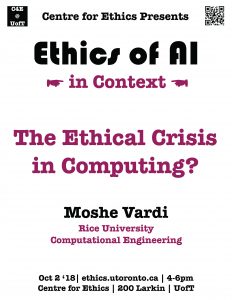
The Ethical Crisis in Computing?
Computer scientists think often of “Ender’s Game” these days. In this award-winning 1985 science-fiction novel by Orson Scott Card, Ender is being trained at Battle School, an institution designed to make young children into military commanders against an unspecified enemy. Ender’s team engages in a series of computer-simulated battles,
eventually destroying the enemy’s planet, only to learn then that
the battles were very real and a real planet has been destroyed.Many of us got involved in computing because programming was fun.
The benefits of computing seemed intuitive to us. We truly believe
that computing yields tremendous societal benefits; for example, the
life-saving potential of driverless cars is enormous! Like Ender,
however, we realized recently that computing is not a game–it is
real–and it brings with it not only societal benefits, but also
significant societal costs, such as labor polarization, disinformation,
and smart-phone addiction.The common reaction to this crisis is to label it as an “ethical crisis”
and the proposed response is to add courses in ethics to the academic
computing curriculum. I will argue that the ethical lens is too narrow.
The real issue is how to deal with technology’s impact on society.
Technology is driving the future, but who is doing the steering?☛ please register here
04:00 PM - 06:00 PM Moshe Vardi
Moshe Vardi
Rice University
Karen Ostrum George Distinguished Service Professor in Computational Engineering
Director, Ken Kennedy Institute for Information Technology
Centre for Ethics, University of Toronto
200 Larkin - Mon, Oct 1, 2018
Perspectives on Ethics
Perspectives on Ethics: Simone Chambers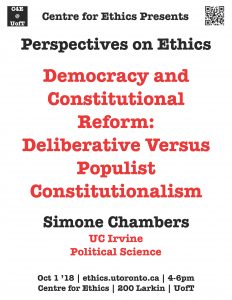
Democracy and Constitutional Reform: Deliberative Versus Populist Constitutionalism
Whereas, populism has sometimes been thought to be a movement that attempts to bypass, discredit, or suspend constitutions, contemporary populism has often progressed and gained ground through embracing and claiming ownership over national constitutions and the “people.” The cases that I look at are Hungary, Poland, Turkey and Venezuela but the threat is quite broad.
Populist constitutionalism poses a problem for scholars and citizens alike who believe that constitutional politics should also be democratic politics. How do we tell the difference between democratically driven constitutionalism and populist constitutionalism? How can citizens participate in constitution-making without hijacking constitutionalism for majoritarian, nationalist, and authoritarian ends?
One of the challenges in identifying normative objections to populist constitutionalism is how to hold on to essential ideas of popular sovereignty and citizen participation without surrendering constitution-making and constitutional limits to the anti-pluralist forces of populism. Deliberative constitutionalism, because it invests popular sovereignty in processes of collective egalitarian discourse rather than in outcomes of majoritarian procedures or an identifiable general will is in a good position to offer a critical yard stick for questioning the democratic credentials (not just liberal) of populist constitutionalism.
In this paper I lay out the main features of populist constitutionalism and then contrast it with three alternatives: liberal constitutionalism, popular constitutionalism, and deliberative constitutionalism. I argue that only deliberative constitutionalism offers a model of constitutional reform that includes citizens but offers practical advice for excluding or mitigating populist forces. The use of referendums in Scotland and Ireland are used as illustrations of deliberate appeals to citizens in constitutional questions.☛ please register here
Simone Chambers
04:00 PM - 06:00 PM
UC Irvine
Political Science
Centre for Ethics, University of Toronto
200 Larkin - Fri, Sep 28, 2018
C4E Flash Event, Ethics of AI in Context
Flash Event: Bots at the Gate: A Human Rights Analysis of Automated Decision Making in Canada’s Immigration and Refugee System (w/ Petra Molnar)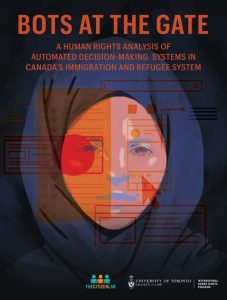
Bots at the Gate: A Human Rights Analysis of Automated Decision Making in Canada’s Immigration and Refugee System
Canada is experimenting with the use of automated decision-making, or AI, in its immigration system. A brand new report by the International Human Rights Program and the Citizen Lab looks at how algorithms and automated decision making will augment or replace human decision makers in Canada’s immigration and refugee system and highlights how the use of these technologies threatens to create a laboratory for high-risk experiments within an already highly discretionary system. Vulnerable and under-resourced communities such as non-citizens often have access to less robust human rights protections and fewer resources with which to defend those rights. Adopting these technologies in an irresponsible manner may only serve to exacerbate these disparities.
☛ please register here
Petra Molnar
02:30 PM - 04:00 PM
University of Toronto Faculty of Law
International Human Rights Program
Centre for Ethics, University of Toronto
Rm 200, Larkin Building - Tue, Sep 25, 2018
Ethics & the Arts, Ethics & Film: Lights, Camera, Ethics!, Ethics of AI in Context, Ethics of AI Film Series
Ethics & Film: Ex Machina (Ethics of AI Film Series)
☛ please register here
06:00 PM - 08:00 PM
Centre for Ethics, University of Toronto
Rm 200, Larkin Building - Mon, Sep 24, 2018
Perspectives on Ethics
Perspectives on Ethics: Kali Gross
The Butcher of Richard Street: Hannah Mary Tabbs, Black Womanhood, Violence, and Sovereignty
Hannah Mary Tabbs, an African American southern migrant, was accused of throwing the severed torso of her paramour off of a bridge in Eddington, Pennsylvania, in 1887. Through the trial and investigation Tabbs emerged at once as a figure steeped in the horror and tragedy of American slavery and its violent aftermath and as a brutal neighborhood terror in her own right. Whereas most studies of black women in this era focus on their victimization, this research explores an instance of black female violence that did not appear to be explicitly motivated by self-defense or even financial gain but rather by the sheer thrill of the exercise of power and domination, and, ultimately, pleasure. Further, this presentation ponders whether a black woman’s decision to mobilize violence on her own behalf may uniquely sketch and challenge the interstices of race, gender, sexuality, and state power.
☛ please register here
Kali Gross
04:00 PM - 06:00 PM
Rutgers University
Martin Luther King, Jr. Professor of History
Centre for Ethics, University of Toronto
200 Larkin - Wed, Sep 19, 2018
Ethics at Noon
Ethics@Noon: Rachel Cristy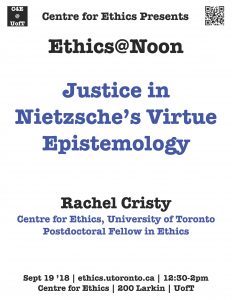
Justice in Nietzsche’s Virtue Epistemology
This paper examines Nietzsche’s peculiar use of the word “justice” [Gerechtigkeit] and related terms, especially in the second of the Untimely Meditations, “On the Uses and Disadvantages of History for Life,” but also continuing into his later works, notably On the Genealogy of Morality. Nietzsche’s usage is peculiar in two major respects. First, he speaks of justice primarily as an epistemic virtue or attitude rather than a moral or practical one: justice is a matter of attributing to everything (events, institutions, agents) the appropriate level of importance and value; Nietzsche claims that all actions, even (morally) just ones, require a stance of epistemic injustice. Second, “justice” in Nietzsche’s writing often has an affective cast: it is not merely a reliable disposition but a “will,” a “drive,” with a distinctive associated state of mind; it is not indifference or impassivity, the lack of interest or preference, but rather, as Nietzsche puts it in the Genealogy, “justice is always a positive affect.” I interpret these data by reading Nietzsche, following Alfano (2013), as a virtue epistemologist of the “inquiry responsibilist” type, who is interested not in offering definitions of knowledge of justification but in the mindset and attitudes appropriate to knowledge-seeking and the place of inquiry in a good human life. Finally, I offer some connections between Nietzsche’s unusual understanding of “justice” and some of his larger concerns, including his perspectivist epistemology and his critique of (post-)Christian morality.
☛ please register here
Rachel Cristy
12:30 PM - 02:00 PM
Centre for Ethics, University of Toronto
Postdoctoral Fellow in Ethics
Centre for Ethics, University of Toronto
200 Larkin - Tue, Sep 18, 2018
Perspectives on Ethics
Perspectives on Ethics: Lea Ypi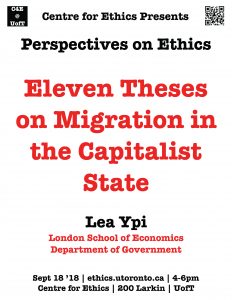
Eleven Theses on Migration in the Capitalist State
For much of the past century, the expansion of the political franchise and the related exercise of political rights meant that citizenship had the potential of being a vehicle of political emancipation. Democratic citizenship was essential to opposing capitalism with radical social reforms; it was one of the cornerstones of egalitarian policy for social democrats around the world. Contemporary trends in the admission of immigrants illustrate that citizenship has become once more increasingly selective, a good to be bought, sold or denied at the will of political elites, accessible once again along class lines. In light of these trends, I argue that citizenship has turned from a vehicle of political emancipation to one of social oppression. I focus on contemporary practices of migrant integration and try to show how they are instrumental to consolidating the oligarchical character of the capitalist state and to entrenching its class divisions.
☛ please register here
Lea Ypi
04:00 PM - 06:00 PM
London School of Economics
Professor in Political Theory
Department of Government
Centre for Ethics, University of Toronto
200 Larkin - Mon, Sep 17, 2018
Perspectives on Ethics
Perspectives on Ethics: Klaus Günther
Freedom in a Universe of Echoes?
When we are going online, we cannot avoid that our data are collected. Private and (some) governmental organizations use these data to produce a personal profile of you and me, some for observation and surveillance, others for mirroring and continuously confirming my individual preferences, choices, my activities, thoughts, emotions by offering corresponding products. Something similar happens in social networks. Many users are looking for other people who confirm what they are thinking, saying and doing. Others participate in groups which are constituted by a shared world view or at least a shared view on some issues, whose members encourage each other to maintain their view. Of course it always happens that these people are confronted with information or with views which are different, which do not coincide with what they are thinking. But in a universe of echoes, dissent and dissonance, criticism and contestation are only one more opportunity to confirm or slightly modify one´s own view, but not to change it or to give it up. Conspiracy theories are the most prominent examples of such a method. In my presentation, I shall ask for the consequences to our freedom. When we make a choice in a universe of echoes – is this still a free choice? Or does freedom require the experience of dissent, contestation, and even of failure and learning? If the answer to the last question were yes, then freedom would be lost in a universe of echoes.
☛ please register here

Klaus Günther
04:00 PM - 06:00 PM
Goethe-Universitãt Frankfurt a.M.
Faculty of Law & Excellence Cluster “Normative Orders”
Centre for Ethics, University of Toronto
200 Larkin - Thu, Sep 13, 2018
Public Lectures
Atsushi Moriya: "Harmony Between Morality and Business: The Philosophy of Shibusawa Eiichi"
 Harmony Between Morality and Business: The Philosophy of Shibusawa Eiichi
Harmony Between Morality and Business: The Philosophy of Shibusawa EiichiA lecture by:
Atsushi Moriya
Scholar in Residence
Centre for Ethics, University of TorontoShibusawa Eiichi (1840-1931) is regarded as the father of Japanese capitalism. He founded nearly 500 enterprises and economic organizations, most of which operate to this day. Equally dedicated to social and public welfare, he launched 600 philanthropic programs in many areas, including social welfare, education, and international exchange. His basic philosophy in the management of businesses was the harmony between morality and business.
In recent years his thought has drawn increasing international attention for its ethical vision of capitalism as an alternative to the untrammeled profit-seeking and capital accumulation characteristic of contemporary market economies. His most famous work, The Analects and the Abacus, has been translated into Chinese nine times.
This lecture will offer an overview of Shibusawa Eiichi’s thought, its roots in Confucian ethics, and its implications for 21st-century economic systems.Atsushi Moriya is a writer and a researcher. He is an expert in ancient
Chinese thought and the thought of Shibusawa Eiichi, and has translated Shibusawa Eiichi’s books into modern Japanese. His translation of Shibusawa’s The Analects and the Abacus has sold over 130,000 copies.To register, please click here.
Co-sponsored by
06:30 PM - 08:00 PM


Japan Foundation
2 Bloor Street East, Suite 300 - Fri, May 11, 2018
Conferences
Globalization and Its Critics in the 21st Century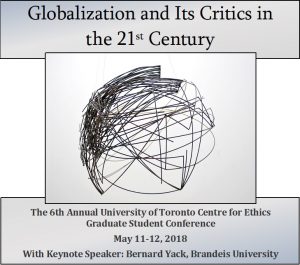 The 6th Annual
The 6th Annual
University of Toronto
Centre for Ethics
Graduate Student Conference
May 11-12, 2018Globalization and Its Critics in the 21st Century will take the opportunity to consider the ethical implications of the resurgence of anti-globalization movements, in an interdisciplinary setting. We will look at the categories and concepts that different disciplines have used to understand, defend, or critique globalization and its critics, and ask whether they remain adequate frameworks for thinking about contemporary developments.
Further information, including a conference schedule, is available here.
Keynote Speaker:
12:00 AM - 11:59 PM
Bernard Yack
Lerman Neubauer Professor of Democracy and Public Policy
Brandeis University
Centre for Ethics, University of Toronto
Rm 200, Larkin Building - Thu, May 10, 2018
Book Symposium
Book Symposium: Abraham Rotstein, Myth, Mind and Religion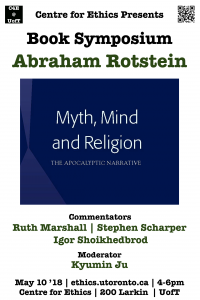 Myth, Mind and Religion: The Apocalyptic Narrative (Peter Lang 2017)
Myth, Mind and Religion: The Apocalyptic Narrative (Peter Lang 2017)Abraham Rotstein (1929-2015) (Economics & Political Science, University of Toronto)
Commentators:
Ruth Marshall (Religion and Political Science, University of Toronto)
Stephen Scharper (Anthropology, Religion, and School of Environment, University of Toronto)
Igor Shoikhedbrod (Political Science, University of Toronto)
Moderator: Kyumin Ju (Political Science, University of Toronto).
The French anthropologist Claude Lévi-Strauss scoured the Amazon forest for the myths of its primitive peoples. He found that a certain logic governed the construction of these myths—his mythologique; he regarded this logic as innate in the human mind and thus universal. Despite this claim of universality, Lévi-Strauss deliberately sidestepped the myths of the biblical religions as well as the myths of modern societies. This proved to be a missed opportunity since these myths lend themselves very well to his mode of analysis.
The apocalyptic narrative is the ongoing myth of Western society. It makes its first appearance in the Bible in the story of the Exodus and in the Passion of Christ. Its characteristic feature is its opening scenario of one or another form of unendurable oppression— whether the Pharaoh in Egypt for the Jews or the bondage of the body for Christians. “Lord and servant” is the binary pair that prevails and through a process of inversion leads to the Kingdom of Heaven (celestial or terrestrial). The work of Augustine and Luther follow suit as surprisingly enough, do the Lutheran Hegel and the Hegelian Marx. In every case, the initial oppression is inverted and a sublime destination ensues.
A demonic version of the same apocalyptic narrative appears in the 1930s. The Nazis point to their own tale of ‘oppression’ of the German people and in the same fashion proclaim the Dritte Tausendjährige Reich. It is a terrible irony but perhaps Lévi-Strauss’s mythologique may help us to see through the ‘glass’ a little less darkly.
04:00 PM - 06:00 PM
Centre for Ethics, University of Toronto
Rm 200, Larkin Building - Fri, May 4, 2018
Events on Campus, Critical Ethics
Rainer Forst, A Critical Theory of Transnational (In-)Justice: Realistic in the Right WayRainer Forst
Professor of Political Theory & Philosophy
Goethe-Universität Frankfurt a.M.hosted by:

co-sponsored by:
12:30 PM - 02:00 PM
Solarium, Faculty of Law
84 Queen's Park, Falconer Hall - Thu, May 3, 2018
Critical Ethics
C4E Master Class with Rainer ForstNoumenal Alienation: Rousseau, Kant and Marx on the Dialectics of Self-Determination
Alienation (as Entfremdung) should be understood as a particular form of individual and social heteronomy that can only be overcome by a dialectical combination of individual and collective autonomy, recovering a deontological sense of normative authority. If we think about alienation in Kantian terms, the main source of alienation is a denial of standing or, in the extreme, losing a sense of oneself as a rational normative authority equal to all others. I call the former kind of alienation, where persons deny others equal standing as a normative authority in moral or political terms, first order noumenal alienation, as there is no proper mutual cognition and recognition of each other in such a social context. I call the latter kind of alienation, where a subject does not consider themselves an equal normative authority – or an ‘end in oneself’ – second order noumenal alienation (again, in a moral and a political form). In this sense, alienation violates the dignity of humans as moral and political lawgivers – a dignity seen by Rousseau, Kant and Marx as inalienable: It can be denied or violated, but it cannot be lost. [full-text link]
This interactive event is intended for graduate and professional students and postdocs. Participants should be prepared to discuss the above article by Professor Forst. To register, please click below (by May 1):
Rainer Forst
Professor of Political Theory & Philosophy
Goethe-Universität Frankfurt a.M.hosted by:

co-sponsored by:
12:30 PM - 02:00 PM
Room 200, Larkin Building
15 Devonshire Place - Fri, Apr 13, 2018
Events on Campus
Stefan Gosepath, Is Inheritance Justified?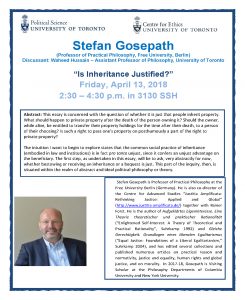 This essay is concerned with the question of whether it is just that people inherit property. What should happen to private property after the death of the person owning it? Should the owner, while alive, be entitled to transfer their property holdings for the time after their death, to a person of their choosing? Is such a right to pass one’s property on posthumously a part of the right to private property?
This essay is concerned with the question of whether it is just that people inherit property. What should happen to private property after the death of the person owning it? Should the owner, while alive, be entitled to transfer their property holdings for the time after their death, to a person of their choosing? Is such a right to pass one’s property on posthumously a part of the right to private property?The intuition I want to begin to explore states that the common social practice of inheritance (embodied in law and institutions) is in fact pro tanto unjust, since it confers an unjust advantage on the beneficiary. The first step, as undertaken in this essay, will be to ask, very abstractly for now, whether bestowing or receiving an inheritance or a bequest is just. This part of the inquiry, then, is situated within the realm of abstract and ideal political philosophy or theory.
Stefan Gosepath
Professor of Practical Philosophy at the Free University Berlin (Germany)
Co-Director, Centre for Advanced Studies “Justitia Amplificata: Rethinking Justice: Applied and Global”Commentator:
Waheed Hussain
Assistant Professor of Philosophy, University of Torontohosted by
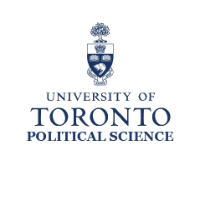
co-sponsored by
02:30 PM - 04:30 PM

Room 3130, Sidney Smith Building
100 St. George St. - Thu, Apr 12, 2018
Conferences
CRÉ/C4E 2018!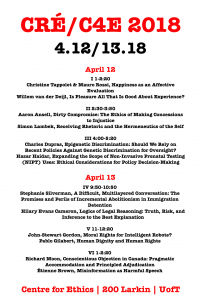 This year’s installment of the annual CRÉ/C4E Montréal/Toronto joint workshop will take place at C4E, in Toronto. (If you’re interested in attending, please register below.)
This year’s installment of the annual CRÉ/C4E Montréal/Toronto joint workshop will take place at C4E, in Toronto. (If you’re interested in attending, please register below.)Here’s the schedule (and here are the abstracts):
CRÉ/C4E 2018
4.12/13.18April 12
I 1-2:20
Christine Tappolet & Mauro Rossi, “Happiness as an Affective Evaluation”
Willem van der Deijl, “Is Pleasure All that Is Good About Experience?”II 2:30-3:50
Aaron Ansell, “Dirty Compromise: The Ethics of Making Concessions to Injustice”
Simon Lambek, “Receiving Rhetoric and the Hermeneutics of the Self”III 4:00-5:20
Charles Dupras, ” Epigenetic Discrimination: Should We Rely on Recent Policies Against Genetic Discrimination for Oversight?”
Hazar Haidar, “Expanding the scope of Non Invasive Prenatal Testing (NIPT) Uses: Ethical Considerations for Policy Decision-Making”April 13
IV 9:30-10:50
Stephanie Silverman, “A Difficult, Multilayered Conversation: The Promises and Perils of Incremental Abolitionism in Immigration Detention”
Hilary Evans Cameron, “Logics of Legal Reasoning: Truth, Risk, and Inference to the Best Explanation”V 11-12:20
John-Stewart Gordon, “Moral Rights for Intelligent Robots?”
Pablo Gilabert, “Human Dignity and Human Rights”VI 1-2:20
12:00 AM - 11:59 PM
Richard Moon, “Conscientious Objection in Canada: Pragmatic Accommodation and Principled Adjudication”
Étienne Brown, “Misinformation as Harmful Speech”
Room 200, Larkin Building
15 Devonshire Place - Tue, Apr 10, 2018
Ethics & the Arts, Ethics & Film: Lights, Camera, Ethics!
Ethics & Film: Moonlight
06:00 PM - 08:00 PM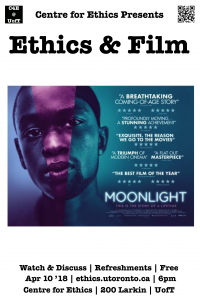
Centre for Ethics, University of Toronto
Rm 200, Larkin Building - Wed, Apr 4, 2018
Public Lectures, Ethics & the Arts
Peter Brooks, The Chameleon Poet and the Ethics of Reading (C4E Public Lecture)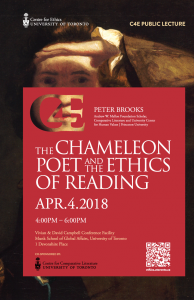 My understanding of an “ethics of reading” stands more with John Keats’ “chameleon poet” than with his “virtuous philosopher.” Starting from my reaction to the U.S. “torture memos” (post 9/11), I explore what an ethics of reading might mean, and what is peculiar to the literature classroom. I then pursue the idea by way of the concept of a literary “character”: how we have learned to reach fictional persons, why we want and need them, and what kind of an ethical investment they propose to readers. Among a number of examples, that of Proust will be crucial here.
My understanding of an “ethics of reading” stands more with John Keats’ “chameleon poet” than with his “virtuous philosopher.” Starting from my reaction to the U.S. “torture memos” (post 9/11), I explore what an ethics of reading might mean, and what is peculiar to the literature classroom. I then pursue the idea by way of the concept of a literary “character”: how we have learned to reach fictional persons, why we want and need them, and what kind of an ethical investment they propose to readers. Among a number of examples, that of Proust will be crucial here.Peter Brooks
Andrew W. Mellon Foundation Scholar, Comparative Literature and University Center for Human Values
Princeton Universityco-sponsored by:
04:00 PM - 06:00 PM
Vivian and David Campbell Conference Facility
1 Devonshire Place - Mon, Apr 2, 2018
Perspectives on Ethics, Events on Campus
Shai Lavi, Is Medicalization Secular? Regulating Circumcision in Germany, Turkey, and Israel
Shai Lavi
Director, Van Leer Jerusalem Institutehosted by:
04:00 PM - 06:00 PM
Room 100, Jackman Humanities Building
170 St. George St. - Wed, Mar 28, 2018
Ethics at Noon
Ethics@Noon: Ryan Liss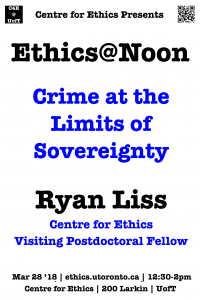 Crime at the Limits of Sovereignty:
Crime at the Limits of Sovereignty:The jurisdictional framework governing the prosecution and punishment of international crimes is unusual. While the prosecution of domestic crimes is ordinarily limited to the courts of states with a connection to the offence or offender, such connections are not required in the context of international criminal punishment. Those accused of international crimes (such as crimes against humanity or war crimes) can be tried before the courts of foreign states that are unconnected to the offence, or before international tribunals. In this talk, I examine how this reality raises the question of whether the international criminal law framework and the unique scope of the right to punish it entails can be justified. I examine the shortcomings of existing theories of what might justify international criminal punishment. I also begin to sketch out a new theory, grounded in an historical account of the field, highlighting the connection between parallel changes in ideas of state sovereignty and the definition of international crime over recent centuries.
Ryan Liss
12:30 PM - 02:00 PM
Visiting Postdoctoral Fellow
Centre for Ethics
University of Toronto
Centre for Ethics, University of Toronto
Rm 200, Larkin Building - Tue, Mar 27, 2018
Science|Ethics|Tech, Ethics & Film: Lights, Camera, Ethics!, Ethics of AI in Context, Ethics of AI Film Series
Ethics of AI Film Series: Her
06:00 PM - 08:00 PM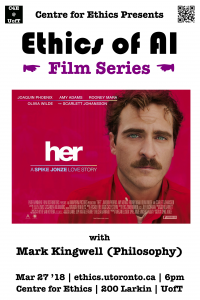
Centre for Ethics, University of Toronto
Rm 200, Larkin Building - Tue, Mar 27, 2018
Science|Ethics|Tech, Ethics in the City
Ronald Deibert, These Are the Sensors in My Neighbourhood (Ethics in the City Series)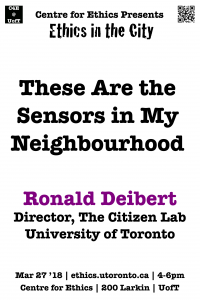
As almost everyone knows by now, we share a lot of highly-revealing and sensitive data with companies. But what those companies do with that data, whether they share it or not with third parties, and just how much of it they collect and retain, is still largely a mystery. Drawing from Citizen Lab reports, in my talk I will review the exploding universe of “big data” collection, the accumulating fine-grained sensors that facilitate it, and the public policy, security, and privacy issues that accompany it.
Ronald Deibert
04:00 PM - 06:00 PM
Director, The Citizen Lab, Munk School of Global Affairs, University of Toronto
Centre for Ethics, University of Toronto
Rm 200, Larkin Building - Thu, Mar 22, 2018
Deborah Stone, Why Statistics Should be Taught as Ethics, Not Math From simple tallies to complex quantitative analyses, counting necessarily requires value choices. Historically, measurement has always been intimately connected to notions of distributive justice and procedural fairness. This talk explores some of these connections and what it means to count with integrity.
From simple tallies to complex quantitative analyses, counting necessarily requires value choices. Historically, measurement has always been intimately connected to notions of distributive justice and procedural fairness. This talk explores some of these connections and what it means to count with integrity.Deborah Stone is a Distinguished Visiting Professor in the Heller School for Social Policy and Management at Brandeis University, and an Honorary Professor of Political Science at Aarhus University in Denmark. A specialist in health and social policy, she is the author of numerous articles and four books, including the renowned Policy Paradox: The Art of Political Decision Making, which won the American Political Science Association’s Wildavsky Award for an Enduring Contribution to Policy Studies, and The Samaritan’s Dilemma, a call for harnessing altruism, rather than self-interest, as the moral engine of political life. Her lifetime of distinguished contribution to political science was recently recognized with the APSA’s prestigious James Madison Award in 2017.
Stone is one of the co-founders and sits on the editorial board of the Journal of Health Politics, Policy and Law. In addition to academic publications, she has written for The American Prospect, Nation, New Republic, Boston Review, salon.com, and some natural history magazines. She has served as a consultant to the Social Security Administration, the Institute of Medicine, the Office of Technology Assessment, and the Human Genome Project, and more recently, to The Asia Foundation Nepal, where she helped establish a public policy institute called Niti Foundation.
Stone holds a B.A. in Russian Studies from the University of Michigan and a Ph.D. in Political Science from MIT.
This seminar is co-sponsored by the School of Public Policy & Governance and the Centre for Ethics at the University of Toronto.
Lunch will be served.
Admission is free by registration and open to the public. Register here.
12:30 PM - 02:00 PM
Room 200, Larkin Building
15 Devonshire Place - Wed, Mar 21, 2018
Ethics of AI in Context, Ethics in the City
Building Cities Better, Building Better Cities: Are We Building Smart Cities on Dumb Information Systems? (Ethics in the City Series) The advent of Smart Cities has seen an explosion of research, development and deployment of applications that take advantage of the convergence of technologies such as Artificial Intelligence, Web-based information systems, mobile technologies, and the Cloud. But lurking beneath these applications is a city-wide information system (Urban Operating System) whose architecture is rooted in the previous century. Just as cities have physical infrastructures that are over 100 years old, city operating systems are often legacy systems over 10-20 years old. Yet, the Urban OS is fast becoming the primary means by which citizens and corporations interact with the city. It is becoming the face of the city. How do we want to interact with the city?. More importantly, how do we want the Urban OS to behave when the city and the Urban OS are the same? In this presentation we explore the question of how the future Urban OS should behave and not just how they are constructed.
The advent of Smart Cities has seen an explosion of research, development and deployment of applications that take advantage of the convergence of technologies such as Artificial Intelligence, Web-based information systems, mobile technologies, and the Cloud. But lurking beneath these applications is a city-wide information system (Urban Operating System) whose architecture is rooted in the previous century. Just as cities have physical infrastructures that are over 100 years old, city operating systems are often legacy systems over 10-20 years old. Yet, the Urban OS is fast becoming the primary means by which citizens and corporations interact with the city. It is becoming the face of the city. How do we want to interact with the city?. More importantly, how do we want the Urban OS to behave when the city and the Urban OS are the same? In this presentation we explore the question of how the future Urban OS should behave and not just how they are constructed.Mark S. Fox
University of Toronto Distinguished Professor of Urban Systems Engineering
04:00 PM - 06:00 PM
Centre for Ethics, University of Toronto
Rm 200, Larkin Building - Tue, Mar 20, 2018
Ethics of AI in Context
Ethics of AI in Context: Kathryn Hume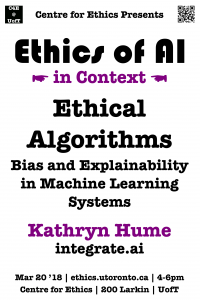 Ethical Algorithms: Bias and Explainability in Machine Learning SystemsOver the past year, discourse about the ethical risks of machine learning has largely shifted from speculative fear about rogue superintelligent systems to critical examination of machine learning’s propensity to exacerbate patterns of discrimination in society. This talk explains how and why bias creeps into supervised machine learning systems and proposes a framework businesses can apply to hold algorithmic systems accountable in a way that is meaningful to people impacted by systems. You’ll learn why it’s important to consider bias throughout the entire machine learning product lifecycle (not just algorithms), how to assess tradeoffs between accuracy and explainability, and what technical solutions are available to reduce bias and promote fairness.[☛ eVideo]
Ethical Algorithms: Bias and Explainability in Machine Learning SystemsOver the past year, discourse about the ethical risks of machine learning has largely shifted from speculative fear about rogue superintelligent systems to critical examination of machine learning’s propensity to exacerbate patterns of discrimination in society. This talk explains how and why bias creeps into supervised machine learning systems and proposes a framework businesses can apply to hold algorithmic systems accountable in a way that is meaningful to people impacted by systems. You’ll learn why it’s important to consider bias throughout the entire machine learning product lifecycle (not just algorithms), how to assess tradeoffs between accuracy and explainability, and what technical solutions are available to reduce bias and promote fairness.[☛ eVideo]Kathryn Hume
04:00 PM - 06:00 PM
integrate.ai
Centre for Ethics, University of Toronto
Rm 200, Larkin Building - Fri, Mar 16, 2018
Political Theory Research Workshop
Zhichao Tong, Epistemic Democracy and International Relations 03:00 PM - 04:30 PM
Room 3130, Sidney Smith Building
100 St. George St. - Fri, Mar 16, 2018
Julian Savulescu, The Science and Ethics of Moral Enhancement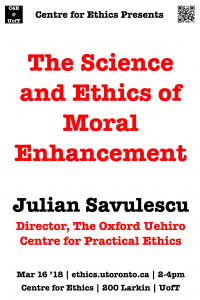 The Science and Ethics of Moral Enhancement
The Science and Ethics of Moral EnhancementThe greatest problems of the 21st century – climate change, environmental degradation, terrorism, poverty, global inequality, mass migration, depletion of resources, infectious diseases, abuse and neglect of children – are predominantly the result of human choice and behaviour. The greatest problems humanity now faces are not the result of external threat, but are the result of human choice. They are caused by human moral limitations.
Human moral psychology has been shaped by its evolutionary history. It is characterized by aggression, restricted altruism, partiality to kin and in-group members, hostility and disregard of out-group members, bias towards the near future and limited co-operation including free riding. These dispositions have generated common sense moralities which are characterized by strong prohibitions against harming in-group members, few requirements for beneficence or aiding, especially out-group members, a causal sense of responsibility which places greater weight on the consequences of acts in the near future, affecting in-group members, with little consideration given to the foreseeable consequences of omissions.
These dispositions and articulated moral norms expose humanity to unprecedented threats in the modern world of advanced technology and global community. Liberal democracy increases the threat our limited moral dispositions pose to our survival and flourishing. I will focus on violence, global poverty and climate change. I argue that we should not rest content with our current strategies for addressing these problems. I argue that we should look to not only policies tailored to our moral limitations, but to altering the biological dispositions which contribute to these limitations. I sketch briefly how this might be possible. I argue that research into human moral bioenhancement is an urgent priority.
Julian Savulescu
02:00 PM - 04:00 PM
Director, The Oxford Uehiro Centre for Practical Ethics
Room 200, Larkin Building
15 Devonshire Place - Wed, Mar 14, 2018
Science|Ethics|Tech, Ethics of AI in Context, Ethics in the City
Countering the Digital Consensus: The Political Economy of the Smart City (Ethics in the City Series)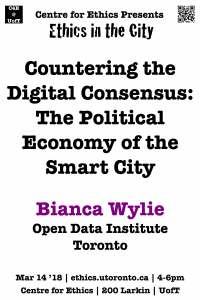 What are the risks related to the trend of increasingly technocratic governance? How might it enable the commercialization of the public service? How can government respond to this mounting digital and data-driven consensus?04:00 PM - 06:00 PMBianca Wylie
What are the risks related to the trend of increasingly technocratic governance? How might it enable the commercialization of the public service? How can government respond to this mounting digital and data-driven consensus?04:00 PM - 06:00 PMBianca Wylie
Head, Open Data Institute Toronto
Co-Founder, Tech Reset Canada
Centre for Ethics, University of Toronto
Rm 200, Larkin Building - Wed, Mar 14, 2018
Ethics at Noon
Ethics@Noon: Jeremy Davis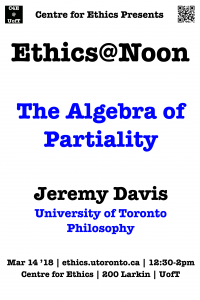 The Algebra of Partiality
The Algebra of PartialityMost people agree that we are permitted to do more for those with whom we stand in certain special relationships, subject to several constraints. But most also agree that the presence of partiality does not eliminate our more general moral reasons to others. In some cases, however, these two sets of reasons must be compared; thus, we need to know how these two sets of reasons weigh against each other. But just how much extra weight can partiality justify?
Much has been written on the question of whether or not our reasons of partiality may override certain of our positive duties of beneficence to others—for example, our duties to provide aid and famine relief to the global poor. While there is disagreement about the grounds and the extent of such partiality, many philosophers believe that we may indeed give some preference to our co-nationals over outsiders. By contrast, very little has been said concerning the question of how to weigh our various duties of partiality against our negative duties of non-maleficence to outsiders—in particular, our duties to avoid harming or killing them. While the issue of beneficence arises most naturally in discussions of global justice, the question of our duties of non-maleficence is especially pressing in the context of war, which generally involves risking, harming, or killing many innocent people, some of whom are our co-nationals, but many of whom are not. Whereas many philosophers accept that our duties to our co-nationals may in some cases outweigh our duties of beneficence to outsiders, very few philosophers accept that we may prefer our co-nationals when it comes to duties of non-maleficence to outsiders.
My goal in this talk is to illustrate—literally and figuratively—how can sometimes justify overriding certain otherwise weighty negative duties to those with whom we share no special relationship in order to satisfy duties, both positive and negative, that we have towards those with whom we do share such a special relationship. As I will argue, this conclusion follows from endorsing certain plausible assumptions about the relative base weights of various duties, as well as what I will show to be the most plausible account for how to determine the added weight that partiality affords.
Jeremy Davis
12:30 PM - 02:00 PM
Centre for Ethics & Department of Philosophy
University of Toronto
Centre for Ethics, University of Toronto
Rm 200, Larkin Building - Tue, Mar 13, 2018
Ethics & the Arts, Ethics & Film: Lights, Camera, Ethics!
Ethics & Film: The Second Mother
06:00 PM - 08:00 PM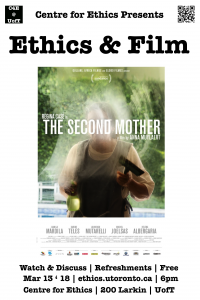
Centre for Ethics, University of Toronto
Rm 200, Larkin Building - Mon, Mar 12, 2018
Perspectives on Ethics, Ethics & the Arts
Perspectives on Ethics: Jessica Rosenfeld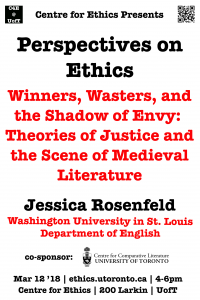 Winners, Wasters, and the Shadow of Envy: Theories of Justice and the Scene of Medieval Literature
Winners, Wasters, and the Shadow of Envy: Theories of Justice and the Scene of Medieval LiteratureIs envy at the root of all claims for justice (so says Freud), or is envy a regrettable but surmountable human tendency that will be minimized in a just society (as Rawls has it)? Should we, as newer political and feminist theory has suggested, take envy seriously as a “political emotion” and allow it to direct the building of a better democracy? My talk will trace the recent history of envy’s role in theorizing social justice and then turn to medieval literature as a terrain of close attention to envy, not only as a “deadly sin,” but as an emotion that provokes the social imagination, and the articulation of the move from the individual to the political. The figures of the winner (upstanding citizen) and waster (profligate spender, “welfare queen”) have a long history, and can help us to understand the passages between the personal and the social, the economic and the affective, and perhaps to disentangle the threads of envy, resentment, and justice.
Jessica Rosenfeld
Washington University in St. Louis
Englishco-sponsored by
04:00 PM - 06:00 PM
Centre for Ethics, University of Toronto
200 Larkin - Wed, Mar 7, 2018
Author Meets Critics
Author Meets Critics: Richard MoonPutting Faith in Hate: When Religion Is the Source or Target of Hate Speech
 (Cambridge 2018)
(Cambridge 2018)Richard Moon
Faculty of Law
University of WindsorCommentators:
Mohammad Fadel (Law & Religion, University of Toronto)
Anna Korteweg (Sociology, University of Toronto)
Ruth Marshall (Religion & Political Science, University of Toronto)
To allow or restrict hate speech is a hotly debated issue in many societies. While the right to freedom of speech is fundamental to liberal democracies, most countries have accepted that hate speech causes significant harm and ought to be regulated. Richard Moon examines the application of hate speech laws when religion is either the source or target of such speech. Moon describes the various legal restrictions on hate speech, religious insult, and blasphemy in Canada, Europe and elsewhere, and uses cases from different jurisdictions to illustrate the particular challenges raised by religious hate speech. The issues addressed are highly topical: speech that attacks religious communities, specifically anti-Muslim rhetoric, and hateful speech that is based on religious doctrine or scripture, such as anti-gay speech. The book draws on a rich understanding of freedom of expression, the harms of hate speech, and the role of religion in public life.
04:00 PM - 06:00 PM
Centre for Ethics, University of Toronto
Rm 200, Larkin Building - Wed, Mar 7, 2018
Ethics at Noon
Ethics@Noon: Simon Lambek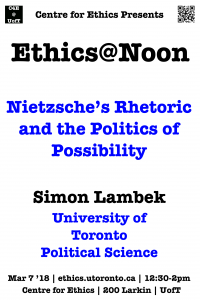 Nietzsche’s Rhetoric and the Politics of Possibility
Nietzsche’s Rhetoric and the Politics of PossibilityThis talk addresses the question of Nietzsche’s style and presents a reading of Nietzsche’s use of rhetoric as inseparable from his philosophical project. I provide an exegesis of Nietzsche’s own reflections on rhetoric and attend to its actual deployment. In doing so, I highlight the underexplored themes of receptivity and dissonance. I challenge common interpretations by arguing that Nietzsche’s rhetoric is neither deployed as a means to get at some unitary whole, nor is it evidence of an embrace of indeterminism. Nor yet does its significance reside only in relation to Nietzsche’s perspectivism. Rather, Nietzsche’s rhetoric, I argue, is often deliberately dissonant and oriented toward facilitating receptive effects. The aim is to alter the conditions of possibility. I conclude by suggesting that Nietzsche’s rhetoric has implications for critical theory, shifting how we might view critical political engagement in the public sphere.
Simon Lambek
12:30 PM - 02:00 PM
Centre for Ethics & Department of Political Science
University of Toronto
Centre for Ethics, University of Toronto
Rm 200, Larkin Building - Tue, Mar 6, 2018
Ethics of AI in Context
Ethics of AI in Context: Vincent Chiao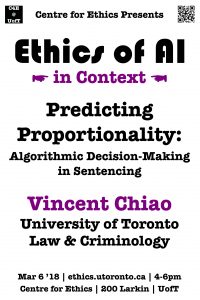 Predicting Proportionality: Algorithmic Decision-Making in Sentencing
Predicting Proportionality: Algorithmic Decision-Making in SentencingSentencing in many jurisdictions remains quite discretionary, with significant variability in how judges approach otherwise similar cases, raising concerns of both arbitrariness and bias. This paper proposes systematizing judgments of proportionality in sentencing by means of an algorithm. The aim of such an algorithm would be to predict what a typical judge in that jurisdiction would regard as a proportionate sentence in a particular case. Notably, unlike most discussions of algorithmic decision-making in the criminal law, the objective of the algorithm would be on predicting the behavior of judges rather than defendants. I show that endorsing such an algorithm does not come at the cost of case-specific justice, that it is consistent with a highly particularistic account of moral judgment, and that it is attractive even despite pervasive uncertainty as to the point of punishment.
Vincent Chiao
04:00 PM - 06:00 PM
Law & Criminology
University of Toronto
Centre for Ethics, University of Toronto
Rm 200, Larkin Building - Fri, Mar 2, 2018
Political Theory Research Workshop
Thilo Schaefer, Laneways of the Imagination, Sidewalks in the Cloud: The Importance of Utopia for City-BuildingPolitical philosophy David Estlund has remarked that political philosophy suffers from a case of “utopophobia” or “the unreasonable fear of utopianism.” This paper shows how two common critiques of utopia, one represented by the work of F.A. Hayek and Karl Popper and the other by Karl Marx and Friedrich Engels, are based on a misunderstanding of the concept. Furthermore, this paper goes on to demonstrate how utopianism is also implicit in the writings of these anti-utopian critics in several problematic ways. Following this analysis, this paper suggests that we can think about utopia in terms of a loose typology, evaluating any particular utopian vision on two dimensions: (1) its level of perfectionism compared to its openness to possibility and (2) the degree to which it is grounded in generally accepted empirical facts. Finally, this paper uses the City of Toronto’s laneway housing debate and the recent proposal from Google’s Sidewalk Labs to build a smart neighbourhood in the city to illustrate the need to explicitly discuss the utopian visions underpinning contemporary planning practices.03:00 PM - 04:30 PM
Centre for Ethics, University of Toronto
Rm 200, Larkin Building - Thu, Mar 1, 2018
Ethics & the Arts, Critical Ethics
Emily Baxter, We Are All Criminals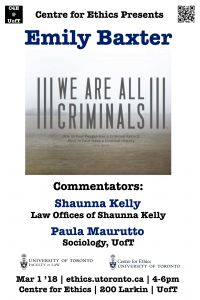 We Are All Criminals looks at people with criminal histories but no record–people who have had the luxury to forget.
We Are All Criminals looks at people with criminal histories but no record–people who have had the luxury to forget.Doctors and lawyers, social workers and students, retailers and retirees tell stories of crimes they got away with, and consider how different their lives would have been had they been caught.
The stories are of youth, boredom, intoxication, and porta potties. They are about race, class, and privilege. They are humorous, humiliating, and humbling in turn.
Through photography and storytelling, this project seeks to challenge society’s perception of what it means to be a criminal and how much weight a record should be given, when truly – we are all criminals.
Emily Baxter
Founder & Executive Director, We Are All CriminalsCommentators:
Shaunna Kelly
Law Offices of Shaunna KellyPaula Maurutto
Department of Sociology, University of Torontoco-sponsor:
04:00 PM - 06:00 PM

Centre for Ethics, University of Toronto
Rm 200, Larkin Building - Wed, Feb 28, 2018
Ethics of AI in Context, Ethics in the City
The End of Public Works? The Politics of Infrastructure and the Quiet Decline of Local Democracy (Ethics in the City Series)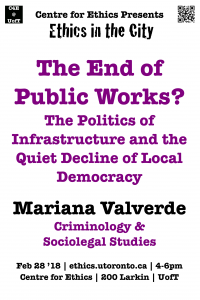 Focusing on Sidewalk Toronto, the joint project of Waterfront Toronto and Google’s Sidewalk Labs, Mariana Valverde critically examines the evolution, via neoliberal privatization, from public works to public-private partnerships as modes of urban governance.
Focusing on Sidewalk Toronto, the joint project of Waterfront Toronto and Google’s Sidewalk Labs, Mariana Valverde critically examines the evolution, via neoliberal privatization, from public works to public-private partnerships as modes of urban governance.Mariana Valverde
04:00 PM - 06:00 PM
Criminology & Sociolegal Studies
Centre for Ethics, University of Toronto
Rm 200, Larkin Building - Wed, Feb 28, 2018
C4E Flash Event, Ethics in the City
Akwasi Owusu-Bempah, To Police and Be Policed: Multiple Perspectives on Racialized Law Enforcement in a Diverse and Changing City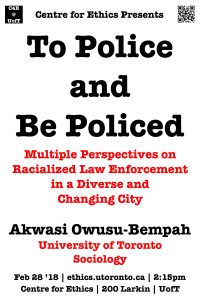 Despite official claims of tolerance and inclusion, Toronto’s Black population has a historically tenuous relationship with the city’s law enforcement agencies. This study addresses how distrust of the police and notions of Black criminality are mutually sustained and reproduced through police encounters with Black citizens. Prior research has documented the myriad ways in which the police serve to subjugate and control Black populations. Previous research has also highlighted the importance of fair treatment in shaping citizens’ perceptions of police (and state) legitimacy. Very little, however, has simultaneously incorporated the perspectives of those on both sides of “the thin blue line.” Utilizing a mixed-methods approach, this study draws on interview and survey data with police officers and civilians to untangle the intricate relationship between race, policing, citizenship and state authority. The findings illustrate that both police officers and Black citizens act in ways that run counter to their own interests during their often hostile and confrontational encounters. Such encounters contribute to the erosion of police legitimacy and to the criminalization of race/racialization of crime. The findings provide support for a methodological approach to the study of racial inequality that is attentive to the multiple perspectives of the actors involved.
Despite official claims of tolerance and inclusion, Toronto’s Black population has a historically tenuous relationship with the city’s law enforcement agencies. This study addresses how distrust of the police and notions of Black criminality are mutually sustained and reproduced through police encounters with Black citizens. Prior research has documented the myriad ways in which the police serve to subjugate and control Black populations. Previous research has also highlighted the importance of fair treatment in shaping citizens’ perceptions of police (and state) legitimacy. Very little, however, has simultaneously incorporated the perspectives of those on both sides of “the thin blue line.” Utilizing a mixed-methods approach, this study draws on interview and survey data with police officers and civilians to untangle the intricate relationship between race, policing, citizenship and state authority. The findings illustrate that both police officers and Black citizens act in ways that run counter to their own interests during their often hostile and confrontational encounters. Such encounters contribute to the erosion of police legitimacy and to the criminalization of race/racialization of crime. The findings provide support for a methodological approach to the study of racial inequality that is attentive to the multiple perspectives of the actors involved.Akwasi Owusu-Bempah
02:15 PM - 03:45 PM
University of Toronto, Sociology
Centre for Ethics, University of Toronto
Rm 200, Larkin Building - Wed, Feb 28, 2018
Ethics at Noon
Ethics@Noon: John-Stewart Gordon Moral Experts vs. Ethical Theories
Moral Experts vs. Ethical TheoriesThe lively topic of whether moral expertise and moral experts exist has been vividly discussed in recent contributions in ethics and, particularly, in bioethics. I hold the view that moral expertise exists and that some moral philosophers can be considered as moral experts in the full sense, who have moral expertise, while most cannot. In this talk, however, I focus on the question of whether moral experts–by adhering to their particular expertise–are better qualified to solve complex moral questions than (moral) philosophers who (only) use a particular moral theory. This is an important issue because my analysis will respond to the vital question of whether one is, in general, able to solve complex moral issues by adhering to only one moral theory given the background of the complexity of moral life.
John-Stewart Gordon
12:30 PM - 02:00 PM
Professor & Head of the Research Cluster for Applied Ethics
Vytautas Magnus University Kaunas
Centre for Ethics, University of Toronto
Rm 200, Larkin Building - Tue, Feb 27, 2018
Ethics & the Arts, Ethics & Film: Lights, Camera, Ethics!
Ethics & Film: No No: A Dockumentary
06:00 PM - 08:00 PM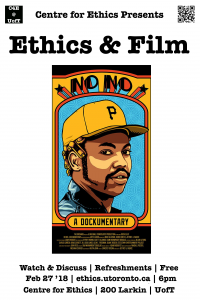
Centre for Ethics, University of Toronto
Rm 200, Larkin Building - Tue, Feb 27, 2018
Ethics at Noon, C4E Flash Event
New Perspectives on Mass Incarceration in the United States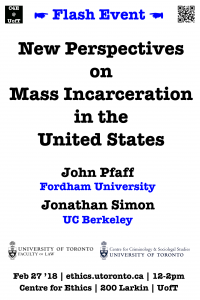 The American incarceration rate has quintupled over the last generation, to the point where the United States now incarcerates over two million individuals. A wave of new empirical, sociological and legal scholarship has begun shed new light on the growth of mass incarceration. John Pfaff (Fordham) and Jonathan Simon (Berkeley) will discuss their groundbreaking research on the causes of mass incarceration, the response by the courts and proposals for reform going forward.Panelists:
The American incarceration rate has quintupled over the last generation, to the point where the United States now incarcerates over two million individuals. A wave of new empirical, sociological and legal scholarship has begun shed new light on the growth of mass incarceration. John Pfaff (Fordham) and Jonathan Simon (Berkeley) will discuss their groundbreaking research on the causes of mass incarceration, the response by the courts and proposals for reform going forward.Panelists: 12:00 PM - 02:00 PM
12:00 PM - 02:00 PM
Centre for Ethics, University of Toronto
Rm 200, Larkin Building - Mon, Feb 26, 2018
Perspectives on Ethics, Science|Ethics|Tech
Perspectives on Ethics: Regina Rini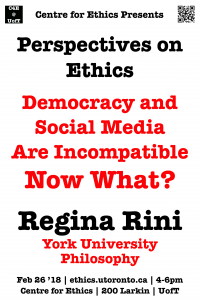 Democracy and Social Media Are Incompatible: Now What?
Democracy and Social Media Are Incompatible: Now What?It takes time for the norms of democratic debate to adjust to new technologies – in some cases, too much time. In parts of Europe in the 1920s and 30s, change brought on by the new technology of radio outran democratic adaptation. I will argue that we are now at a similar inflection point with social media. Healthy democratic debate requires that we view fellow citizens as typically sincere and thoughtful when they express disagreement. I identify several features of social media discourse that have rapidly undermined this presumption and weakened the authority of democratic norms. What can be done about these shifts? I will argue that state and consumer solutions are unlikely to work. Our best hope is for social media platforms to create infrastructure enabling citizens to detect insincerity and carelessness in discourse.
Regina Rini
04:00 PM - 06:00 PM
York University
Philosophy
Centre for Ethics, University of Toronto
200 Larkin - Tue, Feb 20, 2018
Ethics of AI in Context, Ethics in the City
The Ethics of Smart Cities: Interacting with Non-Human Agents (Ethics in the City Series)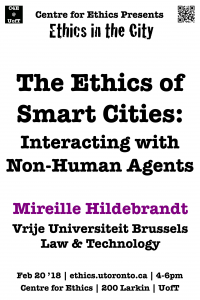 In her book on Smart Technologies and the End(s) of Law, Mireille Hildebrandt sketches the contours of a new landscape, animated by all kinds of machine agency. She calls the fusion of online and offline worlds “the Onlife World,” highlighting that the boundaries between on- and offline are becoming increasingly artificial: we have to make them to retain some of our personal space. Being human in a hyperconnected world was the subtitle of the “Onlife Manifesto,” that was written by a group of European philosophers, neuroscientists, psychologists, lawyers and experts in artificial intelligence. In her lecture, Hildebrandt will employ the work of Julie Mehretu to discuss the impact of a transformed cityscape that confronts citizens with the effects of hyperconnectivity, big data and predictive analytics at the level of municipal policies. The question will be what kind of humans we may become when ‘living with algorithms’ is the new normal, and how we can learn to shape our algorithmic environment in the Onlife World without succumbing to idealistic or cynical portrayals of the upcoming smart cityscape. This talk will revisit a presentation Hildebrandt gave at art centre Stroom in The Hague.04:00 PM - 06:00 PMMireille Hildebrandt
In her book on Smart Technologies and the End(s) of Law, Mireille Hildebrandt sketches the contours of a new landscape, animated by all kinds of machine agency. She calls the fusion of online and offline worlds “the Onlife World,” highlighting that the boundaries between on- and offline are becoming increasingly artificial: we have to make them to retain some of our personal space. Being human in a hyperconnected world was the subtitle of the “Onlife Manifesto,” that was written by a group of European philosophers, neuroscientists, psychologists, lawyers and experts in artificial intelligence. In her lecture, Hildebrandt will employ the work of Julie Mehretu to discuss the impact of a transformed cityscape that confronts citizens with the effects of hyperconnectivity, big data and predictive analytics at the level of municipal policies. The question will be what kind of humans we may become when ‘living with algorithms’ is the new normal, and how we can learn to shape our algorithmic environment in the Onlife World without succumbing to idealistic or cynical portrayals of the upcoming smart cityscape. This talk will revisit a presentation Hildebrandt gave at art centre Stroom in The Hague.04:00 PM - 06:00 PMMireille Hildebrandt
Law and Technology, Vrije Universiteit Brussels
Computing & Information Sciences, Radboud University Nijmegen
Centre for Ethics, University of Toronto
Rm 200, Larkin Building - Fri, Feb 16, 2018
Political Theory Research Workshop
Cáit Power, The Jew in Speech: Conceiving the City, God, and Man 03:00 PM - 04:30 PM
Centre for Ethics, University of Toronto
Rm 200, Larkin Building - Thu, Feb 15, 2018
Events on Campus
Killam Lecture: Thomas Hurka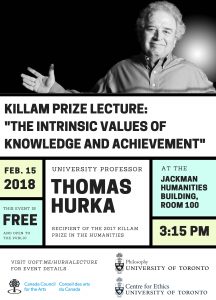 University Professor Thomas Hurka, the Chancellor Henry N. R. Jackman Professor of Philosophical Studies, is the recipient of a 2017 Killam Prize in the Humanities, one of the most prestigious academic honours in Canada, granted for outstanding career achievement.
University Professor Thomas Hurka, the Chancellor Henry N. R. Jackman Professor of Philosophical Studies, is the recipient of a 2017 Killam Prize in the Humanities, one of the most prestigious academic honours in Canada, granted for outstanding career achievement.Prof. Hurka will deliver a public lecture under the title of The Intrinsic Values of Knowledge and Achievement. The event is free and open to the public.
Read more about Prof. Hurka’s monumental achievement, publications, and career on the U of T Arts & Science News website.
hosted by:

co-sponsored by:
03:00 PM - 05:00 PM
Room 100, Jackman Humanities Building
170 St. George St. - Wed, Feb 14, 2018
Ethics of AI in Context, Ethics in the City
Canadian Smart Cities: Defining the Public Good (Ethics in the City Series)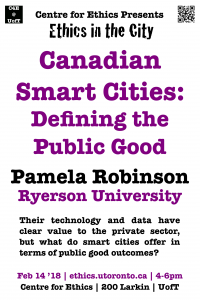 From the federal government’s smart city challenge to Sidewalk Labs‘ partnering with Waterfront Toronto on the planning of Quayside, smart cities are part of a new urban agenda in Canadian cities. Their technology and data have clear value to the private sector but what do smart cities offer in terms of public good outcomes? This talk will explore how early experiments with smart cities send signals that deliberate and creative attention must be paid if we seek to derive public good from this technology.
From the federal government’s smart city challenge to Sidewalk Labs‘ partnering with Waterfront Toronto on the planning of Quayside, smart cities are part of a new urban agenda in Canadian cities. Their technology and data have clear value to the private sector but what do smart cities offer in terms of public good outcomes? This talk will explore how early experiments with smart cities send signals that deliberate and creative attention must be paid if we seek to derive public good from this technology.Pamela Robinson
Associate Dean, Graduate Studies and Strategic Initiatives, Faculty of Community Services
04:00 PM - 06:00 PM
Centre for Ethics, University of Toronto
Rm 200, Larkin Building - Wed, Feb 14, 2018
Author Meets Critics
Author Meets Critics: Mara Marin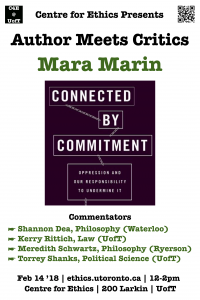 Connected by Commitment: Oppression and Our Responsibility to Undermine It (Oxford 2017)
Connected by Commitment: Oppression and Our Responsibility to Undermine It (Oxford 2017)Mara Marin
Postdoctoral Affiliate, Centre for Ethics
University of TorontoCommentators:
Shannon Dea (Philosophy, University of Waterloo)
Kerry Rittich (Law, University of Toronto)
Meredith Schwartz (Philosophy, Ryerson University)
Torrey Shanks (Political Science, University of Toronto)
Saying that political and social oppression is a deeply unjust and widespread condition of life is not a terribly controversial statement. Likewise, theorists of justice frequently consider our obligation to not turn a blind eye to oppression. But what is our culpability in the endurance of oppression?
In this book, Mara Marin complicates the primary ways in which we make sense of human and political relationships and our obligations within them. Rather than thinking of relationships in terms of our intentions, Marin thinks of them as open-ended and subject to ongoing commitments. Commitments create open-ended expectations and vulnerabilities on the part of others, and therefore also obligations. By this rationale, our actions sustain oppressive or productive structures in virtue of their cumulative effects, not the intentions of the actors.When we violate our obligations we oppress others.
12:00 PM - 02:00 PM
Centre for Ethics, University of Toronto
Rm 200, Larkin Building - Tue, Feb 13, 2018
Science|Ethics|Tech, Ethics & Film: Lights, Camera, Ethics!, Ethics of AI in Context, Ethics of AI Film Series
Ethics of AI Film Series: Star Trek TNG
06:00 PM - 08:00 PM
Centre for Ethics, University of Toronto
Rm 200, Larkin Building - Tue, Feb 13, 2018
Ethics of AI in Context
Ethics of AI in Context: Richard Zemel, Ensuring Fair and Responsible Automated Decisions Information systems are becoming increasingly reliant on statistical inference and learning to render all sorts of decisions, including the issuing of bank loans, the targeting of advertising, and the provision of health care. This growing use of automated decision-making has sparked heated debate among philosophers, policy-makers, and lawyers, with critics voicing concerns with bias and discrimination. Bias against some specific groups may be ameliorated by attempting to make the automated decision-maker blind to some attributes, but this is difficult, as many attributes may be correlated with the particular one. The basic aim then is to make fair decisions, i.e., ones that are not unduly biased for or against specific subgroups in the population. I will discuss various computational formulations and approaches to this problem.
Information systems are becoming increasingly reliant on statistical inference and learning to render all sorts of decisions, including the issuing of bank loans, the targeting of advertising, and the provision of health care. This growing use of automated decision-making has sparked heated debate among philosophers, policy-makers, and lawyers, with critics voicing concerns with bias and discrimination. Bias against some specific groups may be ameliorated by attempting to make the automated decision-maker blind to some attributes, but this is difficult, as many attributes may be correlated with the particular one. The basic aim then is to make fair decisions, i.e., ones that are not unduly biased for or against specific subgroups in the population. I will discuss various computational formulations and approaches to this problem.
[☛ eVideo]
Richard Zemel
04:00 PM - 06:00 PM
Computer Science & Vector Institute
University of Toronto
Centre for Ethics, University of Toronto
Rm 200, Larkin Building - Wed, Feb 7, 2018
Conferences
Conference: Collective and Temporally Extended Rights and Wrongs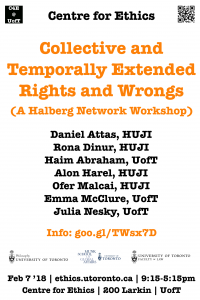 Collective and Temporally Extended Rights and Wrongs
Collective and Temporally Extended Rights and Wrongs
(A Halbert Network Workshop)Paradigmatic cases of moral obligations and wrongdoing involve a single act of an individual towards specific persons. However many cases of moral obligations and wrong do not have this structure. I can wrong a student by repeatedly failing to call on her in class, even if I am not obligated to call on her on any specific occasion. It seems also that we together can wrong others even though no individual act of any of us wrongs any specific other person. A similar structure presents itself in the theories of practical reason and collective rationality. Philosophers have examined the rational demands on behaviour that obtain in virtue of projects, plans, and commitments that extend through time. In the area of collective action, we may ask how my participation in a collective action contributes to the assessment of what is rational for me to do.
Organizer:
Sergio Tenenbaum
Professor of Philosophy
University of TorontoSchedule
Tuesday, February 6 (Location: Jackman Humanities Building Rm. 418)
2:45 – 4:15pm Haim Abraham (Toronto), Corrective Justice Duties for Belligerent Wrongs
4:30 – 6:00pm Alon Harel (HUJI) & Ofer Malcai (HUJI), Vox Populi Vox Dei: Populism, Elitism and Private ReasonWednesday, February 7 (Location: Centre for Ethics, Larkin Building Rm. 200)
9:15 – 10:45am Emma McClure (Toronto), Microaggressions as Collective Harms and Individual Wrongs
11:00am – 12:30pm Daniel Attas (HUJI), Who Owns Cultural Heritage?
Lunch
2 – 3:30pm Julia Nefsky (Toronto), Global Warming, Individual Obligations and the Inefficacy Problem: the Need for an Imperfect View
3:45 – 5:15pm Rona Dinur (HUJI), Intentional Discriminationco-sponsored by:
09:15 AM - 05:15 PM



Centre for Ethics, University of Toronto
Rm 200, Larkin Building - Tue, Feb 6, 2018
Ethics of AI in Context
Ethics of AI in Context: Mireille Hildebrandt, The Ethics of Agonistic Machine Learning04:00 PM - 06:00 PM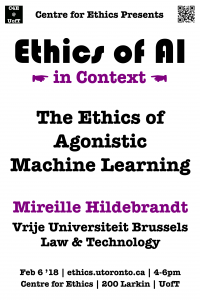 What do we mean when we say that machines learn? What is the difference that makes a difference between human learning and machine learning? In my talk I will discuss the nature of machine learning (ML), including a series of design decisions that inform ML research designs and the trade-offs they incorporate. I will argue that these trade-offs have real world implications that require the participation of those who will suffer or enjoy the consequences of real world ML applications. Building on Mouffe’s democratic theory and Rip’s constructive technology assessment, I will argue for agonistic or adversarial ML as the only viable way to ensure that ML contributes to human and societal flourishing.
What do we mean when we say that machines learn? What is the difference that makes a difference between human learning and machine learning? In my talk I will discuss the nature of machine learning (ML), including a series of design decisions that inform ML research designs and the trade-offs they incorporate. I will argue that these trade-offs have real world implications that require the participation of those who will suffer or enjoy the consequences of real world ML applications. Building on Mouffe’s democratic theory and Rip’s constructive technology assessment, I will argue for agonistic or adversarial ML as the only viable way to ensure that ML contributes to human and societal flourishing.[☛ eVideo]
Mireille Hildebrandt
Law and Technology, Vrije Universiteit Brussels
Computing & Information Sciences, Radboud University Nijmegen
Centre for Ethics, University of Toronto
Rm 200, Larkin Building - Mon, Feb 5, 2018
Perspectives on Ethics
Perspectives on Ethics: Jennifer Carlson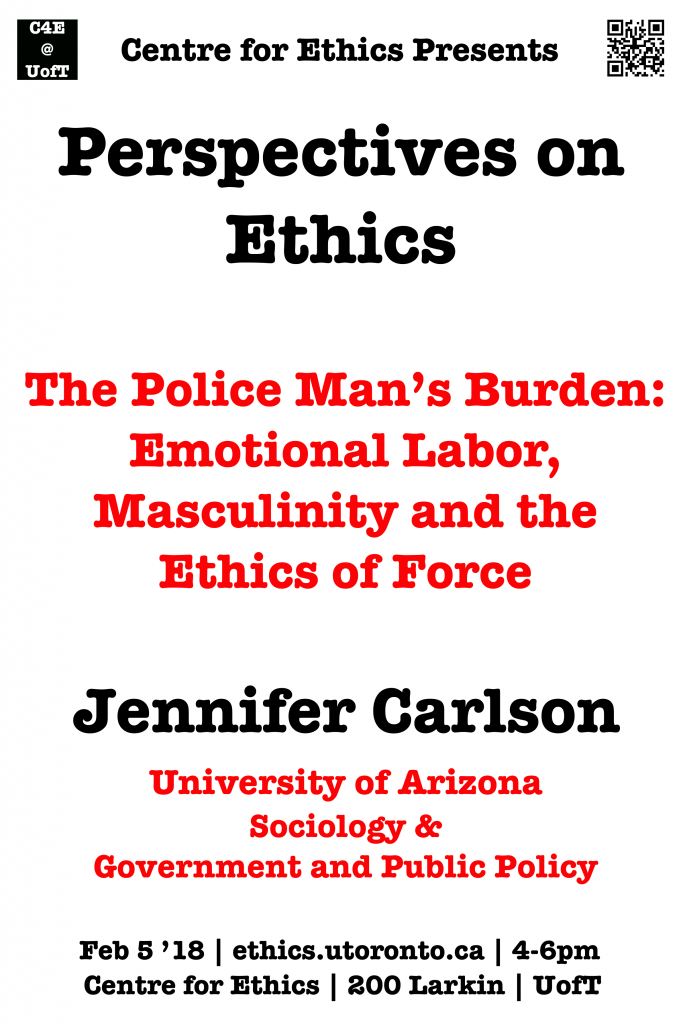 The Police Man’s Burden: Emotional Labor, Masculinity and the Ethics of Force
The Police Man’s Burden: Emotional Labor, Masculinity and the Ethics of ForceUse of force is central to police work, yet the contours of the use of force for American police have changed dramatically in recent years. First, police have become increasingly prepared to use force due to changes in training and equipment amid threats of mass shootings, domestic terrorism, and so forth. Second, police are increasingly policing contexts that are gun-rich and gun law-lax, with over 13 million people licensed to carry guns in the US. Third, police have increasingly faced public outcry related to the use of force, especially with regard to racial disparities in excessive force. In what contexts do police embrace, versus accept or even avoid, the use of force? Is police use of force equally ‘non-negotiable’ (see Bittner, 1973) across social settings? If not, why not—and to what ends? To explore these questions, this talk draws on interviews with nearly 80 police chiefs across Arizona, California, and Michigan. While policing scholarship has documented how “hard charger” masculinist approaches to policing mediates the central role of firearms in constituting “real” policework (see Herbert, 2001), I draw on the concept of ‘moral wages’ (see Kolb, 2014) to show how guns operate not just as means of violence but also as gendered tools of emotional management. Examining how police evaluate more versus less moralistic uses of force and at times even opt out of force, I show that police make ethical sense of the use of force by framing it as masculine carework. Further situating these findings within the divergent contexts of Arizona, California and Michigan (especially their respective gun cultures) reveals that the boundaries between police and broader society are more porous than often acknowledged: police sensibilities about legitimate force are patterned by more localized norms regarding the use of force as well as by the socio-legal regimes in which police are embedded.
Jennifer Carlson
04:00 PM - 06:00 PM
University of Arizona
School of Sociology & School of Government and Public Policy
Centre for Ethics, University of Toronto
200 Larkin - Fri, Feb 2, 2018
Political Theory Research Workshop
Chi Kwok, Personal Autonomy and Workplace Justice 03:00 PM - 04:30 PM
Centre for Ethics, University of Toronto
Rm 200, Larkin Building - Tue, Jan 30, 2018
Science|Ethics|Tech, Ethics & Film: Lights, Camera, Ethics!, Ethics of AI in Context, Ethics of AI Film Series
Ethics of AI Film Series: Blade Runner
06:00 PM - 08:00 PM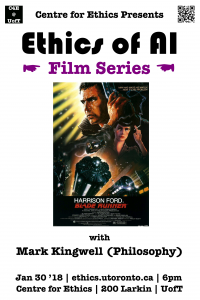
Centre for Ethics, University of Toronto
200 Larkin - Tue, Jan 30, 2018
Science|Ethics|Tech, Ethics of AI in Context
Ethics of AI in Context: Frank Rudzicz, The Future of Automated Healthcare04:00 PM - 06:00 PM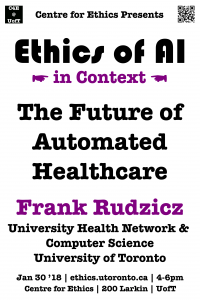 As artificial intelligence and software tools for medical diagnosis are increasingly used within the healthcare system generally, it will be important that these tools are used ethically. This talk will cover recent advances in machine learning in healthcare, current approaches to ethics in healthcare, likely changes to regulation to allow for increased use of AI, and new challenges, both technical and societal, that will arise given those changes.
As artificial intelligence and software tools for medical diagnosis are increasingly used within the healthcare system generally, it will be important that these tools are used ethically. This talk will cover recent advances in machine learning in healthcare, current approaches to ethics in healthcare, likely changes to regulation to allow for increased use of AI, and new challenges, both technical and societal, that will arise given those changes.[☛ eVideo]
Frank Rudzicz
University Health Network & Computer Science
University of Toronto
Centre for Ethics, University of Toronto
Rm 200, Larkin Building - Mon, Jan 29, 2018
C4E Flash Event
Flash Event: The Quebec City Mosque Shooting: What Have We Learned?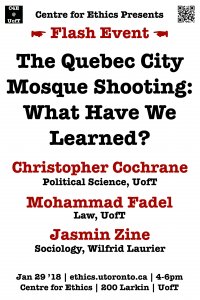 On the evening of January 29, 2017, a University of Laval student entered a mosque in Quebec City after evening prayers, opening fire on the worshippers. In the end, he killed six, and wounded nineteen others. Although motivated by anti-Muslim animus, he was not charged with terrorism, but rather with first-degree murder. The massacre should have reminded Canadians that the election of Justin Trudeau did not usher in a new feel good era that spelled the end of anti-immigrant and anti-Muslim animus in Canada.
On the evening of January 29, 2017, a University of Laval student entered a mosque in Quebec City after evening prayers, opening fire on the worshippers. In the end, he killed six, and wounded nineteen others. Although motivated by anti-Muslim animus, he was not charged with terrorism, but rather with first-degree murder. The massacre should have reminded Canadians that the election of Justin Trudeau did not usher in a new feel good era that spelled the end of anti-immigrant and anti-Muslim animus in Canada.One year later, what has Canada learned from this attack? Did it learn anything, or has it been forgotten or minimized in an attempt to preserve a complacent view of Canada as a successful, multicultural state that has successfully integrated immigrants without triggering the rise of right-wing, xenophobic nationalism, as has occurred in the United States and elsewhere, including in Europe?
Panelists:
Christopher Cochrane
Political Science, University of TorontoMohammad Fadel
Law, University of TorontoJasmin Zine
04:00 PM - 06:00 PM
Sociology, Wilfrid Laurier University
Centre for Ethics, University of Toronto
Rm 200, Larkin Building - Wed, Jan 24, 2018
Ethics of AI in Context, Ethics in the City
Sidewalk Toronto: Ethics in the "Smart City" (Ethics in the City Series)
Join us for the kick-off event in our new series on Ethics in the City: a panel discussion of the Sidewalk Toronto Project, a collaboration of Google’s Sidewalk Labs and Waterfront Toronto.
Panelists:
Mark Fox
Industrial Engineering, University of TorontoRuben Gaetani
Management, University of TorontoJohn Lorinc
spacing.caMariana Valverde
Criminology & Sociolegal Studies, University of TorontoKristina Verner
04:00 PM - 06:00 PM
Waterfront Toronto
Centre for Ethics, University of Toronto
Rm 200, Larkin Building - Wed, Jan 24, 2018
Ethics at Noon
Ethics@Noon: Richard Moon Ktunaxa Nation v. BC and the Shape of Religious Freedom
Ktunaxa Nation v. BC and the Shape of Religious Freedom The main criticism of the recent Supreme Court of Canada decision in Ktunaxa is that the court in its s. 2(a) (freedom of religion) analysis relies on a “Protestant” or “Christian” conception of religion – that focuses on personal belief rather than collective practice or shared ways of living. I will argue, however, that this criticism of the court’s approach to s. 2(a) fails to understand the practical limits of religious freedom in a spiritually and culturally diverse political community.
Richard Moon
12:30 PM - 02:00 PM
Professor of Law
University of Windsor
Centre for Ethics, University of Toronto
Rm 200, Larkin Building - Fri, Jan 19, 2018
Political Theory Research Workshop
Constantine Vassiliou, Montesquieu and Hume's English Affinities: The Nature of Honour and Its Function in Polite Commercial Society 03:00 PM - 04:30 PM
Centre for Ethics, University of Toronto
Rm 200, Larkin Building - Wed, Jan 17, 2018
Ethics at Noon
Ethics@Noon: Audrey Macklin Resettler Society: Private Refugee Sponsorship and Citizenship
Resettler Society: Private Refugee Sponsorship and Citizenship How does the project of making refugees into citizens remake the citizenship of those who undertake it? That question animates an empirical research project focused on private refugee sponsors. I will introduce the conceptual framework that structures the inquiry, and consider (provisionally) cosmopolitanism as motive for sponsorship, privatization as mode, and citizenship as effect.
Audrey Macklin
12:30 PM - 02:00 PM
Director, Centre for Criminology and Sociolegal Studies
Professor of Law and Chair in Human Rights
University of Toronto
Centre for Ethics, University of Toronto
Rm 200, Larkin Building - Tue, Jan 16, 2018
Ethics & the Arts, Ethics & Film: Lights, Camera, Ethics!
Ethics & Film: Timbuktu
06:00 PM - 08:00 PM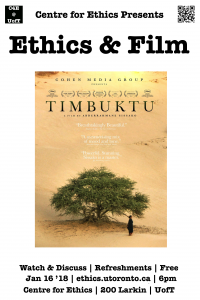
Centre for Ethics, University of Toronto
Rm 200, Larkin Building - Mon, Jan 15, 2018
Perspectives on Ethics, Understanding Ethics
Perspectives on Ethics: Joshua Knobe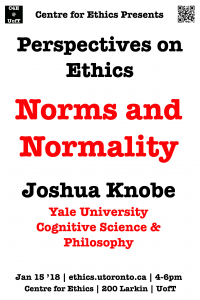 Norms and Normality
Norms and NormalityPeople ordinarily distinguish between ways of behaving that are “normal” and those that are “abnormal.” But how exactly is this distinction to be understood? This talk will discuss a series of experimental studies designed to explore people’s ordinary notion of normality. The key result is that people’s ordinary notion of normality is not a purely statistical one (e.g., the type of behavior that is most frequent) or a purely prescriptive one (e.g., the type of behavior that is ideal) but rather one that mixes together statistical and prescriptive considerations. I discuss implications of these findings for ethics and for research in cognitive science.
Joshua Knobe
04:00 PM - 06:00 PM
Yale University
Program in Cognitive Science &
Department of Philosophy
Room 200, Larkin Building
15 Devonshire Place - Thu, Dec 7, 2017
Ethics & the Arts
Music Amidst Violence: A Discussion Forum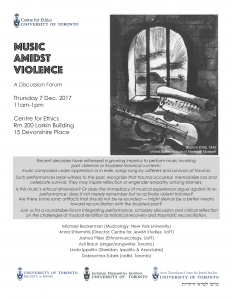
Recent decades have witnessed a growing impetus to perform music invoking past violence or troubled historical contexts: music composed under oppression or in exile, songs sung by sufferers and survivors of trauma. Such performances bear witness to the past, recognize that trauma occurred, memorialize loss and celebrate survival. They may inspire reflection or engender empathy among listeners.
Is this music’s ethical dimension? Or does the immediacy of musical experience argue against its re-performance: does it not merely remember but re-activate violent histories? Are there some sonic artifacts that should not be re-sounded –– might silence be a better means toward reconciliation with the troubled past?
Join us for a roundtable-forum integrating performance with scholarly discussion and critical reflection on the challenges of musical rendition as historical recovery and traumatic reconciliation.
Participants:
- Michael Beckerman (Musicology, New York University) is an eminent scholar of Central and Eastern European music of the 19C and 20C, Jewish music, music in contexts of war, and music in the concentration camps.
- Anna Shternshis (Director, Centre for Jewish Studies, University of Toronto) is an expert on Jewish culture in the Soviet Union.
- Joshua Pilzer (Ethnomusicology, University of Toronto) specializes in the relationships between music, survival, memory, and traumatic experience, with a focus on the anthropology of music in modern Korea and Japan.
- Adi Braun (singer-songwriter, Toronto) and Linda Ippolito (Sheridan, Ippolito & Associates, Toronto) have been researching the music and performers of the politically progressive Weimar-era cabaret for Braun’s new album Moderne Frau (2017).
- Dobrochna Zubek (cello, Toronto) is an award-winning Polish musician whose multifaceted international career encompasses solo, chamber, orchestral and interdisciplinary performance.
Hosted by:
11:00 AM - 01:00 PM


Centre for Ethics, University of Toronto
Rm 200, Larkin Building - Wed, Dec 6, 2017
Perspectives on Ethics, Critical Ethics
James Forman Jr., Locking Up Our Own: Crime and Punishment in Black America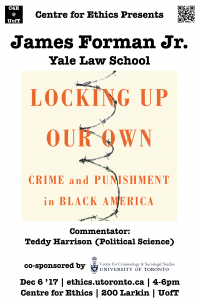 In recent years, Americas criminal justice system has become the subject of an increasingly urgent debate. Critics have assailed the rise of mass incarceration, emphasizing its disproportionate impact on people of color. As James Forman, Jr., points out, however, the war on crime that began in the 1970s was supported by many African American leaders in the nations urban centers. In Locking Up Our Own (Farrar, Straus, and Giroux, 2017), he seeks to understand why.
In recent years, Americas criminal justice system has become the subject of an increasingly urgent debate. Critics have assailed the rise of mass incarceration, emphasizing its disproportionate impact on people of color. As James Forman, Jr., points out, however, the war on crime that began in the 1970s was supported by many African American leaders in the nations urban centers. In Locking Up Our Own (Farrar, Straus, and Giroux, 2017), he seeks to understand why.New York Times Book Review Editors’ Choice/
Washington Post Best-SellerJames Forman Jr.
Professor of Law
Yale Law SchoolCommentator:
Teddy Harrison
Political Science & Centre for Ethics
University of Torontoco-sponsored by:

04:00 PM - 06:00 PM
Centre for Ethics, University of Toronto
Rm 200, Larkin Building - Tue, Dec 5, 2017
Science|Ethics|Tech, Ethics & Film: Lights, Camera, Ethics!, Ethics of AI in Context, Ethics of AI Film Series
Ethics of AI Film Series: 2001: A Space Odyssey
06:00 PM - 08:00 PM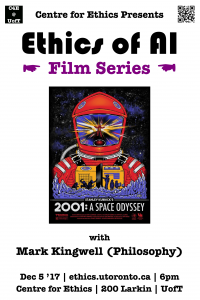
Centre for Ethics, University of Toronto
Rm 200, Larkin Building - Tue, Dec 5, 2017
Ethics & Film: Iron EatersUnfortunately, this event had to be cancelled. Another film event has been scheduled in its place: see here.
06:00 PM - 08:00 PM
Centre for Ethics, University of Toronto
Rm 200, Larkin Building - Tue, Dec 5, 2017
Ethics of AI in Context
Ethics of AI in Context: Molly Sauter, Algorithmic Ethics and PersonhoodAs “big data”-based predictive algorithms and generative models become commonplace tools of advertising, design, user research, and even political polling, are these modes of constructing machine-readable models of individuals displacing humans from our world? Are we allowing the messy, unpredictable, illegible aspects of being human to be overwritten by demands we remain legible to AI and machine learning systems intended to predict our actions, model our behavior, and sell us something? In this talk, technology scholar Molly Sauter looks at how currently deployed modeling systems constitute an attack on personhood and self determination, particularly in their use in politics and elections. Sauter posits that the use of “big data” in politics strips its targets of subjectivity, turning individuals into ready-to-read “data objects,” and making it easier for those in positions of power to justify aggressive manipulation and invasive inference. They further suggest that when big data methodology is used in the public sphere, it is reasonable for these “data objects” to, in turn, use tactics like obfuscation, up to the point of actively sabotaging the efficacy of the methodology in general, to resist attempts to be read, known, and manipulated.
[☛ eVideo]
Molly Sauter
04:00 PM - 06:00 PM
Communication Studies
McGill University
Centre for Ethics, University of Toronto
Rm 200, Larkin Building - Fri, Dec 1, 2017
Political Theory Research Workshop
Danny Hutton Ferris, Three Theories of Political Representation 03:00 PM - 04:30 PM
Centre for Ethics, University of Toronto
Rm 200, Larkin Building - Fri, Dec 1, 2017
C4E Flash Event, Science|Ethics|Tech, Undergraduate
Doxxing and Hacker Ethics
01:15 PM - 03:00 PM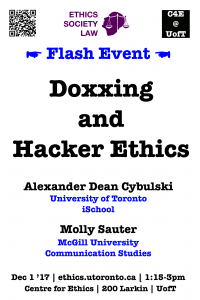
Centre for Ethics, University of Toronto
Rm 200, Larkin Building - Wed, Nov 22, 2017
Ethics at Noon
Ethics@Noon: Antje du Bois-Pedain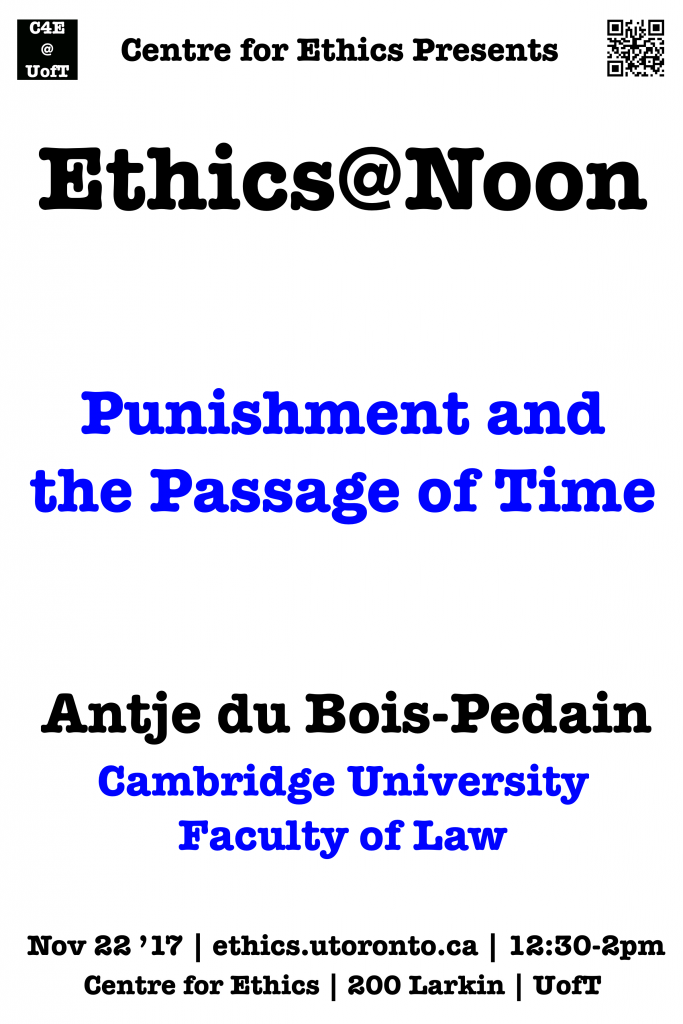
Punishment and the Passage of Time
Many (if not most) legal systems make the prosecution of crimes subject to certain time limits, calculated from the time of the commission of the offence. Such criminal statutes of limitation frequently create an absolute barrier to prosecution, even when the available evidence is good, the defence would not be unduly disadvantaged by the lapse of time, and the prosecution is not to be blamed for any delay. This presentation asks whether there are sound reasons to restrict the state’s ability to prosecute crimes through prescription. While my normative arguments are set in a context of a censuring conception of state punishment, I am concerned also to show how institutional concerns affect the legitimacy of prescription.
Antje du Bois-Pedain
11:30 AM - 02:00 PM
Senior Lecturer
Faculty of Law
Cambridge University
Centre for Ethics, University of Toronto
Rm 200, Larkin Building - Tue, Nov 21, 2017
Ethics & Film: Lights, Camera, Ethics!
Ethics & Film: The White Ribbon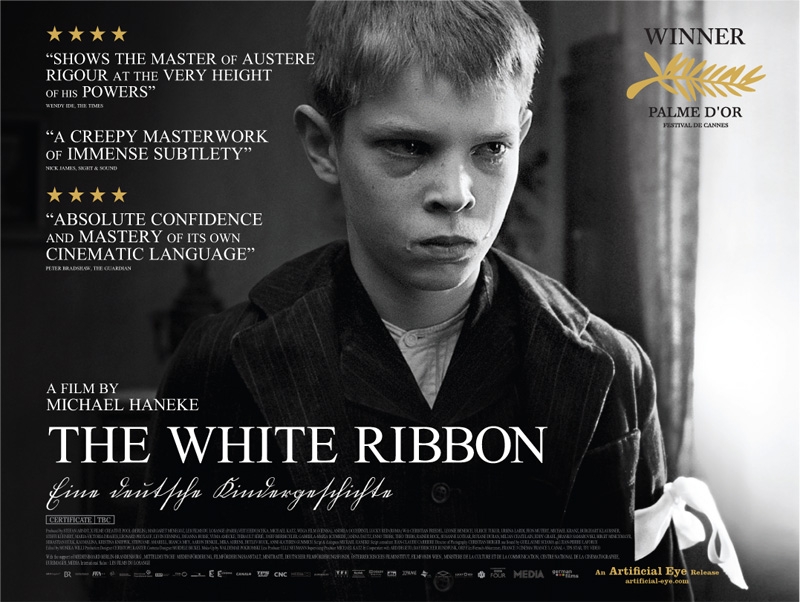
06:00 PM - 08:00 PM
Centre for Ethics, University of Toronto
Rm 200, Larkin Building - Mon, Nov 20, 2017
Critical Ethics
The Ethics of Food Food, and food choices, are complex. In what ways have ethical perspectives been brought to bear on various aspects of food production, consumption, and disposal? This panel will articulate social and cultural determinants of food systems, as well as explore and illuminate the origins of various moral questions about food.
Food, and food choices, are complex. In what ways have ethical perspectives been brought to bear on various aspects of food production, consumption, and disposal? This panel will articulate social and cultural determinants of food systems, as well as explore and illuminate the origins of various moral questions about food.Matthew Feinberg
Rotman School of ManagementStephen Scharper
School of the Environment & Department of AnthropologyTammara Soma
Food Systems Lab
02:00 PM - 04:00 PM
Centre for Ethics, University of Toronto
Rm 200, Larkin Building - Wed, Nov 15, 2017
Political Theory Research Workshop
Emily Nacol, The Politics of Contagion: Immunity and Community in Modern Plague Narratives 04:00 PM - 05:30 PM
Room 3130, Sidney Smith Building
100 St. George St. - Mon, Nov 13, 2017
Perspectives on Ethics
Perspectives on Ethics: Sophia Vasalou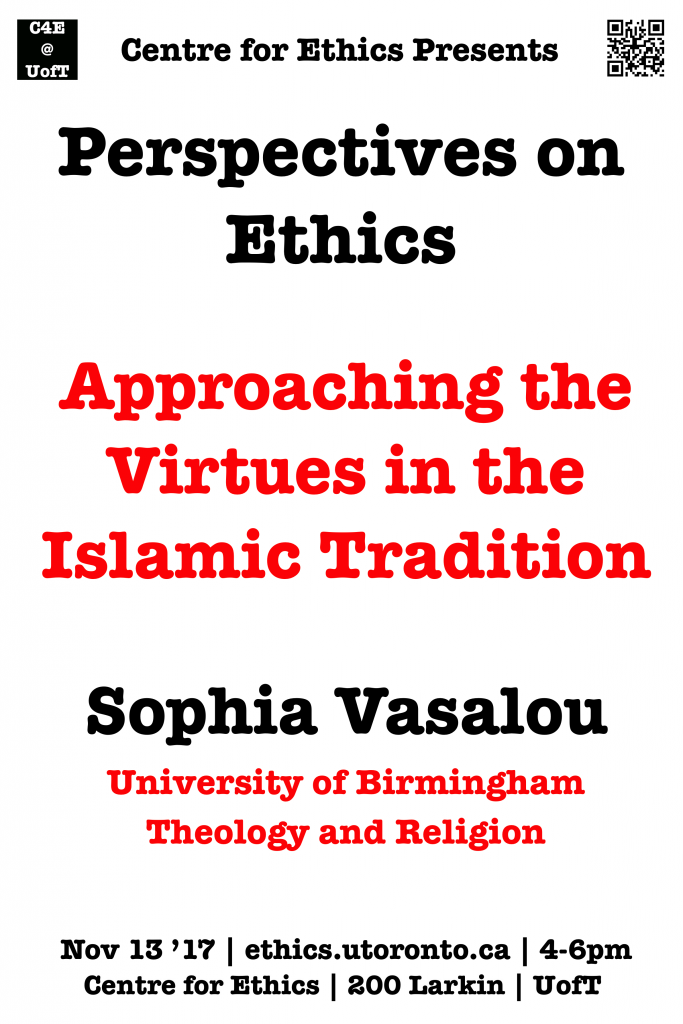 Approaching the Virtues in the Islamic Tradition
Approaching the Virtues in the Islamic TraditionOver the last few decades, there has been a dramatic surge of interest in moral character and the virtues among philosophers and psychologists. This has led to a fresh concern to explore the different ways in which the virtues have been approached historically, not only in philosophical but also in religious contexts. In this talk, my aim is to reflect on—and open a discussion of—the place of the virtues in the Islamic tradition. Within this tradition, there were several genres of ethical writing that we might identify as having hosted an engagement with the virtues. These include works of philosophical ethics, Sufi treatises, works of literature (adab), and mirrors for princes. Yet just how comfortably can we indeed identify the moral concepts that govern these works with the virtues, as these are often understood? How seriously do these works take what we would call character? Using the philosophical tradition as my foil—including the work of the well-known ethicist Abū ʿAlī Miskawayh—I will tackle these questions by focusing on the eminent 11th-century theologian Abū Ḥāmid al-Ghazālī. In the Revival of the Religious Sciences, al-Ghazālī drew on Sufi and philosophical ideas to articulate a vision of the ethical and spiritual life that pivoted on the realisation of certain kinds of valued internal states. In true eudaimonist style, these states are viewed as playing an indispensable role in the achievement of happiness. Yet is al-Ghazālī talking about the virtues? Just how robust is the concept of character at work in his thinking? And what does this have to tell us about the prospects of locating the virtues within the Islamic tradition more broadly?
Sophia Vasalou04:00 PM - 05:00 PM
Library of Arabic Literature Fellow
Department of Theology and Religion
University of Birmingham
Centre for Ethics, University of Toronto
Rm 200, Larkin Building - Tue, Nov 7, 2017
Ethics & Film: Lights, Camera, Ethics!
Ethics & Film: Roger & Me
06:00 PM - 08:00 PM
Centre for Ethics, University of Toronto
Rm 200, Larkin Building - Tue, Nov 7, 2017
Ethics of AI in Context
Ethics of AI in Context: Hector Levesque, Rethinking the Place of Thinking in Intelligent Behaviour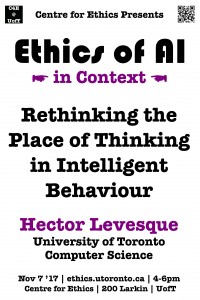 It seems clear that in people, ordinary commonsense thinking is an essential
It seems clear that in people, ordinary commonsense thinking is an essential
part of acting intelligently. Yet the most popular current approach to
Artificial Intelligence downplays this thinking aspect and emphasizes learning
from massive amounts of data instead. This talk goes over these notions and
attempts to make the case that computers systems based even on extensive
learning alone might have serious dangers that are not immediately obvious.[☛ eVideo]
Hector Levesque
04:00 PM - 06:00 PM
Computer Science
University of Toronto
Centre for Ethics, University of Toronto
Rm 200, Larkin Building - Mon, Nov 6, 2017
Perspectives on Ethics
Perspectives on Ethics: Valsamis Mitsilegas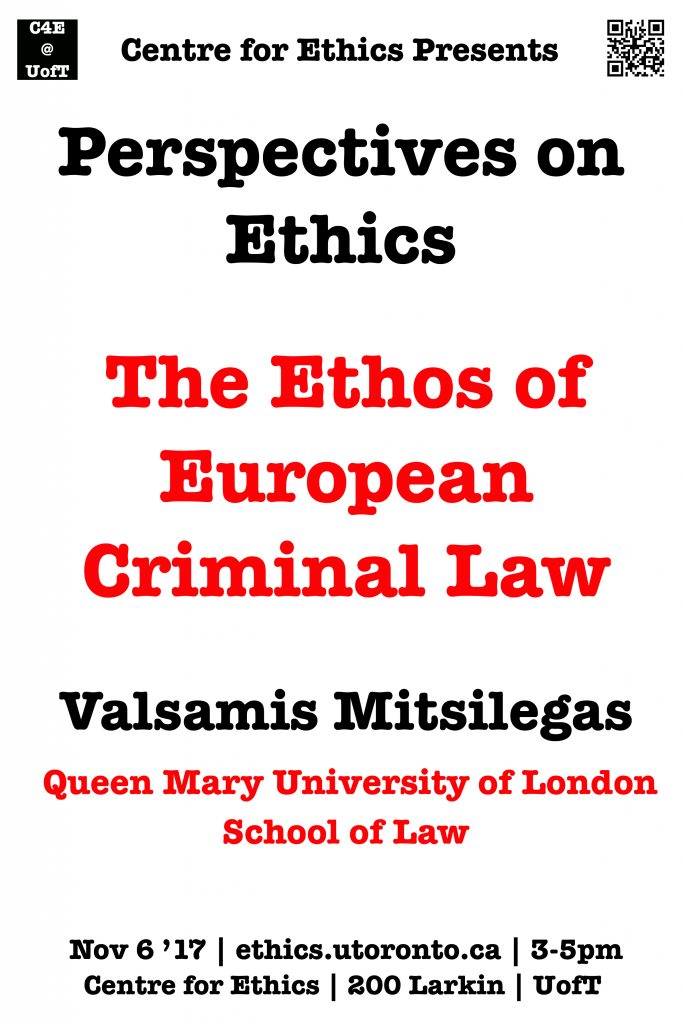 The Ethos of European Criminal Law
The Ethos of European Criminal LawThe development of EU powers in the field of criminal law has been, and remains to date, a contested enterprise from the perspective of both state sovereignty and the protection of fundamental rights. In looking at the Ethos of European Criminal Law, the presentation will cast light on the main challenges underpinning the evolution of European Criminal Law by examining closely four fundamental questions: the ‘why’ question (why has supranational integration in the field evolved and what are the main legal interests upheld by Europeanisation); the ‘how’ question (how has Europeanisation occurred and what are the forms of governance in European criminal law); the ‘what’ question (what is the content of European criminal law); and the ‘for whom’ question (who is European Criminal Law entitled to address and/or protect). Answers to these questions will lead to an analysis of the Ethos of European Criminal Law placed within the broader EU and domestic constitutional context.
Valsamis Mitsilegas
Queen Mary University of London
Professor of European Criminal Law, Head of the Department of Law and Dean for Research (Humanities and Social Sciences)
03:00 PM - 05:00 PM
Centre for Ethics, University of Toronto
Rm 200, Larkin Building - Fri, Nov 3, 2017
Political Theory Research Workshop
Simon Lambek, Theorizing Rhetorical Democracy: World-Building and Critique 03:00 PM - 04:30 PM
Centre for Ethics, University of Toronto
Rm 200, Larkin Building - Wed, Nov 1, 2017
Ethics at Noon
Ethics@Noon: Amber Riaz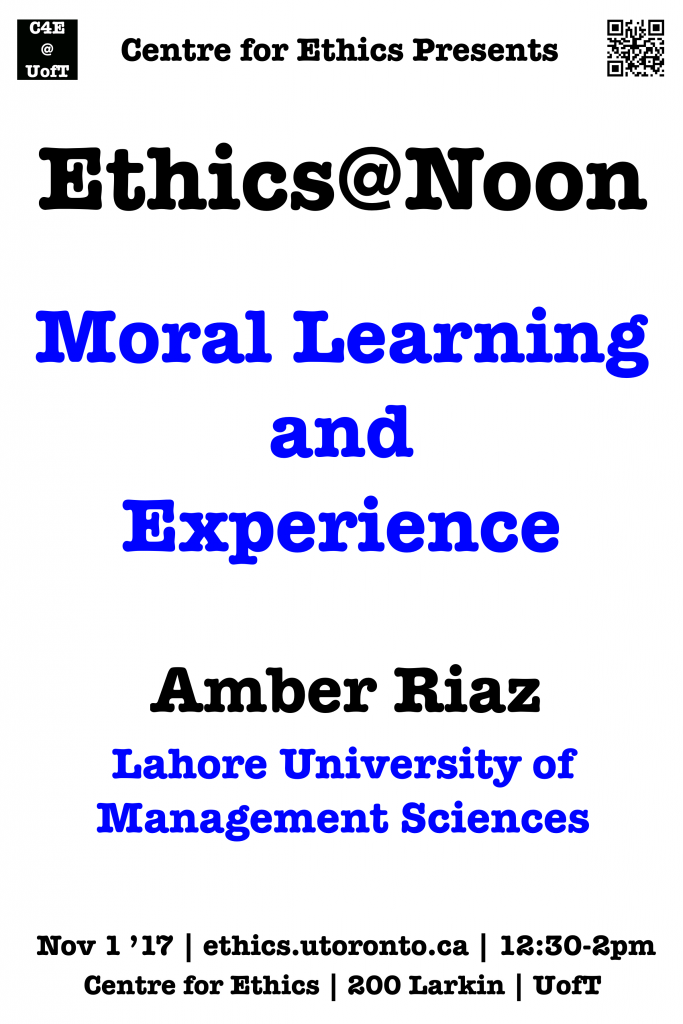
Moral Learning and Experience
Many philosophers think that although experience sometimes plays a crucial role in putting one in a position to attain moral knowledge, moral knowledge is not empirical knowledge. In a recent paper defending this Orthodox View (“Moral Knowledge and Experience”), Sarah McGrath argues that at best experience can play an enabling, triggering and sensitizing role in the acquisition of moral knowledge, but that it neither gives moral knowledge, nor provides evidence for it. In this talk, I will consider and reject some arguments for the Orthodox View. In addition, I will provide an alternative account according to which there is at least some moral learning by experience, and experience provides an important evidential role in the acquisition of moral knowledge.
Amber Riaz
12:30 PM - 02:00 PM
Assistant Professor
Department of Humanities & Social Sciences
LUMS (Lahore University of Management Sciences)
Centre for Ethics, University of Toronto
Rm 200, Larkin Building - Fri, Oct 27, 2017
Conferences
Conference: Judgement, Relationality, Care: A Celebration of the Work of Jennifer Nedelsky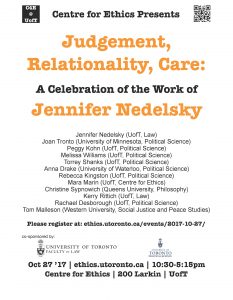
This is a symposium devoted to a discussion of the work of Jennifer Nedelsky. It will begin with introductory reflections on Jenny’s first book devoted to the theme of property and American Constitutionalism and then proceed with three panels each devoted to an important theme of Jenny’s subsequent work: political judgement, law’s relations and work-care relations.Schedule:
10:45-11:00
Coffee and iIntroductory Remarks by Peggy Kohn (University of Toronto)11:00-11:15
Jennifer Nedelsky (University of Toronto): Reflections on My Work So Far11:15-12:00
Joan Tronto (University of Minnesota): A Retrospective on Nedelsky’s Work12:00-12:20
Discussion on Nedelsky and Tronto12:20-1:15
Lunch1:15-2:30 Political Judgement
Melissa Williams (University of Toronto), Torrey Shanks (University of Toronto), Anna Drake (University of Waterloo)2:30-3:45 Law’s Relations
Rebecca Kingston (University of Toronto), Mara Marin (University of Toronto Centre for Ethics), Christine Sypnowich (Queen’s University)3:45-4:00
Coffee4:00-5:15 Work-Care Relations
Tom Malleson (University of Western Ontario), Kerry Rittich (University of Toronto), Rachael Desborough (University of Toronto)co-sponsored by:


10:30 AM - 05:15 PM
Centre for Ethics, University of Toronto
Rm 200, Larkin Building - Thu, Oct 26, 2017
Author Meets Critics
Author Meets Critics: Alan BrudnerThe Owl and the Rooster: Hegel’s Transformative Political Science (Cambridge 2017)
Alan Brudner
Albert Abel Professor of Law Emeritus
University of Toronto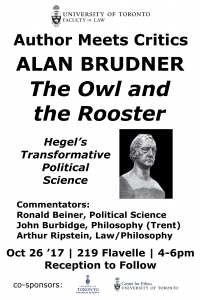
Since 1945, there have been two waves of Anglo-American writing on Hegel’s political thought. The first defended it against works portraying Hegel as an apologist of Prussian reaction and a theorist of totalitarian nationalism. The second presented Hegel as a civic humanist critic of liberalism in the tradition of Rousseau. The first suppressed elements of Hegel’s thought that challenge liberalism’s individualistic premises; the second downplayed Hegel’s theism. This book recovers what was lost in each wave. It restores aspects of Hegel’s political thought unsettling to liberal beliefs, yet that lead to a state more liberal than Locke’s and Kant’s, which retain authoritarian elements. It also scrutinizes Hegel’s claim to have justified theism to rational insight, hence to have made it conformable to Enlightenment standards of admissible public discourse. And it seeks to show how, for Hegel, the wholeness unique to divinity is realizable among humans without concession or compromise and what role philosophy must play in its final achievement. Lastly, we are shown what form Hegel’s philosophy can take in a world not yet prepared for his science. Here is Hegel’s political thought undistorted.
hosted by:

co-sponsored by:

04:00 PM - 06:00 PM
Faculty of Law, Conference Centre
78 Queen's Park - Thu, Oct 26, 2017
Ethics at Noon, Professing Ethics
Ethics@Noon: Sunit Das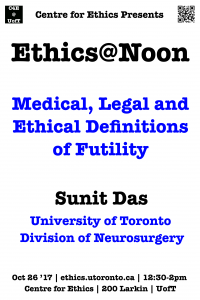 Medical, Legal and Ethical Definitions of Futility
Medical, Legal and Ethical Definitions of FutilityWhat is medical futility? How do we define it? How does uncertainty about the meaning of what is futile direct us in the practical work of patient care? And how do we reconcile these questions with legal understandings of medical futility?
In this seminar, we will attempt to address these concerns through an exploration of both conceptual and practical issues of the ethics of medical futility.
Dr. Sunit Das
12:30 PM - 02:00 PM
Division of Neurosurgery
University of Toronto
Centre for Ethics, University of Toronto
Rm 200, Larkin Building - Tue, Oct 24, 2017
Ethics of AI in Context
Ethics of AI: Brian Cantwell Smith, Reckoning and Judgment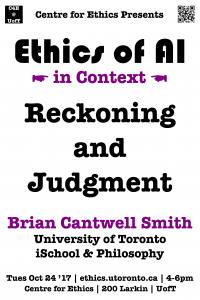 All we are likely to build, based on anything we currently understand, are systems that reckon. Ethical deliberation, as opposed to ethical consequence, requires full scale judgment, which goes quite a bit beyond such reckoning powers.
All we are likely to build, based on anything we currently understand, are systems that reckon. Ethical deliberation, as opposed to ethical consequence, requires full scale judgment, which goes quite a bit beyond such reckoning powers.[☛ eVideo]
Brian Cantwell Smith
iSchool & Philosophy
University of Toronto
04:00 PM - 06:00 PM
Centre for Ethics, University of Toronto
Rm 200, Larkin Building - Mon, Oct 23, 2017
Perspectives on Ethics
Perspectives on Ethics: George Pavlakos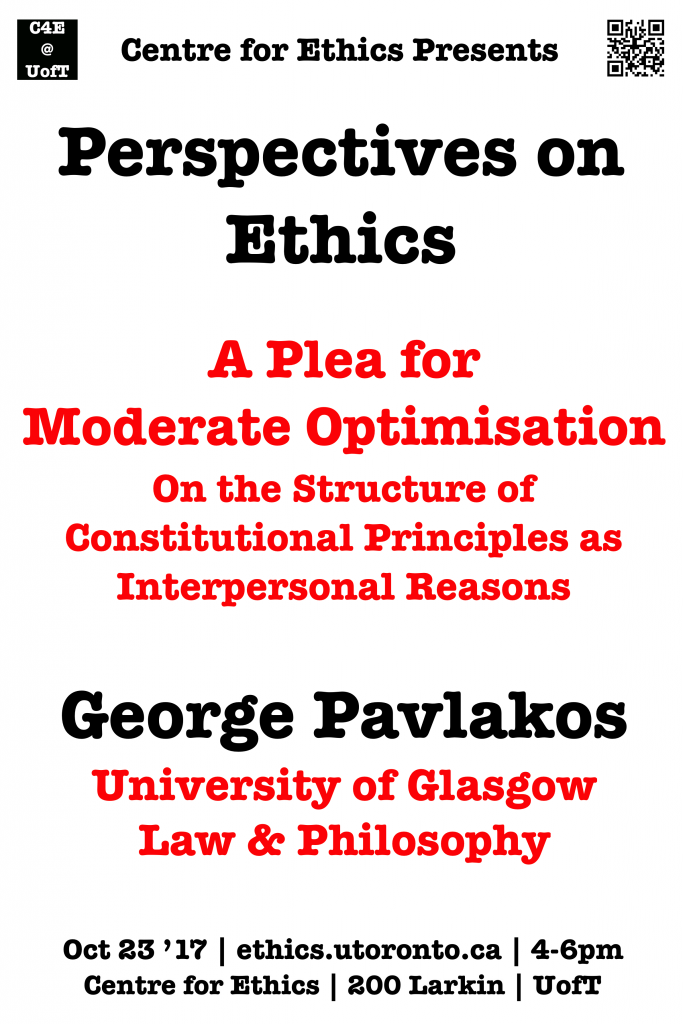 A Plea for Moderate Optimisation: On the Structure of Constitutional Principles as Interpersonal Reasons
A Plea for Moderate Optimisation: On the Structure of Constitutional Principles as Interpersonal ReasonsIn this talk I will make a modest effort to overcome the dichotomy between a teleological and deontological understanding of constitutional rights, which I argue underpins the debate on the principle of proportionality in constitutional law. In an opening part I will introduce a standard account of constitutional principles as optimization requirements, which has come to be known as Theory of Principles [Prinzipientheorie], and then draw a distinction between a demanding and a moderate conception of optimisation. I will suggest that while the demanding conception is incompatible with the deontological character of rights, it is also one that does not find strong support in the standard account. Conversely the standard account lends support to a moderate conception of optimisation, which may be rendered compatible with the deontological character of constitutional rights. Whether it can be thus rendered, depends on the possibility of reconciling deontological with other impersonal (teleological) reasons, which I set out to explore in the third part of the talk. There I discuss the familiar distinction between agent-neutral and agent-relative reasons with an eye to demonstrating that no sharp separation can be maintained between these two conceptions of reasons, at least not in the Kantian framework within which the standard account of Theory of Principles operates.
In concluding, I will suggest out that a relaxation of the tension between agent-neutral and agent-relative reasons can contribute to a better understanding of the claim that legal principles aim at optimisation. A notable consequence is that proportionality control is better understood in terms of determination of abstract normative reasons (principles) than in terms of balancing between disparate or conflicting standards.
George Pavlakos
04:00 PM - 06:00 PM
School of Law
University of Glasgow
Room 200, Larkin Building
15 Devonshire Place - Fri, Oct 20, 2017
Public Lectures
Nick Smith, Apologies as Remedies/Apologies as WeaponsApologies as Remedies/Apologies as Weapons
A C4E Public Lecture by
Nick Smith
Professor of Philosophy & Department Chair
University of New Hampshire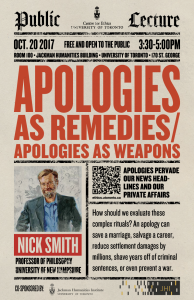 Apologies pervade our news headlines and our private affairs, but how should we evaluate these complex rituals? An apology can save a marriage, salvage a career, reduce settlement damages by millions, shave years off of criminal sentences, or even prevent a war. Whether from a child nudged to apologize to a sibling or an offender expressing remorse in hopes of avoiding execution, expressions of contrition can convey meaning across many different kinds of value and we suffer from considerable confusion about the moral meanings and social functions of these interactions.
Apologies pervade our news headlines and our private affairs, but how should we evaluate these complex rituals? An apology can save a marriage, salvage a career, reduce settlement damages by millions, shave years off of criminal sentences, or even prevent a war. Whether from a child nudged to apologize to a sibling or an offender expressing remorse in hopes of avoiding execution, expressions of contrition can convey meaning across many different kinds of value and we suffer from considerable confusion about the moral meanings and social functions of these interactions.Beyond apologies from individuals, collective apologies add layers of intricacy and policy implications. If an executive publicly apologizes for a faulty product while corporate counsel simultaneously denies wrongdoing and obscures personal responsibility of anyone in the organization, how does this correspond to common expectations that accepting blame and changing behavior are cornerstones of good apologies? If a head of state draws attention to and apologizes for the offenses of a previous administration and provides only symbolic redress, how should we understand the value of such political theater?
co-sponsor:
03:30 PM - 05:00 PM

Room 100, Jackman Humanities Building
170 St. George St. - Fri, Oct 20, 2017
Political Theory Research Workshop
Daniel Sherwin, Comparative Political Theory in Canada: Engaging Indigenous Resurgence 03:00 PM - 04:30 PM
Room 3130, Sidney Smith Building
100 St. George St. - Fri, Oct 20, 2017
Conferences
Conference: The Ethics of Apology: Interdisciplinary & International Perspectives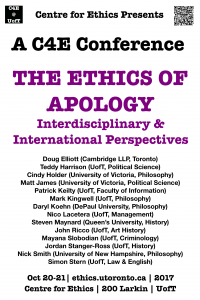 Today, apologies seem to be everywhere. Individuals apologize, offenders, doctors, lawyers, as do corporations, organizations, universities, police departments, cities, countries, and governments. We crave apologies, we seek and demand them, insisting that we “deserve” them. And sometimes, but not always, we “get” an apology, or at least we get a promise to get one later.
Today, apologies seem to be everywhere. Individuals apologize, offenders, doctors, lawyers, as do corporations, organizations, universities, police departments, cities, countries, and governments. We crave apologies, we seek and demand them, insisting that we “deserve” them. And sometimes, but not always, we “get” an apology, or at least we get a promise to get one later.Apologies may be ubiquitous, and yet they remain little understood. This workshop will consider questions such as: Why do we seek apologies? And why do we give them? How do they work (if they work)? What do apologies do? What do they mean, in different contexts, at different times, to different people? What makes a good apology, an effective one, a sincere or genuine or heartfelt one? What distinguishes apologies from apparent social, legal, rhetorical, or communicative alternatives like expressions of regret or sympathy and acknowledgments of fault, of responsibility, or of guilt? In general, is there an ethics of apology, a set of substantive and procedural norms that govern their performance, interpretation, and implementation in various cultural and historical settings?
On the occasion of Canada’s 150th birthday, the proposed workshop sets out to explore the modern—or perhaps not-so-modern—phenomenon of the apology and its place in the ethos of contemporary Canadian society and politics. We will focus on certain apologetic moments in Canadian political life, placing them in a broad interdisciplinary and comparative context; these include, for instance, the various apologies offered for state wrongs committed against indigenous people over the past 150 years of Canadian history and, most recently, the demand that the federal government issue an official apology for “state sponsored discrimination against Canada’s LGBTQ2SI communities” (EGALE 2016), in contrast to remedies for unjust government actions offered elsewhere (expungement or pardon of convictions in the UK and Australia, compensation in Germany). It is one thing to regard an official apology as an acceptable symbolic alternative to an elusive concrete and enforceable legal remedy. Under what circumstances might an apology be regarded not as merely acceptable, but as preferable?
To shed light on the ubiquitous yet still mysterious, and mysteriously powerful, phenomenon of the apology through open debate across modes and subjects of inquiry, this workshop brings together an interdisciplinary and international group of scholars, students, and activists at the Centre for Ethics, the University of Toronto’s interdisciplinary centre aimed at advancing research and teaching in the field of ethics, broadly defined. The results of this exercise in communal critical analysis will be widely shared beyond the walls of the university through dissemination on the Centre’s online open-access journal and YouTube channel, with the aim of stimulating and facilitating public debate about the role and continued salience of apologies in contemporary social, political, and ethical discourse, in Canada and beyond.
Participants:
Doug Elliott (Cambridge LLP, Toronto), “So Sorry: The Legal Myths and Social Realities of the Official Apology”
Teddy Harrison (University of Toronto, Political Science), “Apologies and Violence in Criminal Justice”
Cindy Holder (University of Victoria, Philosophy), “Whose Wrong Is It Anyway? Reflecting on the Public-ness of Public Apologies”
Matt James & Jordan Stanger-Ross (University of Victoria, Political Science & History), “Impermanent Apologies: On the Dynamics of Timing and Public Knowledge in Political Apology”
Patrick Keilty (University of Toronto, Faculty of Information), “Sorry/Not Sorry: Sexual Regulation and Apology at the Toronto Police Service”
Mark Kingwell (University of Toronto, Philosophy), “Apologies: A Stylistic Investigation”
Daryl Koehn (DePaul University, Philosophy), “The Business Ethics of CEO Apologies”
Nico Lacetera (University of Toronto, Management), “Corporate Apologies and the Ethics of Trust”
Steven Maynard (Queen’s University, History), “Sorry Seems to be the Easiest Word: The Gay Pardon in Canada and the ‘Rehabilitation’ of Queer History”
John Ricco (University of Toronto, Art History), “On Queer Forgiveness”
Mayana Slobodian (University of Toronto, Centre for Criminology & Sociolegal Studies), “Finding Canada’s Official Apology at the Truth & Reconciliation Commission”
Nick Smith (University of New Hampshire, Philosophy), “Apologies as Remedies/Apologies as Weapons” (Keynote: Please register separately here.)
Simon Stern (University of Toronto, Law & English), “Atonement, Closure, and Narrative”Schedule (subject to change):
☛ Friday 20 October, 2017
8:45 a.m. Welcome
9:00 a.m. – 11:00 a.m. Doug Elliott, Patrick Keilty, John Ricco, Steven Maynard
11:15 a.m. – 12:30 p.m. Matt James & Jordan Stanger-Ross, Mayana Slobodian
1:30 p.m. – 3:00 p.m. Cindy Holder, Mark Kingwell, Simon Stern
3:30 p.m. – 5:00 p.m. Nick Smith (Keynote Lecture) (Rm 100, Jackman Humanities Building; separate registration)
☛ Saturday 21 October, 2017
9:15 a.m. – 11:15 a.m. Nick Smith, Teddy Harrison, Daryl Koehn, Nico Lacetera
09:00 AM - 05:00 PM
Centre for Ethics, University of Toronto
Rm 200, Larkin Building - Thu, Oct 19, 2017
Events on Campus
Radical Black Political Thought in the 20th and 21st Centuries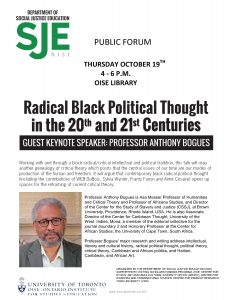 Working with and through a black radical/critical intellectual and political tradition, this talk–hosted by the Department of Social Justice Education, Ontario Institute for Studies in Education–will map another genealogy of critical theory which posits that the central issues of our time are our modes of production of the human and freedom. It will argue that contemporary black radical political thought (including the contributions of WEB DuBois, Sylvia Wynter, Frantz Fanon and Aimé Césaire) opens up spaces for the reframing of current critical theory.
Working with and through a black radical/critical intellectual and political tradition, this talk–hosted by the Department of Social Justice Education, Ontario Institute for Studies in Education–will map another genealogy of critical theory which posits that the central issues of our time are our modes of production of the human and freedom. It will argue that contemporary black radical political thought (including the contributions of WEB DuBois, Sylvia Wynter, Frantz Fanon and Aimé Césaire) opens up spaces for the reframing of current critical theory.Speaker:
04:00 PM - 06:00 PM
Professor Anthony Bogues, Asa Messer Professor of Humanities and Critical Theory, Professor of Africana Studies & Director of the Center for the Study of Slavery and Justice (CSSJ), Brown University
Ontario Institute for Studies in Education
252 Bloor Street West - Wed, Oct 18, 2017
Ethics at Noon
Ethics@Noon: Lucia Zedner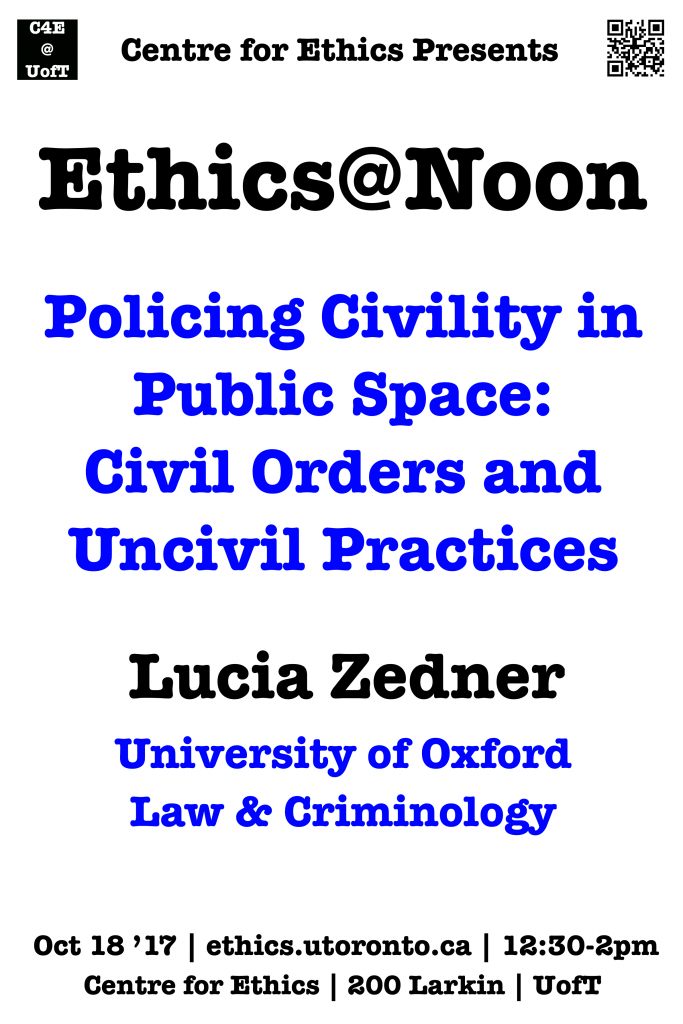 Policing Civility in Public Space: Civil Orders and Uncivil Practices
Policing Civility in Public Space: Civil Orders and Uncivil PracticesPublic policing is increasingly sidelined by the rise of publicly owned private spaces, private security and the proliferation of alternate civil and regulatory measures. This paper examines a raft of civil measures introduced in the UK to police those whose presence is deemed inimical to a contrived idea of public civility. One particularly egregious example are Public Spaces Protection Orders, which allow officials to impose infinite restrictions and exclusions upon those whose conduct has, or might in future have, a ‘detrimental effect on the quality of life of those in the locality’. The paper considers their implications for justice, for those ‘uncivil’ citizens subjected to their prohibitions, and for participation in public life. It suggests that such disciplinary measures erode the very safeguards by which citizens are – or should be – protected against the unwarranted exercise of state coercive power. Targeting the poor, the homeless, the young, and marginalized, orders that seek to manufacture the appearance of civility arguably do little more than cosmetically conceal the underlying injustices of modern urban life.
Lucia Zedner
12:30 PM - 02:00 PM
Faculty of Law & All Souls College
Oxford University
Centre for Ethics, University of Toronto
Rm 200, Larkin Building - Tue, Oct 17, 2017
Ethics & Film: Lights, Camera, Ethics!
Ethics & Film: Tangerine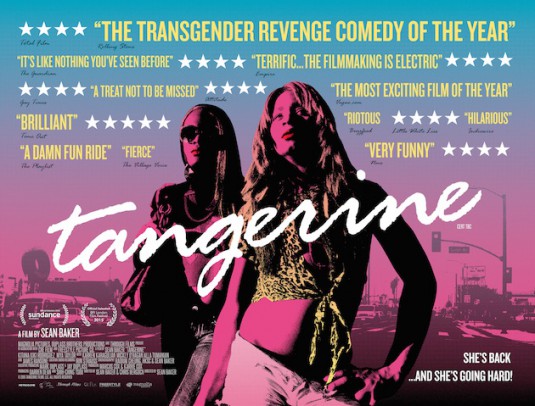
06:00 PM - 08:00 PM
Centre for Ethics, University of Toronto
Rm 200, Larkin Building - Tue, Oct 17, 2017
Professing Ethics, Ethics of AI in Context
Ethics of AI: Sunit Das, AI in Medicine: Hopes? Nightmares?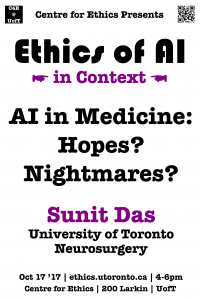 Artificial intelligence promises to change the practice of medicine, from identifying early radiographic signs of stroke to determining the most appropriate second line chemotherapeutic agent for a patient with cancer. But many of the questions around AI involving transparency, judgment, and responsibility are at the very core of the compact that grounds the place of medicine and the identity of persons in our society. In this seminar, we will explore some of the promise offered by AI to the practice of medicine, while considering the profound ethical questions raised by that promise.
Artificial intelligence promises to change the practice of medicine, from identifying early radiographic signs of stroke to determining the most appropriate second line chemotherapeutic agent for a patient with cancer. But many of the questions around AI involving transparency, judgment, and responsibility are at the very core of the compact that grounds the place of medicine and the identity of persons in our society. In this seminar, we will explore some of the promise offered by AI to the practice of medicine, while considering the profound ethical questions raised by that promise.[☛ eVideo]
Dr. Sunit Das
04:00 PM - 06:00 PM
Division of Neurosurgery
University of Toronto
Centre for Ethics, University of Toronto
Rm 200, Larkin Building - Wed, Oct 11, 2017
Ethics at Noon
Ethics@Noon: François du Bois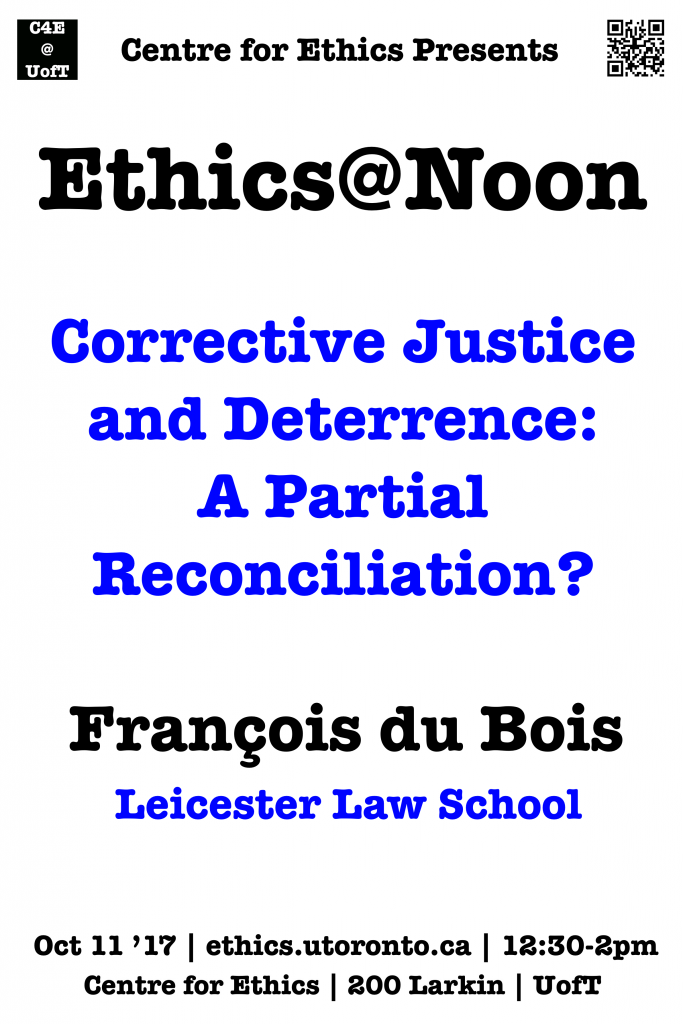 Corrective Justice and Deterrence: A Partial Reconciliation?
Corrective Justice and Deterrence: A Partial Reconciliation?This talk will subject the two dominant theoretical accounts of private law to a critical assessment proceeding from the fundamental commitment of a liberal legal order to treating persons as ethically reasoning agents. The conclusions reached will then be used to explain why private law in many jurisdictions (not least Canada) fails to conform fully to the ideals articulated by either account but exhibits features of both corrective justice and deterrence.
François du Bois
12:30 PM - 02:00 PM
Professor
Leicester Law School
Centre for Ethics, University of Toronto
Rm 200, Larkin Building - Tue, Oct 3, 2017
Ethics & Film: Lights, Camera, Ethics!
Ethics & Film: Weiner
06:00 PM - 08:00 PM
Centre for Ethics, University of Toronto
Rm 200, Larkin Building - Fri, Sep 29, 2017
Public Lectures
Sheila Jasanoff, Ethical Futures: Imagination and Governance in an Unequal WorldEthical Futures: Imagination and Governance in an Unequal World
A C4E Public Lecture by
Sheila Jasanoff
Pforzheimer Professor of Science and Technology Studies
Director, Program on Science, Technology and Society
Harvard Kennedy School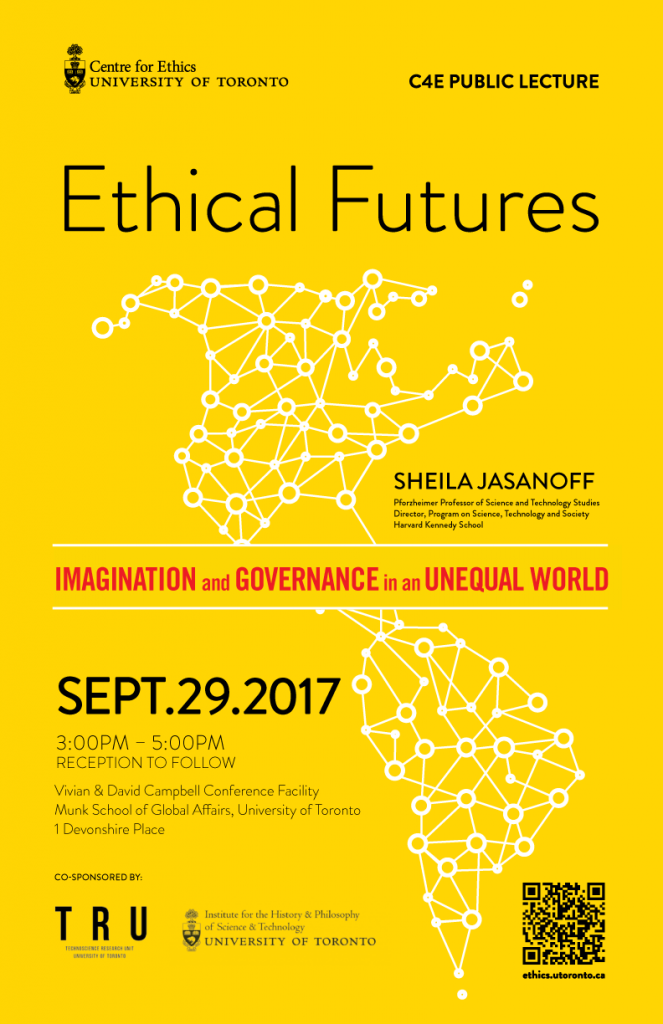 Can we responsibly design a future that does not connect to its pasts? Can we govern a future that we cannot imagine? As technology becomes the most powerful instrument for shaping the human future, these questions have assumed greater importance for moral engagement and analysis. Using examples such as nuclear risk, assisted reproduction, and agricultural biotechnology, I will show that choices of how to live with technology are shaped and constrained by prior, institutionalized visions of the public good. New and emerging technologies, reflecting longstanding socioeconomic disparities among human societies, threaten to override such cross-cultural variations in moral imagination and associated norms of democratic self-governance. How should global societies respond to that challenge? Contemporary debates around gene editing, especially of the human germline, offer an opportunity for further reflection on this point.
Can we responsibly design a future that does not connect to its pasts? Can we govern a future that we cannot imagine? As technology becomes the most powerful instrument for shaping the human future, these questions have assumed greater importance for moral engagement and analysis. Using examples such as nuclear risk, assisted reproduction, and agricultural biotechnology, I will show that choices of how to live with technology are shaped and constrained by prior, institutionalized visions of the public good. New and emerging technologies, reflecting longstanding socioeconomic disparities among human societies, threaten to override such cross-cultural variations in moral imagination and associated norms of democratic self-governance. How should global societies respond to that challenge? Contemporary debates around gene editing, especially of the human germline, offer an opportunity for further reflection on this point.
03:00 PM - 05:00 PM
Vivian and David Campbell Conference Facility
1 Devonshire Place - Fri, Sep 29, 2017
Master Class: Sheila Jasanoff, Post-Modern Democracy: Truth and Trust in the Public SpherePost-Modern Democracy: Truth and Trust in the Public Sphere
Even before Donald Trump was elected president of the United States in 2016, political commentators began expressing concerns about the decay of truthfulness in the public sphere. How, they asked, could any form of political legitimacy be maintained in a world where there were no agreed upon facts. Among the responses to this dilemma, one that has found widespread favor among liberals and progressives is that scientific consensus must be respected and held apart from politics. In a democracy, so the truism goes, people are entitled to their own opinions but not to their own facts. This analysis, however, is flawed. It is both ahistorical and asymmetrical in relegating public facts to a position outside of politics and society, a move that denies the contingent, constructed, and culturally situated character of truth in the public sphere. This presentation will propose an alternative view based on findings from Science and Technology Studies. The common misconception that recognizing the contingency of facts is equivalent to radical relativism will be discussed and set aside.
Please note: This Master Class is open to graduate students at the University of Toronto. If you’re interested in attending, please contact ethics@utoronto.ca. Space is limited and registration is required.
Sheila Jasanoff
12:30 PM - 02:00 PM
Pforzheimer Professor of Science and Technology Studies
Director, Program on Science, Technology and Society
Harvard Kennedy School
Centre for Ethics, University of Toronto
Rm 200, Larkin Building - Wed, Sep 27, 2017
Ethics at Noon, Ethics & the Arts
Ethics@Noon: Eva-Lynn Jagoe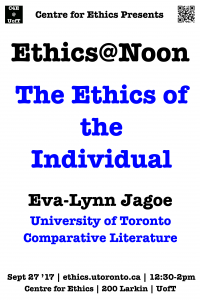 The Ethics of the Individual
The Ethics of the Individual[☛ eVideo]
This discussion will revolve around the disjuncture between the ethical stance of the individual and the structures of late capitalism. What beliefs and stories do we tell ourselves about our own personal decisions and our responsibilities in the face of the challenges that our society faces as we move into an uncertain future?
Eva-Lynn Jagoe
12:30 PM - 02:00 PM
Professor of Comparative Literature & Spanish and Portuguese
University of Toronto
Centre for Ethics, University of Toronto
Rm 200, Larkin Building - Mon, Sep 25, 2017
Ethics of AI in Context
Ethics of AI: Mark Kingwell, Respect and the Artificial Other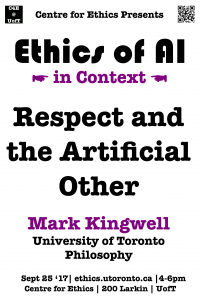 What role do personhood, respect, tolerance, and sympathy play in our relations to future AI developments? Do other concepts familiar from political-theoretic likewise apply, and if so, how? In this talk I will sketch some ideas for how to think productively about human-AI relations as their complexity advances in both the short- and long-term.
What role do personhood, respect, tolerance, and sympathy play in our relations to future AI developments? Do other concepts familiar from political-theoretic likewise apply, and if so, how? In this talk I will sketch some ideas for how to think productively about human-AI relations as their complexity advances in both the short- and long-term.[☛ eVideo]
Mark Kingwell
Department of Philosophy
University of Toronto
04:00 PM - 06:00 PM
Centre for Ethics, University of Toronto
Rm 200, Larkin Building - Fri, Sep 22, 2017
Conferences
Conference: The Limits and Legitimacy of Referenda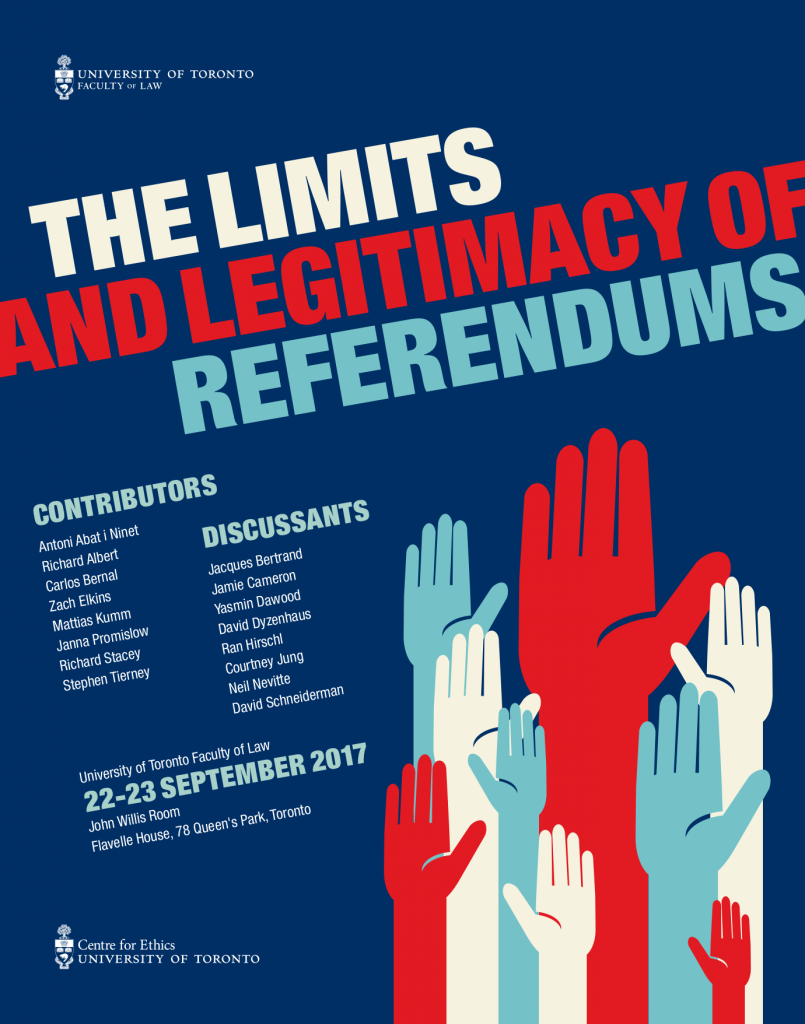 The Limits and Legitimacy of Referenda
The Limits and Legitimacy of ReferendaWriting shortly after the Brexit vote, Kenneth Rogoff decried the use of referenda in modern constitutional democracy: “This isn’t democracy; it is Russian roulette for republics.” Beyond Brexit, many recent majoritarian decisions have concerned matters of real constitutional importance, in Colombia, Hungary, Italy, Crimea, Turkey and Thailand, for example. Referenda are sometimes exalted as the closest we can come to the exercise of popular sovereignty, but few of the world’s most influential constitutions have been ratified by a referendum. On the other hand, some of the referenda we have witnessed recently have not sought to change the formal or written constitution, but nevertheless engage questions of fundamental constitutional significance and national identity. A number of questions follow for scholars and students of public law:
- Has the referendum emerged as a mechanism for effecting change to the fundamental structure of a political community without amending the constitution?
- What is it about the referendum that explains why some notable constitution-making processes and the constitutional amendment procedures of influential constitutions avoid it, while change-makers at this sub-constitutional level embrace it?
- Do referenda raise different questions in constitution-making versus constitution-changing or fundamental political change?
- Under which conditions should referenda be used in making and changing constitutions?
- Are referenda most appropriate for largely homogenous jurisdictions, and to be avoided in heterogeneous ones; or does the promise of referenda lie in their capacity to bridge and indeed to transcend differences, be they ethnic, ideological, geographic or otherwise?
This symposium seeks answers to these and related questions, bringing scholars from around the world to Toronto for two days of discussion, with proceedings to be published in a special issue of the University of Toronto Law Journal. Scholars presenting papers for discussion at the symposium include:
- Antoni Abat Ninet, Law (Copenhagen)
- Richard Albert, Law (BC/Texas)
- Carlos Bernal, Law and Philosophy (Constitutional Court of Colombia)
- Zachary Elkins, Political Science (Texas)
- Mattias Kumm, Law (NYU and Humboldt)
- Janna Promislow, Law (Thompson Rivers)
- Richard Stacey, Law (Toronto)
- Stephen Tierney, Law (Edinburgh)
Discussants include:
- Jacques Bertrand (Toronto)
- Jamie Cameron (Osgoode)
- Yasmin Dawood (Toronto)
- David Dyzenhaus (Toronto)
- Ran Hirschl (Toronto)
- Courtney Jung (Toronto)
- Neil Nevitte (Toronto)
- David Schneiderman (Toronto)
A limited number of seats are open to faculty and graduate students with research interests on the subject of the symposium. To register your interest in attending this program, please click here to complete the form.
Friday, September 22, 2017 – 8:00am to Saturday, September 23, 2017 – 12:45pmhosted by:08:00 AM - 12:45 PM
Faculty of Law, Conference Centre
78 Queen's Park - Wed, Sep 20, 2017
Perspectives on Ethics
Perspectives on Ethics: Guy Kahane Runaway Trolleys or Distant Strangers? How (and How Not) to Study the Psychology of Utilitarianism
Runaway Trolleys or Distant Strangers? How (and How Not) to Study the Psychology of UtilitarianismRecent work in moral psychology has been heavily influenced by three assumptions: (1) that we can directly map notions and distinctions from ethical theory onto everyday moral psychology; (2) that in this way, we can directly uncover the psychological roots of ethical theories; and finally (3) that this allows us to directly debunk or vindicate such theories. Greene’s work on trolley dilemmas is perhaps the most ambitious example of these assumptions at work. Alas, the relation between ethical theory and the psychology of morals is not that simple. Many have criticized (3) and (2). Here, I will instead largely criticize the first assumption, which is arguably more fundamental. Focusing on the case of utilitarian judgment, I’ll show that a great deal of current research deploys this philosophical notion in a manner that is both simplistic and unhelpful. I will outline a more nuanced framework for thinking about the relation between theories like utilitarianism and ordinary psychology, and report new empirical findings utilizing this framework. These findings strongly suggest that aspects of utilitarianism that go together at the philosophical context are actually independent, and even in tension, in the psychology of ordinary folk. I will end by exploring how such work might shed light on the psychological roots of utilitarianism.
Guy Kahane
04:00 PM - 06:00 PM
Associate Professor
Fellow and Tutor in Philosophy, Pembroke College
University of Oxford
Centre for Ethics, University of Toronto
200 Larkin - Tue, Sep 19, 2017
Ethics & Film: Lights, Camera, Ethics!
Ethics & Film: The Fog of War
06:00 PM - 08:00 PM
Centre for Ethics, University of Toronto
Rm 200, Larkin Building - Wed, Sep 13, 2017
Ethics at Noon
Ethics@Noon: Aaron Ancell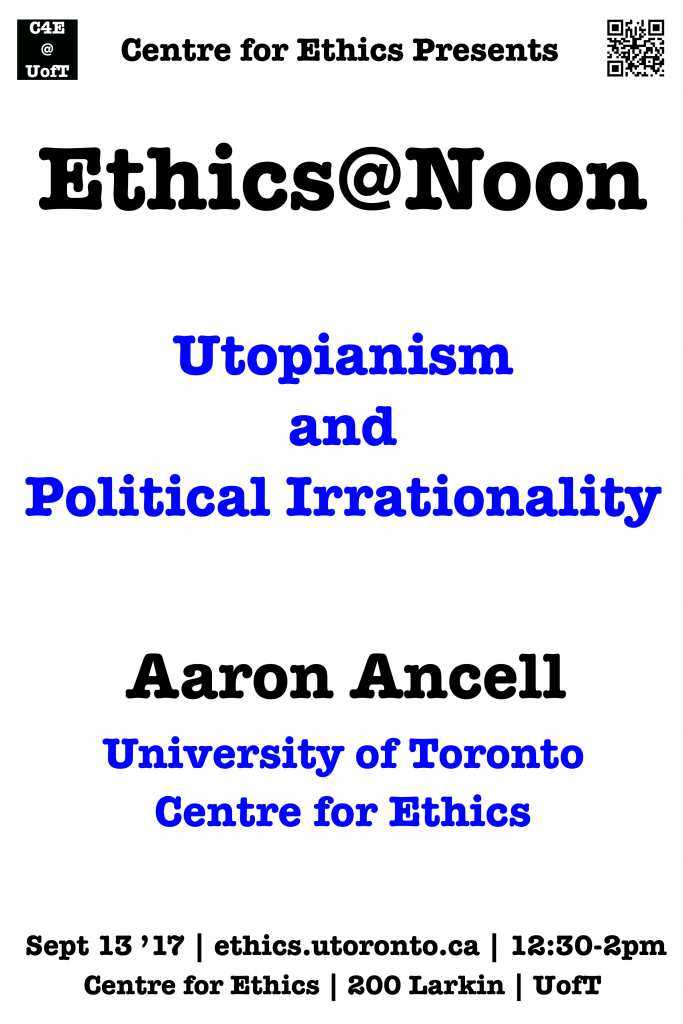 Utopianism and Political Irrationality
Utopianism and Political Irrationality[☛ eVideo]
Common ideas about how democracy should work require that people be informed and rational. Yet empirical studies of political beliefs and voting behaviour show that, at least when it comes to politics, people tend to be ignorant and irrational. To what extent must we adjust our ideas about how democracy should work in order to account for these facts? Many prominent philosophers argue that the problem is people, not our ideas about democracy, and that we simply need to work harder to be informed and rational. I argue that these philosophers underestimate the problem by ignoring the social and psychological mechanisms that underly much political ignorance and irrationality.
Aaron Ancell
12:30 PM - 02:00 PM
Postdoctoral Fellow in Ethics
Centre for Ethics
University of Toronto
Centre for Ethics, University of Toronto
Rm 200, Larkin Building - Mon, Sep 11, 2017
Perspectives on Ethics, Ethics of AI in Context
Ethics of AI in Context: Joe Halpern, Moral Responsibility, Blameworthiness, and Intention: In Search of Formal Definitions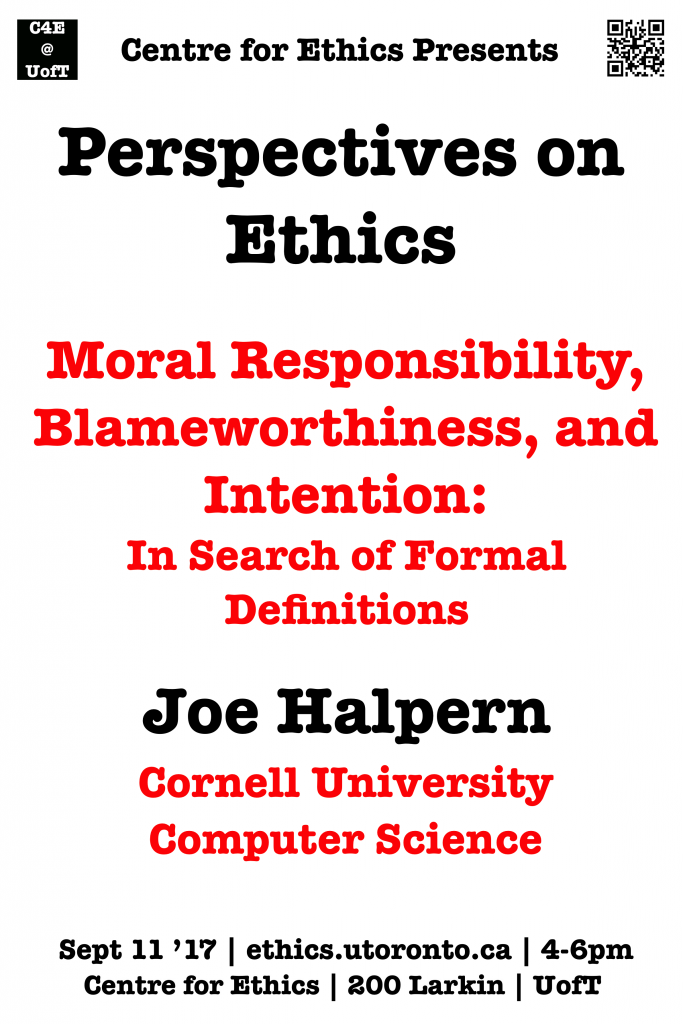 Moral Responsibility, Blameworthiness, and Intention: In Search of Formal Definitions
Moral Responsibility, Blameworthiness, and Intention: In Search of Formal Definitions[☛ eVideo]
The need for judging moral responsibility arises both in ethics and in law. In an era of autonomous vehicles and, more generally, autonomous AI agents, the issue has now become relevant to AI as well. Although hundreds of books and thousands of papers have been written on moral responsibility, blameworthiness, and intention, there is surprisingly little work on defining these notions formally. But we will need formal definitions in order for AI agents to apply these notions. In this talk, I take some preliminary steps towards defining these notions.
This is joint work with Max Kleiman-Weiner.
Joe Halpern
Cornell University
Computer Science Department
04:00 PM - 06:00 PM
Centre for Ethics, University of Toronto
Rm 200, Larkin Building - Mon, Aug 28, 2017
Martina Pavlikova: Toward a Digital Media EthicsMartina Pavlikova
Constantine the Philosopher University in Nitra
SlovakiaThis presentation identifies some points to consider for developing a digital media ethics: Who is a journalist? Is it somebody who represents anonymity, good taste, and common decency? The internet and digital media have become means of sharing knowledge around the world, building connections between politics, economics, and culture. They can do so instantly and interactively (e.g., Twitter, Facebook, blogs). At the same time this very tool is also a means of bringing into the homes and lives of people disturbing images, fake news, and misinformation in the name of ideology, national security, and advertisement for a consumer driven society. Additionally, amateur and professional journalists engaged in blogging and tweeting indicate that we are moving toward a form of mixed media journalism. This means creating new guidelines pertaining to amateurs and professionals, for reporting and advertising instantly and interactively. What are the minimum ethical principles that might safeguard against fraudulent reporting and what examples of hard cases might test these principles?
co-sponsored by Trinity College, Faculty of Divinity
02:00 PM - 04:00 PM
Centre for Ethics, University of Toronto
Rm 200, Larkin Building - Thu, Jun 8, 2017
Events on Campus
Dying for Change: How to Heal Canada's Healthcare SystemThe Institute of Medical Science presents:
UofT Talks – Dying for Change: How to Heal Canada’s Healthcare System
June 8th, 2017, 7-9pm
TELUS Centre for Performance and Learning, Mazzoleni Hall
273 Bloor Street West, TorontoTickets available at www.uofttalks.ca
UofT Talks aims to promote inter-disciplinary learning and networking through a symposium catered to everyone within all four School of Graduate Studies (SGS) divisions- Humanities, Social Science, Life Science, and Physical Sciences.
This year, join us in discussing our national pride: Canada’s universal healthcare system. Explore the strengths and shortcomings of our current model. Discover if and how we can implement critical changes to secure healthcare for all Canadians.
Our featured speakers include Neil D. Fraser, President of Medtronic, and Dr. Danielle Martin, a family physician that is a strong advocate for better, universal healthcare and who infamously testified at the US senate in 2014 on what the United States healthcare system can learn from other countries.
07:00 PM - 09:00 PM
Telus Centre for Performance and Learning
273 Bloor Street West - Thu, Jun 8, 2017
Events on Campus
Historical Injustices Against the LGBTI Community in Germany and Canada
03:00 PM - 05:00 PM
Rm 161, University College
University of Toronto - Mon, Jun 5, 2017
Events on Campus
Humanities in the 21st Century: The Research University in the WorldThe Jackman Humanities Institute will host a special conference on 5-6 June 2017 to mark the 10th anniversary of the Jackman gifts that founded the JHI. The occasion will be an opportunity to think about the place of humanities research within the university and in the world at large. This event is free and open to all, but registration is requested.
Please help us to get the word out by sharing this information widely with your faculty, staff, and students. All are welcome.
Information: https://www.humanities.utoronto.ca/event_details/id=2883
Registration: https://www.eventbrite.ca/e/humanities-for-the-21st-century-tickets-32851871833
12:00 AM - 11:59 PM
Innis College Town Hall
2 Sussex Avenue - Wed, May 17, 2017
Events on Campus
Well-Being and Changing AttitudesKrister Bykvist
02:00 PM - 04:00 PM
Professor of Practical Philosophy
University of Stockholm
Room 200, Larkin Building
15 Devonshire Place - Mon, May 8, 2017
Conferences
Embodiment: Bodies and Embodied Experience
12:00 AM - 11:59 PM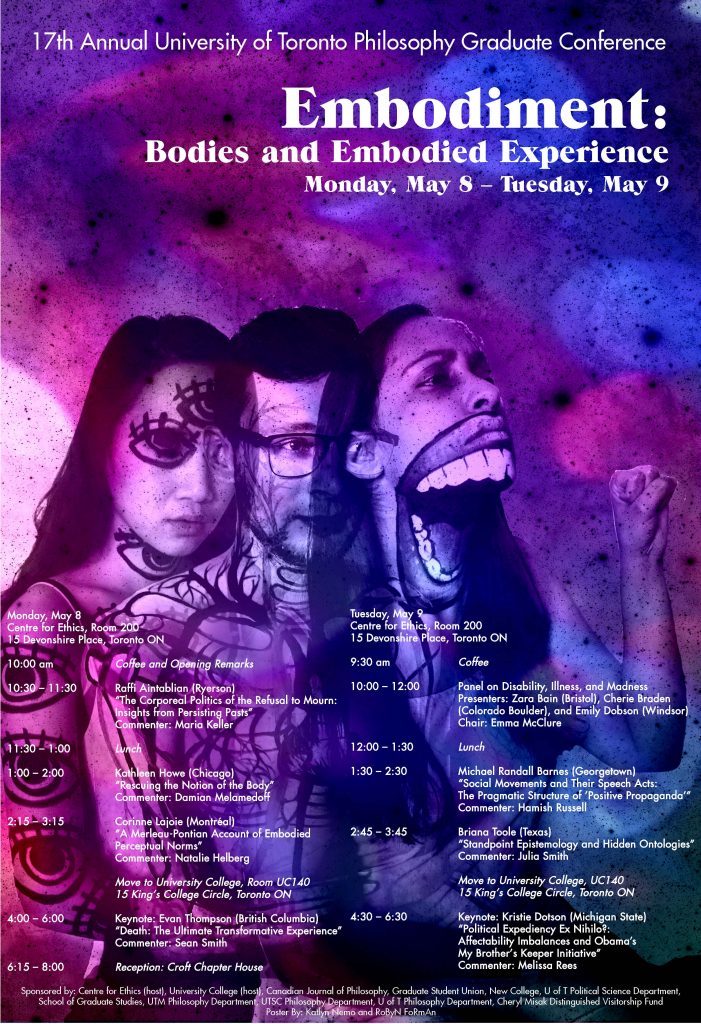
Room 200, Larkin Building
15 Devonshire Place - Fri, May 5, 2017
Public Lectures, Conferences
Om Canada: What Scandals Teach Us About Religion, Diversity, and National Imaginaries
06:00 PM - 08:00 PM
Jackman Humanities Institute, Room JH100A
- Fri, May 5, 2017
Conferences
Imagining 150: The Ethics of Canada’s Sesquicentennial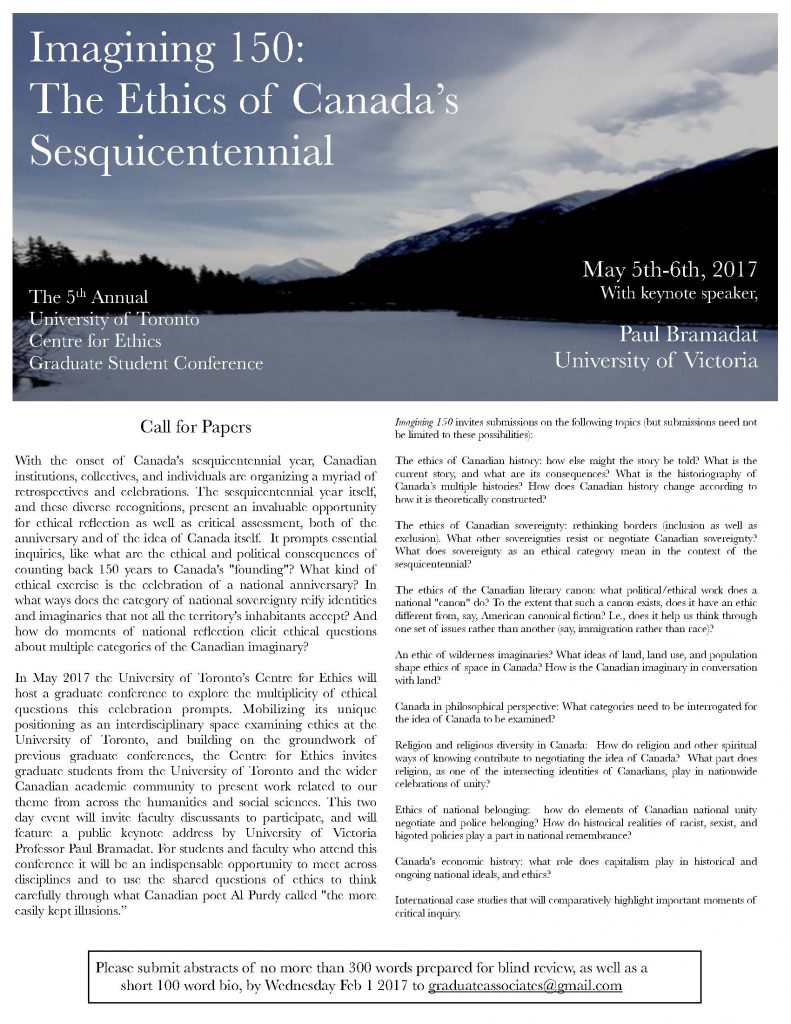 The 5th Annual
The 5th Annual
University of Toronto
Centre for Ethics
Graduate Student Conference
May 5, 2017With the onset of Canada’s sesquicentennial year, Canadian institutions, collectives, and individuals are organizing a myriad of retrospectives and celebrations. The sesquicentennial year itself, and these diverse recognitions, present an invaluable opportunity for ethical reflection as well as critical assessment, both of the anniversary and of the idea of Canada itself. It prompts essential inquiries, like what are the ethical and political consequences of counting back 150 years to Canada’s “founding”? What kind of ethical exercise is the celebration of a national anniversary? In what ways does the category of national sovereignty reify identities and imaginaries that not all the territory’s inhabitants accept? And how do moments of national reflection elicit ethical questions about multiple categories of the Canadian imaginary?
On May 5, 2017 the University of Toronto’s Centre for Ethics, hosts a graduate conference to explore the multiplicity of ethical questions this celebration prompts. Mobilizing its unique positioning as an interdisciplinary space examining ethics at the University of Toronto, and building on the groundwork of previous graduate conferences, the Centre for Ethics invites graduate students from the University of Toronto and the wider Canadian academic community to present work related to our theme from across the humanities and social sciences. This two-day event features faculty discussants as well as a public keynote address by University of Victoria Professor Paul Bramadat. For students and faculty who attend this conference it will be an indispensable opportunity to meet across disciplines and to use the shared questions of ethics to think carefully through what Canadian poet Al Purdy called “the more easily kept illusions.”
09:00 AM - 05:00 PM
Room 200, Larkin Building
15 Devonshire Place - Thu, May 4, 2017
Events on Campus
Techniques of the Corporation Over the last 150 years, corporations, like universities and laboratories, have generated an abundance of knowledge-making techniques in the form of psychological test, efficiency technologies, scenario planning, and logistical systems. As dominant forms of the last century, corporations are assembled with instruments, infrastructures, and interventions that arrange and rearrange the dynamics of capitalism. These techniques of the corporation have filtered into our daily lives, influencing everyday understandings of self, inequality, environment, and society.
Over the last 150 years, corporations, like universities and laboratories, have generated an abundance of knowledge-making techniques in the form of psychological test, efficiency technologies, scenario planning, and logistical systems. As dominant forms of the last century, corporations are assembled with instruments, infrastructures, and interventions that arrange and rearrange the dynamics of capitalism. These techniques of the corporation have filtered into our daily lives, influencing everyday understandings of self, inequality, environment, and society.Techniques of the Corporation will assemble an interdisciplinary network of established and emerging scholars whose work contributes to the critical study of the techniques, epistemologies, and imaginaries of the 20th century corporation. This conference aims to foster a timely conversation between Science and Technology Studies (STS) approaches and the recent histories of capitalism. We treat the corporation in the same way that historians of science and STS scholars have approached science, colonialism, and militarism as generative sites for knowledge production, value-making, and technopolitics. The conference takes as its starting place North American corporations with the understanding that corporations are multinational forms with complex transnational histories. Building from the recent history of capitalism, we attend to the entangled genealogies of corporations with slavery, exploitation, environmental destruction, colonialism, and inequality.
Hosted by the Technoscience Research Unit at the University of Toronto, from 4-6 May, 2017, this event will be an intimate multi-day conversation between established and emerging scholars in the fields of STS, history of science, and the history of capitalism. Techniques of the Corporation will be headlined by keynote speaker Joseph Dumit, and features invited talks by Dan Bouk, Elspeth Brown, Deborah Cowen, Orit Halpern, Louis Hyman, Michelle Murphy, Martha Poon, and Elise Thorburn. The conference will be an immersive experience in the Greater Toronto Area with meals and cocktails provided.
12:00 AM - 11:59 PM
George Ignatieff Theatre, Larkin Building
15 Devonshire Place - Thu, Apr 27, 2017
Conferences
Rencontre annuelle/Annual Meeting: Centre de recherche en éthique (CRÉ) & Centre for Ethics, UofT
02:00 PM - 04:15 PM
Université de Montréal
2910, boul Édouard-Montpetit - Thu, Apr 20, 2017
Ethics & Film: Lights, Camera, Ethics!
Ethics & Film: The Look of Silence
03:00 PM - 05:30 PM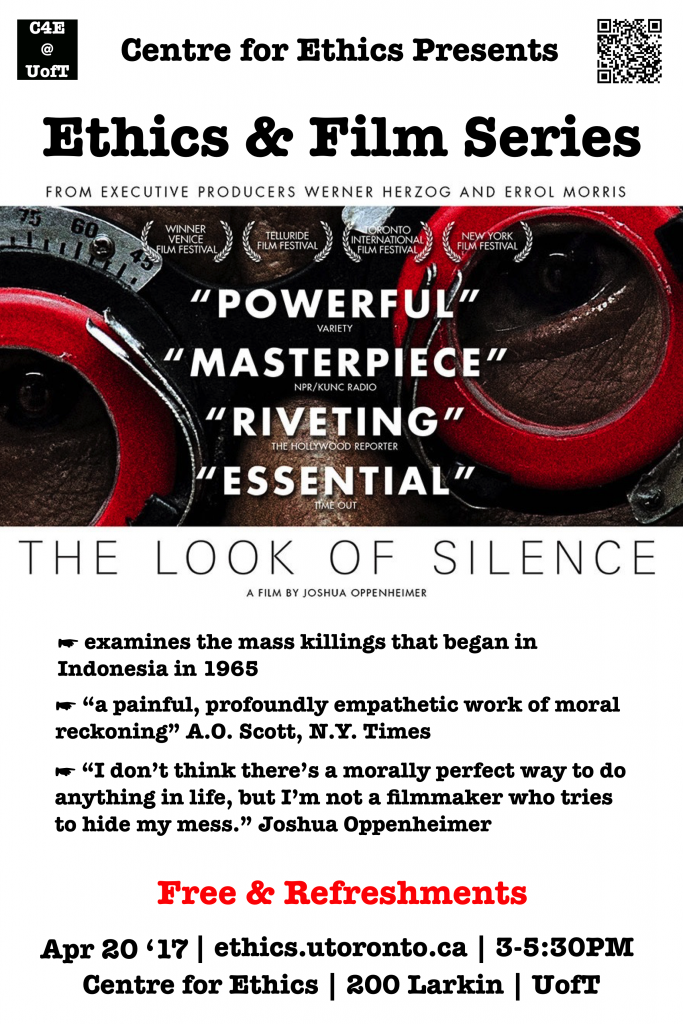 Joshua Oppenheimer’s Oscar-nominated The Look of Silence is the incredible story of a man confronting his brother’s killers and demanding they accept responsibility for their crimes. Adi, an optometrist who survived the 1965 Indonesian genocide, takes this unimaginable step in a society where murderers remain in power. To break the spell of submission and terror, he forces them, and us, to reckon with his country’s dark history. A companion piece to Oppenheimer’s The Act of Killing, also an Oscar nominee, The Look of Silence has been hailed as a “masterpiece” by The New York Times for bearing witness to the collapse of 50 years of silence. (Source: PBS)
Joshua Oppenheimer’s Oscar-nominated The Look of Silence is the incredible story of a man confronting his brother’s killers and demanding they accept responsibility for their crimes. Adi, an optometrist who survived the 1965 Indonesian genocide, takes this unimaginable step in a society where murderers remain in power. To break the spell of submission and terror, he forces them, and us, to reckon with his country’s dark history. A companion piece to Oppenheimer’s The Act of Killing, also an Oscar nominee, The Look of Silence has been hailed as a “masterpiece” by The New York Times for bearing witness to the collapse of 50 years of silence. (Source: PBS)
Room 200, Larkin Building
15 Devonshire Place - Fri, Apr 7, 2017
Political Theory Research Workshop
Political Theory Research WorkshopThinking about Jews: Judaism, and the Jewish Question in the Construction of Modern Political Community
Cáit Power
03:00 PM - 04:30 PM
Room 200, Larkin Building
15 Devonshire Place - Tue, Apr 4, 2017
Public Lectures
Pax Romana: Peace, Pacification, and the Ethics of EmpireA C4E Public Lecture by
Clifford Ando
University of Chicago
David B. and Clara E. Stern Professor
Professor of Classics, History and Law and in the College
Co-Director, Center for the Study of Ancient Religions, University of Chicago
Research Fellow, Department of Classics and World Languages, University of South Africa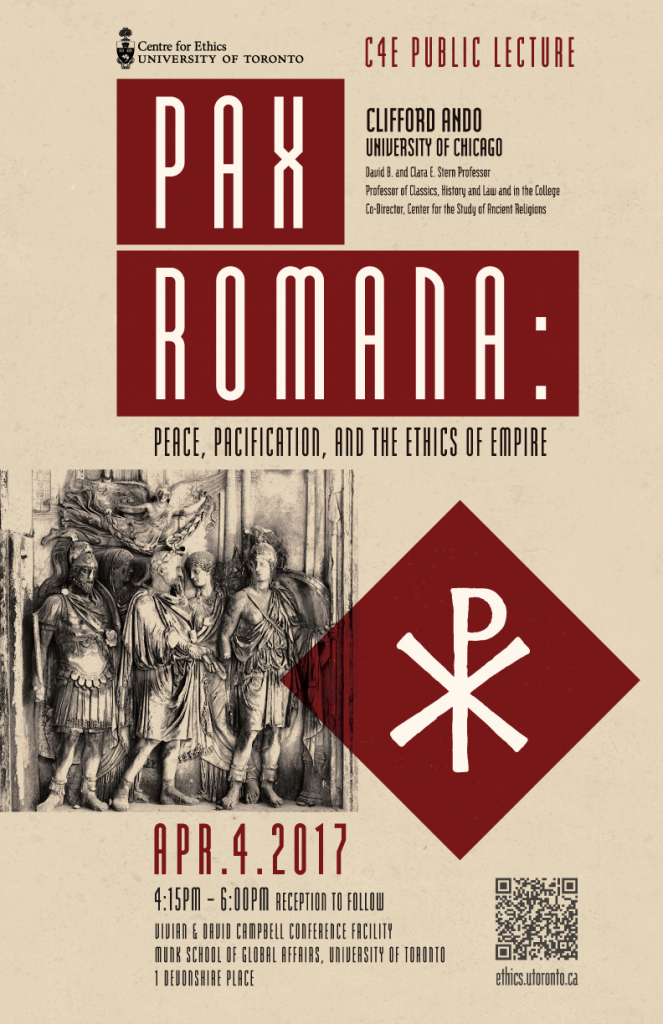 Contemporary scholarship tends to assimilate empires to one another as kindred in form, and likewise construes the experience of conquest and subjection in light of supposedly universal ideologies of autonomy and rebellion. However, the ancient Mediterranean in general—and Rome in particular—should be differentiated from such claims. Roman theory and practice in governing conquered populations must be understood as arising in a situation of weak state power. This has profound implications for how they understood the ethics of empire.Free and open to the public. Reception to follow the lecture.04:15 PM - 06:00 PM
Contemporary scholarship tends to assimilate empires to one another as kindred in form, and likewise construes the experience of conquest and subjection in light of supposedly universal ideologies of autonomy and rebellion. However, the ancient Mediterranean in general—and Rome in particular—should be differentiated from such claims. Roman theory and practice in governing conquered populations must be understood as arising in a situation of weak state power. This has profound implications for how they understood the ethics of empire.Free and open to the public. Reception to follow the lecture.04:15 PM - 06:00 PM
Vivian and David Campbell Conference Facility
1 Devonshire Place - Fri, Mar 31, 2017
Political Theory Research Workshop
Political Theory Research WorkshopA Chinese Version of Cosmopolitan Global Justice – Kang Youwei’s Da Tong shu
Binfan Wang
03:00 PM - 04:30 PM
Room 200, Larkin Building
15 Devonshire Place - Wed, Mar 29, 2017
Ethics at Noon
Clifton Mark – Crying Foul vs. Just Crying: On the Role of Instrumental Goals in Moral StrugglesCrying Foul vs. Just Crying: On the Role of Instrumental Goals in Moral Struggles
Clifton Mark
12:00 PM - 02:00 PM
Postdoctoral Research Fellow
Centre for Ethics
Room 200, Larkin Building
15 Devonshire Place - Fri, Mar 24, 2017
Ethics & Film: Lights, Camera, Ethics!
Ethics & Film: The Act of Killing
Executive produced by Errol Morris (The Fog Of War) and Werner Herzog (Grizzly Man), The Act of Killing examines a country where killers are celebrated as heroes and the filmmakers challenge unrepentant death squad leaders to re-enact their real-life mass-killings in the style of the American movies they love. The hallucinatory result is a cinematic fever dream, an unsettling journey deep into the imaginations of mass-murderers and the shockingly banal regime of corruption and impunity they inhabit. (Source: TIFF)
03:00 PM - 06:00 PM
Room 200, Larkin Building
15 Devonshire Place - Fri, Mar 24, 2017
Professing Ethics
Legal Ethics in the Age of Law and Tech[☛ eVideos]
Join a distinguished panel of international experts to explore the implications of recent and future developments in law & technology for contemporary legal ethics.
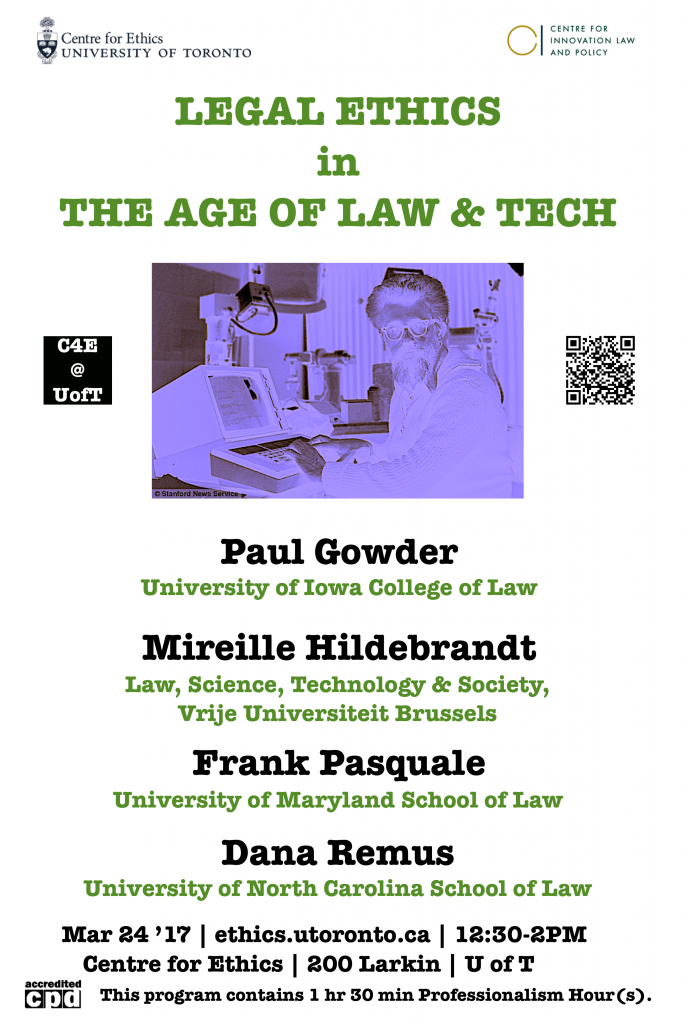
- Technological competence: how much are lawyers obliged to adapt to technological change?
- How is artificial intelligence transforming the legal profession and expectations of professional competence?
- Machine learning’s impact on the legal profession and legal ethics: threat or opportunity?
- How can lawyers protect the privacy of client information in light of technological developments?
- How can lawyers use technology to become more efficient, including formulating more sophisticated search queries and, perhaps, learning to code?
- Automated prediction of judicial decisionmaking based on neuro-linguistic programming (NLP): the example of the European Court of Human Rights
- What is the relation between legal ethics, technology, and the rule of law?
Free!
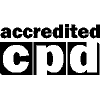 For Ontario lawyers, this program contains 1 hr 30 min Professionalism Hour(s).
For Ontario lawyers, this program contains 1 hr 30 min Professionalism Hour(s).Panelists:
Paul Gowder, University of Iowa College of Law

Mireille Hildebrandt
 , Law Science Technology and Society, Vrije Universiteit Brussels & Institute for Computing and Information Sciences, University of Nijmegen
, Law Science Technology and Society, Vrije Universiteit Brussels & Institute for Computing and Information Sciences, University of Nijmegen Frank Pasquale, University of Maryland School of Law

Dana Remus,
 University of North Carolina School of Law & Senior Counsel and Special Assistant to the President in the Office of White House Counsel (until 2016)
University of North Carolina School of Law & Senior Counsel and Special Assistant to the President in the Office of White House Counsel (until 2016)  Co-sponsored with Centre for Innovation Law and Policy, University of Toronto
Co-sponsored with Centre for Innovation Law and Policy, University of Toronto
12:30 PM - 02:00 PM
Room 200, Larkin Building
15 Devonshire Place - Wed, Mar 22, 2017
Humanomics: A Better Plan for the Social SciencesProfessor Deirdre McCloskey will lead a graduate seminar at the Centre for Ethics on March 14th from 12:30-2pm in the Larkin Building, Room 200.
Professor McCloskey will discuss how economics, in the opinion of economists, is the queen of the social sciences. Econowannabes in other fields seem to agree. But Samuelsonian economics, the study of a charming sociopath named Max U, leaves out what can be learned from the humanities. The humanistic step of categorization lies behind any scientific program, because science is about human questions. Humanomics keeps mathematics and quantification, but adds literature, theology, philosophy, rhetoric and ethics to make a full social science.
Admission is free by registration and open to the public. Register here.
This event is possible because of the generous support of Paul Cadario, SPPG Advisory Board member and Senior Fellow at U of T, as well as the generous support of the Departments of Economics and Political Science at U of T.
12:30 PM - 02:00 PM
Room 200, Larkin Building
15 Devonshire Place - Wed, Mar 22, 2017
Deborah Stone, Why Statistics Should be Taught as Ethics, Not MathProfessor Deborah Stone will lead a graduate seminar at the Centre for Ethics on March 22 from 12:30-2pm in the Larkin Building, Room 200.
From simple tallies to complex quantitative analyses, counting necessarily requires value choices. Historically, measurement has always been intimately connected to notions of distributive justice and procedural fairness. This seminar explores some of these connections and what it means to count with integrity.
Admission is free by registration and open to the public. Register here.
This event is possible because of the generous support of Paul Cadario, SPPG Advisory Board member and Senior Fellow at U of T, as well as the generous support of the Departments of Economics and Political Science at U of T.
12:30 PM - 02:00 PM
Room 200, Larkin Building
15 Devonshire Place - Wed, Mar 22, 2017
Ethics at Noon
Shaun Young: Politicians and PrivacyPoliticians and Privacy
Shaun Young, DPhil
Special Projects Officer, Strategic Initiatives
Office of the Vice-President, Research & Innovation
University of TorontoAbstract:
12:00 PM - 02:00 PM
Privacy is often identified as an essential element of being human: adequately respecting human dignity requires acknowledging and (reasonably) accommodating individuals’ privacy. During the preceding four decades the “private” lives of politicians have been subjected to an increasing degree of public scrutiny; so much so that it might be argued that those pursuing or occupying elected political office – especially senior positions (e.g., heads of state, Cabinet ministers) – are often denied a degree of privacy commensurate with adequately respecting and protecting human dignity.
In this talk Shaun Young addresses the following question: Is it ethically legitimate to subject politicians’ behaviour to a degree of public scrutiny that is notably greater than that experienced by their fellow citizens?
Room 200, Larkin Building
15 Devonshire Place - Fri, Mar 17, 2017
Political Theory Research Workshop
Political Theory Research WorkshopFrom Gargantua to Leviathan: Rabelais, Hobbes, and the Eclipse of Fun
Zak Black
03:00 PM - 04:00 PM
Room 200, Larkin Building
15 Devonshire Place - Wed, Mar 15, 2017
C4E Flash Event, Professing Ethics
The Ethics of Lawyering in Sexual Assault Cases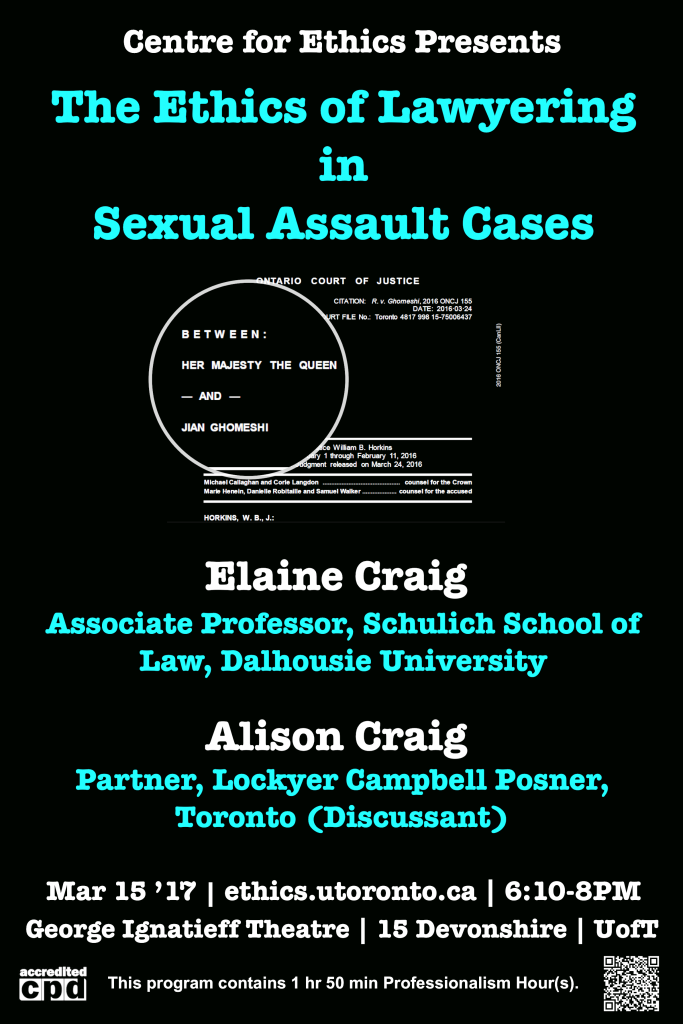 A year later, the trial and acquittal of Jian Ghomeshi in March 2016 continues to stir controversy about the Canadian criminal justice system’s handling of sexual assault cases. The question which ethical norms should govern defence counsel in these cases is among the many still contentious issues, as evidenced by the recent controversy surrounding an invitation extended to Ghomeshi’s defence lawyer, Marie Henein, to give a university lecture.
A year later, the trial and acquittal of Jian Ghomeshi in March 2016 continues to stir controversy about the Canadian criminal justice system’s handling of sexual assault cases. The question which ethical norms should govern defence counsel in these cases is among the many still contentious issues, as evidenced by the recent controversy surrounding an invitation extended to Ghomeshi’s defence lawyer, Marie Henein, to give a university lecture.This Centre for Ethics event aims to stimulate thoughtful public debate about the important and complex ethical issues raised by sexual assault cases in the criminal process, including not only the role of defence attorneys, but also that of other systems participants, notably prosecutors and judges.
Free! This event was originally scheduled for February 13, 2017.
Participants:
 Elaine Craig, Associate Professor, Schulich School of Law, Dalhousie University, Author of “The Ethical Obligations of Defence Counsel in Sexual Assault Cases” (2014) & “The Ethical Identity of Sexual Assault Lawyers” (2016)
Elaine Craig, Associate Professor, Schulich School of Law, Dalhousie University, Author of “The Ethical Obligations of Defence Counsel in Sexual Assault Cases” (2014) & “The Ethical Identity of Sexual Assault Lawyers” (2016) Alison Craig, Partner, Lockyer Campbell Posner, Toronto (Discussant)
Alison Craig, Partner, Lockyer Campbell Posner, Toronto (Discussant)
06:10 PM - 08:00 PM For Ontario lawyers, this program contains 1 hr 50 min Professionalism Hour(s).
For Ontario lawyers, this program contains 1 hr 50 min Professionalism Hour(s).
.
George Ignatieff Theatre, Larkin Building
15 Devonshire Place - Wed, Mar 15, 2017
Ethics at Noon, Ethics & the Arts, Critical Ethics
The Ethics of Legal Fictions[☛ eVideo]
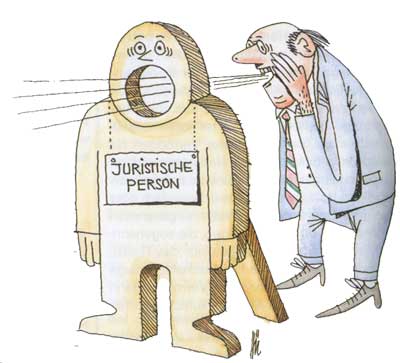
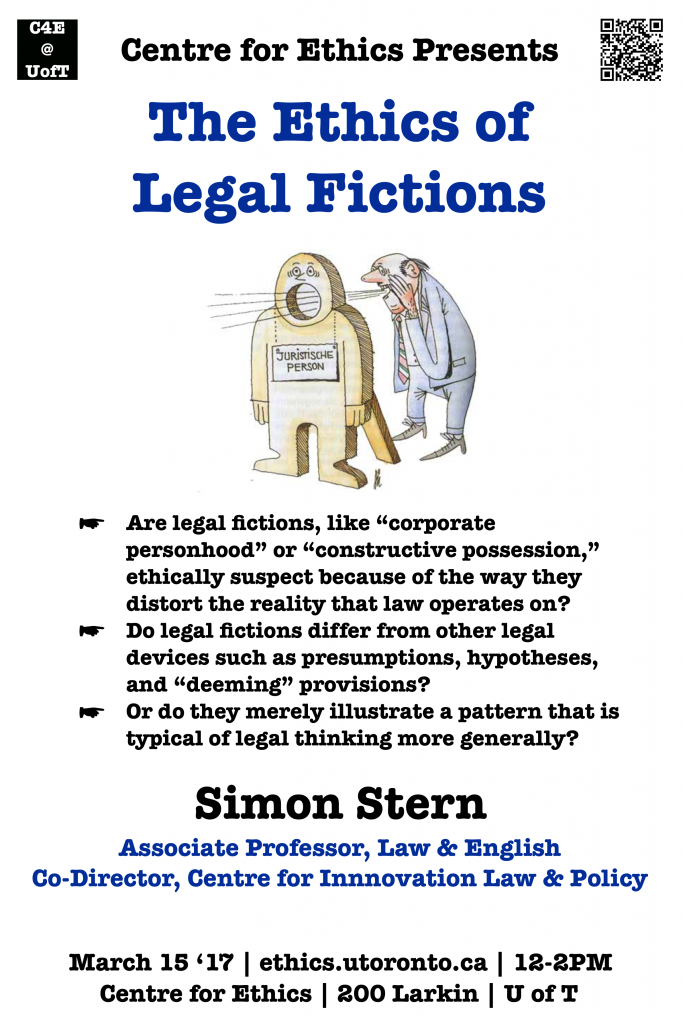 Legal fictions, like “corporate personhood” or “constructive possession,” are often seen as ethically suspect because of the way they distort the reality that law operates on.
Legal fictions, like “corporate personhood” or “constructive possession,” are often seen as ethically suspect because of the way they distort the reality that law operates on.- Do legal fictions differ from other legal devices such as presumptions, hypotheses, and “deeming” provisions?
- Or do they merely illustrate a pattern that is typical of legal thinking more generally?
- What’s a legal fiction anyway?
Presenter:
Simon Stern, Associate Professor of Law and English & Co-Director, Centre for Innovation Law & Policy, University of TorontoFree and open to the public.
12:00 PM - 02:00 PM
Room 200, Larkin Building
15 Devonshire Place - Tue, Mar 14, 2017
Understanding Ethics
Understanding the Process of Moralization: How Eating Meat Becomes a Moral Issue
- How does moral change occur?
- How does something that’s morally neutral take on moral properties?
- What role do emotions and cognition play?
Presenter:
04:15 PM - 06:00 PM
Matthew Feinberg, Assistant Professor, Rotman School of Management
Room 200, Larkin Building
15 Devonshire Place - Fri, Mar 10, 2017
Ethics & Film: Lights, Camera, Ethics!
Ethics & Film: The Black Power Mixtape 1967-1975
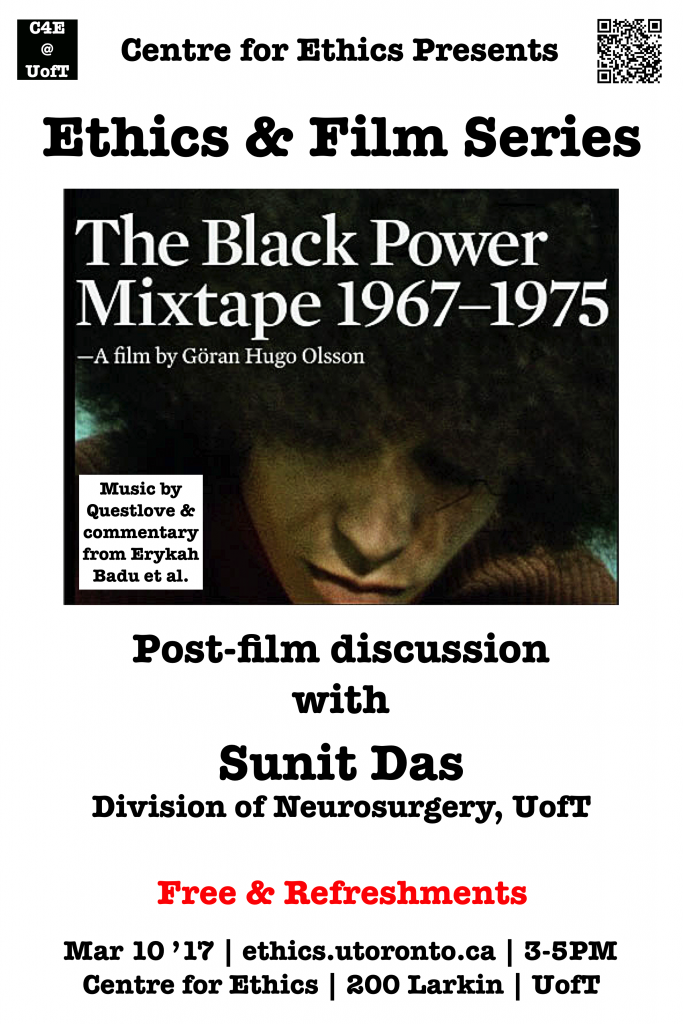 THE BLACK POWER MIXTAPE 1967-1975 mobilizes a treasure trove of 16mm material shot by Swedish journalists who came to the US drawn by stories of urban unrest and revolution. Gaining access to many of the leaders of the Black Power Movement—Stokely Carmichael, Bobby Seale, Angela Davis and Eldridge Cleaver among them—the filmmakers captured them in intimate moments and remarkably unguarded interviews. Thirty years later, this lush collection was found languishing in the basement of Swedish Television. Director Göran Olsson and co-producer Danny Glover bring this footage to light in a mosaic of images, music and narration chronicling the evolution one of our nation’s most indelible turning points, the Black Power movement. Music by Questlove and Om’Mas Keith, and commentary from prominent African-American artists and activists who were influenced by the struggle — including Erykah Badu, Harry Belafonte, Talib Kweli, and Melvin Van Peebles — give the historical footage a fresh, contemporary resonance and makes the film an exhilarating, unprecedented account of an American revolution. (Source: IFC Films)
THE BLACK POWER MIXTAPE 1967-1975 mobilizes a treasure trove of 16mm material shot by Swedish journalists who came to the US drawn by stories of urban unrest and revolution. Gaining access to many of the leaders of the Black Power Movement—Stokely Carmichael, Bobby Seale, Angela Davis and Eldridge Cleaver among them—the filmmakers captured them in intimate moments and remarkably unguarded interviews. Thirty years later, this lush collection was found languishing in the basement of Swedish Television. Director Göran Olsson and co-producer Danny Glover bring this footage to light in a mosaic of images, music and narration chronicling the evolution one of our nation’s most indelible turning points, the Black Power movement. Music by Questlove and Om’Mas Keith, and commentary from prominent African-American artists and activists who were influenced by the struggle — including Erykah Badu, Harry Belafonte, Talib Kweli, and Melvin Van Peebles — give the historical footage a fresh, contemporary resonance and makes the film an exhilarating, unprecedented account of an American revolution. (Source: IFC Films) Dr. Sunit Das was born in Dhaka, Bangladesh, and grew up in Detroit. He studied English Literature at the University of Michigan and Philosophy at Harvard University before obtaining an MD from Northwestern University and a PhD in Neurobiology at the National Institute of Neurological Disorders and Stroke in Bethesda, MD. He joined the faculty at St. Michael’s Hospital and University of Toronto in 2010.
Dr. Sunit Das was born in Dhaka, Bangladesh, and grew up in Detroit. He studied English Literature at the University of Michigan and Philosophy at Harvard University before obtaining an MD from Northwestern University and a PhD in Neurobiology at the National Institute of Neurological Disorders and Stroke in Bethesda, MD. He joined the faculty at St. Michael’s Hospital and University of Toronto in 2010.
03:00 PM - 05:00 PM
Room 200, Larkin Building
15 Devonshire Place - Thu, Mar 9, 2017
C4E Flash Event
The Ethics of Fake News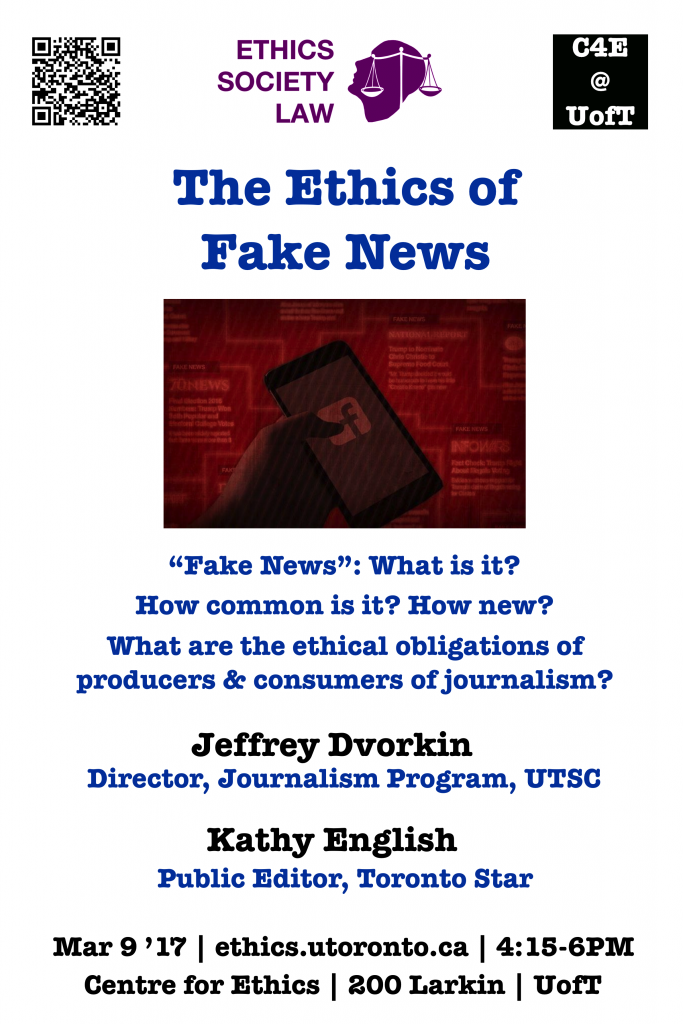 UofT’s Ethics, Society, and Law Students’ Association in collaboration with the Centre for Ethics is hosting an academic panel discussion on The Ethics of Fake News. We are living in what is repeatedly referred to as the post-truth era, witnessing a loss of trust in traditional media outlets, and social media accelerating the circulation of false, unverified, and exaggerated information. The term “fake news” itself has become deeply controversial as its use has devolved from a critique of the proliferation of false stories and conspiracy theories, to an attack on the legitimacy of political opposition; even the pervasiveness of the problem remains contentious. This discussion will explore the ethical obligations that apply to both producers and consumers of journalism, recognizing that inflammatory distortion of facts is not a partisan issue, but a threat to the function of a free, open, and critical press.
UofT’s Ethics, Society, and Law Students’ Association in collaboration with the Centre for Ethics is hosting an academic panel discussion on The Ethics of Fake News. We are living in what is repeatedly referred to as the post-truth era, witnessing a loss of trust in traditional media outlets, and social media accelerating the circulation of false, unverified, and exaggerated information. The term “fake news” itself has become deeply controversial as its use has devolved from a critique of the proliferation of false stories and conspiracy theories, to an attack on the legitimacy of political opposition; even the pervasiveness of the problem remains contentious. This discussion will explore the ethical obligations that apply to both producers and consumers of journalism, recognizing that inflammatory distortion of facts is not a partisan issue, but a threat to the function of a free, open, and critical press.Jeffrey Dvorkin, lecturer and director of the Journalism Program at UTSC, and also a board member of the Canadian Journalism foundation, is a frequent commentator on ethics of media in the digital age and the future of the journalism industry.
Kathy English, the current public editor of the Toronto Star, and a member of the Canadian Journalism Association Ethics Panel and the executive committee of the Canadian Journalism foundation brings a unique perspective through her direct experience of upholding and enforcing journalistic ethics and responsibility.
Free and open to the public! Register here.
04:15 PM - 06:00 PM
Room 200, Larkin Building
15 Devonshire Place - Wed, Mar 8, 2017
Ethics at Noon, Critical Ethics
The Financialization of Universities: Institutional Transparency and Accountability in the Age of "The Art of the Deal" University governance, at U of T as at other institutions, has been called into question on a regular but sporadic basis (at U of T, when the arrangements relating to setting up the Munk School were revealed, or more recently by the campaign to divest from fossil fuels). What we collectively lack, however, is a good picture of everyday governance processes. I have been conducting research on just one aspect of university activities, namely decision-making concerning capital projects.
University governance, at U of T as at other institutions, has been called into question on a regular but sporadic basis (at U of T, when the arrangements relating to setting up the Munk School were revealed, or more recently by the campaign to divest from fossil fuels). What we collectively lack, however, is a good picture of everyday governance processes. I have been conducting research on just one aspect of university activities, namely decision-making concerning capital projects.To critically analyze the capital-project and related financing decisions, in universities as in the rest of the Ontario public sector, simply waving the flag of “transparency” is insufficient. U of T and similar broader public sector entities do make public a great number of documents. But neither the content nor the format of the documents that are publicly available, many of which I have closely studied, help to understand who decides what and when, and what evidence is used to make important decisions that, among other things, commit the university to continually increase both tuition fees and ancillary fees.
Presenter:
12:00 PM - 02:00 PM
Mariana Valverde, Professor, Centre for Criminology and Sociolegal Studies, University of Toronto
Room 200, Larkin Building
15 Devonshire Place - Mon, Mar 6, 2017
Ethics & Film: Lights, Camera, Ethics!
Ethics & Film: The Act of Killing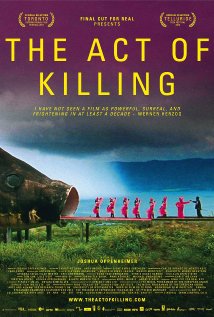
Executive produced by Errol Morris (The Fog Of War) and Werner Herzog (Grizzly Man), The Act of Killing examines a country where killers are celebrated as heroes and the filmmakers challenge unrepentant death squad leaders to re-enact their real-life mass-killings in the style of the American movies they love. The hallucinatory result is a cinematic fever dream, an unsettling journey deep into the imaginations of mass-murderers and the shockingly banal regime of corruption and impunity they inhabit. (Source: TIFF)
03:00 PM - 06:00 PM
Room 200, Larkin Building
15 Devonshire Place - Mon, Mar 6, 2017
Perspectives on Ethics
Liam Murphy – Seminar SeriesIllusory Moral Rules: How Law Misleads Us About Morality
Liam B. Murphy
Herbert Peterfreund Professor of Law and Professor of Philosophy
New York University School of LawCo-sponsored by Faculty of Law
12:15 PM - 02:15 PM
Room 200, Larkin Building
15 Devonshire Place - Fri, Mar 3, 2017
Political Theory Research Workshop
Political Theory Research WorkshopWhat kind of Good is Non-Domination?
Dr. Ian Ward
03:00 PM - 04:30 PM
Room 200, Larkin Building
15 Devonshire Place - Fri, Feb 17, 2017
Political Theory Research Workshop
Political Theory Research WorkshopWho is the ‘We’ that judges? Constituting the people in the courts and the theatre
Ella Street
03:00 PM - 04:30 PM
Room 200, Larkin Building
15 Devonshire Place - Thu, Feb 16, 2017
C4E Flash Event
"Conscience for Change": Martin Luther King, Jr.'s 1967 Massey Lectures
On their 50th anniversary, drop by the Centre for Ethics during the week before Reading Week to listen to, “watch,” and reflect on Martin Luther King, Jr.’s powerful and still resonant 1967 Massey Lectures. For a preview, see here.
Canada is not merely a neighbor to Negroes. Deep in our history of struggle for freedom Canada was the north star.
So standing today in Canada I am linked with the history of my people and its unity with your past. (Lecture 1)Schedule (subject to change):
- Monday, February 13: Lecture 1 (“Impasse in Race Relations”)
- Tuesday, February 14: Lecture 2 (“Conscience and the War in Vietnam”)
- Wednesday, February 15: Lecture 3 (“Youth and Social Action”)
- Thursday, February 16: Lecture 4 (“Nonviolence and Social Change”)
Room 200, Larkin Building
15 Devonshire Place - Wed, Feb 15, 2017
C4E Flash Event
"Conscience for Change": Martin Luther King, Jr.'s 1967 Massey Lectures
On their 50th anniversary, drop by the Centre for Ethics during the week before Reading Week to listen to, “watch,” and reflect on Martin Luther King, Jr.’s powerful and still resonant 1967 Massey Lectures. For a preview, see here.
Canada is not merely a neighbor to Negroes. Deep in our history of struggle for freedom Canada was the north star.
So standing today in Canada I am linked with the history of my people and its unity with your past. (Lecture 1)Schedule (subject to change):
- Monday, February 13: Lecture 1 (“Impasse in Race Relations”)
- Tuesday, February 14: Lecture 2 (“Conscience and the War in Vietnam”)
- Wednesday, February 15: Lecture 3 (“Youth and Social Action”)
- Thursday, February 16: Lecture 4 (“Nonviolence and Social Change”)
Room 200, Larkin Building
15 Devonshire Place - Tue, Feb 14, 2017
Critical Ethics
The Ethics and Economics of Incentivizing the Uninformed☛ eForum
- When people debate the ethics of medical trials, organ donation, or egg donation, do the arguments they typically use hold up under experimental scrutiny?
- What can experimental and behavioral economics tell us about ethics in general, and medical ethics in particular?
- How do incentives affect ethical decision making?
- How do people determine when, why and how voluntary transactions should be restricted?
- What are the empirical moral limits of markets?
Presenter:
 Sandro Ambuehl, Department of Management UTSC & Rotman School of Management
Sandro Ambuehl, Department of Management UTSC & Rotman School of ManagementDiscussants:
 Cendri Hutcherson, Department of Psychology; Toronto Decision Neuroscience Lab
Cendri Hutcherson, Department of Psychology; Toronto Decision Neuroscience Lab
Nicola Lacetera, Department of Management UTM & Rotman School of Management
04:15 PM - 06:00 PM
Room 200, Larkin Building
15 Devonshire Place - Tue, Feb 14, 2017
C4E Flash Event
"Conscience for Change": Martin Luther King, Jr.'s 1967 Massey Lectures
On their 50th anniversary, drop by the Centre for Ethics during the week before Reading Week to listen to, “watch,” and reflect on Martin Luther King, Jr.’s powerful and still resonant 1967 Massey Lectures. For a preview, see here.
Canada is not merely a neighbor to Negroes. Deep in our history of struggle for freedom Canada was the north star.
So standing today in Canada I am linked with the history of my people and its unity with your past. (Lecture 1)Schedule (subject to change):
- Monday, February 13: Lecture 1 (“Impasse in Race Relations”)
- Tuesday, February 14: Lecture 2 (“Conscience and the War in Vietnam”)
- Wednesday, February 15: Lecture 3 (“Youth and Social Action”)
- Thursday, February 16: Lecture 4 (“Nonviolence and Social Change”)
Room 200, Larkin Building
15 Devonshire Place - Mon, Feb 13, 2017
Perspectives on Ethics
Jennifer Cyd Rubenstein: Money as PoliticsJennifer Cyd Rubenstein
Department of Politics
University of VirginiaCo-sponsored with Trudeau Centre
Abstract:
What is the relationship between money and democratic politics? One prominent view is that money corrupts democratic politics. “Get money out of politics!” is a common— and understandable— refrain. Anyone who cares about political equality is rightly troubled when only wealthy individuals are able to win elected office and when individuals and corporations can “buy” influence by making campaign contributions. However, a conception of money as an external substance that taints democratic politics obscures as much as it illuminates. It blinds us to the negative political effects of money not captured by the imagery of illegitimate incursion. It also conceals various ways in which activities involving money can promote and enact democratic values of inclusion, equality, and non-paternalism. Instead of conceptualizing money as (only) a foreign substance in politics we ought to also view money as a currency of politics. Drawing on thinkers ranging from Rousseau and Michael Walzer to Audre Lorde and Viviana Zelizer, and examples including cash transfer programs in Kenya and the Abolitionist movement in the US, the aim of this talk is to bring the diverse political functions of money into view in a way that is helpful in both broad theoretical terms and for responding to our current political moment.
04:00 PM - 06:00 PM
Room 200, Larkin Building
15 Devonshire Place - Mon, Feb 13, 2017
C4E Flash Event
"Conscience for Change": Martin Luther King, Jr.'s 1967 Massey Lectures
On their 50th anniversary, drop by the Centre for Ethics during the week before Reading Week to listen to, “watch,” and reflect on Martin Luther King, Jr.’s powerful and still resonant 1967 Massey Lectures. For a preview, see here.
Canada is not merely a neighbor to Negroes. Deep in our history of struggle for freedom Canada was the north star.
So standing today in Canada I am linked with the history of my people and its unity with your past. (Lecture 1)Schedule (subject to change):
- Monday, February 13: Lecture 1 (“Impasse in Race Relations”)
- Tuesday, February 14: Lecture 2 (“Conscience and the War in Vietnam”)
- Wednesday, February 15: Lecture 3 (“Youth and Social Action”)
- Thursday, February 16: Lecture 4 (“Nonviolence and Social Change”)
Room 200, Larkin Building
15 Devonshire Place - Thu, Feb 9, 2017
Ethics & the Arts
Leonard Cohen: Ethics and the ArtistJoin us for an interdisciplinary panel discussion of the ethical dimensions of Leonard Cohen’s life and work…and catch a choir performing selections from Cohen’s songbook.
When: Feb. 9, 2017, 12:15-2PM
Where: Vivian and David Campbell Conference Facility, Munk School of Global Affairs, 1 Devonshire Place, University of TorontoPanelists:
12:15 PM - 02:00 PM George Elliott Clarke, E.J. Pratt Professor of Canadian Literature, University of Toronto, Department of English & Parliamentary Poet Laureate
George Elliott Clarke, E.J. Pratt Professor of Canadian Literature, University of Toronto, Department of English & Parliamentary Poet Laureate Norman Ravvin, Professor & Jewish Studies Graduate Program Director, Department of Religions and Cultures, Concordia University
Norman Ravvin, Professor & Jewish Studies Graduate Program Director, Department of Religions and Cultures, Concordia University Leonardo Augusto Zaibert, Professor & Chair, Department of Philosophy, Union College
Leonardo Augusto Zaibert, Professor & Chair, Department of Philosophy, Union College Plus:
 VIVA! Youth Singers of Toronto, Laura Menard, Coordinator; Carol Woodward Ratzlaff, Artistic Director
VIVA! Youth Singers of Toronto, Laura Menard, Coordinator; Carol Woodward Ratzlaff, Artistic DirectorCo-sponsors:



Vivian and David Campbell Conference Facility
1 Devonshire Place - Tue, Feb 7, 2017
Ethics & the Arts
The Ethics of Ethics and Literature☛ eForum
Join an interdisciplinary roundtable discussion of literary ethics to explore questions about the relationship between ethics and literature, such as:
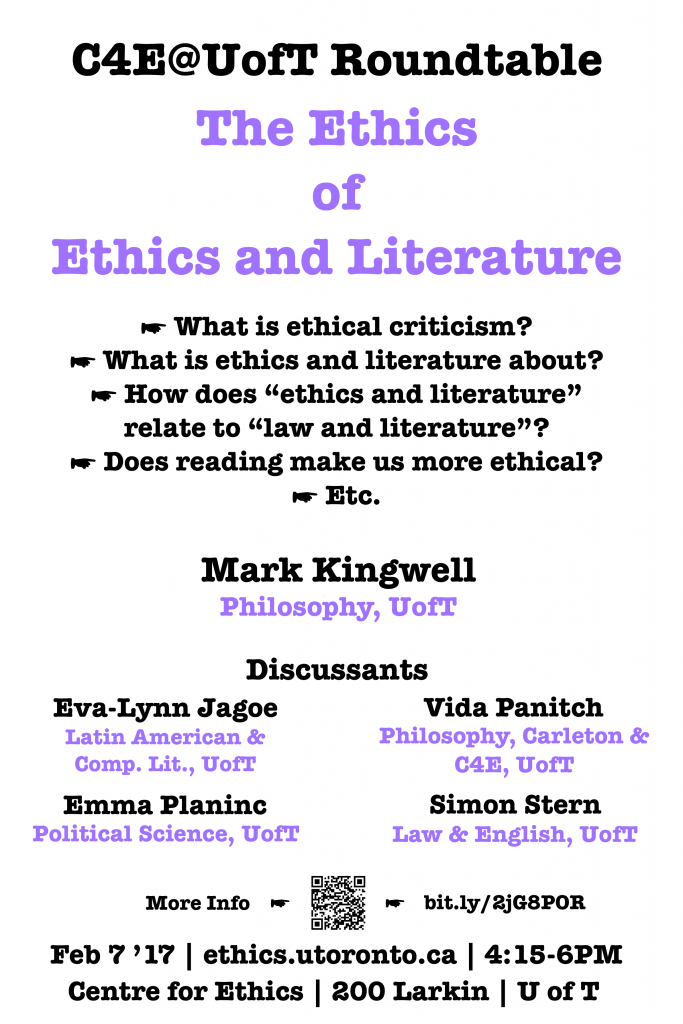
- What is ethical criticism? What’s wrong with it? What’s right? Can criticism ever not be ethical? Should it (try to) be?
- What’s “ethics and literature” about anyway? Does it have a point? Does it need to have one?
- Is ethics and literature, ethics? Or literature? Or … both? Neither?
- How does “ethics and literature” relate to “law and literature”? Law and literature is often said to come in two flavours: “law in literature” and “law as literature”? What’s that distinction about and is there a similar distinction in ethics and literature?
- Does reading make us more ethical? Is reading itself an ethical act? Writing? Translating?
Suggested background reading: (1) Mark Kingwell, The Ethics of Ethics and Literature; (2) Richard Posner, Against Ethical Criticism
Presenter:
- Mark Kingwell, Philosophy, University of Toronto
Discussants:
- Eva-Lynn Jagoe, Latin American & Comparative Literature, University of Toronto
- Vida Panitch, Philosophy, Carleton University; Centre for Ethics, University of Toronto
- Emma Planinc, Political Science, University of Toronto
- Simon Stern, Law & English, University of Toronto; Co-Director, Centre for Innovation Law & Policy
When: February 7, 2017, 4:15-6PM
Where: Centre for Ethics, 200 Larkin (@ Trinity College), 15 Devonshire Place, University of Toronto
04:15 PM - 06:00 PM
Room 200, Larkin Building
15 Devonshire Place - Mon, Feb 6, 2017
Perspectives on Ethics
Ahmed Abdel Meguid: Seminar SeriesAhmed Abdel Meguid
Department of Religion
Syracuse University
04:00 PM - 06:00 PM
Room 200, Larkin Building
15 Devonshire Place - Fri, Feb 3, 2017
Are Refugees Welcome Here? Trump, Immigration, and Canadian ResponsesThe Canadian Association of Refugee and Forced Migration Studies (CARFMS) and the International Human Rights Program (UofT) invite you to an informal, information-sharing, and brainstorming session at the Centre for Ethics to discuss the implications of Trump Administration’s Executive Orders on immigration and refugee policy in the US, and political change in Canada.
Panelists:
- Salina Abji, SSHRC Postdoctoral Research Fellow, Carleton University
- Idil Atak, Assistant Professor, Ryerson University
- Andrew Brouwer, Lawyer, Refugee Law Office
- Stephanie J. Silverman, Bora Laskin National Fellow in Human Rights
- Ethel Tungohan, Assistant Professor, York University, and others
Introduced by Samer Muscati, Director, International Human Rights Program (IHRP), and facilitated by Petra Molnar, migrant rights researcher
Free and Open to the Public!
This interdisciplinary conversation will situate the Executive Orders into a historic and sociolegal pattern of violence against specific communities and discuss how to effect positive change in Canadian law and policy.
Throughout the sixteen year-old “War on Terror,” Muslim and other minorities have been exposed to racially-, religiously-, and ethnically-motivated targeting. Although history demonstrates time and again that refugees are not terrorists, Trump’s Orders specifically link the two and perpetuate the dangerous fallacy that the Muslim community is a source of danger.
In the wake of the attack at the Quebec City Islamic Cultural Centre, this interactive dialogue will address how to effect realizable change quickly, effectively, and strategically in Canada, as well as how to combat Islamophobia and negative discourses around migration.
Key points of intervention include:
-
the Safe Third Country Agreement which limits asylum seekers from coming to Canada through the US and results in needlessly life-threatening journeys and drawn-out legal battles
-
the Designated Countries of Origin regime, which works in tandem with, and separately from, the Safe Third Country Agreement to curb and discourage asylum claims from people originating from 40+ countries, including the US, Mexico, and Hungary
-
the Barbaric Practices Act, a Canadian predecessor for ‘”extreme vetting”
-
reopening the “quota” on Groups of Five and Community Sponsors resettling Syrian and Iraqi refugees to Canada
04:30 PM - 06:00 PM
George Ignatieff Theatre, Larkin Building
15 Devonshire Place - Fri, Feb 3, 2017
Political Theory Research Workshop
Political Theory Research WorkshopParadoxes of Self-Ownership
Dr. Torrey Shanks
03:00 PM - 04:30 PM
Room 200, Larkin Building
15 Devonshire Place - Wed, Feb 1, 2017
Ethics at Noon
Samantha Brennan – Ethics at NoonEthics and Our Early Years: Making Decisions for Children as if Childhood Really Mattered
Samantha Brennan
Department of Women’s Studies and Feminist Research
Western University, London, Ontario
Member, Rotman Institute of Philosophy
Follow me on Twitter, @SamJaneB
I also blog at Fit Is a Feminist Issue and the Feminist Philosophers BlogAbstract:
12:00 PM - 02:00 PM
What would ethics look like if we took childhood seriously? Philosophy hasn’t always paid much attention to children. Even when children are mentioned, they are often considered simply as the property of their parents. Another, contemporary, way of thinking about children regards them not as property but rather as projects of their parents. But what if children aren’t property or projects? What if they are persons whose moral status matters independently? We can still get it wrong if we only value children on the basis of the adults they’ll become, for this leaves out the moral significance of childhood. It’s an error to include children and evaluate their treatment solely on the basis of the adults they become, by focusing purely on prospective goods. I argue instead that childhood well-being and childhood matters for their own sake.
Room 200, Larkin Building
15 Devonshire Place - Wed, Jan 25, 2017
Ethics at Noon
Thomas Ferretti – Ethics at NoonLiberal egalitarianism and egalitarian organizations
Should public institutions promote egalitarian organizations or tolerate inegalitarian ones?Thomas Ferretti
12:00 PM - 02:00 PM
Postdoctoral Research Fellow
Department of Philosophy and Centre for Ethics
University of Toronto
Room 200, Larkin Building
15 Devonshire Place - Fri, Jan 20, 2017
Political Theory Research Workshop
Political Theory Research WorkshopThe Political Problems of Modern Poetry: Rousseau’s On Theatrical Imitation
Scott Dodds
03:00 PM - 04:30 PM
Room 200, Larkin Building
15 Devonshire Place - Tue, Jan 17, 2017
Author Meets Critics
Margaret Kohn: The Death and Life of the Urban CommonwealthThe Death and Life of the Urban Commonwealth

☛ eForum
Introduction:
Mayo Moran
Professor of Law, University of Toronto &
Provost and Vice-Chancellor of Trinity College, University of TorontoAuthor:
Margaret Kohn
Professor of Political Science, University of TorontoCritics:
04:15 PM - 06:15 PM
Theresa Enright, Political Science, University of Toronto
Roger Keil, Environmental Studies, York University
Mark Kingwell, Philosophy, University of Toronto
Mariana Valverde, Criminology, University of Toronto
Room 200, Larkin Building
15 Devonshire Place - Mon, Jan 16, 2017
Public Issues Forum
Identity and the State: Immigration, Race and Belonging after the US ElectionIdentity and the State: Immigration, Race and Belonging after the US Election

Monday, January 16
4:00-6:00 PM
Nexus Lounge, 12th Floor
OISE, 252 Bloor St. W.The recent US election has destabilized many expectations of the democratic liberal state. Most concerning for some is the insistence of the President-elect on legitimizing race-based and anti-immigrant policies as a defining feature of the new administration. This forum, jointly sponsored by the Centre for Ethics and the Department of Social Justice Education, invites an interdisciplinary panel to consider issues of immigration, race and belonging as we anticipate the inauguration of Donald Trump.
Panelists
- Joseph Carens, Professor, Department of Political Science, University of Toronto
- Rinaldo Walcott, Director, Women’s and Gender Studies Institute and Associate Professor, Department of Social Justice Education, University of Toronto
- Mohammad Fadel, Associate Professor, Faculty of Law, University of Toronto
- Minelle Mahtani, Host Roundhouse Radio 98.3, and Associate Professor, Human Geography and Planning, and the Program in Journalism, University of Toronto, Scarborough
Moderator
- Lauren Bialystok, Assistant Professor, Department of Social Justice Education, University of Toronto
Hosted in collaboration with Department of Social Justice Education, Ontario Institute for Studies in Education (OISE), University of Toronto
04:00 PM - 06:00 PM
Ontario Institute for Studies in Education
252 Bloor Street West - Tue, Jan 10, 2017
C4E Flash Event
Anti-Authoritarian Professional Ethics for Academics: Doing the Right Thing in the Era of Trump☛ eForum
In the wake of the recent US election, Rachel Barney, a professor of classics and philosophy at the University of Toronto, turned her mind to the question of how a teacher and scholar could operate with a clear conscience under an authoritarian regime. The result was a professional ethics checklist that has attracted widespread attention, ranging from “I will not aid in the registering, rounding up or internment of students and colleagues on the basis of their religious beliefs” (at No. 1) to “I will be fair and unbiased in the classroom, in grading and in all my dealings with all my students, including those who disagree with me politically” (at No. 10).
On January 10, 2017, an interdisciplinary panel at the Centre for Ethics discussed Professor Barney’s checklist in the context of questions such as:
- What ethical norms should guide the behaviour of teachers not only at universities but also elsewhere in the face of an authoritarian, but democratically elected, government? What might give rise to these norms?
- What conception of the teacher’s role do they reflect? Does it relate to the idea of teaching as a profession? As a calling? As a societal, or social, function or role? Do similar ethical norms apply to other professions (law, medicine, “science”)?
- Do the same, or different, ethical norms apply to teachers, on one hand, and scholars (researchers, scientists), on the other? Do these norms differ from those governing the behaviour of “ordinary” people, citizens, employers, parents? What role does the claim to scientific expertise, objectivity, or neutrality, play in the notion of “professional ethics” or “scientific ethics”?
- What distinguishes these “ethical” norms from “political” (or religious) beliefs?
- How might a broader historical and comparative perspective illuminate consideration of professional ethics in the Era of Trump?
Panelists
- Rachel Barney, Canada Research Chair in Ancient Philosophy, Departments of Classics & Philosophy, University of Toronto
- Lauren Bialystok, Assistant Professor, Department of Social Justice Education, University of Toronto
- Simon Stern, Associate Professor of Law and English & Co-Director, Centre for Innovation Law & Policy, University of Toronto
Room 200, Larkin Building
15 Devonshire Place - Fri, Dec 9, 2016
Public Issues Forum
How Should We Vote? Electoral Reform in CanadaA distinguished and diverse panel of policymakers, community representatives, and academics, including a member of the committee, discussed the implications of electoral reform for Canadian democracy in action at a U of T Centre for Ethics Public Issues Forum on Friday, Dec. 9, 2016, at 3:15 pm, at Vivian & David Campbell Conference Facility, Munk School of Global Affairs, 1 Devonshire Place.
See the event’s eVideos and its eForum for an accompanying mini-symposium.
On December 1, 2016, the 12-member Special Committee on Electoral Reform released its final report. The parliamentary committee was charged with exploring alternatives to Canada’s first-past-the-post voting system, and to examine mandatory voting and online voting. How do the specific issues explored by the committee connect to more basic concerns about fairness, legitimacy, representativeness, constitutionalism, and ethics at all levels of Canadian politics? What ails Canadian democracy? Is electoral reform necessary, or sufficient, to address these concerns? What lessons, if any, does the recent U.S. election hold for Canadian electoral reform?
Participants
- Ms. Ruby Sahota, MP (L) Brampton-North (Member, Special Committee on Electoral Reform)
- Ms. Avvy Go, OOnt (Clinic Director, Metro Toronto Chinese & Southeast Asian Legal Clinic; Member, Community Council, Ontario Law Commission)
- Professor Craig Scott (Osgoode Hall Law School & former MP (NDP) Toronto-Danforth)
- Professor Yasmin Dawood (Canada Research Chair in Democracy, Constitutionalism, and Electoral Law, University of Toronto Law Faculty)
Moderator
- Royson James (Toronto Star)
03:15 PM - 05:00 PM
Vivian and David Campbell Conference Facility
1 Devonshire Place - Fri, Dec 9, 2016
Political Theory Research Workshop
Political Theory Research WorkshopA Practical Past? The Political Philosophy of Reinhart Koselleck’s Conceptual History
Dr. Sophie Marcotte Chénard
03:00 PM - 04:30 PM
Room 200, Larkin Building
15 Devonshire Place - Wed, Nov 30, 2016
Political Theory Research Workshop, Events on Campus
Political Theory Research WorkshopDr. Seth Jaffe
Discussant: Robert Ballingall
04:00 PM - 05:30 PM
Room 3130, Sidney Smith Building
100 St. George St. - Wed, Nov 30, 2016
Ethics at Noon
Kerah Gordon-Solmon: Egalitarianism for GirlsEgalitarianism for Girls
Kerah Gordon-Solmon
12:00 PM - 02:00 PM
Department of Philosophy, Queen’s University
Room 200, Larkin Building
15 Devonshire Place - Fri, Nov 25, 2016
Political Theory Research Workshop
Political Theory Research WorkshopA Catholic Critique of Secularization
Juan Pablo Aranda Vargas
03:00 PM - 04:30 PM
Room 200, Larkin Building
15 Devonshire Place - Fri, Nov 25, 2016
C4E Flash Event
"Project Marie": Policing Sexuality in Law, Ethics, Policy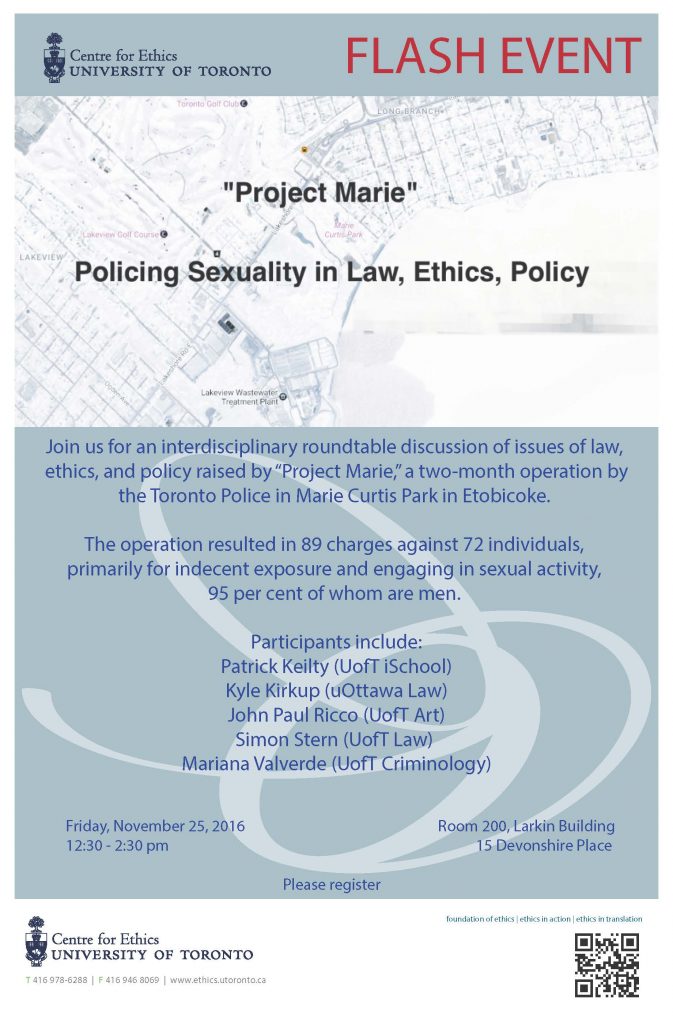 On November 25, 2016, the Centre for Ethics hosted an interdisciplinary roundtable discussion of issues of law, ethics, and policy raised by “Project Marie,” a two-month operation by the Toronto Police in Marie Curtis Park in Etobicoke. The operation resulted in 89 charges against 72 individuals, primarily for indecent exposure and engaging in sexual activity, 95 per cent of whom are men. [CBC News]
On November 25, 2016, the Centre for Ethics hosted an interdisciplinary roundtable discussion of issues of law, ethics, and policy raised by “Project Marie,” a two-month operation by the Toronto Police in Marie Curtis Park in Etobicoke. The operation resulted in 89 charges against 72 individuals, primarily for indecent exposure and engaging in sexual activity, 95 per cent of whom are men. [CBC News]Participants included Patrick Keilty (UofT iSchool), Kyle Kirkup (uOttawa Law), John Paul Ricco (UofT Art), Simon Stern (UofT Law), and Mariana Valverde (UofT Criminology).
See the event’s eForum for an accompanying mini-symposium featuring John Paul Ricco, Patrick Keilty & Kyle Kirkup.
12:30 PM - 02:30 PM
Room 200, Larkin Building
15 Devonshire Place - Mon, Nov 21, 2016
Author Meets Critics
Arthur Ripstein: Private WrongsArthur Ripstein
University Professor of Law and Philosophy
University of TorontoPanel:
04:00 PM - 06:00 PM
Rahul Kumar, Philosophy, Queen’s University and Visiting Scholar, Centre for Ethics
Clifton Mark, Postdoctoral Fellow and Deputy Director, Centre for Ethics
Dan Priel, Osgoode Law School
Room 200, Larkin Building
15 Devonshire Place - Wed, Nov 16, 2016
Ethics at Noon
Rahul Kumar: Saving Lives and Statistical DeathsSaving Lives and Statistical Deaths
Rahul Kumar
12:00 PM - 02:00 PM
Department of Philosophy, Queen’s University
Executive Editor, Canadian Journal of Philosophy
Room 200, Larkin Building
15 Devonshire Place - Mon, Nov 14, 2016
Perspectives on Ethics
Harry Brighouse: Obligations Under non-Ideal Circumstances: The Case of Tenure-line ProfessorsObligations Under non-Ideal Circumstances: The Case of Tenure-line Professors
Harry Brighouse
Department of Philosophy
Department of Education Policy Studies
University of Wisconsin-MadisonCo-sponsored by OISE Social Justice
Abstract:
04:00 PM - 06:00 PM
Professor Brighouse will provide an overview of the role of elite colleges and universities in society. He will argue that, far from being engines of social mobility, they contribute to unjust inequality of opportunity. Professors at such institutions are unavoidably implicated and complicit in this role. He will argue for reforms in the role of professors at elite colleges and university and, more radically, that even in the absence of such reform individual professors are obliged to make considerable changes in their professional activities, even at considerable risk to their professional advancement.
Room 200, Larkin Building
15 Devonshire Place - Fri, Nov 11, 2016
Political Theory Research Workshop
Political Theory Research WorkshopStarting with Rhetoric
Simon Lambek
03:00 PM - 04:30 PM
Room 200, Larkin Building
15 Devonshire Place - Fri, Nov 4, 2016
Philosophy of Criminal Procedure ConferencePhilosophy of Criminal Procedure Conference
Vincent Chiao, Faculty of Law, University of Toronto
12:00 AM - 11:59 PM
Chad Flanders, St. Louis School of Law
Stephen Galoob, Tulsa Law
Osgoode Law School
4700 Keele St - Wed, Nov 2, 2016
Ethics at Noon
Vida Panitch: Liberalism, Commodification, and JusticeLiberalism, Commodification, and Justice
Vida Panitch
12:00 PM - 02:00 PM
Department of Philosophy, Carleton University
Room 200, Larkin Building
15 Devonshire Place - Fri, Oct 28, 2016
Political Theory Research Workshop
Political Theory Research WorkshopIdealizing Humanitas in Cicero’s De Oratore, or, why Herbert O. Morrison was wrong
Taylor Putnam
03:00 PM - 04:30 PM
Room 200, Larkin Building
15 Devonshire Place - Tue, Oct 25, 2016
Events on Campus
Living in the Digital Shadows of WarPeople who live far from war zones and repressive states may nevertheless be connected to them through their use of digital communication technologies. This panel will discuss people’s digital vulnerabilities to conflict and repression, and possible responses to those vulnerabilities.
Debates over cyber security usually focus on threats to military assets, critical infrastructure, and intellectual property, and ignore the individuals who might be at risk. These risks take different forms. Activists around the world are subject to hacking and surveillance, and they participate in propaganda wars on Twitter and Facebook. Alienated young people are targeted for radicalization and recruitment. And people who simply want to communicate with loved ones in repressive states and conflict zones may find that these communications are sources of sorrow or danger rather than solace.
The panelists will discuss their recent research and reporting on these issues, with an emphasis on the Syrian context. The panel will also serve as the launch of a SSHRC-funded project, The War is Just a Click Away, which includes journalism and expert commentary published by OpenCanada.org.
04:30 PM - 06:00 PM
315 Bloor Street West, 1st Floor Boardroom/Round Room/Library
315 Bloor Street West - Wed, Oct 19, 2016
Ethics at Noon
Laurens van Apeldoorn: Hobbes on sovereignty and the unity of the stateHobbes on sovereignty and the unity of the state
Laurens van Apeldoorn
12:00 PM - 02:00 PM
Department of Philosophy
University College The Hague
Leiden University
The Netherlands
Room 200, Larkin Building
15 Devonshire Place - Fri, Oct 14, 2016
Political Theory Research Workshop
Political Theory Research WorkshopIndigenous People and the Legitimacy of Criminal Justice in Canada
Teddy Harrison
03:00 PM - 04:30 PM
Doctoral Fellow, Centre for Ethics
Room 200, Larkin Building
15 Devonshire Place - Wed, Oct 5, 2016
Ethics at Noon
Johann Frick – Ethics at NoonOn the Survival of Humanity
Johann Frick
12:00 PM - 02:00 PM
Department of Philosophy and University Center for Human Values
Princeton University
Room 200, Larkin Building
15 Devonshire Place - Fri, Sep 30, 2016
Political Theory Research Workshop
Political Theory Research WorkshopAristotle, Equity, and Democracy
Daniel Schillinger
03:00 PM - 04:30 PM
Room 200, Larkin Building
15 Devonshire Place - Wed, Sep 28, 2016
Ethics at Noon
Richard Moon – Ethics at NoonRichard Moon
12:00 PM - 02:00 PM
Professor of Law
University of Windsor
Room 200, Larkin Building
15 Devonshire Place - Mon, Sep 26, 2016
Perspectives on Ethics
Sarah Stroud – Seminar SeriesRelational Wrongs and the Demands of Justice
Sarah Stroud
Department of Philosophy
McGill UniversityCo-sponsored by Jackman Chair
04:00 PM - 06:00 PM
Room 200, Larkin Building
15 Devonshire Place - Fri, Sep 16, 2016
Perspectives on Ethics
Shmulik Nili – Seminar SeriesIntegrity, Individual and Collective
Shmulik Nili
12:00 AM - 02:00 PM
Postdoctoral Fellow
Research School of the Social Sciences (School of Philosophy)
Australian National University
Room 200, Larkin Building
15 Devonshire Place - Wed, Aug 31, 2016
Ethics at Noon
Anca Gheaus – Ethics at Noon Biological parenthood: gestational, not genetic
Biological parenthood: gestational, not genetic Anca Gheaus
12:00 PM - 02:00 PM
Department of Law – Philosophy of Law
Universitat Pompeu Fabra, Barcelona
Room 200, Larkin Building
15 Devonshire Place - Sat, May 14, 2016
Events on Campus
Approaches to Public Goods: Solidarity and Social Justice 09:00 AM - 04:00 PM
Room 200, Larkin Building
15 Devonshire Place - Fri, May 13, 2016
Events on Campus
Approaches to Public Goods: Solidarity and Social JusticeSSHRC on Public Goods and Solidarity
The goal of this workshop is to propose innovative ways to respond to conflicts that arise from current practices of public goods distributions. In this workshop we aim to juxtapose two seemingly distinct strands of thought—solidarism as a political theory and perfectionism as an ethical theory—to examine the extent to which they are mutually-reinforcing and to highlight the strengths and vulnerabilities in each approach. Of more practical importance, we aim to contribute to debates among scholars, citizens and policy makers by providing a more compelling rationale for public goods. We also hope to generate compelling solutions to concrete instances of inequalities that result from unjustifiable distributions of public goods. Participants are invited to draw on their respective areas of expertise in order to explore, conceptually and practically, solutions to social and economic injustice.
With: Mara Marin, Charles Lesch, Waheed Hussein, Craig Borowiak, Thilo Schaefer, Margaret Khon, Rutger Claassen, Avigail Ferdman, Patrick Turmel, David Robichaud, Michael Kessler, Karel Martens, Avery Kolers, and Thad Williamson.
09:00 AM - 06:00 PM
Room 200, Larkin Building
15 Devonshire Place - Thu, May 5, 2016
Events on Campus
REASON AND AGENCY – Graduate Conference in Philosophy2016 Graduate Conference Program
REASON AND AGENCY
The 16th Annual University of Toronto Graduate Conference in Philosophy
May 5 & 6, 2016SCHEDULE
Thursday, May 5, 2016
Jackman Humanities Building, (170 St. George St.), Room 100A9:30 – 10:00 Coffee and Snacks
10:00 – 11:00 ‘Towards an Ecological Libertarianism’ William Hornett (Sheffield)
Commentary: Aaron Henry & Parisa Moosavi (Toronto)11:15 – 12:15 ‘Some Puzzles about Reasons’ Zachary Blaesi (Texas, Austin) Commentary: Jonathan Payton (Toronto)
12:15 – 1:45 Lunch Break
1:45 – 2:45 ‘What ‘No’ Really Means’ Eleanor Gordon-Smith (Sydney) Commentary: Lisa McKeown (New School)
3:00 – 5:00 Keynote Address
‘Bradley’s Regress and a Problem in Action Theory’ Helen Steward (Leeds)
Commentary: Manish Oza (Toronto)5:00 – 7:00 Reception (all conference attendees invited)
Location: Jackman Humanities Building, Room 418Friday, May 6, 2016
Centre for Ethics, Larkin Building (15 Devonshire Place), Room 2009:30 – 10:00 Coffee and Snacks
10:00 – 11:00 ‘Deontological Evidentialism and the Principle that Ought Implies Can’ Luis Oliveira (UMass, Amherst)
Commentary: Emma McClure (Toronto)11:15 – 12:15 ‘Because I Said So’
Juan Piñeros Sanchez (Yale) Commentary: John Bunke (Toronto)12:15 – 1:45 Lunch Break
1:45 – 2:45 ‘Reason, Reasoning, and Weakness of Will’ Jeremiah Carey (Berkeley)
Commentary: Mason Westfall & Rory Harder (Toronto)3:00 – 5:00 Keynote Address
‘Retrospection’ Kieran Setiya (MIT)
Commentary: Benjamin Wald (Toronto)6:00– 8:00 Conference Dinner (for invited guests)
Location: The Host (14 Prince Arthur Ave.)Abstracts
‘Toward an Ecological Libertarianism – A Defence of Agency Incompatibilism’,
William Hornett
In this paper I will defend Helen Steward’s agency incompatibilism by utilising ecological notions in J.J. Gibson’s work on perception and action. Steward uses sub-intentional actions as counterexamples to a Davidsonian picture of action and presents a competing picture which identifies actions as bodily movements controlled by the agent – this forms the basis for her libertarianism as agential control requires a genuinely open future. Her response to Mele’s luck objection to libertarianism is that an act of control is predicated on facts about agent’s gearing toward the action being integrated into the agent’s history prior to the action. She allows prior facts to constrain actions and retains her libertarianism by arguing that the agent’s freedom lies in their capacity to refrain from an action-type or contour their execution of an action differently than they in fact did. However, when she later on denies that all actions are done for reasons, she thereby denies that these non-rational actions have explanations at all. This undermines her response to the luck objection with regards sub- intentional actions, because their lacking prior reasons is now a reason to say they are not free. This undermines her original argument. I propose that she need not make that concession and can instead use Gibson’s ecological approach to define sub-intentional actions as affordance-responsive behaviour which shares a structural similarity to the way rational actions are reasons-responsive. I then suggest the outline, based on the paper’s previous discussions, of what I call an ecological conception of freedom: to exercise free will is for an animal to intentionally execute controlled responses to environmental changes perceived in virtue of the animal’s tacit understanding of its own bodily structure, capacities, and cognitive architecture.‘Some Puzzles About Reasons’,
Zachary Blaesi
Many philosophers working in metaethics take for granted that the predicates “is a reason for” and “counts in favor of” express or require a common relation, the favoring-relation, which holds of considerations and actions. However, this view encounters a puzzle. For example, suppose Jones owes Smith some money and thus has a reason to pay Smith. In paying Smith, Jones does what he has reason to do, and what he does is an action, a concrete particular. But as H. A. Prichard first noted, this concrete particular does not exist until Jones acts. So, it must be a mistake to think that actions are relata in the favoring-relations that hold before agents act. Furthermore, as Roderick Chisholm pointed out, though Jones does what he has reason to do by paying Smith, he could have performed any other number of specific actions while still doing exactly what he has reason to do. This also demands an explanation. I call the Prichard-Chisholm puzzle the combined task of explaining what is favored in a favoring-relation and how it relates to particular actions. In my paper, I develop this puzzle in detail and propose a solution.‘What ‘No’ really means’,
Eleanor Gordon-Smith
One way we can exercise our agency is by using words to set the boundaries of what other people may permissibly do to us. We can say “no”. What sort of speech act is a refusal? Rae Langton’s anti-pornography argument claims it is an Austinian ‘illocution’, and therefore that it depends on ‘uptake’ – recognition from its addressee – for its success. Pornography, goes the argument, may teach that women who say “no” in sexual settings intend to gesture at modesty or to titillate instead of to refuse. This would cause widespread failures of uptake and render some women unable to use the word “no” to perform a refusal; it would rob them of one way to use words to exercise their agency. In this paper I argue that refusal does not require uptake to succeed. At least one important function of a refusal is that it marks a boundary around the refuser and declares all conduct over that line to be boundary-crossing. This function is not directed at any agent. It is simply the conjuring of a fact, and so does not depend on uptake by the addressee for its success. This means it can survive an uptake failure like the one Langton describes. I show that this function is separate from – and in fact, prior to – the secondary function of a refusal, which is to deliver a specific prohibition to a specific person. It is a speaker’s agency – not any epistemic facts about her interlocutors – that lets her use words like “no” to wield the normative power of setting her own boundaries. As a final argument in favour of this account of refusal, I show that it mirrors our pre-theoretic intuition that consent does not depend on uptake either.‘Deontological Evidentialism and the Principle that Ought Implies Can’,
Luis Oliveira
Deontological evidentialism is the claim that S ought to form or maintain S’s beliefs in accordance with S’s evidence. One promising argument for this view turns on the premise that consideration c is a normative reason for S to form or maintain a belief that p only if c is evidence that p is true. In this paper, I discuss the relation between a recent argument for this key premise—offered separately by Nishi Shah (2006) and Ward E. Jones (2009)—and the principle that ought implies can. I argue that anyone who antecendently accepts or rejects this principle already has a reason to resist either this argument’s premises or its role in support of deontological evidentialism.‘Because I Said So’,
Juan Piñeros Sanchez
Stephen Darwall has argued that second-personal normativity drives a wedge between practical and theoretical rationality: whereas it plays a fundamental role in some areas of the practical domain, it can play at most a subordinate role in the theoretical one. Darwall’s main argument for this view relies on a picture of theoretical reasoning as defined by relations between beliefs about determinate matters of fact. Partly by questioning this picture, I hope to show that second-personal normativity plays as fundamental a role in some areas of the theoretical domain as well. My central argument against Darwall is based on an analysis of what I call relationships of ‘expectational trust’, where a person asks us to believe they will do something that is in their power. Such relations, I argue, can give rise to reasons that are theoretical and fundamentally second-personal. The result is a picture of theoretical rationality that allows for the kinds of rich second-personal relations that authors like Darwall and Michael Thompson have argued are present in the practical domain.‘Reason, Reasoning, and Weakness of Will’,
09:30 PM - 05:00 PM
Jeremiah Carey
In Plato’s Protagoras, Socrates defends an intellectualist moral psychology –he argues that all action is motivated by evaluative belief. Plato himself seems to reject this view in the Republic, claiming that there are three distinct sources of motivation, reason, spirit, and appetite. Though I don’t go into the details of this historic dialectic, I want to defend Plato’s side of the general debate. I begin by arguing that weak-willed action could not possibly be an expression of practical reason. Thus, if weak-willed action is possible, we must have a way of acting intentionally i.e., for reasons) in addition to our faculty of reason. After showing how this argument holds up against approaches from Michael Bratman and Pamela Hieronymi, I say briefly how I think we should respond to this argument – by accepting a new tripartite theory of motivation consisting of reason, desire, and will.
Room 100A, Jackman Humanities Building
170 St. George St. - Sat, Apr 30, 2016
Events on Campus
Graduate Associates Annual ConferenceGraduate Associates Annual Conference
08:00 AM - 06:00 PM
Room 200, Larkin Building
15 Devonshire Place - Fri, Apr 29, 2016
Events on Campus
Deus v. Machina – Graduate Conference at the Centre for EthicsGraduate Associates Annual Conference
http://graduateassociates.wix.com/conf2016
Keynote Address
“Thinking About Cognitive Scientists Thinking About Religion”
John Lardas Modern, Franklin and Marshall College
April 29th, 4- 6 PM
Room JH 100A, Jackman Humanities Building
Modern teaches classes in American religious history, literature, technology, and aesthetics. Modern is the author of The Bop Apocalypse: The Religious Visions of Kerouac, Ginsberg, and Burroughs (University of Illinois Press, 2001) and Secularism in Antebellum America (University of Chicago Press, 2011). Modern’s work has appeared in journals such as American Literary History,Social Text, Journal of the American Academy of Religion, Church History, Method & Theory in the Study of Religion as well as in a range of on-line venues. Modern’s work has been funded by the Woodrow Wilson Foundation, the National Endowment for the Humanities, and the Social Science Research Council. He is currently at work on two projects: “The Religion Machine, or; A Particular History of Cognitive Science” and “Akron Devo Divine: A Delirious History of Rubber At the End of the World.” Modern is an editor-at-large for The Immanent Frame. He was also co-curator of Frequencies: A Collaborative Genealogy of Spirituality and is currently co-editor of Class 200: New Studies in Religion (both with Kathryn Lofton)
 08:00 AM - 06:00 PM
08:00 AM - 06:00 PMThis lecture offers a genealogical perspective on the hyperactive agency detection device (HADD), a central concept in the contemporary cognitive science of religion. HADD is a machine of sorts, inside your head right now. Indeed, HADD is the machine that makes your prayers possible. It is a prayer machine by any other name. It scans the horizon for movement and pattern and alerts us to forces of otherness, variously construed. It is the machine that runs the programs of prayer, of sensing God as a fully realized agent. It is on all of the time, a form of troubleshooting the lines of transmission between you and what is on the other side of the screen. And it is the thing, this machine—for if we are talking about science we must be talking about the talking about materiality—that is said to offer some purchase on the phenomena of religion.
Room 200, Larkin Building
15 Devonshire Place - Fri, Apr 15, 2016
Events on Campus
Joint Conference Centre de recherche en éthique (CRÉ), UofM and Centre for Ethics, UofT 09:30 AM - 02:20 PM
Room 200, Larkin Building
15 Devonshire Place - Thu, Apr 14, 2016
Events on Campus
Joint Conference Centre de recherche en éthique (CRÉ), UofM and Centre for Ethics, UofT 01:00 PM - 05:30 PM
Room 200, Larkin Building
15 Devonshire Place - Wed, Apr 13, 2016
Ethics at Noon
Ethics at Noon – Cristina RodriguezPresidential Power and the Role of Discretion in Immigration
Cristina Rodriguez
12:00 PM - 02:00 PM
Leighton Homer Surbeck Professor of Law
Yale Law School
Visiting Scholar, Centre for Ethics (2015-16)

Room 200, Larkin Building
15 Devonshire Place - Fri, Apr 8, 2016
Political Theory Research Workshop
Political Theory Research Workshop 02:00 PM - 03:30 PM
Room 200, Larkin Building
15 Devonshire Place - Wed, Apr 6, 2016
Ethics at Noon
Ethics Hour – Andrew Franklin-Hall – CANCELLEDAndrew Franklin-Hall
12:00 PM - 02:00 PM
Department of Philosophy
University of Toronto
Room 200, Larkin Building
15 Devonshire Place - Mon, Apr 4, 2016
Perspectives on Ethics
Seminar Talk – Cecile Fabre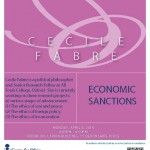
Economic Sanctions
04:00 PM - 06:00 PM
Cecile Fabre
All Souls College
Oxford
Room 200, Larkin Building
15 Devonshire Place - Fri, Apr 1, 2016
Political Theory Research Workshop
Political Theory Research Workshop 02:00 PM - 03:30 PM
Room 200, Larkin Building
15 Devonshire Place - Wed, Mar 23, 2016
Ethics at Noon
Ethics at Noon – William ConklinA Parable, the Leap and the Written Legal Language
Bill Conklin, F.R.S.C.
12:00 PM - 02:00 PM
Professor,
Windsor Law
http://ssrn.com/author=89895
Room 200, Larkin Building
15 Devonshire Place - Fri, Mar 18, 2016
Political Theory Research Workshop
Political Theory Research WorkshopDr. Andrea Cassatella
02:00 PM - 03:30 PM
Room 200, Larkin Building
15 Devonshire Place - Mon, Mar 14, 2016
Perspectives on Ethics
Seminar Talk – Christine KorsgaardChristine Korsgaard
04:00 PM - 06:00 PM
Department of Philosophy
Harvard University
Room 200, Larkin Building
15 Devonshire Place - Fri, Mar 11, 2016
Political Theory Research Workshop
Political Theory Research Workshop 02:00 PM - 03:30 PM
Room 200, Larkin Building
15 Devonshire Place - Wed, Mar 9, 2016
Ethics at Noon
Ethics at Noon – Julia NefskyIndividual Consumption and Collective ImpactDepartment of Philosophy, UofT12:00 PM - 02:00 PM
Room 200, Larkin Building
15 Devonshire Place - Fri, Mar 4, 2016
Political Theory Research Workshop
Political Theory Research WorkshopPresenter: Rebecca Kingston
12:00 PM - 02:00 PM
Room 340, Larkin Building
15 Devonshire Place - Fri, Feb 26, 2016
Political Theory Research Workshop
Political Theory Research WorkshopDr. Clifford Orwin
02:00 PM - 03:30 PM
UofT
Room 200, Larkin Building
15 Devonshire Place - Mon, Feb 22, 2016
Perspectives on Ethics
Seminar Talk – Ebrahim MoosaDilemmas in the Prohibition of Slavery in Islam: How the Islamic States Gets Away with Slavery
04:00 PM - 06:00 PM
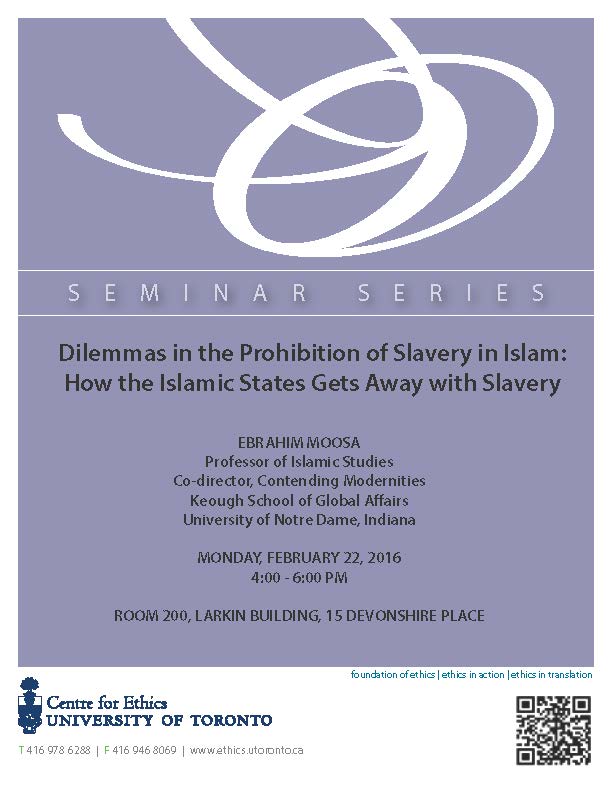
Ebrahim Moosa
Professor of Islamic Studies
Co-director, Contending Modernities program
Keough School for Global Affairs
University of Notre Dame, Indiana
Room 200, Larkin Building
15 Devonshire Place - Fri, Feb 12, 2016
Political Theory Research Workshop
Political Theory Research WorkshopDr. Michaele Ferguson
02:00 PM - 03:30 PM
University of Colorado Boulder
Room 200, Larkin Building
15 Devonshire Place - Wed, Feb 10, 2016
Ethics at Noon
Ethics Hour – Jennifer NedelskyJennifer Nedelsky
12:00 PM - 01:30 PM
Department of Political Science
University of Toronto

Room 200, Larkin Building
15 Devonshire Place - Fri, Feb 5, 2016
Political Theory Research Workshop
Political Theory Research Workshop 02:00 PM - 10:30 AM
Room 200, Larkin Building
15 Devonshire Place - Fri, Jan 29, 2016
Political Theory Research Workshop
Political Theory Research WorkshopMichael Millerman
Beginning with HeideggerDiscussant: Professor Joseph Carens
If you would like to read the paper, please contact: teddy.harrison@mail.utoronto.ca
02:00 PM - 03:30 PM
Room 200, Larkin Building
15 Devonshire Place - Fri, Jan 29, 2016
Events on Campus
Identifying and Analyzing Gaps in Protection for Asylum Seekers from the Middle East: Recent Research and FindingsThe ongoing humanitarian crises in the Middle East are provoking large-scale refugee movements. Across neighbouring states and during transit, existing legal and policy frameworks are proving incapable of securing safety and protection for these refugees. While reforms are urgently needed, any structural or local-level proposals should take into account the voices of refugees as well as firsthand reports from the field.
This University of Toronto panel aims to contribute productively to the conversation on durable solutions.
Panel presenters:
Craig D. Smith, PhD candidate, Department of Political Science, University of Toronto
Gulay Kilicaslan, PhD candidate, Department of Sociology, York University
Nicholas A. R. Fraser, PhD candidate, Department of Political Science, University of Toronto
Raluca Bejan, PhD candidate, Faculty of SociaI Work, University of TorontoSponsors:
Canadian Association of Refugee and Forced Migration Studies (CARFMS)
Centre for EthicsConveners:
12:00 PM - 02:00 PM
Alizee Bodson (Diaspora Studies)
Stephanie J. Silverman (Centre for Ethics) University of Toronto
Room 200, Larkin Building
15 Devonshire Place - Thu, Jan 28, 2016
Author Meets Critics
Blood Oil: Tyrants, Violence, and the Rules that Run the WorldBlood Oil: Tyrants, Violence, and the Rules that Run the World
Leif Wenar

- Powerful explanations of how our everyday shopping puts money into the pockets of many of the most merciless men on earth
- Discovers how today’s natural resource trade runs on the same rule that once made the slave trade, colonialism, apartheid and genocide legal
- Describes the way the West can lead the world the next step forward in history through a peaceful resource revolution
Leif Wenar holds the Chair of Philosophy and Law at King’s College London. He earned his degrees in Philosophy from Stanford and from Harvard, where he worked with John Rawls and with Robert Nozick. He has been a Visiting Professor at Princeton and at Stanford, and has been a Fellow of the Carnegie Council Program in Justice and the World Economy.Register online at: http://munkschool.utoronto.ca/event/19703
07:00 PM - 08:30 PM
B115 – The Observatory Building
315 Bloor Street West - Wed, Jan 27, 2016
Events on Campus
Debating Skills Workshop with Teddy HarrisonThe Ethics, Society & Law Students’ Association is excited to be hosting its first workshop of the year led by special guest, Teddy Harrison. All are welcome! Refreshments will be served and no registration is necessary.
Teddy Harrison is a PhD student in political science with experience in competitive debating. He is a two-time Winter Carnival champion, North American finalist and Canadian British Parliamentary National Finalist. He is also the convenor of the 2007-8 World University Debating Championship and has extensive experience in coaching and teaching debating workshops.
04:00 PM - 06:00 PM
Room 200, Larkin Building
15 Devonshire Place - Wed, Jan 27, 2016
Ethics at Noon
Ethics at Noon – Andrew SepielliAndrew Sepielli
12:00 PM - 02:00 PM
Department of Philosophy
University of Toronto-Mississauga
Room 200, Larkin Building
15 Devonshire Place - Wed, Jan 20, 2016
Public Issues Forum
Public Issues Forum: Resource Development and Indigenous PeoplesResource Development and Indigenous Peoples
The panelists are:
Douglas Sanderson, Faculty of Law, UofT
Rauna Kuokkanen, Departments of Aboriginal Studies and Political Science, UofT
David Parker, CIRDI Vancouver
The Hon. Bob Rae, Lawyer, Political Leader, and Advisor to the Matawa Chiefs Tribal CouncilModerators:
Stephen Toope, Director, Munk School of Global Affairs
Peggy Kohn, Acting Director, Centre for EthicsCo-sponsored by:
Munk School of Global Affairs
Ethics, Society and Law Program, Trinity College
Centre for Aboriginal InitiativesPlease register online at: http://munkschool.utoronto.ca/event/19670
04:00 PM - 06:00 PM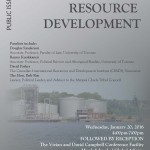
Indigenous Peoples and Resource Development
Vivian and David Campbell Conference Facility
1 Devonshire Place - Fri, Jan 15, 2016
Perspectives on Ethics
Seminar Talk – Charles MillsCharles W. Mills
02:00 PM - 04:00 PM
John Evans Professor of Moral and Intellectual Philosophy
Northwestern University
Room 200, Larkin Building
15 Devonshire Place - Fri, Jan 15, 2016
Perspectives on Ethics, Events on Campus
Under-represented Philosophy Panel Discussion with Charles W. MillsAcademic Philosophy and the Question of Diversity: Perspectives on a Strange Uniformity
Panelists:
Zara Bain, PhD candidate, University of Bristol & Cardiff
Shyam Ranganathan, Department of Philosophy, York University
Frank Cunningham, Departments of Philosophy and Political Science (Emeritus)Clinton Debogorski, PhD candidate and President of Under-represented Philosophy
12:00 PM - 01:30 PM
Room 200, Larkin Building
15 Devonshire Place - Wed, Jan 13, 2016
Ethics at Noon
Ethics at Noon – Mara Marin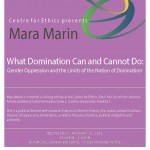
What Domination Can and Cannot Do.
Gender Oppression and the Limits of the Notion of DominationMara Marin
12:00 PM - 01:00 PM
Go-In Post-doctoral Fellow, Exzellenzcluster Normative Orders, Goethe-Universität Frankfurt
Visiting Scholar, Centre for Ethics
Room 200, Larkin Building
15 Devonshire Place - Fri, Dec 11, 2015
Political Theory Research Workshop
Political Theory Research WorkshopTBD
02:00 PM - 03:30 PM
Room 200, Larkin Building
15 Devonshire Place - Wed, Dec 9, 2015
Ethics at Noon
Ethics at Noon – Clifton MarkDignity as an Egalitarian Value
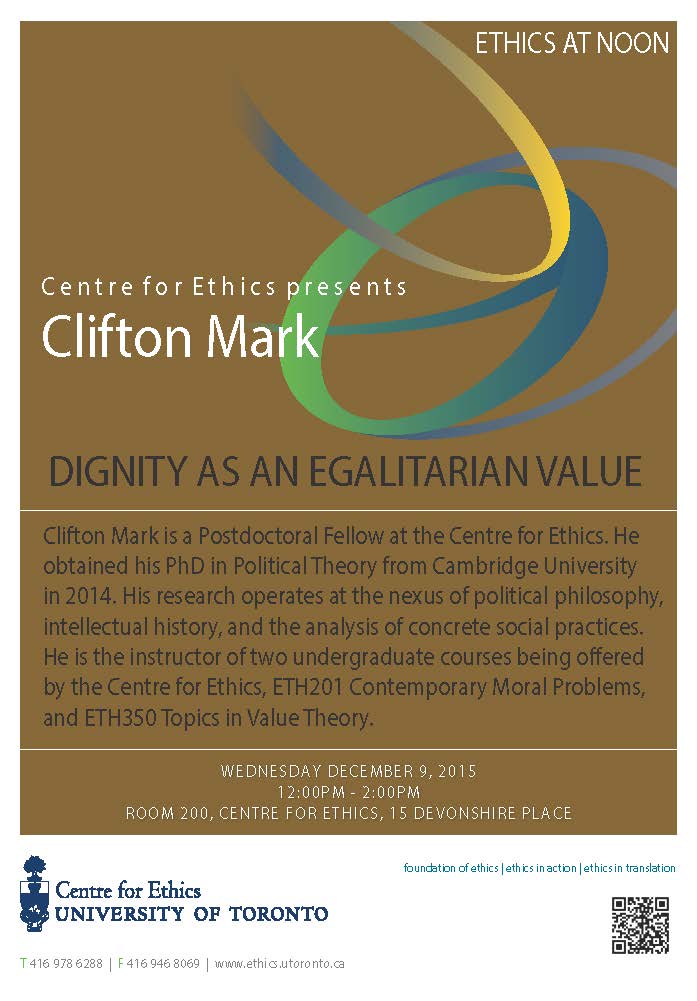
Clifton Mark
12:00 PM - 02:00 PM
Postdoctoral Fellow, Centre for Ethics
Room 200, Larkin Building
15 Devonshire Place - Fri, Dec 4, 2015
Political Theory Research Workshop
Political Theory Research WorkshopIgor Shoikhedbrod: “The Ontology of Social Being and the Normative Argument for Legality: Marx, Lukacs and Beyond”
Discussant: Dr. Alan Brudner (Emeritus Professor, Faculty of Law and Political Science
02:00 PM - 03:30 PM
Room 200, Larkin Building
15 Devonshire Place - Fri, Nov 27, 2015
Political Theory Research Workshop
Political Theory Research WorkshopDavid Polansky: “The Peuple as nation or political community?”
Discussant: TBD
02:00 PM - 03:30 PM
Room 200, Larkin Building
15 Devonshire Place - Wed, Nov 25, 2015
Ethics at Noon
Ethics at Noon – Lauren BialystokLauren Bialystok
Assistant Professor
Department of Social Justice Education
OISE, University of TorontoThis talk deals with parental dissent in the public education system in Ontario.
12:00 PM - 02:00 PM
Room 200, Larkin Building
15 Devonshire Place - Thu, Nov 19, 2015
Events on Campus
Community Research Partnership in Ethics WorkshopCRPE program workshop
Thursday, November 19, 2015.
Each student will be given the opportunity to present initial findings and hypotheses as well as future research directions.
CRPE Nov Workshop Agenda
10:00 AM - 01:00 PM
Room 200, Larkin Building
15 Devonshire Place - Mon, Nov 16, 2015
Perspectives on Ethics
Seminar Talk – Iwao HiroseThe disvalue of death and its temporal location
04:00 PM - 06:00 PM
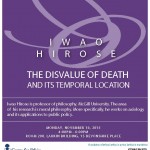
Iwao Hirose
Department of Philosophy
McGill University
Room 200, Larkin Building
15 Devonshire Place - Fri, Nov 13, 2015
Political Theory Research Workshop
Political Theory Research WorkshopJaby Mathew: “TBD”
02:00 PM - 03:30 PM
Room 200, Larkin Building
15 Devonshire Place - Wed, Nov 11, 2015
Ethics at Noon
Ethics at Noon – Noya RimaltWhen Rights Don’t Talk: Abortion Law and the Politics of Compromise
12:00 PM - 02:00 PM
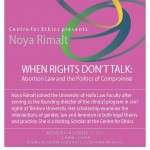
Noya Rimalt
Law, University of Haifa
Room 200, Larkin Building
15 Devonshire Place - Fri, Nov 6, 2015
Political Theory Research Workshop
Political Theory Research WorkshopMatt Hamilton: “Movement Thought: Aesthetics and Politics”
Discussant: TBD
02:00 PM - 03:30 PM
Room 200, Larkin Building
15 Devonshire Place - Wed, Nov 4, 2015
Ethics at Noon
Ethics at Noon – Lukas MeyerLegitimate Expectations and Climate Ethics
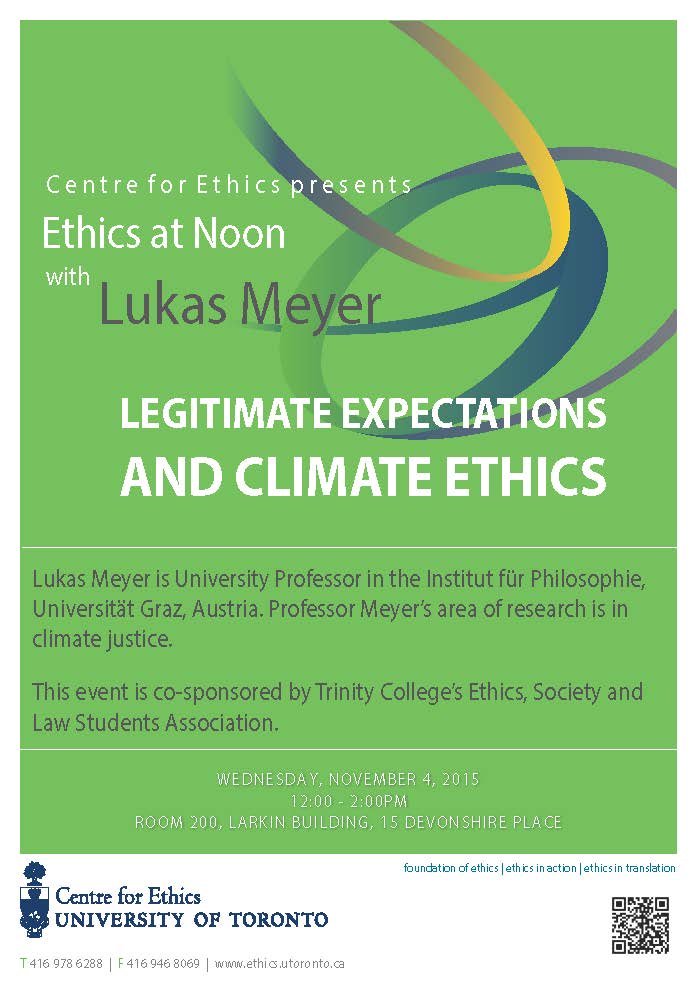
Lukas Meyer
Universität Graz
Institut für Philosophie
Austriahttp://dk-climate-change.uni-graz.at/
http://www.uni-graz.at/lukas.meyer/index.php/home
Event co-sponsored by Trinity College’s Ethics, Society and Law Students Association
12:00 PM - 02:00 PM
Room 200, Larkin Building
15 Devonshire Place - Mon, Nov 2, 2015
Perspectives on Ethics
CANCELLED – Seminar Talk – Bonnie HonigWhat kind of thing is land? Hannah Arendt’s object relations
Bonnie Honig
04:00 PM - 06:00 PM
Professor of Modern Culture and Media
Brown University
Room 200, Larkin Building
15 Devonshire Place - Thu, Oct 29, 2015
Public Issues Forum
Public Issues Forum: Sex Education Curriculum and Controversy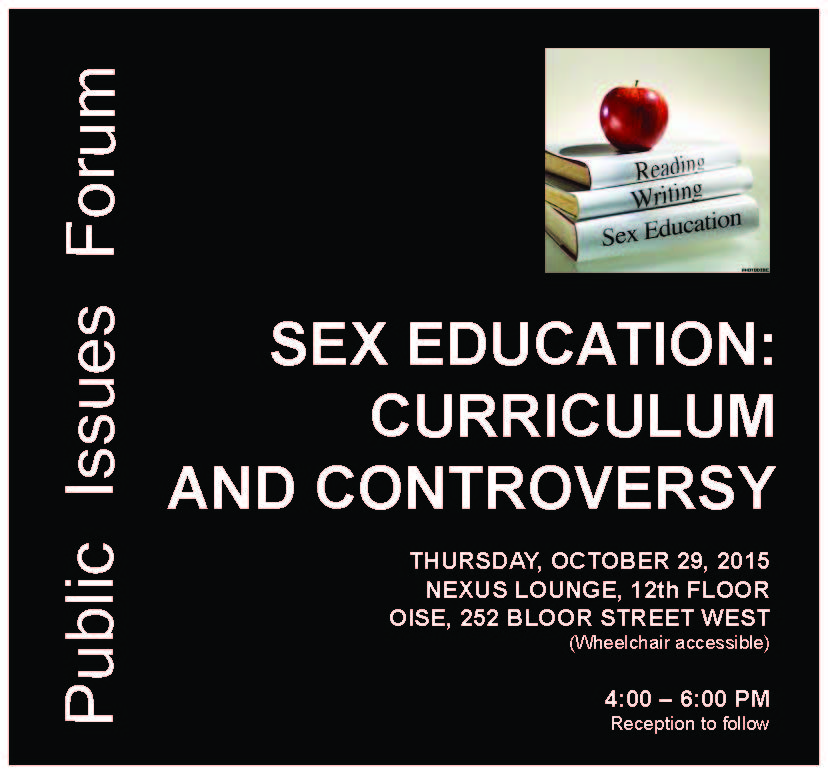 Perspectives from academic experts and community leaders
Perspectives from academic experts and community leaders- David Rayside, Professor Emeritus (UT), Political Science, former Director of the Mark Bonham Centre for Sexual Diversity Studies, Activist
- Kathy Bickmore, Professor, Curriculum Studies (OISE/UT)
- Rabea Murtaza, Founder of Muslims for Ontario’s Health and Physical Education Curriculum
- Lauren Bialystok, Assistant Professor, Department of Social Justice Education, OISE, University of Toronto, and Visiting Scholar at the Centre for Ethics
NEXUS LOUNGE, 12th floor,
04:00 PM - 06:00 PM
OISE, 252 Bloor Street West (wheelchair accessible)
Ontario Institute for Studies in Education
252 Bloor Street West - Wed, Oct 28, 2015
Ethics at Noon
Ethics at Noon – Avigail FerdmanYou Can’t Have it Both Ways: Contemporary Liberalism and ‘Either/Or’ Decisions
Avigail Ferdman
12:00 PM - 02:00 PM
Hebrew University of Jerusalem, School of Public Policy
Visiting Scholar, Centre for Ethics (2015-16)
Room 200, Larkin Building
15 Devonshire Place - Mon, Oct 26, 2015
Author Meets Critics
Book LaunchImmigration Detention: The Migration of a Policy and Its Human Impact
Routledge, 2015
Edited by Amy Nethery, Stephanie Silverman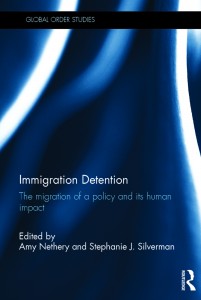 Panelists:Joseph Carens, Political Science, UofTCo-sponsored by:Canadian Association for Refugee and Forced Migration Studies (CARFMS)02:00 PM - 04:00 PM
Panelists:Joseph Carens, Political Science, UofTCo-sponsored by:Canadian Association for Refugee and Forced Migration Studies (CARFMS)02:00 PM - 04:00 PM
Room 200, Larkin Building
15 Devonshire Place - Fri, Oct 23, 2015
Political Theory Research Workshop
Political Theory Research WorkshopDorina Verli: “Rousseau’s Theory of Justice and the State as Democratic Assembly”
Discussant: Scott Dodds
02:00 PM - 03:30 PM
Room 200, Larkin Building
15 Devonshire Place - Mon, Oct 19, 2015
Perspectives on Ethics
Seminar Talk – David MillerThe Duty to Rescue Boat People
David Miller
04:00 PM - 06:00 PM
Professor of Political Theory
Nuffield College, Oxford
Room 200, Larkin Building
15 Devonshire Place - Fri, Oct 16, 2015
Political Theory Research Workshop
Political Theory Research WorkshopTBD
02:00 PM - 03:30 PM
Room 200, Larkin Building
15 Devonshire Place - Fri, Oct 9, 2015
Political Theory Research Workshop
Political Theory Research WorkshopDan Schillinger: “Aristotle on Luck, Character and Politics”
Discussant: Dr. Laura Rabinowitz
02:00 PM - 03:30 PM
Room 200, Larkin Building
15 Devonshire Place - Thu, Oct 8, 2015
Perspectives on Ethics
Seminar Talk – Anne PhillipsAnne Phillips
04:00 PM - 06:00 PM
London School of Economics and Political Science
Room 200, Larkin Building
15 Devonshire Place - Wed, Oct 7, 2015
Events on Campus
Law, Urbanity & Justice Research Group 12:00 PM - 02:00 PM
Room 200, Larkin Building
15 Devonshire Place - Fri, Oct 2, 2015
Events on Campus
Religion and citizenship in a post-secular societySymposium sponsored by:
Centre for Ethics, University of Toronto
The Institute for Studies in Global Prosperity
Centre for Philosophy, Religion, and Social Ethics, Institute for Christian Studies
Trudeau FoundationSpeakers:
Prof. Simone Chambers (University of California)
Prof. Phil Triadafilopoulos (University of Toronto)
Prof. Ronald A. Kuipers (Institute for Christian Studies)
Prof. Ingrid Mattson (University of Western Ontario)
Prof. Howard Adelman (York University)
Dr. Mary Jo Leddy (Regis College; Romero House)
Dr. Benjamin Schewel (University of Virginia)ReligionandCitizenship-DraftProgram-Sept152015
Keynote lecture:
Prof Armando Salvatore (McGill University)
“Religion, citizenship, and the challenge of transnationalism: Historical roots, convergences and divergences”Seating is limited, please register
09:00 AM - 05:00 PM
Room 200, Larkin Building
15 Devonshire Place - Wed, Sep 30, 2015
Ethics at Noon
Ethics at Noon – John Bishop Corporate involvement in the creation of global sustainability norms: a theoretical perspective
Corporate involvement in the creation of global sustainability norms: a theoretical perspectiveJohn Bishop
12:00 PM - 02:00 PM
Professor, Business Administration Program
Trent University
Peterborough, ON
Room 200, Larkin Building
15 Devonshire Place - Mon, Sep 21, 2015
Perspectives on Ethics
Panel Discussion "The Ethics of Immigration"Joseph Carens
Department of Political SciencePanelists:
Ronald Beiner (Political Science)
Stephanie Silverman (SSHRC, post-doc)
Audrey Macklin (Law)For more information: Global Migration Research Institute interview with Joseph Carens
04:00 PM - 06:00 PM
Room 200, Larkin Building
15 Devonshire Place - Wed, Sep 16, 2015
Ethics at Noon
Ethics at Noon – Anna SuGovernment Involvement in Reforming Religions
Anna Su
Faculty of Law, University of TorontoAnna Su’s primary areas of research include the law and history of international human rights law, U.S. constitutional law (First Amendment), and law and religion. Her research has appeared in the Vanderbilt Law Review, the International Journal of Constitutional Law and the Journal of the History of International Law.
12:00 PM - 02:00 PM
Room 200, Larkin Building
15 Devonshire Place - Wed, Jun 24, 2015
Ethics at Noon
Ethics at Noon – Jörn LamlaGoverning Privacy by Digital Reterritorialization and the Reconfiguration of Democracy
Jörn Lamla, Department of Scociology, Faculty of Social Sciences, University of Kassel. His research interests include social theory, the relation of consumer society and democracy, citizenship and issues of privacy in the digital world.
12:00 PM - 02:00 PM
Room 200, Larkin Building
15 Devonshire Place - Thu, Apr 30, 2015
Events on Campus
15th Annual Philosophy Graduate ConferencePerspectives on the First Person
09:30 AM - 03:30 PM
Room 200, Larkin Building
15 Devonshire Place - Fri, Apr 24, 2015
Ethics at Noon
Robyn Sampson Ethics at Noon“Embodied Borders: The Ethical Dilemmas of Alternatives to Immigration Detention”
Robyn Sampson
Research Fellow
Swinburne Institute for Social Research in Melbourne, AustraliaAbstract: This paper will analyse subtle yet significant developments in state bordering practices identified during work into alternatives to immigration detention and consider the ethical implications of these developments. Robyn draws attention to an emerging practice in Australia, Belgium and Hong Kong in which immigration detention is no longer solely a site of confinement but is also interpreted as a legal status which permits the individual migrant to reside in the community with freedom of movement while a migration issue is resolved. Through this status, she argue, individuals carry the border with them into the community of the nation. Sampson proposes the term embodied borders to encapsulate this (re)location of the border on to the bodies of migrants who are physically present but legally absent from the territory. She contends that the regulated use of this official non-presence highlights a departure from the traditional territory-sovereignty nexus. Further, such bordering policies, while exclusionary, do not result in a homogenous form of exception produced by sovereign authority alone. Rather, bordering involves dynamic and responsive forms of differentiation being lawfully produced and enacted in specific contexts by multiple actors. Such developments introduce new ethical dilemmas in the area of migration.
Dr Robyn Sampson is a Research Fellow at the Swinburne Institute for Social Research in Melbourne, Australia. Dr Sampson has a long-standing interest in issues of migration management, border control and forced migration. She is most well known for her research on alternatives to immigration detention, which was conducted in collaboration with the International Detention Coalition. That research has now been presented to over 50 countries and used by several governments, including Japan, Thailand, the Netherlands, Mexico and the United States, to develop alternatives to detention in their context. She has previously conducted research on the settlement of refugee youth in Australia, the impacts of long-term immigration detention post-release, and the deportation of refused asylum seekers who are seriously ill. Dr Sampson holds a PhD in Politics from La Trobe University.
12:00 PM - 02:00 PM
Room 200, Larkin Building
15 Devonshire Place - Thu, Apr 23, 2015
Public Lectures
Public Lecture – William Smith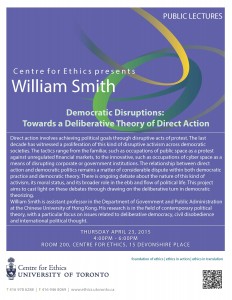 Democratic Disruptions: Towards a Deliberative Theory of Direct Action
Democratic Disruptions: Towards a Deliberative Theory of Direct ActionWilliam Smith
04:00 PM - 06:00 PM
Department of Government & Public Administration
The Chinese University of Hong Kong
Room 200, Larkin Building
15 Devonshire Place - Mon, Apr 20, 2015
Annual Ethics Conference with CREUMIn Montreal
09:00 AM - 05:00 PM
- Wed, Apr 15, 2015
Ethics at Noon
Ethics at Noon with David Horst
12:00 PM - 01:00 PM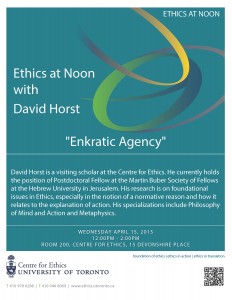 David Horst
David Horst
Visiting Scholar, Centre for Ethics
The Martin Buber Society of Fellows
The Hebrew University of Jerusalem
Room 200, Larkin Building
15 Devonshire Place - Mon, Apr 13, 2015
Public Lectures
Public Lecture – Thomas HurkaThomas Hurka
04:00 PM - 06:00 PM
Department of Philosophy, University of Toronto
Room 200, Larkin Building
15 Devonshire Place - Mon, Mar 30, 2015
Public Issues Forum
Physician Assisted Death: Where do we go from here?The Supreme Court of Canada has struck down the laws prohibiting physician-assisted
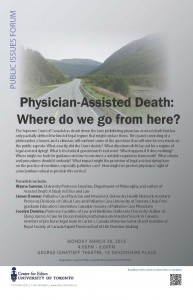 death but has only partially defined the kind of legal regime that might replace them. This panel, consisting of a philosopher, a lawyer, and a clinician, will confront some of the questions that will now be very much on the public agenda: What, exactly, did the Court decide? What directions did it lay out for a regime of legal assisted dying? What is the federal government’s task now? What happens if it does nothing? Where might we look for guidance on how to construct a suitable regulatory framework? What criteria and procedures should it embody? What impact might the provision of legal assisted dying have on the practice of medicine, especially palliative care? How might we protect physicians’ right of conscientious refusal to provide this service?
death but has only partially defined the kind of legal regime that might replace them. This panel, consisting of a philosopher, a lawyer, and a clinician, will confront some of the questions that will now be very much on the public agenda: What, exactly, did the Court decide? What directions did it lay out for a regime of legal assisted dying? What is the federal government’s task now? What happens if it does nothing? Where might we look for guidance on how to construct a suitable regulatory framework? What criteria and procedures should it embody? What impact might the provision of legal assisted dying have on the practice of medicine, especially palliative care? How might we protect physicians’ right of conscientious refusal to provide this service?Panelists include:
Wayne Sumner, University Professor Emeritus, Department of Philosophy, and author of Assisted Death: A Study in Ethics and Law
James Downar, Palliative Care Physician and Intensivist, University Health Network; Assistant Professor, Divisions of Critical Care and Palliative Care, University of Toronto; Chair, Postgraduate Education Committee, Canadian Society of Palliative Care Physicians
Jocelyn Downie, Professor, Faculties of Law and Medicine, Dalhousie University. Author of Dying Justice: A Case for Decriminalizing Euthanasia and Assisted Suicide in Canada ; member of pro bono legal team in Carter v. Canada (Attorney General) and member of Royal Society of Canada Expert Panel on End of Life Decision-MakingSeating is Limited – Register here:
04:00 PM - 06:00 PM
George Ignatieff Theatre, Larkin Building
15 Devonshire Place - Wed, Mar 25, 2015
Ethics at Noon
Ethics at Noon: Blain Neufeld“Citizenship Education, Religious Communities, and Non-Domination”
Blain Neufeld
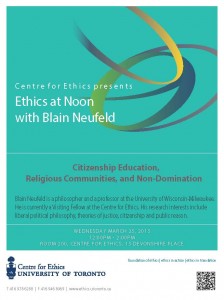
Associate Professor
Department of Philosophy
University of Wisconsin – MilwaukeeVisiting Fellow at the Centre for Ethics
12:00 PM - 02:00 PM
University of Toronto
Room 200, Larkin Building
15 Devonshire Place - Mon, Mar 9, 2015
Perspectives on Ethics
POSTPONED – Seminar Talk: Bonnie HonigWhat kind of a thing is Land? Hannah Arendt’s Object Relations
Bonnie Honig
04:00 PM - 06:00 PM
Professor of Modern Culture and Media and Political Science
Brown University
Room 200, Larkin Building
15 Devonshire Place - Sat, Mar 7, 2015
Events on Campus
Graduate Associates – Annual ConferenceKeynote speaker:
Professor Saba Mahmood, University of Berkeley
Minority Rights and Religious Freedom: Itineraries of Conversion?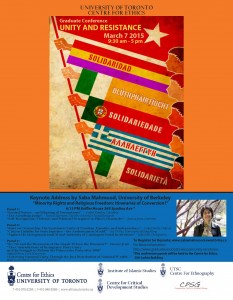
6:15 pm – Koffler House, 569 Spadina Avenue
09:30 AM - 05:00 PM
Room 200, Larkin Building
15 Devonshire Place - Fri, Mar 6, 2015
Political Theory Research Workshop
Political Theory Workshop 02:00 PM - 04:30 PM
Solarium, Faculty of Law
84 Queen's Park, Falconer Hall - Fri, Mar 6, 2015
Legal Theory WorkshopBernadette Atuahene. She works on land restitution in South Africa.
http://www.nytimes.com/2015/01/16/opinion/south-africas-land-inequity.http://www.latimes.com/opinion/op-ed/la-oe-atuahene-mandela-land-south-africa-20141207-story.html
12:30 PM - 01:45 PM
Solarium, Faculty of Law
84 Queen's Park, Falconer Hall - Tue, Mar 3, 2015
Public Lectures
Is the Government Fiscally Blind? An Empirical Examination of the Effect of the Compensation Requirement on Eminent Domain ExercisesRonit Levine-Schnur
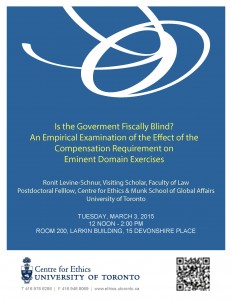
Visiting Scholar
Faculty of Law
Postdoctoral Fellow
Centre for Ethics & Munk School of Global Affairs
University of TorontoRonit Levine-Schnur is Visiting Scholar at the Faculty of Law. She is also a Postdoctoral Fellow at the Centre for Ethics and Munk School of Global Affairs. She is the recipient of the 2014-15 Halbert Exchange Post-Doctoral Award, the Arie Shachar Post-Doctoral Fellowship in Canadian Studies and the Rothschild Post-Doctoral Award. Her research focuses on property and contract law and theory, with particular emphasis on land ownership.
12:00 PM - 02:00 PM
Room 200, Larkin Building
15 Devonshire Place - Mon, Mar 2, 2015
Public Issues Forum
Toronto and the Natural City: Facing our Ecological FuturePanelists include:
David Miller, President & CEO, World Wildlife Fund Canada; Former Mayor, City of Toronto (Moderator)
Professor Roger Kiel, Faculty of Environmental Studies, York University
Professor Pamela Robinson, School of Urban and Regional Planning, Ryerson University
Olivia Chow, Former Member of Parliament and Toronto City Councillor, and
Professor Stephen Bede Scharper, School of the Environment, University of Toronto
04:00 PM - 06:00 PM
George Ignatieff Theatre, Larkin Building
15 Devonshire Place - Sat, Feb 28, 2015
Just War Theory Workshop, Jindal Global Universityhttp://www.stockholmcentre.org/delhi-workshop-on-the-analytic-just-war.html
09:30 PM - 05:00 PM
- Thu, Feb 26, 2015
Ethics at Noon
Ethics at Noon: Teresa BejanTeresa Bejan
12:00 PM - 02:00 PM
Department of Political Science
Room 200, Larkin Building
15 Devonshire Place - Mon, Feb 23, 2015
Perspectives on Ethics
Seminar Talk: Sally SimpsonSally Simpson
04:00 PM - 06:00 PM
Professor
Director C-BERC
Department of Criminology and Criminal Justice
University of Maryland
Room 200, Larkin Building
15 Devonshire Place - Thu, Feb 5, 2015
Public Issues Forum
Event PostponedPublic Issues Forum – Adscam: Ten Years Later
(February 5, 2015)
Mel Cappe, School of Public Policy and Government, U of T
04:00 PM - 06:00 PM
Andrew Stark, Rotman School of Management and Department of Political Science, U of T
Room 200, Larkin Building
15 Devonshire Place - Wed, Feb 4, 2015
Ethics at Noon
Ethics at Noon: François Tanguay-RenaudTo Fill or Not to Fill Individual Responsibility Gaps?
Prof. François Tanguay-Renaud, LLB, BCL, DPhil
Director, Nathanson Centre on Transnational Human Rights, Crime and Security
Director, Combined JD/MA Program in Law and Philosophy
Coordinator, International InitiativesOsgoode Hall Law School, York University
12:00 PM - 02:00 PM
www.osgoode.yorku.ca
nathanson.osgoode.yorku.ca
Room 200, Larkin Building
15 Devonshire Place - Fri, Jan 30, 2015
Political Theory Research Workshop
Political Theory Workshop 02:00 PM - 04:30 PM
Room 200, Larkin Building
15 Devonshire Place - Wed, Jan 21, 2015
Ethics at Noon
Ethics at Noon: Waheed HussainDog Eat Dog: Morality, Social Institutions and Rivalry
Waheed Hussain
12:00 PM - 02:00 PM
Department of Philosophy
University of Toronto
Room 200, Larkin Building
15 Devonshire Place - Mon, Jan 19, 2015
Perspectives on Ethics
Seminar Talk: William E. ScheuermanEdward Snowden’s Lessons: Against the Anti-Legal Turn in Theories of Civil Disobedience
William E. Scheuerman
04:00 PM - 06:00 PM
University of Indiana Bloomington
Room 200, Larkin Building
15 Devonshire Place - Wed, Dec 10, 2014
Ethics at Noon
Ethics at Noon: Andrew Franklin-HallAndrew Franklin-Hall
12:00 PM - 02:00 PM
Department of Philosophy, University of Toronto
Room 200, Larkin Building
15 Devonshire Place - Fri, Nov 28, 2014
Political Theory Research Workshop
Political Theory Workshop 02:00 PM - 04:30 PM
Room 200, Larkin Building
15 Devonshire Place - Wed, Nov 26, 2014
Ethics at Noon
Ethics at Noon: François Tanguay-RenaudState Crimes
Prof. François Tanguay-Renaud, LLB, BCL, DPhil
Director, Nathanson Centre on Transnational Human Rights, Crime and Security
Director, Combined JD/MA Program in Law and Philosophy
Coordinator, International InitiativesOsgoode Hall Law School, York University
www.osgoode.yorku.ca
12:00 PM - 02:00 PM
nathanson.osgoode.yorku.ca
Room 200, Larkin Building
15 Devonshire Place - Mon, Nov 24, 2014
Perspectives on Ethics
Seminar Talk: Iwao HiroseThe Value of a Statistical Life
Iwao Hirose
04:00 PM - 06:00 PM
Department of Philosophy
McGill University
Room 200, Larkin Building
15 Devonshire Place - Wed, Nov 12, 2014
Ethics at Noon
Ethics at Noon: Darryl RobinsonThe Justice of International Criminal Justice
Darryl Robinson
12:00 PM - 02:00 PM
Associate Professor
Queen’s University Faculty of Law
Room 200, Larkin Building
15 Devonshire Place - Mon, Nov 10, 2014
Perspectives on Ethics
Seminar Talk: David EstlundThe Puzzle of Plural Obligation
David Estlund
04:00 PM - 06:00 PM
Department of Philosophy
Brown University
Room 200, Larkin Building
15 Devonshire Place - Fri, Nov 7, 2014
Book Workshop
Why Law Matters by Alon Harel – Book Symposium –Co-sponsored by the Jerusalem Review of Legal Studies
Alon Harel
Mizock Professor of Law, Hebrew University of JerusalemChristopher Essert
Faculty of Law, Queen’s UniversityDavid Estlund
Department of Philosophy, BrownArthur Ripstein
Faculty of Law and Department of Philosophy, U of TAssaf Sharon
Tel Aviv UniversityLink to the OUP Website for the reading of the introduction and some of the first chapter of the book: http://ukcatalogue.oup.com/product/9780199643271.do
09:30 AM - 04:30 PM
Room 200, Larkin Building
15 Devonshire Place - Mon, Nov 3, 2014
Perspectives on Ethics
Seminar Talk: Eric NelsonThe Bargain Basis: Rawls, Anti-Pelagianism and Moral Arbitrariness
Eric Nelson
04:00 PM - 06:00 PM
Professor of Government
Harvard University
Room 200, Larkin Building
15 Devonshire Place - Fri, Oct 31, 2014
Political Theory Research Workshop
Political Theory Workshop 02:00 PM - 04:30 PM
Room 200, Larkin Building
15 Devonshire Place - Wed, Oct 29, 2014
Ethics at Noon
Ethics at Noon: Ronit Levine-SchnurEquality in Land Use Law
Ronit Levine-Schnur
12:00 PM - 02:00 PM
Postdoctoral Fellow, Faculty of Law/Centre for Ethics
Room 200, Larkin Building
15 Devonshire Place - Mon, Oct 27, 2014
Perspectives on Ethics
Seminar Talk: Rajeev BhargavaForms of Restraint and Religious Coexistence in Ancient Indian Political Thought
Rajeev Bhargava
Director, Centre for the Study of Developing Societies
New Delhi UniversityEvent co-sponsored by the Centre for South Asian Studies, Munk School of Global Affairs
04:00 PM - 06:00 PM
Room 200, Larkin Building
15 Devonshire Place - Wed, Oct 15, 2014
Ethics at Noon
Ethics at Noon: Julian CulpGlobal Justice & Publicity
Julian Culp
12:00 PM - 02:00 PM
Postdoctoral Fellow, Centre for Ethics
Course Instructor ETH201Contemporary Moral Problems and ETH210 Rationality and Action
Room 200, Larkin Building
15 Devonshire Place - Thu, Oct 9, 2014
Public Lectures
Seth Lazar, Australian National UniversityIn Dubious Battle: Uncertainty and the Ethics of Killing
Seth Lazar
03:15 PM - 05:00 PM
Australian National University
Room 200, Larkin Building
15 Devonshire Place - Mon, Oct 6, 2014
Perspectives on Ethics
CANCELLED – Seminar Talk: Val NapoleonOne Way: An Indigenous Legal Research Methodology
Val Napoleon
04:00 PM - 06:00 PM
Faculty of Law
University of Victoria
Room 200, Larkin Building
15 Devonshire Place - Fri, Oct 3, 2014
Political Theory Research Workshop
Political Theory Workshop 02:00 PM - 04:30 PM
Room 200, Larkin Building
15 Devonshire Place - Wed, Oct 1, 2014
Ethics at Noon
Ethics at Noon: Blain NeufeldFreedom, Money, and Justice as Fairness
Blain Neufeld
12:00 PM - 02:00 PM
Department of Philosophy, University of Wisconsin-Milwaukee and
Visiting Professor, 2014-15, Centre for Ethics
Room 200, Larkin Building
15 Devonshire Place - Wed, Sep 24, 2014
Ethics at Noon
Ethics at Noon: Christoph LumerConstructing Morals and the Aim of Morality
Dr. Christoph Lumer
12:00 PM - 02:00 PM
Professor of Moral Philosophy, University of Siena (Italy)
Home 1:
Website:
Room 200, Larkin Building
15 Devonshire Place - Mon, Sep 15, 2014
Perspectives on Ethics
Seminar Talk: Kenan MalikWhat can the history of morality tell us about the nature of morality?
Kenan Malik
04:00 PM - 06:00 PM
Writer, lecturer and broadcaster
Room 200, Larkin Building
15 Devonshire Place - Thu, Sep 11, 2014
Public Lectures
Public Lecture – Judith LichtenbergComparing the Moral Weight of Global versus Domestic Poverty
Judith Lichtenberg
04:00 PM - 06:00 PM
Department of Philosophy
Georgetown University
Room 200, Larkin Building
15 Devonshire Place - Fri, Jun 6, 2014
Book Workshop
Julius WorkshopAlexander Julius
Niko Kolodny
Véronique Munoz-Darde
Louis-Philippe Hodgson, York University
09:00 AM - 05:00 PM
Room 200, Larkin Building
15 Devonshire Place - Fri, May 9, 2014
Events on Campus
Maxims and MRIs: Kantian Ethics and Empirical PsychologyConference: May 9 – May 10, 2014
Jeanette Kennett, Macquarie University
09:00 AM - 05:00 PM
Susan Dwyer, University of Maryland
Patrick Frierson, Witman College
Pauline Kleingeld, University of Groningen
Hanno Sauer, Tilburg University
Tom Bates, University of Groningen
Marijana Milosavljevic-Vujosevic, University of Groningen
Joseph Heath, University of Toronto
Room 200, Larkin Building
15 Devonshire Place - Tue, May 6, 2014
Book Manuscript WorkshopCivil Law and Civil Sovereignty
Roman Law and the Doctrine of Popular Sovereignty in Early Modern Constitutional ThoughtDaniel Lee
University of TorontoCommentators
David Dyzenhaus
University of TorontoKenneth Pennington
Catholic University of America
Tuesday, May 6, 2014
10AM – 2PM
Department of Political Science
Sidney Smith Hall 3130
100 St. George St.
Lunch will be servedChapters will be posted online: politics.utoronto.ca/politicaltheoryworkshop
10:00 AM - 02:00 PM
Room 3130, Sidney Smith Building
100 St. George St. - Thu, May 1, 2014
Events on Campus
Normativity: 2014 Graduate Conference in PhilosophyKeynote Speakers:
Anandi Hattiangadi, St. Hilda’s College, Oxford University
J. David Velleman, Department of Philosophy, New York UniversityCo-Sponsors:
School of Graduate Studies, UofT
Graduate Students’ Union, UofTConference Schedule (as of April 7)
http://www.philosophy.utoronto.ca/news/2014-u-of-t-grad-conference/
10:00 AM - 05:00 PM
Room 200, Larkin Building
15 Devonshire Place - Fri, Apr 25, 2014
Events on Campus
Graduate Associates: 2014 ConferenceSecond Annual Centre for Ethics Graduate Conference
April 25-26, 2014
12:00 AM - 11:59 PM
Room 200, Larkin Building
15 Devonshire Place - Tue, Apr 22, 2014
Human Rights, Refugees and Freedom of MovementDavid Owen
04:00 PM - 06:00 PM
Professor, School of Social Sciences
University of Southampton
Room 200, Larkin Building
15 Devonshire Place - Thu, Apr 17, 2014
Book Launch (by invitation only)Enlightenment 2.0
Restoring Sanity to our Politics, our Economy, and our LivesJoseph Heath
05:00 PM - 07:00 PM
Professor, Department of Philosophy
Director, Centre for Ethics
University of Toronto
Room 200, Larkin Building
15 Devonshire Place - Thu, Apr 10, 2014
Events on Campus
Centre de Recherche en Éthique de l'Université de Montréal (CRÉUM) ForumAtelier conjoint
09:00 AM - 05:00 PM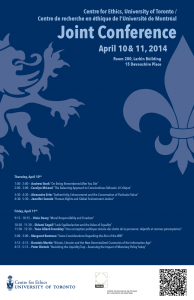
avec le Centre de recherche en éthique de l’Université de Montréal
et le Centre for Ethics de l’Université de Toronto
Room 200, Larkin Building
15 Devonshire Place - Fri, Apr 4, 2014
Political Theory Research Workshop
CANCELLED – Political Theory WorkshopWhy is the City-in-speech of Plato’s Laws Second Best?
Presenter: Rob Ballingall
12:00 PM - 01:30 PM
Room 200, Larkin Building
15 Devonshire Place - Mon, Mar 31, 2014
Perspectives on Ethics
The Moral Significance of ShareholdersAlan Strudler
04:00 PM - 06:00 PM
Professor of Legal Studies and Business Ethics
Wharton School, University of Pennsylvania
Room 200, Larkin Building
15 Devonshire Place - Fri, Mar 28, 2014
Community Research Partnerships in Ethics ConferenceJohn Duncan (http://utoronto.academia.edu/JohnDuncan)
12:00 PM - 02:00 PM
Room 200, Larkin Building
15 Devonshire Place - Wed, Mar 26, 2014
Events on Campus
Philosophers for PeaceBuilding Bridges Versus Walls:
Violence, Conflict & International InterventionTimea Spitka
04:15 PM - 06:00 PM
PhD, Ben Gurion University, Bersheeba, Israel
Room 418, Jackman Humanities Building
170 St. George St. - Wed, Mar 26, 2014
Cancelled – Ethics at NoonTruth, Lies and Controversy in Private Law (The Normative Structure of Estoppel)
Larissa Katz
12:00 PM - 02:00 PM
Faculty of Law
University of Toronto
Room 200, Larkin Building
15 Devonshire Place - Fri, Mar 21, 2014
Political Theory Research Workshop
Political Theory WorkshopAristotle on Luck
Presenter: Daniel Schillinger
12:00 PM - 01:30 PM
Room 200, Larkin Building
15 Devonshire Place - Thu, Mar 20, 2014
Events on Campus
“Fair or Unfair?: A Discussion of proposed changes to the Electoral Act”To be held at the Centre for Ethics, University of Toronto on Thursday, March 20th 2014 from 1 to 3 pm.
Peter Loewen, Melissa Williams and Nelson Wiseman will be speaking to the issue.
01:00 PM - 03:00 PM
Room 200, Larkin Building
15 Devonshire Place - Mon, Mar 17, 2014
Perspectives on Ethics
The Surprising Platonism of Hannah ArendtPatchen Markell
04:00 PM - 06:00 PM
Political Science
University of Chicago
Room 200, Larkin Building
15 Devonshire Place - Fri, Mar 14, 2014
Events on Campus
The Value of Equality (Day 2) 08:30 AM - 05:30 PM
Combination Room
Trinity College, 6 Hoskin Avenue - Thu, Mar 13, 2014
Events on Campus
The Value of Equality Workshop“Basic Equality, Consequentialism, and Priority
Richard J. Arneson, San Diego“Rationality, Equal Status, and Egalitarianism”
Thomas Christiano, Arizona“Inequality in Political Philosophy and in Epidemiology: A Re-Marriage”
Nir Eyal, Harvard“Could Equality (or Priority) Be Intrinsically Valuable?”
Daniel M. Hausman, Madison Wisconsin“Two Faces of Equality”
Deborah Hellman, Virginia“Equality in the Law: What Kind of Value does Non-Discrimination Have?”
Sophia Moreau, Toronto“Rescuing the Pareto Argument”
Cynthia Stark, Utah“Illuminating Egalitarianism”
Larry S. Temkin, Rutgers“Paretian Egalitarianism and Transitivity”
Peter Vallentyne, Columbia-Missouri (with Bertil Tungodden, Norwegian School of Economics)Joseph Heath, Toronto
02:00 PM - 06:00 PM
Shlomi Segall, The Hebrew University of Jerusalem (Visiting Fellow at the Centre for Ethics)
Room 200, Larkin Building
15 Devonshire Place - Fri, Mar 7, 2014
Political Theory Research Workshop
Political Theory WorkshopTitle: TBD
Presenter: Steve Trochimchuk
12:00 PM - 01:30 PM
Room 200, Larkin Building
15 Devonshire Place - Fri, Feb 28, 2014
Political Theory Research Workshop
Political Theory WorkshopRousseau’s Account of the Genevan Republic
Presenter: Dorina Verli
12:00 PM - 01:30 PM
Room 200, Larkin Building
15 Devonshire Place - Wed, Feb 26, 2014
Ethics at Noon
Ethics at Noon – Theresa Enright“The Right to Mobility: Mass Urban Transit and Socio-Spatial Justice”
Theresa Enright
12:00 PM - 02:00 PM
Department of Political Science
University of Toronto
Room 200, Larkin Building
15 Devonshire Place - Fri, Feb 14, 2014
Political Theory Research Workshop
Political Theory WorkshopSelf-Knowledge, Morality and the Problem of Punishment in Friedrich Nietzsche’s Daybreak
12:00 PM - 01:30 PM
Tom Meredith
Room 200, Larkin Building
15 Devonshire Place - Fri, Feb 7, 2014
Political Theory Research Workshop
CANCELLED – Political Theory WorkshopHomer’s Iliad and Political Theory: On Books 1-9 of the Iliad
Presenter: Andrew Gross
12:00 PM - 01:30 PM
Discussant:Cliff Orwin
Room 200, Larkin Building
15 Devonshire Place - Fri, Jan 24, 2014
Political Theory Research Workshop
Political Theory WorkshopTitle: TBD
Presenter: Cameron Sabadoz
12:00 PM - 01:30 PM
Room 200, Larkin Building
15 Devonshire Place - Mon, Jan 20, 2014
Perspectives on Ethics
On Valuing Moral DisagreementDavid Wong
04:00 PM - 06:00 PM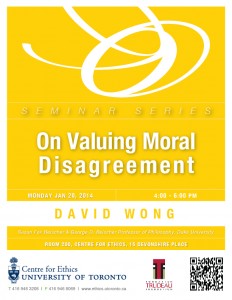
Susan Fox Beischer & George D. Beischer Professor of Philosophy
Duke University
Room 200, Larkin Building
15 Devonshire Place - Fri, Jan 17, 2014
Events on Campus
Contentious Politics in Egypt and TunisiaMatthew J. Gordner, M.A.
PhD Student
University of Toronto
Department of Political Science
http://politics.utoronto.caTrudeau Scholar
The Trudeau Foundation
http://www.trudeaufoundation.ca/enFounder and Executive Director
09:00 AM - 05:00 PM
The Peace by Piece Initiative
www.thepeacebypieceinitiative.com
Room 200, Larkin Building
15 Devonshire Place - Mon, Jan 13, 2014
Perspectives on Ethics, Ethics and the Public Interest
Democracy without the Consent of the GovernedArthur Applbaum
04:00 PM - 06:00 PM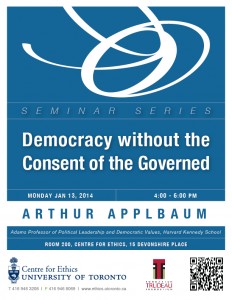
Adams Professor of Political Leadership and Democratic Values
Professor of Ethics and Public Policy
Harvard Kennedy School
Room 200, Larkin Building
15 Devonshire Place - Fri, Jan 10, 2014
Political Theory Research Workshop
Political Theory WorkshopDifference, Critique, and Aesthetics
Presenter: Matthew Hamilton
12:00 PM - 01:30 PM
Room 200, Larkin Building
15 Devonshire Place - Tue, Dec 10, 2013
Events on Campus
Annual Community Research Partnership in Ethics (CRPE) ConferenceJohn Duncan
01:00 PM - 02:30 PM
Director
Ethics, Society and Law Program
Trinity College
(http://utoronto.academia.edu/JohnDuncan)
Room 200, Larkin Building
15 Devonshire Place - Fri, Dec 6, 2013
Book Workshop
A.J. JuliusEVENT POSTPONED
Alexander J. Julius
Department of Philosophy
University of California, Los AngelesNiko Kolodny, Berkeley
04:00 PM - 06:00 PM
Véronique Munoz-Dardé, Berkeley
Arthur Ripstein, Toronto
Louis-Philippe Hodgson, York
(registration required)
Room 200, Larkin Building
15 Devonshire Place - Fri, Nov 29, 2013
Events on Campus, Book Workshop
A Political Theory of TerritoryA manuscript workshop on A Political Theory of Territory by Margaret Moore (Queens University)
Panelists:
Margaret (Peggy) Kohn, Department of Political Science, U of T
Loren King, Department of Political Science, Wilfrid Laurier University, Waterloo
Daniel Weinstock, McGill UniversityParticipants are expected to read Chapter 3. If you would like a link to this chapter, please contact ethics@utoronto.ca
Table of Contents
1. Why We Need a Theory of Territory. This is intended to be a non-technical, motivating introduction, which explains the relationship of territory to a number of pressing questions, including border disputes, secession, immigration, and global justice.
2. What is Territory? This is a conceptual chapter, which explains in some detail what territory is; what rights are included in territorial rights; what is the relationship between territory and cognate notions, such as property; and also sets out what we expect a theory of territory to do.
3. Foundations of a Theory of Territory: Individual Rights of Occupancy and Collective Rights of Self-determination. This is a foundational chapter, which sets out my theory of territory. It aims to achieve three things: 1. defends moral right of occupancy (and what it means to ‘occupy’ a land ‘not unjustly’); 2. explains the conditions under which individuals form a people with claims to self-determination; and 3. explains why collective self-determination is valuable.
4. Culturalist theories of territory. There are two rival theories of territory and the fundamental holder of territorial rights: statist theories and culturalist theories. This chapter examines culturalist theories, with a focus on David Miller’s and Avery Kolers’ theories respectively.
5. Statist/Functional Theories of territory. This chapter examines statist theories of territory, beginning with Kant, but also including Sidgwick, and encompassing contemporary accounts, such as Lea Ypi, Allen Buchanan, Jeremy Waldron, Anna Stilz, Cara Nine. These two chapters (3&4) are important because they are designed to show that the principal rivals have problems that are avoided in my theory.
6. Heartlands, Contested Lands and Drawing Boundaries. Here I address questions about the physical extent of territory. This allows me to talk about cases which are of pressing contemporary importance, such as those involving boundary disputes between neighbouring states, claims of uninhabited islands, the seabed, the ocean generally, and the territorial claims of secessionists.
7. Expulsions from Land and Corrective Justice. This chapter addresses the problem of territorial injustice. Most people are settled on land which was previously occupied by another group, which might also make a claim to the same land (on historical grounds). This chapter deals with how we should think about expulsions from territory and what corrective justice remedies are available and when they are appropriate (or superseded).
8. Territorial Rights to Resources and Claims to Global Justice. This chapter, and the following two, deals with what are regarded as distinct rights over territory. Any theory of territory should have something to say about various sorts of territorial claims that are often associated with having ‘territorial rights’. I disaggregate these claims and consider the extent to which the argument advanced above – in chapters 1-6 — have a bearing on the kind and extent of claims that are made to control borders or over natural resources or defensive rights.
9. Self-determination and the Right to Exclude: Territorial Rights over Immigration. This chapter considers the implications of the argument advanced above for control over the flow of people and goods across borders (which is commonly associated with having sovereignty over a territory).
10. National Defensive Rights. This chapter shows that the theory of territory developed in the chapters above can justify a right to national self-defence. It is now widely accepted that much of the support in the popular imagination for defensive rights to war is based on an untenable reduction to individual self-defence or false analogy between individual self-defence and collective (or national) self-defence. One of the ways in which this analogy does not work is that a defensive war is typically thought to be triggered by an attack on the territory of the state, even when no people would be killed if the defending state simply accepts the loss of territory. The aggressor state, in other words, does not necessarily pose a lethal threat to people as it advances through (unpopulated) territory. This chapter explains and justifies defensive rights over territory.
02:00 PM - 05:00 PM
Room 200, Larkin Building
15 Devonshire Place - Fri, Nov 29, 2013
Political Theory Research Workshop
Political Theory WorkshopThe Democratic Continuum: Edified Beasts and Political Animals
Presenter: Emma Planinc
12:00 PM - 01:30 PM
Room 200, Larkin Building
15 Devonshire Place - Thu, Nov 28, 2013
Events on Campus
Ethics, Society and Law Students' Association Academic SeminarEnd-of-Life Care: Ethics and the Law
The Ethics, Society, and Law Student’s Association are pleased to present our Fall Academic Seminar; End-of-Life Care: Ethics and the Law, with guest lecturer Wayne Sumner.
If you are attending, please RSVP by sending us an email at:
01:00 PM - 03:00 PM
utethicssocietyandlaw@gmail.com
Room 200, Larkin Building
15 Devonshire Place - Wed, Nov 27, 2013
Ethics at Noon
Ethics at NoonThere’s no Bathing in the River Styx: The problem of Rule-Manipulation in Adversarial and Non-Adversarial Schemes
Dominic Martin
12:00 PM - 02:00 PM
Postdoctoral Fellow, Centre for Ethics, University of Toronto
Room 200, Larkin Building
15 Devonshire Place - Mon, Nov 18, 2013
Perspectives on Ethics, Ethics and the Public Interest
The Canadian One PercentStephen Gordon
04:00 PM - 06:00 PM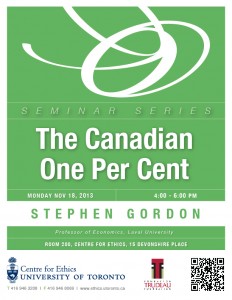
Department of Economics, Université Laval
Room 200, Larkin Building
15 Devonshire Place - Fri, Nov 15, 2013
Events on Campus
Judging StoriesNoah Benjamin Novogrodsky
Professor of Law
University of Wyoming College of Law“Judging Stories” concerns the case of Mugesera v. Citizenship & Immigration (Canada) which I intervened in as the director of the International Human Rights Program at the Faculty of Law. The ethical element of the story involved the anti-Semitic conduct of Mugesera’s lawyer — Guy Bertrand — who alleged that the Canadian Supreme Court was captive to a Jewish conspiracy and incompetent to hear the matter.
The paper uses the Mugesera odyssey to address the emerging global treatment of hate speech and incitement to genocide.
02:00 PM - 03:30 PM
Room 248, Larkin Building
15 Devonshire Place - Fri, Nov 15, 2013
Political Theory Research Workshop
Political Theory WorkshopSophists, Statesmen, and the Philosopher: On the Problem of Political Authority in the Preface to Hegel’s Philosophy of Right
Presenter: Jonas Schwab-Pflug
12:30 PM - 02:00 PM
Discussant: Ronnie Beiner
Room 200, Larkin Building
15 Devonshire Place - Wed, Nov 13, 2013
Ethics at Noon
Ethics at NoonThe For-Profit Misnomer in Canadian Corporate Law
Carol Liao
12:00 PM - 02:00 PM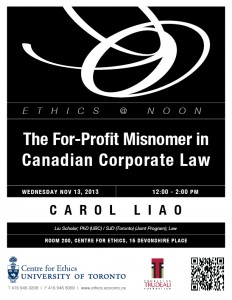
PhD (UBC) / SJD (Toronto) (Joint Program); Law
Room 200, Larkin Building
15 Devonshire Place - Wed, Nov 6, 2013
Events on Campus
Banning Religious Clothing? The Quebec Charter of Secular Values: What’s It All About?5:30 pm – 7 pm
Wednesday, November 6U of T Multi-Faith Centre
596 Spadina Avenue, Room KP 113 (1st Floor)Join Prof. Benjamin Berger, Osgoode Law School, Prof. Ruth Marshall, Study of Religion, U of T, Prof. Simone Chambers, Pol. Sci., U of T, Ayesha Valliani, Grad Student, Study of Religion, U of T in a moderated discussion of the Quebec Charter of Values with Prof. Pamela Klassen, Director, Religion in the Public Sphere programme, U of T.
Explore issues of state neutrality and religious accommodation vis a vis the proposed legislation of the Quebec’s Charter of Values. The proposed Charter includes banning public sector workers, including teachers and all civil servants from wearing “ostentatious” religious symbols. This includes: hijabs, turbans, and large crosses.
https://www.facebook.com/events/230035077155696/
05:30 PM - 07:00 PM
Multi-Faith Centre
569 Spadina Avenue - Mon, Nov 4, 2013
Perspectives on Ethics
From Now and to Eternity: Prioritarianism and TimeShlomi Segall
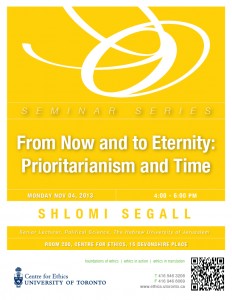
The Political Science Department and PPE
The Hebrew University of JerusalemNB: Date corrected
Abstract:
What is the temporal unit of prioritarianism? The paper argues against complete-life prioritarianism and in favor of priority to those who are worse off at any given time-slice. With regard to equality, in contrast, we must adopt the opposite position, namely, we must be concerned with, and only with, complete lives. I propose to search for the temporal unit of prioritarianism by outlining five distinguishing features of the view (not meant as an exhaustive list). Prioritarianism is: an other-things-being-equal, non-comparative view that is concerned with aggregating an impersonal value that applies both inter-personally as well as intra-personally. I shall then assess the implications of these five features for time. I will attempt to show that prioritarianism cannot apply to anything longer than time slices. The paper concludes, however, that the implications of priority and time are no objection to prioritarianism, but that they do constitute an objection to what one might term anti-egalitarian prioritarianism. We ought, in sum, be prioritarians about time-slices, and egalitarians about complete lives.
04:00 PM - 06:00 PM
Room 200, Larkin Building
15 Devonshire Place - Wed, Oct 30, 2013
Ethics at Noon
Ethics at NoonEmpathy and Political Preferences
12:00 PM - 02:00 PM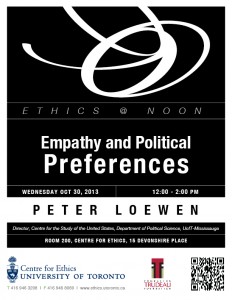
Room 200, Larkin Building
15 Devonshire Place - Fri, Oct 25, 2013
Political Theory Research Workshop
Political Theory WorkshopVirtue, Disagreement, and Skepticism in Montaigne and Zhuangzi
Presenter: Lincoln Rathnam
12:00 PM - 01:30 PM
Room 200, Larkin Building
15 Devonshire Place - Thu, Oct 17, 2013
Events on Campus
Workshop: Practice of Ethics in Translation/GandhiEthics in Translation with Richard Sorabji:
A Workshop for Graduate Students and Faculty
Led by: Professor Richard Sorabji, Wolfson College, Oxford
This half-day workshop will be based on Professor Sorabji’s book, Gandhi and the Stoics, accompanied by selected texts by Gandhi and the Stoic thinkers addressed in the book. In addition to exploring the substantive themes of the volume by reading across texts, the workshop will also address the practice of bringing thinkers from radically different times and locations into conversation with one another.
Registration:
The workshop is open to graduate students and faculty at the University of Toronto; others may address a request to participate to Melissa Williams (melissa.williams@utoronto.ca).
Pre-registration is required. To register, please visit http://ethics-utoronto-ca.eventbrite.ca/.
Preparation:
All participants should have a copy of Gandhi and the Stoics, and should have read the book well in advance of the workshop. (The UofT Bookstore is offering a special discount to workshop participants of 20% off the $35.00 cover price. They are expecting a special shipment of the book in the first week of October. To purchase a discounted copy, go to the Information Desk on the 2nd floor of the bookstore, where copies will be set aside for workshop participants.)
Other readings will be posted on a website dedicated to the workshop, and information about access to the website will be circulated to registered participants.
09:00 AM - 12:30 PM
Room 200, Larkin Building
15 Devonshire Place - Wed, Oct 16, 2013
Events on Campus
Panel: Translations of Freedom: Gandhian AntecedentsRichard Sorabji, Oxford
10:00 AM - 12:00 PM
Akeel Bilgrami, Columbia
Ramin Jahanbegloo, York
Brad Inwood, Toronto
Room 200, Larkin Building
15 Devonshire Place - Tue, Oct 15, 2013
Perspectives on Ethics
Richard Sorabji – Gandhi and the Stoics
04:00 PM - 06:00 PM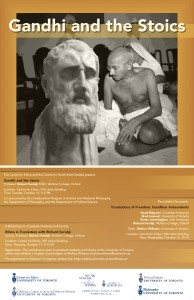 Richard Sorabji
Richard Sorabji
Wolfson College, Oxford University
Room 200, Larkin Building
15 Devonshire Place - Thu, Oct 10, 2013
Events on Campus
The Charter of Quebec Values: whence, why and whither?Daniel Turp
Professor, Université de Montréal and former MNA and MPComment: Joseph Heath
Director, Centre for Ethics and Professor of PhilosophyRegister:
https://lacharte.eventbrite.com/The new proposed Charter of Quebec Values has generated
12:30 PM - 02:00 PM
much debate both within Quebec and across Canada. It has
made international headlines. Daniel Turp and Joseph Heath will
be discussing the genesis, content and goals of the Charter. The
session will be moderated by Professor Irvin Studin, MPP
Program Director at the School of Public Policy & Governance.
CG150
14 Queens Park Crescent West - Fri, Oct 4, 2013
Political Theory Research Workshop
Political Theory WorkshopNietzche and the Transfiguration of Nihilism
Presenter: José Parra
12:00 PM - 02:00 PM
Discussant: Seth Jaffe
Room 200, Larkin Building
15 Devonshire Place - Wed, Oct 2, 2013
Ethics at Noon
Ethics at NoonQuantitative Ethics: Business Bribery Index (BBI)
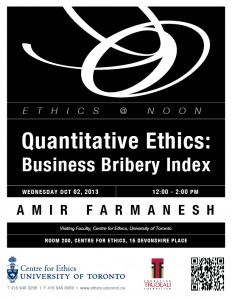
Amir Farmanesh
12:00 PM - 02:00 PM
Visiting Faculty, Centre for Ethics, University of Toronto
Room 200, Larkin Building
15 Devonshire Place - Wed, Sep 25, 2013
Ethics at Noon
Ethics at Noon“Can a Right to Reproduce Justify the Status Quo on Parental Licensing?
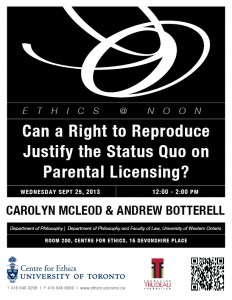
Carolyn McLeod
Visiting Professor, 2013-14, Centre for Ethics, University of Toronto
Associate Professor, Department of Philosophy, University of Western Ontarioand
Andrew Botterell
12:00 PM - 02:00 PM
Visiting Professor, 2013-14, Centre for Ethics, University of Toronto
Department of Philosophy and Faculty of Law, University of Western Ontario
Room 200, Larkin Building
15 Devonshire Place - Fri, Sep 20, 2013
Political Theory Research Workshop
Political Theory WorkshopKarl Marx’s Radical Critique of Liberalism and the Future of Rights
Presenter: Igor Shoikhedbrod
12:00 PM - 02:00 PM
Discussant: Ed Andrew
Room 200, Larkin Building
15 Devonshire Place - Mon, Sep 16, 2013
Perspectives on Ethics
The Good, the Bad, and the TrivialChrisoula Andreou
04:00 PM - 06:00 PM
Department of Philosophy, University of Utah
Room 200, Larkin Building
15 Devonshire Place - Fri, Sep 13, 2013
Events on Campus
The Political Thought of C.B. MacphersonYou are all invited to a panel on the political thought of C.B. Macpherson on the occasion of the reissuing of his books by the Oxford and University of Toronto Presses, each book with a new introduction by U. of T. Political Science faculty. The bookstore will be start selling the recently reissued books at 1:30 pm (the panel is from 2-4) – the bookstore will be set up outside of SSH 3130 and will be accepting cash, debit or credit cards, the books range from $20 – $30
C.B. Macpherson was one of the preeminent political thinkers of the 20th Century, Macpherson’s academic career began as a student and continued as a professor in the U. of T. Department of Political Economy (and then Political Science). His books, most translated into several languages, include Democracy in Alberta, The Political Theory of Possessive Individualism, Democratic Theory, The Life and Time of Liberal Democracy, Burke, and The Rise and Fall of Economic Justice.
02:00 PM - 04:00 PM
Room 3130, Sidney Smith Building
100 St. George St. - Thu, May 9, 2013
Events on Campus
Later Spring Workshop 09:30 AM - 05:00 PM
Room 200, Larkin Building
15 Devonshire Place - Mon, Apr 15, 2013
Author Meets Critics
Graduate Associates: Author Meets Critics03:00 PM - 05:00 PMAuthor:
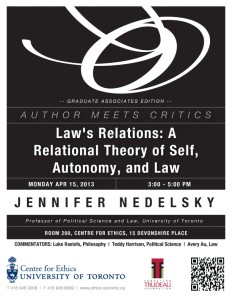
Jennifer Nedelsky, Department of Political Science and Faculty of Law
Law’s Relations: A Relational Theory of Self, Autonomy, and Law
Graduate Critics:
Luke Roelofs, Philosophy
Teddy Harrison, Political Science
Avery Au, Law
Room 200, Larkin Building
15 Devonshire Place - Fri, Apr 12, 2013
Political Theory Research Workshop
Political Theory Research WorkshopThe Conceptual Terrain of Trade-Union Theory
Wayne DealyChair: Daniel Lee
02:00 PM - 03:30 PM
Discussant: Tom Malleson
Room 200, Larkin Building
15 Devonshire Place - Fri, Apr 5, 2013
Political Theory Research Workshop
Political Theory Research WorkshopAgree to What? Or, a Rousseauian Republican Critique of the Liberal and Contemporary Republican Conceptions of Freedom
Israela SteinChair: Clifford Orwin
02:00 PM - 03:30 PM
Room 200, Larkin Building
15 Devonshire Place - Wed, Apr 3, 2013
Ethics at Noon
Different and Unequal: Thinking Beyond Equality in Intimate RelationshipsLauren Bialystok
12:00 PM - 02:00 PM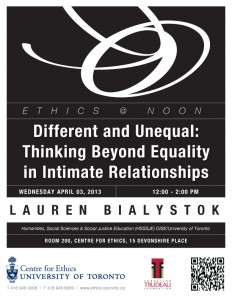
Humanities, Social Sciences & Social Justice Education (HSSSJE)
OISE/University of Toronto
Room 200, Larkin Building
15 Devonshire Place - Mon, Apr 1, 2013
Public Lectures
Attachment to Resources Is an Expensive TasteLea Ypi
03:00 PM - 05:00 PM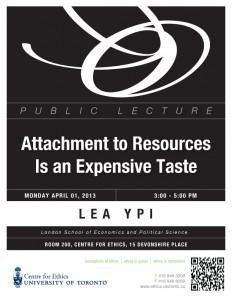
London School of Economics and Political Science
Room 200, Larkin Building
15 Devonshire Place - Mon, Mar 25, 2013
Public Lectures
Majorities and Minarets: Religious Freedom and Public SpaceMajorities and Minarets: Religious Freedom and Public Space
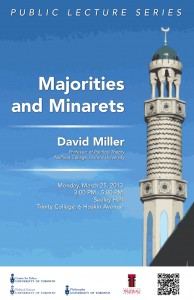
David Miller
Professor of Political Theory
Nuffield College
Oxford2013.03.25 – David Miller (WEB)
03:00 PM - 05:00 PM
Abstract
Seeley Hall
Trinity College, 6 Hoskin Avenue - Fri, Mar 22, 2013
Public Lectures
What Makes Moral Judgments True?Russ Shafer-Landau
04:00 PM - 06:00 PM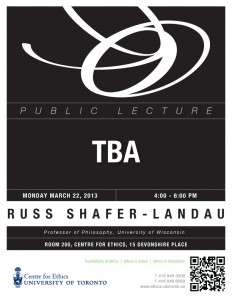
Department of Philosophy
University of Wisconsin
Room 200, Larkin Building
15 Devonshire Place - Fri, Mar 22, 2013
Political Theory Research Workshop
Political Theory Research WorkshopRights and Limits in a Constitutional State
Jacob WeinribChair: Peggy Kohn
02:00 PM - 03:30 PM
Room 200, Larkin Building
15 Devonshire Place - Wed, Mar 20, 2013
Public Lectures
Malignant AccountabilityYael (Yuli) Tamir
Professor of Political Philosophy at Tel-Aviv UniversityDepartment of Political Science, University of Toronto
Ontario Institute for Studies in Education (OISE/UT)
School of Public Policy and Governance2013 03 20 – Yael Tamir (revised)
07:00 PM - 09:00 PM
Auditiorium 1180, Bahen Centre
40 St. George Street - Mon, Mar 18, 2013
Perspectives on Ethics
Debating Political SecularismJocelyn Maclure
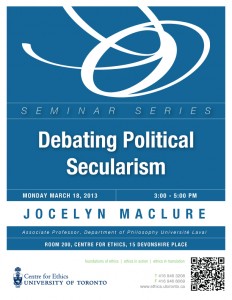
Department of Philosophy
Université Laval(note change of date)
03:00 PM - 05:00 PM
Room 200, Larkin Building
15 Devonshire Place - Fri, Mar 15, 2013
Events on Campus
Theory and Practice: The Limits of Ethics for Guiding ActionCentre for Ethics Graduate Conference
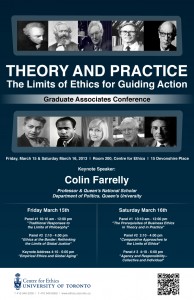
Keynote Speaker:
Colin Farrelly
Department of Political Studies
Queen’s University
“Empirical Ethics and Global Aging”Details: GACONFERENCECALLFORPAPERS docx
Conference Schedule: GA Conference Schedule
09:00 AM - 09:00 AM
Room 200, Larkin Building
15 Devonshire Place - Wed, Mar 13, 2013
Events on Campus
Ethics, Society and Law Students AssociationSpeaker: Paul Copeland, a Toronto-based Human Rights lawyer
“Civil Disobedience as a Mode of Political Communication”
04:00 PM - 06:00 PM
Room 200, Larkin Building
15 Devonshire Place - Wed, Mar 13, 2013
Ethics at Noon
Ethical Drones?Steven P. Lee
12:00 PM - 02:00 PM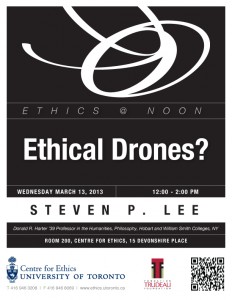
Visiting Professor, Centre for Ethics, University of Toronto
and
Donald R. Harter ’39 Professor in the Humanities
Department of Philosophy
Hobart and William Smith Colleges
Geneva, NY
Room 200, Larkin Building
15 Devonshire Place - Wed, Mar 6, 2013
Ethics at Noon
Getting the Trolley Problem Back on TrackAndrew Stark
12:00 PM - 02:00 PM
Professor of Strategic Management, Department of Management, University of Toronto-Scarborough
Professor of Political Science
Room 200, Larkin Building
15 Devonshire Place - Mon, Mar 4, 2013
Events on Campus
Responsibility to Protect – For and AgainstA Philosophers for Peace Debate
For: Steven Lee
Against: John Duncan
03:00 PM - 05:00 PM
Room 418, Jackman Humanities Building
170 St. George St. - Fri, Mar 1, 2013
Political Theory Research Workshop
Political Theory Research WorkshopNietzche’s Types and Typologies: Method and Prescription in Der Antichrist
Tom MeredithChair: Simone Chambers
02:00 PM - 03:30 PM
Discussant: Seth Jaffe
Room 200, Larkin Building
15 Devonshire Place - Mon, Feb 25, 2013
Perspectives on Ethics
Rights Forfeiture and Procedural RightsChristopher Heath Wellman
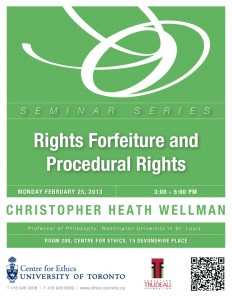
Department of Philosophy
Washington University in St. LouisAbstract
In this paper I defend the stark thesis that, absent special circumstances, there are no judicial procedural rights. I first argue that there is no general moral right against double jeopardy. Next I explain why punishing a criminal without first establishing her guilt via a fair trial does not necessarily violate her rights. And finally, after responding to a number of possible objections, I consider the implications of my arguments for the human right to due process.
03:00 PM - 05:00 PM
Room 200, Larkin Building
15 Devonshire Place - Wed, Feb 13, 2013
Ethics at Noon
The Desirability of Rivalry, a Two-Steps TestDominic Martin
12:00 PM - 02:00 PM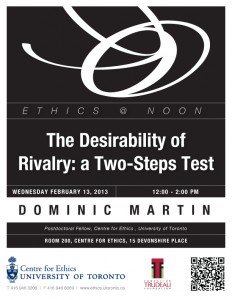
Postdoctoral Fellow, Centre for Ethics, University of Toronto
Room 200, Larkin Building
15 Devonshire Place - Fri, Feb 8, 2013
Political Theory Research Workshop
Political Theory Research WorkshopWayne Dealy
02:00 PM - 03:30 PM
Room 200, Larkin Building
15 Devonshire Place - Thu, Feb 7, 2013
Author Meets Critics
God: Impossible or merely Improbable?A symposium on Colin Howson’s, Objecting to God
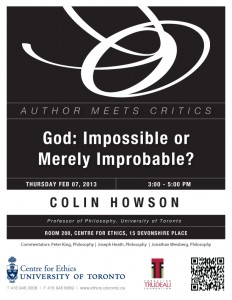
Moderator: Donald Ainslie, Toronto
Logic: Colin Howson, Toronto
03:00 PM - 05:00 PM
Medieval: Peter King, Toronto
Political: Joseph Heath, Toronto
Epistemology: Jonathan Weisberg, Toronto
Room 200, Larkin Building
15 Devonshire Place - Fri, Feb 1, 2013
Events on Campus
Seventh Annual Peace, Conflict & Justice Conference 07:00 PM - 10:00 PM
- Fri, Feb 1, 2013
Events on Campus
TADA (Transatlantic Doctoral Academy)For more information please contact conference organizers:
thomas.beschorner@unisg.ch -or- sareh.pouryousefi@utoronto.caNew Directions in Business Ethics
TADA Conference 2013, Friday – February, 1
Location : Centre for Ethics, University of Toronto
Address: 15 Devonshire Place, Toronto ON Centre Website / Map / DirectionsSpeakers: Joseph Heath, Jeffery Smith, Andrew Crane, Dirk Matten,
Chris MacDonald, & Wayne Norman9:00 – Welcome
9:10 – Joseph Heath, University of Toronto:
“Business Ethics: The Market Failures Approach”
Commentary by Thorsten Busch, St.Gallen University/ HEC Montréal10:00 – break
10:20 – Jeffery Smith, University of Redlands:
“Corporate Responsibility and the Exercise of Authority”
Commentary by Dominic Martin, University of Toronto11:10 – break
11:30 – Wayne Norman, Duke University:
“Whither Business Ethics?”
Commentary by Sareh Pouryousefi, University of Toronto12:20 – Lunch
1:30 – Dirk Matten, York University:
“The embrace of institutional theory by CSR scholarship: The kiss of death or happy-ever-after?”
Commentary by Laurence Vigneau, University of Nottingham, UK2:20 – break
2:40 – Chris MacDonald, Ryerson University:
“What Does Heath’s ‘Market Failures’ Model Require of Managers?”
Commentary by Thomas Hajduk, University of St.Gallen3:30 – break
3:50 – Andrew Crane, York University:
“Modern slavery as a management practice: lots of business,
not too much ethics”
Commentary by Matthias Schmidt, Beuth Hochschule Berlin, Germany4:40 – end of the conference
09:00 AM - 05:00 PM
Room 200, Larkin Building
15 Devonshire Place - Mon, Jan 28, 2013
Perspectives on Ethics
Freedom of Complex AssociationsJacob Levy
03:00 PM - 05:00 PM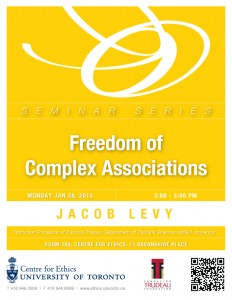
Tomlinson Professor of Political Theory
Department of Political Science
McGill University
Room 200, Larkin Building
15 Devonshire Place - Wed, Jan 23, 2013
Ethics at Noon
Justifying a Positive Social Discount RateJoseph Heath
12:00 PM - 02:00 PM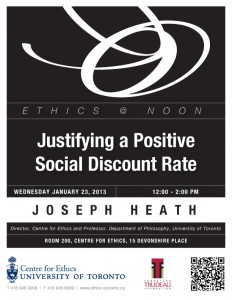
Department of Philosophy
and
Director, Centre for Ethics
Room 200, Larkin Building
15 Devonshire Place - Mon, Jan 14, 2013
Perspectives on Ethics
Preventing Regulatory Capture: Special Interest Influence and How to Limit ItDavid A. Moss
03:00 PM - 05:00 PM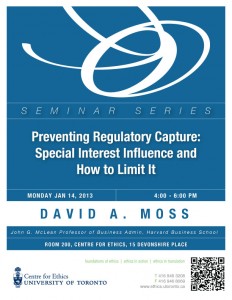
John G. McLean Professor of Business Administration
Harvard Business School
Room 200, Larkin Building
15 Devonshire Place - Thu, Dec 6, 2012
Ethics in Translation Lecture
Bhakti and the Shaping of Social Imaginaries in Colonial IndiaDr Rinku Lamba
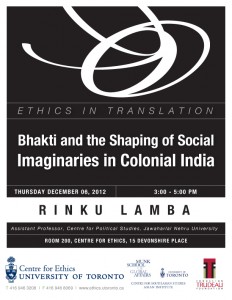
Assistant Professor
Centre for Political Studies
Jawaharlal Nehru University
New Delhi, IndiaHarold Coward India Research Fellow (August 2012 – December 2012)
Centre for Studies in Religion and Society
University of Victoria, CanadaThis event is co-sponsored by
Centre for Ethics, University of Toronto
03:00 PM - 05:00 PM
and
Centre for South Asian Studies, Munk School of Global Affairs, University of Toronto
Room 200, Larkin Building
15 Devonshire Place - Fri, Nov 30, 2012
Political Theory Research Workshop, Events on Campus
Political Theory Research Workshop – Paper 5‘The (Political) Nature of the Firm’
Abe SingerDiscussant: Professor Simone Chambers
01:00 PM - 02:30 PM
Room 200, Larkin Building
15 Devonshire Place - Mon, Nov 26, 2012
Perspectives on Ethics
Immigration, Jurisdiction and ExclusionMichael Blake
03:00 PM - 05:00 PM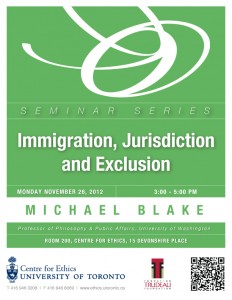
Professor of Philosophy and Public Affairs
Department of Philosophy and Daniel J. Evans School of Public Policy
University of Washington
Room 200, Larkin Building
15 Devonshire Place - Wed, Nov 21, 2012
Ethics at Noon
Rethinking National Self-DeterminationHege C. Finholt
12:00 PM - 02:00 PM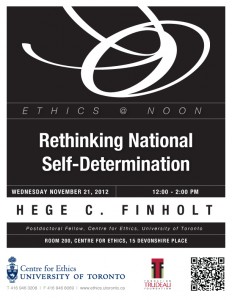
Postdoctoral Fellow, Centre for Ethics, University o Toronto
Room 200, Larkin Building
15 Devonshire Place - Fri, Nov 16, 2012
Political Theory Research Workshop, Events on Campus
Political Theory Research Workshop – Paper 4Ariel Zylberman, ‘Matters of International Concern: Human Rights as Conditions of Peace’ (Practice job talk)
Please feel free to contact the workshop director (daniellee.lee@utoronto.ca) or the workshop coordinator (mauricio.suchowlansky@utoronto.ca) with any questions regarding the workshop.
01:00 PM - 02:30 PM
Room 200, Larkin Building
15 Devonshire Place - Wed, Nov 7, 2012
Ethics at Noon
Children's Moral Conceptions of Lying: East-West ComparisonsKang Lee
12:00 PM - 02:00 PM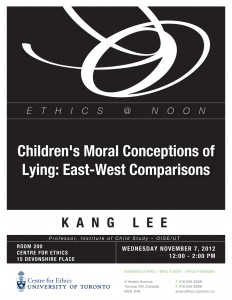
Professor, Institute of Child Study – OISE/UT
Room 200, Larkin Building
15 Devonshire Place - Mon, Nov 5, 2012
Perspectives on Ethics
Tax is Not a Four Letter WordAlex Himelfarb
03:00 PM - 05:00 PM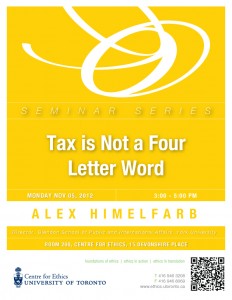
Director, Glendon School of Public and International Affairs
York University
Room 200, Larkin Building
15 Devonshire Place - Fri, Nov 2, 2012
Political Theory Research Workshop, Events on Campus
Political Theory Research Workshop – Paper 3‘Society, Discord and the Politics of Equilibrium in Machiavelli’s Istorie Fiorentine‘
Mauricio Suchowlansky,Discussant: Ed Andrew
01:00 PM - 02:30 PM
Room 200, Larkin Building
15 Devonshire Place - Thu, Nov 1, 2012
Author Meets Critics
Reasoning: A Social PictureAnthony Simon Laden
Professor of Philosophy, University of Illinois at Chicago
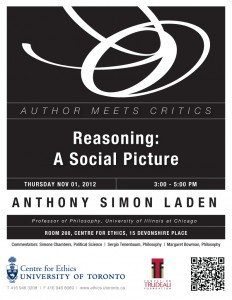
Commentators:
03:00 PM - 05:00 PM
Simone Chambers, Department of Political Science
Sergio Tenenbaum, Department of Philosophy
Margaret Bowman, Postdoctoral Fellow, Centre for Ethics
Room 200, Larkin Building
15 Devonshire Place - Wed, Oct 24, 2012
Ethics at Noon
Life is What Happens When You're Making Other PlansMargaret Bowman
12:00 PM - 02:00 PM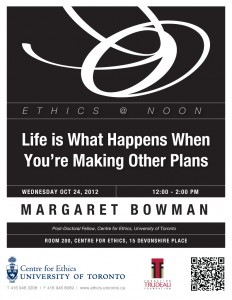
Postdoctoral Fellow, Centre for Ethics, University of Toronto
Room 200, Larkin Building
15 Devonshire Place - Fri, Oct 19, 2012
Political Theory Research Workshop, Events on Campus
Political Theory Research Workshop – Paper 2Lindsay Mahon (Political Science) will be presenting his paper ‘Inquiry and Storytelling in Herodotus: Sex, Murder and a Magic Dolphin’. To get full access to the paper, please contact our Workshop Director (daniellee.lee@utoronto.ca) or the Graduate Coordinator (mauricio.suchowlansky@utoronto.ca).
01:00 PM - 02:30 PM
Room 214, Larkin Building
15 Devonshire Place - Thu, Oct 18, 2012
Author Meets Critics
Trust, Democracy and Multicultural ChallengesTrust, Democracy and Multicultural Challenges
Patti Tamara Lenard
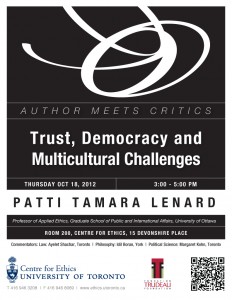
Professor of Applied Ethics, Graduate School of Public and International Affairs
University of OttawaLaw: Ayelet Shachar, Toronto
03:00 PM - 05:00 PM
Philosophy: Idil Boran, York
Political Science: Margaret Kohn, Toronto
Room 200, Larkin Building
15 Devonshire Place - Wed, Oct 10, 2012
Ethics at Noon
Counting the Numbers Fairly: The Equal Proportional Satisfaction of Incommensurable ValuesBruce Chapman
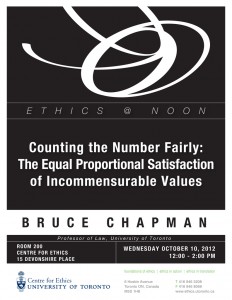
Professor, Faculty of Law, University of TorontoPaper available on request: admin.ethics@utoronto.ca
12:00 PM - 02:00 PM
Room 200, Larkin Building
15 Devonshire Place - Fri, Oct 5, 2012
Political Theory Research Workshop, Events on Campus
Political Theory Research Workshop – Paper 1 01:00 PM - 02:30 PM
Room 200, Larkin Building
15 Devonshire Place - Mon, Oct 1, 2012
Perspectives on Ethics
Interdependence and the Sources of DominationJames Bohman
03:00 PM - 05:00 PM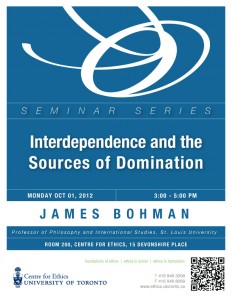
Department of Philosophy
St. Louis University
Room 200, Larkin Building
15 Devonshire Place - Sat, Sep 29, 2012
Events on Campus
Critical Theory Roundtable XX20th Annual Critical Theory Roundtable, 2012
12:00 AM - 12:00 AM
University of Toronto
September 28-30, 2012
Room 200, Larkin Building
15 Devonshire Place - Mon, Sep 17, 2012
Perspectives on Ethics
Collective Responsibility and Collective ObligationTracy Isaacs
03:00 PM - 05:00 PM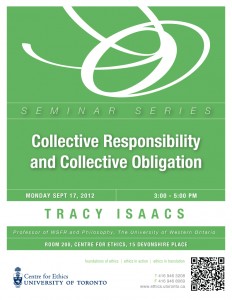
Department of Philosophy
Department of Women’s Studies and Feminist Research
University of Western Ontario
Room 200, Larkin Building
15 Devonshire Place - Fri, Sep 14, 2012
Political Theory Research Workshop, Events on Campus
Political Theory Research Workshop – Orientation Meeting 01:00 PM - 02:30 PM
Room 200, Larkin Building
15 Devonshire Place - Mon, May 28, 2012
Public Lectures
Violence, Fear and Sacrifice: The Forging of a PeopleUday Singh Mehta
01:30 PM - 03:30 PM
CUNY Graduate Centre
Room 200, Larkin Building
15 Devonshire Place - Wed, May 16, 2012
Public Lectures
Tired of Capitalism? How about Something BetterDavid Schweickart
02:00 PM - 04:00 PM
Professor of Philosophy, Loyola University of Chicago
Room 200, Larkin Building
15 Devonshire Place - Wed, Apr 18, 2012
Ethics at Noon
he Democratic Legitimacy of Border Coercion: Freedom of Association, Territorial Dominion, and Self-DefenceArash Abizadeh
12:00 PM - 02:00 PM
Professor of Political Science, McGill University
Room 200, Larkin Building
15 Devonshire Place - Wed, Apr 4, 2012
Ethics at Noon
Toward a Theory of Modern Constitutional LawJacob Weinrib
12:00 AM - 02:00 PM
PhD Candidate, Department of Philosophy and Doctoral Fellow, Centre for Ethics
Room 200, Larkin Building
15 Devonshire Place - Wed, Mar 28, 2012
Ethics at Noon
Antigone's Right: Generation and JusticeKathryn Walker
12:00 PM - 02:00 PM
SSHRC Postdoctoral Fellow, Centre for Ethics, University of Toronto
Room 200, Larkin Building
15 Devonshire Place - Mon, Mar 19, 2012
Perspectives on Ethics
Leaving Consequentialism BehindAllen W. Wood
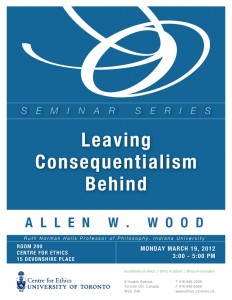
Department of Philosophy
Stanford UniversitySee http://www.indiana.edu/~phil/people/allen-wood.shtml
03:00 PM - 05:00 PM
and
http://philosophy.stanford.edu/profile/Allen+Wood/
Room 200, Larkin Building
15 Devonshire Place - Wed, Mar 14, 2012
Ethics at Noon
London Calling: How Imaginaries and Ideologies Answer for a Social ExplosionJohn Grant
12:00 PM - 02:00 PM
SSHRC Postdoctoral Fellow, University of Toronto
Department of Political Science
Room 200, Larkin Building
15 Devonshire Place - Wed, Mar 7, 2012
Ethics at Noon
Self-interest vs. the Common Good: On a Central Issue in Economic EthicsManuel Wörsdörfer
12:00 PM - 02:00 PM
Chair of Economic Development and Integration
Goethe-University Frankfurt
and
Visiting Fellow, Centre for Ethics
Room 200, Larkin Building
15 Devonshire Place - Mon, Mar 5, 2012
Perspectives on Ethics
Discrimination as NegligenceSophia Reibetanz Moreau
03:00 PM - 05:00 PM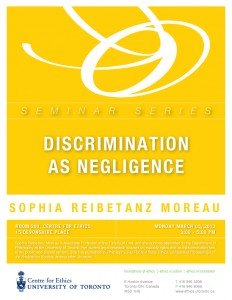
Professor of Philosophy and Law
University of Toronto
http://www.law.utoronto.ca/faculty_content.asp?profile=71&cType=facMembers
Room 200, Larkin Building
15 Devonshire Place - Wed, Feb 29, 2012
Ethics at Noon
The Psychological Presuppositions of Capitalism: Ethics and the Market (again)Mark Peacock
12:00 PM - 02:00 PM
York University, Departments of Business and
Society, Social and Political Thought
Room 200, Larkin Building
15 Devonshire Place - Wed, Feb 8, 2012
Ethics at Noon
Business Ethics as Value AlignmentChris MacDonald
12:00 PM - 02:00 PM
Saint Mary’s University, Halifax
Department of Philosophy
Room 200, Larkin Building
15 Devonshire Place - Mon, Jan 30, 2012
Perspectives on Ethics
Velleman's ConstructivismPhilip Clark
03:00 PM - 05:00 PM
Department of Philosophy
University of Toronto
Room 200, Larkin Building
15 Devonshire Place - Wed, Jan 25, 2012
Ethics at Noon
Modernity and Postcolonial Nationhood: Mahatma Gandhi and Sun Yat-senTheresa Lee
12:00 PM - 02:00 PM
University of Guelph, Department of Political Science and
Visiting Faculty Fellow, Centre for Ethics, University of Toronto
Room 200, Larkin Building
15 Devonshire Place - Mon, Jan 16, 2012
Perspectives on Ethics
Intercultural Political Theory, Globalization, and Democratic AgencyMelissa Williams
03:00 PM - 05:00 PM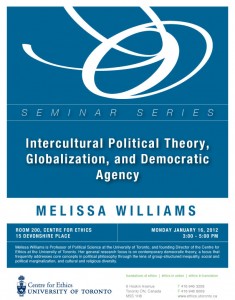
Department of Political Science
University of Toronto
http://politics.utoronto.ca/faculty/profile/?id=98
Room 200, Larkin Building
15 Devonshire Place - Wed, Dec 7, 2011
Ethics at Noon
The Cultivation of Responsiveness and the Problem of ThoughtlessnessJacob Schiff
12:00 PM - 02:00 PM
University of Toronto,
Department of Political Science
Room 200, Larkin Building
15 Devonshire Place - Wed, Nov 30, 2011
Ethics at Noon
Mainland Chinese Adolescents' Reasoning about Rights, Freedoms and Democratic PrinciplesCharles Helwig
12:00 PM - 02:00 PM
Department of Psychology, University of Toronto
Room 200, Larkin Building
15 Devonshire Place - Mon, Nov 28, 2011
Perspectives on Ethics
When the State Speaks, What Should it Say? How Democracies Can Protect Expression and Promote EqualityCorey Brettschneider
03:00 PM - 05:00 PM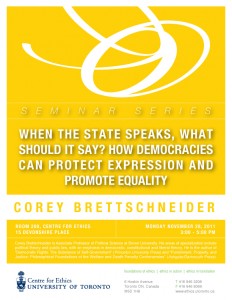
Department of Political Science, Brown University
and
Rockefeller Faculty Fellow, Princeton University Centre for Human Values (2010-2011)
Webpage:http://www.brown.edu/Departments/Political_Science/people/Website.html
SSRN Author page: http://ssrn.com/author=655991
Room 200, Larkin Building
15 Devonshire Place - Tue, Nov 22, 2011
Ethics at Noon
Disorderly Pluralism and the Function of Legal RightsJames Sherman
12:00 PM - 02:00 PM
SSHRC Postdoctoral Fellow, Department of Philosophy, University of Toronto
and Visiting Postdoctoral Fellow, Centre for Ethics, University of Toronto
Room 200, Larkin Building
15 Devonshire Place - Tue, Nov 15, 2011
Ethics at Noon
Must there be Basic Action?Douglas Lavin is the John L. Loeb Associate Professor of the Humanities, Department of Philosophy, Harvard University. His main interests are in ethics and the philosophy of action. His current work includes “Practical Reason and the Possibility of Error”, Ethics 114 (April 2004), which he hopes is the first in a series of papers on the conditions of rational agency. He also has teaching interests in the history of ethics and the philosophy of law, especially criminal law.
12:00 PM - 02:00 PM
Room 200, Larkin Building
15 Devonshire Place - Mon, Nov 14, 2011
Public Lectures
What to Do When You Don't Know What to Do When You Don't Know What to Do…Andrew Sepielli
03:00 PM - 05:00 PM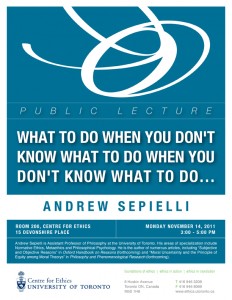
Department of Philosophy
University of Toronto
Room 200, Larkin Building
15 Devonshire Place - Fri, Nov 4, 2011
Events on Campus
Politics in Hard times through the Prism of the New Hard TimesDepartment of Political Science: Toronto International Relations Seminar Series
With: Peter Gourevitch
For more information please contact: th.hall@utoronto.ca
12:00 PM - 01:30 PM
Room 3130, Sidney Smith Building
100 St. George St. - Thu, Nov 3, 2011
Liberty’s Exiles: American Loyalists and the Remaking of the British EmpireTrinity College and the Munk School of Global Affairs present:
The 2011 Margaret MacMillan Lecture in International Relations
With: Dr. Maya Jasanoff
Please RSVP at: cera@trinity.utoronto.ca or 416-946-3346
05:00 PM - 12:00 AM
George Ignatieff Theatre, Larkin Building
15 Devonshire Place - Thu, Nov 3, 2011
Vindicating Autonomy: Kant, Sartre and O'NeillDepartment of Philosophy: Modern Philosophy Research Group Talk
For more information please contact: kheubner@utsc.utoronto.ca
03:15 PM - 05:00 PM
Room 418, Jackman Humanities Building
170 St. George St. - Wed, Nov 2, 2011
Suicide: A Qualified DefenceJoint Centre for Bioethics: Seminar Series
With: David Benatar
For more information please contact: beth.woods@utoronto.ca
04:10 PM - 05:30 PM
Room 754, Health Sciences Building
155 College St. - Wed, Nov 2, 2011
Ethics at Noon
Office is a Thing Borrowed: Jean Bodin between Sovereignty and LegalityDaniel Lee
12:00 PM - 02:00 PM
Department of Political Science, University of Toronto
Room 200, Larkin Building
15 Devonshire Place - Fri, Oct 28, 2011
Events on Campus
Islam & Its Heritage of Non-ViolenceNoor Cultural Centre
With: Amitabh Pal and Dr. Ramin Jahanbegloo
Cost: $5
For more information please go to: www.noorculturalcentre.ca
07:00 PM - 09:00 PM
Noor Cultural Centre
123 Wynford Dr. - Fri, Oct 28, 2011
Events on Campus
Eros at the Core of PhilosophyCPAMP Talk
With: Paul Woodruff
For more information please contact: cpamp@chass.utoronto.ca
03:15 PM - 05:00 PM
Room 418, Jackman Humanities Building
170 St. George St. - Fri, Oct 28, 2011
Events on Campus
Misunderstanding Justice and RightsFaculty of Law: Legal Theory Workshop
With: Richard Wright
For more information please contact: n.gulezko@utoronto.ca
01:00 PM - 02:30 PM
Dining Room, Flavelle House, Faculty of Law
78 Queen's Park Avenue - Fri, Oct 28, 2011
Events on Campus
Writing Empire's Garden: Assam and the Making of IndiaMunk School of Global Affairs
Centre for South Asian Studies
Asian Institutewith: Jayeeta Sharma
Register Online: http://webapp.mcis.utoronto.ca/EventDetails.aspx?EventID=10601
12:00 PM - 02:00 PM
208N, Munk School
1 Devonshire Place - Thu, Oct 27, 2011
Reading Series
Fukuyama's Origins of Political OrderFor more information please contact: spouryousefi@gmail.com or luke.roelofs@utoronto.ca
01:00 PM - 03:00 PM
Room 200, Larkin Building
15 Devonshire Place - Tue, Oct 25, 2011
Safeguarding Data: Looking at Privacy Order HO-07The Centre for Addiction and Mental Health
Brown Bag Research Ethics Discussion Groups 2011
With: Rex Roman
For more information please contact: Susan.Pilon@camh.net
12:00 PM - 01:00 PM
Room 2022 ELCLC
33 Russell Street - Mon, Oct 24, 2011
The Arab Revolutions: Democracy and Historical ConsciousnessWith: Abdou Filai-Ansary
Register at: http://webapp.mcis.utoronto.ca/EventDetails.aspx?eventid=10882
For more information please contact: louis.pauly@utoronto.ca
04:00 PM - 06:00 PM
Vivian and David Campbell Conference Facility
1 Devonshire Place - Thu, Oct 20, 2011
Ethics at Noon
Corporate Criminal ResponsibilityIan Lee
12:00 PM - 02:00 PM
Faculty of Law, University of Toronto
Room 200, Larkin Building
15 Devonshire Place - Mon, Oct 17, 2011
Public Issues Forum
On the very good idea of a good war: Afghanistan ten years inOur Afghan Decade: A roundtable discussion on the past, present and future
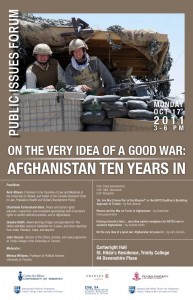 of Canada’s mission in Afghanistan http://this.org/magazine/2011/09/23/10-years-in-afghanistan/
of Canada’s mission in Afghanistan http://this.org/magazine/2011/09/23/10-years-in-afghanistan/THE PANELSTS:
Amir Attaran is Professor in the Faculties of Law and Medicine at the University of Ottawa, and holder of the Canada Research Chair in Law, Population Health and Global Development Policy.
Cheshmak Farhoumand-Sims is a peace and human rights educator, researcher, and consultant specializing both in women’s rights in conflict-affected contexts, and in Afghanistan.
Graeme Smith is an award-winning foreign correspondent for /The Globe and Mail/, based in Kandahar for three years, and since reporting from India, Pakistan, Libya, and beyond.
John Duncan is the director of the Ethics, Society, and Law program at the University of Trinity College in the University of Toronto.
MODERATOR:
Melissa S. Williams is Professor of Political Science at the University of Toronto.
CO-SPONSORS:
•Centre for Ethics, University of Toronto
03:00 PM - 06:00 PM
•The Provost, Trinity College
•The Margaret MacMillan Trinity One Programme, Trinity College
•The International Relations Programme, Trinity College
•Victoria College
•Ethics, Society & Law Students’ Association, Trinity College
Cartwright Hall, 1st Floor, St. Hilda's Residence
44 Devonshire Place - Thu, Oct 13, 2011
Author Meets Critics
Assisted Death: A Study in Ethics and LawWayne Sumner
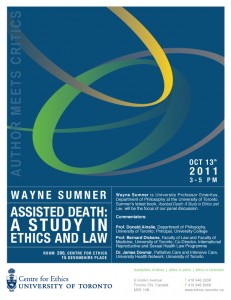
University Professor Emeritus
Department of PhilosophyCommentators:
Prof. Donald Ainslie
Department of Philosophy, University of Toronto
Principal, University CollegeProf. Bernard Dickens
Faculty of Law and Faculty of Medicine, University of Toronto
Co-Director, International Reproductive and Sexual Health Law ProgrammeDr. James Downar
Palliative Care and Intensive Care
University Health Network, University of Toronto*The book will be available for purchase and signing by the author.
Click here to view a description of the book
03:00 PM - 05:00 PM
Room 200, Larkin Building
15 Devonshire Place - Thu, Oct 6, 2011
Freedom and Necessity in Hegel's 'Philosophy of History' and 'Philosophy of Right'Sally Sedgwick, University of Illinois at Chicago
03:15 PM - 05:00 PM
Room 100A, Jackman Humanities Building
170 St. George St. - Wed, Oct 5, 2011
Advocacy in Health Care: Documents and DemonstrationsPhilip Berger MD, Chief, Dept. of Family and Community Medicine, Medical Director, Inner City Health Program, St. Michael’s Hospital
04:10 PM - 05:30 PM
Room 754, Health Sciences Building
155 College St. - Wed, Oct 5, 2011
Ethics at Noon
Responsibility and Response-dependenceChristine Tappolet
12:00 PM - 02:00 PM
Department of Philosophy, Université de Montréal
and Visiting Faculty Fellow, Centre for Ethics, University of Toronto
Room 200, Larkin Building
15 Devonshire Place - Mon, Oct 3, 2011
Perspectives on Ethics
Right in the Middle: Normativity and Idealized Subjective Theories of Well-BeingValerie Tiberius
03:00 PM - 05:00 PM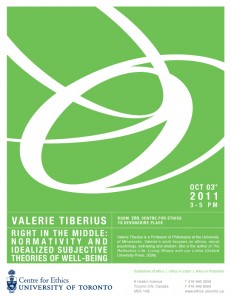
Department of Philosophy
University of Minnesota
http://www.tc.umn.edu/~tiberius/
Room 200, Larkin Building
15 Devonshire Place - Mon, Sep 26, 2011
Perspectives on Ethics
Continuous and Discontinuous Persons: Two Dimensions of Ethical Life
03:00 PM - 05:00 PM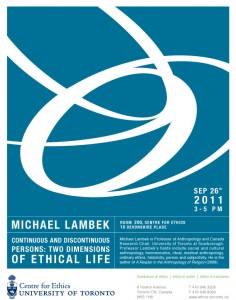 Michael Lambek, FRSC
Michael Lambek, FRSC
Professor of Anthropology & Canada Research Chair
University of Toronto at Scarborough
http://www.utsc.utoronto.ca/~socsci/lambek/
Room 200, Larkin Building
15 Devonshire Place - Thu, Sep 22, 2011
Public Lectures
Doubting and Defending the Principle of FairnessRichard Arneson
03:00 PM - 05:00 PM
Department of Philosophy
University of California, Berkeley
http://philosophyfaculty.ucsd.edu/faculty/rarneson/
Room 200, Larkin Building
15 Devonshire Place - Wed, Jul 27, 2011
Author Meets Critics
Hannah’s Turn – A play about Hannah Arendt and Martin HeideggerWritten by Mark Migotti and Richard Sanger

Directed by Mary Francis Moore
With: Severn Thompson, Richard Clarkin and Leora Morris
Discussion introduced and moderated by Mark Kingwell
03:00 PM - 05:00 PM
- Wed, May 4, 2011
Public Issues Forum
The Ethics of Ghost Authorship in Biomedical Research: Concerns and RemediesTrudo Lemmens, LicJur (KULeuven),LLM, DCL (McGill)
Associate Professor
Faculty of Law, University of TorontoHamid Reza Raziee, MD. MSHc. (Bioethics)
Research Associate, Faculty of Law, and
Member, Joint Centre for Bioethics,
University of TorontoSimon Stern, J.D. (Yale)08:30 AM - 05:00 PM
Assistant Professor, Faculty of Law, University of Toronto
(Classroom A) Flavelle House, Faculty of Law
78 Queen’s Park Avenue
Centre for Ethics, University of Toronto
Where conversations about ethics happen.




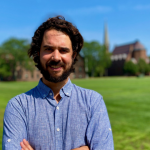


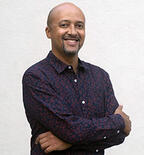

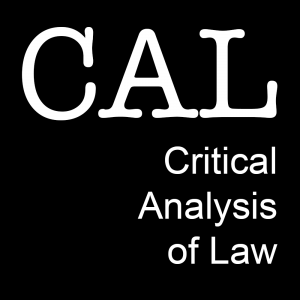




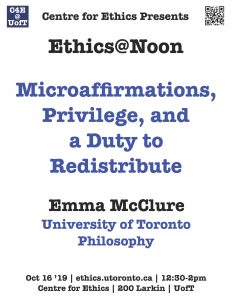
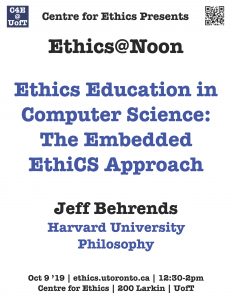

 Nicole Leaver
Nicole Leaver



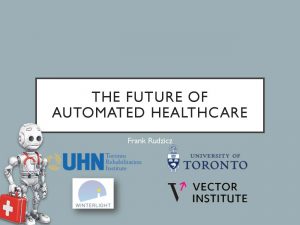

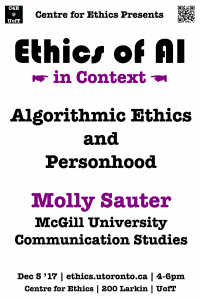
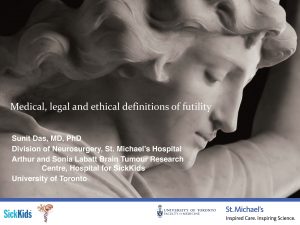


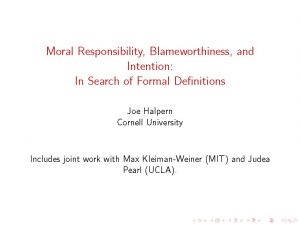
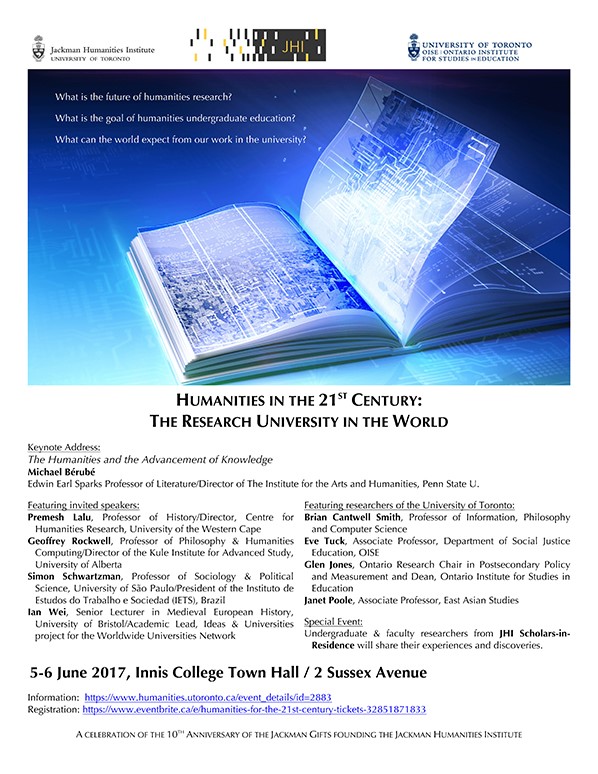

 [☛
[☛